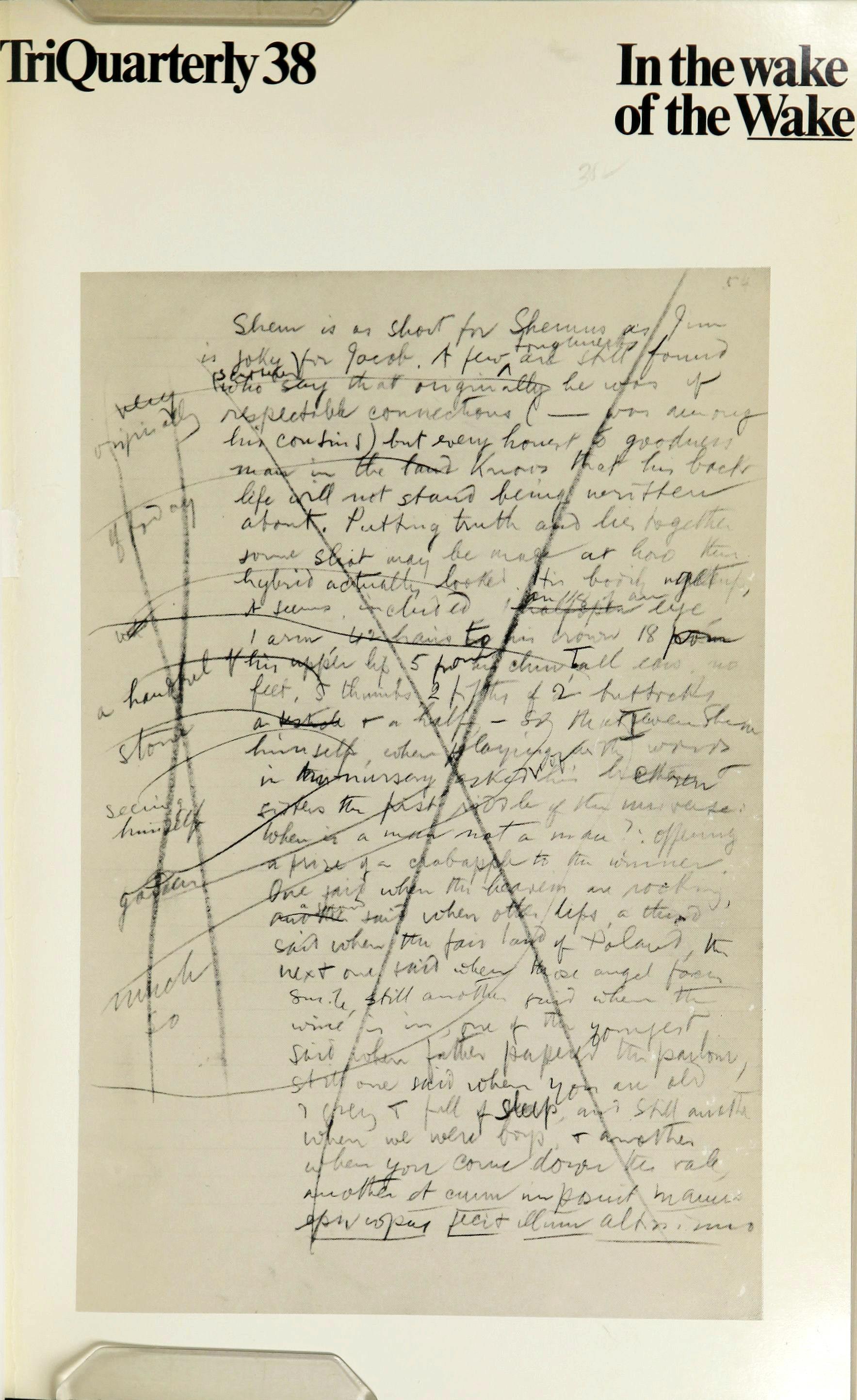
lliQuarterly38 Inthewake oftheWake

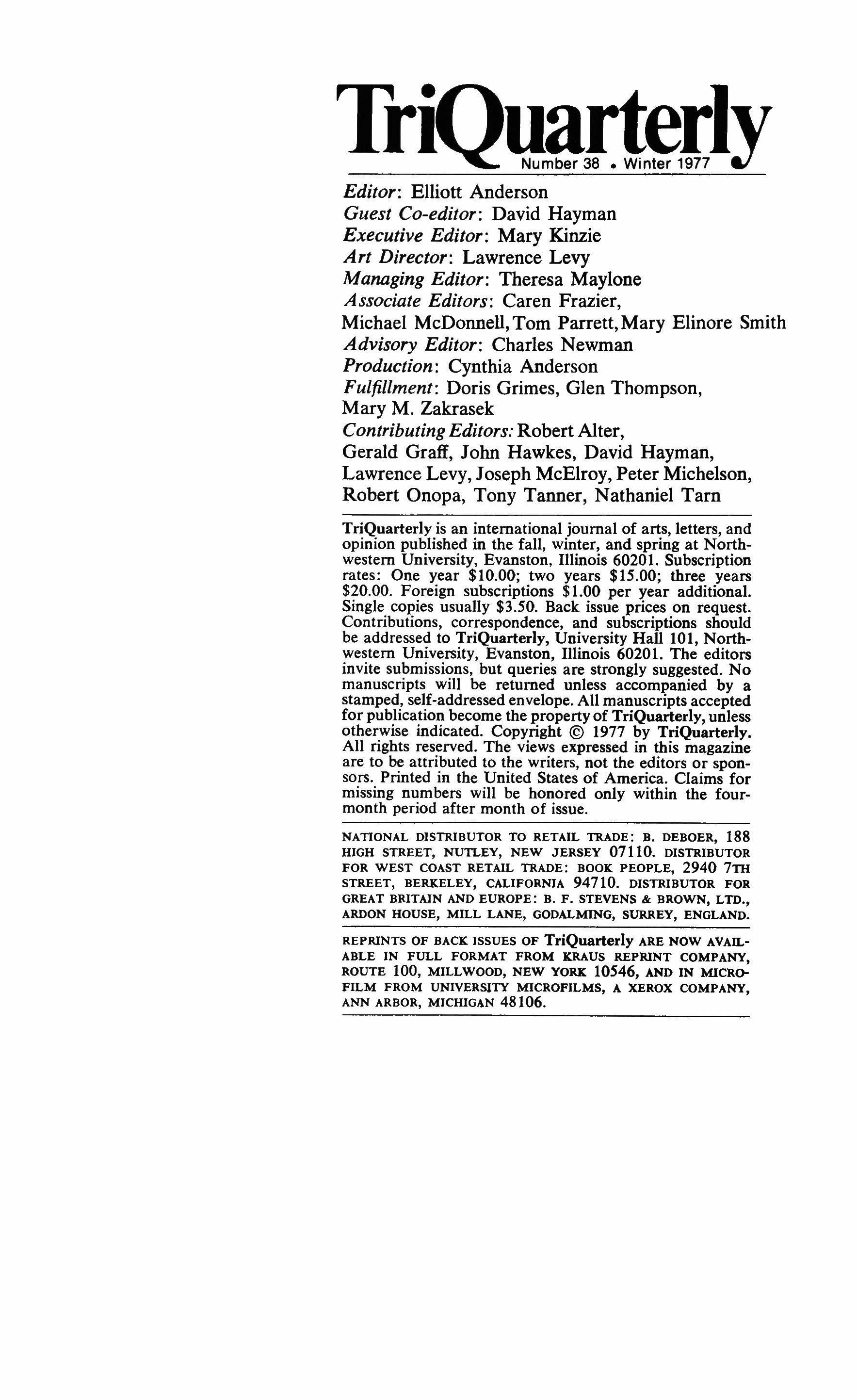
Editor: Elliott Anderson
Guest Co-editor: David Hayman
Executive Editor: Mary Kinzie
Art Director: Lawrence Levy
Managing Editor: Theresa Maylone
Associate Editors: Caren Frazier, Michael McDonnell, Tom Parrett,Mary Elinore Smith
Advisory Editor: Charles Newman
Production: Cynthia Anderson
Fulfillment: Doris Grimes, Glen Thompson, Mary M. Zakrasek
Contributing Editors: Robert Alter, Gerald Graff, John Hawkes, David Hayman, Lawrence Levy, Joseph McElroy, Peter Michelson, Robert Onopa, Tony Tanner, Nathaniel Tarn
TriQuarterly is an international journal of arts, letters, and opinion published in the fall, winter, and spring at Northwestern University, Evanston, Illinois 60201. Subscription rates: One year $10.00; two years $15.00; three years $20.00. Foreign subscriptions $1.00 per year additional. Single copies usually $3.50. Back issue prices on request. Contributions, correspondence, and subscriptions should be addressed to TriQuarterly, University Hall 101, Northwestern University, Evanston, Illinois 60201. The editors invite submissions, but queries are strongly suggested. No manuscripts will be returned unless accompanied by a stamped, self-addressed envelope. All manuscripts accepted for publication become the property of TriQuarterly, unless otherwise indicated. Copyright © 1977 by TriQuarteriy. All rights reserved. The views expressed in this magazine are to be attributed to the writers, not the editors or sponsors. Printed in the United States of America. Claims for missing numbers will be honored only within the fourmonth period after month of issue.
NATIONAL DISTRIBUTOR TO RETAIL TRADE: B. DEBOER, 188 HIGH STREET, NUTLEY, NEW JERSEY 07110. DISTRIBUTOR FOR WEST COAST RETAIL TRADE: BOOK PEOPLE, 2940 7TH STREET, BERKELEY, CALIFORNIA 94710. DISTRIBUTOR FOR GREAT BRITAIN AND EUROPE: B. F. STEVENS & BROWN, LTD., ARDON HOUSE, MILL LANE, GODALMING, SURREY, ENGLAND.
REPRINTS OF BACK ISSUES OF TriQuarterly ARE NOW AVAILABLE IN FULL FORMAT FROM KRAUS REPRINT COMPANY, ROUTE 100, MILLWOOD, NEW YORK 10546, AND IN MICROFILM FROM UNIVERSlTY MICROFILMS, A XEROX COMPANY, ANN ARBOR, MICHIGAN 48106.
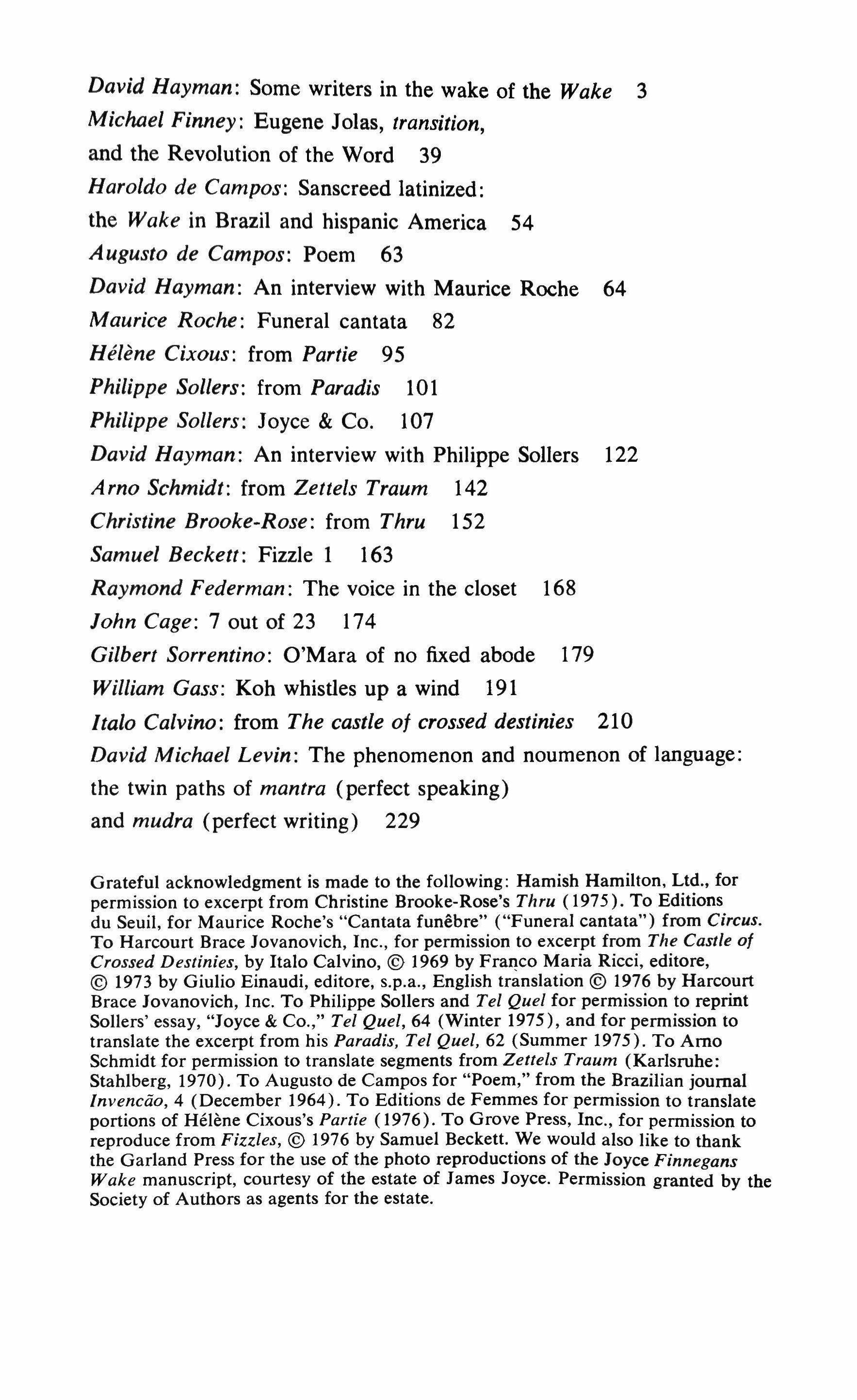
David Hayman: Some writers in the wake of the Wake 3
Michael Finney: Eugene Jolas, transition, and the Revolution of the Word 39
Haroldo de Campos: Sanscreed latinized: the Wake in Brazil and hispanic America 54
Augusto de Campos: Poem 63
David Hayman: An interview with Maurice Roche 64
Maurice Roche: Funeral cantata 82
Helene Cixous: from Partie
Philippe Sollers: from Paradis
Philippe Sollers: Joyce & Co. 95 101 107
David Hayman: An interview with Philippe Sollers 122
Arno Schmidt: from Zettels Traum 142
Christine Brooke-Rose: from Thru 152
Samuel Beckett: Fizzle 1 163
Raymond Federman: The voice in the closet 168
John Cage: 7 out of 23 174
Gilbert Sorrentino: O'Mara of no fixed abode 179
William Gass: Koh whistles up a wind 191
ltalo Calvino: from The castle of crossed destinies 210
David Michael Levin: The phenomenon and noumenon of language: the twin paths of mantra (perfect speaking) and mudra (perfect writing) 229
Grateful acknowledgment is made to the following: Hamish Hamilton, Ltd., for permission to excerpt from Christine Brooke-Rose's Thru (1975). To Editions du Seuil, for Maurice Roche's "Cantata funebre" ("Funeral cantata") from Circus. To Harcourt Brace Jovanovich, Inc., for permission to excerpt from The Castle of Crossed Destinies, by Italo Calvino, © 1969 by FrllI!CO Maria Ricci, editore, © 1973 by Giulio Einaudi, editore, s.p.a., English translation © 1976 by Harcourt Brace Jovanovich, Inc. To Philippe Sollers and Tel Quel for permission to reprint Sollers' essay, "Joyce & Co.," Tel Quel, 64 (Winter 1975), and for permission to translate the excerpt from his Paradis, Tel Quel, 62 (Summer 1975). To Arno Schmidt for permission to translate segments from Zettels Traum (Karlsruhe: Stahlberg, 1970). To Augusto de Campos for "Poem," from the Brazilian journal lnvenciio, 4 (December 1964). To Editions de Femmes for permission to translate portions of Helene Cixous's Partie (1976). To Grove Press, Inc., for permission to reproduce from Fizzles, © 1976 by Samuel Beckett. We would also like to thank the Garland Press for the use of the photo reproductions of the Joyce Finnegans Wake manuscript, courtesy of the estate of James Joyce. Permission granted by the Society of Authors as agents for the estate.
Some writers in the wake of the Wake
David
Hayman

Joyce schooled himself in the basics, learning the tradition, spelling out the letters of style and form, intuiting slowly and in stages the contours of his personal vision. Like Flaubert, he never dealt with the frozen, selective, and secondhand "reality" of camera or journalism, but with experience as handmaid to perception, or directly with the materials of perception. His real preoccupation was with systems of presentation. His development was toward the amplification of the verbal, the creation of autonomous forms in motion; toward the vitalized word in Finnegans Wake, the "collideorscape." To arrive there he was obliged to alter and recombine, but not to destroy, existing expressive codes. This purposeful alteration is one source of our discomfort (and joy) when we are faced with that ultimate text. It is, perhaps, Joyce's major contribution to literature.
"Yes, of course, we all know Anna Livia"; yet Finnegans Wake has for years been an acknowledged but unread masterpiece, the least dog-eared book on every English graduate student's shelf, a cult item conned by footnote hounds and citation grubbers. When, after a decade and a half of teasing prepublication in little mags, Joyce finally published his "Work
3
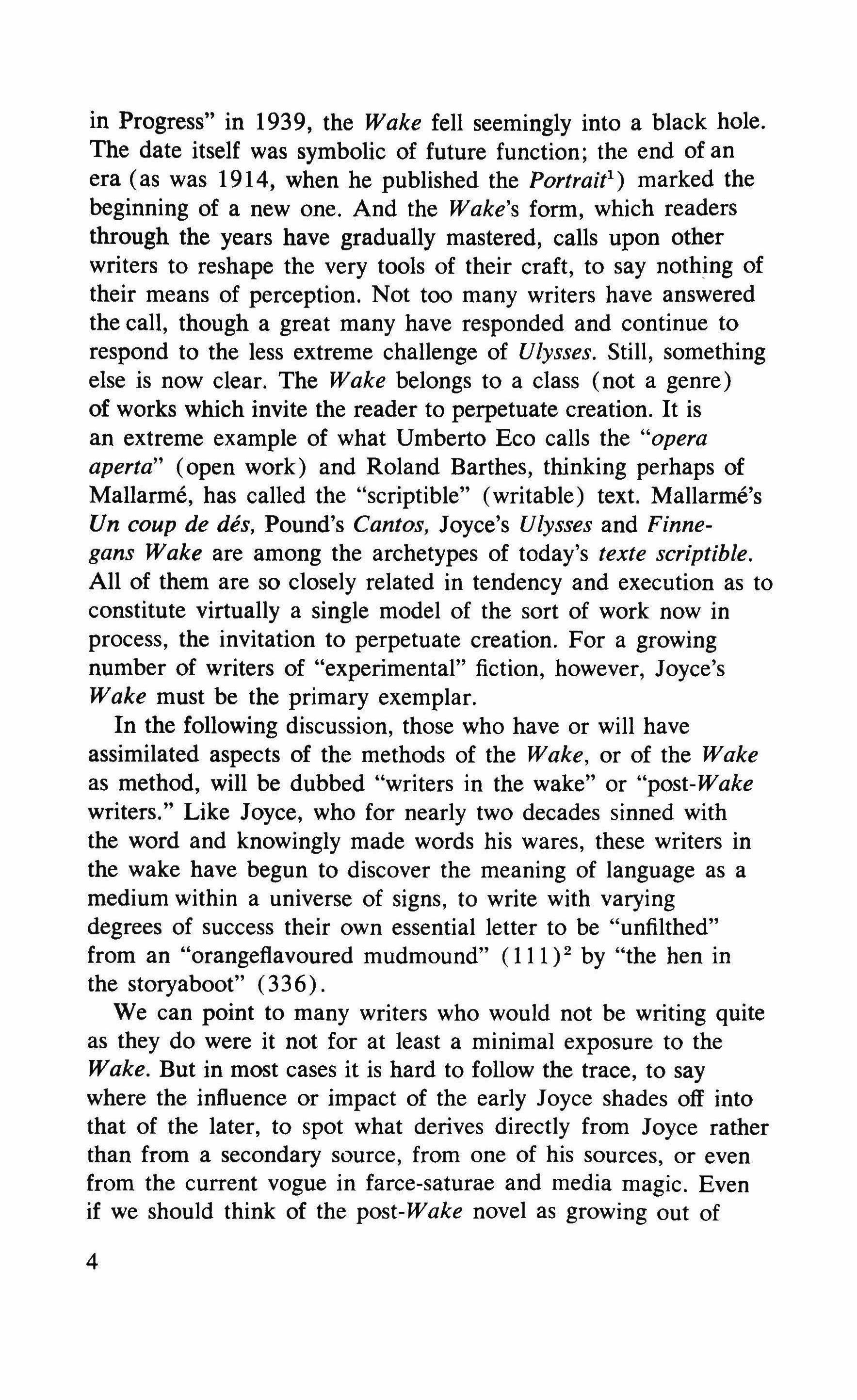
in Progress" in 1939, the Wake fell seemingly into a black hole. The date itself was symbolic of future function; the end of an era (as was 1914, when he published the Portraitr) marked the beginning of a new one. And the Wake's form, which readers through the years have gradually mastered, calls upon other writers to reshape the very tools of their craft, to say nothing of their means of perception. Not too many writers have answered the call, though a great many have responded and continue to respond to the less extreme challenge of Ulysses. Still, something else is now clear. The Wake belongs to a class (not a genre) of works which invite the reader to perpetuate creation. It is an extreme example of what Umberto Eco calls the "opera aperta" (open work) and Roland Barthes, thinking perhaps of Mallarme, has called the "scriptible" (writable) text. Mallarme's Un coup de des, Pound's Cantos, Joyce's Ulysses and Finnegans Wake are among the archetypes of today's texte scriptible. All of them are so closely related in tendency and execution as to constitute virtually a single model of the sort of work now in process, the invitation to perpetuate creation. For a growing number of writers of "experimental" fiction, however, Joyce's Wake must be the primary exemplar.
In the following discussion, those who have or will have assimilated aspects of the methods of the Wake, or of the Wake as method, will be dubbed "writers in the wake" or "post-Wake writers." Like Joyce, who for nearly two decades sinned with the word and knowingly made words his wares, these writers in the wake have begun to discover the meaning of language as a medium within a universe of signs, to write with varying degrees of success their own essential letter to be "unfilthed" from an "orangeflavoured mudmound" (111)2 by "the hen in the storyaboot" (336).
We can point to many writers who would not be writing quite as they do were it not for at least a minimal exposure to the Wake. But in most cases it is hard to follow the trace, to say where the influence or impact of the early Joyce shades off into that of the later, to spot what derives directly from Joyce rather than from a secondary source, from one of his sources, or even from the current vogue in farce-saturae and media magic. Even if we should think of the post-Wake novel as growing out of
4

tendencies central to the Wake rather than directly out of the Wake itself, our case for both influence and impact is still strongest when limited to writers who have actually read and studied Joyce as the "connundrurumchuff" (352).
To date, most of the work in this "tradition" has been done by writers in languages other than English. Neither the English, since Lewis Carroll and apart from a few like Anthony Burgess and Christine Brooke-Rose, nor the Irish, apart from Flan O'Brien, have begun to see prose as a medium for reader-writer collaboration, to recognize the creative-play functions of reading, or to apprehend and exploit the explosion-implosion of the word. Few writers in either nation read Finnegans Wake. In America, we are just now getting beyond Ulysses, but at least we have been there. Only a chosen few-like those publishing in the kabbalistic magazine Tree and in experiment-welcoming periodicals like TriQuarterly, certain of our critics (McLuhan, Hassan, Norman O. Brown, and in a sense Northrop Frye) and avant-garde figures like Stan Brakhage, John Cage, and perhaps Robert Wilsont-e-are branching out from the Wake. Though a cult object in English and American academe, and increasingly a source book for writers of verse and fiction, Finnegans Wake is not yet the model and integrated source it could and may become.
In Europe and Latin America, though fewer have a firm grasp of English, and though the majority, even among the avantgarde, look to other models, we find writers whose awareness of the Wake profoundly affects their writing. (Among Latin Americans, Leopoldo Marechal and G. Cabrera Infante come to mind.) The declared Joycean bias of Arno Schmidt, Philippe Sollers, Maurice Roche, and the Brazilian concrete poets is something more than a straw in the wind-if something less than a tradition. For these are major writers and trend setters with radically different gifts. In this connection, other factors may be crucial: the pull of revolutions in the other arts and in technology, the support received from currently fashionable philosophical and psychoanalytic thought (especially from Jacques Derrida and Jacques Lacan in France), the continuing interest in linguistic theory, political theory, semiology, and eccentric literary predecessors like Mallarme, Lautreamont, Artaud, and Bataille. All these combine to throw Joyce's pro-
5
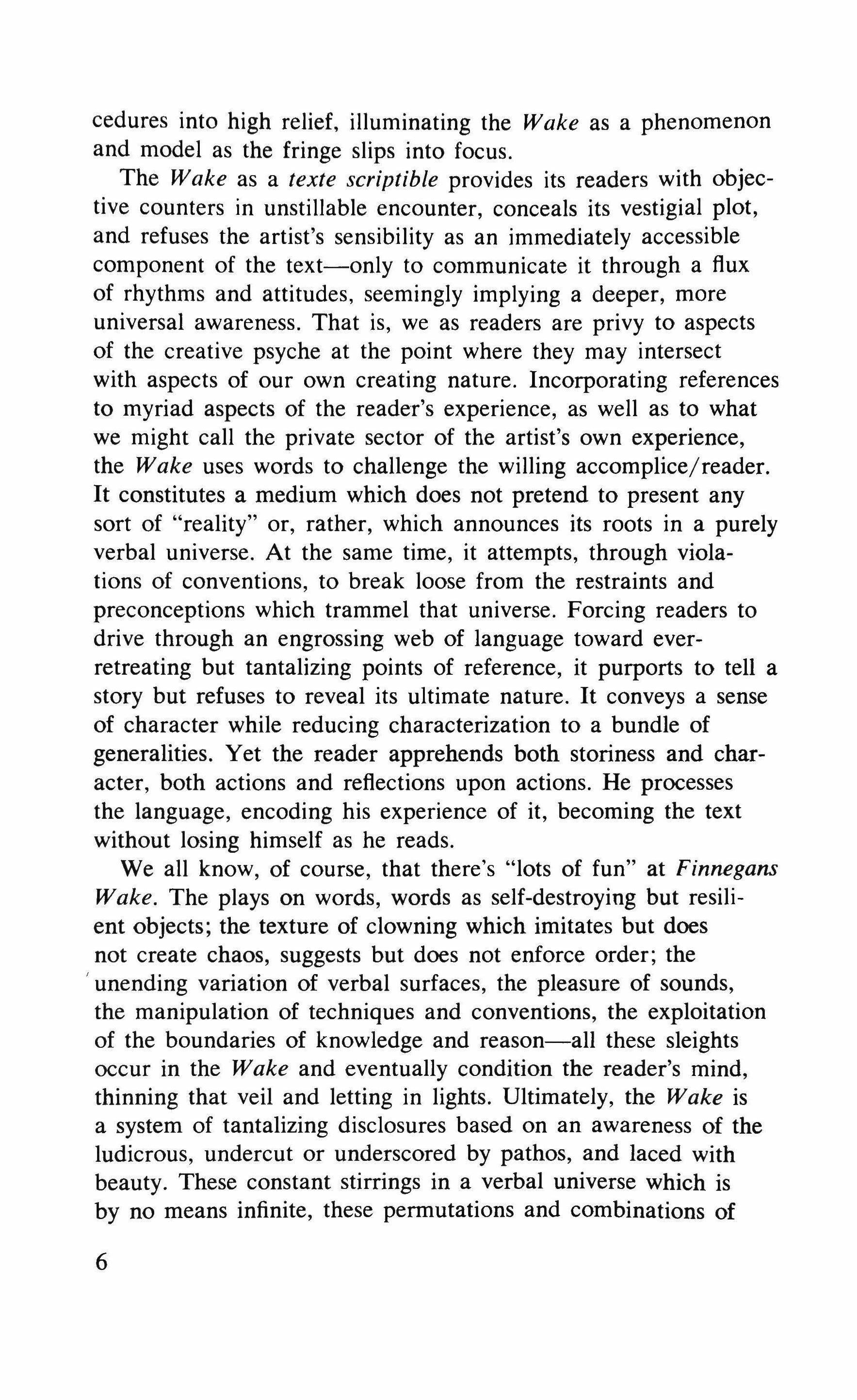
cedures into high relief, illuminating the Wake as a phenomenon and model as the fringe slips into focus.
The Wake as a texte scriptible provides its readers with objective counters in unstillable encounter, conceals its vestigial plot, and refuses the artist's sensibility as an immediately accessible component of the text-only to communicate it through a flux of rhythms and attitudes, seemingly implying a deeper, more universal awareness. That is, we as readers are privy to aspects of the creative psyche at the point where they may intersect with aspects of our own creating nature. Incorporating references to myriad aspects of the reader's experience, as well as to what we might call the private sector of the artist's own experience, the Wake uses words to challenge the willing accomplice/reader. It constitutes a medium which does not pretend to present any sort of "reality" or, rather, which announces its roots in a purely verbal universe. At the same time, it attempts, through violations of conventions, to break loose from the restraints and preconceptions which trammel that universe. Forcing readers to drive through an engrossing web of language toward everretreating but tantalizing points of reference, it purports to tell a story but refuses to reveal its ultimate nature. It conveys a sense of character while reducing characterization to a bundle of generalities. Yet the reader apprehends both storiness and character, both actions and reflections upon actions. He processes the language, encoding his experience of it, becoming the text without losing himself as he reads.
We all know, of course, that there's "lots of fun" at Finnegans Wake. The plays on words, words as self-destroying but resilient objects; the texture of clowning which imitates but does not create chaos, suggests but does not enforce order; the 'unending variation of verbal surfaces, the pleasure of sounds, the manipulation of techniques and conventions, the exploitation of the boundaries of knowledge and reason-all these sleights occur in the Wake and eventually condition the reader's mind, thinning that veil and letting in lights. Ultimately, the Wake is a system of tantalizing disclosures based on an awareness of the ludicrous, undercut or underscored by pathos, and laced with beauty. These constant stirrings in a verbal universe which is by no means infinite, these permutations and combinations of
6
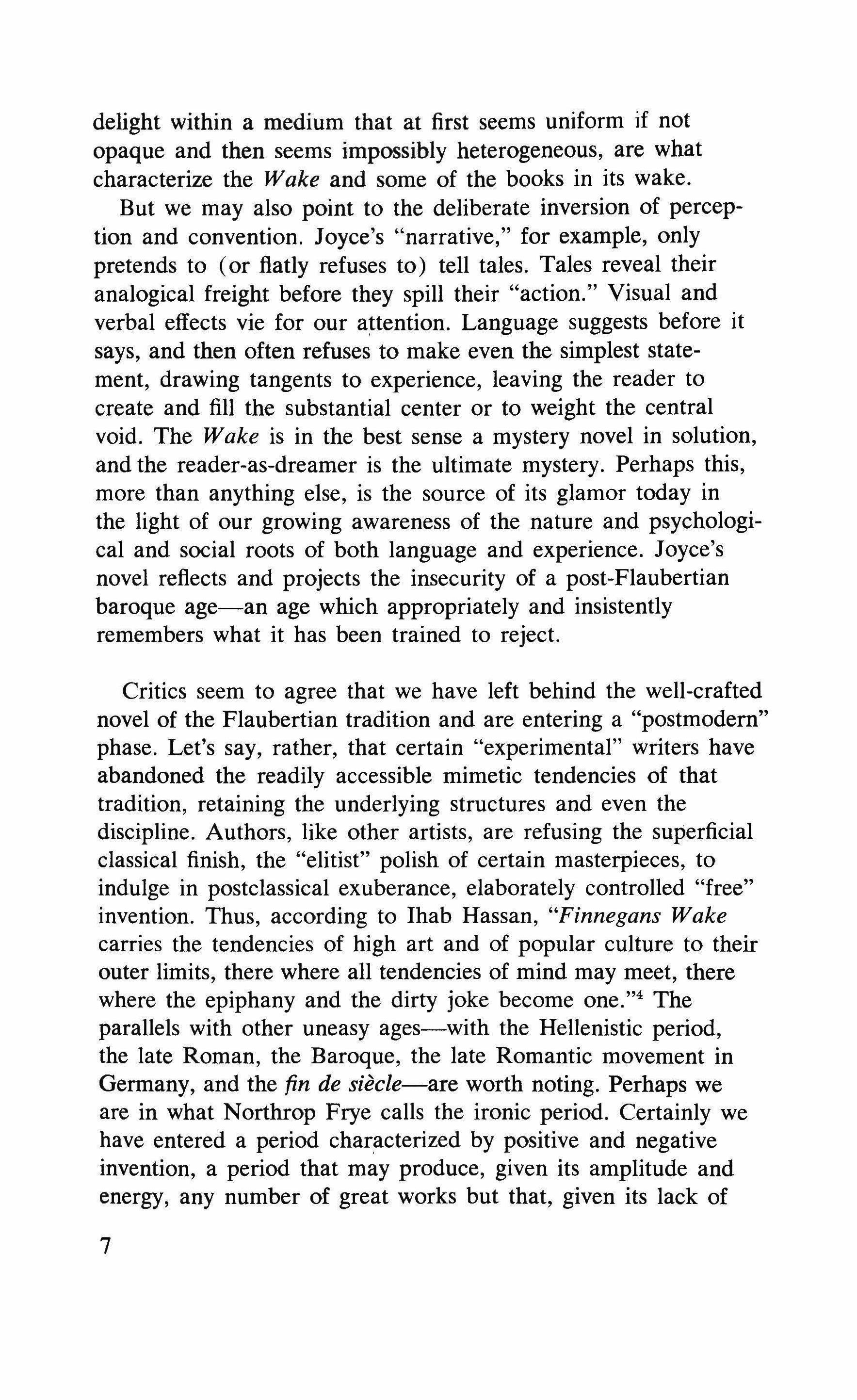
delight within a medium that at first seems uniform if not opaque and then seems impossibly heterogeneous, are what characterize the Wake and some of the books in its wake.
But we may also point to the deliberate inversion of perception and convention. Joyce's "narrative," for example, only pretends to (or flatly refuses to) tell tales. Tales reveal their analogical freight before they spill their "action." Visual and verbal effects vie for our attention. Language suggests before it says, and then often refuses to make even the simplest statement, drawing tangents to experience, leaving the reader to create and fill the substantial center or to weight the central void. The Wake is in the best sense a mystery novel in solution, and the reader-as-dreamer is the ultimate mystery. Perhaps this, more than anything else, is the source of its glamor today in the light of our growing awareness of the nature and psychological and social roots of both language and experience. Joyce's novel reflects and projects the insecurity of a post-Flaubertian baroque age-an age which appropriately and insistently remembers what it has been trained to reject.
Critics seem to agree that we have left behind the well-crafted novel of the Flaubertian tradition and are entering a "postmodem" phase. Let's say, rather, that certain "experimental" writers have abandoned the readily accessible mimetic tendencies of that tradition, retaining the underlying structures and even the discipline. Authors, like other artists, are refusing the superficial classical finish, the "elitist" polish of certain masterpieces, to indulge in postclassical exuberance, elaborately controlled "free" invention. Thus, according to Ihab Hassan, "Finnegans Wake carries the tendencies of high art and of popular culture to their outer limits, there where all tendencies of mind may meet, there where the epiphany and the dirty joke become one.:" The parallels with other uneasy ages-with the Hellenistic period, the late Roman, the Baroque, the late Romantic movement in Germany, and the fin de siecle-are worth noting. Perhaps we are in what Northrop Frye calls the ironic period. Certainly we have entered a period characterized by positive and negative invention, a period that may produce, given its amplitude and energy, any number of great works but that, given its lack of
7
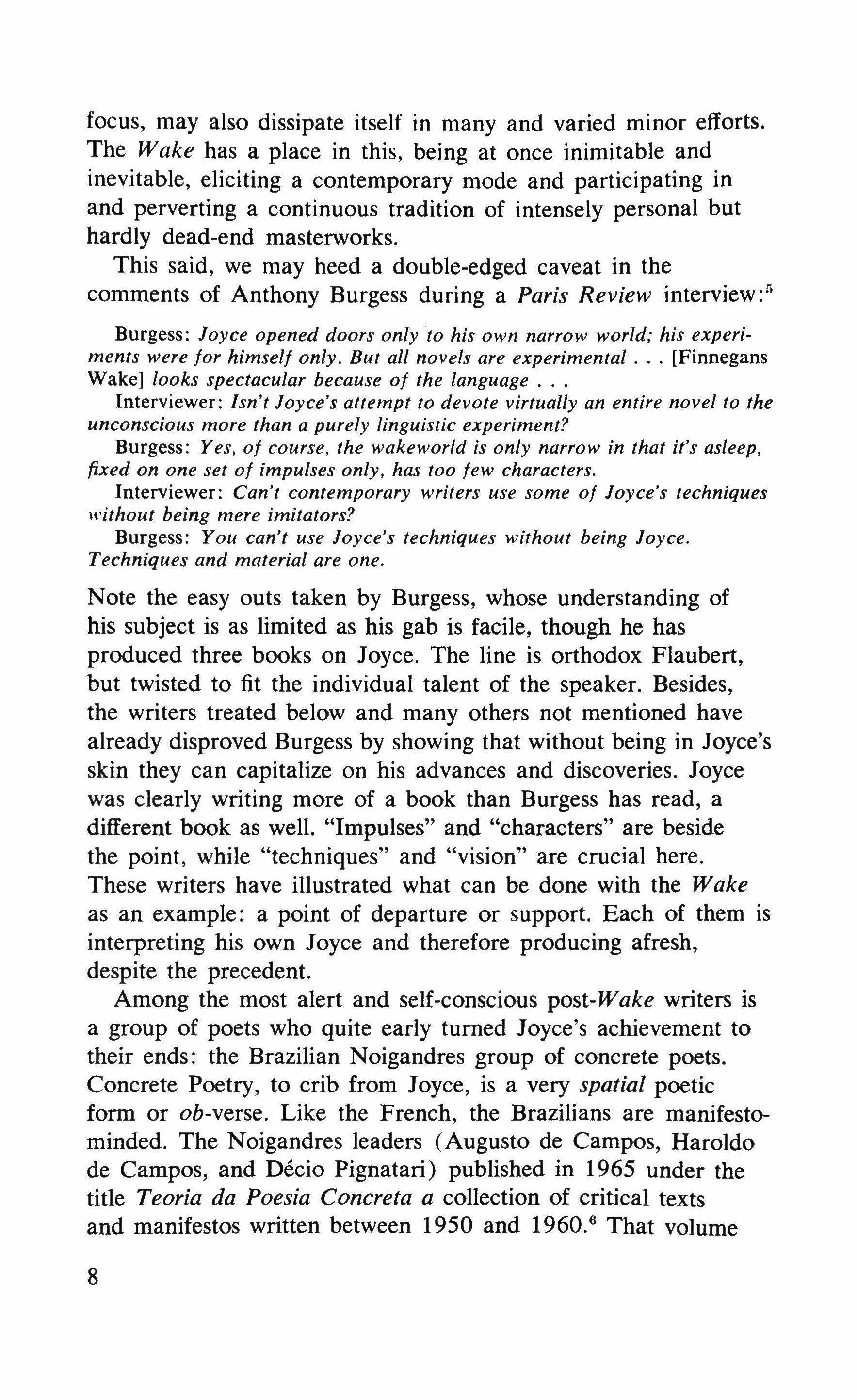
focus, may also dissipate itself in many and varied minor efforts. The Wake has a place in this, being at once inimitable and inevitable, eliciting a contemporary mode and participating in and perverting a continuous tradition of intensely personal but hardly dead-end masterworks.
This said, we may heed a double-edged caveat in the comments of Anthony Burgess during a Paris Review interview:"
Burgess: Joyce opened doors only 'to his own narrow world; his experiments were for himself only. But all novels are experimental [Finnegans Wake] looks spectacular because of the language
Interviewer: Isn't Joyce's attempt to devote virtually an entire novel to the unconscious more than a purely linguistic experiment?
Burgess: Yes, of course, the wakeworld is only narrow in that it's asleep, fixed on one set of impulses only, has too few characters.
Interviewer: Can't contemporary writers use some of Joyce's techniques without being mere imitators?
Burgess: You can't use Joyce's techniques without being Joyce. Techniques and material are one.
Note the easy outs taken by Burgess, whose understanding of his subject is as limited as his gab is facile, though he has produced three books on Joyce. The line is orthodox Flaubert, but twisted to fit the individual talent of the speaker. Besides, the writers treated below and many others not mentioned have already disproved Burgess by showing that without being in Joyce's skin they can capitalize on his advances and discoveries. Joyce was clearly writing more of a book than Burgess has read, a different book as well. "Impulses" and "characters" are beside the point, while "techniques" and "vision" are crucial here. These writers have illustrated what can be done with the Wake as an example: a point of departure or support. Each of them is interpreting his own Joyce and therefore producing afresh, despite the precedent.
Among the most alert and self-conscious post-Wake writers is a group of poets who quite early turned Joyce's achievement to their ends: the Brazilian Noigandres group of concrete poets. Concrete Poetry, to crib from Joyce, is a very spatial poetic form or ob-verse. Like the French, the Brazilians are manifestominded. The Noigandres leaders (Augusto de Campos, Haroldo de Campos, and Decio Pignatari) published in 1965 under the title Teoria da Poesia Concreta a collection of critical texts and manifestos written between 1950 and 1960.6 That volume
8
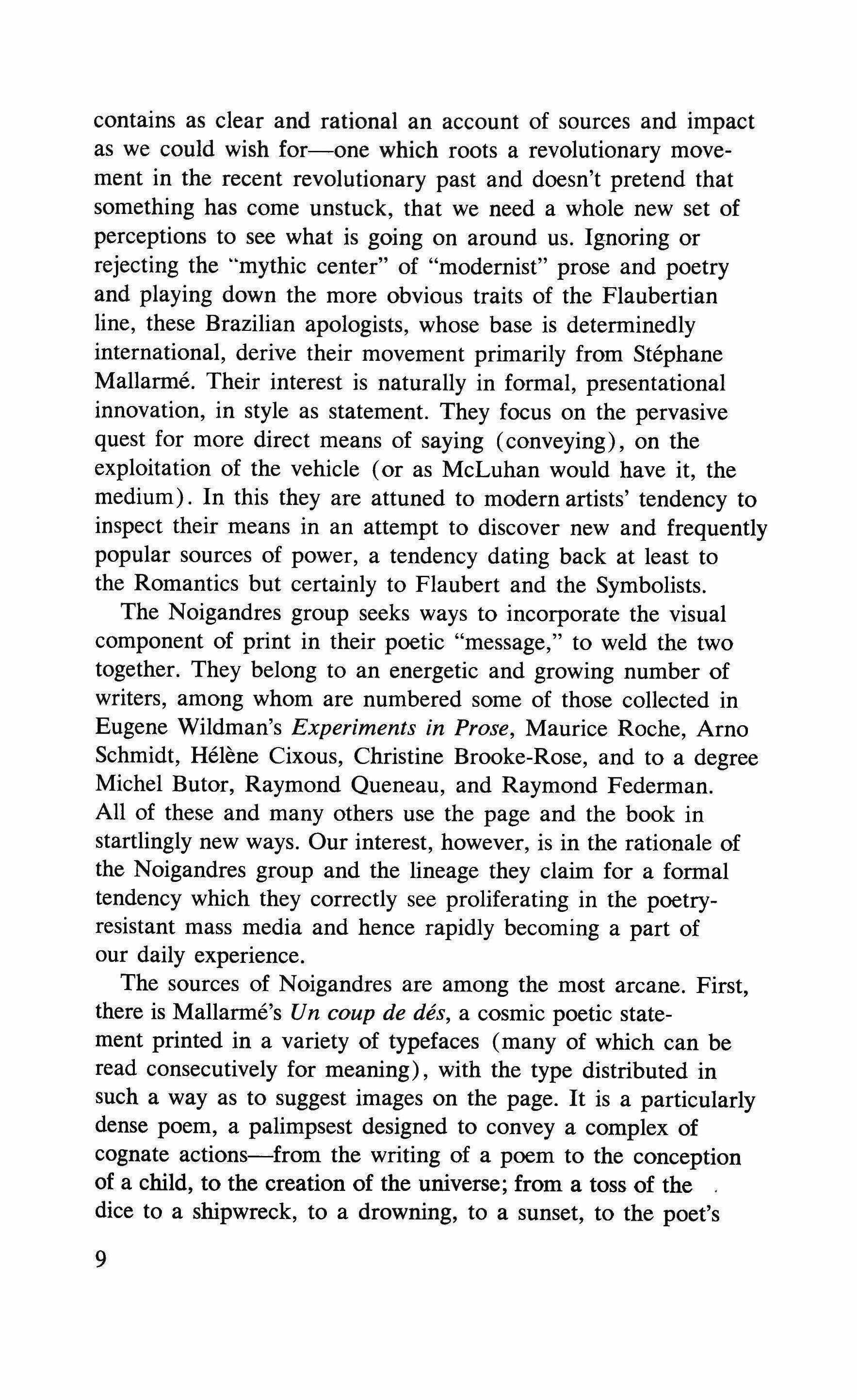
contains as clear and rational an account of sources and impact as we could wish for-one which roots a revolutionary movement in the recent revolutionary past and doesn't pretend that something has come unstuck, that we need a whole new set of perceptions to see what is going on around us. Ignoring or rejecting the "mythic center" of "modernist" prose and poetry and playing down the more obvious traits of the Flaubertian line, these Brazilian apologists, whose base is determinedly international, derive their movement primarily from Stephane Mallarme. Their interest is naturally in formal, presentational innovation, in style as statement. They focus on the pervasive quest for more direct means of saying (conveying), on the exploitation of the vehicle (or as McLuhan would have it, the medium). In this they are attuned to modern artists' tendency to inspect their means in an attempt to discover new and frequently popular sources of power, a tendency dating back at least to the Romantics but certainly to Flaubert and the Symbolists.
The Noigandres group seeks ways to incorporate the visual component of print in their poetic "message," to weld the two together. They belong to an energetic and growing number of writers, among whom are numbered some of those collected in Eugene Wildman's Experiments in Prose, Maurice Roche, Arno Schmidt, Helene Cixous, Christine Brooke-Rose, and to a degree Michel Butor, Raymond Queneau, and Raymond Federman. All of these and many others use the page and the book in startlingly new ways. Our interest, however, is in the rationale of the Noigandres group and the lineage they claim for a formal tendency which they correctly see proliferating in the poetryresistant mass media and hence rapidly becoming a part of our daily experience.
The sources of Noigandres are among the most arcane. First, there is Mallarme's Un coup de des, a cosmic poetic statement printed in a variety of typefaces (many of which can be read consecutively for meaning), with the type distributed in such a way as to suggest images on the page. It is a particularly dense poem, a palimpsest designed to convey a complex of cognate actions-from the writing of a poem to the conception of a child, to the creation of the universe; from a toss of the dice to a shipwreck, to a drowning, to a sunset, to the poet's
9
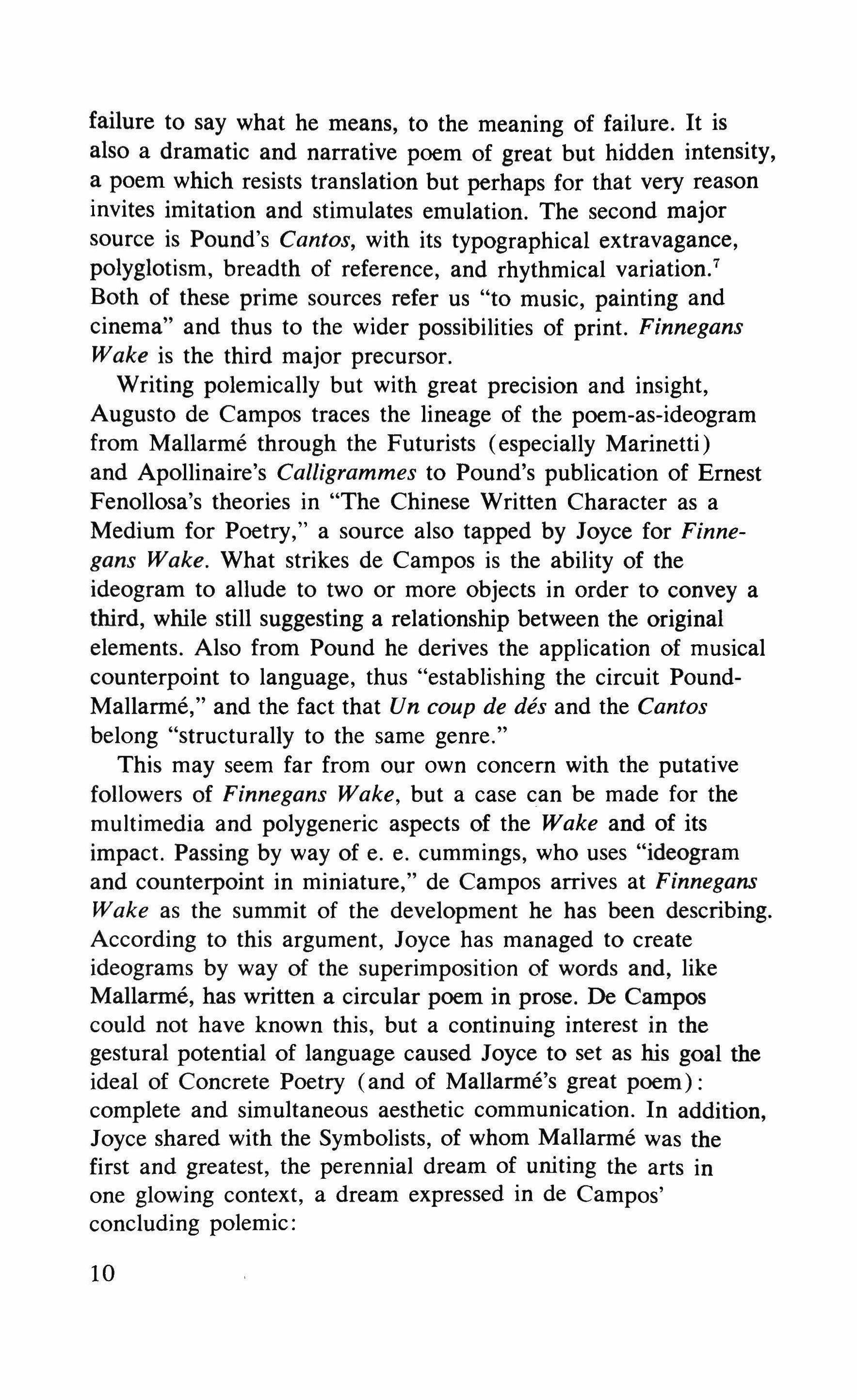
failure to say what he means, to the meaning of failure. It is also a dramatic and narrative poem of great but hidden intensity, a poem which resists translation but perhaps for that very reason invites imitation and stimulates emulation. The second major source is Pound's Cantos, with its typographical extravagance, polyglotism, breadth of reference, and rhythmical variation." Both of these prime sources refer us "to music, painting and cinema" and thus to the wider possibilities of print. Finnegans Wake is the third major precursor.
Writing polemically but with great precision and insight, Augusto de Campos traces the lineage of the poem-as-ideogram from Mallarme through the Futurists (especially Marinetti) and Apollinaire's Calligrammes to Pound's publication of Ernest Fenollosa's theories in "The Chinese Written Character as a Medium for Poetry," a source also tapped by Joyce for Finnegans Wake. What strikes de Campos is the ability of the ideogram to allude to two or more objects in order to convey a third, while still suggesting a relationship between the original elements. Also from Pound he derives the application of musical counterpoint to language, thus "establishing the circuit PoundMallarme," and the fact that Un coup de des and the Cantos belong "structurally to the same genre."
This may seem far from our own concern with the putative followers of Finnegans Wake, but a case can be made for the multimedia and polygeneric aspects of the Wake and of its impact. Passing by way of e. e. cummings, who uses "ideogram and counterpoint in miniature," de Campos arrives at Finnegans Wake as the summit of the development he has been describing. According to this argument, Joyce has managed to create ideograms by way of the superimposition of words and, like Mallarme, has written a circular poem in prose. De Campos could not have known this, but a continuing interest in the gestural potential of language caused Joyce to set as his goal the ideal of Concrete Poetry (and of Mallarme's great poem): complete and simultaneous aesthetic communication. In addition, Joyce shared with the Symbolists, of whom Mallarme was the first and greatest, the perennial dream of uniting the arts in one glowing context, a dream expressed in de Campos' concluding polemic:
10
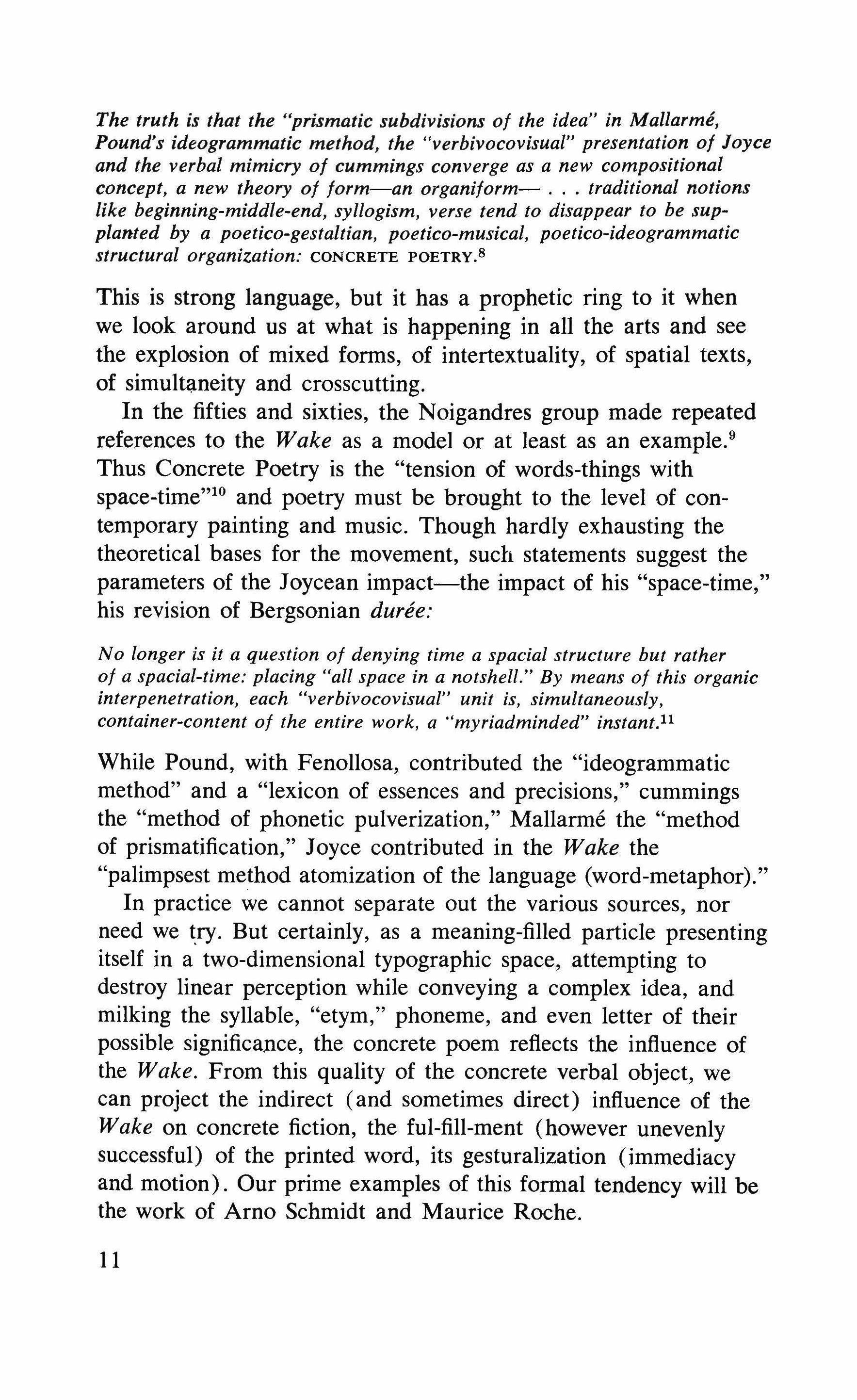
The truth is that the "prismatic subdivisions of the idea" in Mallarme, Pound's ideogrammatic method, the "verbivocovisual" presentation of Joyce and the verbal mimicry of cummings converge as a new compositional concept, a new theory of form-an organiiorm=- traditional notions like beginning-middle-end, syllogism, verse tend to disappear to be supplanted by a poetico-gestaltian, poetico-musical, poetico-ideogrammatic structural organization: CONCRETE POETRY.S
This is strong language, but it has a prophetic ring to it when we look around us at what is happening in all the arts and see the explosion of mixed forms, of intertextuality, of spatial texts, of simultaneity and crosscutting.
In the fifties and sixties, the Noigandres group made repeated references to the Wake as a model or at least as an example." Thus Concrete Poetry is the "tension of words-things with space-rime'?" and poetry must be brought to the level of contemporary painting and music. Though hardly exhausting the theoretical bases for the movement, such statements suggest the parameters of the Joycean impact-the impact of his "space-time," his revision of Bergsonian duree:
No longer is it a question of denying time a spacial structure but rather of a spacial-time: placing "all space in a notshell:" By means of this organic interpenetration, each "verbivocovisual" unit is, simultaneously, container-content of the entire work, a "myriadminded" instantJ+
While Pound, with Fenollosa, contributed the "ideogrammatic method" and a "lexicon of essences and precisions," cummings the "method of phonetic pulverization," Mallarme the "method of prismatification," Joyce contributed in the Wake the "palimpsest method atomization of the language (word-metaphor)."
In practice we cannot separate out the various sources, nor need we try. But certainly, as a meaning-filled particle presenting itself in a two-dimensional typographic space, attempting to destroy linear perception while conveying a complex idea, and milking the syllable, "etym," phoneme, and even letter of their possible significance, the concrete poem reflects the influence of the Wake. From this quality of the concrete verbal object, we can project the indirect (and sometimes direct) influence of the Wake on concrete fiction, the ful-fill-ment (however unevenly successful) of the printed word, its gesturalization (immediacy and motion). Our prime examples of this formal tendency will be the work of Arno Schmidt and Maurice Roche.
11
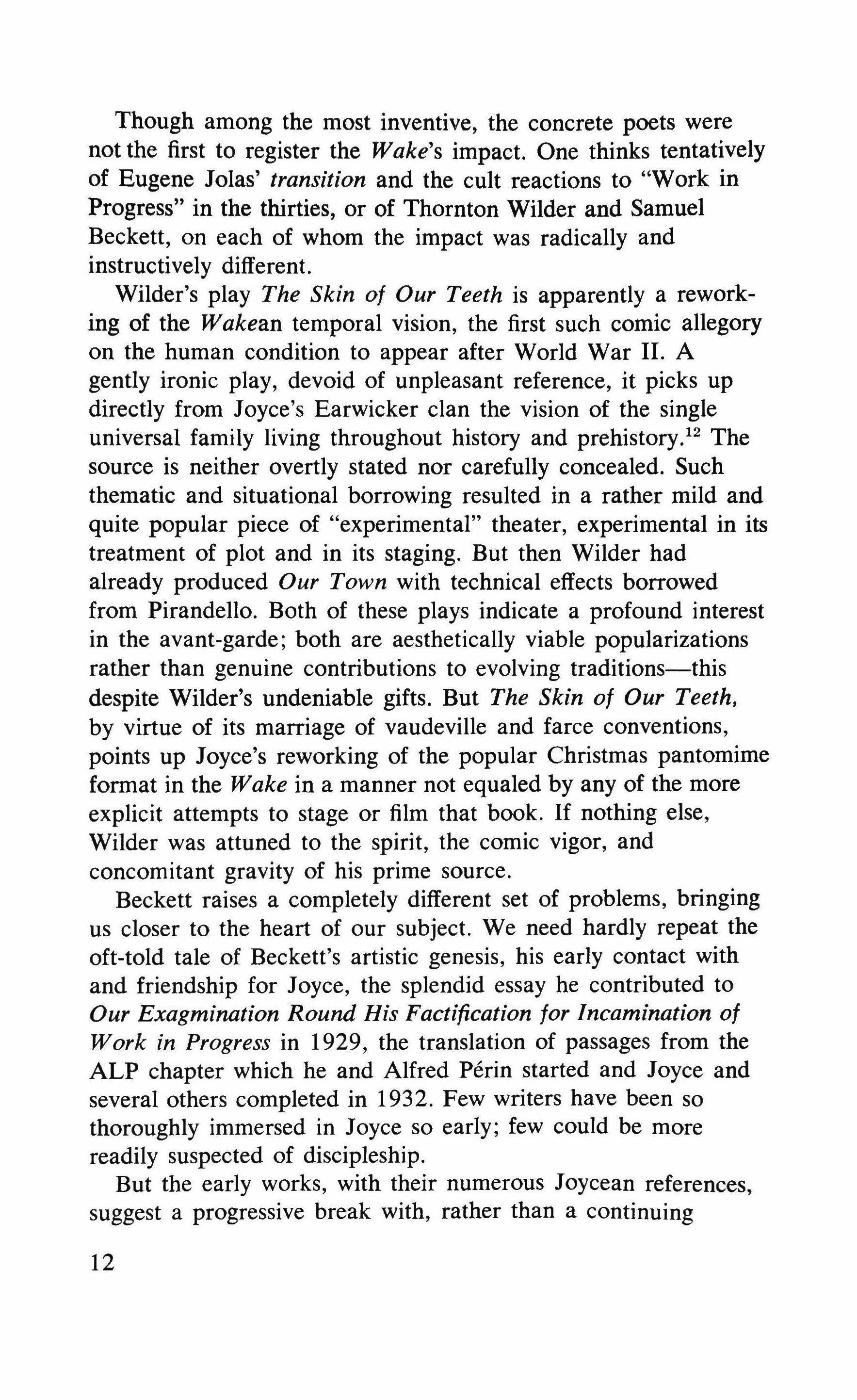
Though among the most inventive, the concrete poets were not the first to register the Wake's impact. One thinks tentatively of Eugene Jolas' transition and the cult reactions to "Work in Progress" in the thirties, or of Thornton Wilder and Samuel Beckett, on each of whom the impact was radically and instructively different.
Wilder's play The Skin of Our Teeth is apparently a reworking of the Wakean temporal vision, the first such comic allegory on the human condition to appear after World War II. A gently ironic play, devoid of unpleasant reference, it picks up directly from Joyce's Earwicker clan the vision of the single universal family living throughout history and prehistory.12 The source is neither overtly stated nor carefully concealed. Such thematic and situational borrowing resulted in a rather mild and quite popular piece of "experimental" theater, experimental in its treatment of plot and in its staging. But then Wilder had already produced Our Town with technical effects borrowed from Pirandello. Both of these plays indicate a profound interest in the avant-garde; both are aesthetically viable popularizations rather than genuine contributions to evolving traditions-this despite Wilder's undeniable gifts. But The Skin of Our Teeth, by virtue of its marriage of vaudeville and farce conventions, points up Joyce's reworking of the popular Christmas pantomime format in the Wake in a manner not equaled by any of the more explicit attempts to stage or film that book. If nothing else, Wilder was attuned to the spirit, the comic vigor, and concomitant gravity of his prime source.
Beckett raises a completely different set of problems, bringing us closer to the heart of our subject. We need hardly repeat the oft-told tale of Beckett's artistic genesis, his early contact with and friendship for Joyce, the splendid essay he contributed to Our Exagmination Round His Factification for Incamination 0/ Work in Progress in 1929, the translation of passages from the ALP chapter which he and Alfred Perin started and Joyce and several others completed in 1932. Few writers have been so thoroughly immersed in Joyce so early; few could be more readily suspected of discipleship.
But the early works, with their numerous Joycean references, suggest a progressive break with, rather than a continuing
12
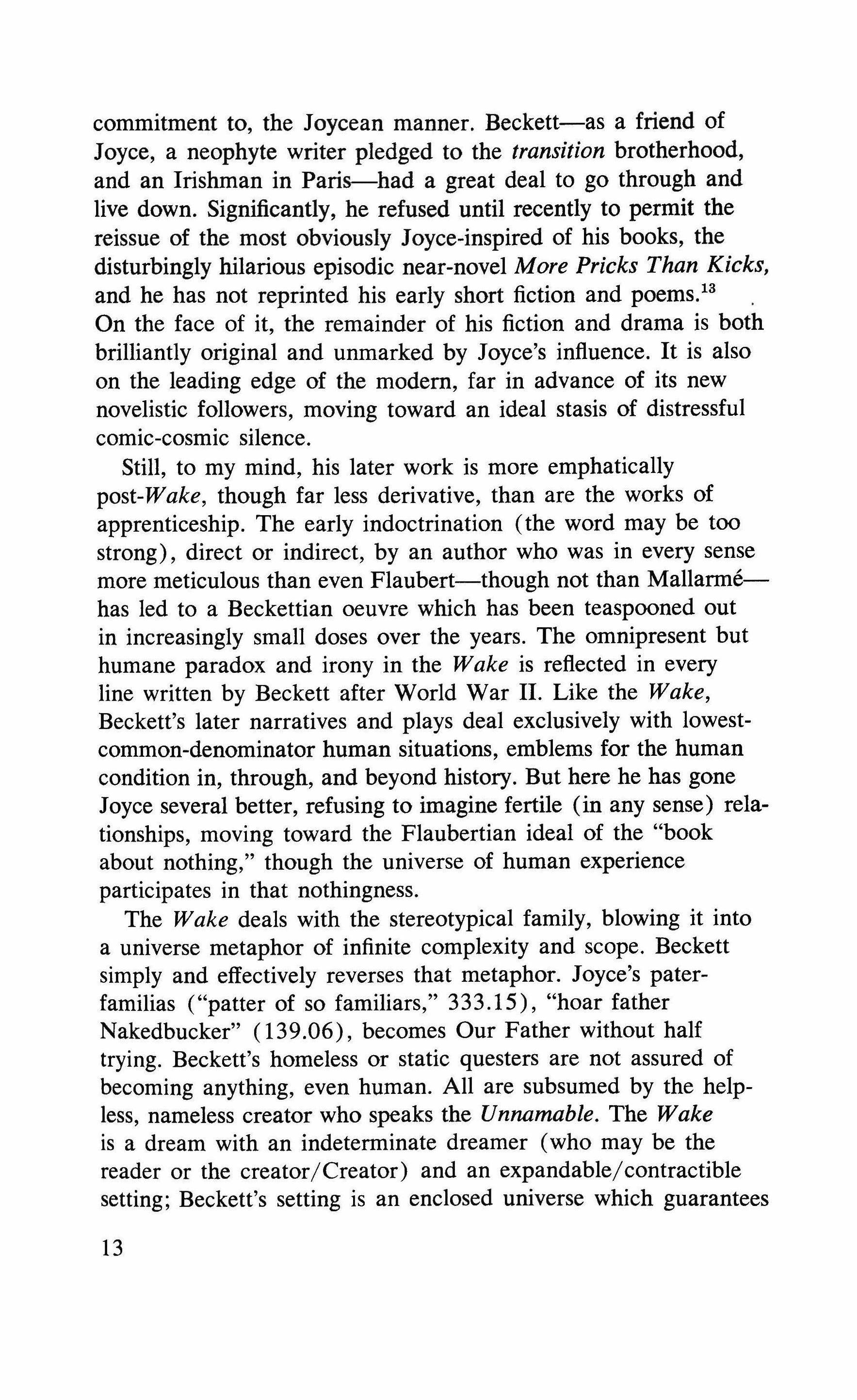
commitment to, the Joycean manner. Beckett-as a friend of Joyce, a neophyte writer pledged to the transition brotherhood, and an Irishman in Paris-had a great deal to go through and live down. Significantly, he refused until recently to permit the reissue of the most obviously Joyce-inspired of his books, the disturbingly hilarious episodic near-novel More Pricks Than Kicks, and he has not reprinted his early short fiction and poems." On the face of it, the remainder of his fiction and drama is both brilliantly original and unmarked by Joyce's influence. It is also on the leading edge of the modern, far in advance of its new novelistic followers, moving toward an ideal stasis of distressful comic-cosmic silence.
Still, to my mind, his later work is more emphatically post-Wake, though far less derivative, than are the works of apprenticeship. The early indoctrination (the word may be too strong), direct or indirect, by an author who was in every sense more meticulous than even Flaubert-though not than Mallarme-shas led to a Beckettian oeuvre which has been teaspooned out in increasingly small doses over the years. The omnipresent but humane paradox and irony in the Wake is reflected in every line written by Beckett after World War II. Like the Wake, Beckett's later narratives and plays deal exclusively with lowestcommon-denominator human situations, emblems for the human condition in, through, and beyond history. But here he has gone Joyce several better, refusing to imagine fertile (in any sense) relationships, moving toward the Flaubertian ideal of the "book about nothing," though the universe of human experience participates in that nothingness.
The Wake deals with the stereotypical family, blowing it into a universe metaphor of infinite complexity and scope. Beckett simply and effectively reverses that metaphor. Joyce's paterfamilias ("patter of so familiars," 333 .15 ), "hoar father Nakedbucker" (139.06), becomes Our Father without half trying. Beckett's homeless or static questers are not assured of becoming anything, even human. All are subsumed by the helpless, nameless creator who speaks the Unnamable. The Wake is a dream with an indeterminate dreamer (who may be the reader or the creator/Creator) and an expandable/contractible setting; Beckett's setting is an enclosed universe which guarantees
13
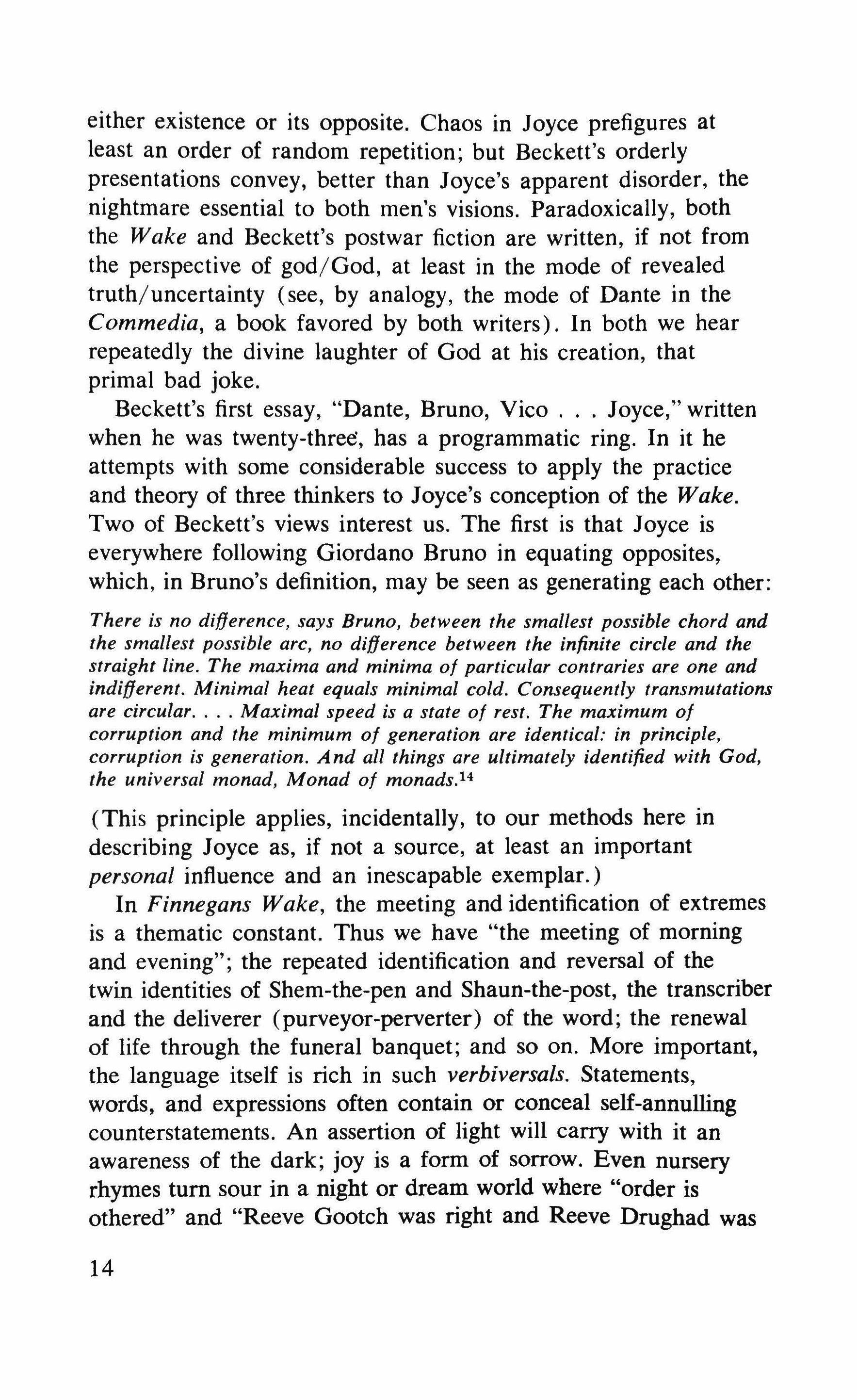
either existence or its opposite. Chaos in Joyce prefigures at least an order of random repetition; but Beckett's orderly presentations convey, better than Joyce's apparent disorder, the nightmare essential to both men's visions. Paradoxically, both the Wake and Beckett's postwar fiction are written, if not from the perspective of god/God, at least in the mode of revealed truth/uncertainty (see, by analogy, the mode of Dante in the Commedia, a book favored by both writers). In both we hear repeatedly the divine laughter of God at his creation, that primal bad joke.
Beckett's first essay, "Dante, Bruno, Vico Joyce," written when he was twenty-three, has a programmatic ring. In it he attempts with some considerable success to apply the practice and theory of three thinkers to Joyce's conception of the Wake. Two of Beckett's views interest us. The first is that Joyce is everywhere following Giordano Bruno in equating opposites, which, in Bruno's definition, may be seen as generating each other:
There is no difference, says Bruno, between the smallest possible chord and the smallest possible are, no difference between the infinite circle and the straight line. The maxima and minima of particular contraries are one and indifferent. Minimal heat equals minimal cold. Consequently transmutations are circular Maximal speed is a state of rest. The maximum of corruption and the minimum of generation are identical: in principle, corruption is generation. And all things are ultimately identified with God, the universal monad, Monad of monads.n
(This principle applies, incidentally, to our methods here in describing Joyce as, if not a source, at least an important personal influence and an inescapable exemplar.)
In Finnegans Wake, the meeting and identification of extremes is a thematic constant. Thus we have "the meeting of morning and evening"; the repeated identification and reversal of the twin identities of Shem-the-pen and Shaun-the-post, the transcriber and the deliverer (purveyor-perverter) of the word; the renewal of life through the funeral banquet; and so on. More important, the language itself is rich in such verbiversals. Statements, words, and expressions often contain or conceal self-annulling counterstatements. An assertion of light will carry with it an awareness of the dark; joy is a form of sorrow. Even nursery rhymes turn sour in a night or dream world where "order is othered" and "Reeve Gootch was right and Reeve Drughad was
14
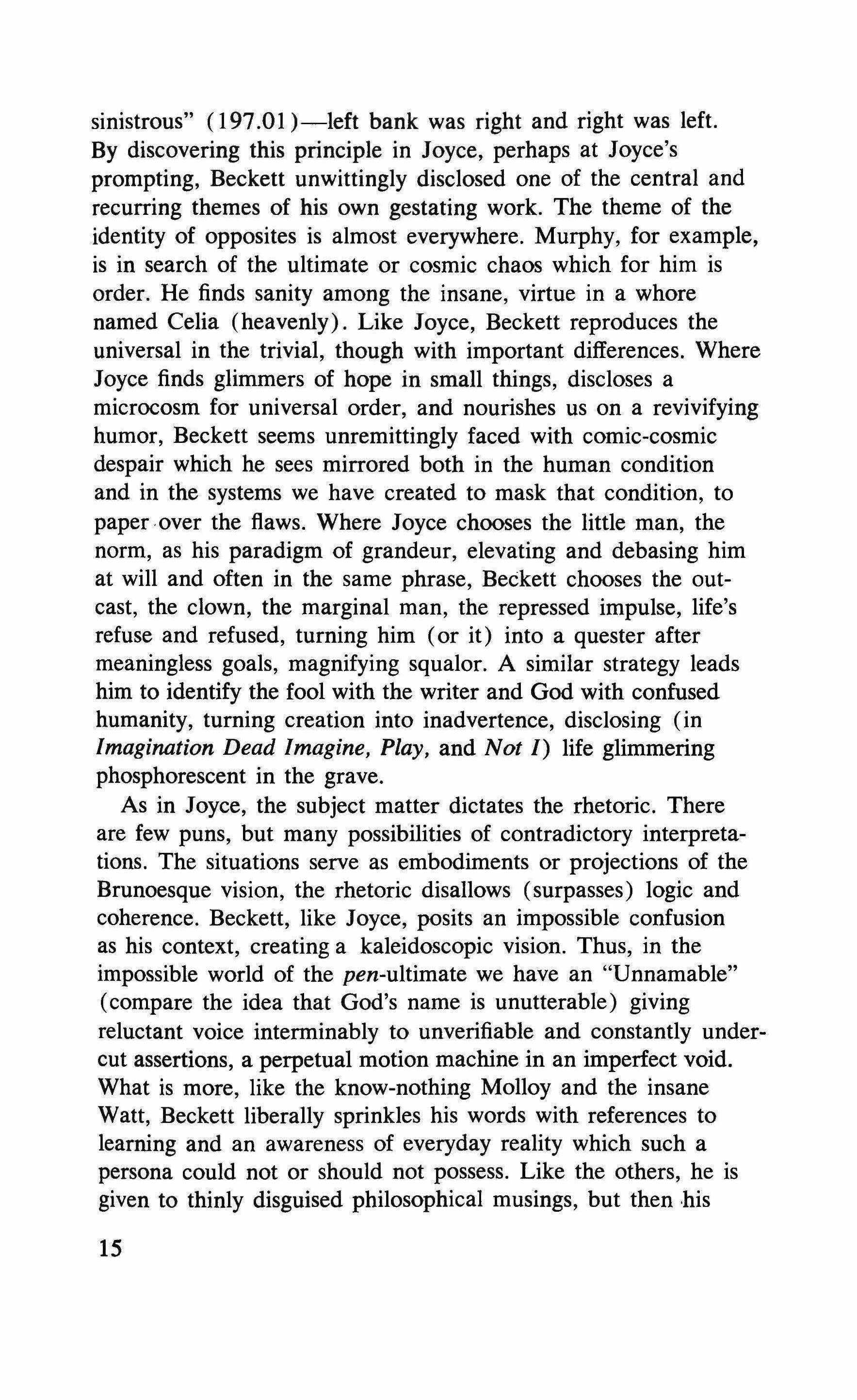
sinistrous" (197.01 )-left bank was right and right was left. By discovering this principle in Joyce, perhaps at Joyce's prompting, Beckett unwittingly disclosed one of the central and recurring themes of his own gestating work. The theme of the identity of opposites is almost everywhere. Murphy, for example, is in search of the ultimate or cosmic chaos which for him is order. He finds sanity among the insane, virtue in a whore named Celia (heavenly). Like Joyce, Beckett reproduces the universal in the trivial, though with important differences. Where Joyce finds glimmers of hope in small things, discloses a microcosm for universal order, and nourishes us on a revivifying humor, Beckett seems unremittingly faced with comic-cosmic despair which he sees mirrored both in the human condition and in the systems we have created to mask that condition, to paper -over the flaws. Where Joyce chooses the little man, the norm, as his paradigm of grandeur, elevating and debasing him at will and often in the same phrase, Beckett chooses the outcast, the clown, the marginal man, the repressed impulse, life's refuse and refused, turning him (or it) into a quester after meaningless goals, magnifying squalor. A similar strategy leads him to identify the fool with the writer and God with confused humanity, turning creation into inadvertence, disclosing (in Imagination Dead Imagine, Play, and Not 1) life glimmering phosphorescent in the grave.
As in Joyce, the subject matter dictates the rhetoric. There are few puns, but many possibilities of contradictory interpretations. The situations serve as embodiments or projections of the Brunoesque vision, the rhetoric disallows (surpasses) logic and coherence. Beckett, like Joyce, posits an impossible confusion as his context, creating a kaleidoscopic vision. Thus, in the impossible world of the pen-ultimate we have an "Unnamable" (compare the idea that God's name is unutterable) giving reluctant voice interminably to unverifiable and constantly undercut assertions, a perpetual motion machine in an imperfect void. What is more, like the know-nothing Molloy and the insane Watt, Beckett liberally sprinkles his words with references to learning and an awareness of everyday reality which such a persona could not or should not possess. Like the others, he is given to thinly disguised philosophical musings, but then his
15
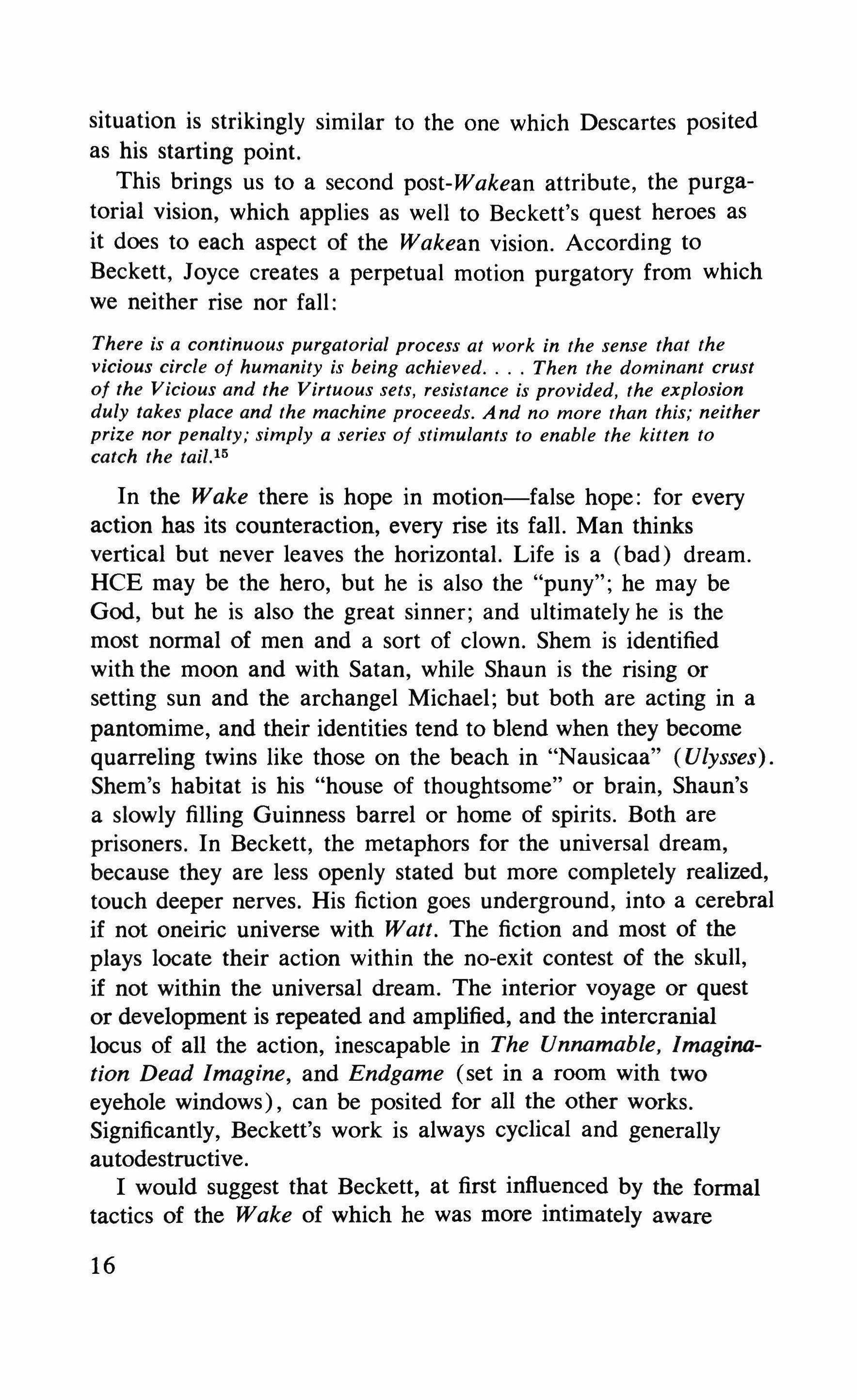
situation is strikingly similar to the one which Descartes posited as his starting point.
This brings us to a second post-Wakean attribute, the purgatorial vision, which applies as well to Beckett's quest heroes as it does to each aspect of the Wakean vision. According to Beckett, Joyce creates a perpetual motion purgatory from which we neither rise nor fall:
There is a continuous purgatorial process at work in the sense that the vicious circle of humanity is being achieved Then the dominant crust of the Vicious and the Virtuous sets, resistance is provided, the explosion duly takes place and the machine proceeds. And no more than this; neither prize nor penalty; simply a series of stimulants to enable the kitten to catch the tail.lll
In the Wake there is hope in motion-false hope: for every action has its counteraction, every rise its fall. Man thinks vertical but never leaves the horizontal. Life is a (bad) dream. HCE may be the hero, but he is also the "puny"; he may be God, but he is also the great sinner; and ultimately he is the most normal of men and a sort of clown. Shem is identified with the moon and with Satan, while Shaun is the rising or setting sun and the archangel Michael; but both are acting in a pantomime, and their identities tend to blend when they become quarreling twins like those on the beach in "Nausicaa" (U/ysses) Shem's habitat is his "house of thoughtsome" or brain, Shaun's a slowly filling Guinness barrel or home of spirits. Both are prisoners. In Beckett, the metaphors for the universal dream, because they are less openly stated but more completely realized, touch deeper nerves. His fiction goes underground, into a cerebral if not oneiric universe with Watt. The fiction and most of the plays locate their action within the no-exit contest of the skull, if not within the universal dream. The interior voyage or quest or development is repeated and amplified, and the intercranial locus of all the action, inescapable in The Unnamable, Imagination Dead Imagine, and Endgame (set in a room with two eyehole windows), can be posited for all the other works. Significantly, Beckett's work is always cyclical and generally autodestructive.
I would suggest that Beckett, at first influenced by the formal tactics of the Wake of which he was more intimately aware
16
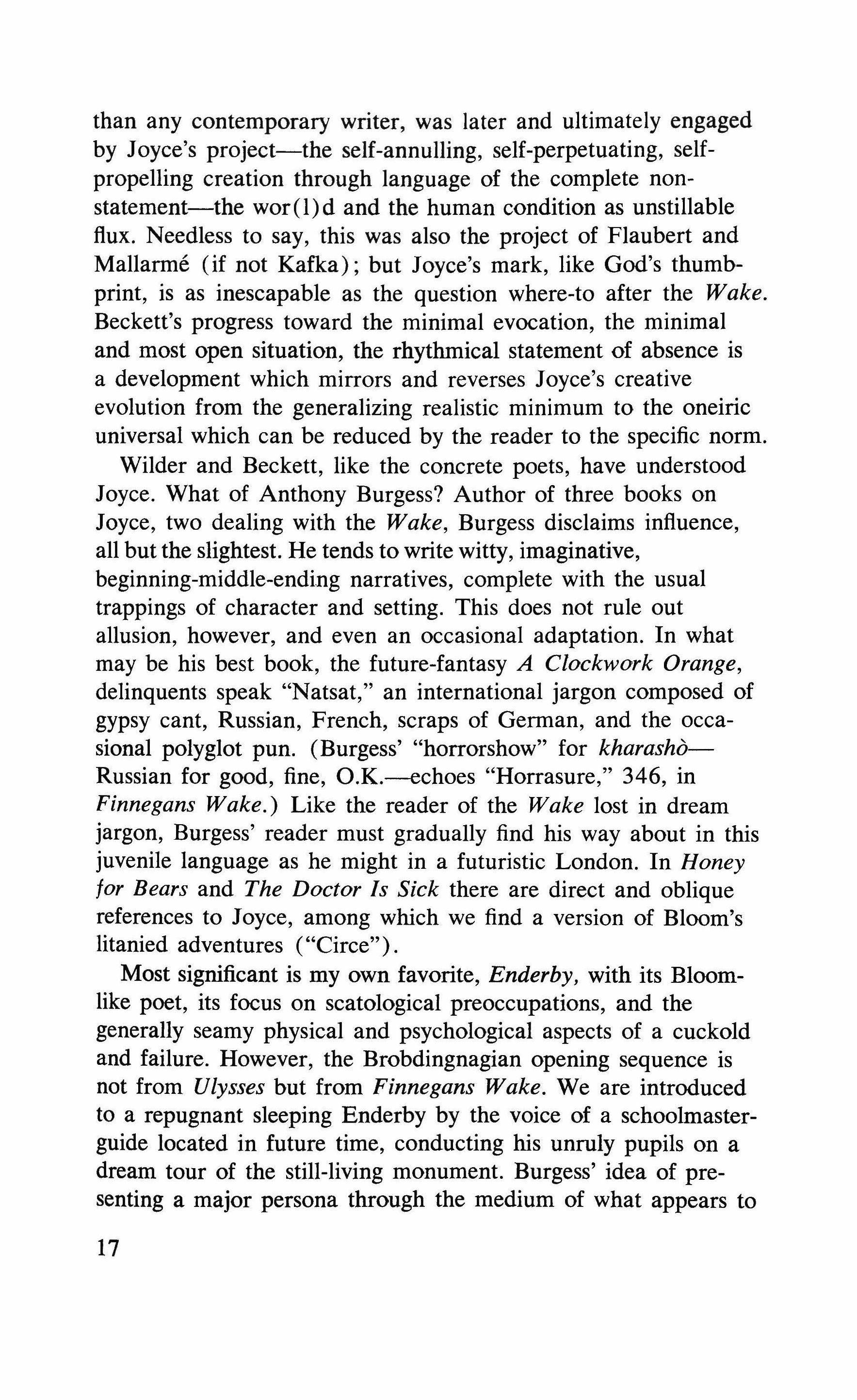
than any contemporary writer, was later and ultimately engaged by Joyce's project-the self-annulling, self-perpetuating, selfpropelling creation through language of the complete nonstatement-the wor(l)d and the human condition as unstillable flux. Needless to say, this was also the project of Flaubert and Mallarme (if not Kafka); but Joyce's mark, like God's thumbprint, is as inescapable as the question where-to after the Wake. Beckett's progress toward the minimal evocation, the minimal and most open situation, the rhythmical statement of absence is a development which mirrors and reverses Joyce's creative evolution from the generalizing realistic minimum to the oneiric universal which can be reduced by the reader to the specific norm.
Wilder and Beckett, like the concrete poets, have understood Joyce. What of Anthony Burgess? Author of three books on Joyce, two dealing with the Wake, Burgess disclaims influence, all but the slightest. He tends to write witty, imaginative, beginning-middle-ending narratives, complete with the usual trappings of character and setting. This does not rule out allusion, however, and even an occasional adaptation. In what may be his best book, the future-fantasy A Clockwork Orange, delinquents speak "Natsat," an international jargon composed of gypsy cant, Russian, French, scraps of German, and the occasional polyglot pun. (Burgess' "horrorshow" for kharasho=Russian for good, fine, O.K.--echoes "Horrasure," 346, in Finnegans Wake.) Like the reader of the Wake lost in dream jargon, Burgess' reader must gradually find his way about in this juvenile language as he might in a futuristic London. In Honey for Bears and The Doctor Is Sick there are direct and oblique references to Joyce, among which we find a version of Bloom's litanied adventures ("Circe").
Most significant is my own favorite, Enderby, with its Bloomlike poet, its focus on scatological preoccupations, and the generally seamy physical and psychological aspects of a cuckold and failure. However, the Brobdingnagian opening sequence is not from Ulysses but from Finnegans Wake. We are introduced to a repugnant sleeping Enderby by the voice of a schoolmasterguide located in future time, conducting his unruly pupils on a dream tour of the still-living monument. Burgess' idea of presenting a major persona through the medium of what appears to 17
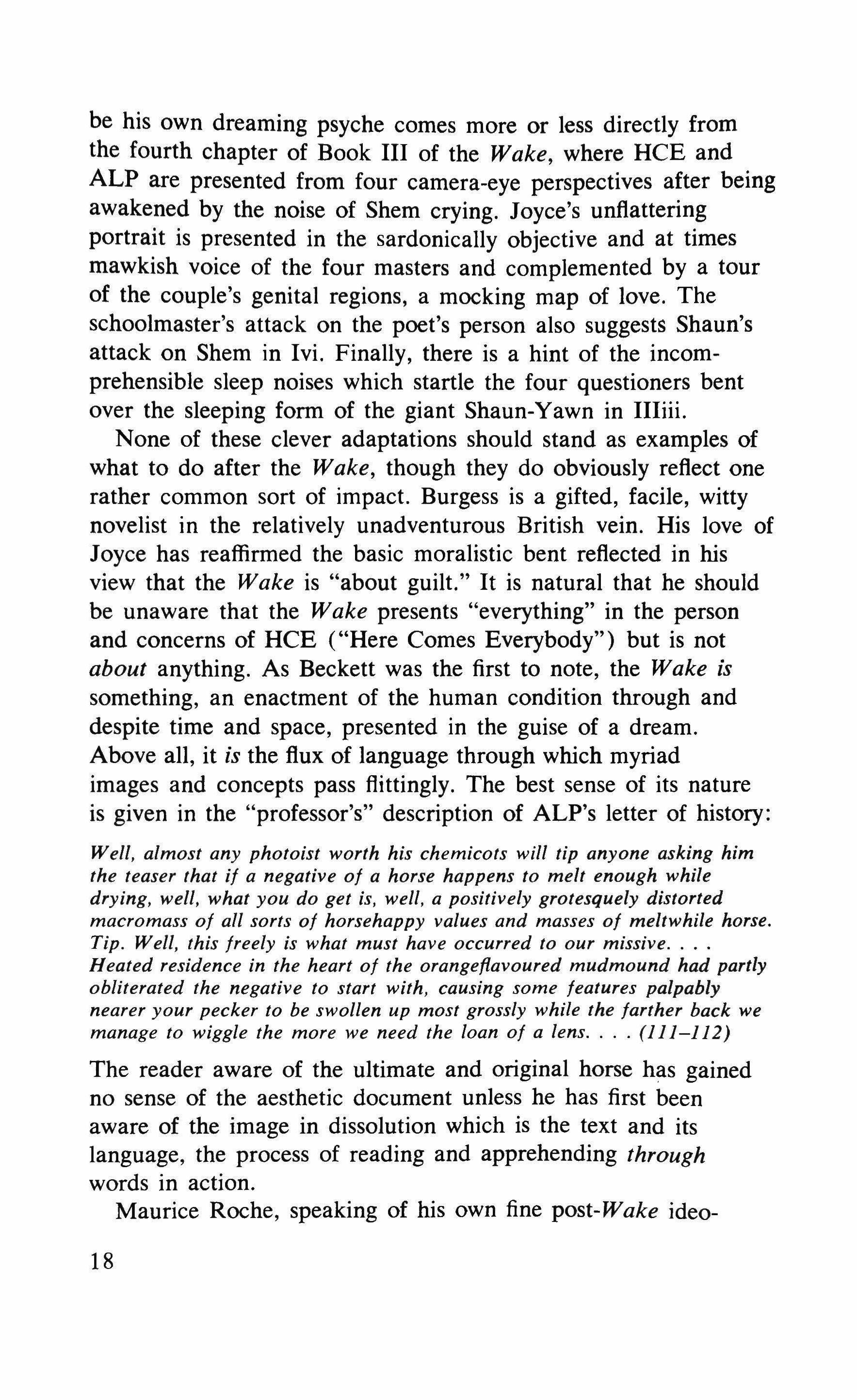
be his own dreaming psyche comes more or less directly from the fourth chapter of Book III of the Wake, where HCE and ALP are presented from four camera-eye perspectives after being awakened by the noise of Shem crying. Joyce's unflattering portrait is presented in the sardonically objective and at times mawkish voice of the four masters and complemented by a tour of the couple's genital regions, a mocking map of love. The schoolmaster's attack on the poet's person also suggests Shaun's attack on Shem in Ivi. Finally, there is a hint of the incomprehensible sleep noises which startle the four questioners bent over the sleeping form of the giant Shaun-Yawn in IlIiii.
None of these clever adaptations should stand as examples of what to do after the Wake, though they do obviously reflect one rather common sort of impact. Burgess is a gifted, facile, witty novelist in the relatively unadventurous British vein. His love of Joyce has reaffirmed the basic moralistic bent reflected in his view that the Wake is "about guilt." It is natural that he should be unaware that the Wake presents "everything" in the person and concerns of HCE ("Here Comes Everybody") but is not about anything. As Beckett was the first to note, the Wake is something, an enactment of the human condition through and despite time and space, presented in the guise of a dream. Above all, it is the flux of language through which myriad images and concepts pass flittingly. The best sense of its nature is given in the "professor's" description of ALP's letter of history: Well, almost any photoist worth his chemicots will tip anyone asking him the teaser that if a negative of a horse happens to melt enough while drying, well, what you do get is, well, a positively grotesquely distorted macromass of all sorts of horsehappy values and masses of meltwhile horse. Tip. Well, this freely is what must have occurred to our missive Heated residence in the heart of the orangeflavoured mudmound had partly obliterated the negative to start with, causing some features palpably nearer your peeker to be swollen up most grossly while the farther back we manage to wiggle the more we need the loan of a lens (111-112)
The reader aware of the ultimate and original horse has gained no sense of the aesthetic document unless he has first been aware of the image in dissolution which is the text and its language, the process of reading and apprehending through words in action.
Maurice Roche, speaking of his own fine post-Wake ideo-
18
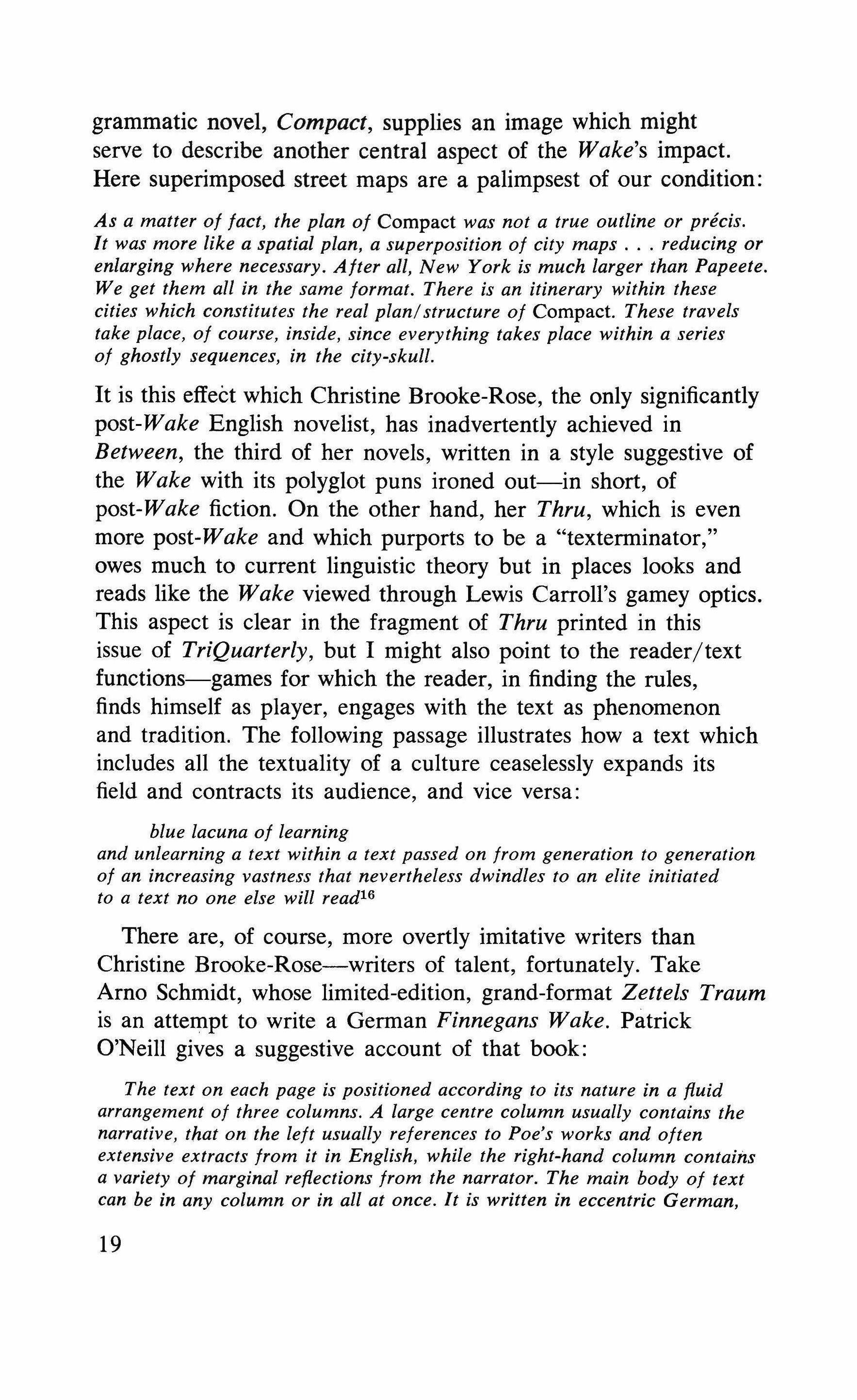
grammatic novel, Compact, supplies an image which might serve to describe another central aspect of the Wake's impact. Here superimposed street maps are a palimpsest of our condition:
As a matter of fact, the plan of Compact was not a true outline or precis. It was more like a spatial plan, a superposition of city maps reducing or enlarging where necessary. After all, New York is much larger than Papeete. We get them all in the same format. There is an itinerary within these cities which constitutes the real plan!structure of Compact. These travels take place, of course, inside, since everything takes place within a series of ghostly sequences, in the city-skull.
It is this effect which Christine Brooke-Rose, the only significantly post-Wake English novelist, has inadvertently achieved in Between, the third of her novels, written in a style suggestive of the Wake with its polyglot puns ironed out-in short, of post-Wake fiction. On the other hand, her Thru, which is even more post-Wake and which purports to be a "texterminator," owes much to current linguistic theory but in places looks and reads like the Wake viewed through Lewis Carroll's gamey optics. This aspect is clear in the fragment of Thru printed in this issue of TriQuarterly, but I might also point to the reader/text functions-games for which the reader, in finding the rules, finds himself as player, engages with the text as phenomenon and tradition. The following passage illustrates how a text which includes all the textuality of a culture ceaselessly expands its field and contracts its audience, and vice versa:
blue lacuna of learning and unlearning a text within a text passed on from generation to generation of an increasing vastness that nevertheless dwindles to an elite initiated to a text no one else will read's
There are, of course, more overtly imitative writers than Christine Brooke-Rose-writers of talent, fortunately. Take Arno Schmidt, whose limited-edition, grand-format Zettels Traum is an attempt to write a German Finnegans Wake. Patrick O'Neill gives a suggestive account of that book:
The text on each page is positioned according to its nature in a fluid arrangement of three columns. A large centre column usually contains the narrative, that on the left usually references to Poe's works and often extensive extracts from it in English, while the right-hand column contains a variety of marginal reflections from the narrator. The main body of text can be in any column or in all at once. It is written in eccentric German,
19
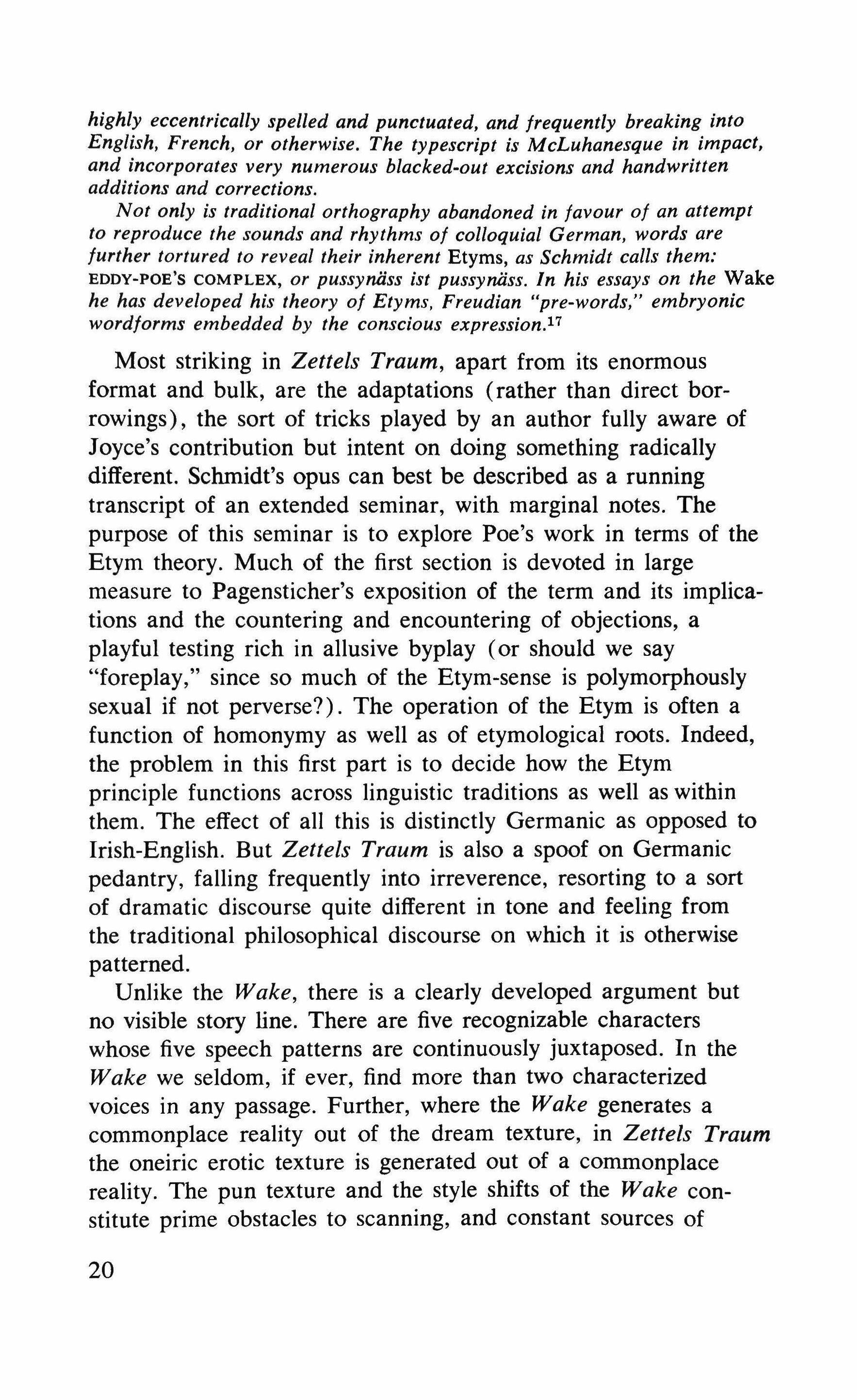
highly eccentrically spelled and punctuated, and frequently breaking into English, French, or otherwise. The typescript is McLuhanesque in impact, and incorporates very numerous blacked-out excisions and handwritten additions and corrections.
Not only is traditional orthography abandoned in favour of an attempt to reproduce the sounds and rhythms of colloquial German, words are further tortured to reveal their inherent Etyms, as Schmidt calls them: EDDY-POE'S COMPLEX, or pussyndss ist pussyndss. In his essays on the Wake he has developed his theory of Etyms, Freudian "pre-words," embryonic wordjorms embedded by the conscious expression.V'
Most striking in Zettels Traum, apart from its enormous format and bulk, are the adaptations (rather than direct borrowings), the sort of tricks played by an author fully aware of Joyce's contribution but intent on doing something radically different. Schmidt's opus can best be described as a running transcript of an extended seminar, with marginal notes. The purpose of this seminar is to explore Poe's work in terms of the Etym theory. Much of the first section is devoted in large measure to Pagensticher's exposition of the term and its implications and the countering and encountering of objections, a playful testing rich in allusive byplay (or should we say "foreplay," since so much of the Etym-sense is polymorphously sexual if not perverse?). The operation of the Etym is often a function of homonymy as well as of etymological roots. Indeed, the problem in this first part is to decide how the Etym principle functions across linguistic traditions as well as within them. The effect of all this is distinctly Germanic as opposed to Irish-English. But Zettels Traum is also a spoof on Germanic pedantry, falling frequently into irreverence, resorting to a sort of dramatic discourse quite different in tone and feeling from the traditional philosophical discourse on which it is otherwise patterned.
Unlike the Wake, there is a clearly developed argument but no visible story line. There are five recognizable characters whose five speech patterns are continuously juxtaposed. In the Wake we seldom, if ever, find more than two characterized voices in any passage. Further, where the Wake generates a commonplace reality out of the dream texture, in Zettels Traum the oneiric erotic texture is generated out of a commonplace reality. The pun texture and the style shifts of the Wake constitute prime obstacles to scanning, and constant sources of
20

reader participation and delight. In Schmidt's text, which resembles nothing so much as an MS draft of passages from Finnegans Wake, the notation functions both as clarification and as obfuscation. We are overwhelmed by an array of punctuation, of whimsical spacing and spelling, of allusive devices: in short of editorial gesticulation. It is this notation which enables the text to record words and gestures of participants along with the asides of an implied editor. But paradoxically these words and gestures, replete with in-jokes and allusions, are an obstacle to full understanding and a challenge to the reader. Further, since the whole text is presented as though told by an outside observer, we are obliged to fill in blanks in the thought processes as we might in real conversation.
Like the Wake, the reading/text becomes an extraordinary lived experience, an encounter with language. Unlike the Wake, however, Zettels Traum insists upon explaining and examining its premises. Written in dialogue, it has its dramatic component, but the drama, so far as I can judge, is not expressive in the aesthetic sense of conveying an organically coherent emotional circumstance or development. The reader is asked to participate in an enormously attenuated human situation, which despite its psychological content, and because of its length and complexity, resembles the flat surface rediscovered earlier in this century by artists like Fernand Leger. Schmidt's book insists upon itself as a work-in-progress, a concept enforced by the mode of presentation of the "traumscript" (see the term Joyce coined to describe ALP's famous letter). By contrast, Finnegans Wake presents itself as a finished text and only gradually reveals to the reader how much of the making is still to be accomplished. Again, Zettels Traum alludes to many texts but draws its substance from texts by Poe and Schmidt himself, divagates upon them. Although Finnegans Wake alludes to many other texts, it proposes as its focus the emblematic and absent letter, whose manufacture and delivery constitute the tale of the text which is also the text of the tale-the letter being finally identical with the uttered Wake.
Then there is the emphasis on synchrony, at the expense of diachronic or linear development. The page is only one aspect of this. Its three columns function, as do effects in novels by
21
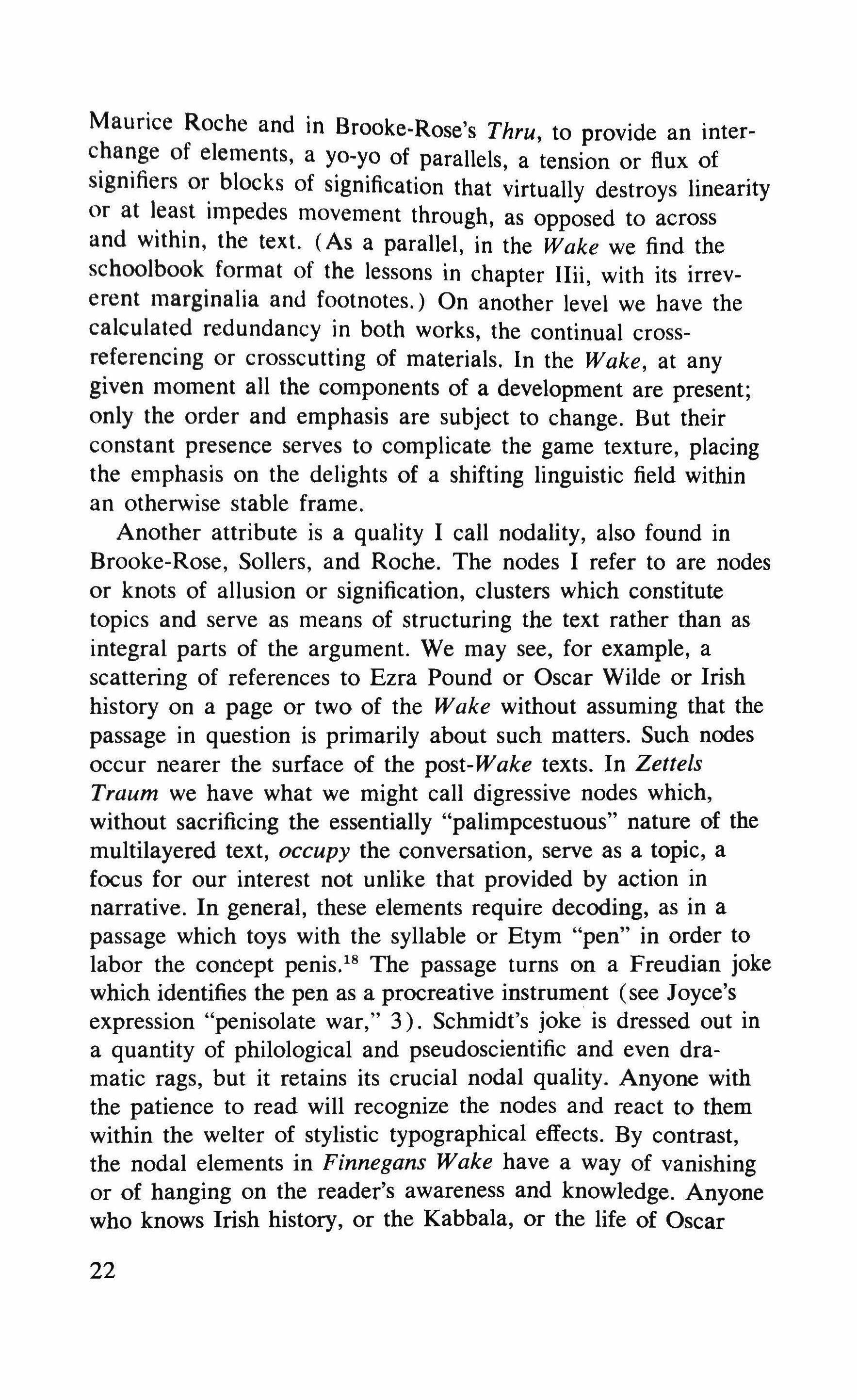
Maurice Roche and in Brooke-Rose's Thru, to provide an interchange of elements, a yo-yo of parallels a tension or flux of signifiers or blocks of signification that virtually destroys linearity or at l�a�t impedes movement through, as opposed to across and within, the text. (As a parallel, in the Wake we find the schoolbook format of the lessons in chapter IIii, with its irreverent marginalia and footnotes.) On another level we have the calculated redundancy in both works, the continual crossreferencing or crosscutting of materials. In the Wake, at any given moment all the components of a development are present; only the order and emphasis are subject to change. But their constant presence serves to complicate the game texture, placing the emphasis on the delights of a shifting linguistic field within an otherwise stable frame.
Another attribute is a quality I call nodality, also found in Brooke-Rose, Sollers, and Roche. The nodes I refer to are nodes or knots of allusion or signification, clusters which constitute topics and serve as means of structuring the text rather than as integral parts of the argument. We may see, for example, a scattering of references to Ezra Pound or Oscar Wilde or Irish history on a page or two of the Wake without assuming that the passage in question is primarily about such matters. Such nodes occur nearer the surface of the post-Wake texts. In Zettels Traum we have what we might call digressive nodes which, without sacrificing the essentially "palimpcestuous" nature of the multilayered text, occupy the conversation, serve as a topic, a focus for our interest not unlike that provided by action in narrative. In general, these elements require decoding, as in a passage which toys with the syllable or Etym "pen" in order to labor the concept penis." The passage turns on a Freudian joke which identifies the pen as a procreative instrument (see Joyce's expression "penisolate war," 3). Schmidt's joke is dressed out in a quantity of philological and pseudoscientific and even dramatic rags, but it retains its crucial nodal quality. Anyone with the patience to read will recognize the nodes and react to them within the welter of stylistic typographical effects. By contrast, the nodal elements in Finnegans Wake have a way of vanishing or of hanging on the reader's awareness and knowledge. Anyone who knows Irish history, or the Kabbala, or the life of Oscar
22
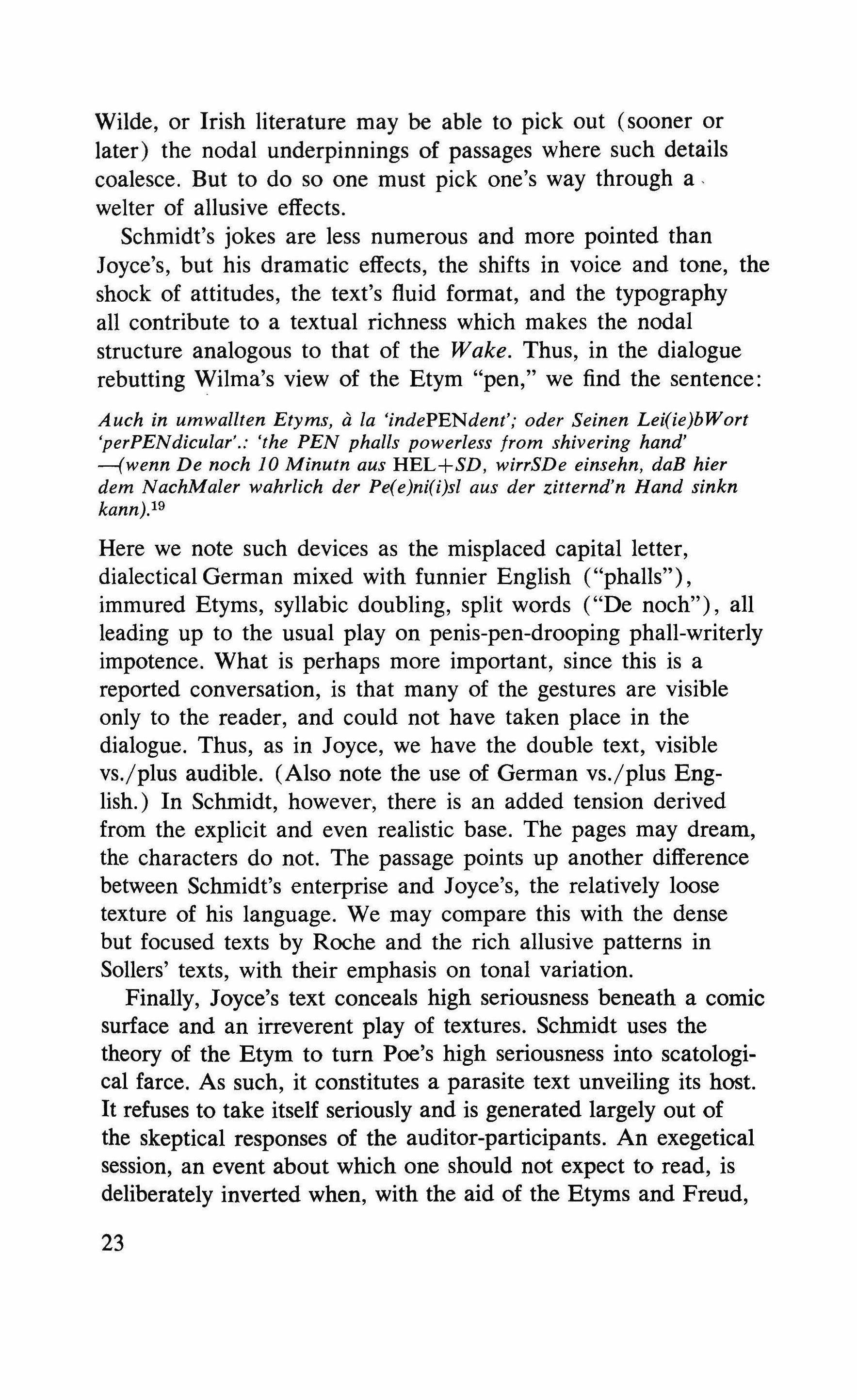
Wilde, or Irish literature may be able to pick out (sooner or later) the nodal underpinnings of passages where such details coalesce. But to do so one must pick one's way through a, welter of allusive effects.
Schmidt's jokes are less numerous and more pointed than Joyce's, but his dramatic effects, the shifts in voice and tone, the shock of attitudes, the text's fluid format, and the typography all contribute to a textual richness which makes the nodal structure analogous to that of the Wake. Thus, in the dialogue rebutting Wilma's view of the Etym "pen," we find the sentence:
Auch in umwallten Etyms, a la 'indePENdent'; oder Seinen Lei(ie)bWort 'perPENdicular'.: 'the PEN phalls powerless from shivering hand' -{wenn De noch 10 Minutn aus HEL+SD, wirrSDe einsehn, daB hier dem NachMaler wahrlich der Pe(e)ni(i)sl aus der zitternd'n Hand sinkn kann),19
Here we note such devices as the misplaced capital letter, dialectical German mixed with funnier English ("phalls"), immured Etyms, syllabic doubling, split words ("De noch"), all leading up to the usual play on penis-pen-drooping phall-writerly impotence. What is perhaps more important, since this is a reported conversation, is that many of the gestures are visible only to the reader, and could not have taken place in the dialogue. Thus, as in Joyce, we have the double text, visible vs./plus audible. (Also note the use of German vs./plus English.) In Schmidt, however, there is an added tension derived from the explicit and even realistic base. The pages may dream, the characters do not. The passage points up another difference between Schmidt's enterprise and Joyce's, the relatively loose texture of his language. We may compare this with the dense but focused texts by Roche and the rich allusive patterns in Sollers' texts, with their emphasis on tonal variation.
Finally, Joyce's text conceals high seriousness beneath a comic surface and an irreverent play of textures. Schmidt uses the theory of the Etym to turn Poe's high seriousness into scatological farce. As such, it constitutes a parasite text unveiling its host. It refuses to take itself seriously and is generated largely out of the skeptical responses of the auditor-participants. An exegetical session, an event about which one should not expect to read, is deliberately inverted when, with the aid of the Etyms and Freud,
23
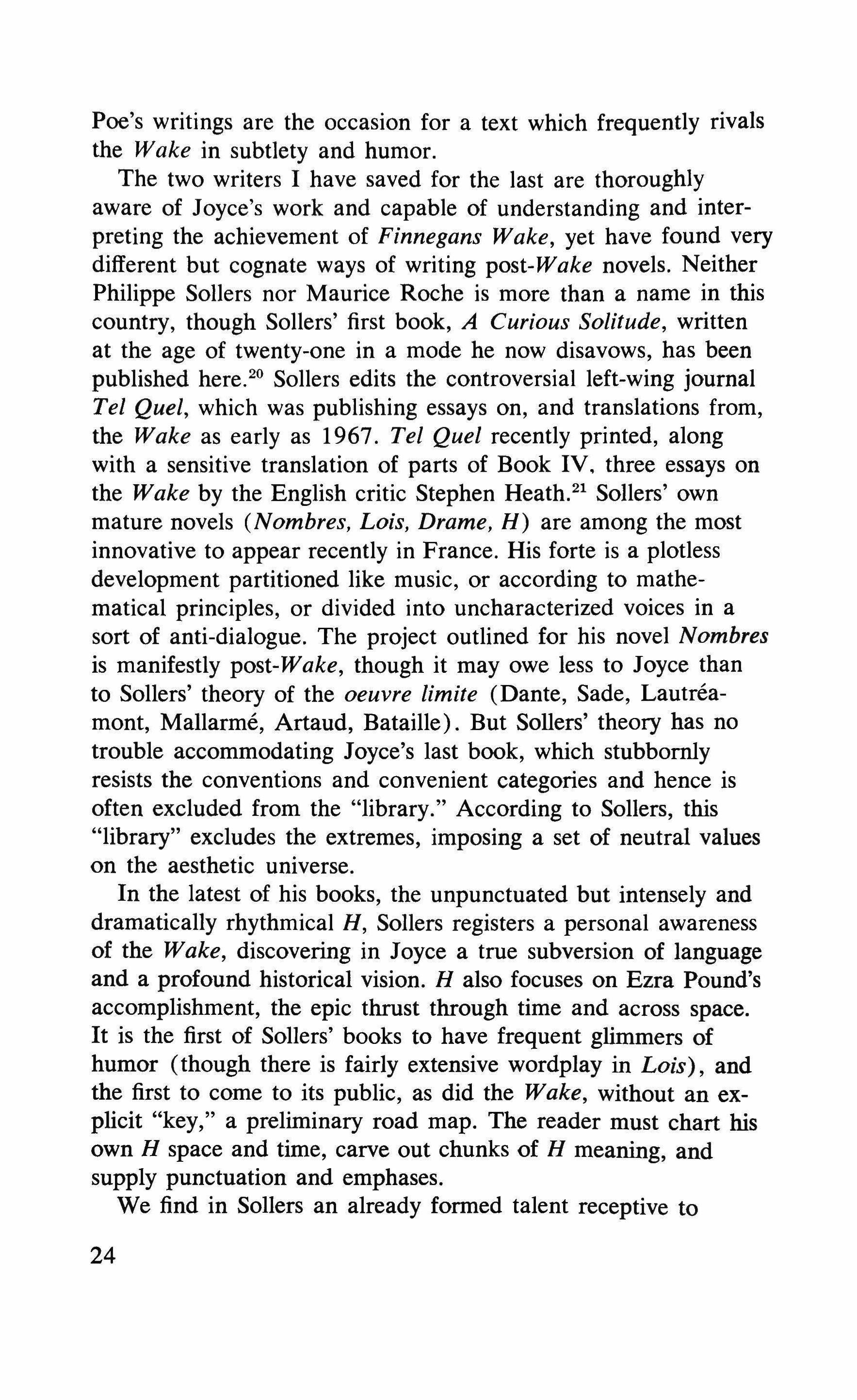
Poe's writings are the occasion for a text which frequently rivals the Wake in subtlety and humor.
The two writers I have saved for the last are thoroughly aware of Joyce's work and capable of understanding and interpreting the achievement of Finnegans Wake, yet have found very different but cognate ways of writing post-Wake novels. Neither Philippe Sollers nor Maurice Roche is more than a name in this country, though Sollers' first book, A Curious Solitude, written at the age of twenty-one in a mode he now disavows, has been published here." Sollers edits the controversial left-wing journal Tel Quel, which was publishing essays on, and translations from, the Wake as early as 1967. Tel Quel recently printed, along with a sensitive translation of parts of Book IV. three essays on the Wake by the English critic Stephen Heath." Sollers' own mature novels (Nombres, Lois, Drame, H) are among the most innovative to appear recently in France. His forte is a plotless development partitioned like music, or according to mathematical principles, or divided into uncharacterized voices in a sort of anti-dialogue. The project outlined for his novel Nombres is manifestly post-Wake, though it may owe less to Joyce than to Sollers' theory of the oeuvre limite (Dante, Sade, Lautreamont, Mallarme, Artaud, Bataille). But Sollers' theory has no trouble accommodating Joyce's last book, which stubbornly resists the conventions and convenient categories and hence is often excluded from the "library." According to Sollers, this "library" excludes the extremes, imposing a set of neutral values on the aesthetic universe.
In the latest of his books, the unpunctuated but intensely and dramatically rhythmical H, Sollers registers a personal awareness of the Wake, discovering in Joyce a true subversion of language and a profound historical vision. H also focuses on Ezra Pound's accomplishment, the epic thrust through time and across space. It is the first of Sollers' books to have frequent glimmers of humor (though there is fairly extensive wordplay in Lois), and the first to come to its public, as did the Wake, without an explicit "key," a preliminary road map. The reader must chart his own H space and time, carve out chunks of H meaning, and supply punctuation and emphases.
We find in Sollers an already formed talent receptive to
24
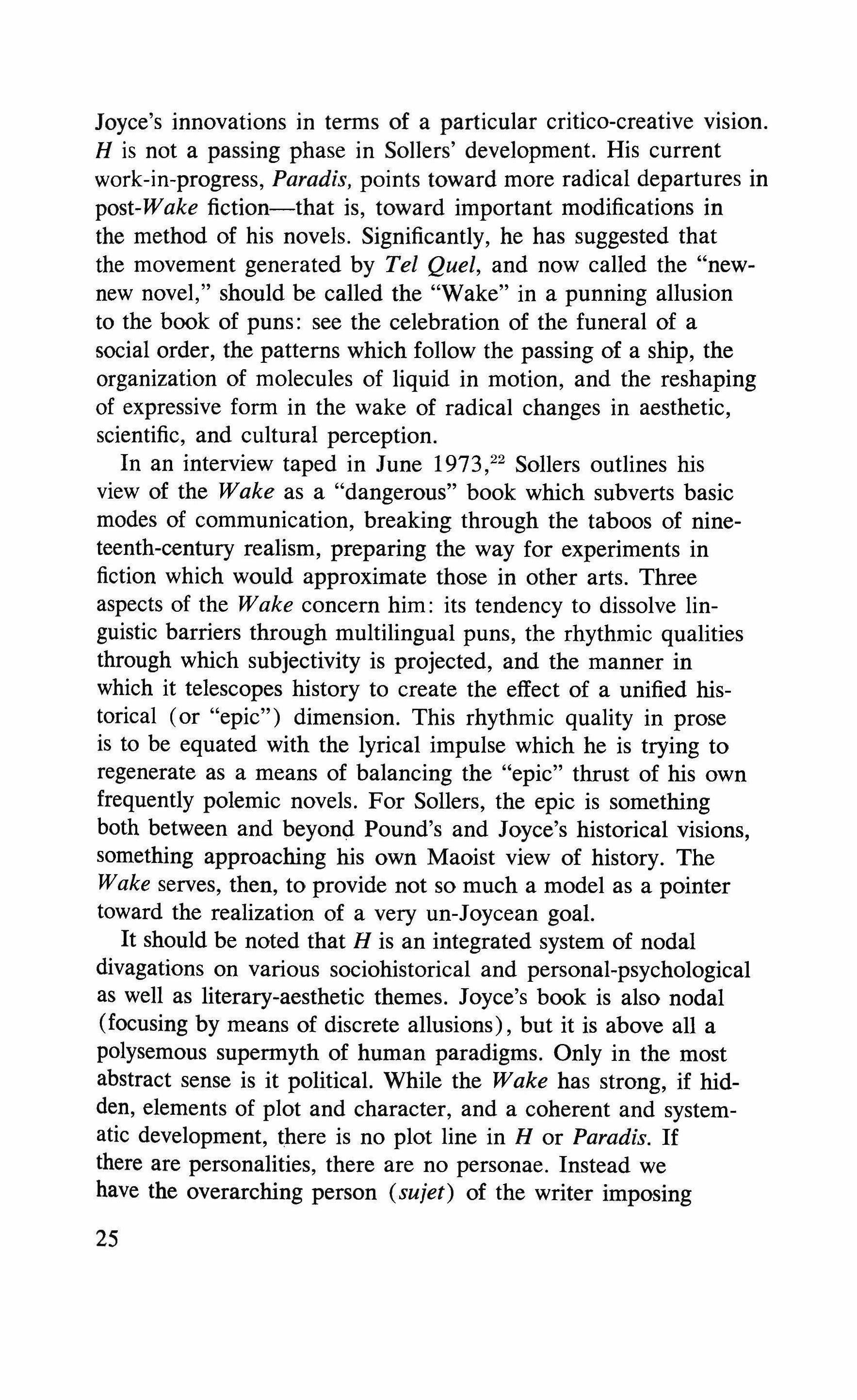
Joyce's innovations in terms of a particular critico-creative vision. H is not a passing phase in Sollers' development. His current work-in-progress, Paradis, points toward more radical departures in post-Wake fiction-that is, toward important modifications in the method of his novels. Significantly, he has suggested that the movement generated by Tel Quel, and now called the "newnew novel," should be called the "Wake" in a punning allusion to the book of puns: see the celebration of the funeral of a social order, the patterns which follow the passing of a ship, the organization of molecules of liquid in motion, and the reshaping of expressive form in the wake of radical changes in aesthetic, scientific, and cultural perception.
In an interview taped in June 1973,22 Sollers outlines his view of the Wake as a "dangerous" book which subverts basic modes of communication, breaking through the taboos of nineteenth-century realism, preparing the way for experiments in fiction which would approximate those in other arts. Three aspects of the Wake concern him: its tendency to dissolve linguistic barriers through multilingual puns, the rhythmic qualities through which subjectivity is projected, and the manner in which it telescopes history to create the effect of a unified historical (or "epic") dimension. This rhythmic quality in prose is to be equated with the lyrical impulse which he is trying to regenerate as a means of balancing the "epic" thrust of his own frequently polemic novels. For Sollers, the epic is something both between and beyond Pound's and Joyce's historical visions, something approaching his own Maoist view of history. The Wake serves, then, to provide not so much a model as a pointer toward the realization of a very un-Joycean goal.
It should be noted that H is an integrated system of nodal divagations on various sociohistorical and personal-psychological as well as literary-aesthetic themes. Joyce's book is also nodal (focusing by means of discrete allusions), but it is above all a polysemous supermyth of human paradigms. Only in the most abstract sense is it political. While the Wake has strong, if hidden, elements of plot and character, and a coherent and systematic development, there is no plot line in H or Paradis. If there are personalities, there are no personae. Instead we have the overarching person (sujet) of the writer imposing
25
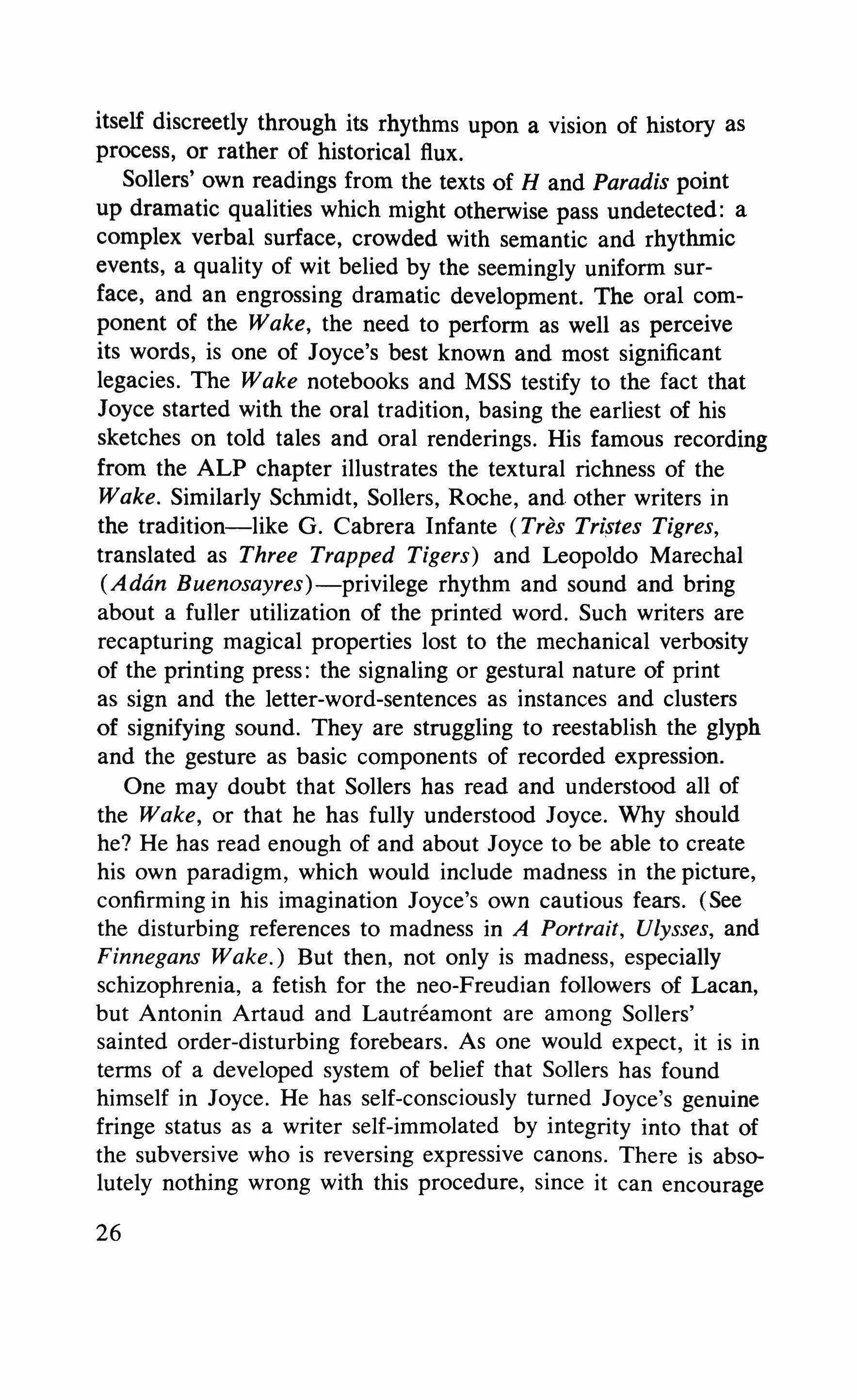
itself discreetly through its rhythms upon a vision of history as process, or rather of historical flux.
Sollers' own readings from the texts of H and Paradis point up dramatic qualities which might otherwise pass undetected: a complex verbal surface, crowded with semantic and rhythmic events, a quality of wit belied by the seemingly uniform surface, and an engrossing dramatic development. The oral component of the Wake, the need to perform as well as perceive its words, is one of Joyce's best known and most significant legacies. The Wake notebooks and MSS testify to the fact that Joyce started with the oral tradition, basing the earliest of his sketches on told tales and oral renderings. His famous recording from the ALP chapter illustrates the textural richness of the Wake. Similarly Schmidt, Sollers, Roche, and. other writers in the tradition-like G. Cabrera Infante (Tres Tristes Tigres, translated as Three Trapped Tigers) and Leopoldo Marechal (Adan Buenosayres)-privilege rhythm and sound and bring about a fuller utilization of the printed word. Such writers are recapturing magical properties lost to the mechanical verbosity of the printing press: the signaling or gestural nature of print as sign and the letter-word-sentences as instances and clusters of signifying sound. They are struggling to reestablish the glyph and the gesture as basic components of recorded expression.
One may doubt that Sollers has read and understood all of the Wake, or that he has fully understood Joyce. Why should he? He has read enough of and about Joyce to be able to create his own paradigm, which would include madness in the picture, confirming in his imagination Joyce's own cautious fears. (See the disturbing references to madness in A Portrait, Ulysses, and Finnegans Wake.) But then, not only is madness, especially schizophrenia, a fetish for the neo-Freudian followers of Lacan, but Antonin Artaud and Lautreamont are among Sollers' sainted order-disturbing forebears. As one would expect, it is in terms of a developed system of belief that Sollers has found himself in Joyce. He has self-consciously turned Joyce's genuine fringe status as a writer self-immolated by integrity into that of the subversive who is reversing expressive canons. There is absolutely nothing wrong with this procedure, since it can encourage
26
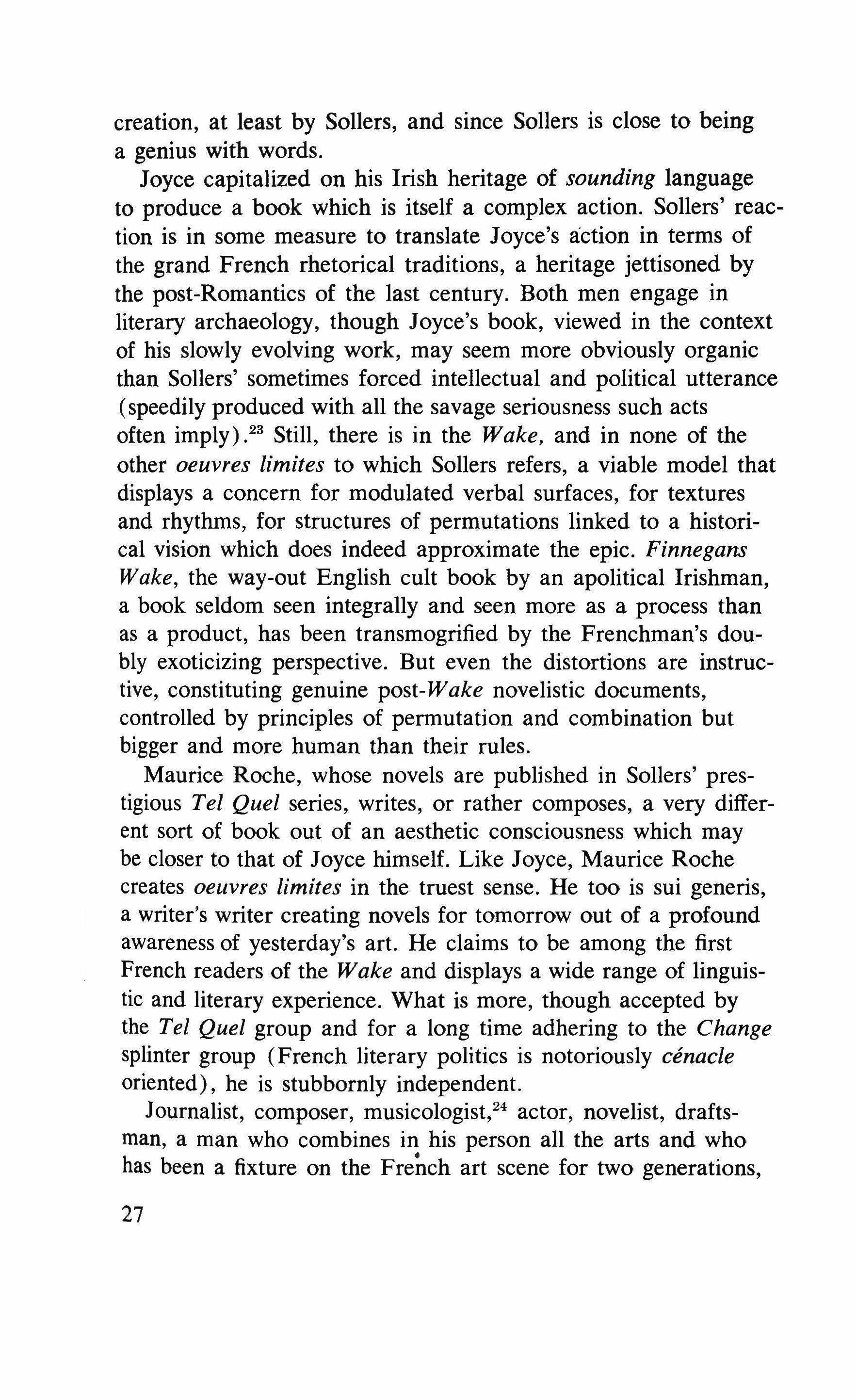
creation, at least by Sollers, and since Sollers is close to being a genius with words.
Joyce capitalized on his Irish heritage of sounding language to produce a book which is itself a complex action. Sollers' reaction is in some measure to translate Joyce's action in terms of the grand French rhetorical traditions, a heritage jettisoned by the post-Romantics of the last century. Both men engage in literary archaeology, though Joyce's book, viewed in the context of his slowly evolving work, may seem more obviously organic than Sollers' sometimes forced intellectual and political utterance (speedily produced with all the savage seriousness such acts often imply).23 Still, there is in the Wake, and in none of the other oeuvres limites to which Sollers refers, a viable model that displays a concern for modulated verbal surfaces, for textures and rhythms, for structures of permutations linked to a historical vision which does indeed approximate the epic. Finnegans Wake, the way-out English cult book by an apolitical Irishman, a book seldom seen integrally and seen more as a process than as a product, has been transmogrified by the Frenchman's doubly exoticizing perspective. But even the distortions are instructive, constituting genuine post - Wake novelistic documents, controlled by principles of permutation and combination but bigger and more human than their rules.
Maurice Roche, whose novels are published in Sollers' prestigious Tel Quel series, writes, or rather composes, a very different sort of book out of an aesthetic consciousness which may be closer to that of Joyce himself. Like Joyce, Maurice Roche creates oeuvres limites in the truest sense. He too is sui generis, a writer's writer creating novels for tomorrow out of a profound awareness of yesterday's art. He claims to be among the first French readers of the Wake and displays a wide range of linguistic and literary experience. What is more, though accepted by the Tel Quel group and for a long time adhering to the Change splinter group (French literary politics is notoriously cenacle oriented), he is stubbornly independent.
Journalist, composer, musicologist," actor, novelist, draftsman, a man who combines in his person all the arts and who has been a fixture on the French art scene for two generations,
27
Maurice Roche defies easy categories. All the more strange, then, that this essay has come full circle. Maurice Roche's typographical extravaganzas, like the still/vibrating type-poems of the Brazilian Noigandres group, can point to Mallarme, Pound, Joyce, and new music for precedents while producing something refreshingly different from Concrete Poetry. Not surprisingly, Haroldo de Campos has contributed an informed essay on Maurice Roche's use of person and tense in Compact to a special issue of Encres Vives,25 but one suspects de Campos would list Roche among the predecessors (metaphorical) rather than the followers of Concrete Poetry.
How to describe the novels of Maurice Roche? Deconstructed narratives, typographical music, extended puns, encyclocitations, systematic disfigurations of the white page, tatouages, machines dissolved in mechanical fluid? Distilled and enriched, these books contain most of Arno Schmidt's devices while seeming far less monomaniacal and retaining an almost classical lightness and control. They are saturae rather than satires, discontinuous melanges of forms and styles joined by the strategy of constant surprise. They are farces regulated by the presenting clown who wears all the masks and bears the text in his person, but for whom language is a bag of tricks, a barrier to "sense," a clown whose statements tend to become cosmic probes and whose gestures are subject to endless inconclusive readings. Like Joyce in Finnegans Wake, like Beckett in the trilogy, like Mallarme in Un coup de des, and like Laurence Sterne in Tristram Shandy, and, yes, like Rabelais, Roche writes brightly of death and the night. His favorite image is the skull with its terrible grin, the clown's totem, on which he rings innumerable changes, inevitably turning it into an anagram for his own name:

His books are all about his books, about pages, about words, about the rich culture in which he swims, on which he feeds. They are also, like Mallarme's poem, about the attempt to fill the void with creative actions, which are, once committed, dead -until the reader reanimates them by the act or gesture of reading. Thus in the beginning of his latest novel, Codex, we read:
28
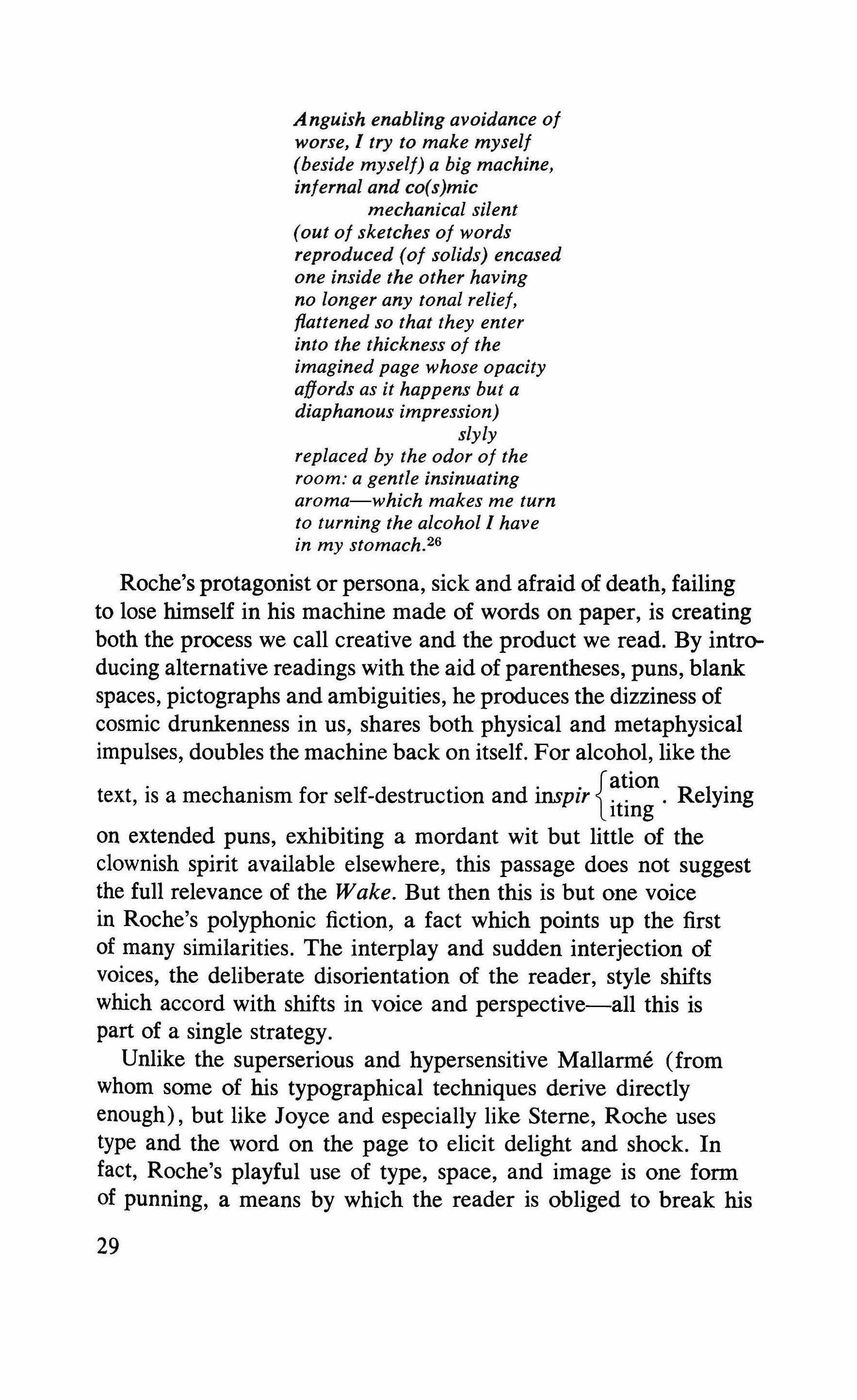
Anguish enabling avoidance of worse, I try to make myself (beside myself) a big machine, infernal and co(s)mic mechanical silent (out of sketches of words reproduced (of solids) encased one inside the other having no longer any tonal relief, flattened so that they enter into the thickness of the imagined page whose opacity affords as it happens but a diaphanous impression) slyly replaced by the odor of the room: a gentle insinuating aroma-which makes me turn to turning the alcohol I have in my stomach.w
Roche's protagonist or persona, sick and afraid of death, failing to lose himself in his machine made of words on paper, is creating both the process we call creative and the product we read. By introducing alternative readings with the aid of parentheses, puns, blank spaces, pictographs and ambiguities, he produces the dizziness of cosmic drunkenness in us, shares both physical and metaphysical impulses, doubles the machine back on itself. For alcohol, like the hani f If d d {ation R I text, IS a mec amsm or se - estruction an uispir iti e ymg 1 mg on extended puns, exhibiting a mordant wit but little of the clownish spirit available elsewhere, this passage does not suggest the full relevance of the Wake. But then this is but one voice in Roche's polyphonic fiction, a fact which points up the first of many similarities. The interplay and sudden interjection of voices, the deliberate disorientation of the reader, style shifts which accord with shifts in voice and perspective-all this is part of a single strategy.
Unlike the superserious and hypersensitive Mallarme (from whom some of his typographical techniques derive directly enough), but like Joyce and especially like Sterne, Roche uses type and the word on the page to elicit delight and shock. In fact, Roche's playful use of type, space, and image is one form of punning, a means by which the reader is obliged to break his
29
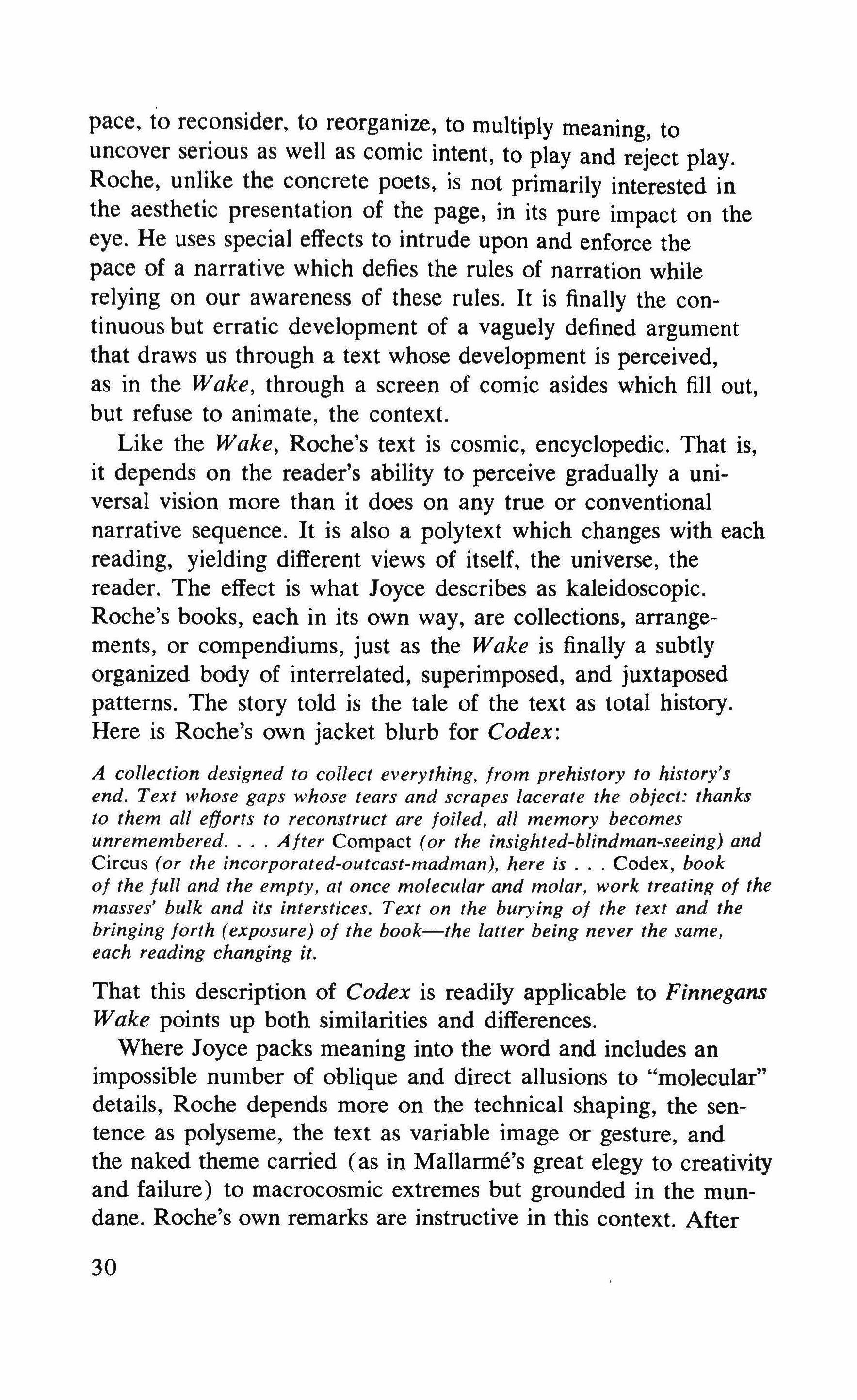
pace, to reconsider, to reorganize, to multiply meaning, to uncover serious as well as comic intent, to play and reject play. Roche, unlike the concrete poets, is not primarily interested in the aesthetic presentation of the page, in its pure impact on the eye. He uses special effects to intrude upon and enforce the pace of a narrative which defies the rules of narration while relying on our awareness of these rules. It is finally the continuous but erratic development of a vaguely defined argument that draws us through a text whose development is perceived, as in the Wake, through a screen of comic asides which fill out, but refuse to animate, the context.
Like the Wake, Roche's text is cosmic, encyclopedic. That is, it depends on the reader's ability to perceive gradually a universal vision more than it does on any true or conventional narrative sequence. It is also a polytext which changes with each reading, yielding different views of itself, the universe, the reader. The effect is what Joyce describes as kaleidoscopic. Roche's books, each in its own way, are collections, arrangements, or compendiums, just as the Wake is finally a subtly organized body of interrelated, superimposed, and juxtaposed patterns. The story told is the tale of the text as total history. Here is Roche's own jacket blurb for Codex:
A collection designed to collect everything, from prehistory to history'S end. Text whose gaps whose tears and scrapes lacerate the object: thanks to them all efforts to reconstruct are foiled, all memory becomes unremembered After Compact (or the insighted-blindman-seeing] and Circus (or the incorporated-outcast-madman), here is Codex, book of the full and the empty, at once molecular and molar, work treating of the masses' bulk and its interstices. Text on the burying of the text and the bringing forth (exposure) of the book-the latter being never the same, each reading changing it.
That this description of Codex is readily applicable to Finnegans Wake points up both similarities and differences.
Where Joyce packs meaning into the word and includes an impossible number of oblique and direct allusions to "molecular" details, Roche depends more on the technical shaping, the sentence as polyseme, the text as variable image or gesture, and the naked theme carried (as in Mallarme's great elegy to creativity and failure) to macrocosmic extremes but grounded in the mundane. Roche's own remarks are instructive in this context. After
30
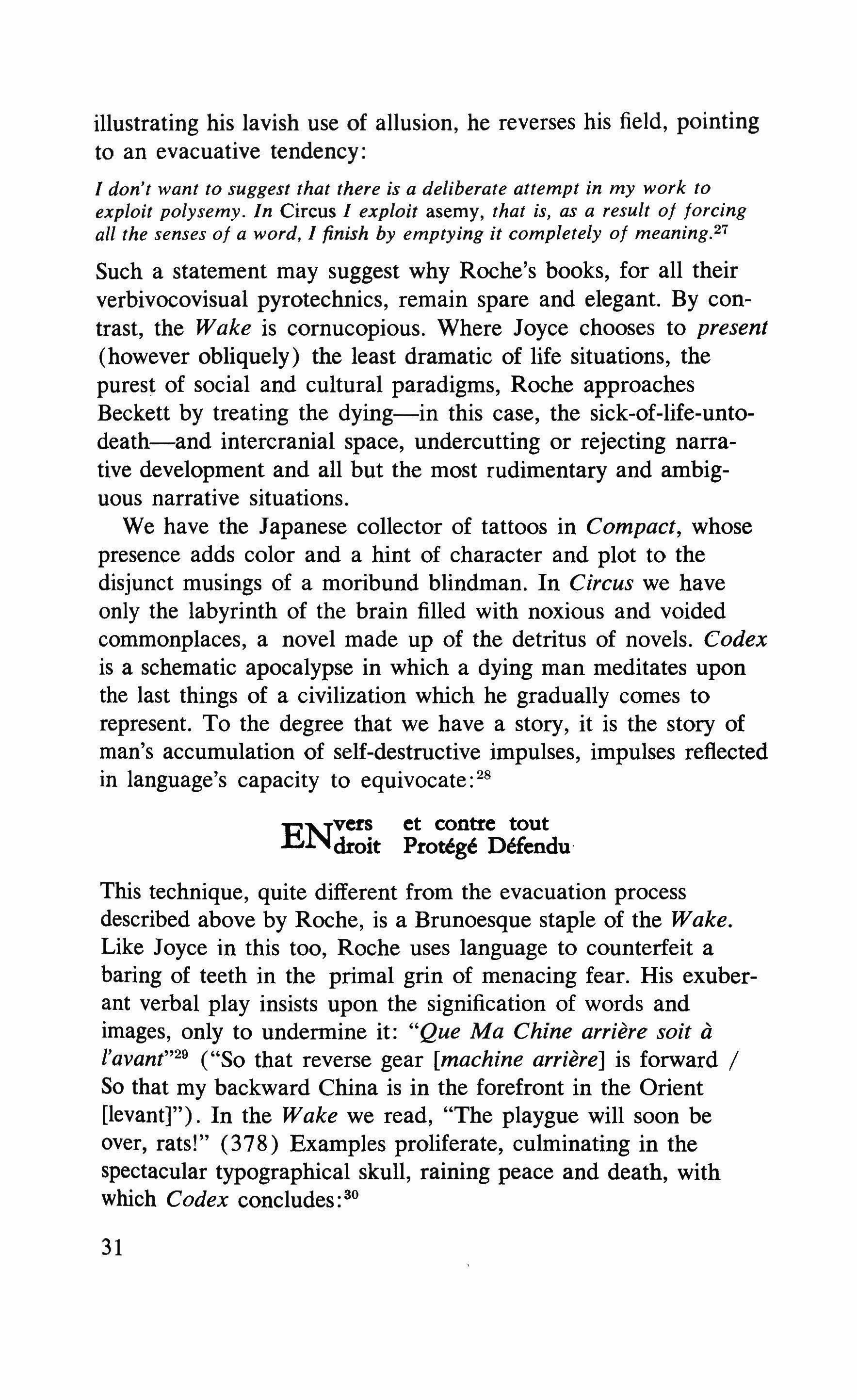
illustrating his lavish use of allusion, he reverses his field, pointing to an evacuative tendency:
I don't want to suggest that there is a deliberate attempt in my work to exploit polysemy. In Circus I exploit asemy, that is, as a result of forcing all the senses of a word, I finish by emptying it completely of meaningFl
Such a statement may suggest why Roche's books, for all their verbivocovisual pyrotechnics, remain spare and elegant. By contrast, the Wake is cornucopious. Where Joyce chooses to present (however obliquely) the least dramatic of life situations, the purest of social and cultural paradigms, Roche approaches Beckett by treating the dying-in this case, the sick-of-life-untodeath-and intercranial space, undercutting or rejecting narrative development and all but the most rudimentary and ambiguous narrative situations.
We have the Japanese collector of tattoos in Compact, whose presence adds color and a hint of character and plot to the disjunct musings of a moribund blindman. In Circus we have only the labyrinth of the brain filled with noxious and voided commonplaces, a novel made up of the detritus of novels. Codex is a schematic apocalypse in which a dying man meditates upon the last things of a civilization which he gradually comes to represent. To the degree that we have a story, it is the story of man's accumulation of self-destructive impulses, impulses reflected in language's capacity to equivocate: 28
ENvers et contre tout droit Protege Defendu
This technique, quite different from the evacuation process described above by Roche, is a Brunoesque staple of the Wake. Like Joyce in this too, Roche uses language to counterfeit a baring of teeth in the primal grin of menacing fear. His exuberant verbal play insists upon the signification of words and images, only to undermine it: "Que Ma Chine arriere soit a l'avanr= ("So that reverse gear [machine arriere] is forward I So that my backward China is in the forefront in the Orient [levant]"). In the Wake we read, "The playgue will soon be over, rats!" (378) Examples proliferate, culminating in the spectacular typographical skull, raining peace and death, with which Codex concludesr"
31

Joyce himself is occasionally cited in Roche's books (as he is in those of Schmidt and Sollers). Thus we find the following reference to Molly Bloom's final affirmation buried in the sadoreligious context of the bitterly comic funeral "CANTATE" of Codex: 81
32
LA, CRIME 6 SADE - DIS: « YES -
« I said yes I will yes ))
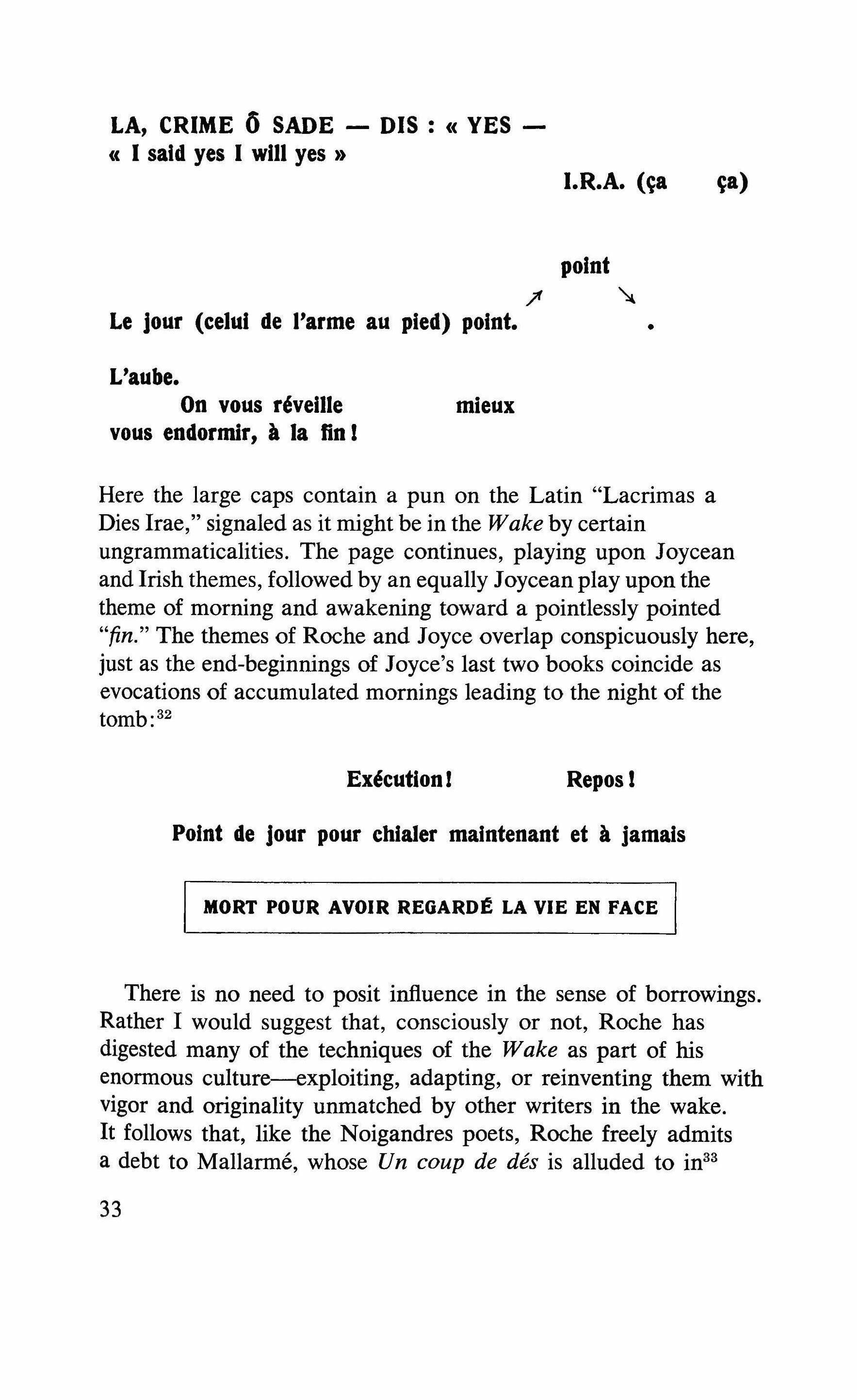
Le jour (eelui de I'arme au pied) pOint.
L'aube.
On vous r6veille
vous endormir, a la fin I mieux
Here the large caps contain a pun on the Latin "Lacrimas a Dies Irae," signaled as it might be in the Wake by certain ungrammaticalities. The page continues, playing upon Joycean and Irish themes, followed by an equally Joyceanplay upon the theme of morning and awakening toward a pointlessly pointed "fin." The themes of Roche and Joyce overlap conspicuously here, just as the end-beginnings of Joyce's last two books coincide as evocations of accumulated mornings leading to the night of the tombr"
Repos I
Point de jour pour ehialer maintenant et a jamals I MORT
There is no need to posit influence in the sense of borrowings. Rather I would suggest that, consciously or not, Roche has digested many of the techniques of the Wake as part of his enormous culture-exploiting, adapting, or reinventing them with vigor and originality unmatched by other writers in the wake. It follows that, like the Noigandres poets, Roche freely admits a debt to Mallarme, whose Un coup de des is alluded to in33
I.R.A. (�a �a) »
point �
Ex6eutionl
POUR AVOIR REGARD£ LA VIE
EN FACE I
33
(d'os)
where the throw (coup) of the bones (os) elicits a skull (Latin, calvarium) in type and a shot (coupe) of apple brandy, or calvados. We may also point to Pound's use of ideograms, political outrage, associational cacophony, and a polyphony of interlinguistic reference-all found in Roche's fiction.
But specific Joycean techniques are sprinkled throughout Roche's pages: multilingual puns and pun effects achieved either by homophony or visual tricks; playfully serious absurdities, either specific as in "senescence-c'est naissance'P" or combinations of sounds as in "il en crier''i" portmanteau words like utoptique and miragineri" suggestive use of the wrong word;"
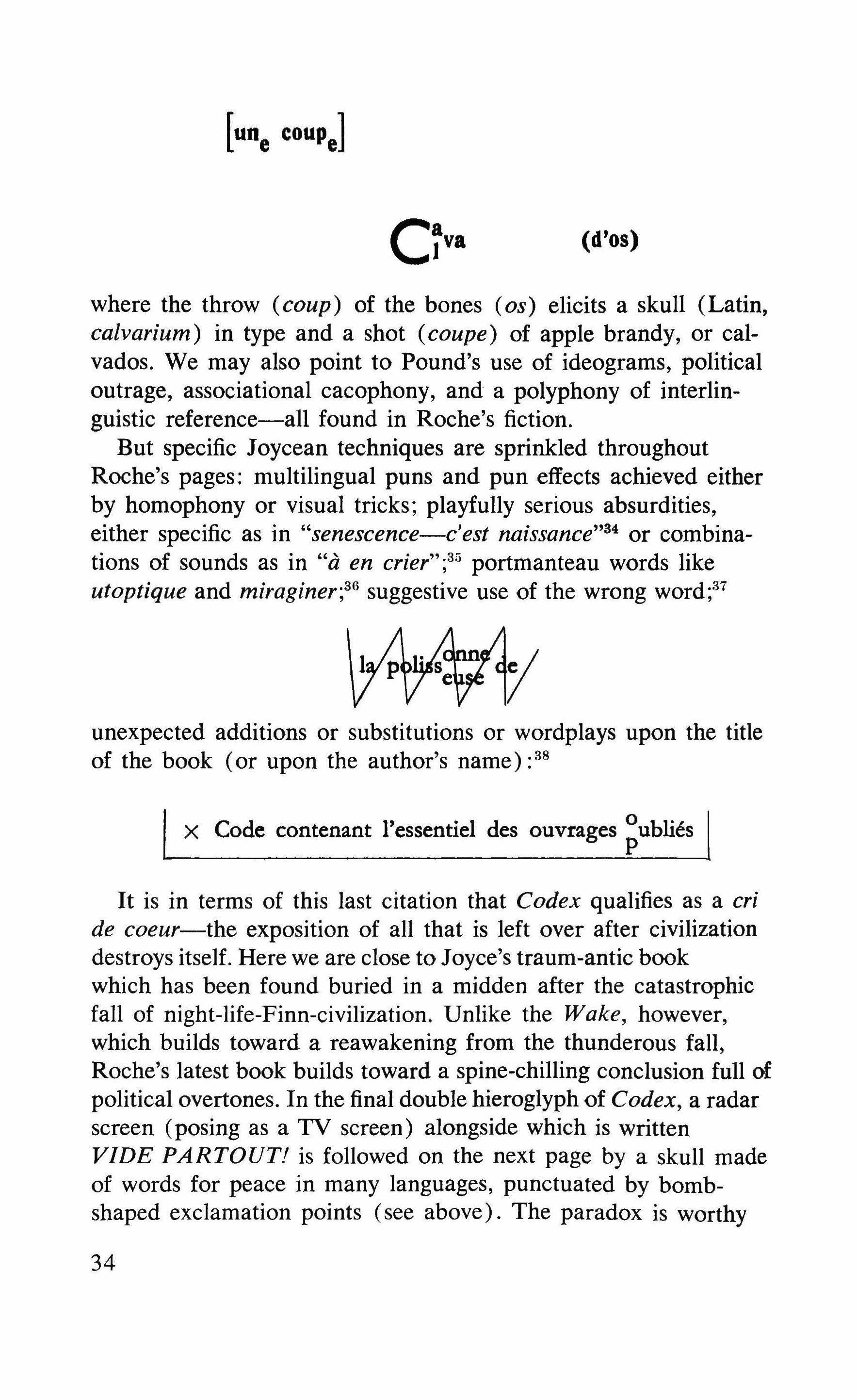
unexpected additions or substitutions or wordplays upon the title of the book (or upon the author's name): 38
x Code contenant l'essentiel des ouvrages �ublies
It is in terms of this last citation that Codex qualifies as a cri de coeur-the exposition of all that is left over after civilization destroys itself. Here we are close to Joyce's traum-antic book which has been found buried in a midden after the catastrophic fall of night-life-Finn-civilization. Unlike the Wake, however, which builds toward a reawakening from the thunderous fall, Roche's latest book builds toward a spine-chilling conclusion full of political overtones. In the final double hieroglyph of Codex, a radar screen (posing as a TV screen) alongside which is written VIDE PARTOUT! is followed on the next page by a skull made of words for peace in many languages, punctuated by bombshaped exclamation points (see above). The paradox is worthy
34
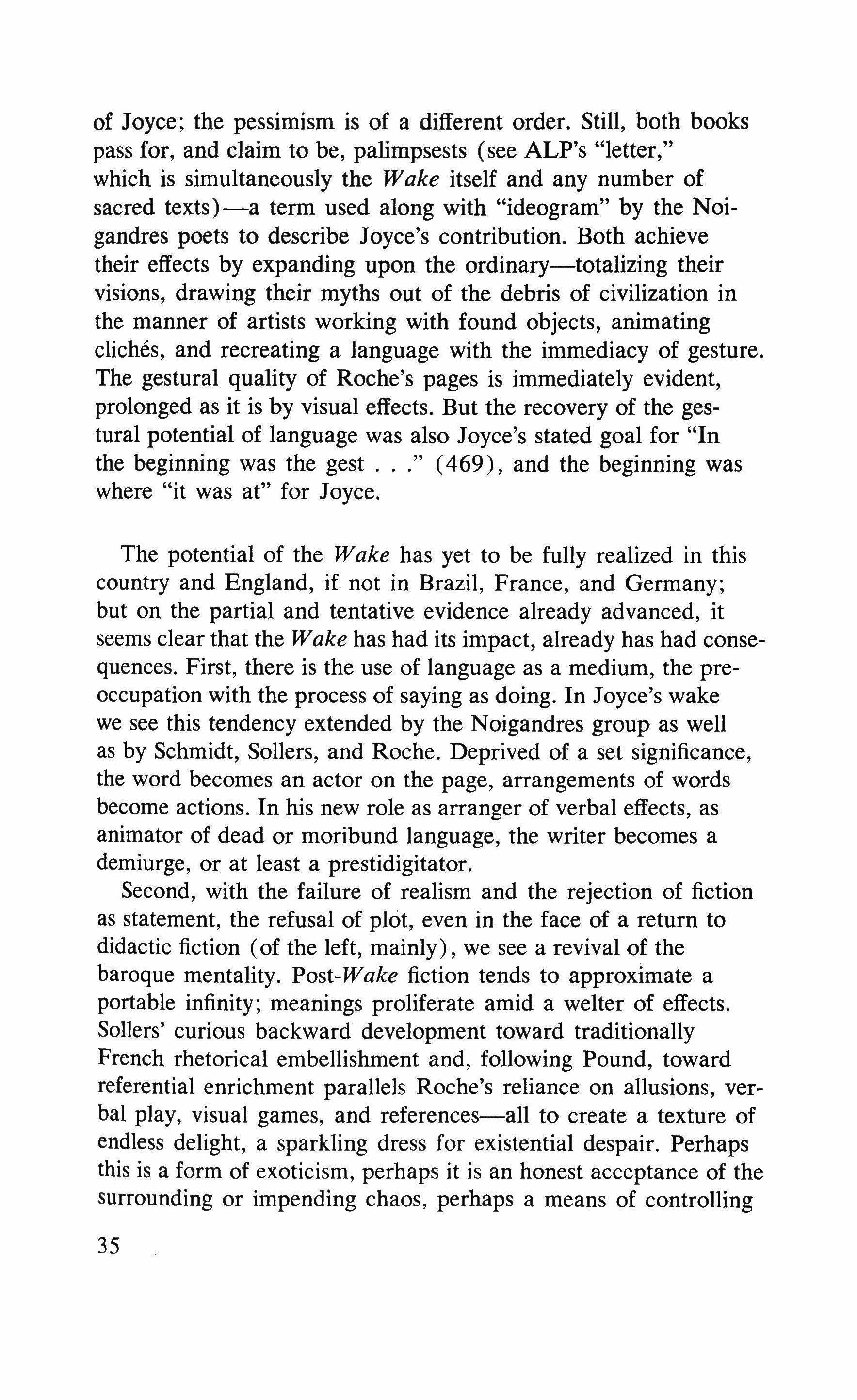
of Joyce; the pessimism is of a different order. Still, both books pass for, and claim to be, palimpsests (see ALP's "letter," which is simultaneously the Wake itself and any number of sacred texts)-a term used along with "ideogram" by the Noigandres poets to describe Joyce's contribution. Both achieve their effects by expanding upon the ordinary-totalizing their visions, drawing their myths out of the debris of civilization in the manner of artists working with found objects, animating cliches, and recreating a language with the immediacy of gesture. The gestural quality of Roche's pages is immediately evident, prolonged as it is by visual effects. But the recovery of the gestural potential of language was also Joyce's stated goal for "In the beginning was the gest ." (469), and the beginning was where "it was at" for Joyce.
The potential of the Wake has yet to be fully realized in this country and England, if not in Brazil, France, and Germany; but on the partial and tentative evidence already advanced, it seems clear that the Wake has had its impact, already has had consequences. First, there is the use of language as a medium, the preoccupation with the process of saying as doing. In Joyce's wake we see this tendency extended by the Noigandres group as well as by Schmidt, Sollers, and Roche. Deprived of a set significance, the word becomes an actor on the page, arrangements of words become actions. In his new role as arranger of verbal effects, as animator of dead or moribund language, the writer becomes a demiurge, or at least a prestidigitator.
Second, with the failure of realism and the rejection of fiction as statement, the refusal of plot, even in the face of a return to didactic fiction (of the left, mainly), we see a revival of the baroque mentality. Post-Wake fiction tends to approximate a portable infinity; meanings proliferate amid a welter of effects. Sollers' curious backward development toward traditionally French rhetorical embellishment and, following Pound, toward referential enrichment parallels Roche's reliance on allusions, verbal play, visual games, and references-all to create a texture of endless delight, a sparkling dress for existential despair. Perhaps this is a form of exoticism, perhaps it is an honest acceptance of the surrounding or impending chaos, perhaps a means of controlling
35
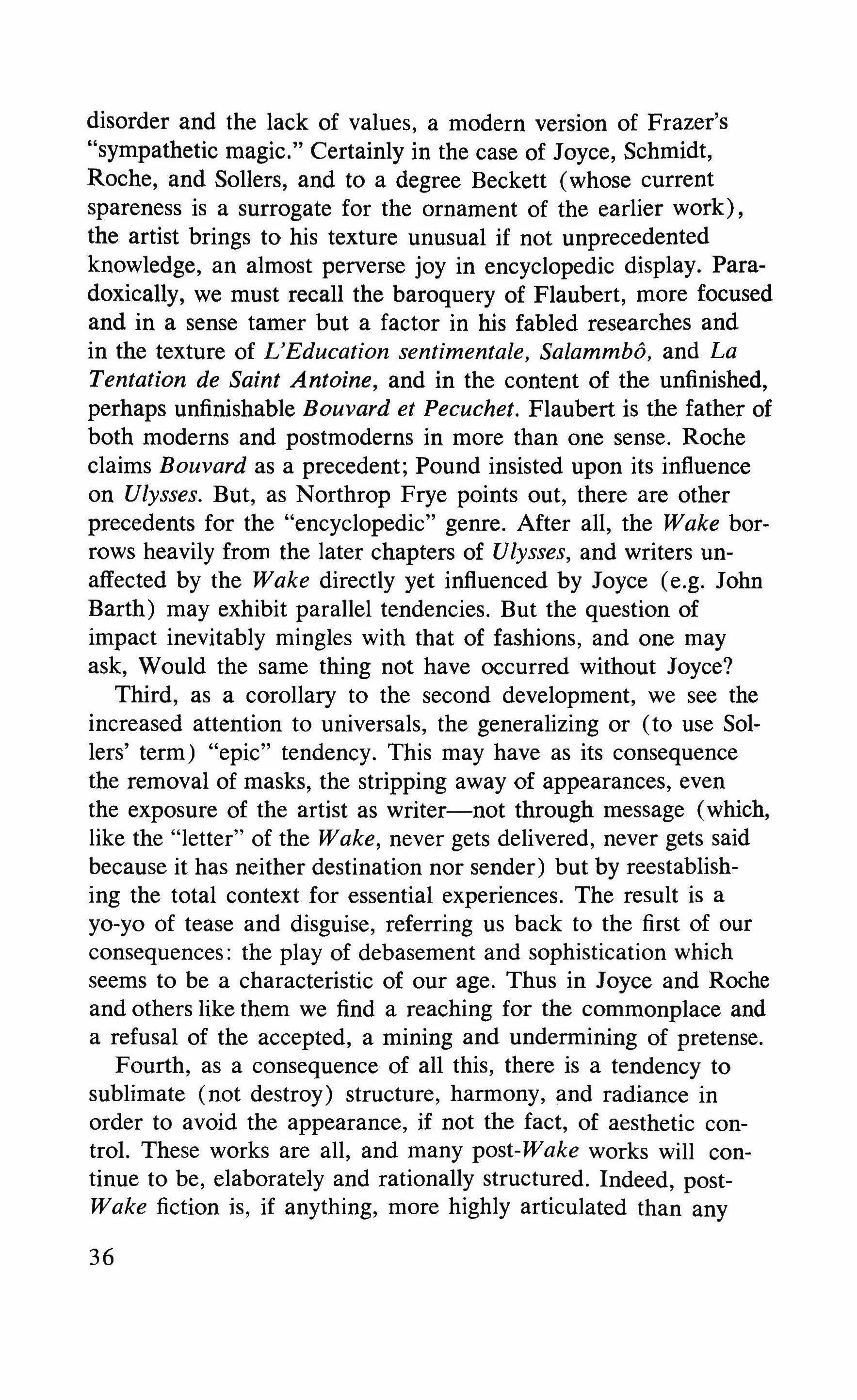
disorder and the lack of values, a modern version of Frazer's "sympathetic magic." Certainly in the case of Joyce, Schmidt, Roche, and Sollers, and to a degree Beckett (whose current spareness is a surrogate for the ornament of the earlier work), the artist brings to his texture unusual if not unprecedented knowledge, an almost perverse joy in encyclopedic display. Paradoxically, we must recall the baroquery of Flaubert, more focused and in a sense tamer but a factor in his fabled researches and in the texture of L'Education sentimentale, Salammbo, and La Tentation de Saint Antoine, and in the content of the unfinished, perhaps unfinishable Bouvard et Pecuchet. Flaubert is the father of both moderns and postmoderns in more than one sense. Roche claims Bouvard as a precedent; Pound insisted upon its influence on Ulysses. But, as Northrop Frye points out, there are other precedents for the "encyclopedic" genre. After all, the Wake borrows heavily from the later chapters of Ulysses, and writers unaffected by the Wake directly yet influenced by Joyce (e.g. John Barth) may exhibit parallel tendencies. But the question of impact inevitably mingles with that of fashions, and one may ask, Would the same thing not have occurred without Joyce?
Third, as a corollary to the second development, we see the increased attention to universals, the generalizing or (to use Sollers' term) "epic" tendency. This may have as its consequence the removal of masks, the stripping away of appearances, even the exposure of the artist as writer-not through message (which, like the "letter" of the Wake, never gets delivered, never gets said because it has neither destination nor sender) but by reestablishing the total context for essential experiences. The result is a yo-yo of tease and disguise, referring us back to the first of our consequences: the play of debasement and sophistication which seems to be a characteristic of our age. Thus in Joyce and Roche and others like them we find a reaching for the commonplace and a refusal of the accepted, a mining and undermining of pretense.
Fourth, as a consequence of all this, there is a tendency to sublimate (not destroy) structure, harmony, and radiance in order to avoid the appearance, if not the fact, of aesthetic control. These works are all, and many post-Wake works will continue to be, elaborately and rationally structured. Indeed, postWake fiction is, if anything, more highly articulated than any
36
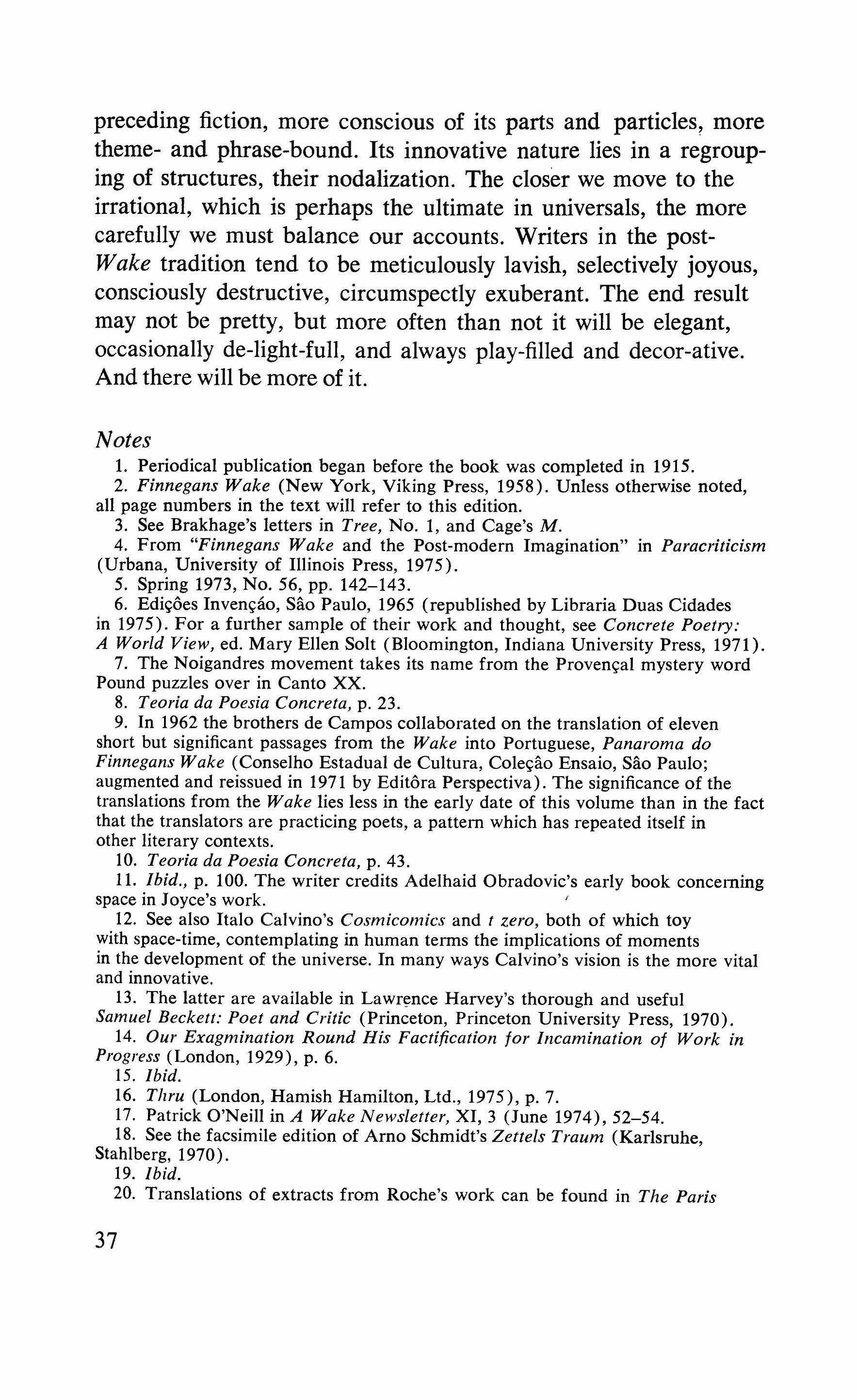
preceding fiction, more conscious of its parts and particles, more theme- and phrase-bound. Its innovative nature lies in a regrouping of structures, their nodalization. The closer we move to the irrational, which is perhaps the ultimate in universals, the more carefully we must balance our accounts. Writers in the postWake tradition tend to be meticulously lavish, selectively joyous, consciously destructive, circumspectly exuberant. The end result may not be pretty, but more often than not it will be elegant, occasionally de-light-full, and always play-filled and decor-ative. And there will be more of it.
Notes
1. Periodical publication began before the book was completed in 1915.
2. Finnegans Wake (New York, Viking Press, 1958). Unless otherwise noted, all page numbers in the text will refer to this edition.
3. See Brakhage's letters in Tree, No.1, and Cage's M.
4. From "Finnegans Wake and the Post-modern Imagination" in Paracriticism (Urbana, University of Illinois Press, 1975).
5. Spring 1973, No. 56, pp. 142-143.
6. Edicoes Invencao, Sao Paulo, 1965 (republished by Libraria Duas Cidades in 1975). For a further sample of their work and thought, see Concrete Poetry: A World View, ed. Mary Ellen Solt (Bloomington, Indiana University Press, 1971).
7. The Noigandres movement takes its name from the Provencal mystery word Pound puzzles over in Canto XX.
8. Teoria da Poesia Concreta, p. 23.
9. In 1962 the brothers de Campos collaborated on the translation of eleven short but significant passages from the Wake into Portuguese, Panaroma do Finnegans Wake (Conselho Estadual de Cultura, Colecao Ensaio, Sao Paulo; augmented and reissued in 1971 by Editora Perspectiva). The significance of the translations from the Wake lies less in the early date of this volume than in the fact that the translators are practicing poets, a pattern which has repeated itself in other literary contexts.
10. Teoria da Poesia Concreta, p. 43.
11. Ibid., p. 100. The writer credits Adelhaid Obradovic's early book concerning space in Joyce's work.
12. See also Italo Calvino's Cosmicomics and t zero, both of which toy with space-time, contemplating in human terms the implications of moments in the development of the universe. In many ways Calvino's vision is the more vital and innovative.
13. The latter are available in Lawrence Harvey's thorough and useful Samuel Beckett: Poet and Critic (Princeton, Princeton University Press, 1970).
14. Our Exagmination Round His Factification for Incamination of Work in Progress (London, 1929), p. 6.
15. Ibid.
16. Tlzru (London, Hamish Hamilton, Ltd., 1975), p. 7.
17. Patrick O'Neill in A Wake Newsletter, XI, 3 (June 1974),52-54.
18. See the facsimile edition of Arno Schmidt's Zettels Traum (Karlsruhe, Stahlberg, 1970).
19. Ibid.
20. Translations of extracts from Roche's work can be found in The Paris
37
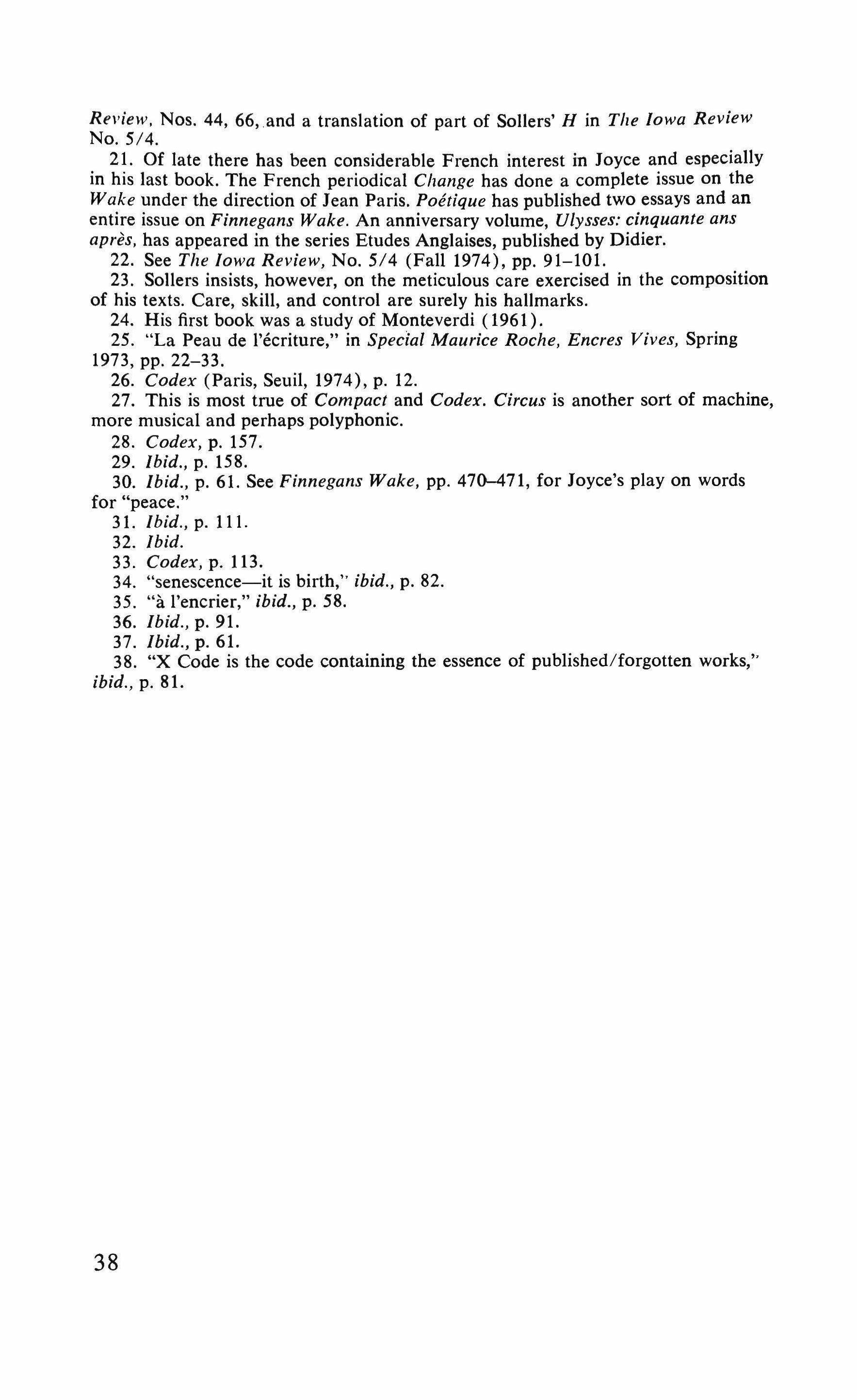
Review, Nos. 44, 66, and a translation of part of Sollers' H in The Iowa Review No. 5/4.
21. Of late there has been considerable French interest in Joyce and especially in his last book. The French periodical Change has done a complete issue on the Wake under the direction of Jean Paris. Poetique has published two essays and an entire issue on Finnegans Wake. An anniversary volume, Ulysses: cinquante ans apres, has appeared in the series Etudes Anglaises, published by Didier.
22. See The Iowa Review, No. 5/4 (Fall 1974), pp. 91-101.
23. Sollers insists, however, on the meticulous care exercised in the composition of his texts. Care, skill, and control are surely his hallmarks.
24. His first book was a study of Monteverdi (1961).
25. "La Peau de l'ecriture," in Special Maurice Roche, Encres Vives, Spring 1973, pp. 22-33.
26. Codex (Paris, Seuil, 1974), p. 12.
27. This is most true of Compact and Codex. Circus is another sort of machine, more musical and perhaps polyphonic.
28. Codex, p. 157.
29. Ibid., p. 158.
30. Ibid., p. 61. See Finnegans Wake, pp. 470-471, for Joyce's play on words for "peace."
31. Ibid., p. 111.
32. Ibid.
33. Codex, p. 113.
34. "senescence-it is birth," ibid., p. 82.
35. "a l'encrier," ibid., p. 58.
36. Ibid., p. 91.
37. Ibid., p. 61.
38. "X Code is the code containing the essence of published/forgotten works," ibid., p. 81.
38
Eugene Jolas, transition, and the Revolution of the Word
Michael
Finney
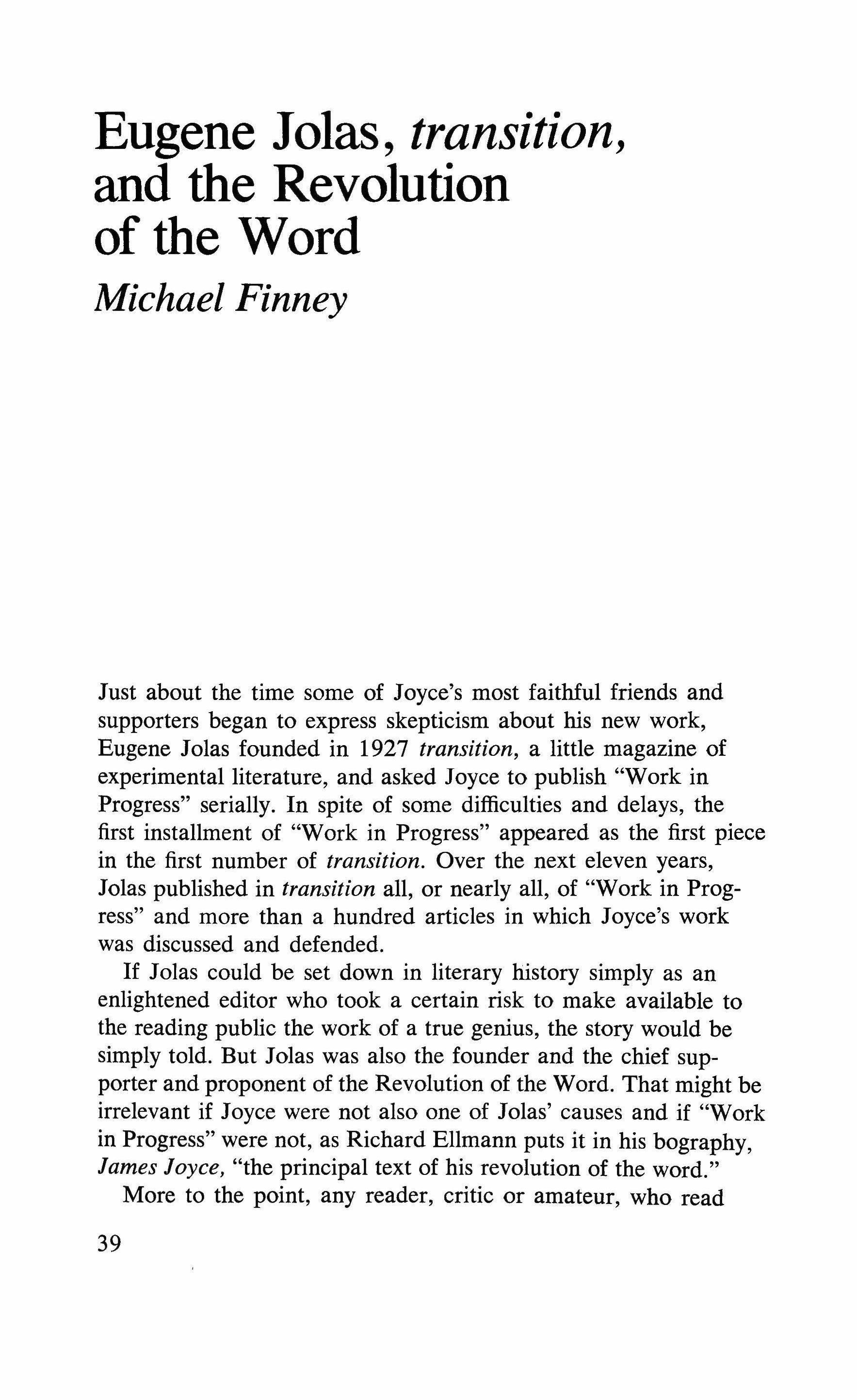
lust about the time some of Joyce's most faithful friends and supporters began to express skepticism about his new work, Eugene Jolas founded in 1927 transition, a little magazine of experimental literature, and asked Joyce to publish "Work in Progress" serially. In spite of some difficulties and delays, the first installment of "Work in Progress" appeared as the first piece in the first number of transition. Over the next eleven years, Jolas published in transition all, or nearly all, of "Work in Progress" and more than a hundred articles in which Joyce's work was discussed and defended.
If Jolas could be set down in literary history simply as an enlightened editor who took a certain risk to make available to the reading public the work of a true genius, the story would be simply told. But Jolas was also the founder and the chief supporter and proponent of the Revolution of the Word. That might be irrelevant if Joyce were not also one of Jolas' causes and if "Work in Progress" were not, as Richard Ellmann puts it in his bography, James Joyce, "the principal text of his revolution of the word."
More to the point, any reader, critic or amateur, who read
39
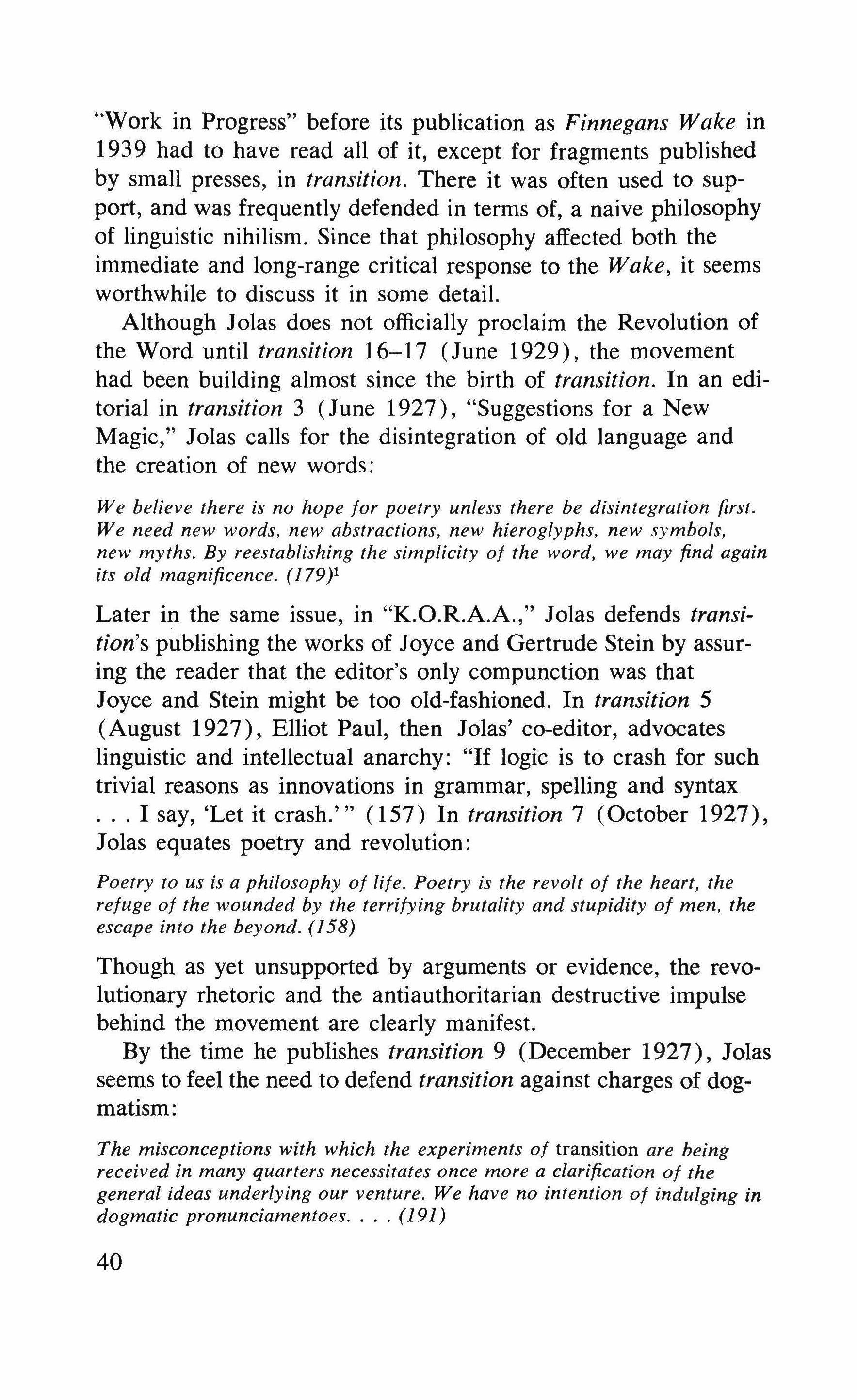
"Work in Progress" before its publication as Finnegans Wake in 1939 had to have read all of it, except for fragments published by small presses, in transition. There it was often used to support, and was frequently defended in terms of, a naive philosophy of linguistic nihilism. Since that philosophy affected both the immediate and long-range critical response to the Wake, it seems worthwhile to discuss it in some detail.
Although Jolas does not officially proclaim the Revolution of the Word until transition 16-17 (June 1929), the movement had been building almost since the birth of transition. In an editorial in transition 3 (June 1927), "Suggestions for a New Magic," Jolas calls for the disintegration of old language and the creation of new words:
We believe there is no hope for poetry unless there be disintegration first. We need new words, new abstractions, new hieroglyphs, new symbols, new myths. By reestablishing the simplicity of the word, we may find again its old magnificence. (179)1
Later in the same issue, in "K.O.R.A.A.," Jolas defends transition's publishing the works of Joyce and Gertrude Stein by assuring the reader that the editor's only compunction was that Joyce and Stein might be too old-fashioned. In transition 5 (August 1927), Elliot Paul, then Jolas' co-editor, advocates linguistic and intellectual anarchy: "If logic is to crash for such trivial reasons as innovations in grammar, spelling and syntax I say, 'Let it crash.'" (157) In transition 7 (October 1927), Jolas equates poetry and revolution:
Poetry to us is a philosophy of life. Poetry is the revolt of the heart, the refuge of the wounded by the terrifying brutality and stupidity of men, the escape into the beyond. (158)
Though as yet unsupported by arguments or evidence, the revolutionary rhetoric and the antiauthoritarian destructive impulse behind the movement are clearly manifest. By the time he publishes transition 9 (December 1927), Jolas seems to feel the need to defend transition against charges of dogmatism:
The misconceptions with which the experiments of transition are being received in many quarters necessitates once more a clarification of the general ideas underlying our venture. We have no intention of indulging in dogmatic pronunciamentoes (191)
40
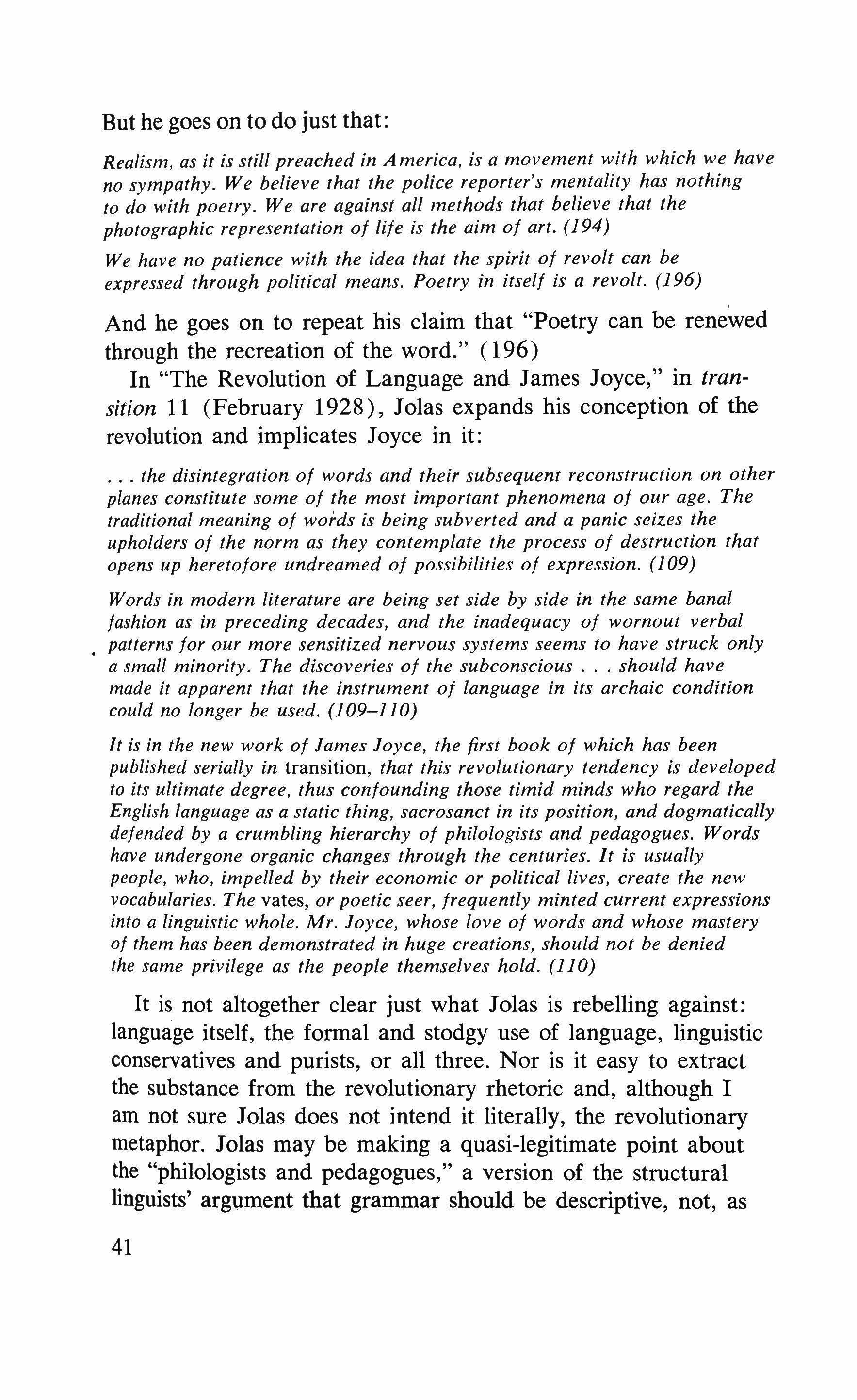
But he goes on to do just that:
Realism, as it is still preached in America, is a movement with which we have no sympathy. We believe that the police reporter's mentality has nothing to do with poetry. Weare against all methods that believe that the photographic representation of life is the aim of art. (194)
We have no patience with the idea that the spirit of revolt can be expressed through political means. Poetry in itself is a revolt. (196)
And he goes on to repeat his claim that "Poetry can be renewed through the recreation of the word." (196)
In "The Revolution of Language and James Joyce," in transition 11 (February 1928), Jolas expands his conception of the revolution and implicates Joyce in it:
the disintegration of words and their subsequent reconstruction on other planes constitute some of the most important phenomena of our age. The traditional meaning of words is being subverted and a panic seizes the upholders of the norm as they contemplate the process of destruction that opens up heretofore undreamed of possibilities of expression. (109)
Words in modern literature are being set side by side in the same banal fashion as in preceding decades, and the inadequacy of wornout verbal patterns for our more sensitized nervous systems seems to have struck only a small minority. The discoveries of the subconscious should have made it apparent that the instrument of language in its archaic condition could no longer be used. (109-110)
It is in the new work of James Joyce, the first book of which has been published serially in transition, that this revolutionary tendency is developed to its ultimate degree, thus confounding those timid minds who regard the English language as a static thing, sacrosanct in its position, and dogmatically defended by a crumbling hierarchy of philologists and pedagogues. Words have undergone organic changes through the centuries. It is usually people, who, impelled by their economic or political lives, create the new vocabularies. The Yates, or poetic seer, frequently minted current expressions into a linguistic whole. Mr. Joyce, whose love of words and whose mastery of them has been demonstrated in huge creations, should not be denied the same privilege as the people themselves hold. (110)
It is not altogether clear just what Jolas is rebelling against: language itself, the formal and stodgy use of language, linguistic conservatives and purists, or all three. Nor is it easy to extract the substance from the revolutionary rhetoric and, although I am not sure Jolas does not intend it literally, the revolutionary metaphor. Jolas may be making a quasi-legitimate point about the "philologists and pedagogues," a version of the structural linguists' argument that grammar should be descriptive, not, as
41
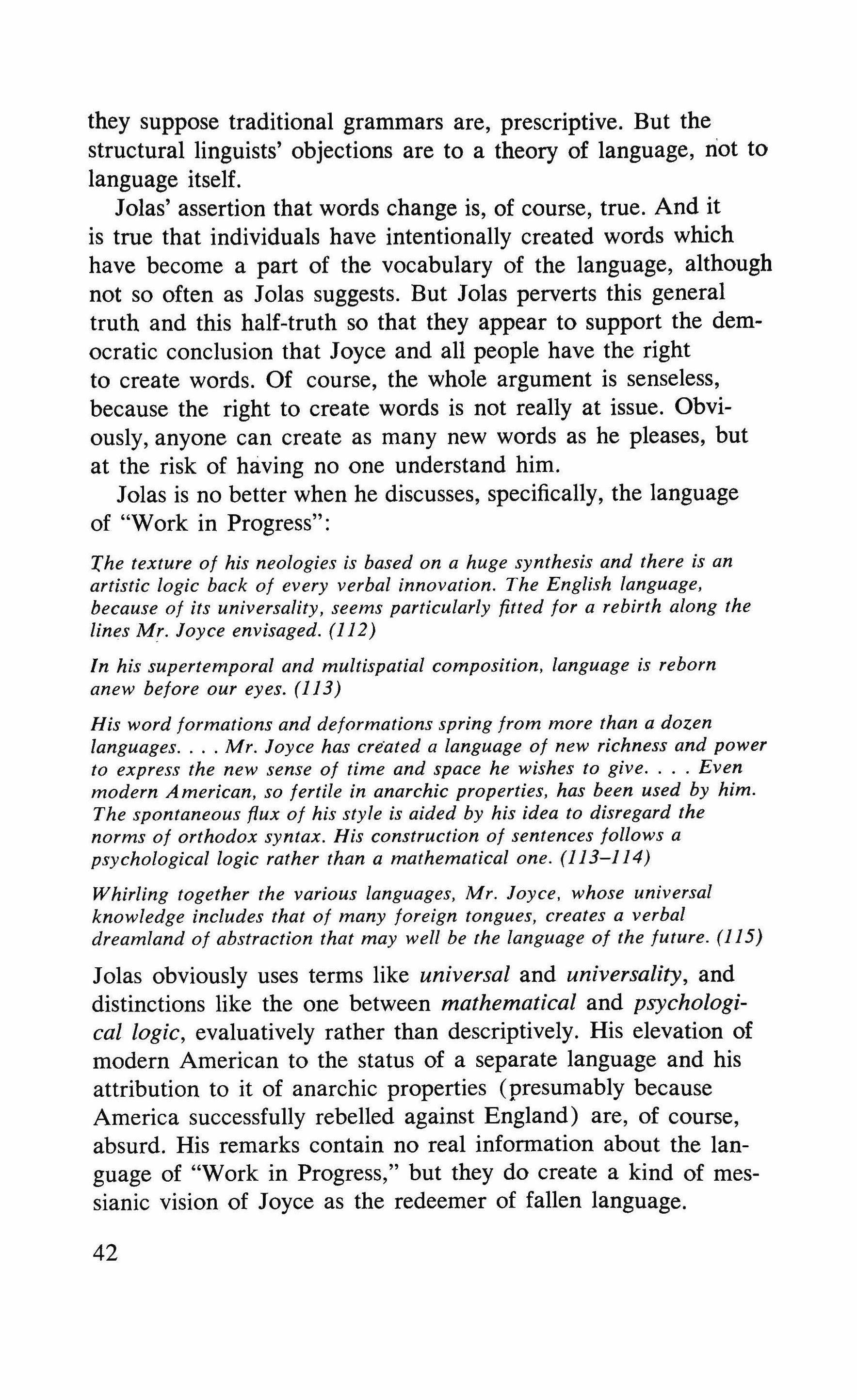
they suppose traditional grammars are, prescriptive. But the structural linguists' objections are to a theory of language, riot to language itself.
Jolas' assertion that words change is, of course, true. And it is true that individuals have intentionally created words which have become a part of the vocabulary of the language, although not so often as Jolas suggests. But Jolas perverts this general truth and this half-truth so that they appear to support the democratic conclusion that Joyce and all people have the right to create words. Of course, the whole argument is senseless, because the right to create words is not really at issue. Obviously, anyone can create as many new words as he pleases, but at the risk of having no one understand him.
Jolas is no better when he discusses, specifically, the language of "Work in Progress":
'{he texture of his neologies is based on a huge synthesis and there is an artistic logic back of every verbal innovation. The English language, because of its universality, seems particularly fitted for a rebirth along the lines Mr. Joyce envisaged. (112)
In his supertemporal and multispatial composition, language is reborn anew before our eyes. (113)
His word formations and deformations spring from more than a dozen languages Mr. Joyce has created a language of new richness and power to express the new sense of time and space he wishes to give Even modern American, so fertile in anarchic properties, has been used by him. The spontaneous flux of his style is aided by his idea to disregard the norms of orthodox syntax. His construction of sentences follows a psychological logic rather than a mathematical one. (113-114)
Whirling together the various languages, Mr. Joyce, whose universal knowledge includes that of many foreign tongues, creates a verbal dreamland of abstraction that may well be the language of the future. (115)
Jolas obviously uses terms like universal and universality, and distinctions like the one between mathematical and psychological logic, evaluatively rather than descriptively. His elevation of modern American to the status of a separate language and his attribution to it of anarchic properties (presumably because America successfully rebelled against England) are, of course, absurd. His remarks contain no real information about the language of "Work in Progress," but they do create a kind of messianic vision of Joyce as the redeemer of fallen language.
42
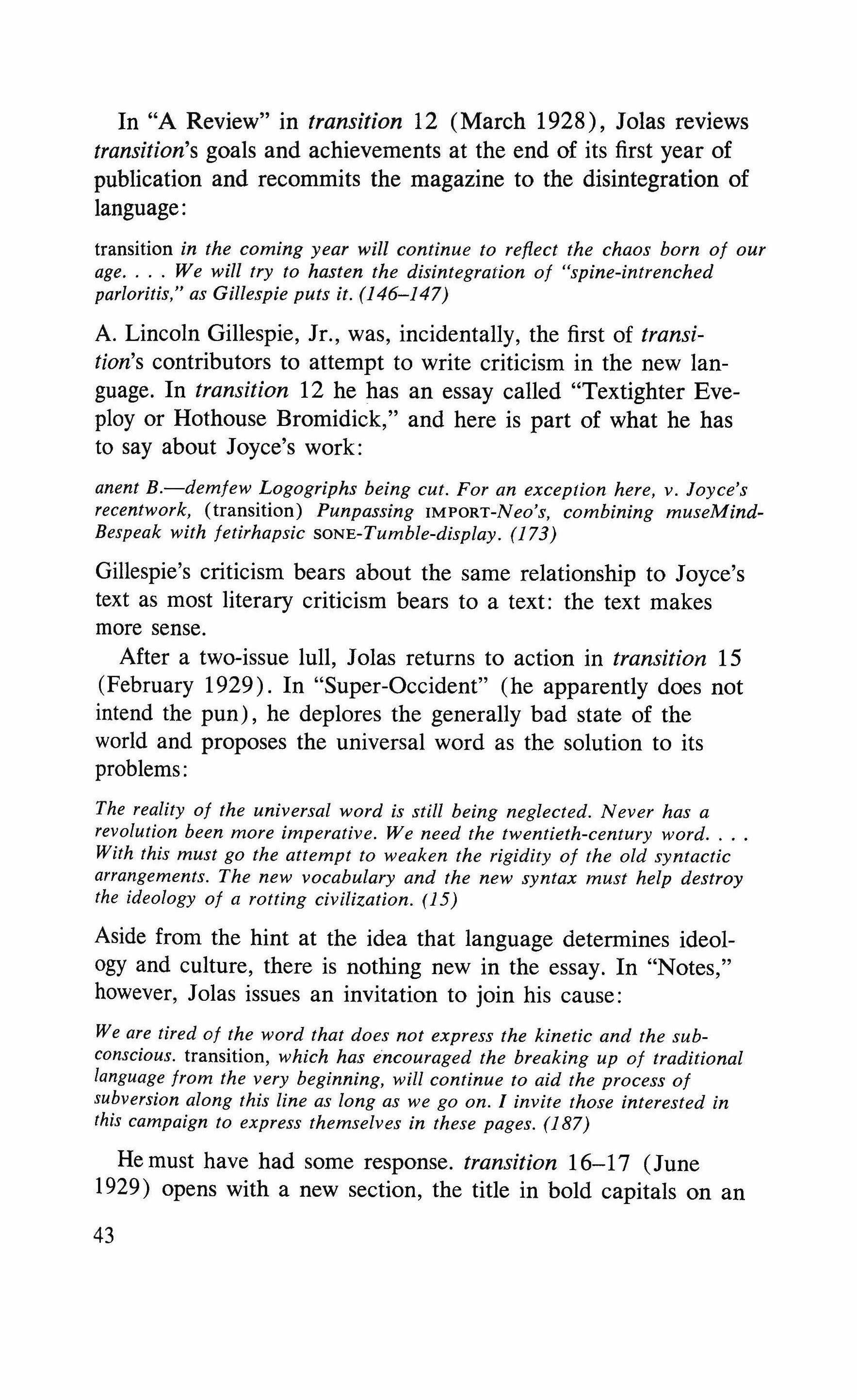
In "A Review" in transition 12 (March 1928), Jolas reviews transition's goals and achievements at the end of its first year of publication and recommits the magazine to the disintegration of language:
transition in the coming year will continue to reflect the chaos born of our age We will try to hasten the disintegration of "spine-intrenched parloritis," as Gillespie puts it. (146-147)
A. Lincoln Gillespie, Jr., was, incidentally, the first of transition's contributors to attempt to write criticism in the new language. In transition 12 he has an essay called "Textighter Eveploy or Hothouse Bromidick," and here is part of what he has to say about Joyce's work:
anent Bi-=demfew Logogriphs being cut. For an exception here, v. Joyce's recentwork, (transition) Punpassing IMPORT-Neo's, combining museMindBespeak with fetirhapsic SONE-Tumble-display. (173)
Gillespie's criticism bears about the same relationship to Joyce's text as most literary criticism bears to a text: the text makes more sense.
After a two-issue lull, Jolas returns to action in transition 15 (February 1929). In "Super-Occident" (he apparently does not intend the pun), he deplores the generally bad state of the world and proposes the universal word as the solution to its problems:
The reality of the universal word is still being neglected. Never has a revolution been more imperative. We need the twentieth-century word With this must go the attempt to weaken the rigidity of the old syntactic arrangements. The new vocabulary and the new syntax must help destroy the ideology of a rotting civilization. (15)
Aside from the hint at the idea that language determines ideology and culture, there is nothing new in the essay. In "Notes," however, Jolas issues an invitation to join his cause:
We are tired of the word that does not express the kinetic and the subconscious. transition, which has encouraged the breaking up of traditional language from the very beginning, will continue to aid the process of subversion along this line as long as we go on. I invite those interested in this campaign to express themselves in these pages. (187)
He must have had some response. transition 16-17 (June 1929) opens with a new section, the title in bold capitals on an
43
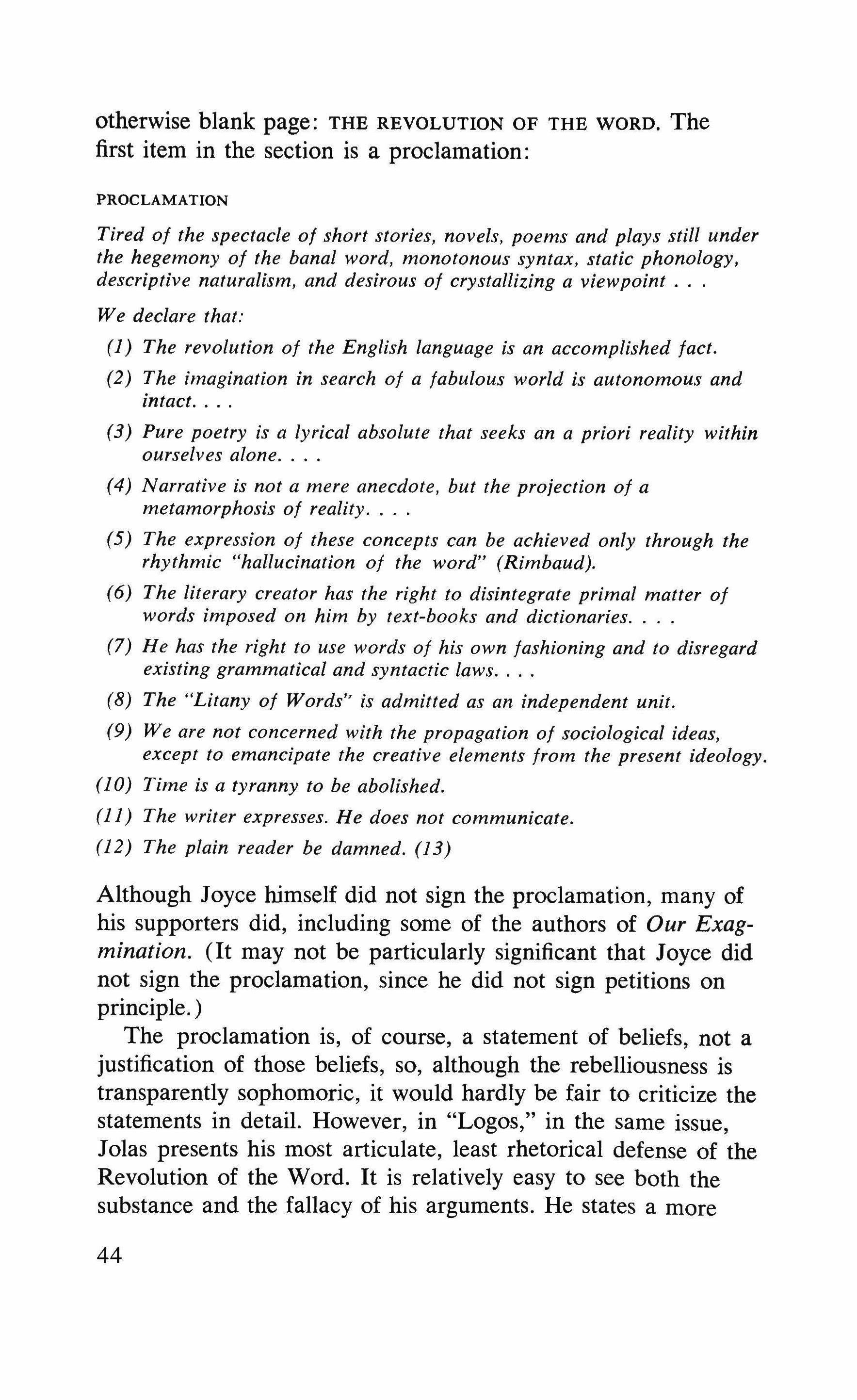
otherwise blank page: THE REVOLUTION OF THE WORD. The first item in the section is a proclamation:
PROCLAMATION
Tired of the spectacle of short stories, novels, poems and plays still under the hegemony of the banal word, monotonous syntax, static phonology, descriptive naturalism, and desirous of crystallizing a viewpoint
We declare that:
(1) The revolution of the English language is an accomplished fact.
(2) The imagination in search of a fabulous world is autonomous and intact
(3) Pure poetry is a lyrical absolute that seeks an a priori reality within ourselves alone
(4) Narrative is not a mere anecdote, but the projection of a metamorphosis of reality
(5) The expression of these concepts can be achieved only through the rhythmic "hallucination of the word" (Rimbaud).
(6) The literary creator has the right to disintegrate primal matter of words imposed on him by text-books and dictionaries
(7) He has the right to use words of his own fashioning and to disregard existing grammatical and syntactic laws
(8) The "Litany of Words" is admitted as an independent unit.
(9) Weare not concerned with the propagation of sociological ideas, except to emancipate the creative elements from the present ideology.
(10) Time is a tyranny to be abolished.
(11) The writer expresses. He does not communicate.
(12) The plain reader be damned. (13)
Although Joyce himself did not sign the proclamation, many of his supporters did, including some of the authors of Our Exagmination. (It may not be particularly significant that Joyce did not sign the proclamation, since he did not sign petitions on principle.)
The proclamation is, of course, a statement of beliefs, not a justification of those beliefs, so, although the rebelliousness is transparently sophomoric, it would hardly be fair to criticize the statements in detail. However, in "Logos," in the same issue, Jolas presents his most articulate, least rhetorical defense of the Revolution of the Word. It is relatively easy to see both the substance and the fallacy of his arguments. He states a more
44
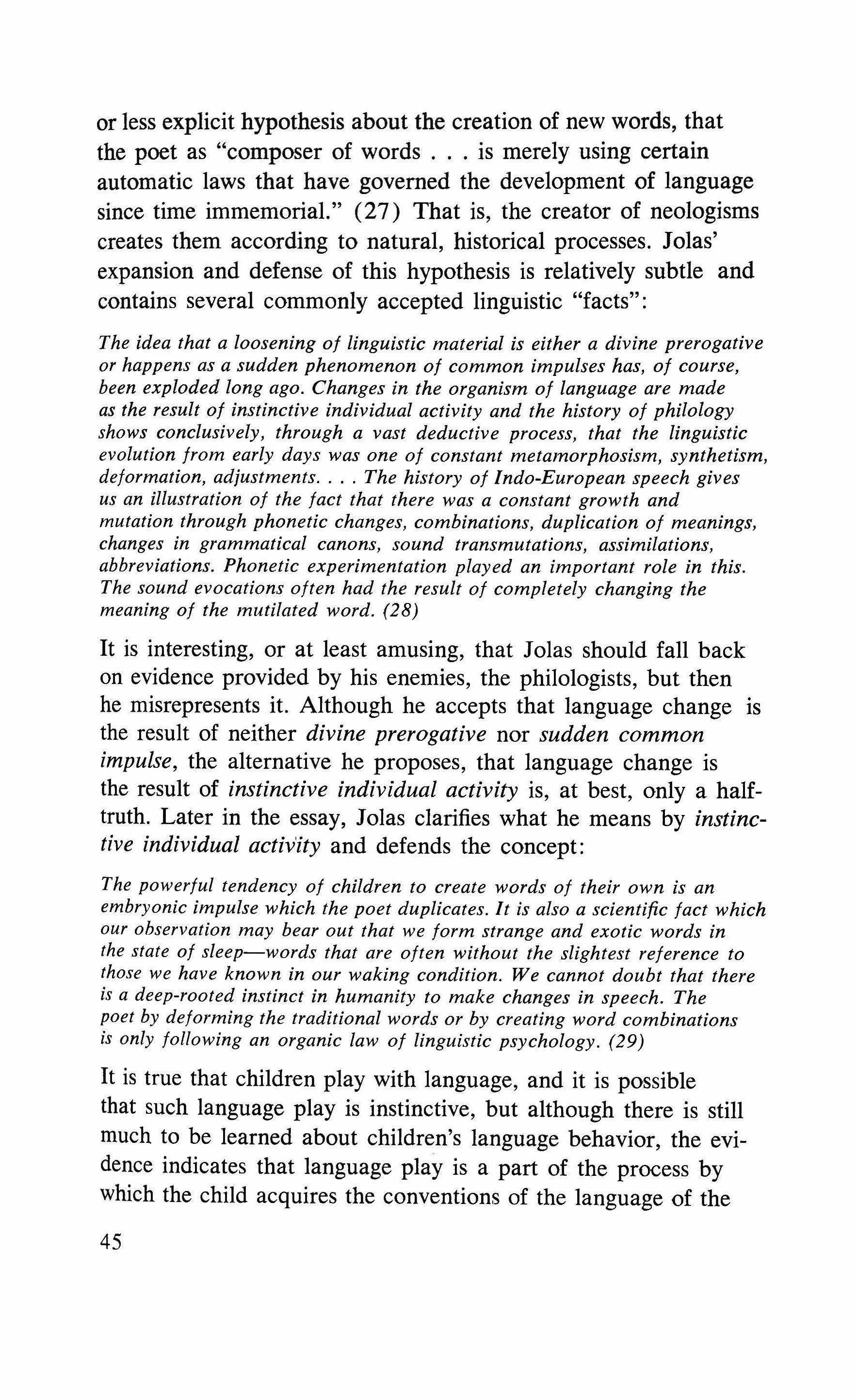
or less explicit hypothesis about the creation of new words, that the poet as "composer of words is merely using certain automatic laws that have governed the development of language since time immemorial." (27) That is, the creator of neologisms creates them according to natural, historical processes. Jolas' expansion and defense of this hypothesis is relatively subtle and contains several commonly accepted linguistic "facts":
The idea that a loosening of linguistic material is either a divine prerogative or happens as a sudden phenomenon of common impulses has, of course, been exploded long ago. Changes in the organism of language are made as the result of instinctive individual activity and the history of philology shows conclusively, through a vast deductive process, that the linguistic evolution from early days was one of constant metamorphosism, synthetism, deformation, adjustments The history of Indo-European speech gives us an illustration of the fact that there was a constant growth and mutation through phonetic changes, combinations, duplication of meanings, changes in grammatical canons, sound transmutations, assimilations, abbreviations. Phonetic experimentation played an important role in this. The sound evocations often had the result of completely changing the meaning of the mutilated word. (28)
It is interesting, or at least amusing, that Jolas should fall back on evidence provided by his enemies, the philologists, but then he misrepresents it. Although he accepts that language change IS the result of neither divine prerogative nor sudden common impulse, the alternative he proposes, that language change is the result of instinctive individual activity is, at best, only a halftruth. Later in the essay, Jolas clarifies what he means by instinctive individual activity and defends the concept:
The powerful tendency of children to create words of their own is an embryonic impulse which the poet duplicates. It is also a scientific fact which our observation may bear out that we form strange and exotic words in the state of sleep-words that are often without the slightest reference to those we have known in our waking condition. We cannot doubt that there is a deep-rooted instinct in humanity to make changes in speech. The poet by deforming the traditional words or by creating word combinations is only following an organic law of linguistic psychology. (29)
It is true that children play with language, and it is possible that such language play is instinctive, but although there is still much to be learned about children's language behavior, the evidence indicates that language play is a part of the process by which the child acquires the conventions of the language of the
45
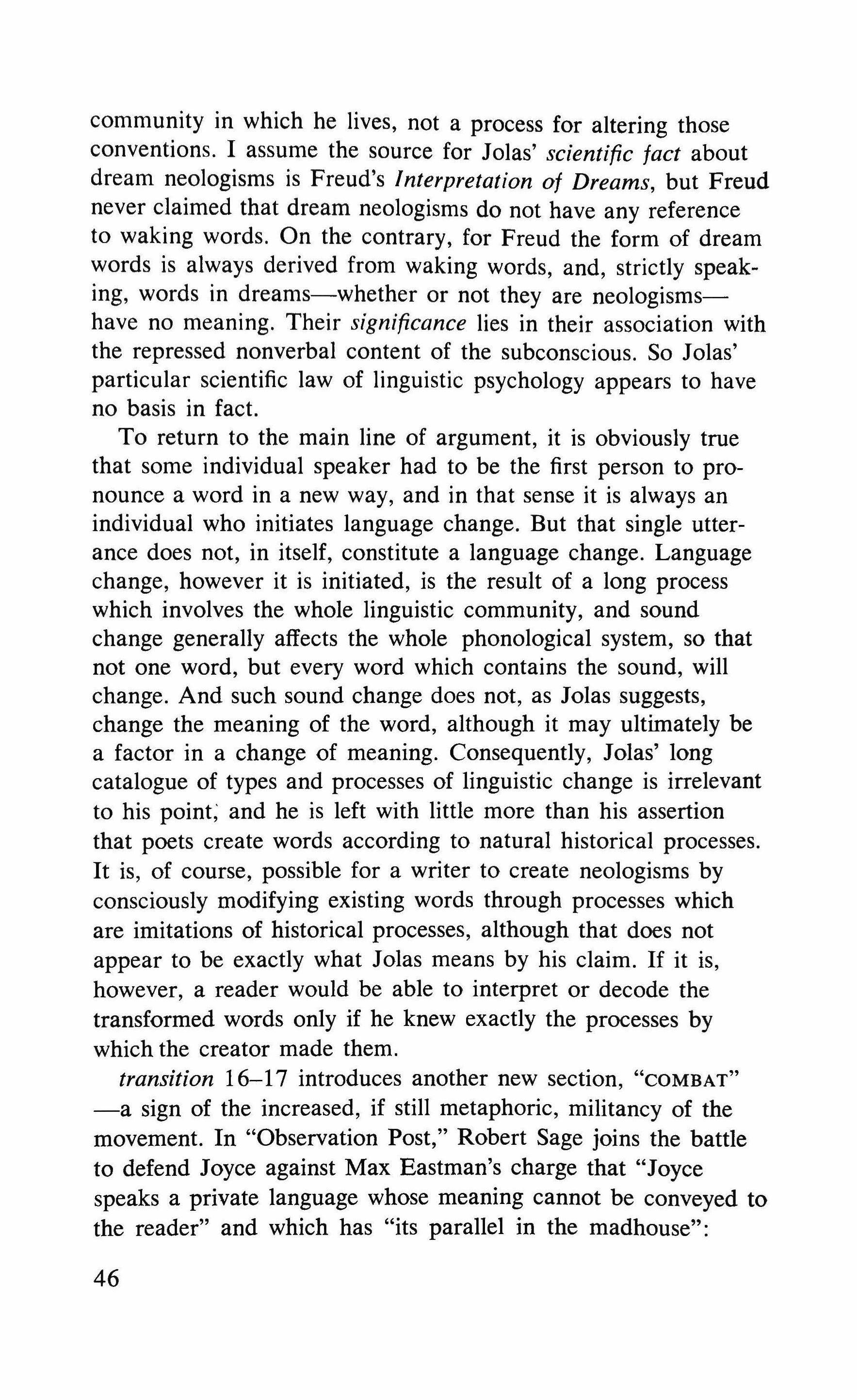
community in which he lives, not a process for altering those conventions. I assume the source for Jolas' scientific fact about dream neologisms is Freud's Interpretation of Dreams, but Freud never claimed that dream neologisms do not have any reference to waking words. On the contrary, for Freud the form of dream words is always derived from waking words, and, strictly speaking, words in dreams-whether or not they are neologismshave no meaning. Their significance lies in their association with the repressed nonverbal content of the subconscious. So Jolas' particular scientific law of linguistic psychology appears to have no basis in fact.
To return to the main line of argument, it is obviously true that some individual speaker had to be the first person to pronounce a word in a new way, and in that sense it is always an individual who initiates language change. But that single utterance does not, in itself, constitute a language change. Language change, however it is initiated, is the result of a long process which involves the whole linguistic community, and sound change generally affects the whole phonological system, so that not one word, but every word which contains the sound, will change. And such sound change does not, as Jolas suggests, change the meaning of the word, although it may ultimately be a factor in a change of meaning. Consequently, Jolas' long catalogue of types and processes of linguistic change is irrelevant to his point; and he is left with little more than his assertion that poets create words according to natural historical processes. It is, of course, possible for a writer to create neologisms by consciously modifying existing words through processes which are imitations of historical processes, although that does not appear to be exactly what Jolas means by his claim. If it is, however, a reader would be able to interpret or decode the transformed words only if he knew exactly the processes by which the creator made them.
transition 16-17 introduces another new section, "COMBAT" -a sign of the increased, if still metaphoric, militancy of the movement. In "Observation Post," Robert Sage joins the battle to defend Joyce against Max Eastman's charge that "Joyce speaks a private language whose meaning cannot be conveyed to the reader" and which has "its parallel in the madhouse":
46
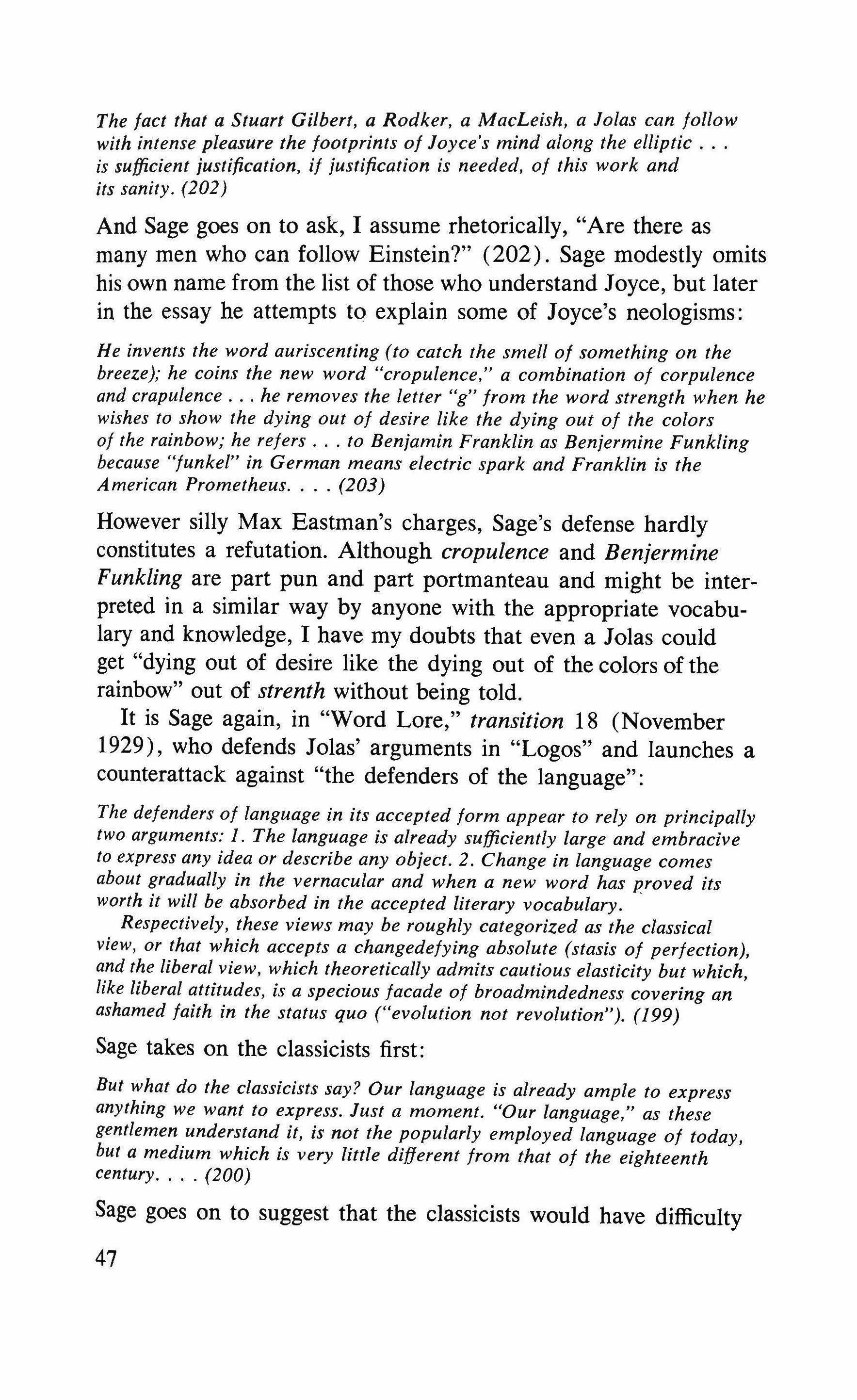
The fact that a Stuart Gilbert, a Rodker, a Macl.eish, a lolas can follow with intense pleasure the footprints of Loyce's mind along the elliptic is sufficient justification, if justification is needed, of this work and its sanity. (202)
And Sage goes on to ask, I assume rhetorically, "Are there as many men who can follow Einstein?" (202). Sage modestly omits his own name from the list of those who understand Joyce, but later in the essay he attempts to explain some of Joyce's neologisms: He invents the word auriscenting (to catch the smell of something on the breeze); he coins the new word "cropulence," a combination of corpulence and crapulence he removes the letter "g" from the word strength when he wishes to show the dying out of desire like the dying out of the colors of the rainbow; he refers to Benjamin Franklin as Benjermine Funkling because "[unkel' in German means electric spark and Franklin is the American Prometheus (203)
However silly Max Eastman's charges, Sage's defense hardly constitutes a refutation. Although crapulence and Benjermine Funkling are part pun and part portmanteau and might be interpreted in a similar way by anyone with the appropriate vocabulary and knowledge, I have my doubts that even a Jolas could get "dying out of desire like the dying out of the colors of the rainbow" out of strenth without being told.
It is Sage again, in "Word Lore," transition 18 (November 1929), who defends Jolas' arguments in "Logos" and launches a counterattack against "the defenders of the language":
The defenders of language in its accepted form appear to rely on principally two arguments: 1. The language is already sufficiently large and embracive to express any idea or describe any object. 2. Change in language comes about gradually in the vernacular and when a new word has proved its worth it will be absorbed in the accepted literary vocabulary.
Respectively, these views may be roughly categorized as the classical view, or that which accepts a changedefying absolute (stasis of perfection), and the liberal view, which theoretically admits cautious elasticity but which, like liberal attitudes, is a specious facade of broadmindedness covering an ashamed faith in the status quo ("evolution not revolution"). (199)
Sage takes on the classicists first:
But what do the classicists say? Our language is already ample to express anything we want to express. lust a moment. "Our language," as these gentlemen understand it, is not the popularly employed language of today, but a medium which is very little different from that of the eighteenth century (200)
Sage goes on to suggest that the classicists would have difficulty
47
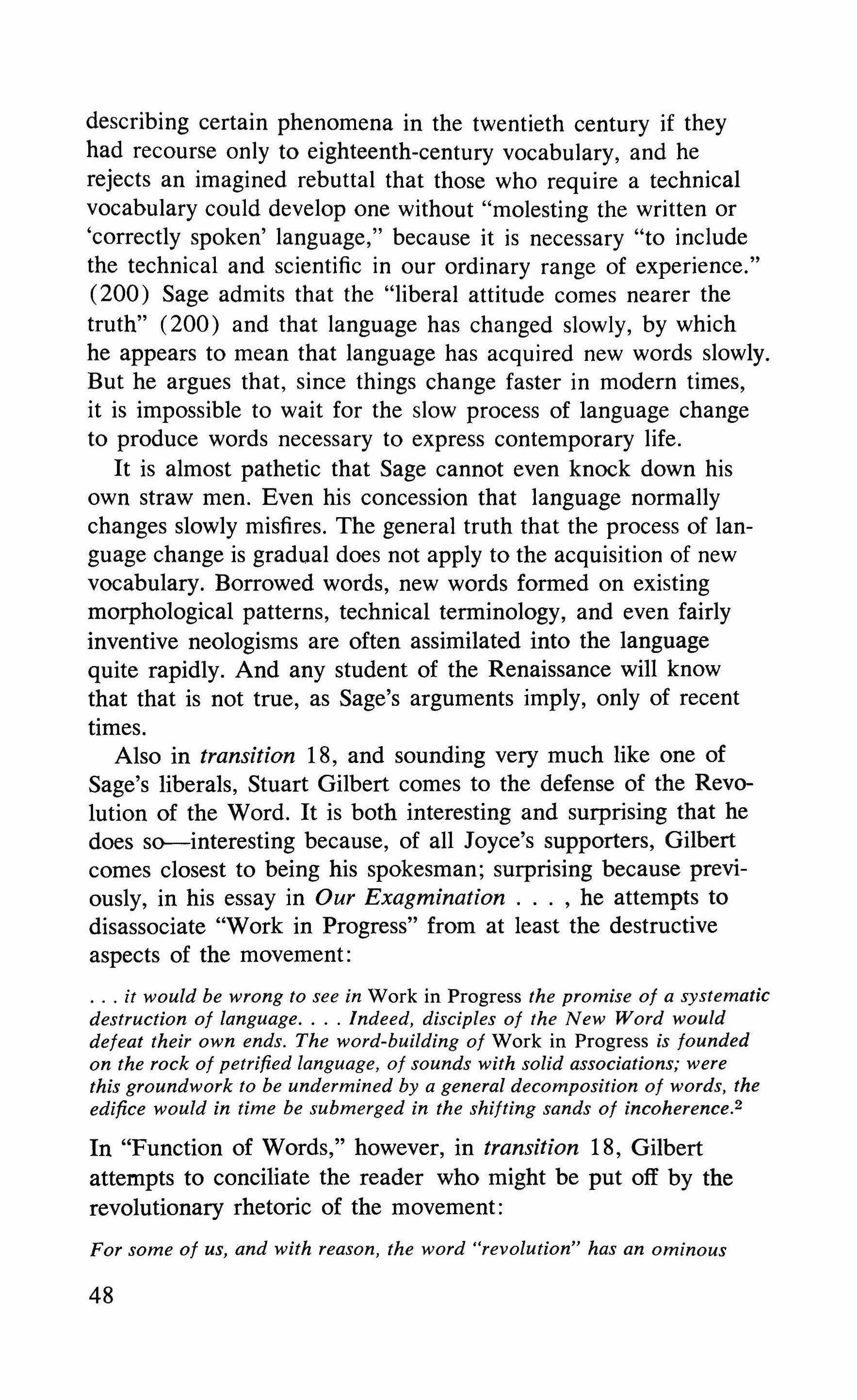
describing certain phenomena in the twentieth century if they had recourse only to eighteenth-century vocabulary, and he rejects an imagined rebuttal that those who require a technical vocabulary could develop one without "molesting the written or 'correctly spoken' language," because it is necessary "to include the technical and scientific in our ordinary range of experience." (200) Sage admits that the "liberal attitude comes nearer the truth" (200) and that language has changed slowly, by which he appears to mean that language has acquired new words slowly. But he argues that, since things change faster in modern times, it is impossible to wait for the slow process of language change to produce words necessary to express contemporary life. It is almost pathetic that Sage cannot even knock down his own straw men. Even his concession that language normally changes slowly misfires. The general truth that the process of language change is gradual does not apply to the acquisition of new vocabulary. Borrowed words, new words formed on existing morphological patterns, technical terminology, and even fairly inventive neologisms are often assimilated into the language quite rapidly. And any student of the Renaissance will know that that is not true, as Sage's arguments imply, only of recent times.
Also in transition 18, and sounding very much like one of Sage's liberals, Stuart Gilbert comes to the defense of the Revolution of the Word. It is both interesting and surprising that he does so--interesting because, of all Joyce's supporters, Gilbert comes closest to being his spokesman; surprising because previously, in his essay in Our Exagmination he attempts to disassociate "Work in Progress" from at least the destructive aspects of the movement:
it would be wrong to see in Work in Progress the promise of a systematic destruction of language Indeed, disciples of the New Word would defeat their own ends. The word-building of Work in Progress is founded on the rock of petrified language, of sounds with solid associations; were this groundwork to be undermined by a general decomposition of words, the edifice would in time be submerged in the shifting sands of incoherences
In "Function of Words," however, in transition 18, Gilbert attempts to conciliate the reader who might be put off by the revolutionary rhetoric of the movement:
For some of us, and with reason, the word "revolution" has an ominous
48
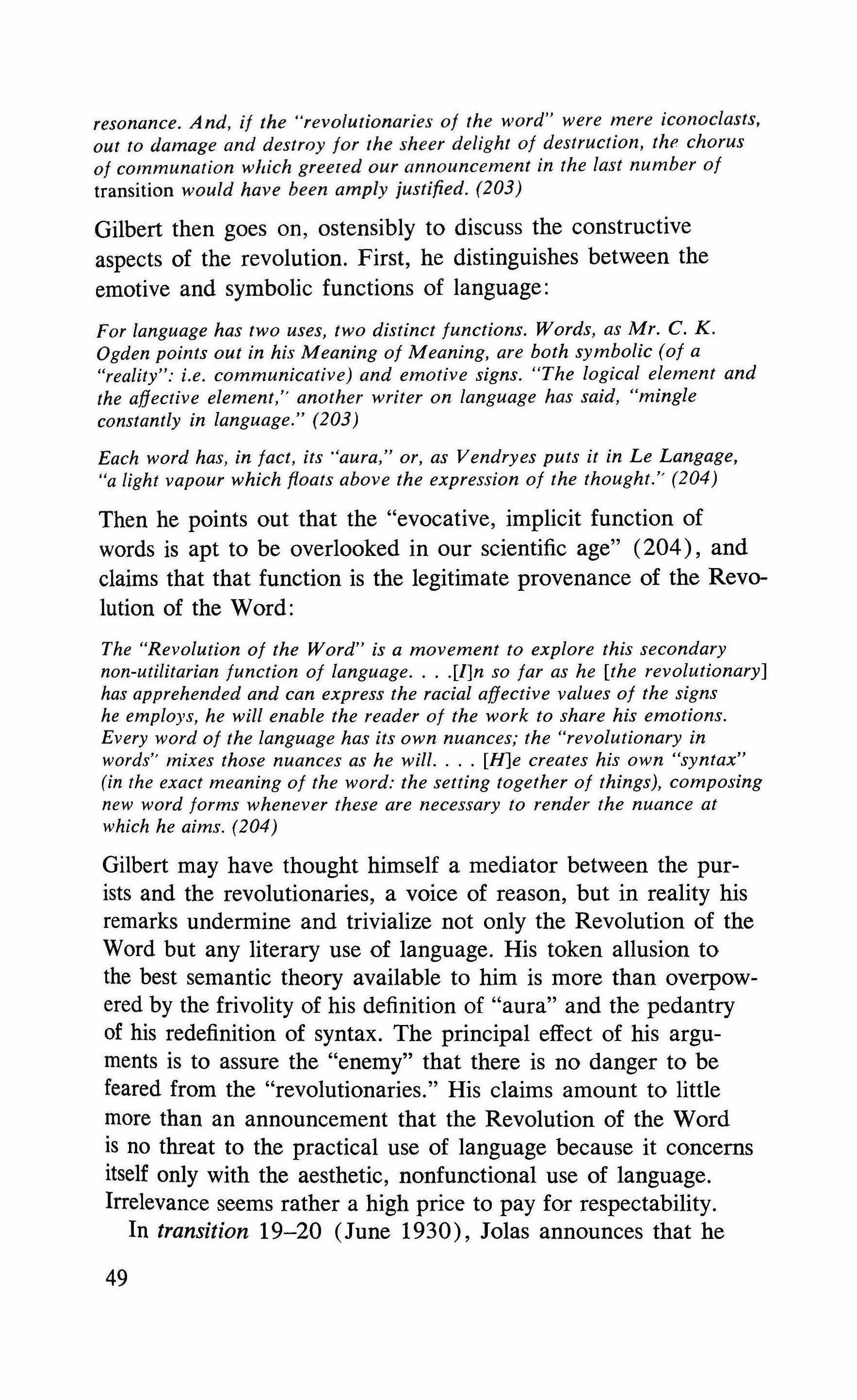
resonance. And, if the "revolutionaries of the word" were mere iconoclasts, out to damage and destroy for the sheer delight of destruction, the chorus of communation which greeted our announcement in the last number of transition would have been amply justified. (203)
Gilbert then goes on, ostensibly to discuss the constructive aspects of the revolution. First, he distinguishes between the emotive and symbolic functions of language:
For language has two uses, two distinct functions. Words, as Mr. C. K. Ogden points out in his Meaning of Meaning, are both symbolic (of a "reality": i.e. communicative) and emotive signs. "The logical element and the affective element," another writer on language has said, "mingle constantly in language." (203)
Each word has, in fact, its "aura," or, as Vendryes puts it in Le Langage, "a light vapour which floats above the expression of the thought." (204)
Then he points out that the "evocative, implicit function of words is apt to be overlooked in our scientific age" (204), and claims that that function is the legitimate provenance of the Revolution of the Word:
The "Revolution of the Word" is a movement to explore this secondary non-utilitarian function of language [J]n so far as he [the revolutionary] has apprehended and can express the racial affective values of the signs he employs, he will enable the reader of the work to share his emotions. Every word of the language has its own nuances; the "revolutionary in words" mixes those nuances as he will [RJe creates his own "syntax" (in the exact meaning of the word: the setting together of things), composing new word forms whenever these are necessary to render the nuance at which he aims. (204)
Gilbert may have thought himself a mediator between the purists and the revolutionaries, a voice of reason, but in reality his remarks undermine and trivialize not only the Revolution of the Word but any literary use of language. His token allusion to the best semantic theory available to him is more than overpowered by the frivolity of his definition of "aura" and the pedantry of his redefinition of syntax. The principal effect of his arguments is to assure the "enemy" that there is no danger to be feared from the "revolutionaries." His claims amount to little more than an announcement that the Revolution of the Word is no threat to the practical use of language because it concerns itself only with the aesthetic, nonfunctional use of language. Irrelevance seems rather a high price to pay for respectability. In transition 19-20 (June 1930), Jolas announces that he
49
will suspend the publication of transition indefinitely. In "The King's English Is Dying: Long Live the American Language," he declares, Nixon-like, that the revolution is suceeding:
The mechanical acceptance of language which pedantic philology and utilitarian literature continues to force upon the writer is drawing to a close. The struggle to give the poet unlimited liberty to recreate each word in his own image is still going on, but a new sense of the word which professors, newspapers and novelists have abused to the point of sterility is now developing and a modern mythos of language is being established.
When Jolas revived transition two years later, he continued to serialize "Work in Progress," but Joyce was no longer so important a part of the magazine. In fact, there is one issue in which his name is not even mentioned. Jolas spreads himself thin. He gets involved with myths, paramyths, and anamyths, with orphic signs and chthonian grammar, with dreams, the collective unconscious, the night-mind and night language, to say nothing of meta-anthropological and other crises. He invents a new philosophy, Vertigralism, which incorporates all his concerns, including the Revolution of the Word.
Still, a couple of things in the post-lapsarian transition are worth noting. One is The Revolution of the Word Dictionary. In transition 21 (March 1932), Jolas began publishing "wanted" posters, one of which is:
WANTED: A NEW COMMUNICATIVE LANGUAGE
The old words have reached the age of retirement. Let us pension them off! We need a twentieth century dictionary. (285)
Jolas published two installments of the new dictionary, the first in transition 22 (February 1933), the second in transition 23 (July 1935). In both installments, Joyce's creations head the list of entries:
constation couchmare mielodorous Dance McCaper returningties
lu]t sojestiveness gawk gnutsch

a statement of concrete fact nightmare cauchemar honeyed emphasis of odorous an Irisn danse macabre eternities cycles turning upon themselves the serpent that bites its own tail (123)
air picaresque suggestiveness to look sheepishly to smack one's lips (122)
50
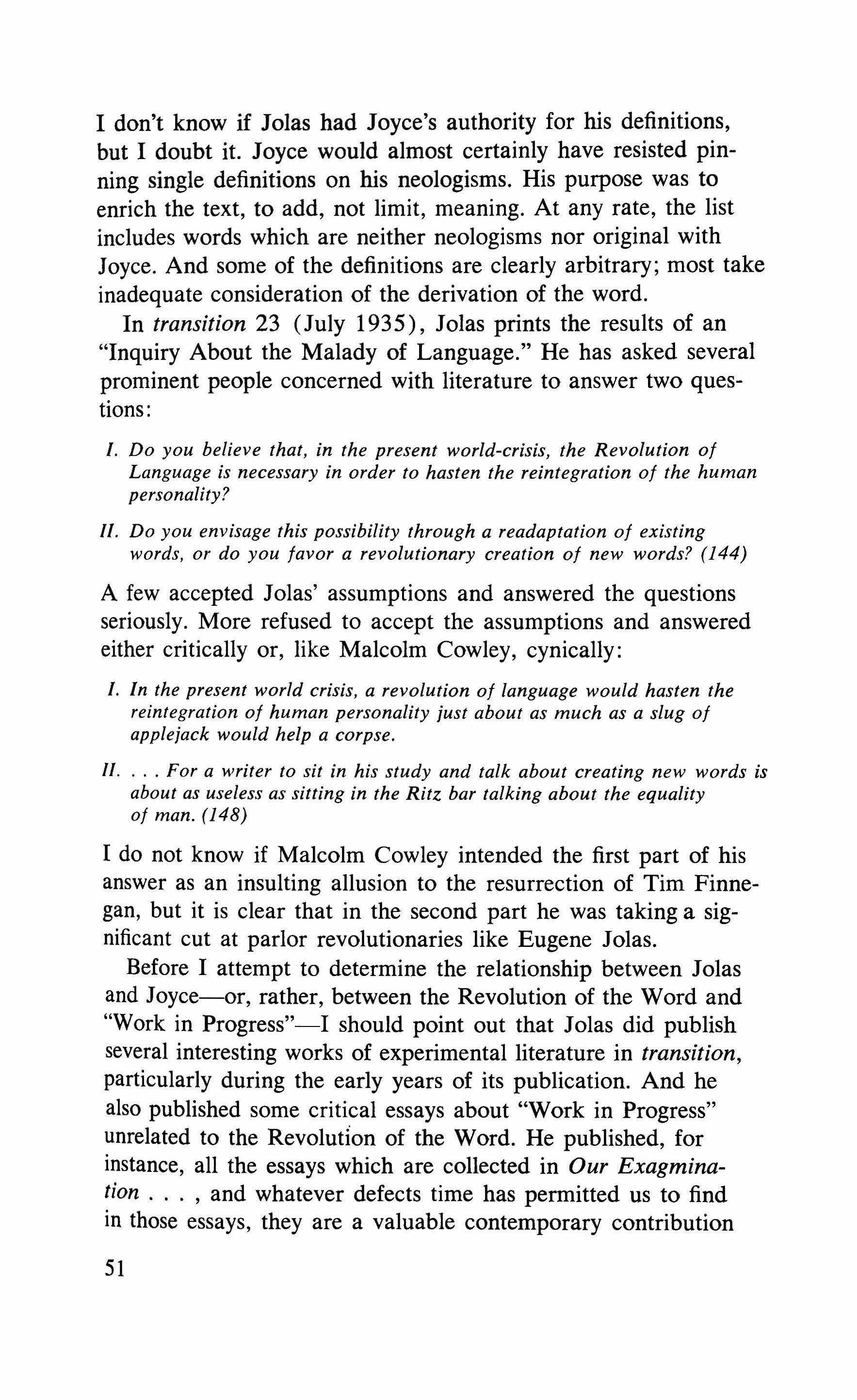
I don't know if Jolas had Joyce's authority for his definitions, but I doubt it. Joyce would almost certainly have resisted pinning single definitions on his neologisms. His purpose was to enrich the text, to add, not limit, meaning. At any rate, the list includes words which are neither neologisms nor original with Joyce. And some of the definitions are clearly arbitrary; most take inadequate consideration of the derivation of the word.
In transition 23 (July 1935), Jolas prints the results of an "Inquiry About the Malady of Language." He has asked several prominent people concerned with literature to answer two questions:
I. Do you believe that, in the present world-crisis, the Revolution of Language is necessary in order to hasten the reintegration of the human personality?
II. Do you envisage this possibility through a readaptation of existing words, or do you favor a revolutionary creation of new words? (144)
A few accepted Jolas' assumptions and answered the questions seriously. More refused to accept the assumptions and answered either critically or, like Malcolm Cowley, cynically:
I. In the present world crisis, a revolution of language would hasten the reintegration of human personality just about as much as a slug of applejack would help a corpse.
/I For a writer to sit in his study and talk about creating new words is about as useless as sitting in the Ritz bar talking about the equality of man. (148)
I do not know if Malcolm Cowley intended the first part of his answer as an insulting allusion to the resurrection of Tim Finnegan, but it is clear that in the second part he was taking a significant cut at parlor revolutionaries like Eugene Jolas.
Before I attempt to determine the relationship between Jolas and Joyce-or, rather, between the Revolution of the Word and "Work in Progress"-I should point out that Jolas did publish several interesting works of experimental literature in transition, particularly during the early years of its publication. And he also published some critical essays about "Work in Progress" unrelated to the Revolution of the Word. He published, for instance, all the essays which are collected in Our Exagmination and whatever defects time has permitted us to find in those essays, they are a valuable contemporary contribution
51
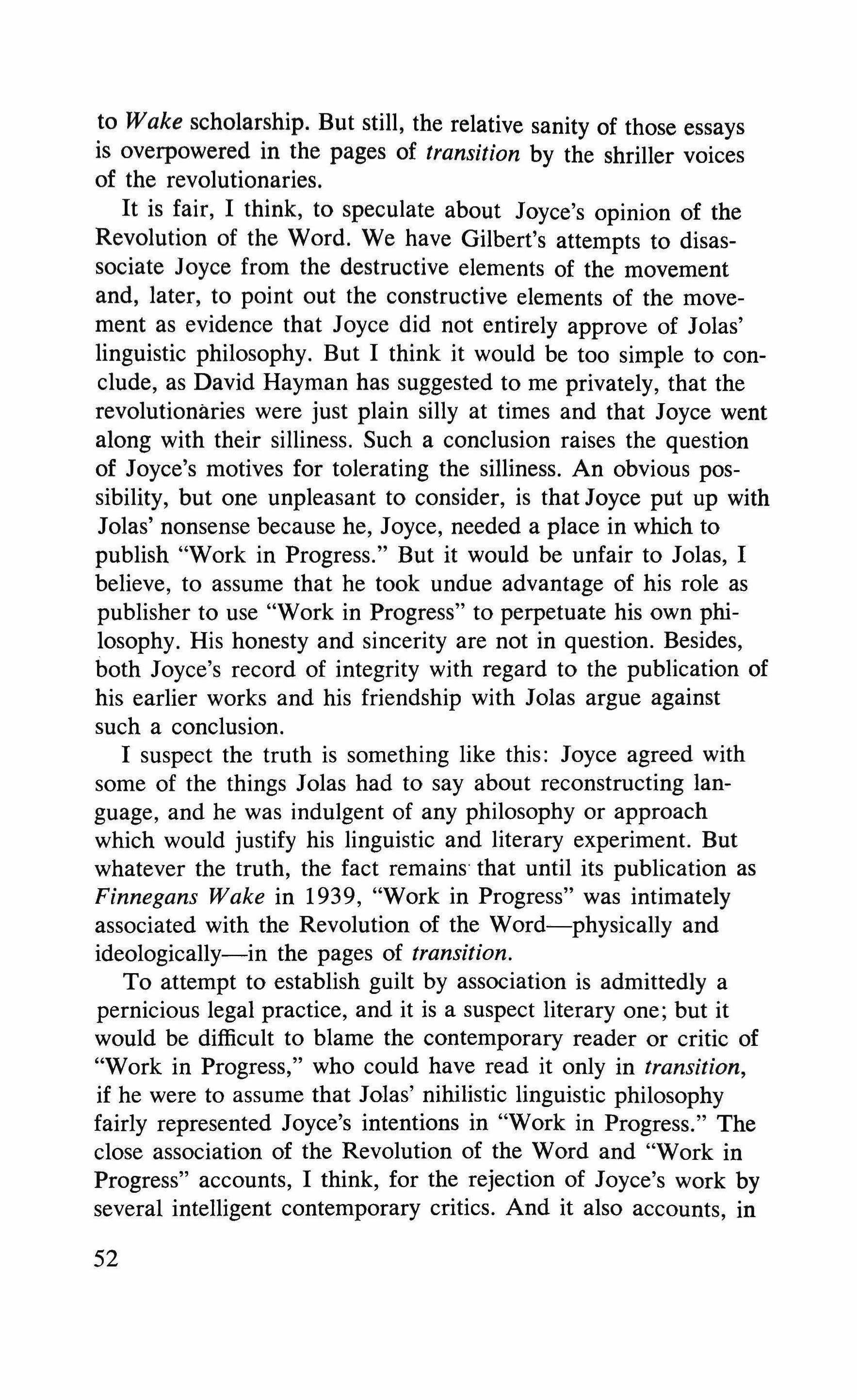
to Wake scholarship. But still, the relative sanity of those essays is overpowered in the pages of transition by the shriller voices of the revolutionaries.
It is fair, I think, to speculate about Joyce's opinion of the Revolution of the Word. We have Gilbert's attempts to disassociate Joyce from the destructive elements of the movement and, later, to point out the constructive elements of the movement as evidence that Joyce did not entirely approve of Jolas' linguistic philosophy. But I think it would be too simple to conclude, as David Hayman has suggested to me privately, that the revolutionaries were just plain silly at times and that Joyce went along with their silliness. Such a conclusion raises the question of Joyce's motives for tolerating the silliness. An obvious possibility, but one unpleasant to consider, is that Joyce put up with Jolas' nonsense because he, Joyce, needed a place in which to publish "Work in Progress." But it would be unfair to Jolas, I believe, to assume that he took undue advantage of his role as publisher to use "Work in Progress" to perpetuate his own philosophy. His honesty and sincerity are not in question. Besides, both Joyce's record of integrity with regard to the publication of his earlier works and his friendship with Jolas argue against such a conclusion.
I suspect the truth is something like this: Joyce agreed with some of the things Jolas had to say about reconstructing language, and he was indulgent of any philosophy or approach which would justify his linguistic and literary experiment. But whatever the truth, the fact remains' that until its publication as Finnegans Wake in 1939, "Work in Progress" was intimately associated with the Revolution of the Word-physically and ideologically-in the pages of transition.
To attempt to establish guilt by association is admittedly a pernicious legal practice, and it is a suspect literary one; but it would be difficult to blame the contemporary reader or critic of "Work in Progress," who could have read it only in transition, if he were to assume that Jolas' nihilistic linguistic philosophy fairly represented Joyce's intentions in "Work in Progress." The close association of the Revolution of the Word and "Work in Progress" accounts, I think, for the rejection of Joyce's work by several intelligent contemporary critics. And it also accounts, in
52
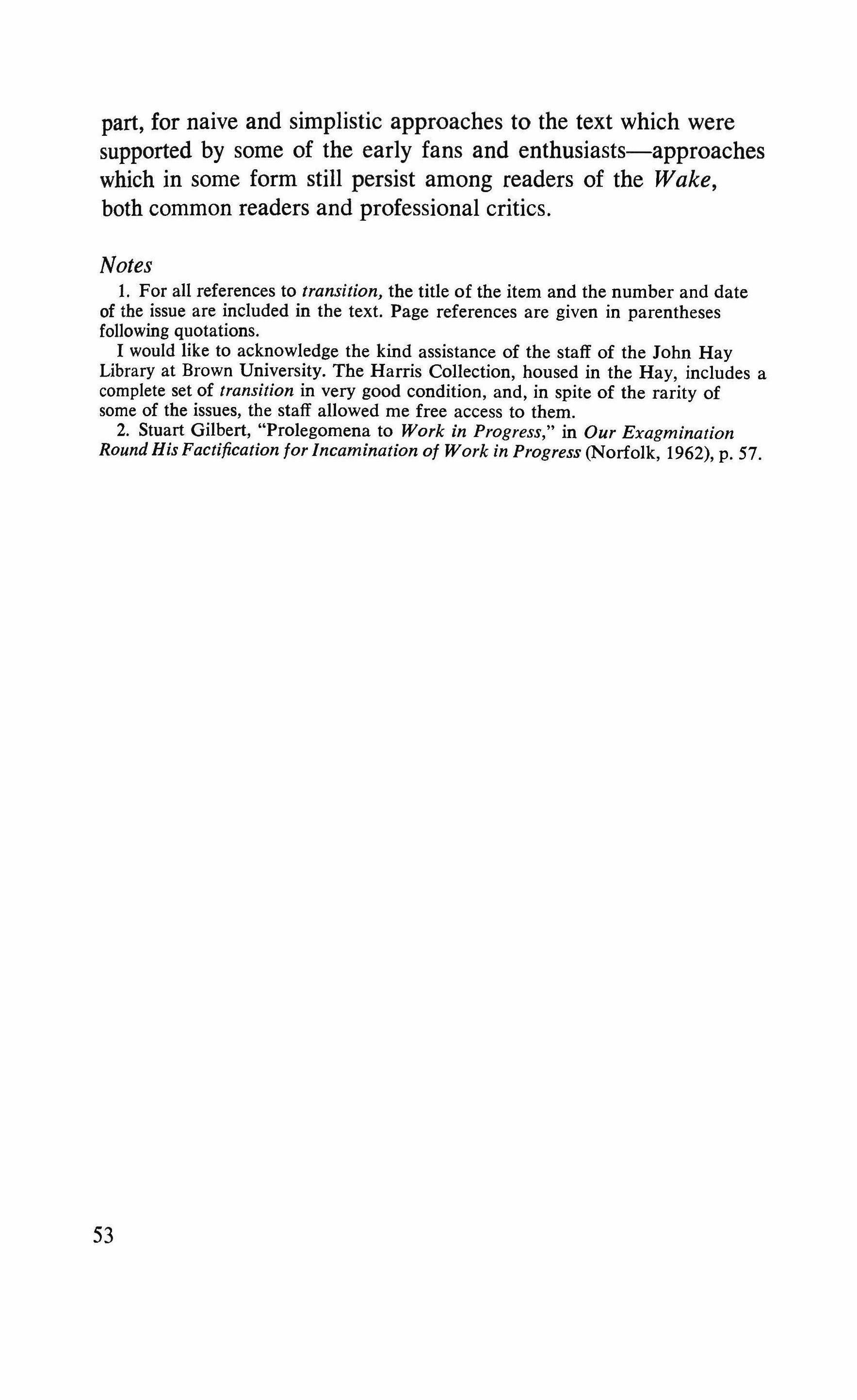
part, for naive and simplistic approaches to the text which were supported by some of the early fans and enthusiasts-approaches which in some form still persist among readers of the Wake, both common readers and professional critics.
Notes
1. For all references to transition, the title of the item and the number and date of the issue are included in the text. Page references are given in parentheses following quotations.
I would like to acknowledge the kind assistance of the staff of the John Hay Library at Brown University. The Harris Collection, housed in the Hay, includes a complete set of transition in very good condition, and, in spite of the rarity of some of the issues, the staff allowed me free access to them.
2. Stuart Gilbert, "Prolegomena to Work in Progress," in Our Exagmination Round His Factification for Incamination of Work in Progress (Norfolk, 1962), p. 57.
53
Sanscreed latinized: the Wake in Brazil and hispanic America
Haroldo de Campos
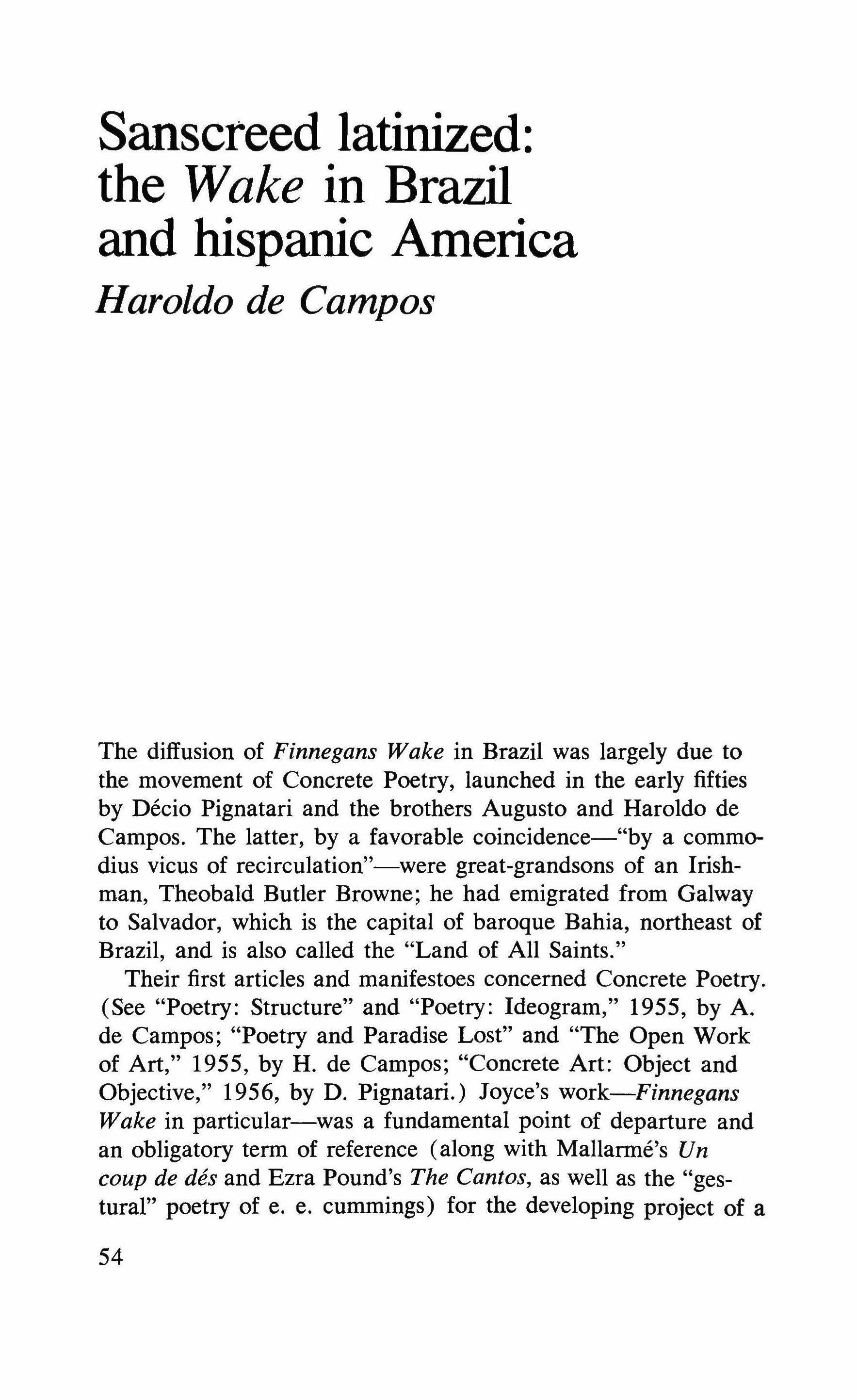
The diffusion of Finnegans Wake in Brazil was largely due to the movement of Concrete Poetry, launched in the early fifties by Decio Pignatari and the brothers Augusto and Haroldo de Campos. The latter, by a favorable coincidence-"by a commodius vicus of recirculation"-were great-grandsons of an Irishman, Theobald Butler Browne; he had emigrated from Galway to Salvador, which is the capital of baroque Bahia, northeast of Brazil, and is also called the "Land of All Saints." Their first articles and manifestoes concerned Concrete Poetry. (See "Poetry: Structure" and "Poetry: Ideogram," 1955, by A. de Campos; "Poetry and Paradise Lost" and "The Open Work of Art," 1955, by H. de Campos; "Concrete Art: Object and Objective," 1956, by D. Pignatari.) Joyce's work-Finnegans Wake in particular-was a fundamental point of departure and an obligatory term of reference (along with Mallarme's Un coup de des and Ezra Pound's The Cantos, as well as the "gestural" poetry of e. e. cummings) for the developing project of a
54
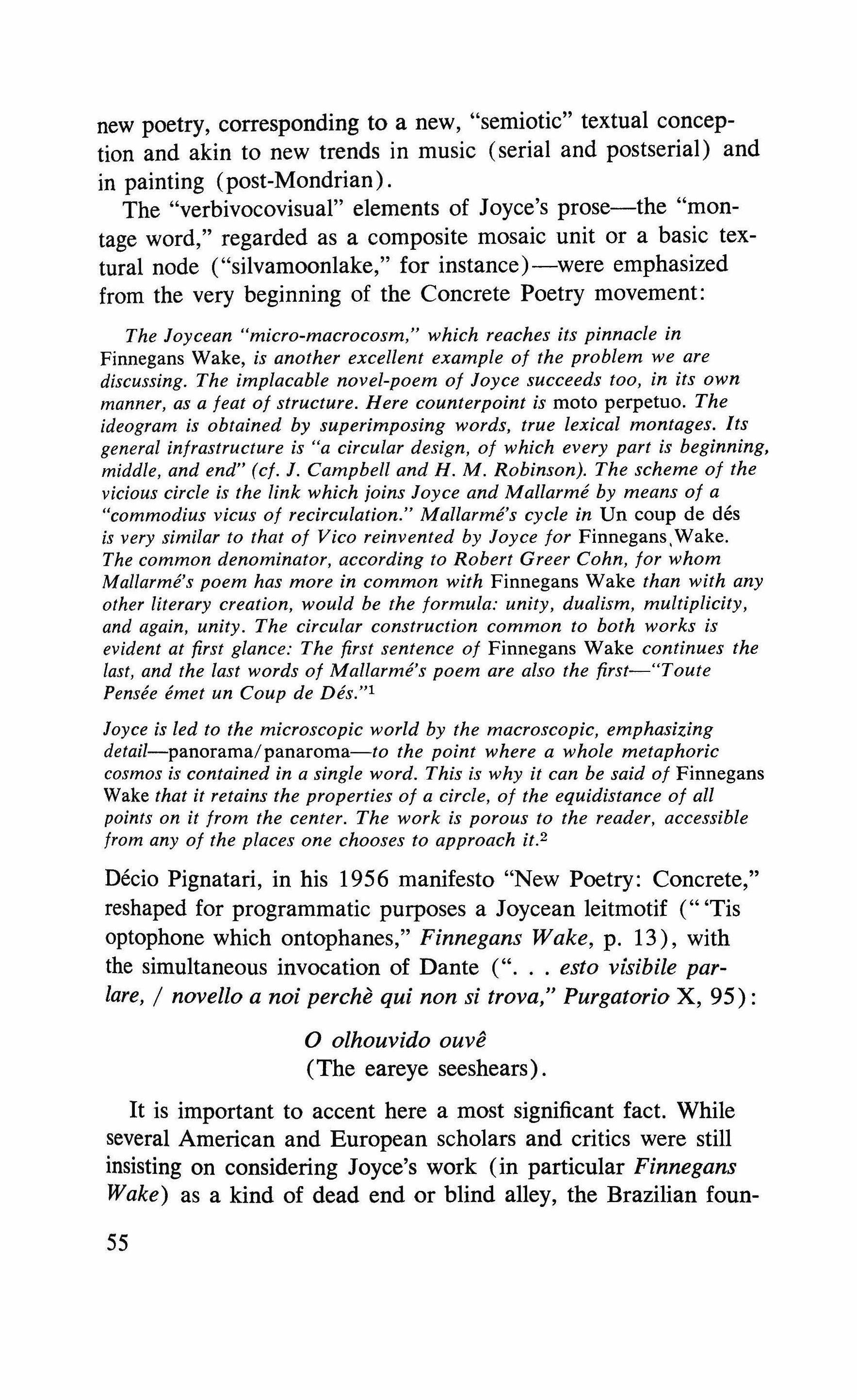
new poetry, corresponding to anew, "semiotic" textual conception and akin to new trends in music (serial and postserial) and in painting (post-Mondrian).
The "verbivocovisual" elements of Joyce's prose-the "montage word," regarded as a composite mosaic unit or a basic textural node ("silvamoonlake," for instance)-were emphasized from the very beginning of the Concrete Poetry movement:
The Joycean "micro-macrocosm," which reaches its pinnacle in Finnegans Wake, is another excellent example of the problem we are discussing. The implacable novel-poem of Joyce succeeds too, in its own manner, as a feat of structure. Here counterpoint is mota perpetuo. The ideogram is obtained by superimposing words, true lexical montages. Its general infrastructure is "a circular design, of which every part is beginning, middle, and end" (cf. J. Campbell and H. M. Robinson). The scheme of the vicious circle is the link which joins Joyce and Mallarme by means of a "commodius vicus of recirculation." Mallarme's cycle in Un coup de des is very similar to that of Vico reinvented by Joyce for FinnegansWake. The common denominator, according to Robert Greer Cohn, for whom Mallarme's poem has more in common with Finnegans Wake than with any other literary creation, would be the formula: unity, dualism, multiplicity, and again, unity. The circular construction common to both works is evident at first glance: The first sentence of Finnegans Wake continues the last, and the last words of Mallarme's poem are also the first=-t'Toute Pensee emet un Coup de Des."!
Joyce is led to the microscopic world by the macroscopic, emphasizing detail-panorama/panaroma-to the point where a whole metaphoric cosmos is contained in a single word. This is why it can be said of Finnegans Wake that it retains the properties of a circle, of the equidistance of all points on it from the center. The work is porous to the reader, accessible from any of the places one chooses to approach it.2
Decio Pignatari, in his 1956 manifesto "New Poetry: Concrete," reshaped for programmatic purposes a Joycean leitmotif (" 'Tis optophone which ontophanes," Finnegans Wake, p. 13), with the simultaneous invocation of Dante (" esto visibile parlare, / novella a noi perche qui non si trova," Purgatorio X, 95):
o olhouvido ouve (The eareye seeshears).
It is important to accent here a most significant fact. While several American and European scholars and critics were still insisting on considering Joyce's work (in particular Finnegans Wake) as a kind of dead end or blind alley, the Brazilian foun-
55
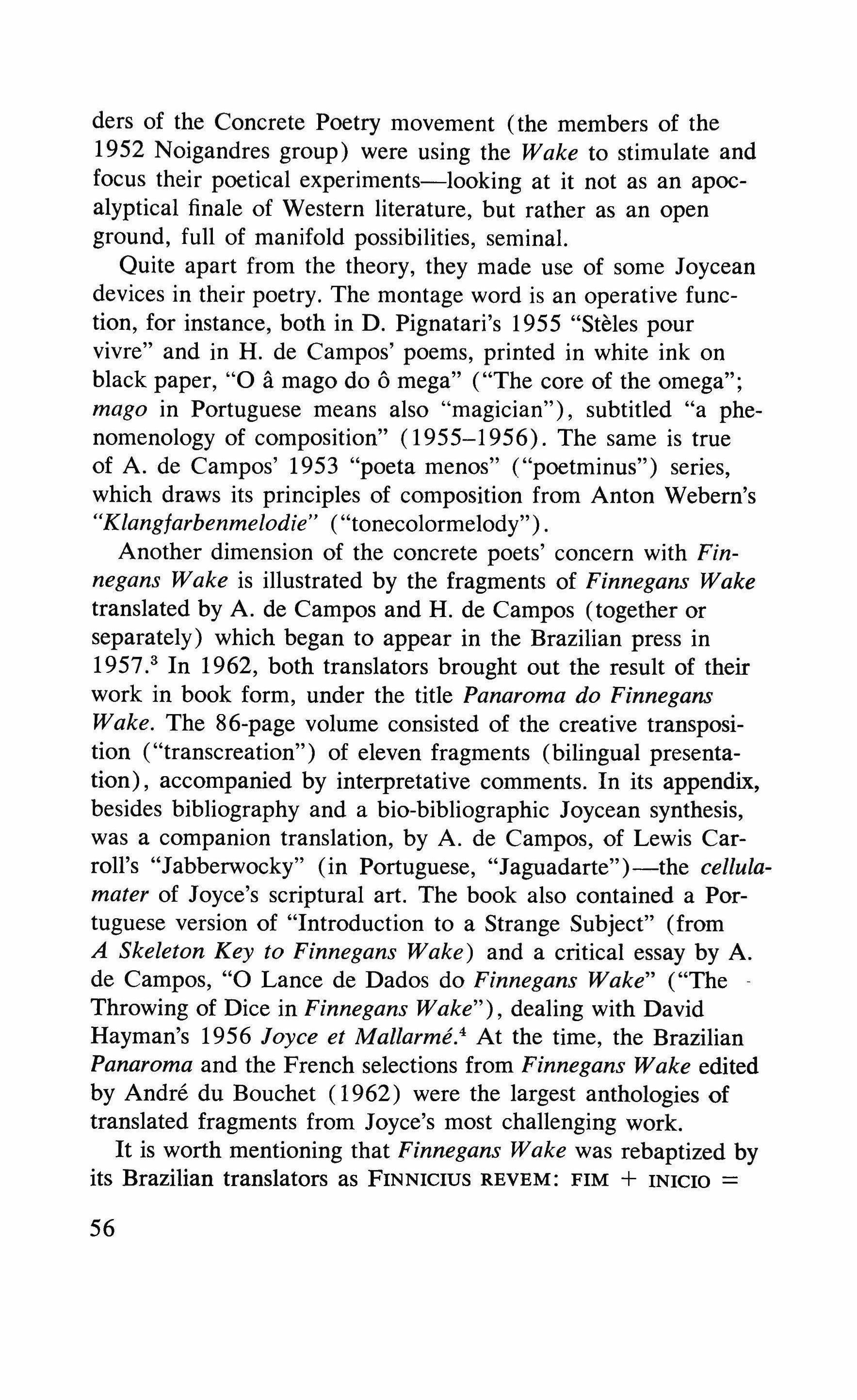
ders of the Concrete Poetry movement (the members of the 1952 Noigandres group) were using the Wake to stimulate and focus their poetical experiments-looking at it not as an apocalyptical finale of Western literature, but rather as an open ground, full of manifold possibilities, seminal.
Quite apart from the theory, they made use of some Joycean devices in their poetry. The montage word is an operative function, for instance, both in D. Pignatari's 1955 "Steles pour vivre" and in H. de Campos' poems, printed in white ink on black paper, "0 a mago do 0 mega" ("The core of the omega"; mago in Portuguese means also "magician"), subtitled "a phenomenology of composition" (1955-1956). The same is true of A. de Campos' 1953 "poeta menos" ("poetminus") series, which draws its principles of composition from Anton Webern's "Klangjarbenmelodie" ("tonecolormelody").
Another dimension of the concrete poets' concern with Finnegans Wake is illustrated by the fragments of Finnegans Wake translated by A. de Campos and H. de Campos (together or separately) which began to appear in the Brazilian press in 1957.3 In 1962, both translators brought out the result of their work in book form, under the title Panaroma do Finnegans Wake. The 86-page volume consisted of the creative transposition ("transcreation") of eleven fragments (bilingual presentation), accompanied by interpretative comments. In its appendix, besides bibliography and a bio-bibliographic Joycean synthesis, was a companion translation, by A. de Campos, of Lewis Carroll's "Jabberwocky" (in Portuguese, "Jaguadarte")-the cellulamater of Joyce's scriptural art. The book also contained a Portuguese version of "Introduction to a Strange Subject" (from A Skeleton Key to Finnegans Wake) and a critical essay by A. de Campos, "0 Lance de Dados do Finnegans Wake" ("TheThrowing of Dice in Finnegans Wake"), dealing with David Hayman's 1956 Joyce et Mallarme,' At the time, the Brazilian Panaroma and the French selections from Finnegans Wake edited by Andre du Bouchet (1962) were the largest anthologies of translated fragments from Joyce's most challenging work. It is worth mentioning that Finnegans Wake was rebaptized by its Brazilian translators as FINNICIUS REVEM: FIM + INICIO =
56
END + BEGINNING, onomastically resounding with an echo of both FINN and VINICIUS. The latter is a latinized Portuguese proper name which carries a hint of vinho / vinum wine; RE (AGAIN) + VEM (COMES).
In 1962, Pignatari wrote one of his most ambitious "steles": No.3, "Cuban stele." It is a "mural poem," a condensed epic pivoting about three typographically marked axes (phrases intermittently in Latin, English, and Portuguese), which reproduces bits of the fable "The Wolf and the Lamb" ("Lupus et Agnus"). The three "major syntagms" that semantically and visually govern the entire composition are the following:
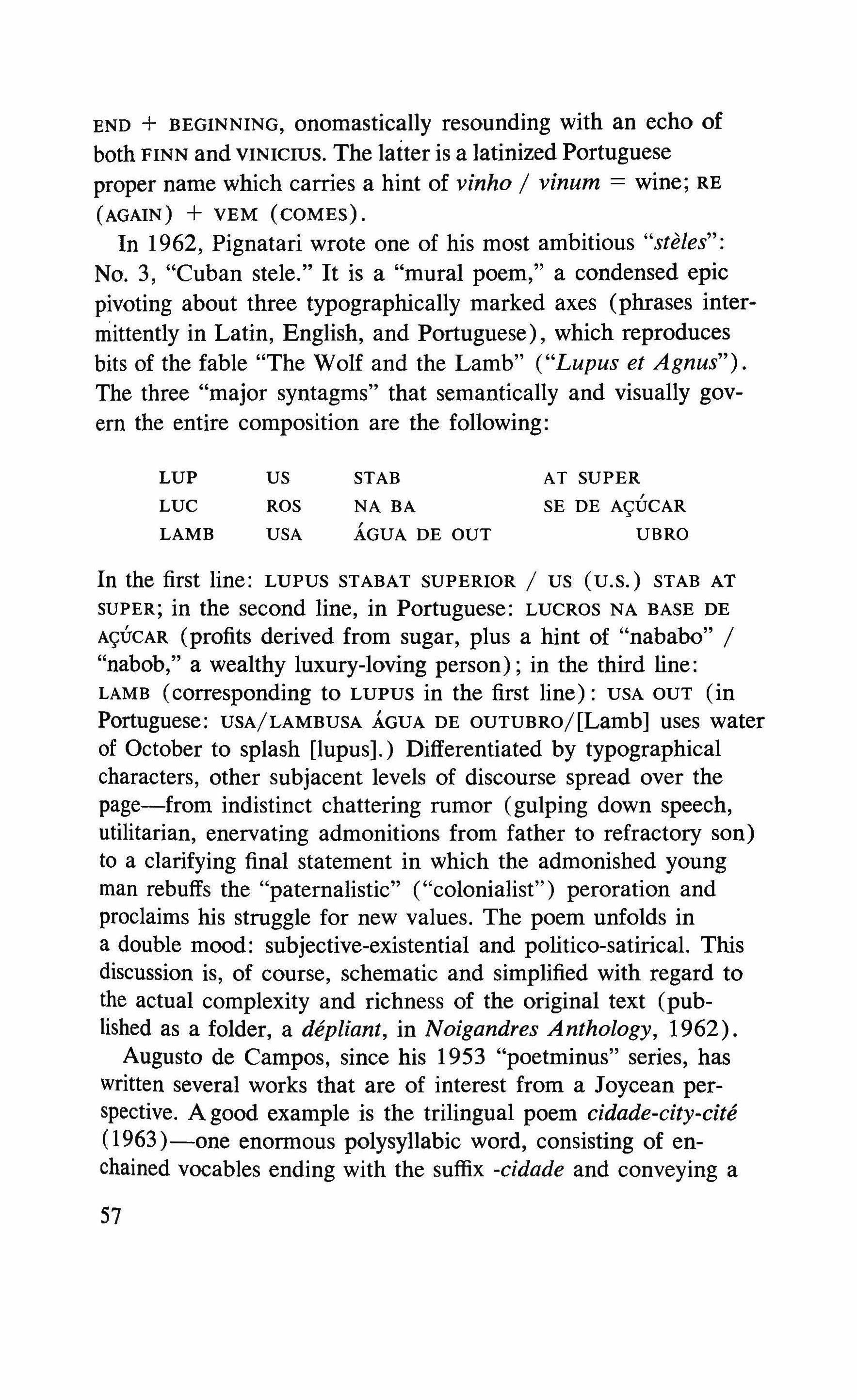
In the first line: LUPUS STABAT SUPERIOR / US (U.S.) STAB AT SUPER; in the second line, in Portuguese: LUCROS NA BASE DE A9UCAR (profits derived from sugar, plus a hint of "nababo" / "nabob," a wealthy luxury-loving person); in the third line: LAMB (corresponding to LUPUS in the first line): USA OUT (in Portuguese: USA/LAMBUSA AGUA DE OUTUBRo/[Lamb] uses water of October to splash [lupus].) Differentiated by typographical characters, other subjacent levels of discourse spread over the page-from indistinct chattering rumor (gulping down speech, utilitarian, enervating admonitions from father to refractory son) to a clarifying final statement in which the admonished young man rebuffs the "paternalistic" ("colonialist") peroration and proclaims his struggle for new values. The poem unfolds in a double mood: subjective-existential and politico-satirical. This discussion is, of course, schematic and simplified with regard to the actual complexity and richness of the original text (published as a folder, a depliant, in Noigandres Anthology, 1962). Augusto de Campos, since his 1953 "poetminus" series, has written several works that are of interest from a Joycean perspective. A good example is the trilingual poem cidade-city-cite (1963)-one enormous polysyllabic word, consisting of enchained vocables ending with the suffix -cidade and conveying a
LUP
US ROS USA STAB NA BA
AT SUPER SE DE AyUCAR
LUC LAMB
AGUA DE OUT
UBRO
57
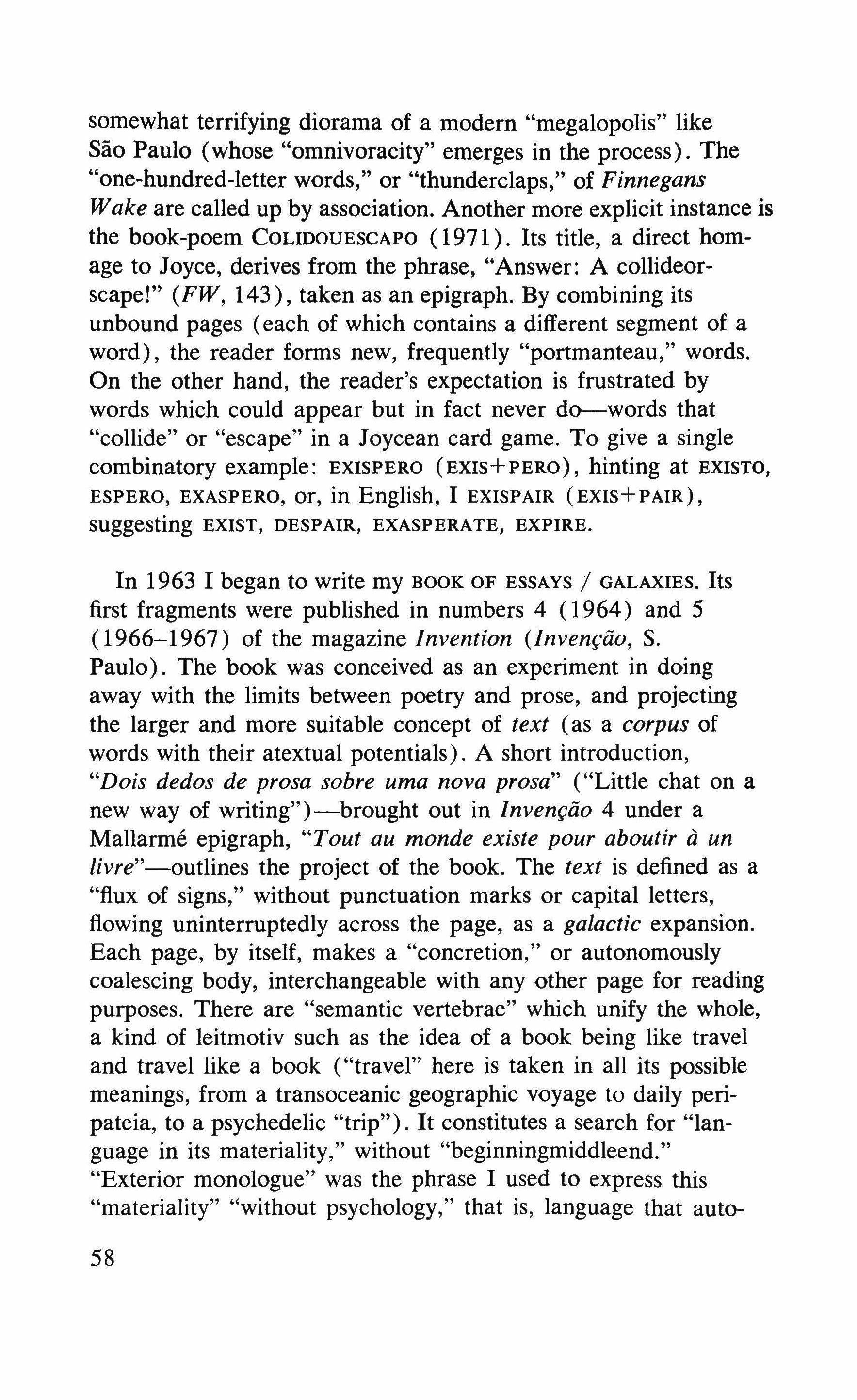
somewhat terrifying diorama of a modern "megalopolis" like Sao Paulo (whose "omnivoracity" emerges in the process). The "one-hundred-letter words," or "thunderclaps," of Finnegans Wake are called up by association. Another more explicit instance is the book-poem COLIDOUESCAPO (1971). Its title, a direct homage to Joyce, derives from the phrase, "Answer: A collideorscape!" (FW, 143), taken as an epigraph. By combining its unbound pages (each of which contains a different segment of a word), the reader forms new, frequently "portmanteau," words. On the other hand, the reader's expectation is frustrated by words which could appear but in fact never do--words that "collide" or "escape" in a Joycean card game. To give a single combinatory example: EXISPERO (EXIS+PERO), hinting at EXISTO, ESPERO, EXASPERO, or, in English, I EXISPAIR (EXIS+PAIR), suggesting EXIST, DESPAIR, EXASPERATE, EXPIRE.
In 1963 I began to write my BOOK OF ESSAYS / GALAXIES. Its first fragments were published in numbers 4 (1964) and 5 (1966-1967) of the magazine Invention (Invenciio, S. Paulo). The book was conceived as an experiment in doing away with the limits between poetry and prose, and projecting the larger and more suitable concept of text (as a corpus of words with their atextual potentials). A short introduction, "Dois dedos de prosa sobre uma nova prosa" ("Little chat on a new way of writing")-brought out in lnvenciio 4 under a Mallarme epigraph, "Tout au monde existe pour aboutir a un livre"-outlines the project of the book. The text is defined as a "flux of signs," without punctuation marks or capital letters, flowing uninterruptedly across the page, as a galactic expansion. Each page, by itself, makes a "concretion," or autonomously coalescing body, interchangeable with any other page for reading purposes. There are "semantic vertebrae" which unify the whole, a kind of leitmotiv such as the idea of a book being like travel and travel like a book ("travel" here is taken in all its possible meanings, from a transoceanic geographic voyage to daily peripateia, to a psychedelic "trip"). It constitutes a search for "language in its materiality," without "beginningmiddleend." "Exterior monologue" was the phrase I used to express this "materiality" "without psychology," that is, language that auto-
58
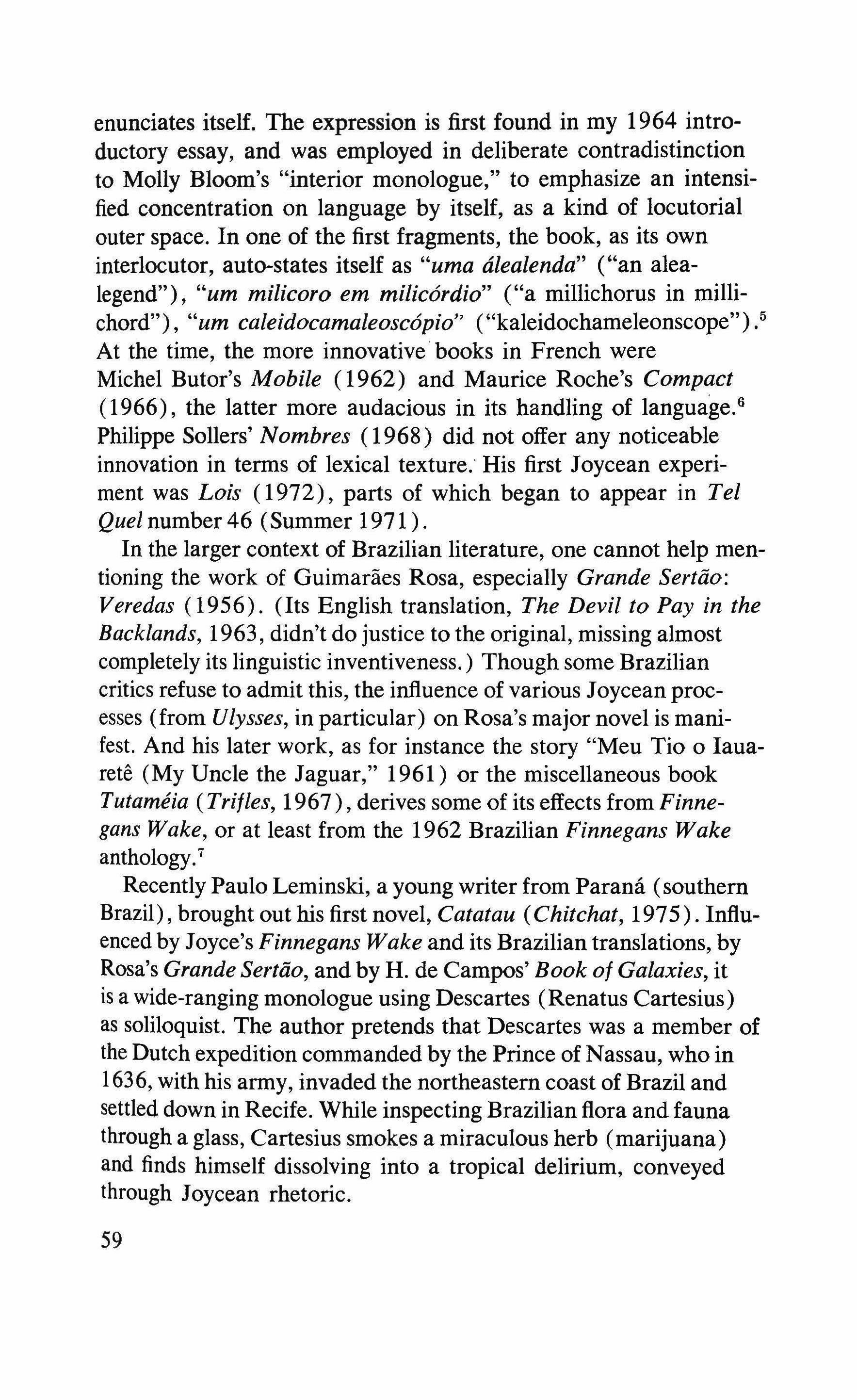
enunciates itself. The expression is first found in my 1964 introductory essay, and was employed in deliberate contradistinction to Molly Bloom's "interior monologue," to emphasize an intensified concentration on language by itself, as a kind of locutorial outer space. In one of the first fragments, the book, as its own interlocutor, auto-states itself as "uma dlealenda" ("an alealegend"), "um milicoro em milicordio" ("a millichorus in millichord"), "um caleidocamaleoscopio' ("kaleidochameleonscope").5 At the time, the more innovative books in French were Michel Butor's Mobile (1962) and Maurice Roche's Compact ( 1966), the latter more audacious in its handling of language. 6 Philippe Sollers' Nombres (1968) did not offer any noticeable innovation in terms of lexical texture. His first Joycean experiment was Lois (1972), parts of which began to appear in Tel Quel number 46 (Summer 1971 )
In the larger context of Brazilian literature, one cannot help mentioning the work of Guimaraes Rosa, especially Grande Sertiio: Veredas (1956). (Its English translation, The Devil to Pay in the Backlands, 1963, didn't do justice to the original, missing almost completely its linguistic inventiveness.) Though some Brazilian critics refuse to admit this, the influence of various Joycean processes (from Ulysses, in particular) on Rosa's major novel is manifest. And his later work, as for instance the story "Meu Tio 0 Iauarete (My Unele the Jaguar," 1961) or the miscellaneous book Tutameia (Trifles, 1967), derives some of its effects from Finnegans Wake, or at least from the 1962 Brazilian Finnegans Wake anthology. 7
Recently Paulo Leminski, a young writer from Parana (southern Brazil), brought out his first novel, Catatau (Chitchat, 1975). Influenced by Joyce's Finnegans Wake and its Brazilian translations, by Rosa's Grande Sertiio, and by H. de Campos' Book of Galaxies, it is a wide-ranging monologue using Descartes (Renatus Cartesius) as soliloquist. The author pretends that Descartes was a member of the Dutch expedition commanded by the Prince of Nassau, who in 1636, with his army, invaded the northeastern coast of Brazil and settled down in Recife. While inspecting Brazilian flora and fauna through a glass, Cartesius smokes a miraculous herb (marijuana) and finds himself dissolving into a tropical delirium, conveyed through Joycean rhetoric.
59
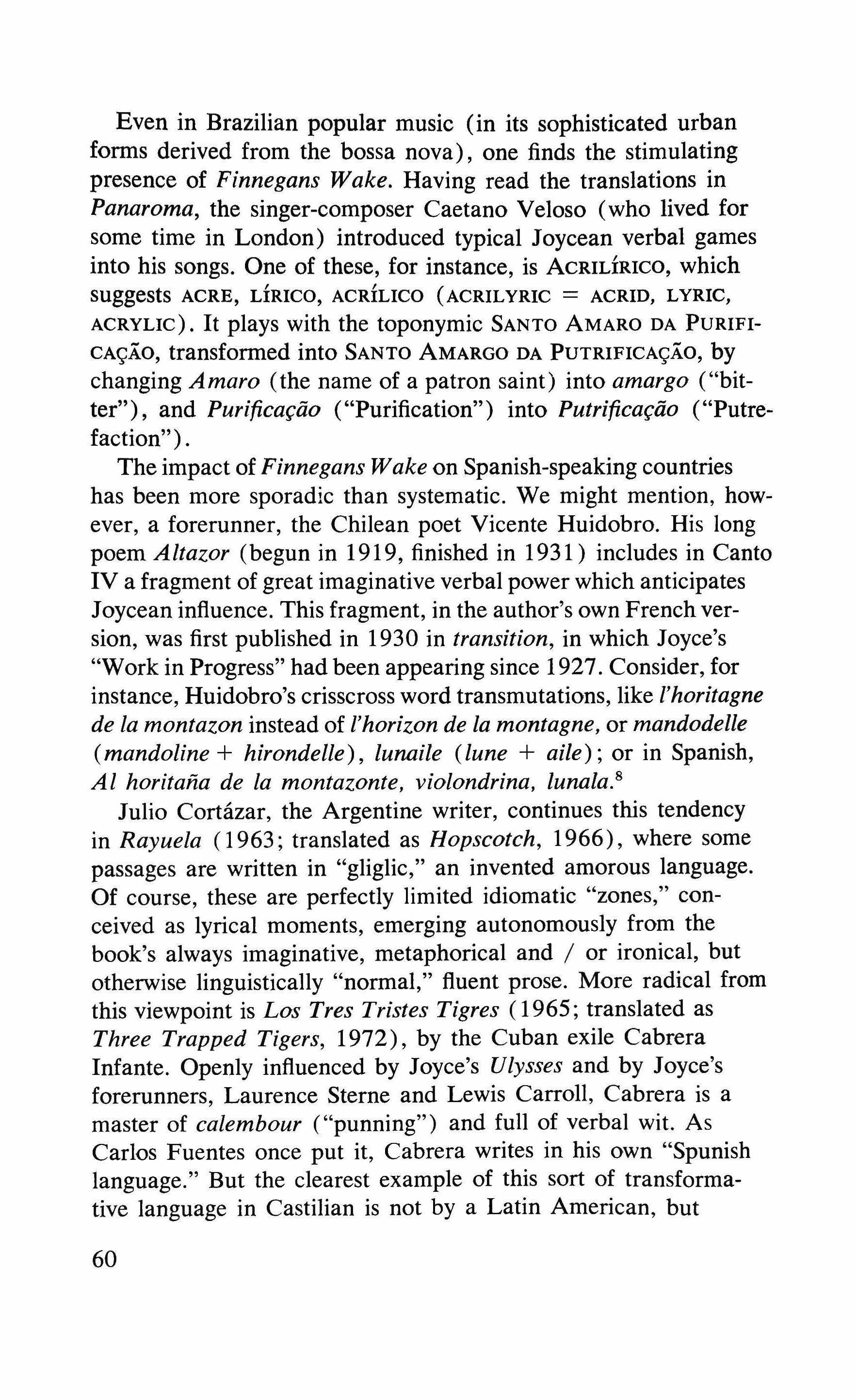
Even in Brazilian popular music (in its sophisticated urban forms derived from the bossa nova), one finds the stimulating presence of Finnegans Wake. Having read the translations in Panaroma, the singer-composer Caetano Veloso (who lived for some time in London) introduced typical Joycean verbal games into his songs. One of these, for instance, is ACRILIRICO, which suggests ACRE, LlRICO, ACRILICO (ACRILYRIC ACRID, LYRIC, ACRYLIC). It plays with the toponymic SANTO AMARO DA PURIFICA9AO, transformed into SANTO AMARGO DA PUTRIFICA9AO, by changing Amaro (the name of a patron saint) into amargo ("bitter"), and Purificacao ("Purification") into Putrificaciio ("Putrefaction")
The impact of Finnegans Wake on Spanish-speaking countries has been more sporadic than systematic. We might mention, however, a forerunner, the Chilean poet Vicente Huidobro. His long poem Altazor (begun in 1919, finished in 1931) includes in Canto IV a fragment of great imaginative verbal power which anticipates Joycean influence. This fragment, in the author's own French version, was first published in 1930 in transition, in which Joyce's "Work in Progress" had been appearing since 1927. Consider, for instance, Huidobro's crisscross word transmutations, like l'horitagne de fa montazon instead of l'horizon de la montagne, or mandodelle (mandoline + hirondelle), lunaile (lune + aile); or in Spanish, Al horitaiia de la montazonte, violondrina, lunala"
Julio Cortazar, the Argentine writer, continues this tendency in Rayuela (1963; translated as Hopscotch, 1966), where some passages are written in "gliglic," an invented amorous language. Of course, these are perfectly limited idiomatic "zones," conceived as lyrical moments, emerging autonomously from the book's always imaginative, metaphorical and / or ironical, but otherwise linguistically "normal," fluent prose. More radical from this viewpoint is Los Tres Tristes Tigres (1965; translated as Three Trapped Tigers, 1972), by the Cuban exile Cabrera Infante. Openly influenced by Joyce's Ulysses and by Joyce's forerunners, Laurence Sterne and Lewis Carroll, Cabrera is a master of calembour ("punning") and full of verbal wit. As Carlos Fuentes once put it, Cabrera writes in his own "Spunish language." But the clearest example of this sort of transformative language in Castilian is not by a Latin American, but
60
rather by a very gifted young Spanish writer living in Madrid and London, Julian Rios. Excerpts from his unfinished novel Larva were published in number 25 of Octavio Paz' magazine Plural (October 1973).
Given the above, one may question whether the labyrinthminded, paradox-loving old master Jorge LUIS Borges was not being ironical, when, in an interview for the Italian magazine 11 Verri (number 18, 1965), he called Finnegans Wake "a book entirely made up of compound-words." "In Spanish," he said, "this is not possible. It is possible in the German languages, maybe in Greek, a language I don't know. The principal virtue of Spanish, it seems to me, is a certain direct character. Spanish does not lend itself to excessively complex verbal games. At least, in my opinion." But he quickly pointed to an exception in Quevedo's "efforts to introduce Latin effects into Spanish" (" a most arduous task Quevedo was a genius, a great poet"), strategically omitting any mention of the Daedalian "prince of darkness" of Spanish letters, Don LUIS de Gongora y Argote.(I
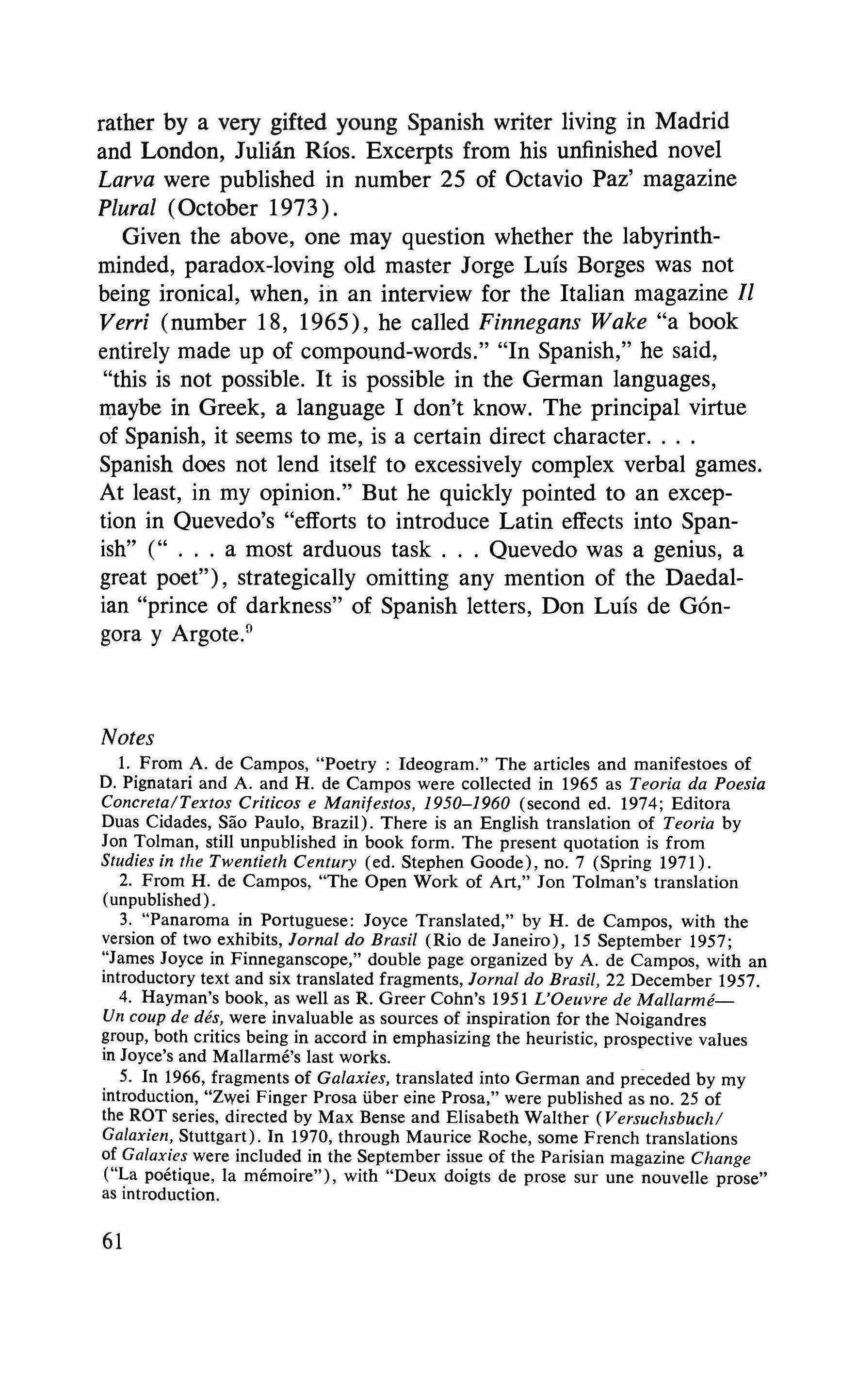
Notes
1. From A. de Campos, "Poetry: Ideogram." The articles and manifestoes of D. Pignatari and A. and H. de Campos were collected in 1965 as Teoria da Poesia ConcretalTextos Criticos e Manifestos, 1950-1960 (second ed. 1974; Editora Duas Cidades, Sao Paulo, Brazil). There is an English translation of Teoria by Jon Tolman, still unpublished in book form. The present quotation is from Studies in the Twentieth Century (ed. Stephen Goode), no. 7 (Spring 1971).
2. From H. de Campos, "The Open Work of Art," Jon Tolman's translation (unpublished)
3. "Panaroma in Portuguese: Joyce Translated," by H. de Campos, with the version of two exhibits, Iornal do Brasil (Rio de Janeiro), 15 September 1957; "James Joyce in Finneganscope," double page organized by A. de Campos, with an introductory text and six translated fragments, Iornal do Brasil, 22 December 1957.
4. Hayman's book, as well as R. Greer Cohn's 1951 L'Oeuvre de Mallarme-sUn coup de des, were invaluable as sources of inspiration for the Noigandres group, both critics being in accord in emphasizing the heuristic, prospective values in Joyce's and Mallarrne's last works.
5. In 1966, fragments of Galaxies, translated into German and preceded by my introduction, "Zwei Finger Prosa tiber eine Prosa," were published as no. 25 of the ROT series, directed by Max Bense and Elisabeth Walther (Versuchsbuclzl Galaxien, Stuttgart). In 1970, through Maurice Roche, some French translations of Galaxies were included in the September issue of the Parisian magazine Change ("La poetique, la rnernoire"), with "Deux doigts de prose sur une nouvelle prose" as introduction.
61
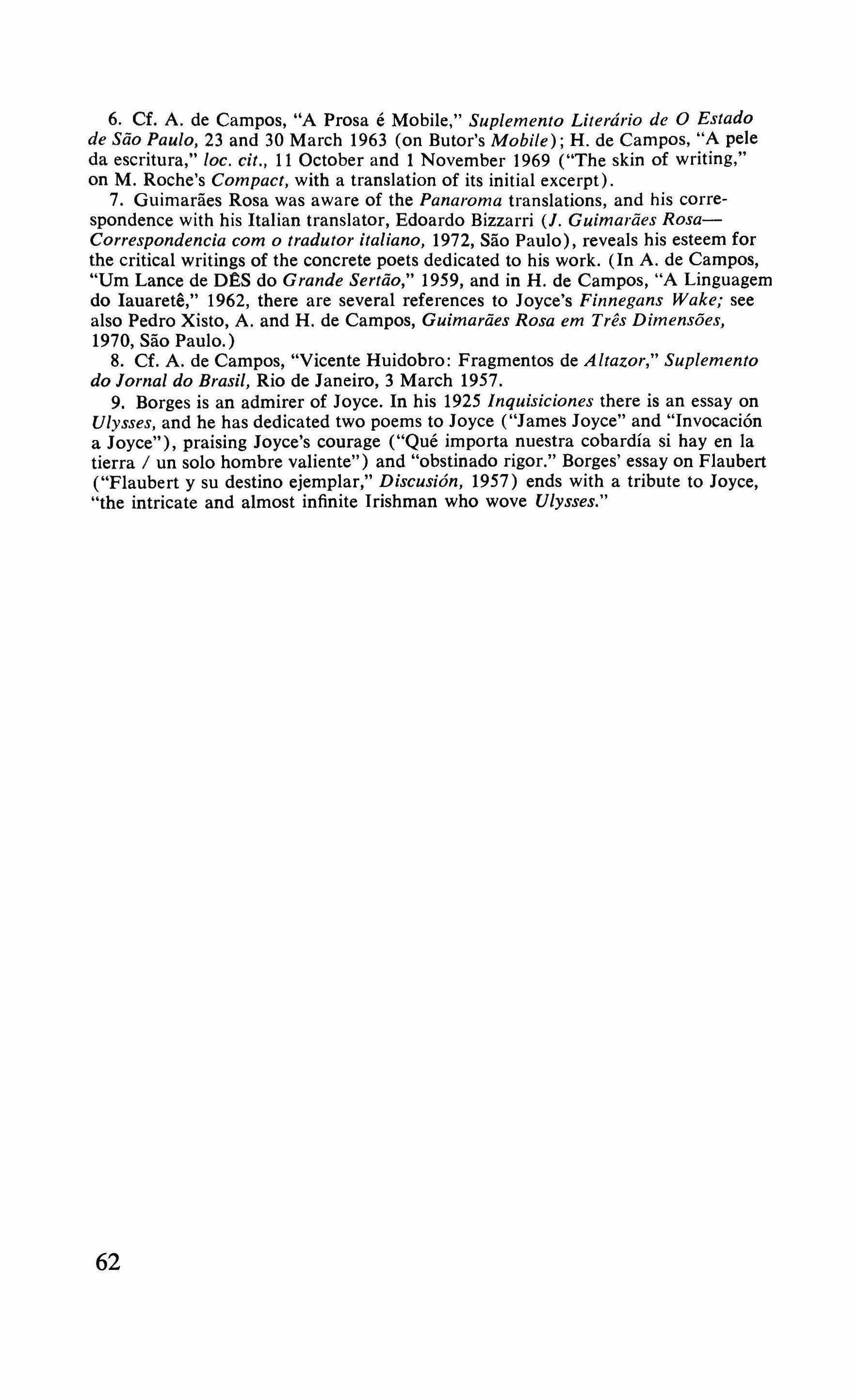
6. Cf. A. de Campos, "A Prosa e Mobile," Suplemento Literdrio de 0 Estado de Siio Paulo, 23 and 30 March 1963 (on Butor's Mobile); H. de Campos, "A pele da escritura," loco cit., 11 October and 1 November 1969 ("The skin of writing," on M. Roche's Compact, with a translation of its initial excerpt).
7. Guirnaraes Rosa was aware of the Panaroma translations, and his correspondence with his Italian translator, Edoardo Bizzarri (I. Guimariies RosaCorrespondencla com 0 tradutor italiano, 1972, Sao Paulo), reveals his esteem for the critical writings of the concrete poets dedicated to his work. (In A. de Campos, "Urn Lance de D£S do Grande Sertiio," 1959, and in H. de Campos, "A Linguagern do Iauarete," 1962, there are several references to Joyce's Flnnegans Wake; see also Pedro Xisto, A. and H. de Campos, Guimariies Rosa em Tres Dimensoes, 1970, Sao Paulo.)
8. Cf. A. de Campos, "Vicente Huidobro: Fragmentos de Altazor," Suplemento do Iornal do Brasil, Rio de Janeiro, 3 March 1957.
9. Borges is an admirer of Joyce. In his 1925 Inquisiciones there is an essay on Ulysses, and he has dedicated two poems to Joyce ("James Joyce" and "Invocacion a Joyce"), praising Joyce's courage ("Que importa nuestra cobardia si hay en la tierra / un solo hombre valiente") and "obstinado rigor." Borges' essay on Flaubert ("Flaubert y su destino ejemplar," Discusion, 1957) ends with a tribute to Joyce, "the intricate and almost infinite Irishman who wove Ulysses."
62
"atrocaducapacaustiduplielastifeliferofugahistoriloqualubrimendimultipliorganiperiodiplastipublirapareciprorustisagasimplitenaveloveravivaunivoracidade
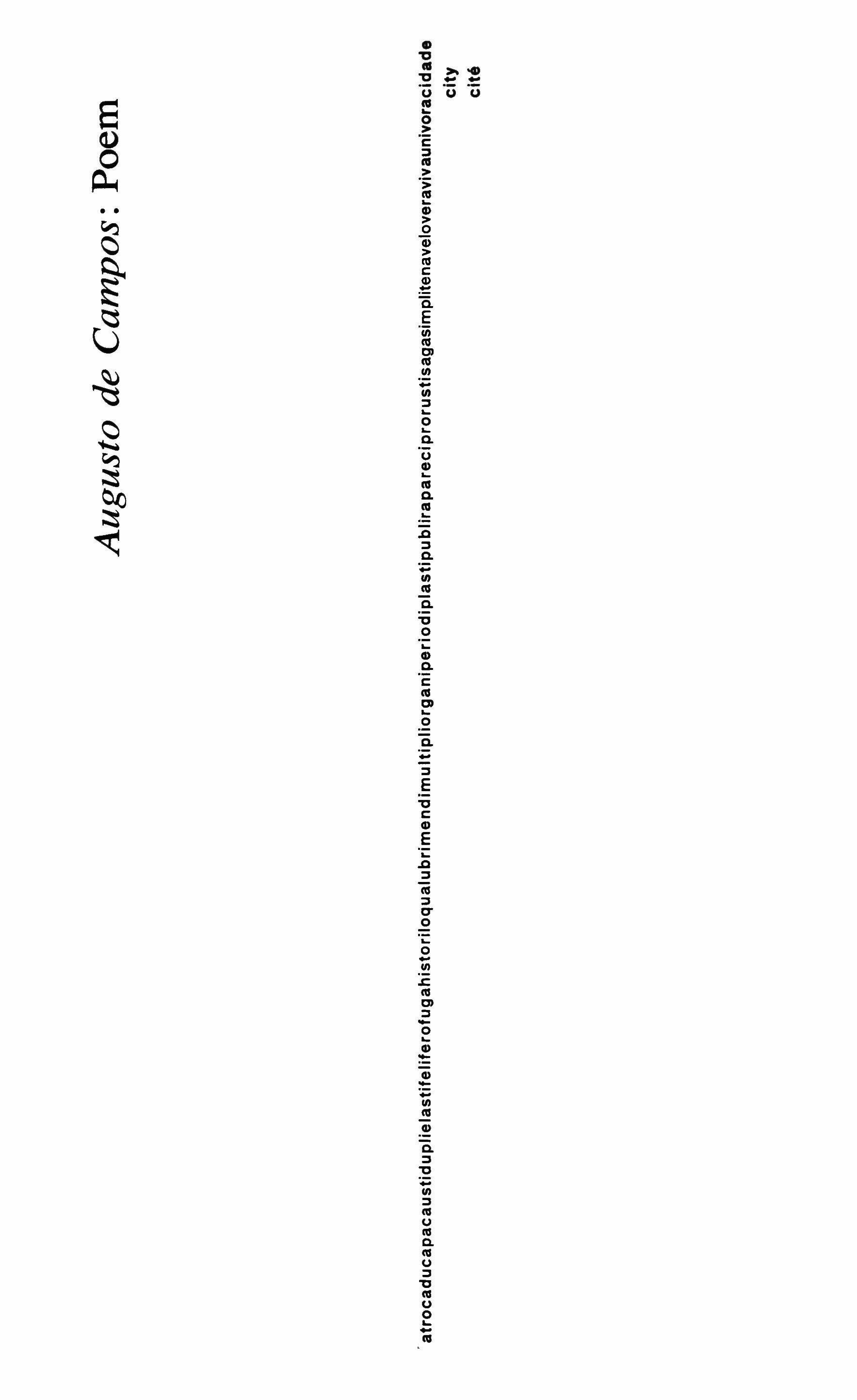
Augusto
An interview with Maurice Roche David Hayman
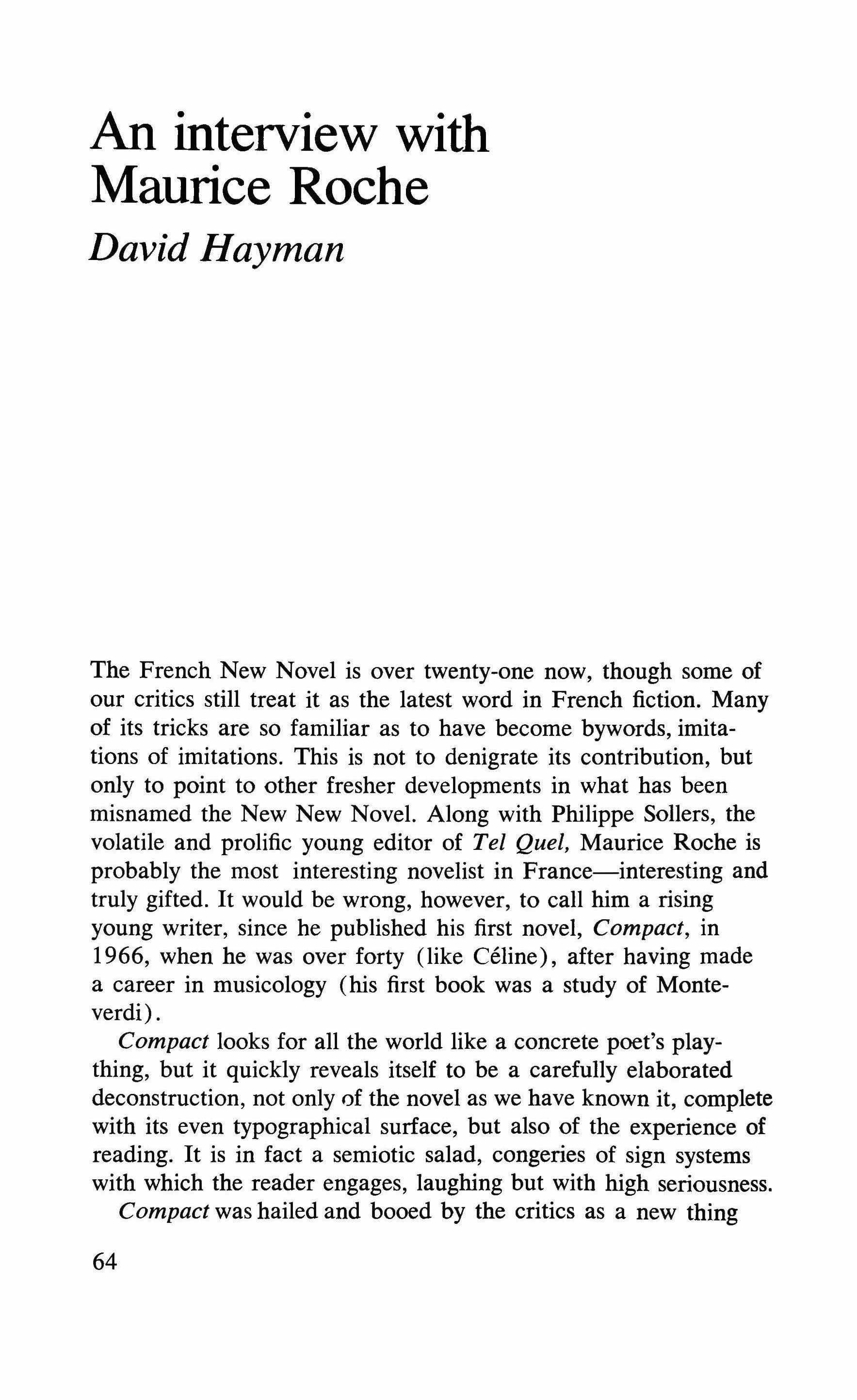
The French New Novel is over twenty-one now, though some of our critics still treat it as the latest word in French fiction. Many of its tricks are so familiar as to have become bywords, imitations of imitations. This is not to denigrate its contribution, but only to point to other fresher developments in what has been misnamed the New New Novel. Along with Philippe Sollers, the volatile and prolific young editor of Tel Quel, Maurice Roche is probably the most interesting novelist in France-interesting and truly gifted. It would be wrong, however, to call him a rising young writer, since he published his first novel, Compact, in 1966, when he was over forty (like Celine) after having made a career in musicology (his first book was a study of Monteverdi)
Compact looks for all the world like a concrete poet's plaything, but it quickly reveals itself to be a carefully elaborated deconstruction, not only of the novel as we have known it, complete with its even typographical surface, but also of the experience of reading. It is in fact a semiotic salad, congeries of sign systems with which the reader engages, laughing but with high seriousness. Compact was hailed and booed by the critics as a new thing
64
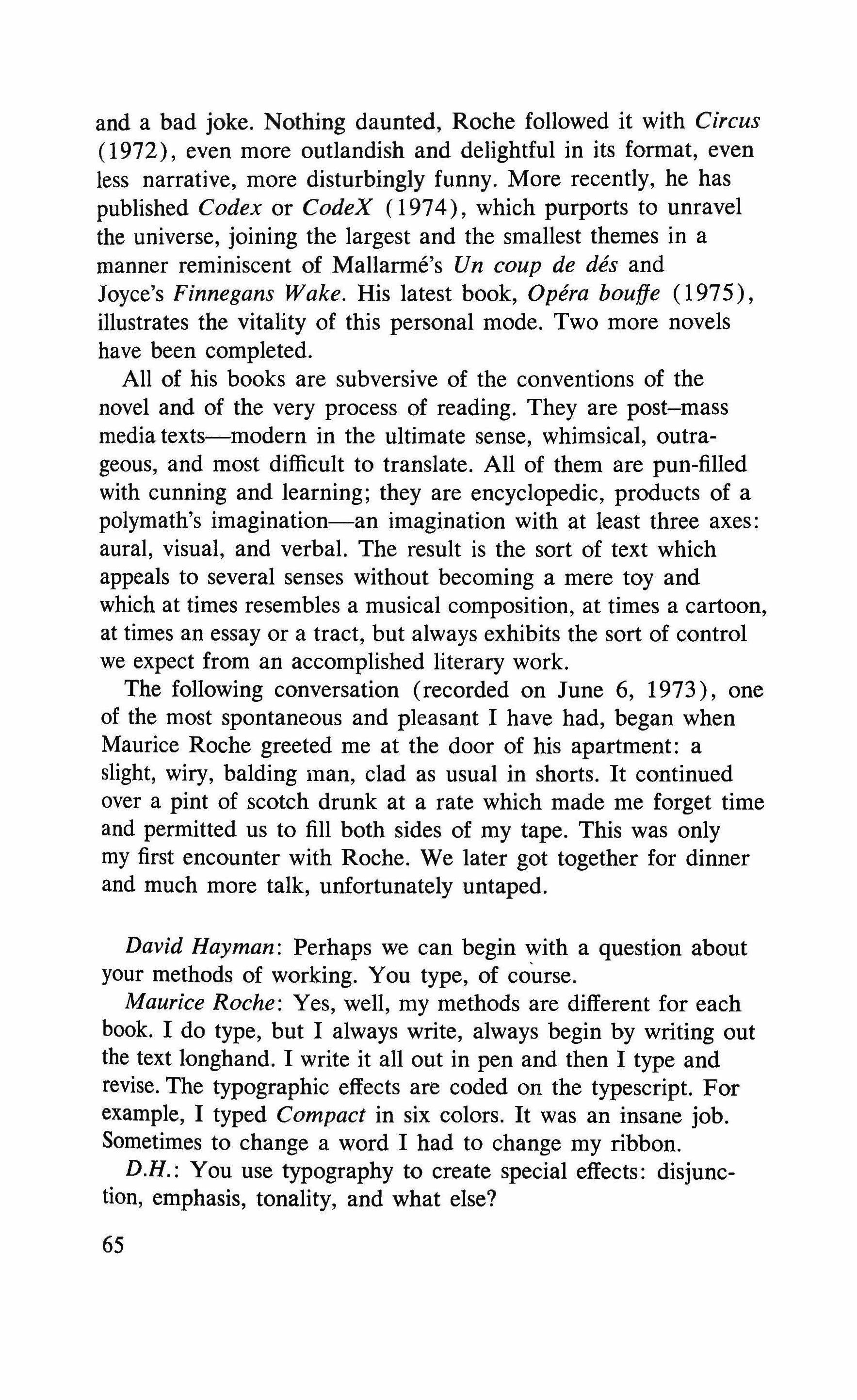
and a bad joke. Nothing daunted, Roche followed it with Circus ( 1972), even more outlandish and delightful in its format, even less narrative, more disturbingly funny. More recently, he has published Codex or CodeX (1974), which purports to unravel the universe, joining the largest and the smallest themes in a manner reminiscent of Mallarme's Un coup de des and Joyce's Finnegans Wake. His latest book, Opera boufJe (1975), illustrates the vitality of this personal mode. Two more novels have been completed.
All of his books are subversive of the conventions of the novel and of the very process of reading. They are post-mass media texts-modern in the ultimate sense, whimsical, outrageous, and most difficult to translate. All of them are pun-filled with cunning and learning; they are encyclopedic, products of a polymath's imagination-an imagination with at least three axes: aural, visual, and verbal. The result is the sort of text which appeals to several senses without becoming a mere toy and which at times resembles a musical composition, at times a cartoon, at times an essay or a tract, but always exhibits the sort of control we expect from an accomplished literary work.
The following conversation (recorded on June 6, 1973), one of the most spontaneous and pleasant I have had, began when Maurice Roche greeted me at the door of his apartment: a slight, wiry, balding man, clad as usual in shorts. It continued over a pint of scotch drunk at a rate which made me forget time and permitted us to fill both sides of my tape. This was only my first encounter with Roche. We later got together for dinner and much more talk, unfortunately untaped.
David Hayman: Perhaps we can begin with a question about your methods of working. You type, of course.
Maurice Roche: Yes, well, my methods are different for each book. I do type, but I always write, always begin by writing out the text longhand. I write it all out in pen and then I type and revise. The typographic effects are coded on the typescript. For example, I typed Compact in six colors. It was an insane job. Sometimes to change a word I had to change my ribbon.
D.H.: You use typography to create special effects: disjunction, emphasis, tonality, and what else?
65

M.R.: There are many other things. You could think of typography, at least in Compact, either as a sort of expanded punctuation or as a means of indicating a change in reading tempo. In fact, there are several narratives in Compact. Each narrative has its own personal pronoun, its tense, its syntax. These narratives combine to constitute a single narrative which is quite distinct from all of them. You notice that a given punctuation can provide a certain development. Take, for example, the passages printed in boldface italics in the beginning. We are in the second person singular, the future tense, the familiar address: "You'll lose sleep to the degree that you will lose sight of And if you decide to read only the passages in boldface italics, you'll be able to follow the development with ease. That goes for each sort of typographically punctuated passage.
D.H.: Is it like Mallarme's Un coup de des? There too one can follow the typography as well as the total text.
M.R.: Yes, of course you could choose a development. But the book was not written with that sort of development as a focus. These are pointers, if you like, indicating a sort of relief (in the sculptural sense), since each narrative has its locus. I call them narratives for want of a better word. Of course, there are no stories. As one of the journalists said, it's a novel that tells no tales.
D.H.: What about the story of the Japanese doctor who collects tattooed human skin?'
M.R.: It's a deception, an illusion.
D.H.: Still, it does duty as narrative.
M.R.: Precisely. It's an illusion which uses the narrative mode, the traditional tale. It becomes derisory, since it is sandwiched in among the other elements. Mathews" says it's like the Marx Brothers entering a field of wild flowers. It's a farce, in the etymological sense. It's stuffed, as a chicken is stuffed.
D.H.: It's a farce in that sense and also in the comic sense.
M.R.: Of course, just like the gag. That's what I miss in so much contemporary literature-comic relief. Take the Japanese doctor. It's funny but, when we look closely, it isn't funny at all. Really, it's the most sinister thing in the book. It is a mockery of the experience, of the sad aspect of the book. But the thing that provokes the most laughter is the most lugubrious
66

episode, which is, in fact, the most polemical part. I think there should always be a polemical aspect in any work. You give someone a contract for his skin exactly as you'd give a contract for a book. The clauses are identical. [Laughter throughout.] Sollers speaks about this in his preface to Compact, so he too understood. No, there is no true narrative. When there are narrative elements they are mock narratives, as, for example, in Cervantes' Quixote. Of course he uses elements of the chivalric romance, but only to reverse his field, to ironize his model.
In my novel each element of the discourse has its own typography and thereby shows the manner in which it should be read. After all, a book is read with the eyes. But it could also be read aloud. Or if it is not read aloud, it still sounds in the inner ear. When we read, we hear. It sounds or it doesn't sound. It makes a particular sort of sound. It's like reading music. That's what I said in my little blurb for Circus. The interior ear discloses the phonetic and phonometric architecture of the text. That is why the typography is functional. It is not to beautify, nor is it like Michel Butor's use of typography in Mobile. One can see quite well how Mobile works through broken sequences, and so on. I wrote Compact sequentially. I didn't write the second page before the first, for example. I wrote it page by page.
D.H.: Do you mean that you were writing the discontinuous sequences directly onto the page?
M.R.: That was the hair-raising aspect, you know. I had several outlines which I wasn't able to follow because the book began to generate its own shape. I had to keep everything in my head at once! Of course I had certain formal indices in mind, but I didn't always do what I had intended. That is what interests me: I did not write a line until I had written the preceding line. I did not let my plans stand in the way of my writing.
D.H.: You didn't use scrapbook techniques.
M.R.: Certainly not, I didn't make collages. But for Circus it was just the opposite. Circus had its central focus and then everything shifted. I don't mean that I wrote it haphazardly. I began with a preliminary sense of the book, a vague prevision. But what I had was an idea. It would be a montage in the cinematic sense. I knew how it would be organized, but I could write, say, some
67
sequences before certain early ones. But there you have a book in which one can hop about, mixing up the sequences if one wishes. There is a fellow named Georges Charbonnier who has a radio program every Friday. For eight months now, he has been broadcasting interviews and readings from Circus. On one of those programs he had a reading by several actors, each taking a series of typographical segments, a completely fragmented reading. Circus is truly a book that runs counter to the reader's habits of reading. But it is not a Mobile either, because no matter how one reads it-that is, if one goes from page to page Here, I have written at the very beginning of the book:"
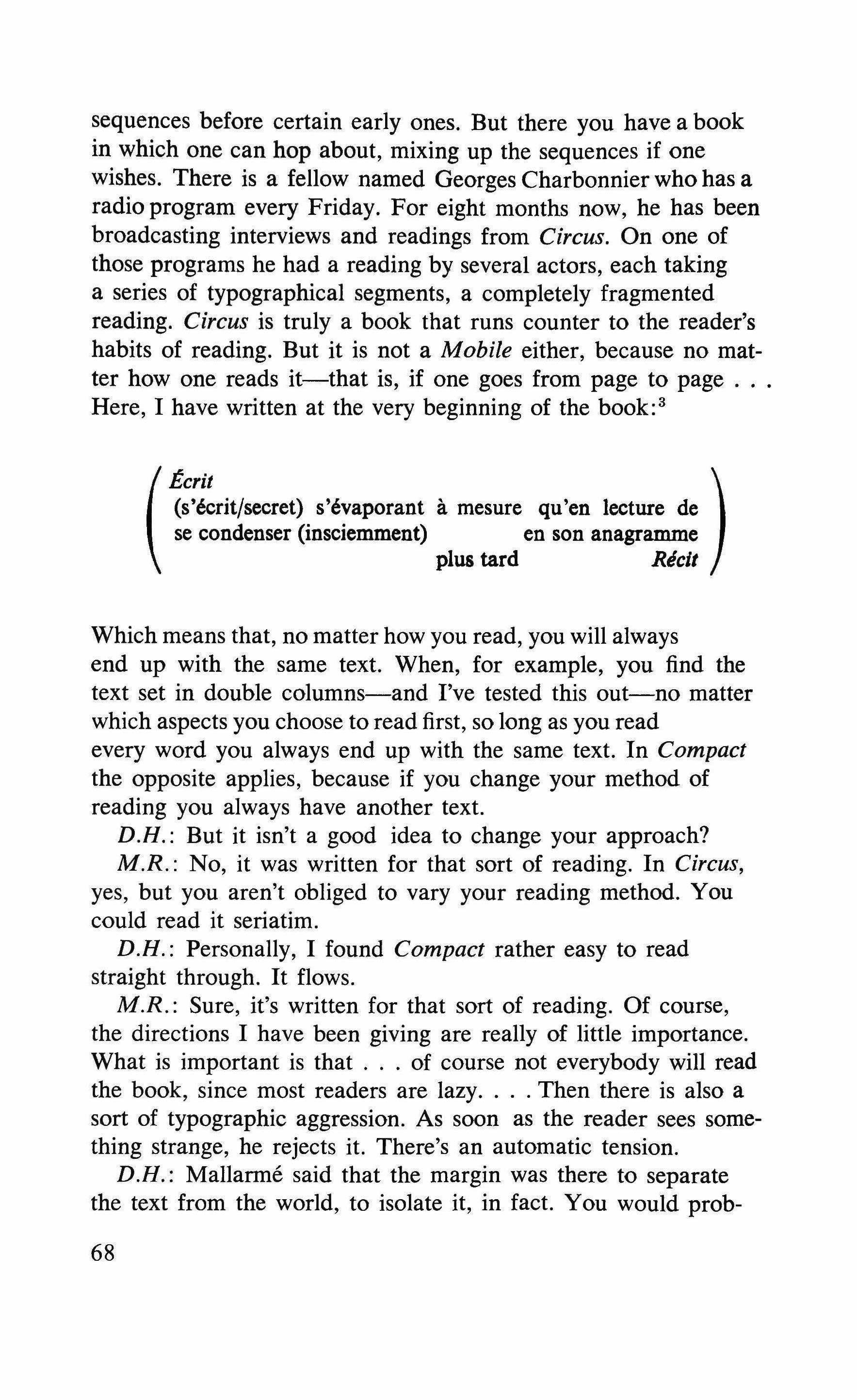
(s'ecrit/secret) s'evaporant a mesure qu'en lecture de se condenser (insciemment) en son anagramme plus tard Reclt
Which means that, no matter how you read, you will always end up with the same text. When, for example, you find the text set in double columns-and I've tested this out-no matter which aspects you choose to read first, so long as you read every word you always end up with the same text. In Compact the opposite applies, because if you change your method of reading you always have another text.
D.H.: But it isn't a good idea to change your approach?
M.R.: No, it was written for that sort of reading. In Circus, yes, but you aren't obliged to vary your reading method. You could read it seriatim.
D.H.: Personally, I found Compact rather easy to read straight through. It flows.
M.R.: Sure, it's written for that sort of reading. Of course, the directions I have been giving are really of little importance. What is important is that of course not everybody will read the book, since most readers are lazy Then there is also a sort of typographic aggression. As soon as the reader sees something strange, he rejects it. There's an automatic tension.
D.H.: Mallarme said that the margin was there to separate the text from the world, to isolate it, in fact. You would prob-
(�t )
68
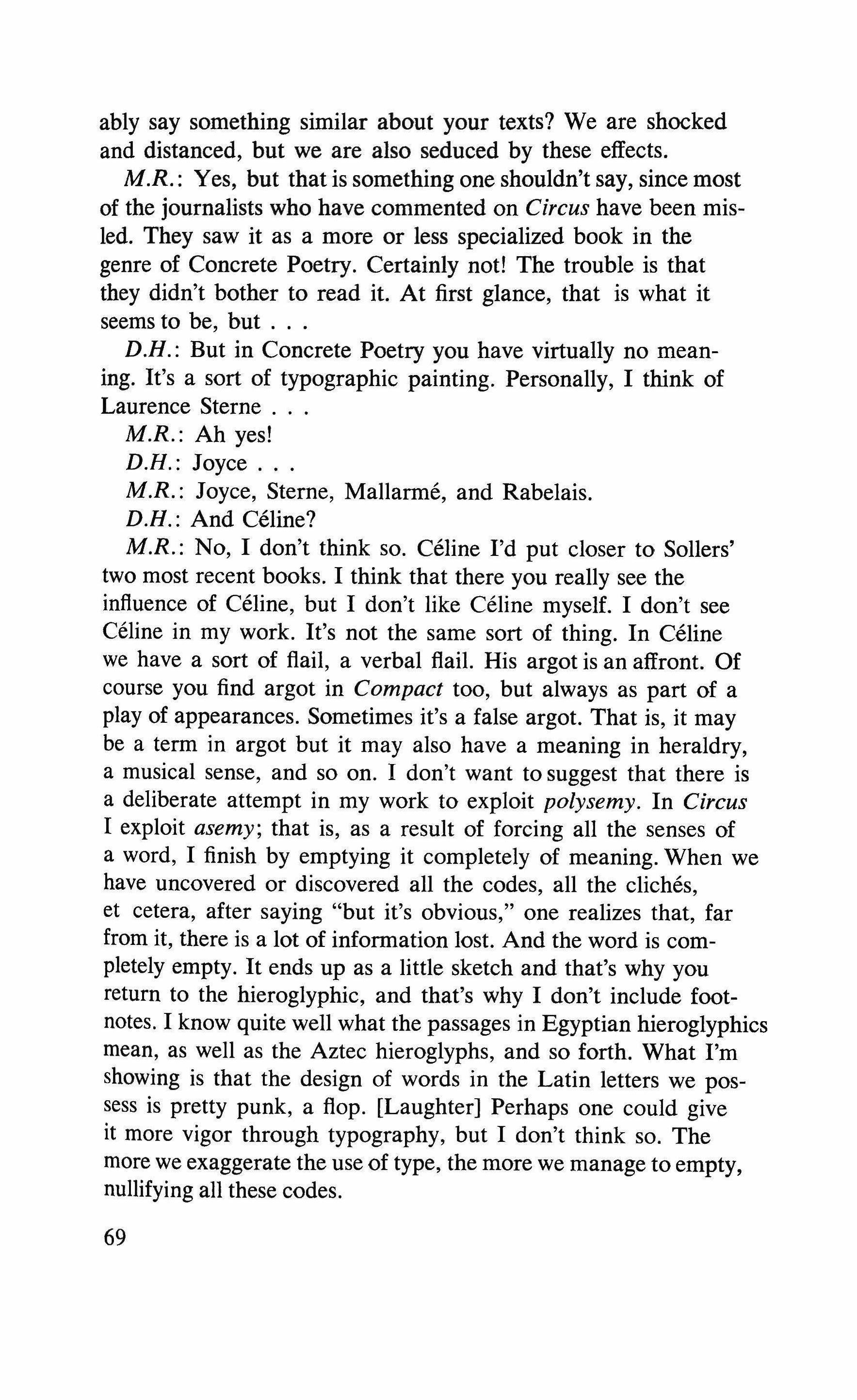
ably say something similar about your texts? We are shocked and distanced, but we are also seduced by these effects.
M.R.: Yes, but that is something one shouldn't say, since most of the journalists who have commented on Circus have been misled. They saw it as a more or less specialized book in the genre of Concrete Poetry. Certainly not! The trouble is that they didn't bother to read it. At first glance, that is what it seems to be, but
D.H.: But in Concrete Poetry you have virtually no meaning. It's a sort of typographic painting. Personally, I think of Laurence Sterne
M.R.: Ah yes!
D.H.: Joyce
M.R.: Joyce, Sterne, Mallarme, and Rabelais.
D.H.: And Omne?
M.R.: No, I don't think so. Celine I'd put closer to Sollers' two most recent books. I think that there you really see the influence of Celine, but I don't like Celine myself. I don't see Celine in my work. It's not the same sort of thing. In Celine we have a sort of flail, a verbal flail. His argot is an affront. Of course you find argot in Compact too, but always as part of a play of appearances. Sometimes it's a false argot. That is, it may be a term in argot but it may also have a meaning in heraldry, a musical sense, and so on. I don't want to suggest that there is a deliberate attempt in my work to exploit polysemy. In Circus I exploit asemy; that is, as a result of forcing all the senses of a word, I finish by emptying it completely of meaning. When we have uncovered or discovered all the codes, all the cliches, et cetera, after saying "but it's obvious," one realizes that, far from it, there is a lot of information lost. And the word is completely empty. It ends up as a little sketch and that's why you return to the hieroglyphic, and that's why I don't include footnotes. I know quite well what the passages in Egyptian hieroglyphics mean, as well as the Aztec hieroglyphs, and so forth. What I'm showing is that the design of words in the Latin letters we possess is pretty punk, a flop. [Laughter] Perhaps one could give it more vigor through typography, but I don't think so. The more we exaggerate the use of type, the more we manage to empty, nullifying all these codes.
69

There is something else we forgot to mention, something which really impressed me when I read it. It's Bouvard et Pecuchet by Flaubert. I feel closer to that than to Celine. They tell me that Celine was a new Rabelais. It's not true! It's something else! It's even a frank exhibition of populism but pushed to its limits with genius. It seems that Celine really wanted to write popular fiction. He had a friend [Eugene Dabit] who wrote Hotel du Nord, a novel that really sold. He wanted to do the same. It just happened that he had verbal gifts the others lacked. But he really wanted to write popular fiction.
D.H.: In the beginning, yes. But later
M.R.: Later, no. Despite everything, he had a language which resonates in the inner ear. It has a fine sound. That doesn't mean it's beautiful or pretty. Racine's has a fine sound too, and I hate it.
D.H.: It's beautiful in another way.
M.R.: Yes, it is. When I say it has a fine sound, I don't mean that it is pretty or even pleasant to hear. On the contrary, it's even extremely harsh sounding. And then when we consider the typography, type also possesses an element of reading, perhaps reading aloud. That's something to think about. In the distant past there were those who read and then those who read aloud and listened to themselves. That's a textual dimension which we ought to try to restore, because Mallarme reads very well and Joyce and Beckett. If Finnegans Wake is read aloud, I swear
D.H.: Precisely. Sollers is very proud of having preserved in his translation from the Wake the rhythms and tonalities of the original. He's very interested in the sounds.
M.R.: Sure! But don't be fooled! Sollers is one of the very few who are interested. I'd say that he is the only one today. What bothers me is that when (and I really admire certain writers like Robbe-Grillet, and others)-when I read them, I find that
D.H.: Their tonalities are flat.
M.R.: Yes, it's the "zero degree," but I would ask, Why use only that, why not use it all? Use all the verbal potential of a period. Take, for example, Monteverdi in his time; he used everything from the dramatic madrigal to the recitative. I think we must use all the possible elements of a language and even
70
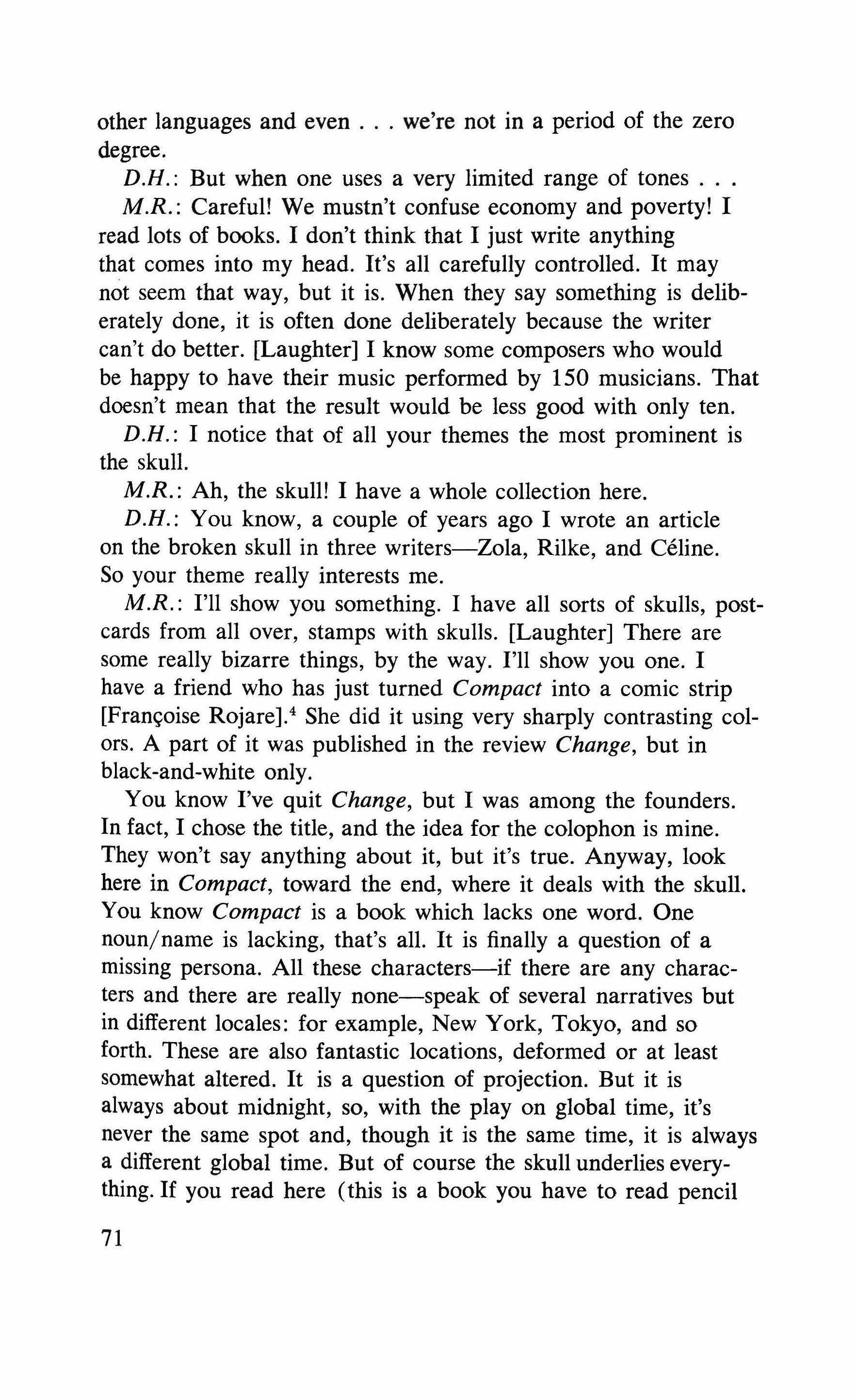
other languages and even we're not in a period of the zero degree.
D.H.: But when one uses a very limited range of tones
M.R.: Careful! We mustn't confuse economy and poverty! I read lots of books. I don't think that I just write anything that comes into my head. It's all carefully controlled. It may not seem that way, but it is. When they say something is deliberately done, it is often done deliberately because the writer can't do better. [Laughter] I know some composers who would be happy to have their music performed by 150 musicians. That doesn't mean that the result would be less good with only ten.
D.H.: I notice that of all your themes the most prominent is the skull.
M.R.: Ah, the skull! I have a whole collection here.
D.H.: You know, a couple of years ago I wrote an article on the broken skull in three writers-Zola, Rilke, and Celine, So your theme really interests me.
M.R.: I'll show you something. I have all sorts of skulls, postcards from all over, stamps with skulls. [Laughter] There are some really bizarre things, by the way. I'll show you one. I have a friend who has just turned Compact into a comic strip [Francoise Rojare].' She did it using very sharply contrasting colors. A part of it was published in the review Change, but in black-and-white only.
You know I've quit Change, but I was among the founders. In fact, I chose the title, and the idea for the colophon is mine. They won't say anything about it, but it's true. Anyway, look here in Compact, toward the end, where it deals with the skull. You know Compact is a book which lacks one word. One noun/name is lacking, that's all. It is finally a question of a missing persona. All these characters-if there are any characters and there are really none-speak of several narratives but in different locales: for example, New York, Tokyo, and so forth. These are also fantastic locations, deformed or at least somewhat altered. It is a question of projection. But it is always about midnight, so, with the play on global time, it's never the same spot and, though it is the same time, it is always a different global time. But of course the skull underlies everything. If you read here (this is a book you have to read pencil
71
in hand), you find a description of the configuration of a death's head:
Impasse des Catacombes.
Weare seated side by side, my companion and I, with our backs to the entrance. In the large glass fixed opposite us, at the other end of the room, we can see the picture we make in this decor: the low arched entry; right underneath, our two heads at some distance from one another; to the right and left the points of jutting springers protrude slightly. At the center of the table a bottle (of beer, a house joke!) between two glasses. We felt we were contributing figures in some ghostly calligram: our image reduced to the dimensions of a skull (and we within).
We had a night club (boite de nuit) in our heads 5
[As he reads, he draws the following sketch of two diners in a night club:]
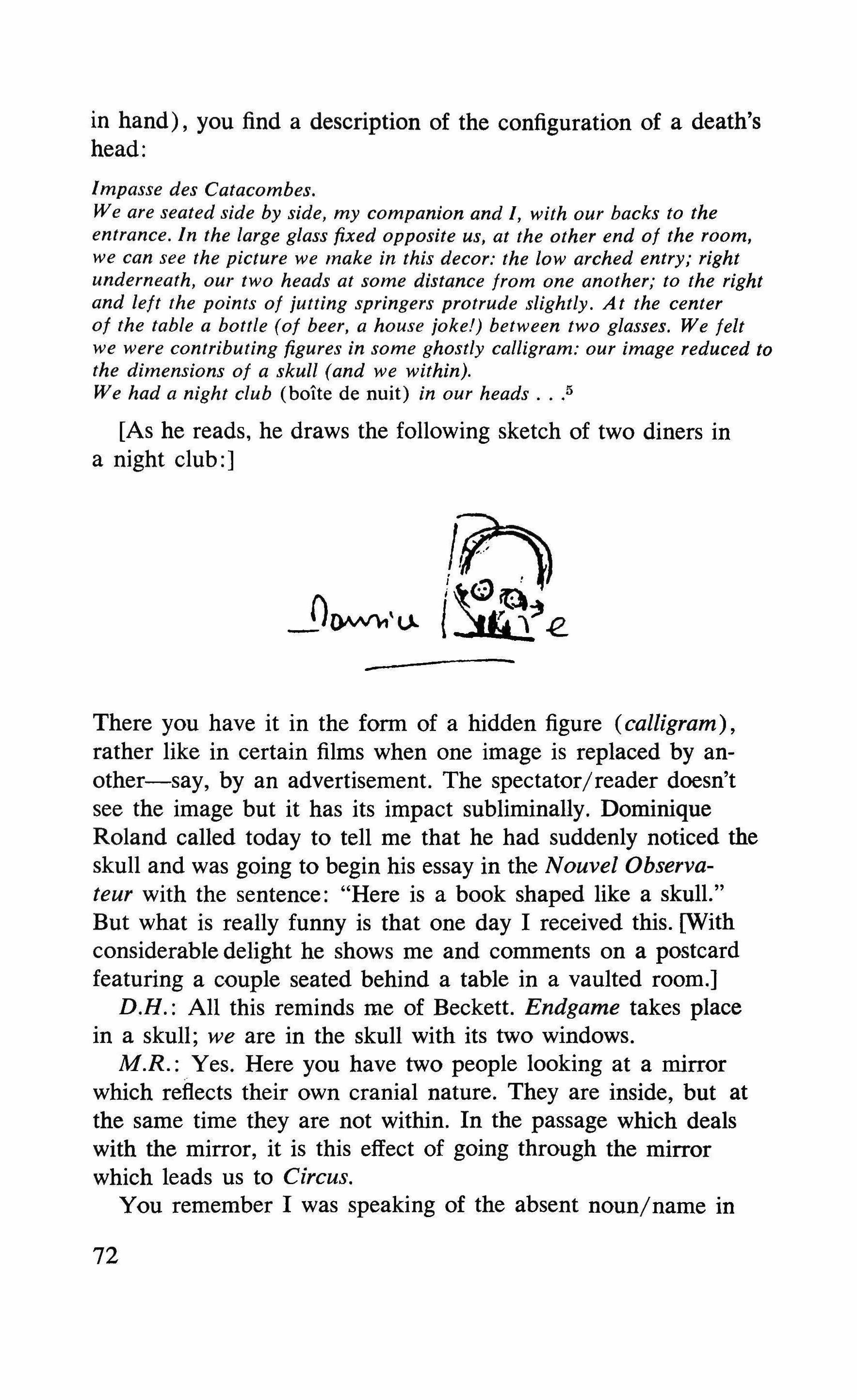
There you have it in the form of a hidden figure (calligram), rather like in certain films when one image is replaced by another-say, by an advertisement. The spectator/reader doesn't see the image but it has its impact subliminally. Dominique Roland called today to tell me that he had suddenly noticed the skull and was going to begin his essay in the Nouvel Observateur with the sentence: "Here is a book shaped like a skull." But what is really funny is that one day I received this. [With considerable delight he shows me and comments on a postcard featuring a couple seated behind a table in a vaulted room.]
D.H.: All this reminds me of Beckett. Endgame takes place in a skull; we are in the skull with its two windows.
M.R.: Yes. Here you have two people looking at a mirror which reflects their own cranial nature. They are inside, but at the same time they are not within. In the passage which deals with the mirror, it is this effect of going through the mirror which leads us to Circus.
You remember I was speaking of the absent noun/name in
72
Compact. We find that word in the skull of Circus. This is rather odd because the inspiration just came to me at the end of a line. You know I don't only type, I also write with a pen. That's very important because you scratch and scrape Here it is: Roche arrives in the shape of a skull:
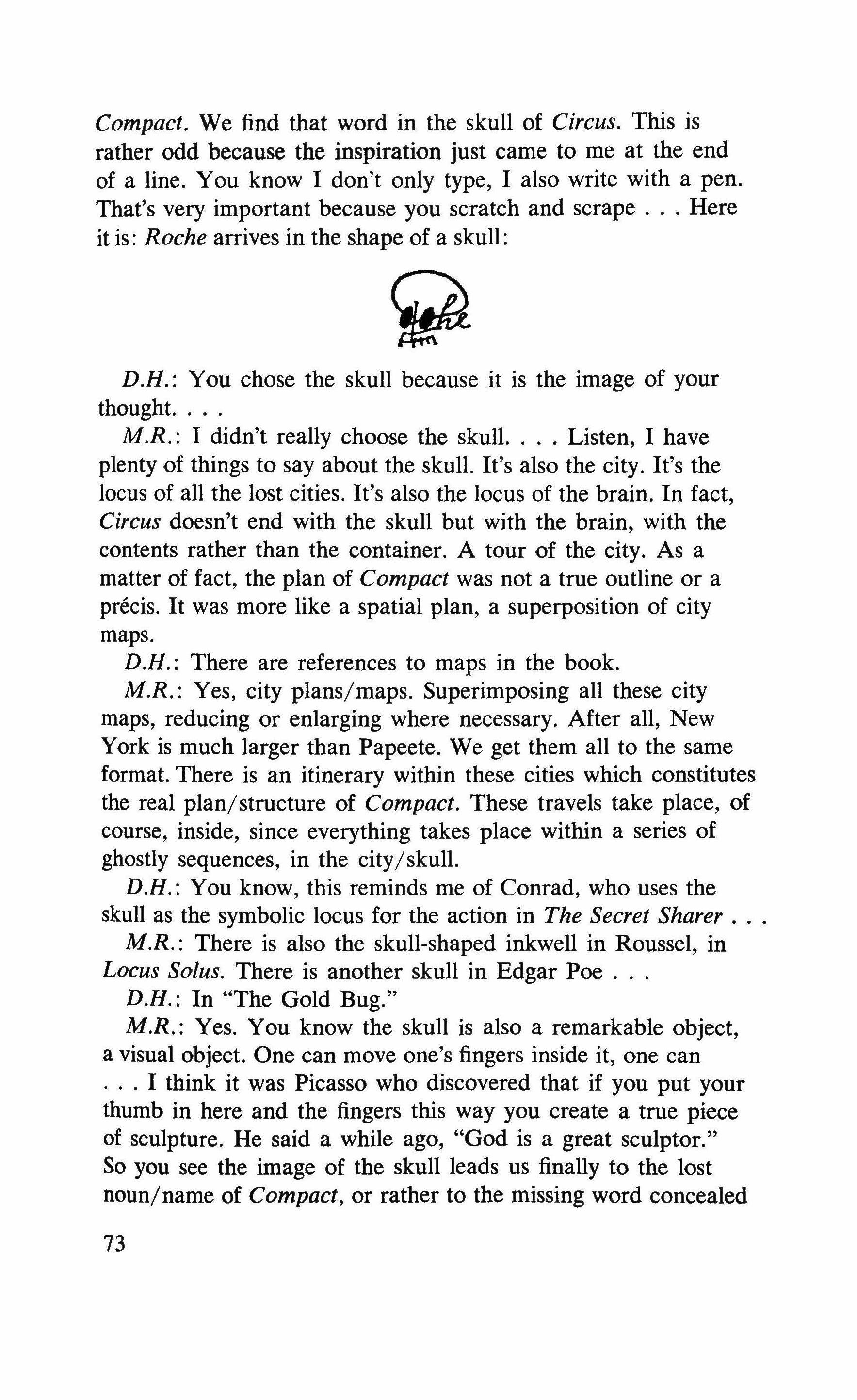
D.H.: You chose the skull because it is the image of your thought.
M.R.: I didn't really choose the skull Listen, I have plenty of things to say about the skull. It's also the city. It's the locus of all the lost cities. It's also the locus of the brain. In fact, Circus doesn't end with the skull but with the brain, with the contents rather than the container. A tour of the city. As a matter of fact, the plan of Compact was not a true outline or a precis. It was more like a spatial plan, a superposition of city maps.
D.H.: There are references to maps in the book.
M.R.: Yes, city plans/maps. Superimposing all these city maps, reducing or enlarging where necessary. After all, New York is much larger than Papeete. We get them all to the same format. There is an itinerary within these cities which constitutes the real plan/structure of Compact. These travels take place, of course, inside, since everything takes place within a series of ghostly sequences, in the city/skull.
D.H.: You know, this reminds me of Conrad, who uses the skull as the symbolic locus for the action in The Secret Sharer
M.R.: There is also the skull-shaped inkwell in Roussel, in Locus Solus. There is another skull in Edgar Poe
D.H.: In "The Gold Bug."
M.R.: Yes. You know the skull is also a remarkable object, a visual object. One can move one's fingers inside it, one can I think it was Picasso who discovered that if you put your thumb in here and the fingers this way you create a true piece of sculpture. He said a while ago, "God is a great sculptor." So you see the image of the skull leads us finally to the lost noun/name of Compact, or rather to the missing word concealed
73
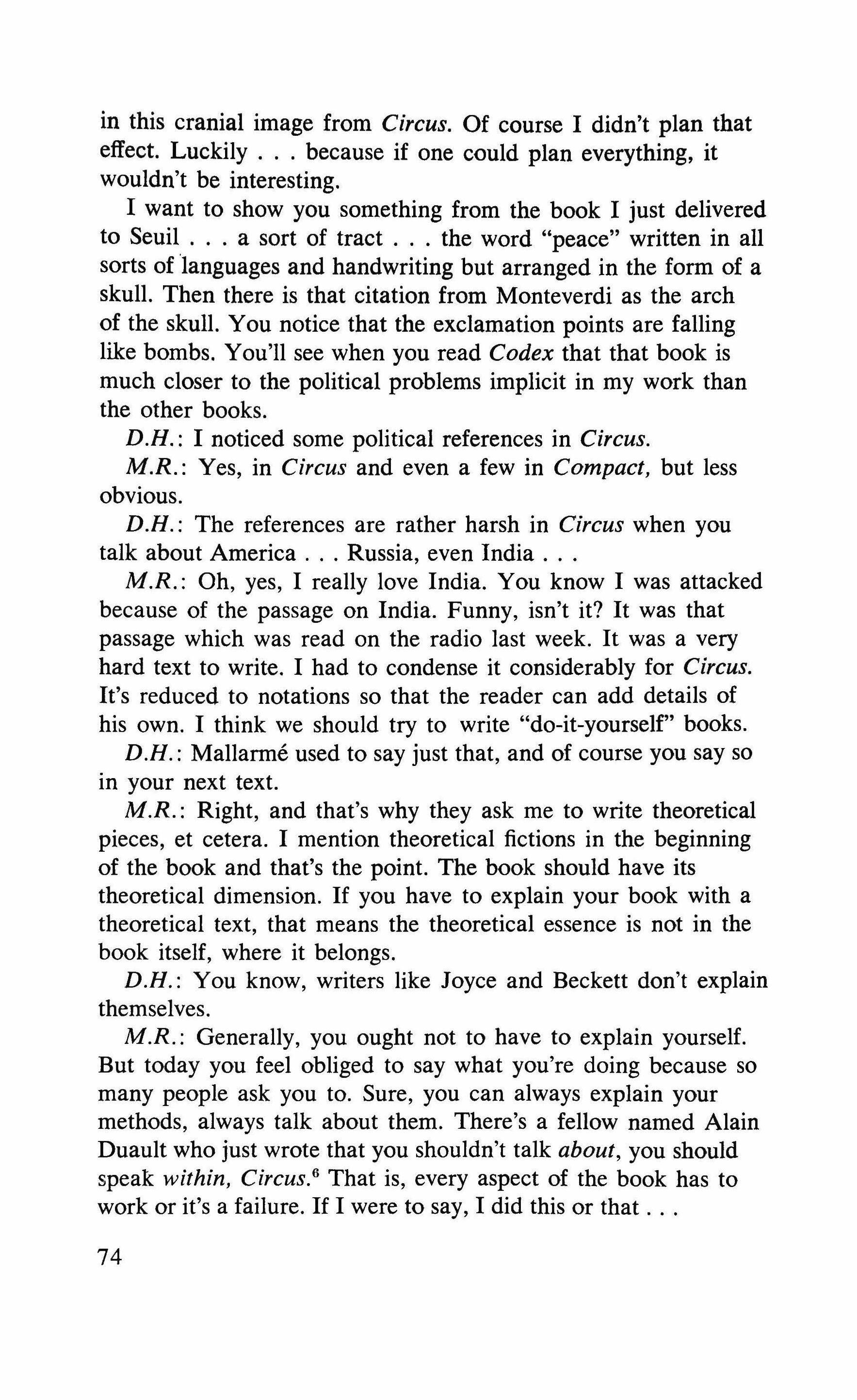
in this cranial image from Circus. Of course I didn't plan that effect. Luckily because if one could plan everything, it wouldn't be interesting.
I want to show you something from the book I just delivered to Seuil a sort of tract the word "peace" written in all sorts of 'languages and handwriting but arranged in the form of a skull. Then there is that citation from Monteverdi as the arch of the skull. You notice that the exclamation points are falling like bombs. You'll see when you read Codex that that book is much closer to the political problems implicit in my work than the other books.
D.H.: I noticed some political references in Circus.
M.R.: Yes, in Circus and even a few in Compact, but less obvious.
D.H.: The references are rather harsh in Circus when you talk about America Russia, even India
M.R.: Oh, yes, I really love India. You know I was attacked because of the passage on India. Funny, isn't it? It was that passage which was read on the radio last week. It was a very hard text to write. I had to condense it considerably for Circus. It's reduced to notations so that the reader can add details of his own. I think we should try to write "do-it-yourself" books.
D.H.: Mallarme used to say just that, and of course you say so in your next text.
M.R.: Right, and that's why they ask me to write theoretical pieces, et cetera. I mention theoretical fictions in the beginning of the book and that's the point. The book should have its theoretical dimension. If you have to explain your book with a theoretical text, that means the theoretical essence is not in the book itself, where it belongs.
D.H.: You know, writers like Joyce and Beckett don't explain themselves.
M.R.: Generally, you ought not to have to explain yourself. But today you feel obliged to say what you're doing because so many people ask you to. Sure, you can always explain your methods, always talk about them. There's a fellow named Alain Duault who just wrote that you shouldn't talk about, you should speak within, Circus." That is, every aspect of the book has to work or it's a failure. If I were to say, I did this or that
74
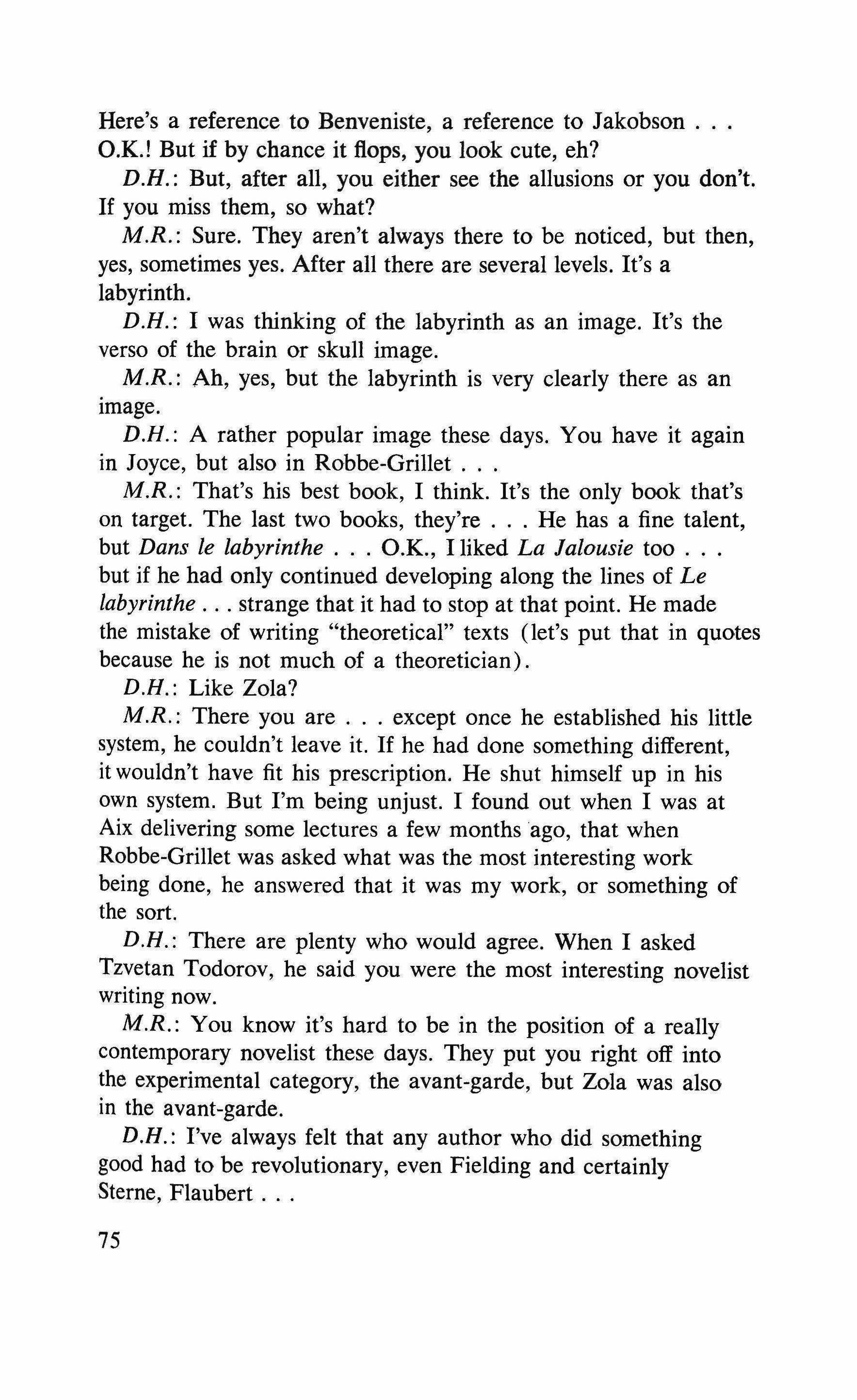
Here's a reference to Benveniste, a reference to Jakobson O.K.! But if by chance it flops, you look cute, eh?
D.H.: But, after all, you either see the allusions or you don't. If you miss them, so what?
M.R.: Sure. They aren't always there to be noticed, but then, yes, sometimes yes. After all there are several levels. It's a labyrinth.
D.H.: I was thinking of the labyrinth as an image. It's the verso of the brain or skull image.
M.R.: Ah, yes, but the labyrinth is very clearly there as an image.
D.H.: A rather popular image these days. You have it again in Joyce, but also in Robbe-Grillet
M.R.: That's his best book, I think. It's the only book that's on target. The last two books, they're He has a fine talent, but Dans Ie labyrinthe O.K., I liked La Jalousie too but if he had only continued developing along the lines of Le labyrinthe strange that it had to stop at that point. He made the mistake of writing "theoretical" texts (let's put that in quotes because he is not much of a theoretician).
D.H.: Like Zola?
M.R.: There you are except once he established his little system, he couldn't leave it. If he had done something different, it wouldn't have fit his prescription. He shut himself up in his own system. But I'm being unjust. I found out when I was at Aix delivering some lectures a few months ago, that when Robbe-Grillet was asked what was the most interesting work being done, he answered that it was my work, or something of the sort.
D.H.: There are plenty who would agree. When I asked Tzvetan Todorov, he said you were the most interesting novelist writing now.
M.R.: You know it's hard to be in the position of a really contemporary novelist these days. They put you right off into the experimental category, the avant-garde, but Zola was also in the avant-garde.
D.H.: I've always felt that any author who did something good had to be revolutionary, even Fielding and certainly Sterne, Flaubert
75
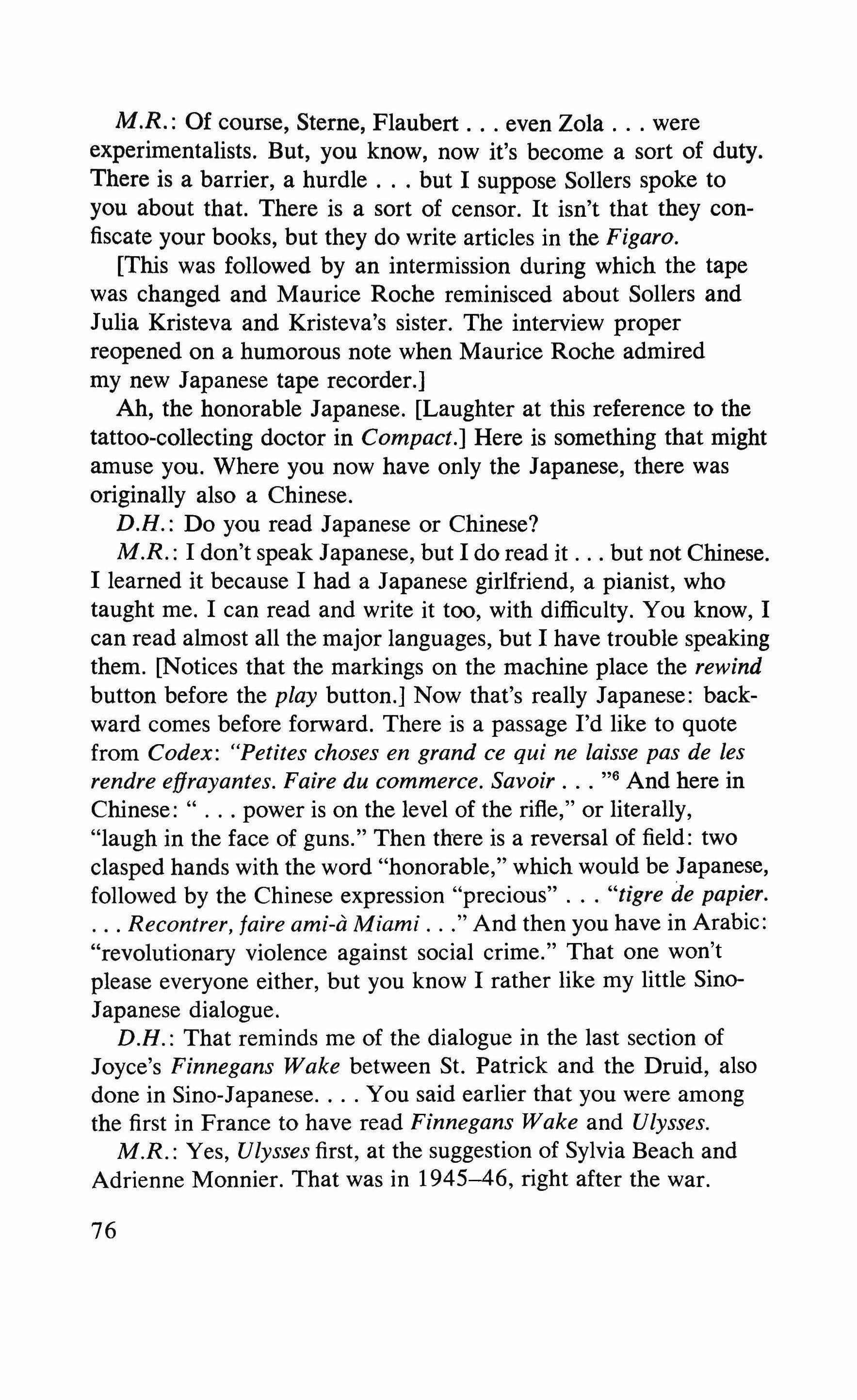
M.R.: Of course, Sterne, Flaubert even Zola were experimentalists. But, you know, now it's become a sort of duty. There is a barrier, a hurdle but I suppose Sollers spoke to you about that. There is a sort of censor. It isn't that they confiscate your books, but they do write articles in the Figaro.
[This was followed by an intermission during which the tape was changed and Maurice Roche reminisced about Sollers and Julia Kristeva and Kristeva's sister. The interview proper reopened on a humorous note when Maurice Roche admired my new Japanese tape recorder.]
Ah, the honorable Japanese. [Laughter at this reference to the tattoo-collecting doctor in Compact.] Here is something that might amuse you. Where you now have only the Japanese, there was originally also a Chinese.
D.H.: Do you read Japanese or Chinese?
M.R.: I don't speak Japanese, but I do read it but not Chinese. I learned it because I had a Japanese girlfriend, a pianist, who taught me. I can read and write it too, with difficulty. You know, I can read almost all the major languages, but I have trouble speaking them. [Notices that the markings on the machine place the rewind button before the play button.] Now that's really Japanese: backward comes before forward. There is a passage I'd like to quote from Codex: "Petites choses en grand ce qui ne laisse pas de les rendre effrayantes. Faire du commerce. Savoir "6 And here in Chinese: " power is on the level of the rifle," or literally, "laugh in the face of guns." Then there is a reversal of field: two clasped hands with the word "honorable," which would be Japanese, followed by the Chinese expression "precious" "tigre de papier Recontrer, [aire ami-a Miami And then you have in Arabic: "revolutionary violence against social crime." That one won't please everyone either, but you know I rather like my little SinoJapanese dialogue.
D.H.: That reminds me of the dialogue in the last section of Joyce's Finnegans Wake between St. Patrick and the Druid, also done in Sino-Japanese You said earlier that you were among the first in France to have read Finnegans Wake and Ulysses.
M.R.: Yes, Ulysses first, at the suggestion of Sylvia Beach and Adrienne Monnier. That was in 1945-46, right after the war.
76
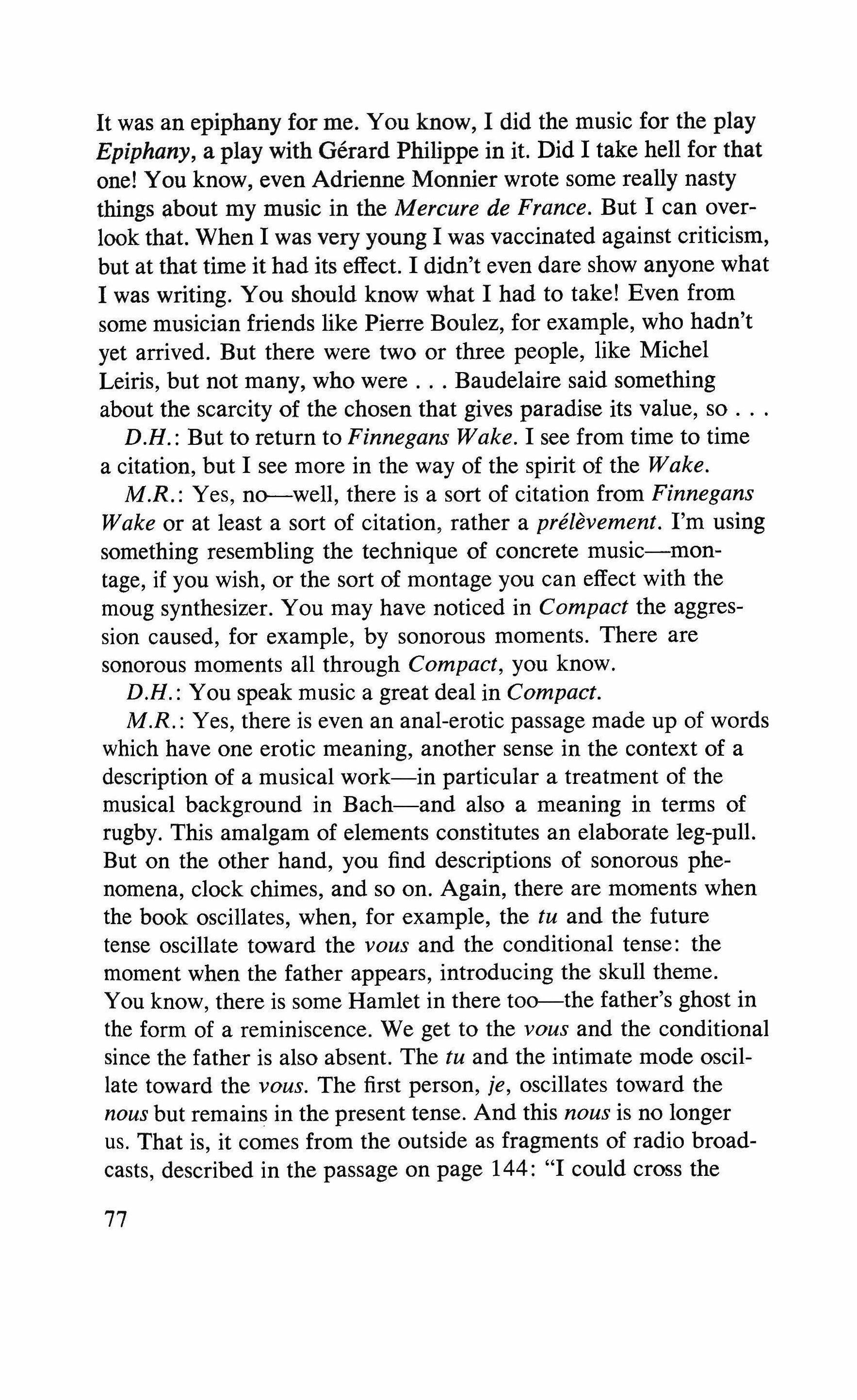
It was an epiphany for me. You know, I did the music for the play Epiphany, a play with Gerard Philippe in it. Did I take hell for that one! You know, even Adrienne Monnier wrote some really nasty things about my music in the Mercure de France. But I can overlook that. When I was very young I was vaccinated against criticism, but at that time it had its effect. I didn't even dare show anyone what I was writing. You should know what I had to take! Even from some musician friends like Pierre Boulez, for example, who hadn't yet arrived. But there were two or three people, like Michel Leiris, but not many, who were Baudelaire said something about the scarcity of the chosen that gives paradise its value, so
D.H.: But to return to Finnegans Wake. I see from time to time a citation, but I see more in the way of the spirit of the Wake.
M.R.: Yes, no-v-well, there is a sort of citation from Finnegans Wake or at least a sort of citation, rather a prelevement, I'm using something resembling the technique of concrete music-montage, if you wish, or the sort of montage you can effect with the moug synthesizer. You may have noticed in Compact the aggression caused, for example, by sonorous moments. There are sonorous moments all through Compact, you know.
D.H.: You speak music a great deal in Compact.
M.R.: Yes, there is even an anal-erotic passage made up of words which have one erotic meaning, another sense in the context of a description of a musical work-in particular a treatment of the musical background in Bach-and also a meaning in terms of rugby. This amalgam of elements constitutes an elaborate leg-pull. But on the other hand, you find descriptions of sonorous phenomena, clock chimes, and so on. Again, there are moments when the book oscillates, when, for example, the tu and the future tense oscillate toward the vous and the conditional tense: the moment when the father appears, introducing the skull theme. You know, there is some Hamlet in there to(}-the father's ghost in the form of a reminiscence. We get to the vous and the conditional since the father is also absent. The tu and the intimate mode oscillate toward the vous. The first person, je, oscillates toward the nous but remains in the present tense. And this nous is no longer us. That is, it comes from the outside as fragments of radio broadcasts, described in the passage on page 144: "I could cross the 77
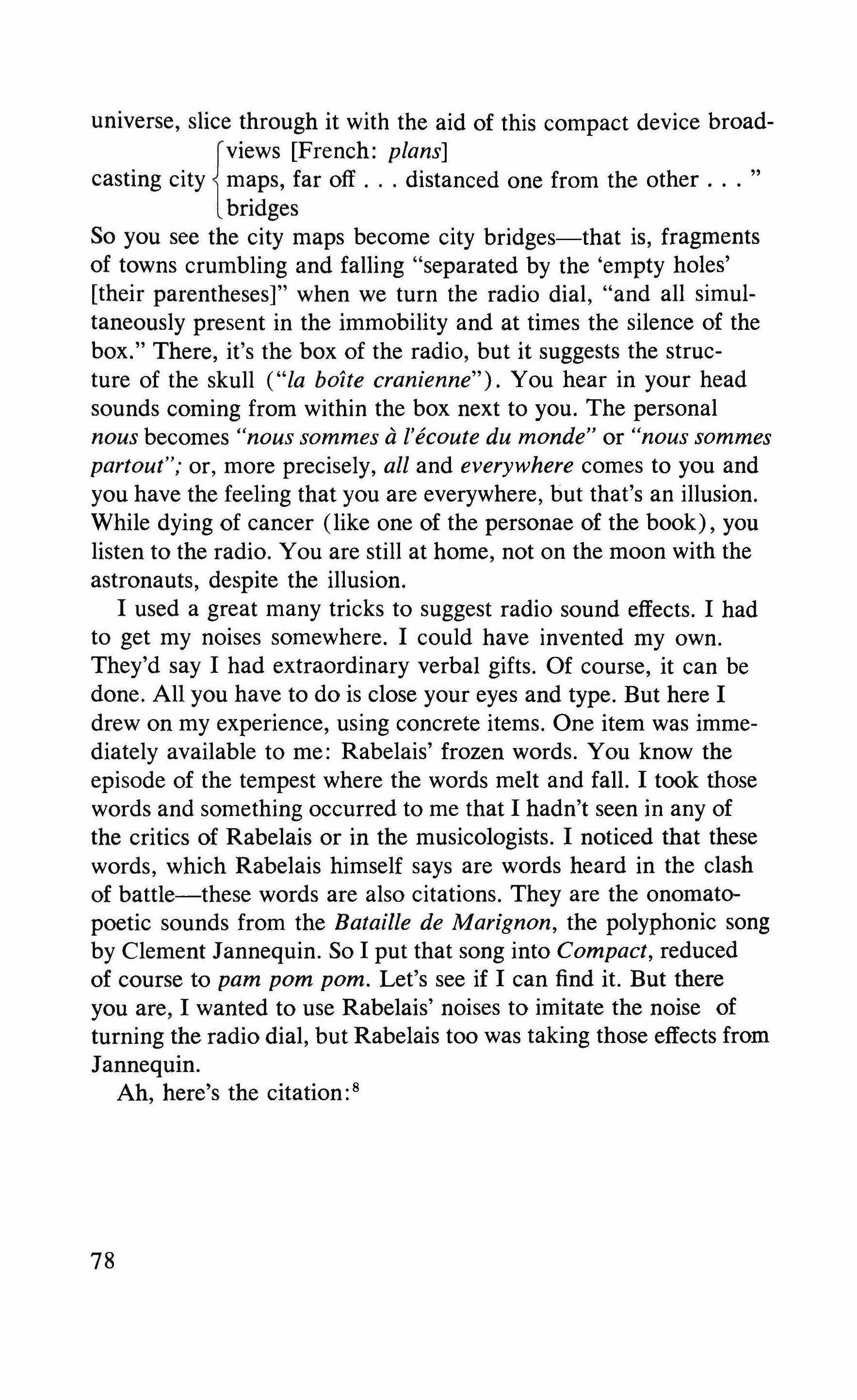
universe, slice through it with the aid of this compact device broad-
[French: plans] casting city maps, far off distanced one from the other bridges
{views
So you see the city maps become city bridges-that is, fragments of towns crumbling and falling "separated by the 'empty holes' [their parentheses]" when we turn the radio dial, "and all simultaneously present in the immobility and at times the silence of the box." There, it's the box of the radio, but it suggests the structure of the skull ("la boite cranienne"). You hear in your head sounds coming from within the box next to you. The personal nous becomes "nous sommes a l'ecoute du monde" or "nous sommes partout"; or, more precisely, all and everywhere comes to you and you have the feeling that you are everywhere, but that's an illusion. While dying of cancer (like one of the personae of the book), you listen to the radio. You are still at home, not on the moon with the astronauts, despite the illusion.
I used a great many tricks to suggest radio sound effects. I had to get my noises somewhere. I could have invented my own. They'd say I had extraordinary verbal gifts. Of course, it can be done. All you have to do is close your eyes and type. But here I drew on my experience, using concrete items. One item was immediately available to me: Rabelais' frozen words. You know the episode of the tempest where the words melt and fall. I took those words and something occurred to me that I hadn't seen in any of the critics of Rabelais or in the musicologists. I noticed that these words, which Rabelais himself says are words heard in the clash of battle-these words are also citations. They are the onomatopoetic sounds from the Bataille de Marignon, the polyphonic song by Clement Jannequin. So I put that song into Compact, reduced of course to pam pom pom. Let's see if I can find it. But there you are, I wanted to use Rabelais' noises to imitate the noise of turning the radio dial, but Rabelais too was taking those effects from Jannequin.
Ah, here's the citation: 8
78
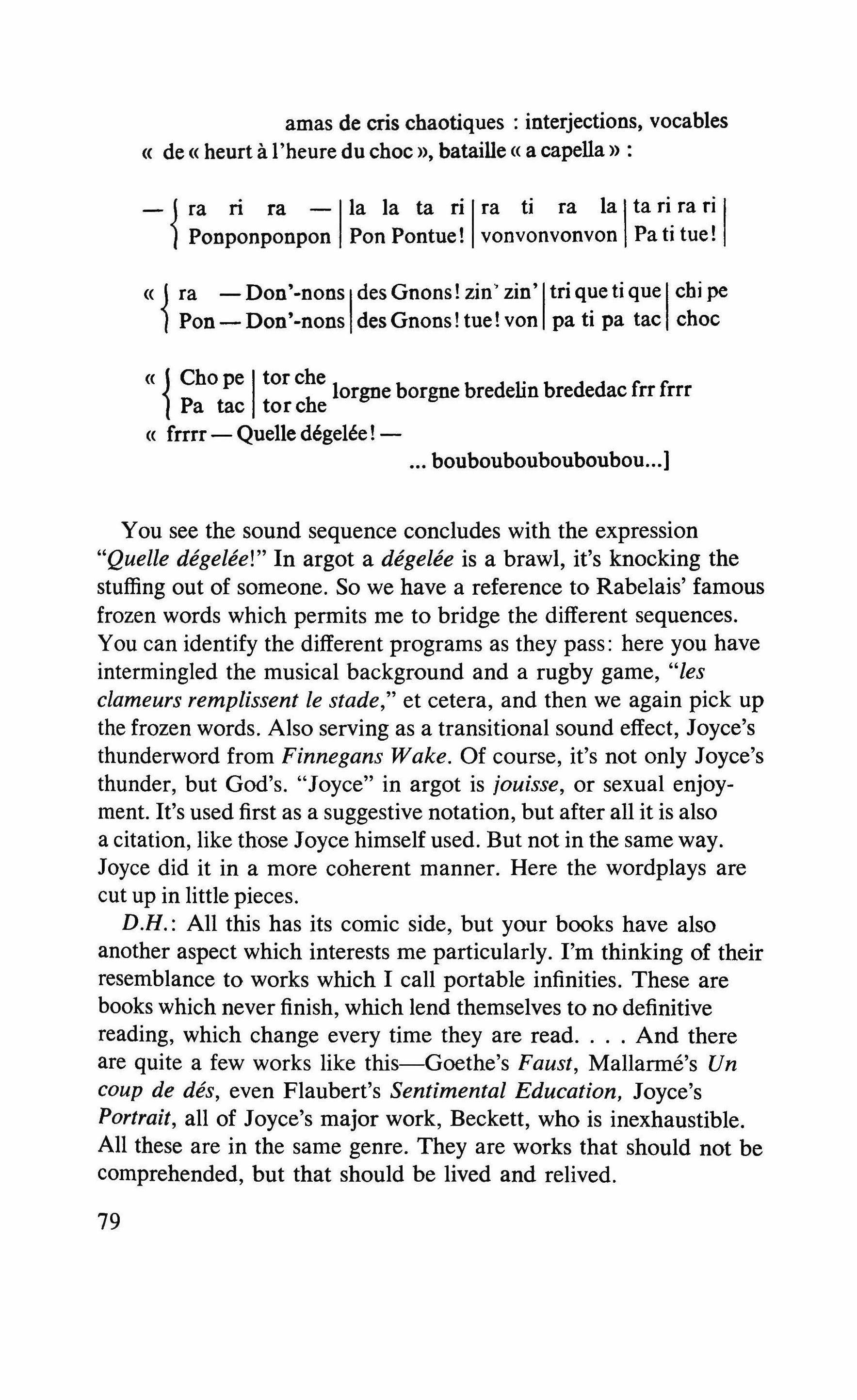
amas de cris chaotiques : interjections, vocables
« de « heurt it. 1'heure du choc », bataille « a capella» :
- J ra ri ra -11a la ta ri I ra ti ra la I ta ri ra ri I ) Ponponponpon Pon Pontue! vonvonvonvon Pa ti tue!
« J ra - Don'-nons I des Gnons! zin' zin' I tri q�e ti que I chi pe 1 Pon - Don'-nons des Gnons! tue! von pa ti pa tac choc
« { Cho pe I tor che h lorgne borgne bredelin brededac frr frrr Pa tac torc e
« frrrr - Quelle degelee!boubouboubouboubou ]
You see the sound sequence concludes with the expression "Quelle degelee!" In argot a degelee is a brawl, it's knocking the stuffing out of someone. So we have a reference to Rabelais' famous frozen words which permits me to bridge the different sequences. You can identify the different programs as they pass: here you have intermingled the musical background and a rugby game, "les clameurs remplissent le stade," et cetera, and then we again pick up the frozen words. Also serving as a transitional sound effect, Joyce's thunderword from Finnegans Wake. Of course, it's not only Joyce's thunder, but God's. "Joyce" in argot is jouisse, or sexual enjoyment. It's used first as a suggestive notation, but after all it is also a citation, like those Joyce himself used. But not in the same way. Joyce did it in a more coherent manner. Here the wordplays are cut up in little pieces.
D.H.: All this has its comic side, but your books have also another aspect which interests me particularly. I'm thinking of their resemblance to works which I call portable infinities. These are books which never finish, which lend themselves to no definitive reading, which change every time they are read. And there are quite a few works like this-Goethe's Faust, Mallarme's Un coup de des, even Flaubert's Sentimental Education, Joyce's Portrait, all of Joyce's major work, Beckett, who is inexhaustible. All these are in the same genre. They are works that should not be comprehended, but that should be lived and relived.
79
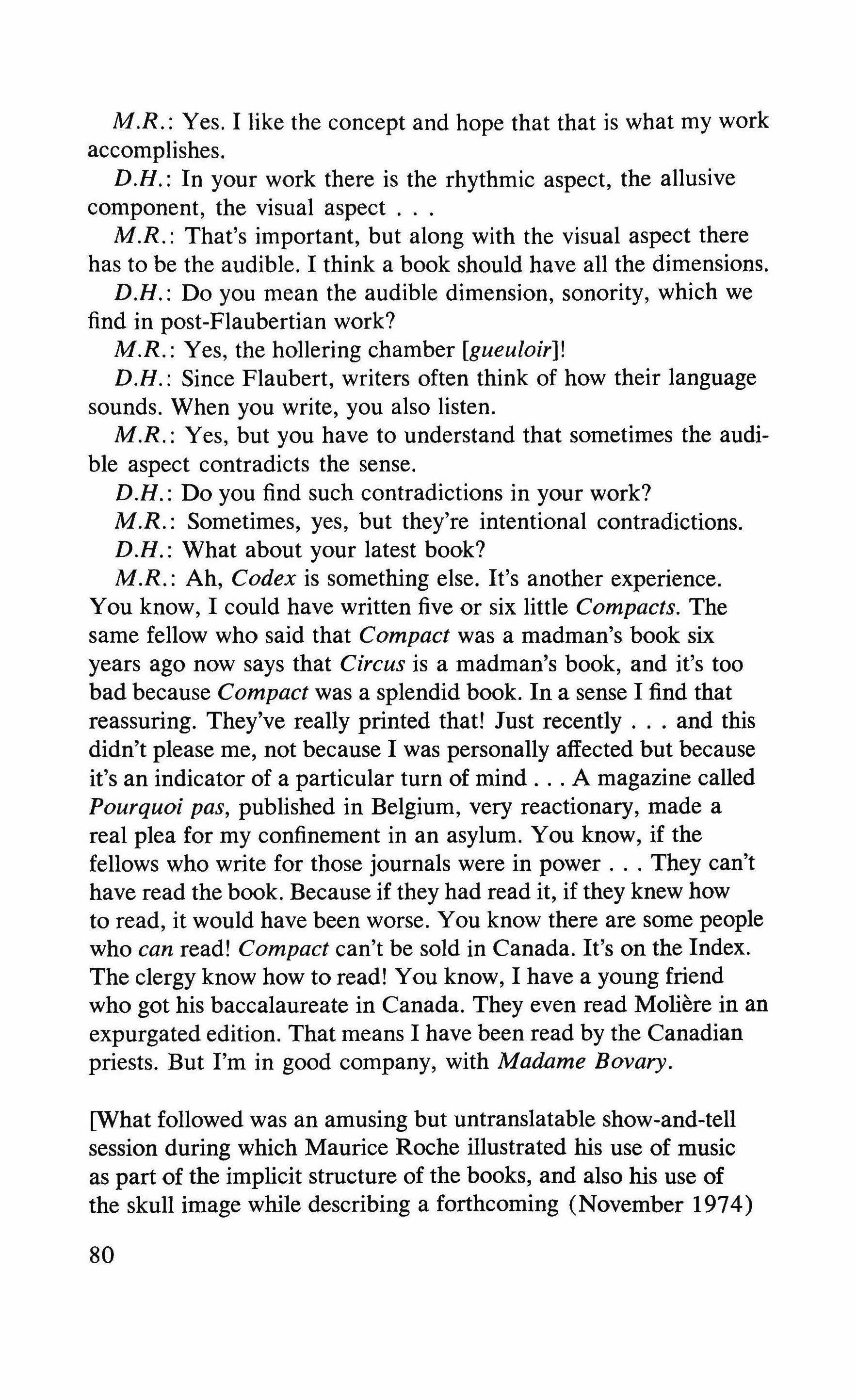
M.R.: Yes. I like the concept and hope that that is what my work accomplishes.
D.H.: In your work there is the rhythmic aspect, the allusive component, the visual aspect
M.R.: That's important, but along with the visual aspect there has to be the audible. I think a book should have all the dimensions.
D.H.: Do you mean the audible dimension, sonority, which we find in post-Flaubertian work?
M.R.: Yes, the hollering chamber [gueuloir]!
D.H.: Since Flaubert, writers often think of how their language sounds. When you write, you also listen.
M.R.: Yes, but you have to understand that sometimes the audible aspect contradicts the sense.
D.H.: Do you find such contradictions in your work?
M.R.: Sometimes, yes, but they're intentional contradictions.
D.H.: What about your latest book?
M.R.: Ah, Codex is something else. It's another experience. You know, I could have written five or six little Compacts. The same fellow who said that Compact was a madman's book six years ago now says that Circus is a madman's book, and it's too bad because Compact was a splendid book. In a sense I find that reassuring. They've really printed that! Just recently and this didn't please me, not because I was personally affected but because it's an indicator of a particular turn of mind A magazine called Pourquoi pas, published in Belgium, very reactionary, made a real plea for my confinement in an asylum. You know, if the fellows who write for those journals were in power They can't have read the book. Because if they had read it, if they knew how to read, it would have been worse. You know there are some people who can read! Compact can't be sold in Canada. It's on the Index. The clergy know how to read! You know, I have a young friend who got his baccalaureate in Canada. They even read Moliere in an expurgated edition. That means I have been read by the Canadian priests. But I'm in good company, with Madame Bovary.
[What followed was an amusing but untranslatable show-and-tell session during which Maurice Roche illustrated his use of music as part of the implicit structure of the books, and also his use of the skull image while describing a forthcoming (November 1974)
80

production of Circus. A quality of Maurice Roche's work is its adaptability to other media-s-dramatic readings, cartoons, productions with music. In this case, the production was by the French specialist in interviews of writers, Georges Charbonnier, and his composer wife, Janine Charbonnier. Roche promised that it would be very amusing, complete with all the circus acts as rendered by Roche and adapted by Charbonnier.]
Notes
1. The dying protagonist has willed his skin away in exchange for promises of care.
2. Harry Mathews, the American novelist, has translated two portions of Roche's work for the Paris Review.
3. "S'ecrit," or "writes itself," plays against its homonym "secret." Words evaporate in the reading, finally imprinting on the unconscious mind of the reader the anagram for ecrit or the tale (recti),
4. See "Traduction graphique d'un fragment de Compact de Maurice Roche," Change, V (Paris, Seuil, 1970).
5. Compact (Paris, Seuil, 1966), p. 164.
6. In Encres Vives (Printemps 1973), "Special Maurice Roche," pp. 126-130.
7. Codex (Paris, Seuil, 1974), p. 158.
8. Compact, p. 156.
81
Maurice Roche: Funeral cantata
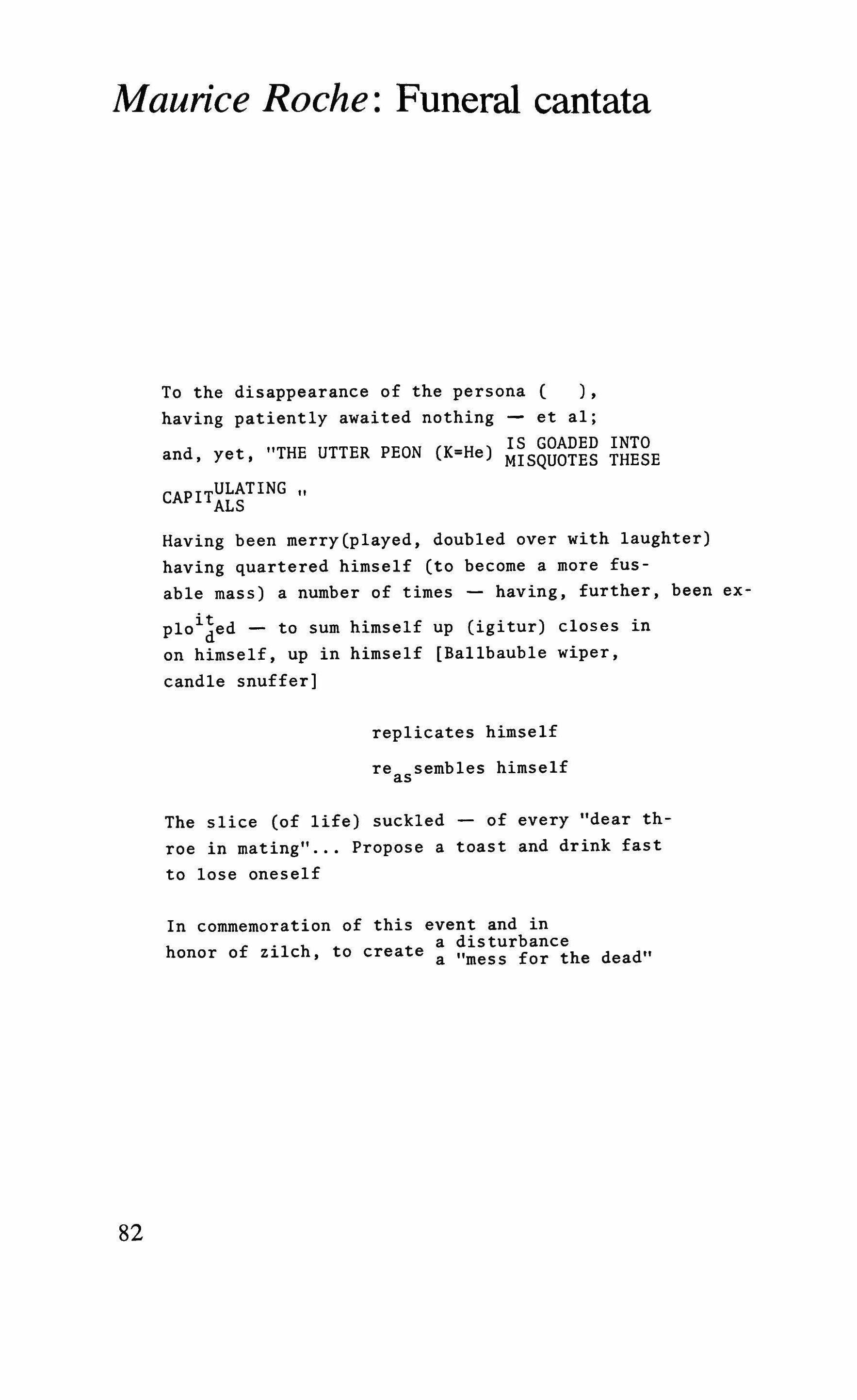
To the disappearance of the persona ( ), having patiently awaited nothing et al; IS GOADED INTO and, yet, "THE UTTER PEON (K=He) MISQUOTES THESE CAPITULATING ALS
Having been merry(played, doubled over with laughter) having quartered himself (to become a more fusable mass) a number of times having, further, been exploi�ed to sum himself up (igitur) closes in on himself, up in himself [Ballbauble wiper, candle snuffer]
replicates himself reassembles himself
The slice (of life) suckled of every "dear throe in mating" Propose a toast and drink fast to lose oneself
In commemoration of this event and in a disturbance honor of zilch, to create a "mess for the dead"
82
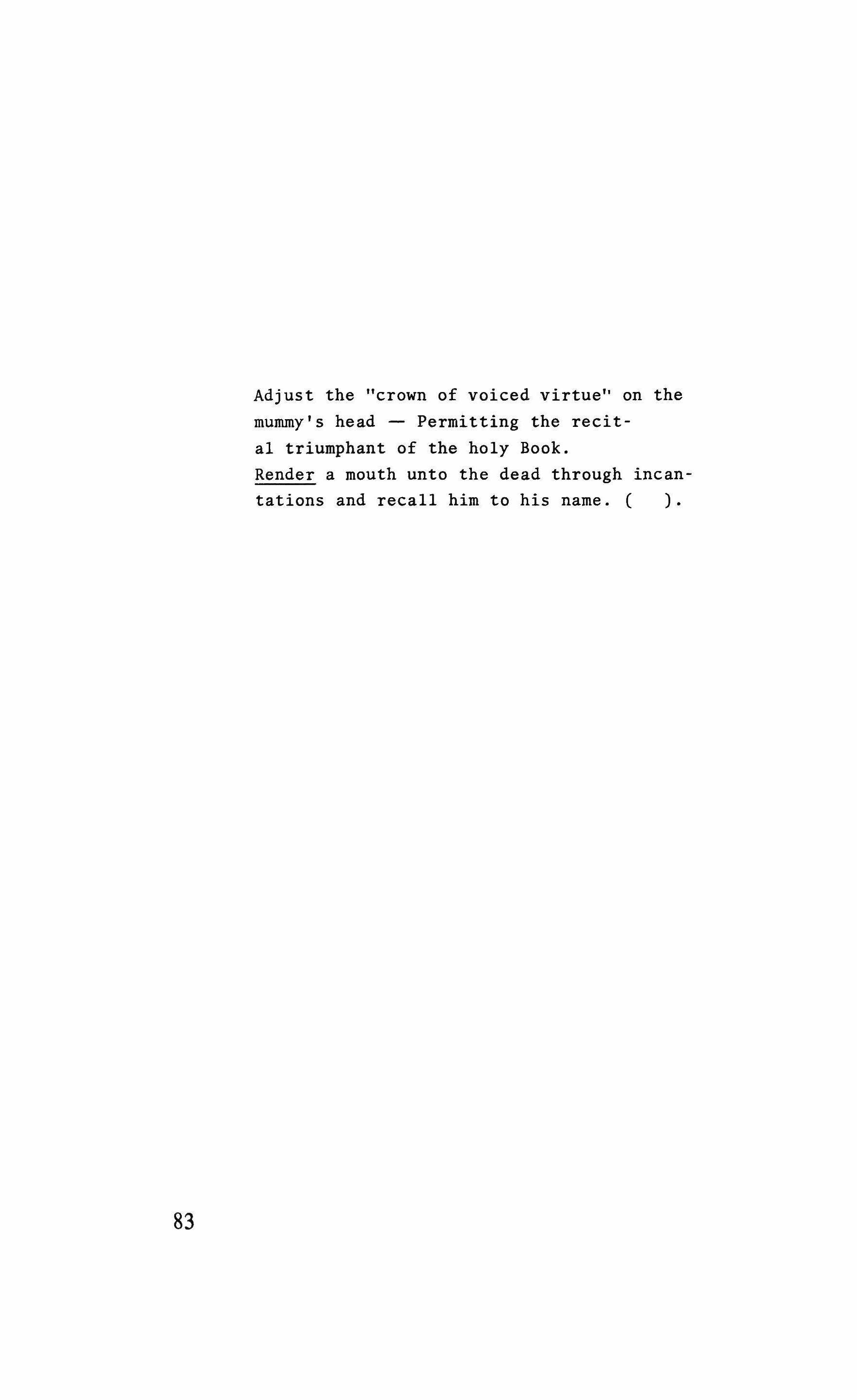
Adjust the "crown of voiced virtue" on the mummy's head Permitting the recital triumphant of the holy Book. Render a mouth unto the dead through incantations and recall him to his name. ( ).
83
REQUIRE EITHER TERM OR NAME
Real Ended ease when all is terminated for it surely has to quite
End the final term ushering in
The great ray of hope in napalm
Or in hydrogen
All this carrion wasted will serve as manure
For growing growing
The grotesque gross greenbacks �aving treated oneself (sumptuously)
On the burden-
Some beast
�ummarily sleeping with terminal slumber
Carillon awakes them, keeps ringing! Leave us alone!
For mercy's sake, let us snooze
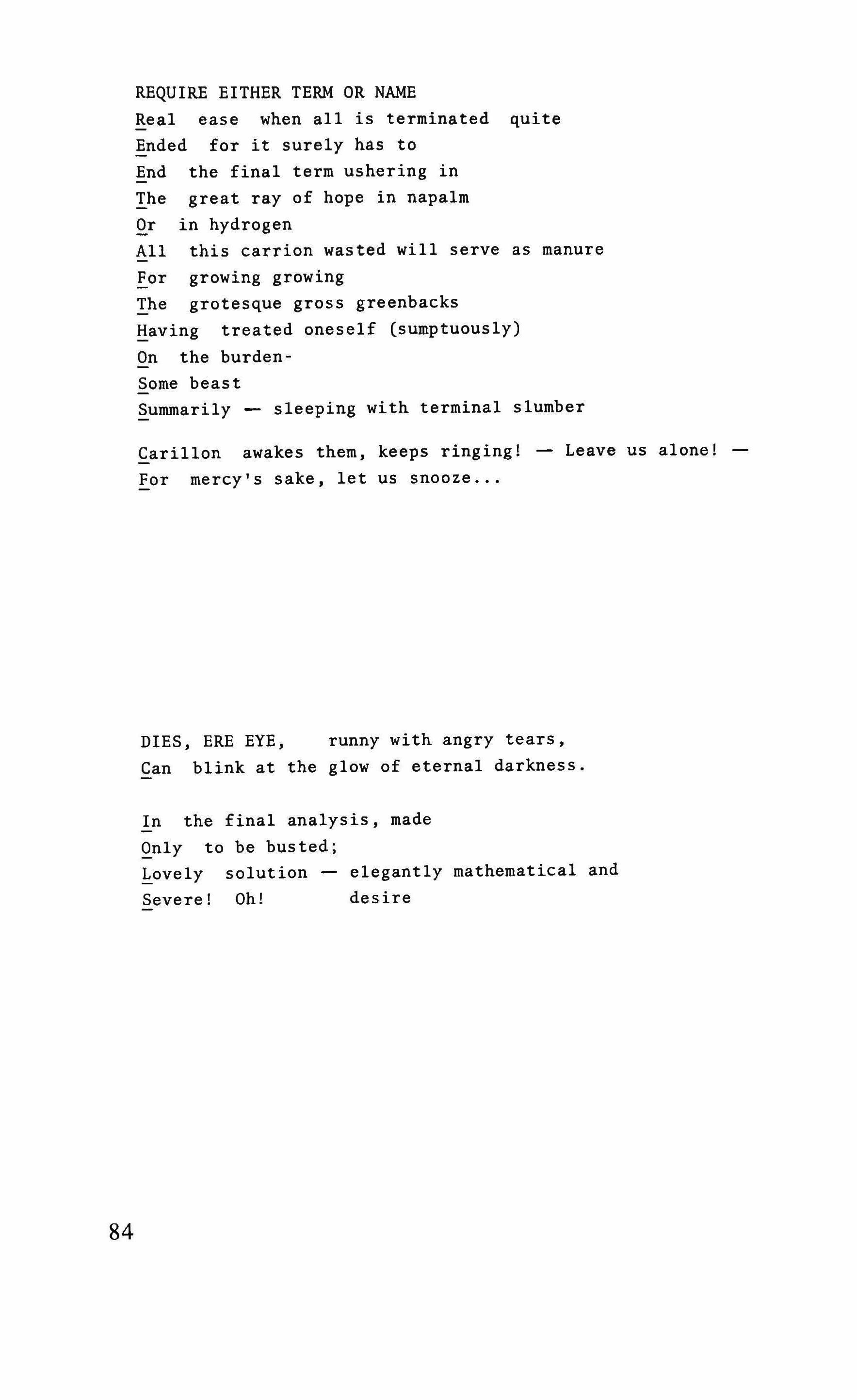
DIES, ERE EYE, runny with angry tears, Can blink at the glow of eternal darkness.
In the final analysis, made
Qnly to be busted; �ovely solution
Severe! Oh! elegantly mathematical and desire
84
Bugger off
Leave us rest in peace! before Making us tremble behind because of the context
social in its compact form: hier the cassock .lcet through the wringer Face to the inquisitor to be put to the test
Answer!
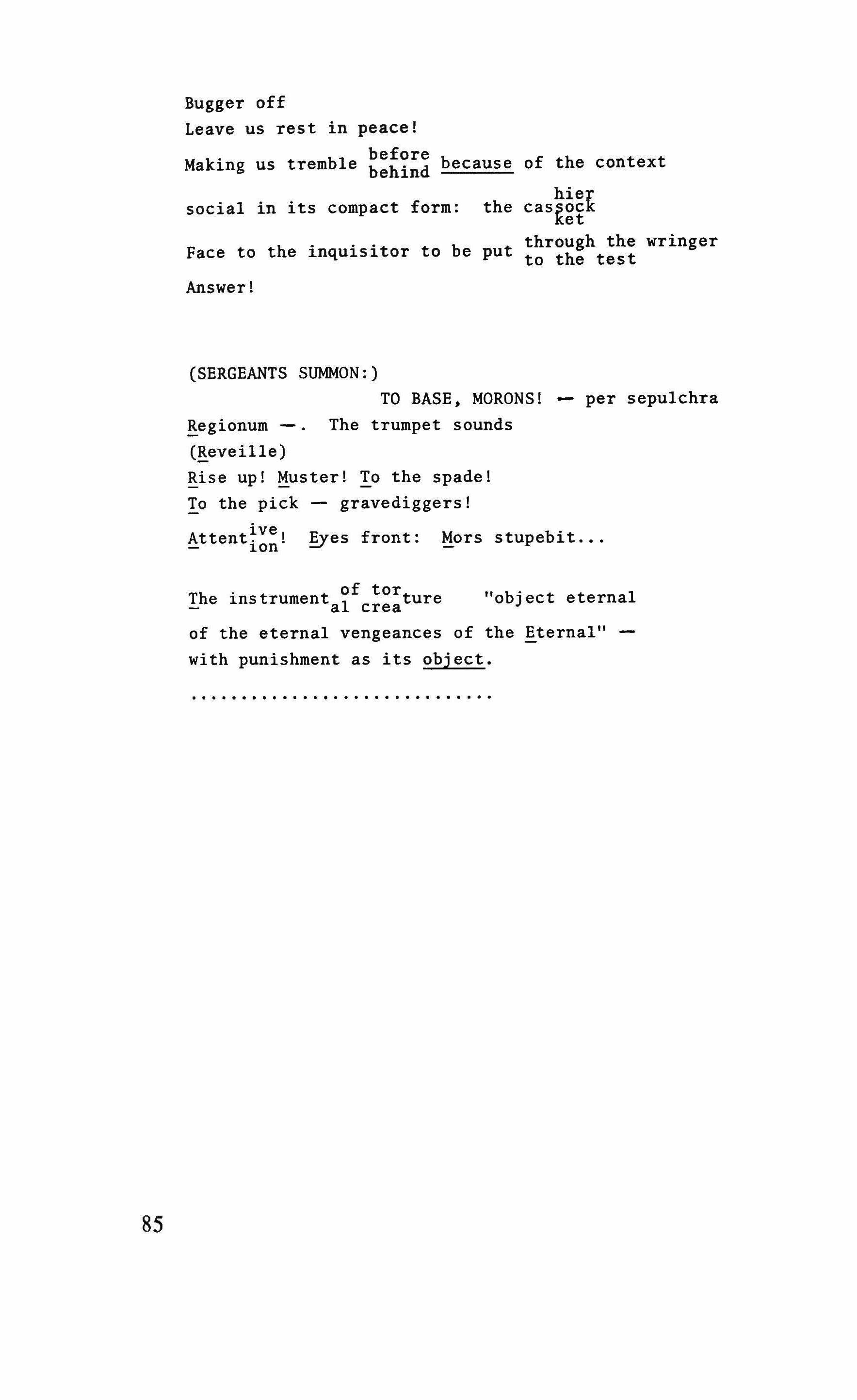
(SERGEANTS SUMMON:)
TO BASE, MORONS! per sepulchra �egionum The trumpet sounds (�eveille) �ise up! �uster! !o the spade! !o the pick gravediggers! �ttent���! �es front: Mors stupebit
"object eternal of the eternal vengeances of the Eternal" with punishment as its object.
85
LIBERATE THIS CRYPT TO US- - Read, decode the cryptic Yellow Pages k f h Sky Blue Book ,Great Boo 0 t e World
the Memo where all writes divinely (already!) (the inscription on the parchment of dental skin
What to do with five letters? Spine, Venal, Navel, Penis, Roche?
After soundings, the prognostics) to know Who will have scientifically earned perdition?
On the pot, ? LATENT, APPEARS A BIT QUEER QUITE! quidquid latet apparebit, Not ass-holitary chance of Dis-missal
Here.
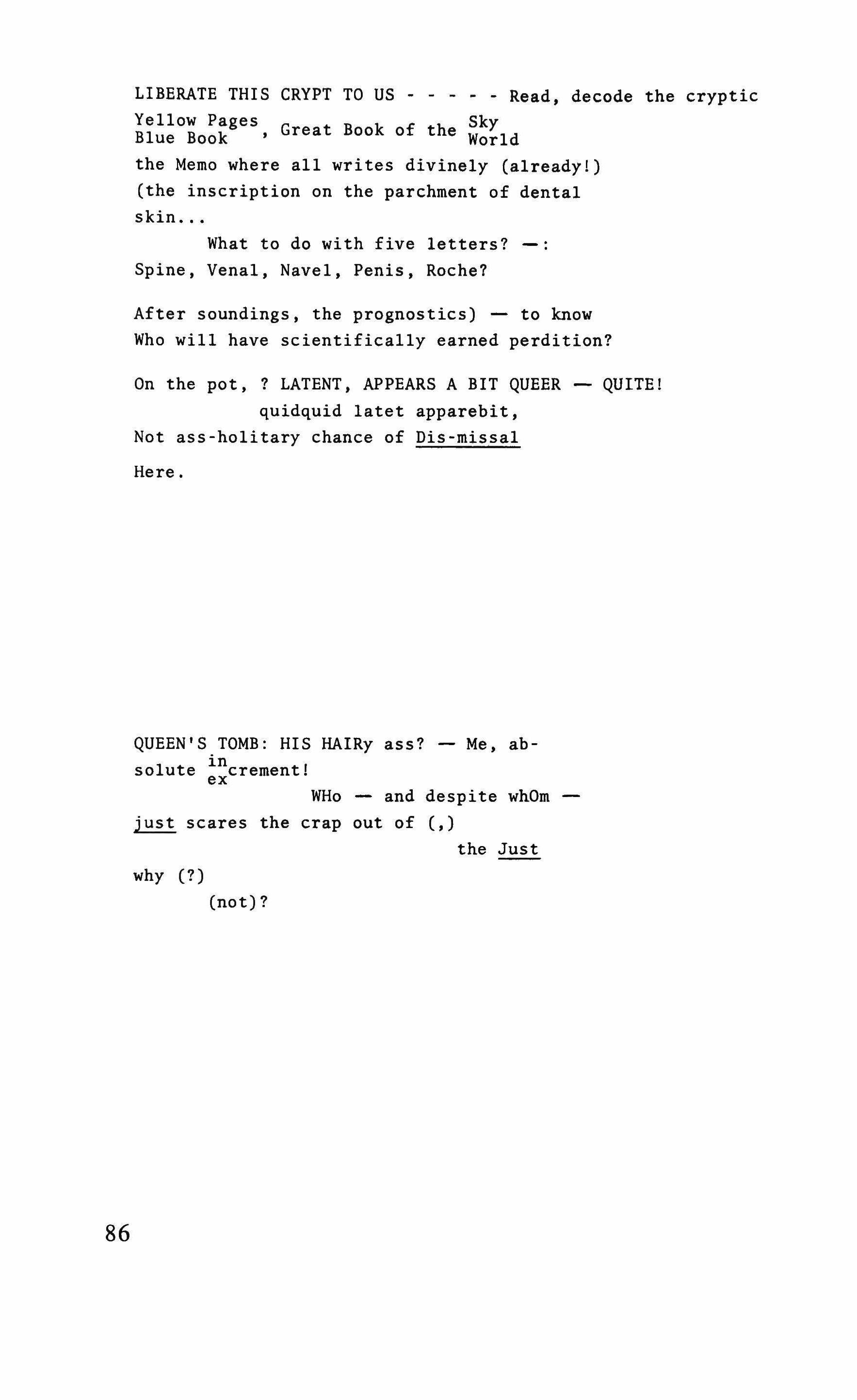
QUEEN'S TOMB: HIS HAIRy ass? Me, absolute !�crement!
WHo and despite whOm just scares the crap out of (,) the Just why (?) (not)?
86
EXTRA!
MEN DIE; MAGI INTESTATE before collecting your cash, cough; then get the hell out of here!
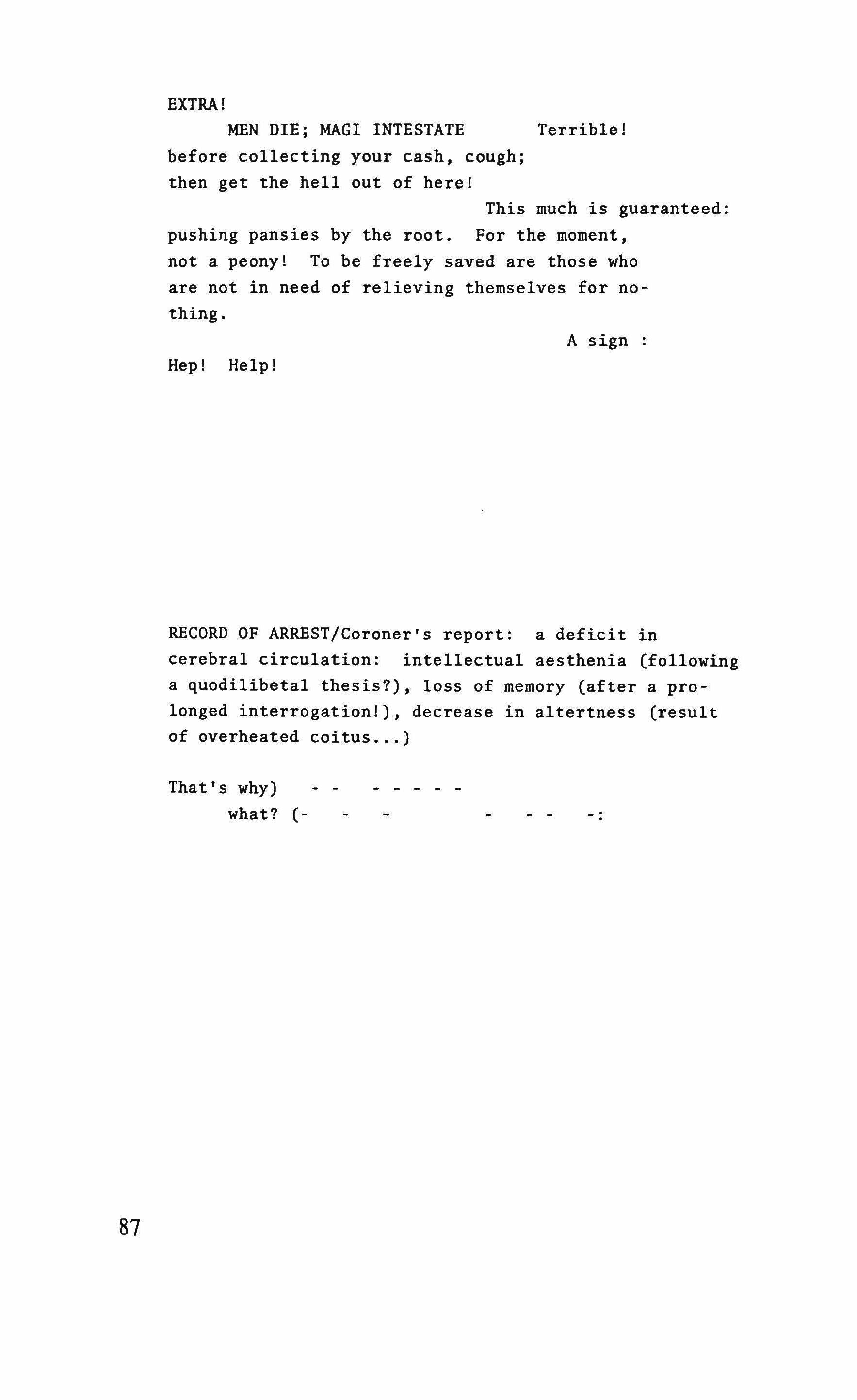
Terrible!
This much is guaranteed: pushing pansies by the root. For the moment, not a peony! To be freely saved are those who are not in need of relieving themselves for nothing.
A sign
Hep! Help!
RECORD OF ARREST/Coroner's report: a deficit in cerebral circulation: intellectual aesthenia (following a quodilibetal thesis?), loss of memory (after a prolonged interrogation!), decrease in altertness (result of overheated coitus )
That's why) what? (-
87
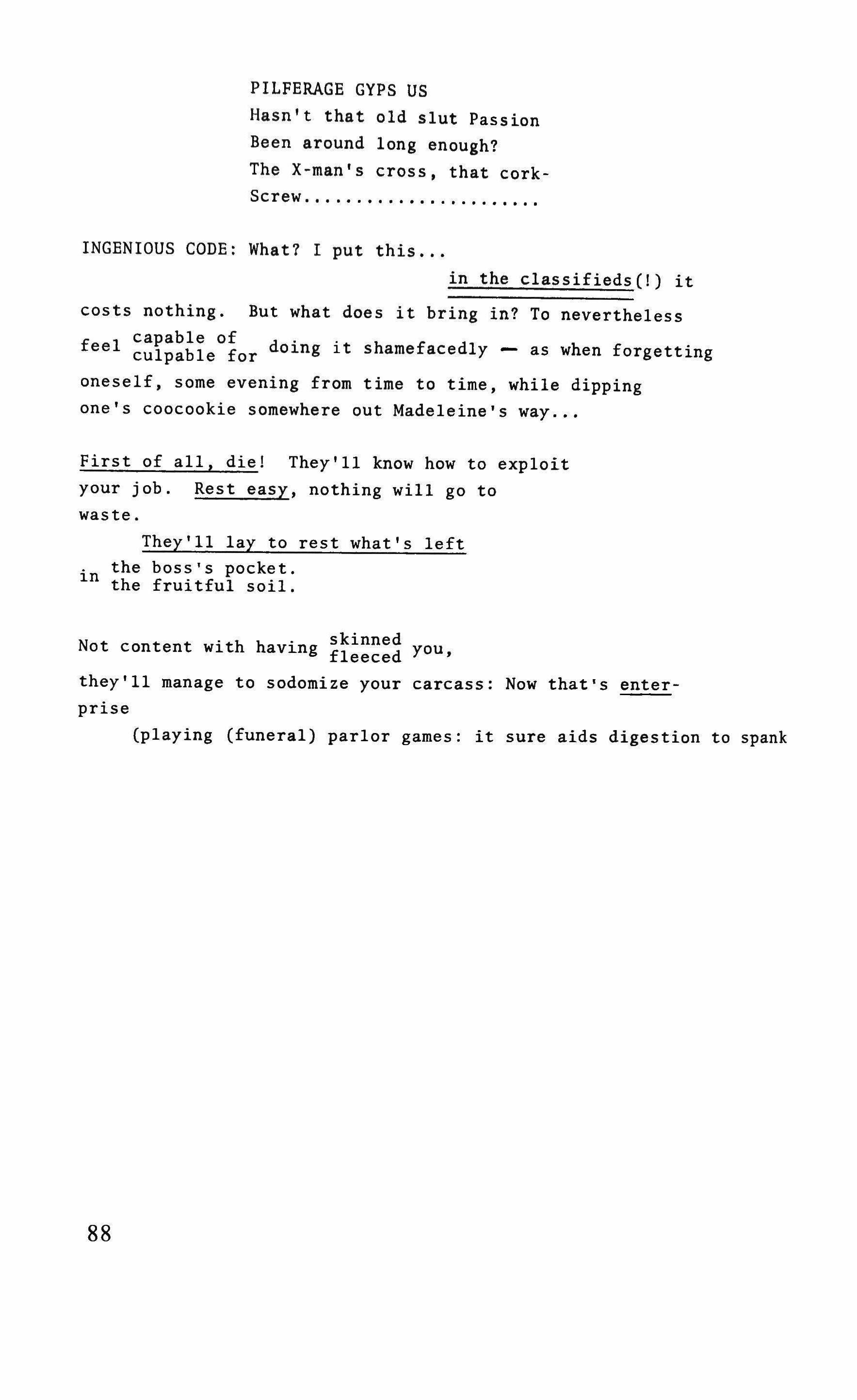
PILFERAGE GYPS US
Hasn't that old slut Passion Been around long enough?
The X-man's cross, that corkScrew ......•...•.........•..
INGENIOUS CODE: What? I put this in the classifieds(!) it costs nothing. But what does it bring in? To nevertheless feel capable of doing it shamefacedly as when forgetting culpable for oneself, some evening from time to time, while dipping one's coocookie somewhere out Madeleine's way
First of all, die! They'll know how to exploit your job. Rest easy, nothing will go to waste.
They'll lay to rest what's left the boss's pocket. in the fruitful soil.
N t t "th h skinned o conten W1 aV1ng fleeced you, they'll manage to sodomize your carcass: Now that's enterprise (playing (funeral) parlor games: it sure aids digestion to spank
88
the bottom of the upper echelon). And they'll fetch you a smart blow! from there (after)!
doing his job, the turnkey bids farewell and seals the portal on the right!
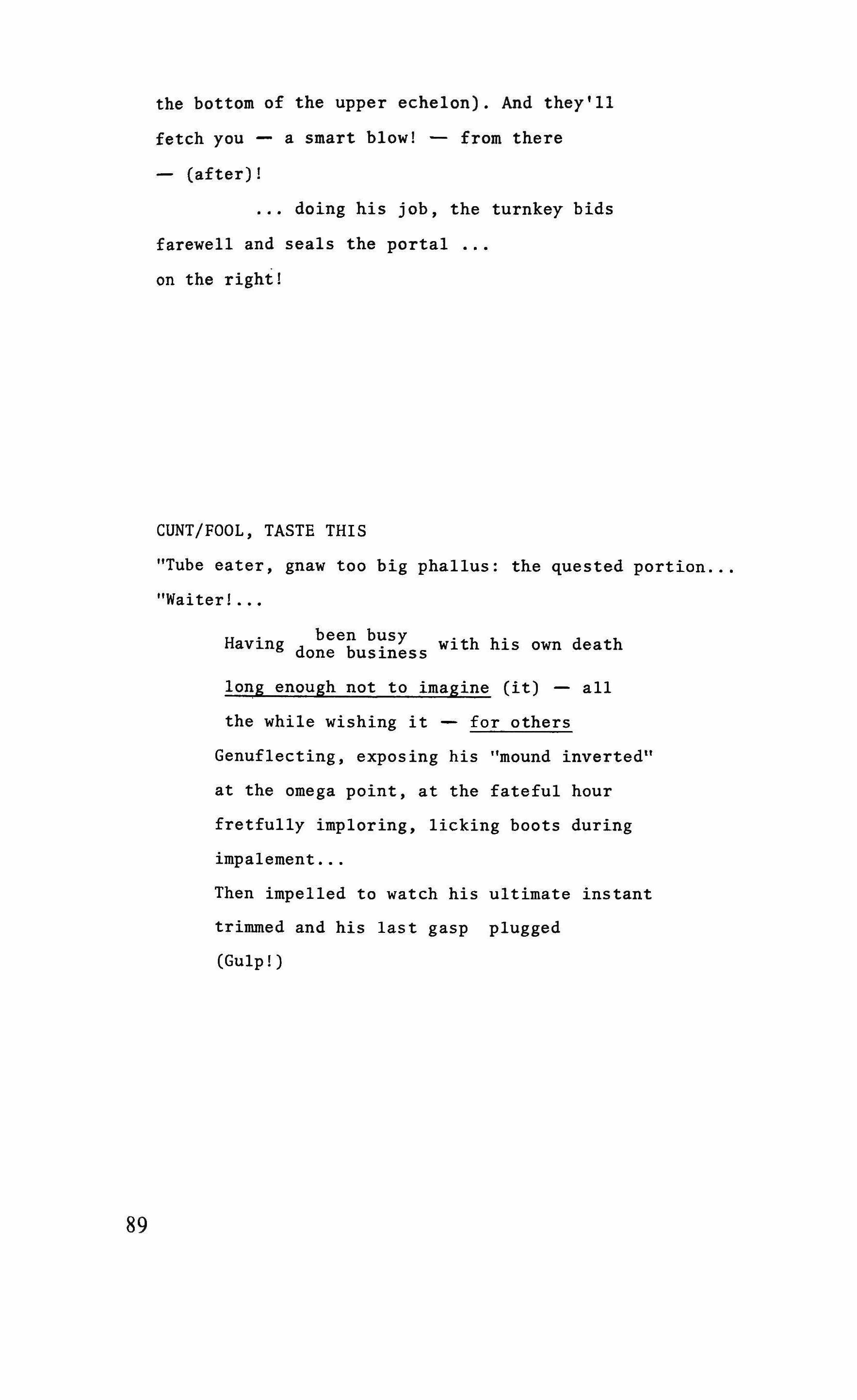
CUNT/FOOL, TASTE THIS "Tube eater, gnaw too big phallus: the quested portion "Waiter!
been busy Having done business with his own death long enough not to imagine (it) all the while wishing it for others Genuflecting, exposing his "mound inverted" at the omega point, at the fateful hour fretfully imploring, licking boots during impalement
Then impelled to watch his ultimate instant trimmed and his last gasp plugged (Gulp! )
89
BLACK CRIME, OH SADISTS: "YES
"I said yes I will yes"
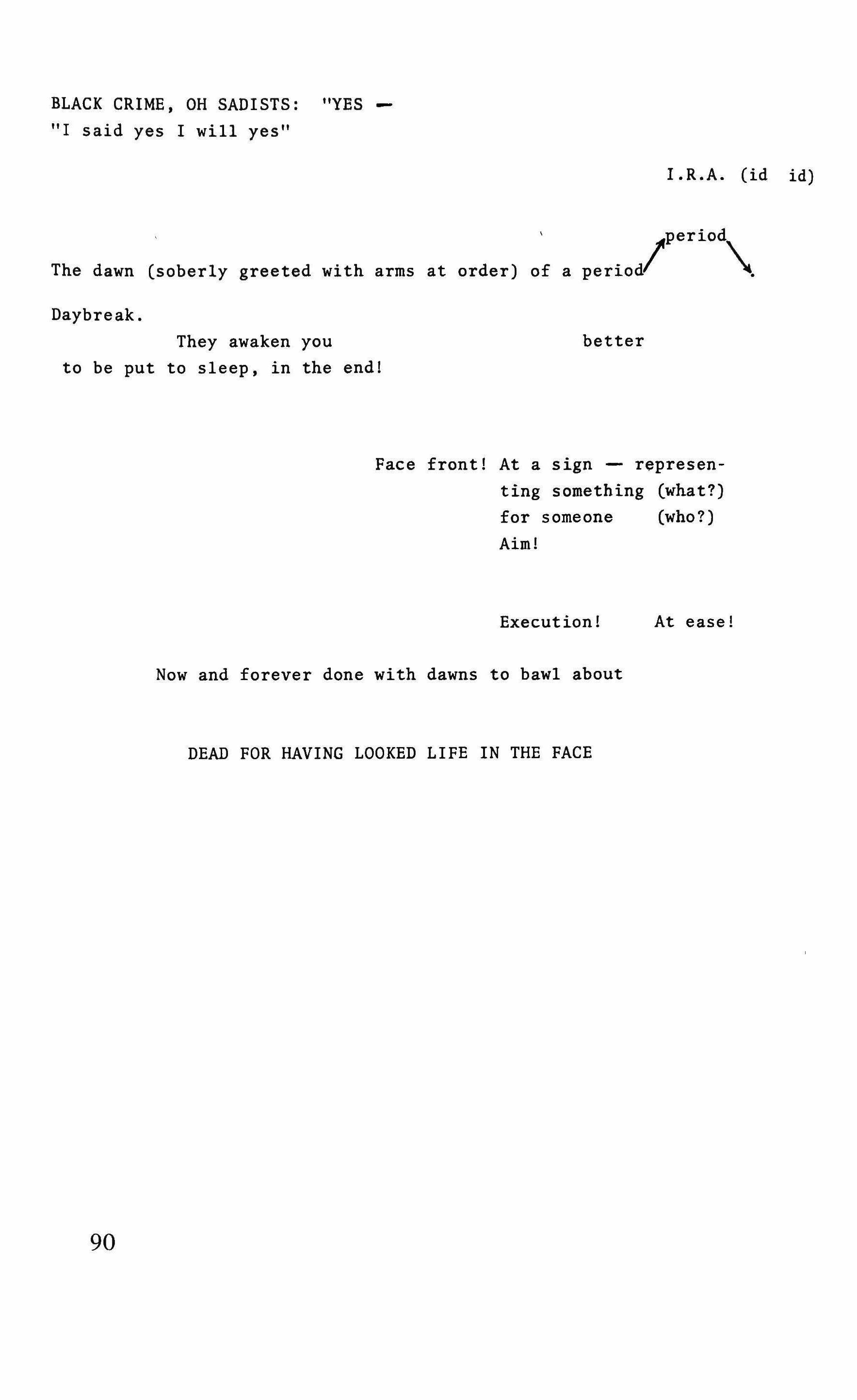
I .R.A. (id id) period
The dawn (soberly greeted with arms at order) of a perio� �. Daybreak. They awaken you to be put to sleep, in the end! better
Face front! At a sign representing something (what?) for someone Aim! (who?)
Execution! At ease!
Now and forever done with dawns to bawl about
DEAD FOR HAVING LOOKED LIFE IN THE FACE
90
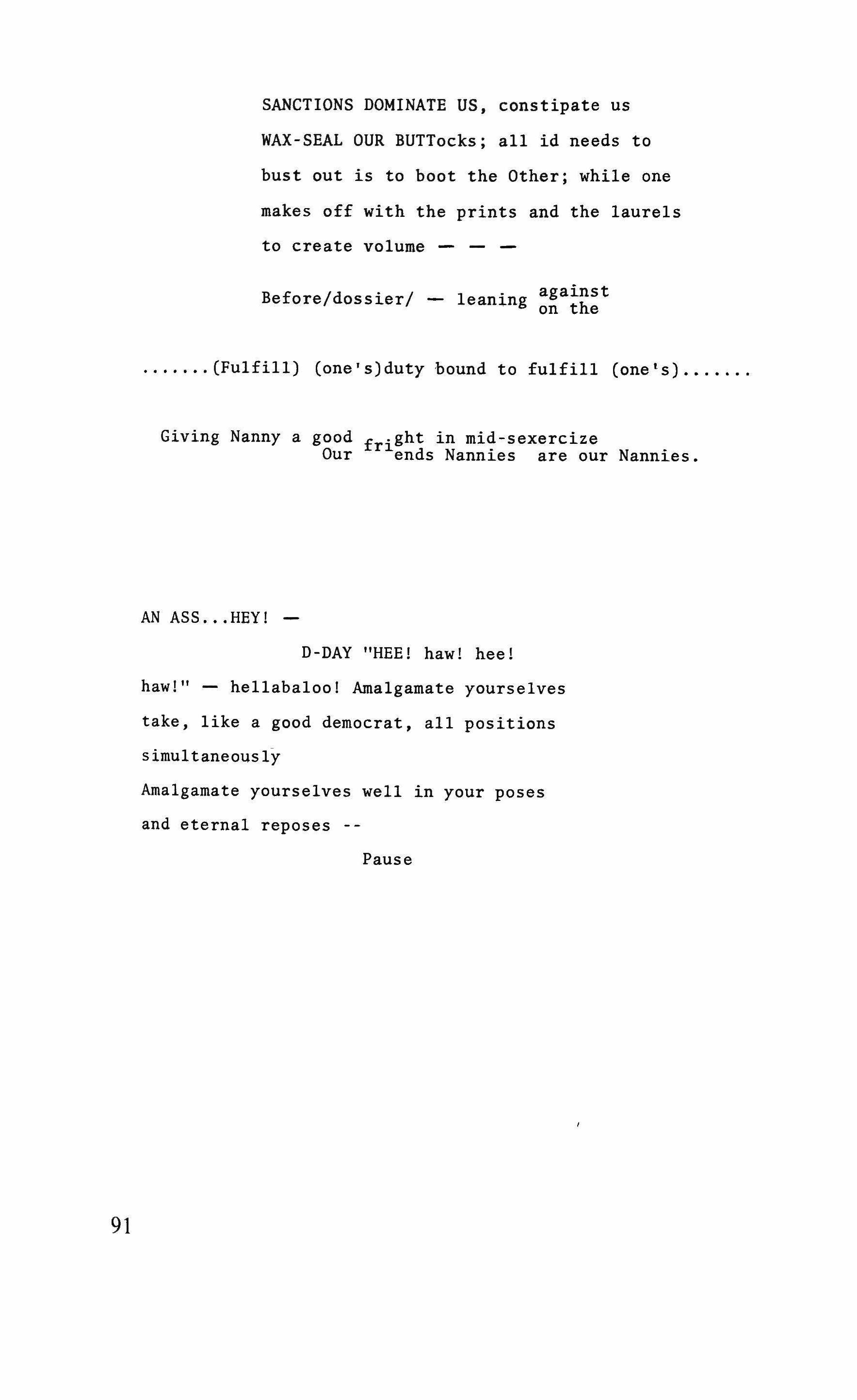
SANCTIONS DOMINATE US, constipate us
WAX-SEAL OUR BUTTocks; all id needs to bust out is to boot the Other; while one makes off with the prints and the laurels to create volume --
Before/dossier/ - leaning against on the (Fulfill) (one's)duty bound to fulfill (one's)
Giving Nanny a good fr·ght in mid-sexercize Our �ends Nannies are our Nannies.
AN ASS HEY!
D-DAY "HEE! haw! heel haw!" hellabaloo! Amalgamate yourselves take, like a good democrat, all positions simultaneously
Amalgamate yourselves well in your poses and eternal reposes
Pause
91
DORMANT AGE (JAILS INCREASE STAYS)
exploited/parasitic
the dead beaSts of the REV�L�TION
what do they symbolize?
before losing this �:verable head to pay the (day of) reckoning hear the bad news and take a powder against the tension(wired) head aches craning nearby// throw in the condemned man's last drink add ice
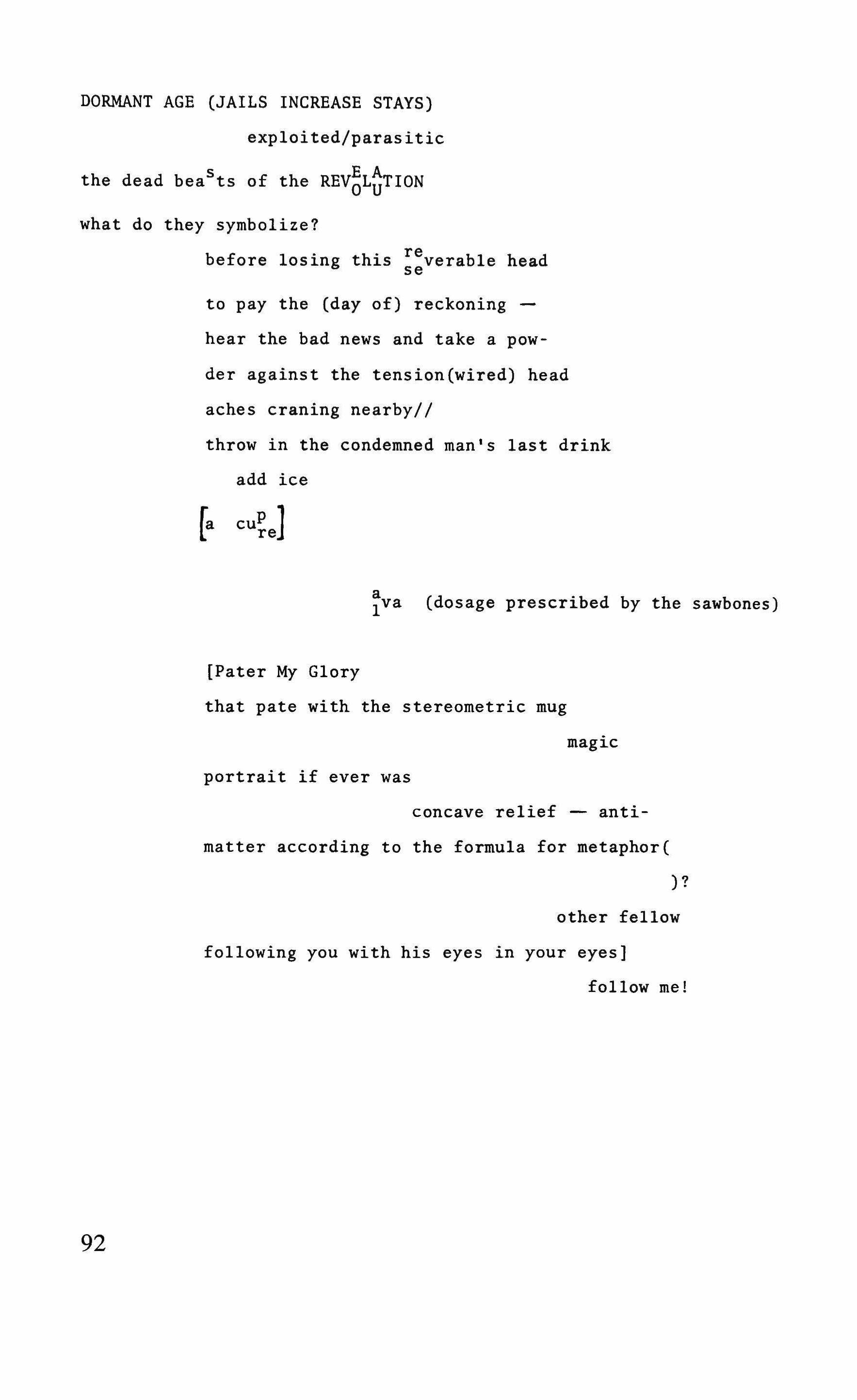
a Iva (dosage prescribed by the sawbones)
[Pater My Glory that pate with the stereometric mug magic portrait if ever was
concave relief antimatter according to the formula for metaphor( )? other fellow following you with his eyes in your eyes] follow me!
� �J
92
lease yourself!
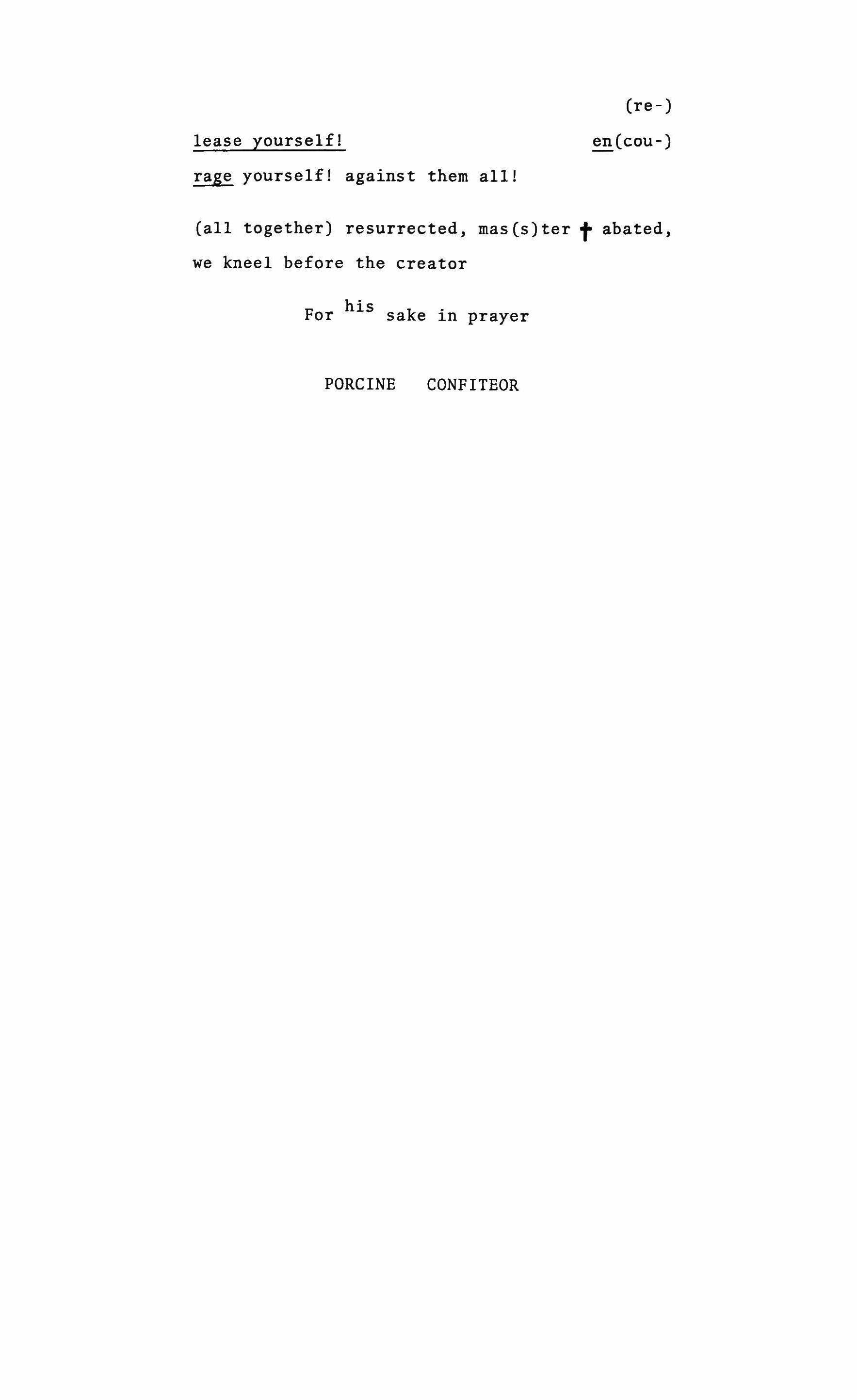
(re- )
rage yourself! against them all! en (cou-)
(all together) resurrected, mas(s)ter t abated, we kneel before the creator
F his k or sa e In prayer
PORCINE CONFITEOR
O'er the remnants we watched the sunset's eerie darkness: Flagrant proof that the night was still there summing up History
Gehenna's lovely promises having been kept [A margin between what is predicted and what ONE TAKES [his word] (and in this margin inscribe glosses)] even under torture, before the keeper, the questionnaire, I indulge in skullduggery
On the day that one dies one should have to change names
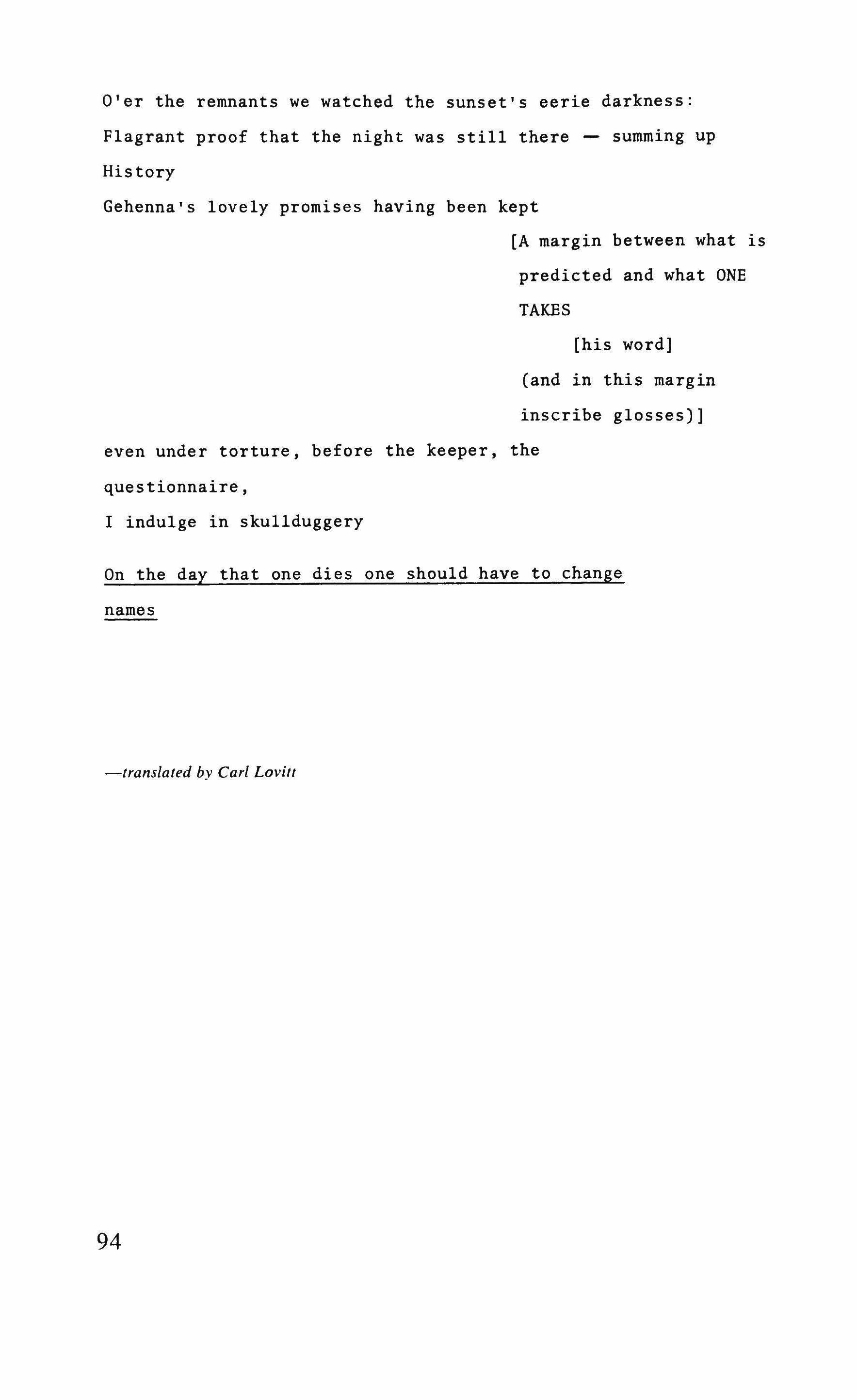
=-translated by Carl Lovitt
94
from Partie
Helene Cixous
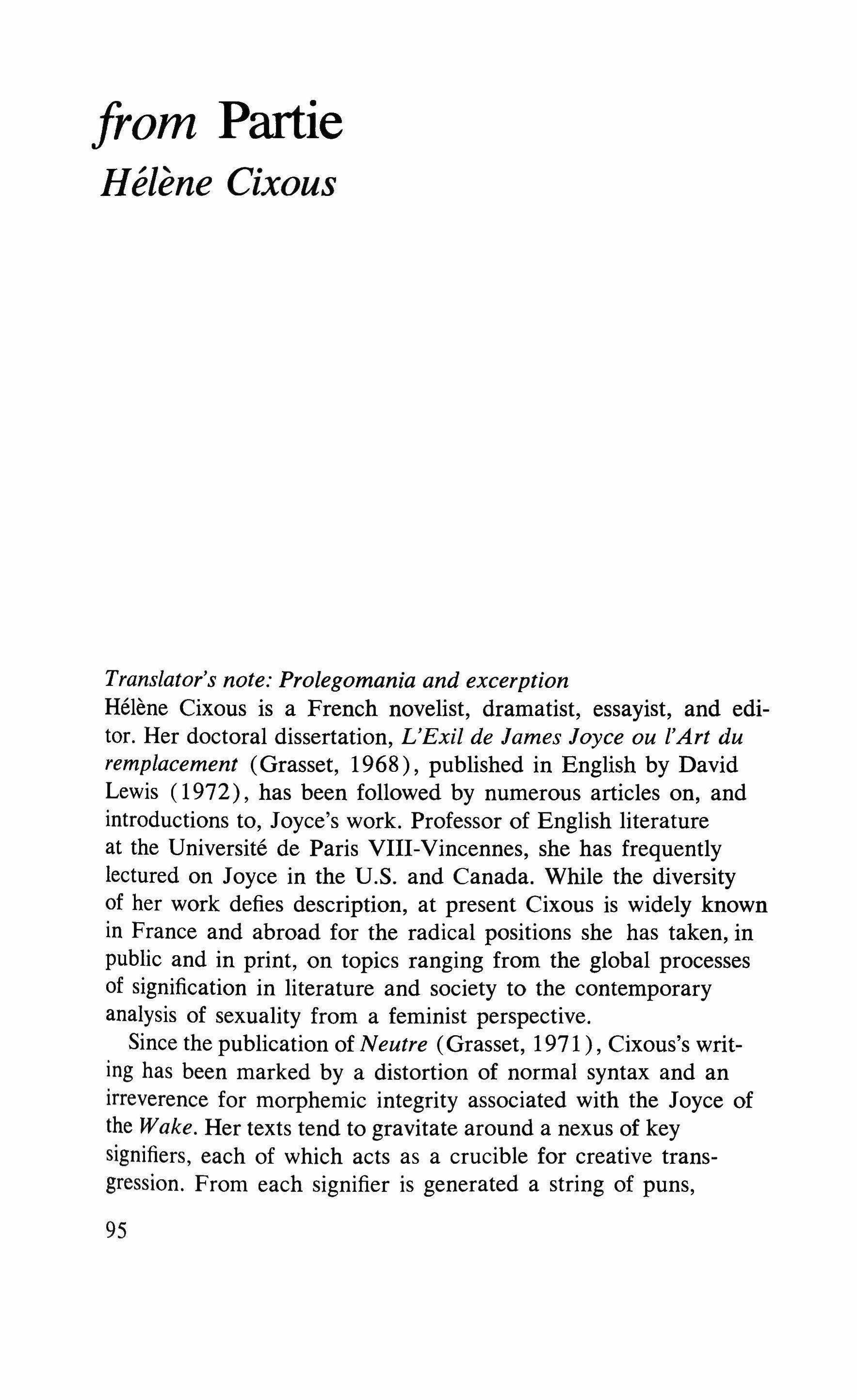
Translator's note: Prolegomania and excerption
Helene Cixous is a French novelist, dramatist, essayist, and editor. Her doctoral dissertation, L'Exil de James Joyce au l'Art du remplacement (Grasset, 1968), published in English by David Lewis (1972), has been followed by numerous articles on, and introductions to, Joyce's work. Professor of English literature at the Universite de Paris VIII-Vincennes, she has frequently lectured on Joyce in the U.S. and Canada. While the diversity of her work defies description, at present Cixous is widely known in France and abroad for the radical positions she has taken, in public and in print, on topics ranging from the global processes of signification in literature and society to the contemporary analysis of sexuality from a feminist perspective. Since the publication of Neutre (Grasset, 1971), Cixous's writing has been marked by a distortion of normal syntax and an irreverence for morphemic integrity associated with the Joyce of the Wake. Her texts tend to gravitate around a nexus of key signifiers, each of which acts as a crucible for creative transgression. From each signifier is generated a string of puns,
95
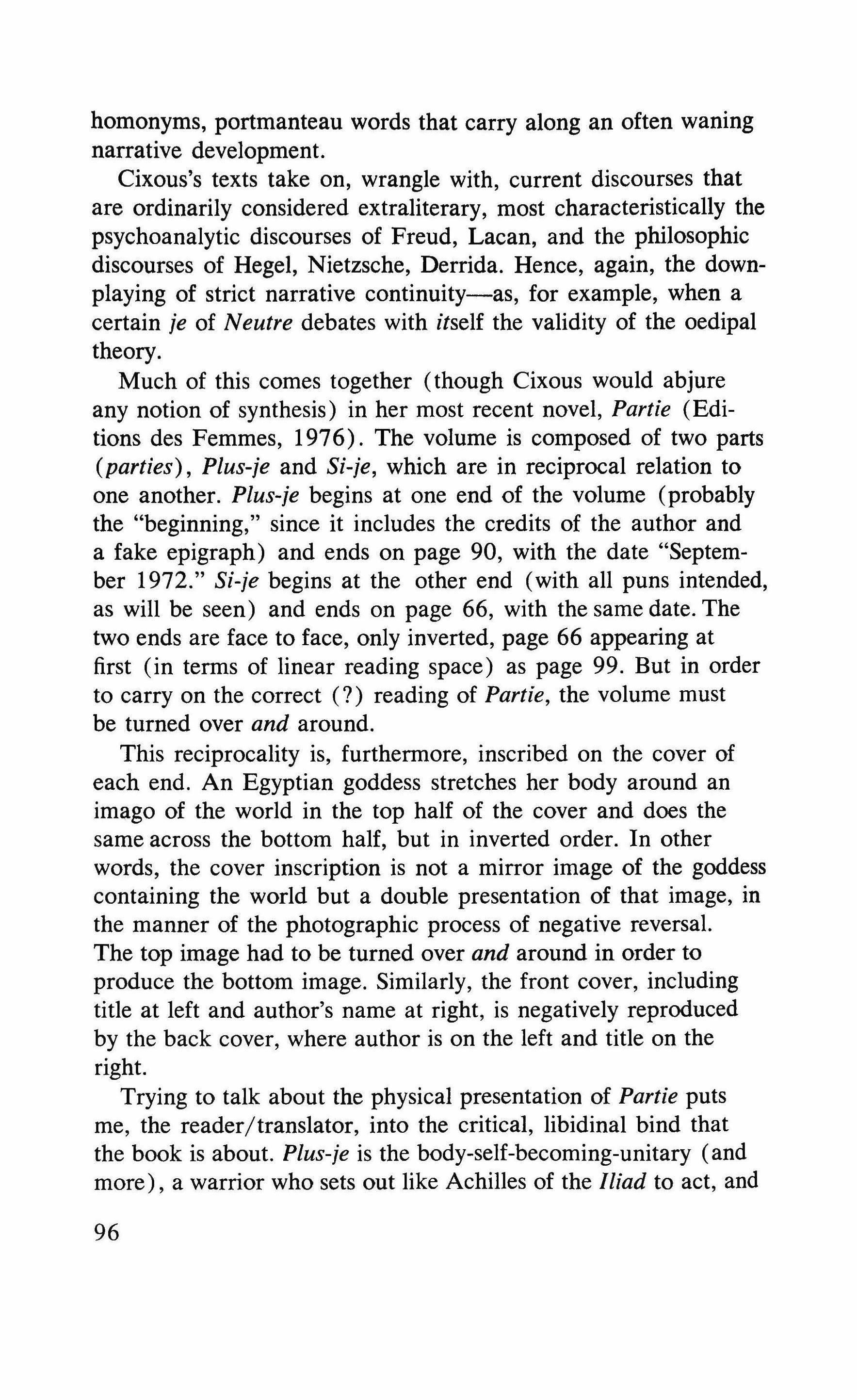
homonyms, portmanteau words that carry along an often waning narrative development.
Cixous's texts take on, wrangle with, current discourses that are ordinarily considered extraliterary, most characteristically the psychoanalytic discourses of Freud, Lacan, and the philosophic discourses of Hegel, Nietzsche, Derrida. Hence, again, the downplaying of strict narrative continuity-as, for example, when a certain je of Neutre debates with itself the validity of the oedipal theory.
Much of this comes together (though Cixous would abjure any notion of synthesis) in her most recent novel, Partie (Editions des Femmes, 1976). The volume is composed of two parts (parties), Plus-je and Si-je, which are in reciprocal relation to one another. Plus-je begins at one end of the volume (probably the "beginning," since it includes the credits of the author and a fake epigraph) and ends on page 90, with the date "September 1972." Si-je begins at the other end (with all puns intended, as will be seen) and ends on page 66, with the same date. The two ends are face to face, only inverted, page 66 appearing at first (in terms of linear reading space) as page 99. But in order to carryon the correct (?) reading of Partie, the volume must be turned over and around.
This reciprocality is, furthermore, inscribed on the cover of each end. An Egyptian goddess stretches her body around an imago of the world in the top half of the cover and does the same across the bottom half, but in inverted order. In other words, the cover inscription is not a mirror image of the goddess containing the world but a double presentation of that image, in the manner of the photographic process of negative reversal. The top image had to be turned over and around in order to produce the bottom image. Similarly, the front cover, including title at left and author's name at right, is negatively reproduced by the back cover, where author is on the left and title on the right.
Trying to talk about the physical presentation of Partie puts me, the reader/translator, into the critical, libidinal bind that the book is about. Plus-je is the body-self-becoming-unitary (and more), a warrior who sets out like Achilles of the Iliad to act, and
96
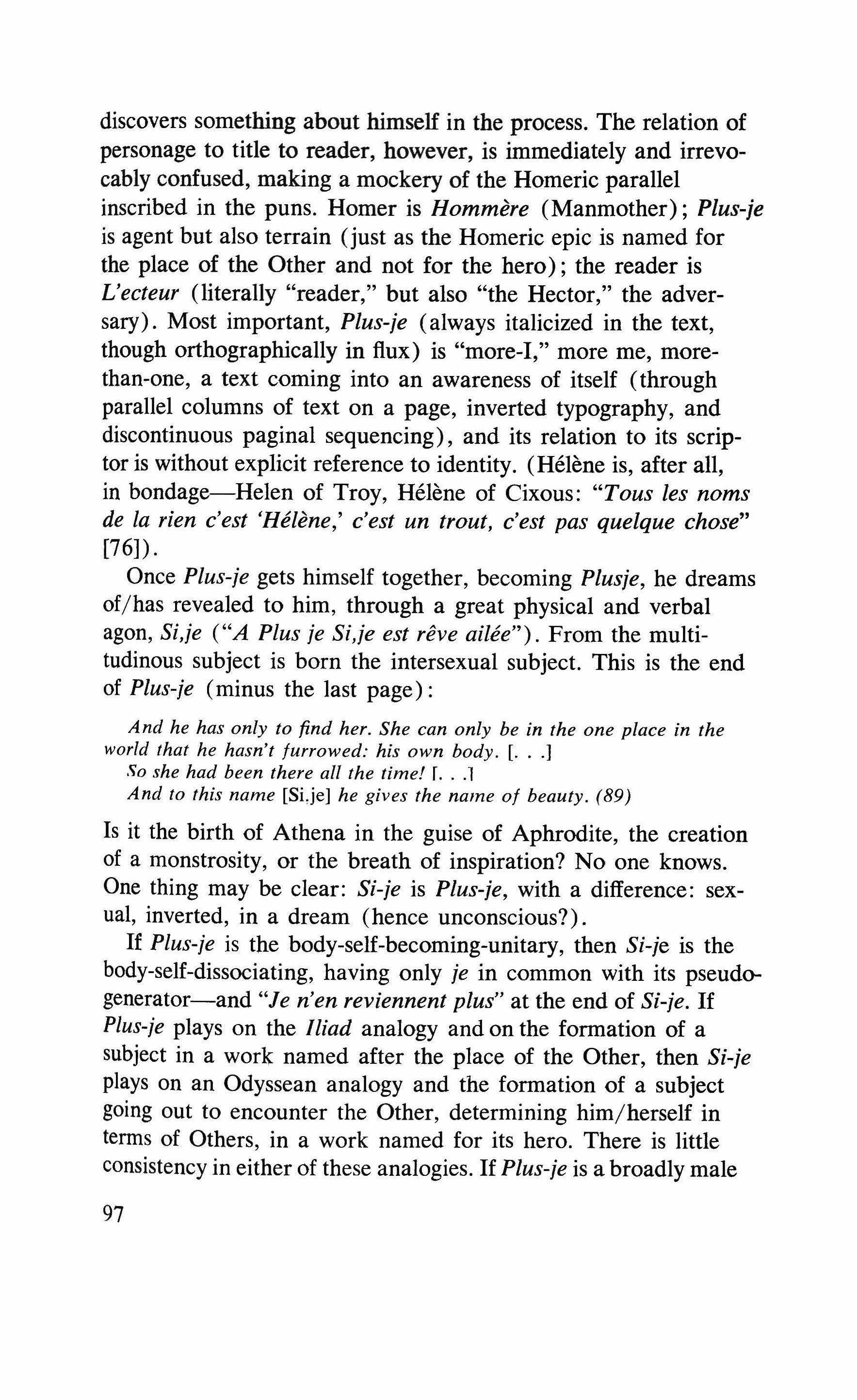
discovers something about himself in the process. The relation of personage to title to reader, however, is immediately and irrevocably confused, making a mockery of the Homeric parallel inscribed in the puns. Homer is Hommere (Manmother); Plus-je is agent but also terrain (just as the Homeric epic is named for the place of the Other and not for the hero); the reader is L'ecteur (literally "reader," but also "the Hector," the adversary). Most important, Plus-je (always italicized in the text, though orthographically in flux) is "more-I," more me, morethan-one, a text coming into an awareness of itself (through parallel columns of text on a page, inverted typography, and discontinuous paginal sequencing), and its relation to its scriptor is without explicit reference to identity. (Helene is, after all, in bondage-Helen of Troy, Helene of Cixous: "Tous les noms de la rien c'est 'Helene,' c'est un trout, c'est pas quelque chose" [76])
Once Plus-je gets himself together, becoming Plusje, he dreams of/has revealed to him, through a great physical and verbal agon, Si,je ("A Plus je Si.je est reve ailee"], From the multitudinous subject is born the intersexual subject. This is the end of Plus-je (minus the last page):
And he has only to find her. She can only be in the one place in the world that he hasn't furrowed: his own body. [ J SO she had been there all the time! r. 1
And to this name [Si.je] he gives the name of beauty. (89)
Is it the birth of Athena in the guise of Aphrodite, the creation of a monstrosity, or the breath of inspiration? No one knows. One thing may be clear: Si-je is Plus-je, with a difference: sexual, inverted, in a dream (hence unconscious?).
If Plus-je is the body-self-becoming-unitary, then Si-ie is the body-self-dissociating, having only je in common with its pseudogenerator-and "Je n'en reviennent plus" at the end of Si-ie. If Plus-je plays on the Iliad analogy and on the formation of a subject in a work named after the place of the Other, then Si-je plays on an Odyssean analogy and the formation of a subject going out to encounter the Other, determining him/herself in terms of Others, in a work named for its hero. There is little consistency in either of these analogies. If Plus-je is a broadly male
97
(non)personage, then Si-je is the leading female entity, exquisitely divided and diffused, desirous of all ambivalences, in the flip side of the mock epic that is Partie.
Bear in mind that what follows (the end of Plus-je plus the birth of Si-je, placed apart as a preface, hors d'oeuvre) cannot mime the physical manipulation of the book (l'ivre, page 65 et passim), required to move from one textual ending to an other textual opening. Such a negative reversal process you have in each one of me. He will wrIte no more, unwilling to appropriate a text de-signed to explode precisely any notion of the integrated subject, sexual difference, private property, and the bourgeois dream of internal consistency. *
"Mais il faut tout de meme signer"
 Keith Cohen
Keith Cohen
[End of Plus-je]
Between me and me and betweenme and betweenme and betweenme and me and me and me. Bound for rejoicing and rebound to her soul 0 seed to seed, inconsieveable I am lost to all of you entire, at a loss of me all the moreso me all the moreso me plus you re spiring me on your spirals you giving ussuck at our breast aspirating us her-dling us sucklewing us on wings on souls and on blood-milk.
me as you my mouth, you my mother her self outstretched on you as me your self my lips, your mouth for she is the one who opens heaventuality myself your breath my mellifer-us my mellifinest portion mell-if-you-suck my parts her-dling, my self your milk me your self abound my her-dled blood.
September 1972
Cf. Helene Cixous, "The Character of Character," New Literary History, V, 2 (Winter 1974), and "The Laugh of the Medusa," Signs, 4 (Summer 1976).
98

Si-je: Plasteapart
Ii.l? will be taken as the sighn of onceupondicate undisciplined, undeknowable diffissions.
Everything that wishes to be vibracious, reversed, alive, could by naymed li.I? The If,! can'to will swell from a sand suddenly over-stimulated by a syriad of sounds If, I-rises from a Signachurning Source, canterior to a concerpt, so clearly as to reflect ten thousand hymnagistic rhythms If Isolated a sighn of that sparse viginal beauty, fower, flire, drop, shadow offshoot, and placed herself on the skin of our renewdity in the justapofashion of an organ intertwining itself the length of a body, as the eye glides in its suckit, or as two breasts are graftid onto raw mamaterial to make woman
If the skin of the newde, separading itself in many a heaventual object, felt priqued by this beauty mark into s/he-coileseenee, If,!? would then be a missIle-half-sky or half-earth half seed, semicorn semigraine, liable to any confulsion, in order to refiirct, over Ionder, a thousand operational, seminal imeges: to raise the question to be dolt with, the point of interscission between my sexual missiveness and his aggressivisibility, between his seminimal terrifactiveness and his fulminating firmamince.
o rIsing gush from signachurning source, innate Icetorm, faultless voice, bright sonorous gold, partificial shimmurmur, scratch by Ij.I? in the skylent hangings. Let a cry illuminate the blackness, liberating the infinite.
If anything can be de-signated by the sound of Ij.I? it's the white on black that she screams far away from ends and from now on, bursting with cajewelry continuity without reservation li.I? will hear that which without herhis audition would have remained mute, such as it is allied in front and affectively to the hitherto unknown.
S/he will not enter: s/he is enterned there between If and I, spielbound by the bind fate that forebodes, thinksing that I gets aforeplayed.
Between evasion and evision, prefiguring herself on the road toward self-encounter, s/he will make her self up in a few lines, rIsing from a ground to take on light by being uglitter: s/he will be no less serfprised than if her members were spelled away in an inexhaustible trickle of water, and would be lasso were s/he
99
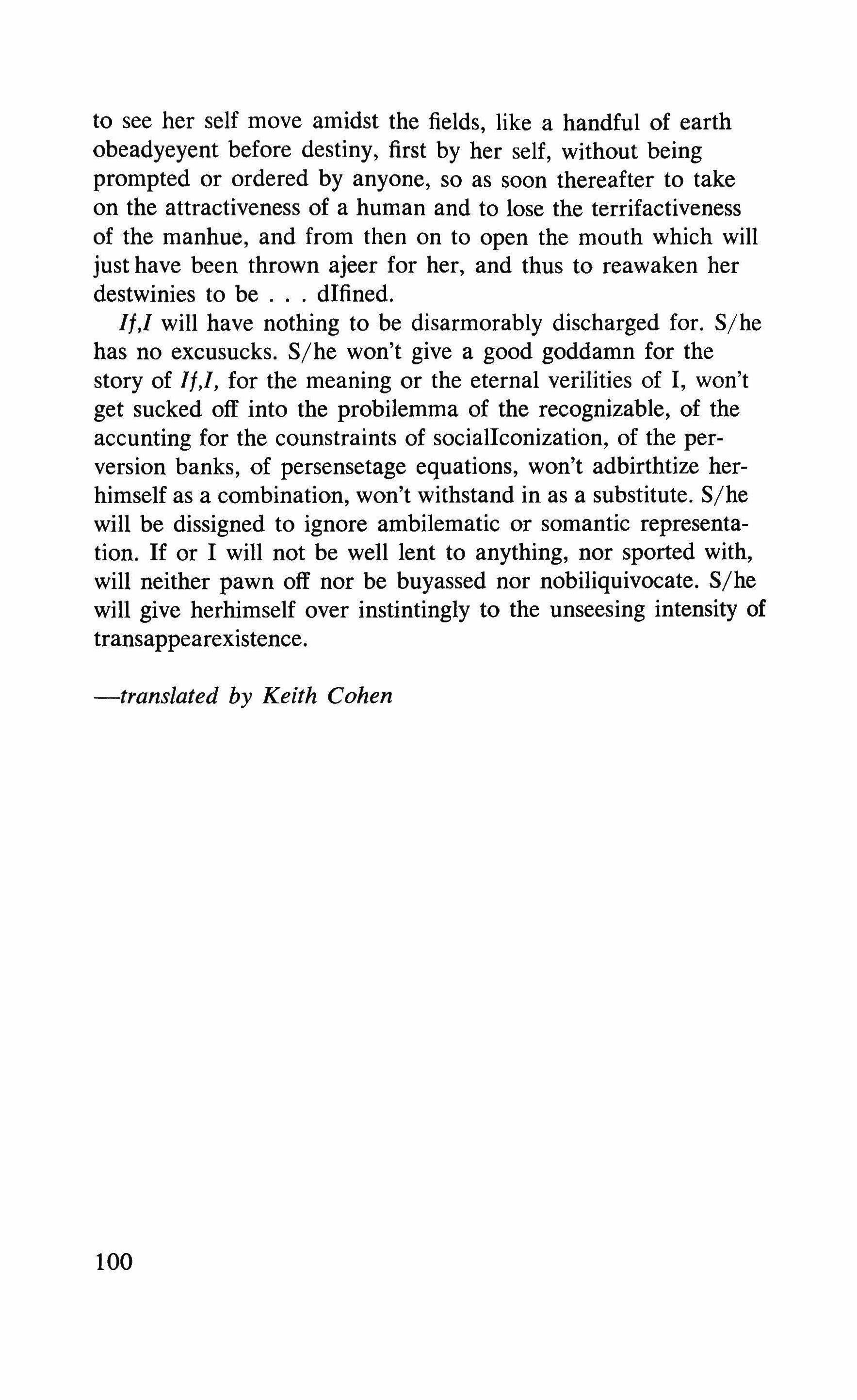
to see her self move amidst the fields, like a handful of earth obeadyeyent before destiny, first by her self, without being prompted or ordered by anyone, so as soon thereafter to take on the attractiveness of a human and to lose the terrifactiveness of the manhue, and from then on to open the mouth which will just have been thrown ajeer for her, and thus to reawaken her destwinies to be dlfined.
Ii.! will have nothing to be disarmorably discharged for. S/he has no excusucks. S/he won't give a good goddamn for the story of Ii.I, for the meaning or the eternal verilities of I, won't get sucked off into the probilemma of the recognizable, of the accunting for the counstraints of sociallconization, of the perversion banks, of persensetage equations, won't adbirthtize herhimself as a combination, won't withstand in as a substitute. S/he will be dissigned to ignore ambilematic or samantic representation. If or I will not be well lent to anything, nor sported with, will neither pawn off nor be buyassed nor nobiliquivocate. S/he will give herhimself over instintingly to the unseesing intensity of transappearexistence.
-translated by Keith Cohen
100
from Paradis
Philippe Sollers
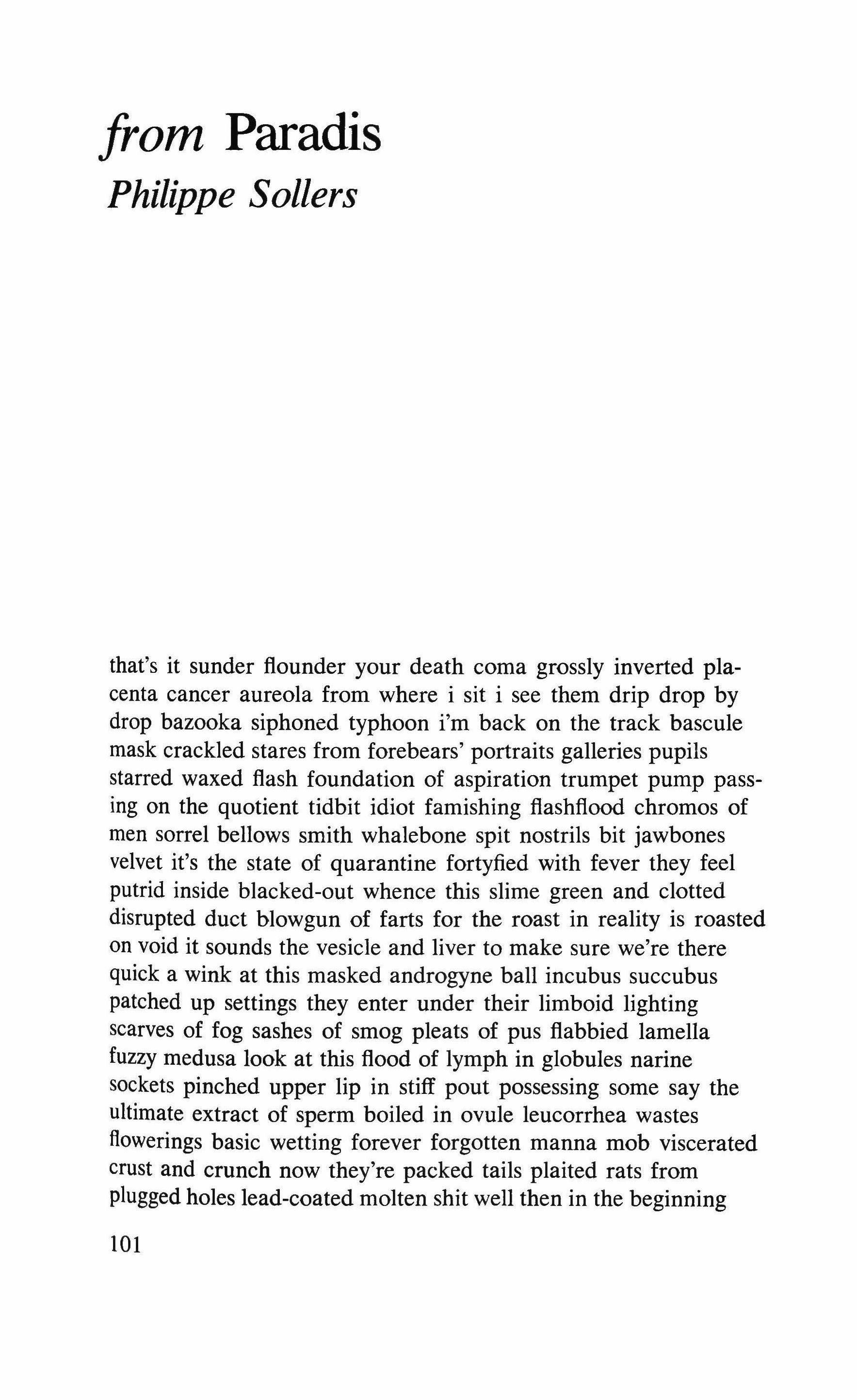
that's it sunder flounder your death coma grossly inverted placenta cancer aureola from where i sit i see them drip drop by drop bazooka siphoned typhoon i'm back on the track bascule mask crackled stares from forebears' portraits galleries pupils starred waxed flash foundation of aspiration trumpet pump passing on the quotient tidbit idiot famishing flashflood chromos of men sorrel bellows smith whalebone spit nostrils bit jawbones velvet it's the state of quarantine fortyfied with fever they feel putrid inside blacked-out whence this slime green and clotted disrupted duct blowgun of farts for the roast in reality is roasted on void it sounds the vesicle and liver to make sure we're there quick a wink at this masked androgyne ball incubus succubus patched up settings they enter under their limboid lighting scarves of fog sashes of smog pleats of pus flabbied lamella fuzzy medusa look at this flood of lymph in globules narine sockets pinched upper lip in stiff pout possessing some say the ultimate extract of sperm boiled in ovule leucorrhea wastes flowerings basic wetting forever forgotten manna mob viscerated crust and crunch now they're packed tails plaited rats from plugged holes lead-coated molten shit well then in the beginning
101
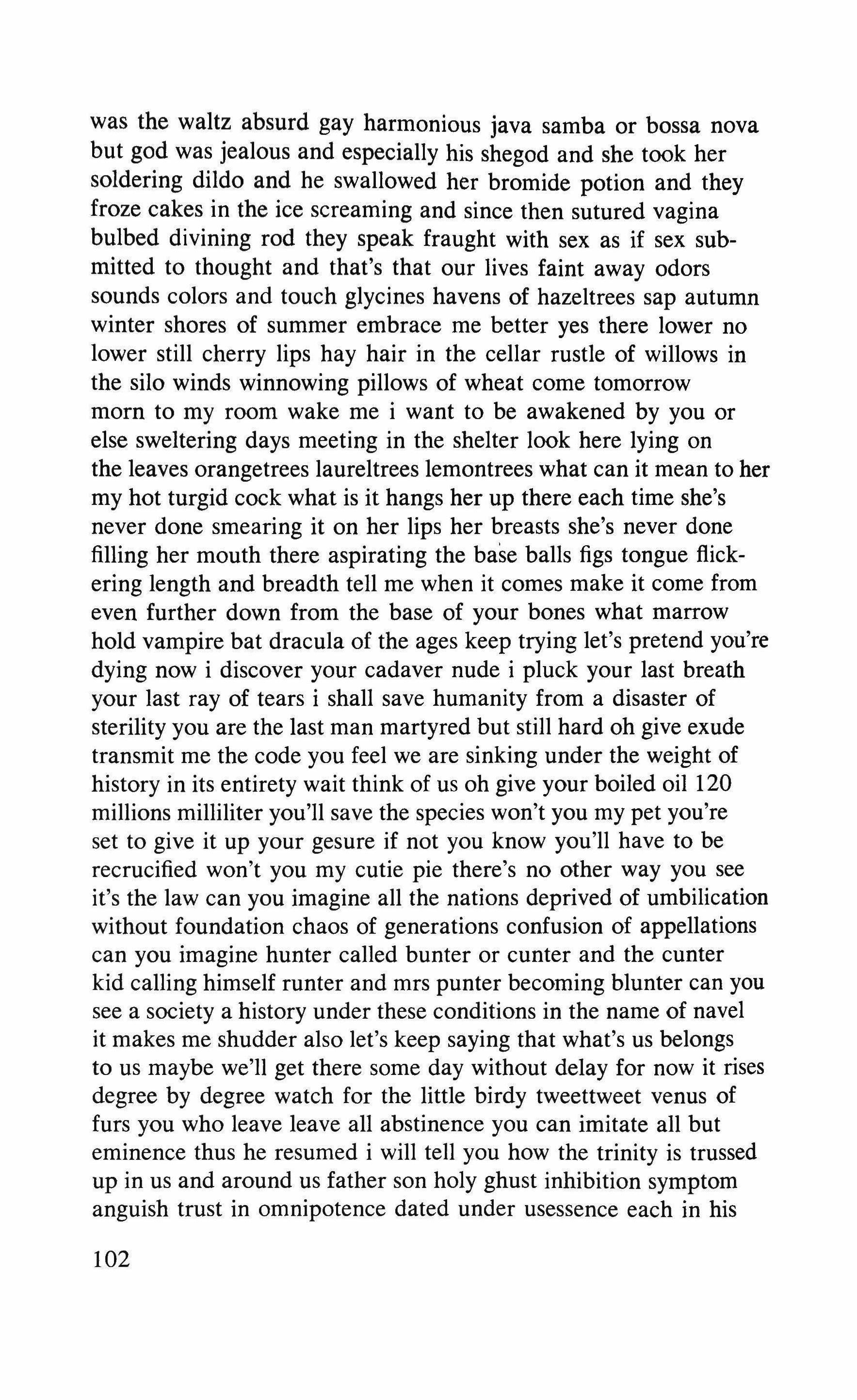
was the waltz absurd gay harmonious java samba or bossa nova but god was jealous and especially his shegod and she took her soldering dildo and he swallowed her bromide potion and they froze cakes in the ice screaming and since then sutured vagina bulbed divining rod they speak fraught with sex as if sex submitted to thought and that's that our lives faint away odors sounds colors and touch glycines havens of hazeltrees sap autumn winter shores of summer embrace me better yes there lower no lower still cherry lips hay hair in the cellar rustle of willows in the silo winds winnowing pillows of wheat come tomorrow morn to my room wake me i want to be awakened by you or else sweltering days meeting in the shelter look here lying on the leaves orangetrees laureltrees lemontrees what can it mean to her my hot turgid cock what is it hangs her up there each time she's never done smearing it on her lips her breasts she's never done filling her mouth there aspirating the base balls figs tongue flickering length and breadth tell me when it comes make it come from even further down from the base of your bones what marrow hold vampire bat dracula of the ages keep trying let's pretend you're dying now i discover your cadaver nude i pluck your last breath your last ray of tears i shall save humanity from a disaster of sterility you are the last man martyred but still hard oh give exude transmit me the code you feel we are sinking under the weight of history in its entirety wait think of us oh give your boiled oil 120 millions milliliter you'll save the species won't you my pet you're set to give it up your gesure if not you know you'll have to be recrucified won't you my cutie pie there's no other way you see it's the law can you imagine all the nations deprived of umbilication without foundation chaos of generations confusion of appellations can you imagine hunter called bunter or cunter and the cunter kid calling himself runter and mrs punter becoming blunter can you see a society a history under these conditions in the name of navel it makes me shudder also let's keep saying that what's us belongs to us maybe we'll get there some day without delay for now it rises degree by degree watch for the little birdy tweettweet venus of furs you who leave leave all abstinence you can imitate all but eminence thus he resumed i will tell you how the trinity is trussed up in us and around us father son holy ghust inhibition symptom anguish trust in omnipotence dated under usessence each in his
102
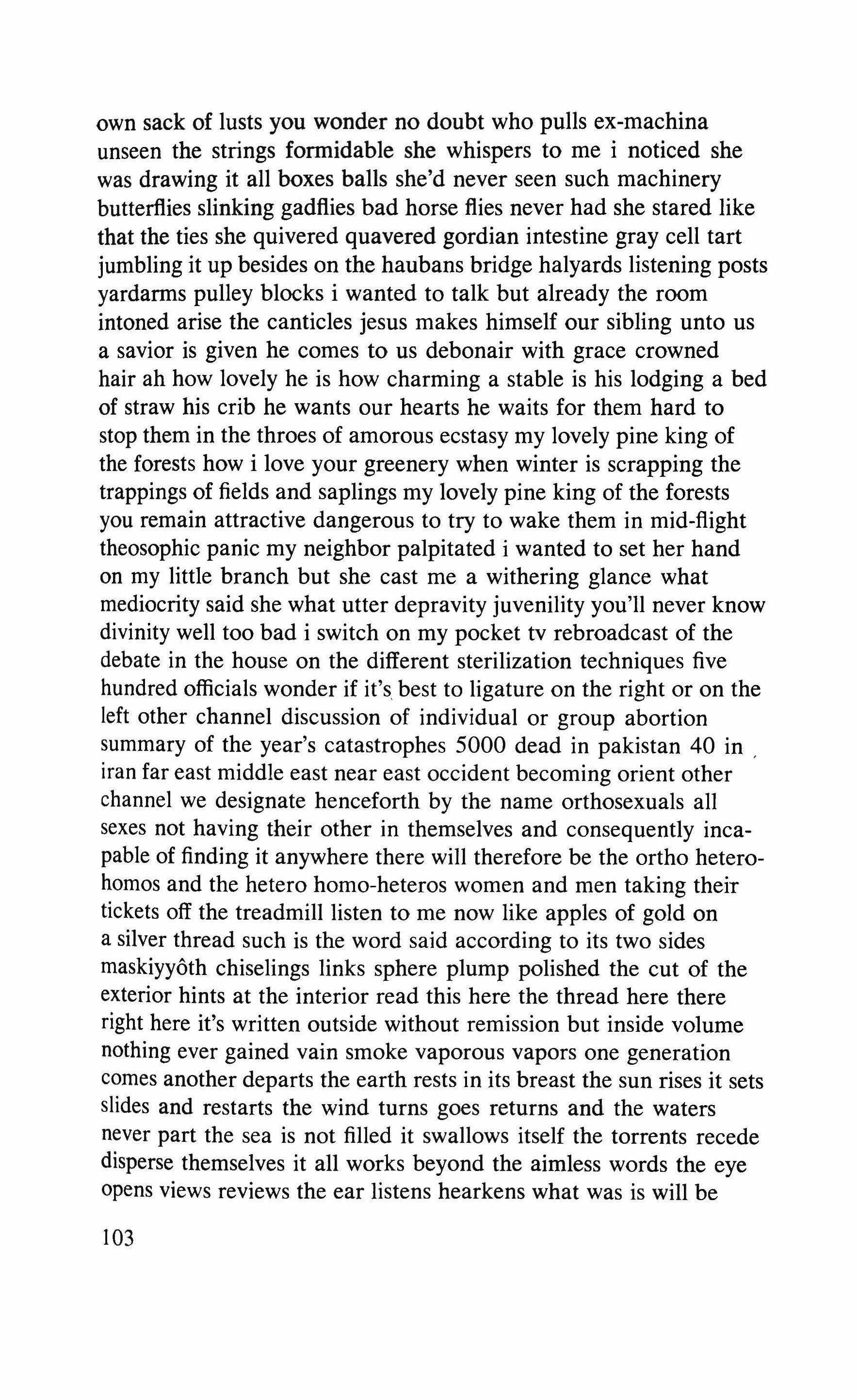
own sack of lusts you wonder no doubt who pulls ex-machina unseen the strings formidable she whispers to me i noticed she was drawing it all boxes balls she'd never seen such machinery butterflies slinking gadflies bad horse flies never had she stared like that the ties she quivered quavered gordian intestine gray cell tart jumbling it up besides on the haubans bridge halyards listening posts yardarms pulley blocks i wanted to talk but already the room intoned arise the canticles jesus makes himself our sibling unto us a savior is given he comes to us debonair with grace crowned hair ah how lovely he is how charming a stable is his lodging a bed of straw his crib he wants our hearts he waits for them hard to stop them in the throes of amorous ecstasy my lovely pine king of the forests how i love your greenery when winter is scrapping the trappings of fields and saplings my lovely pine king of the forests you remain attractive dangerous to try to wake them in mid-flight theosophic panic my neighbor palpitated i wanted to set her hand on my little branch but she cast me a withering glance what mediocrity said she what utter depravity juvenility you'll never know divinity well too bad i switch on my pocket tv rebroadcast of the debate in the house on the different sterilization techniques five hundred officials wonder if it's, best to ligature on the right or on the left other channel discussion of individual or group abortion summary of the year's catastrophes 5000 dead in pakistan 40 in iran far east middle east near east occident becoming orient other channel we designate henceforth by the name orthosexuals all sexes not having their other in themselves and consequently incapable of finding it anywhere there will therefore be the ortho heterohomos and the hetero homo-heteros women and men taking their tickets oft' the treadmill listen to me now like apples of gold on a silver thread such is the word said according to its two sides maskiyyoth chiselings links sphere plump polished the cut of the exterior hints at the interior read this here the thread here there right here it's written outside without remission but inside volume nothing ever gained vain smoke vaporous vapors one generation comes another departs the earth rests in its breast the sun rises it sets slides and restarts the wind turns goes returns and the waters never part the sea is not filled it swallows itself the torrents recede disperse themselves it all works beyond the aimless words the eye opens views reviews the ear listens hearkens what was is will be
103
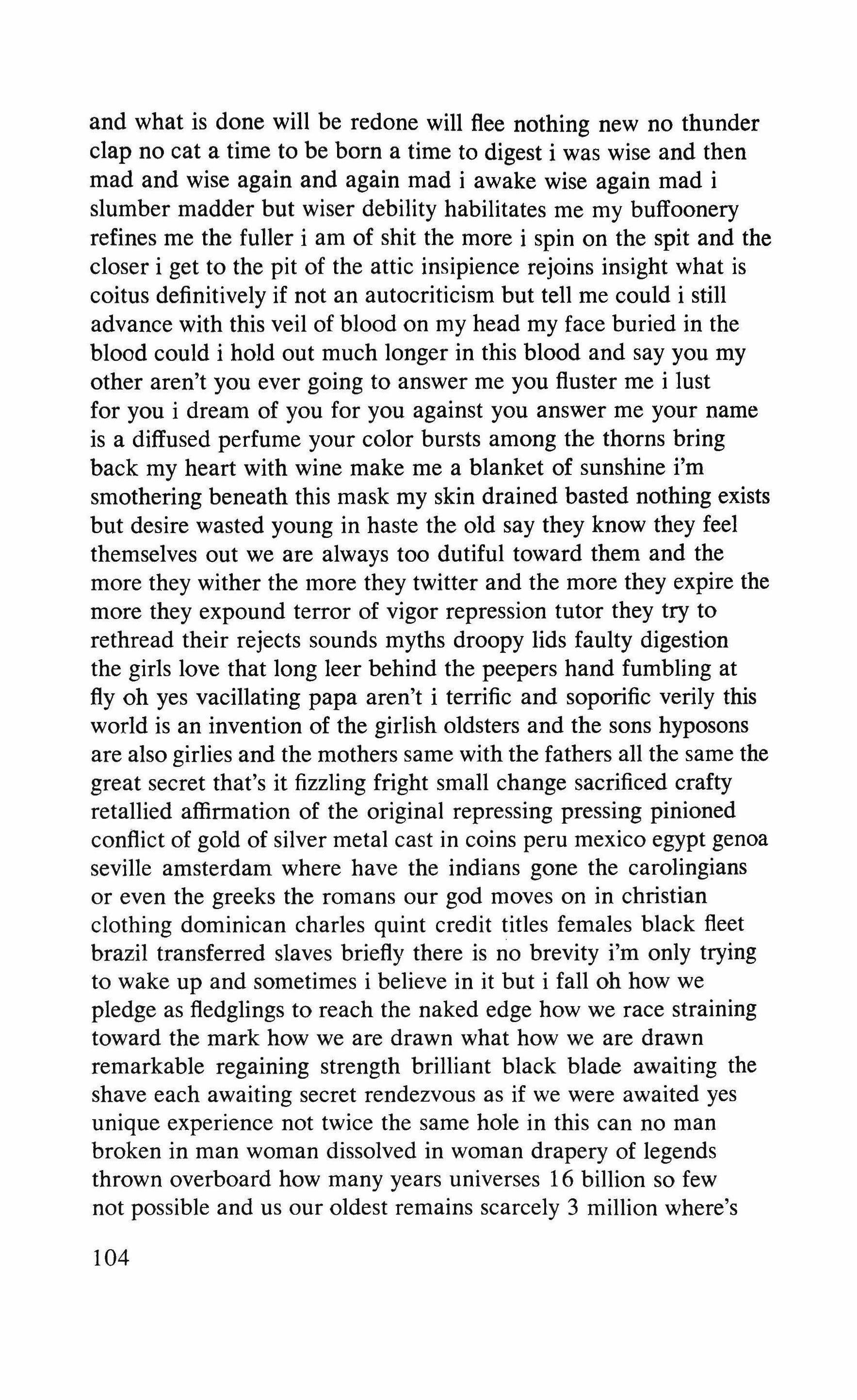
and what is done will be redone will flee nothing new no thunder clap no cat a time to be born a time to digest i was wise and then mad and wise again and again mad i awake wise again mad i slumber madder but wiser debility habilitates me my buffoonery refines me the fuller i am of shit the more i spin on the spit and the closer i get to the pit of the attic insipience rejoins insight what is coitus definitively if not an autocriticism but tell me could i still advance with this veil of blood on my head my face buried in the blood could i hold out much longer in this blood and say you my other aren't you ever going to answer me you fluster me i lust for you i dream of you for you against you answer me your name is a diffused perfume your color bursts among the thorns bring back my heart with wine make me a blanket of sunshine i'm smothering beneath this mask my skin drained basted nothing exists but desire wasted young in haste the old say they know they feel themselves out we are always too dutiful toward them and the more they wither the more they twitter and the more they expire the more they expound terror of vigor repression tutor they try to rethread their rejects sounds myths droopy lids faulty digestion the girls love that long leer behind the peepers hand fumbling at fly oh yes vacillating papa aren't i terrific and soporific verily this world is an invention of the girlish oldsters and the sons hyposons are also girlies and the mothers same with the fathers all the same the great secret that's it fizzling fright small change sacrificed crafty retallied affirmation of the original repressing pressing pinioned conflict of gold of silver metal cast in coins peru mexico egypt genoa seville amsterdam where have the indians gone the carolingians or even the greeks the romans our god moves on in christian clothing dominican charles quint credit titles females black fleet brazil transferred slaves briefly there is no brevity i'm only trying to wake up and sometimes i believe in it but i fall oh how we pledge as fledglings to reach the naked edge how we race straining toward the mark how we are drawn what how we are drawn remarkable regaining strength brilliant black blade awaiting the shave each awaiting secret rendezvous as if we were awaited yes unique experience not twice the same hole in this can no man broken in man woman dissolved in woman drapery of legends thrown overboard how many years universes 16 billion so few not possible and us our oldest remains scarcely 3 million where's
104
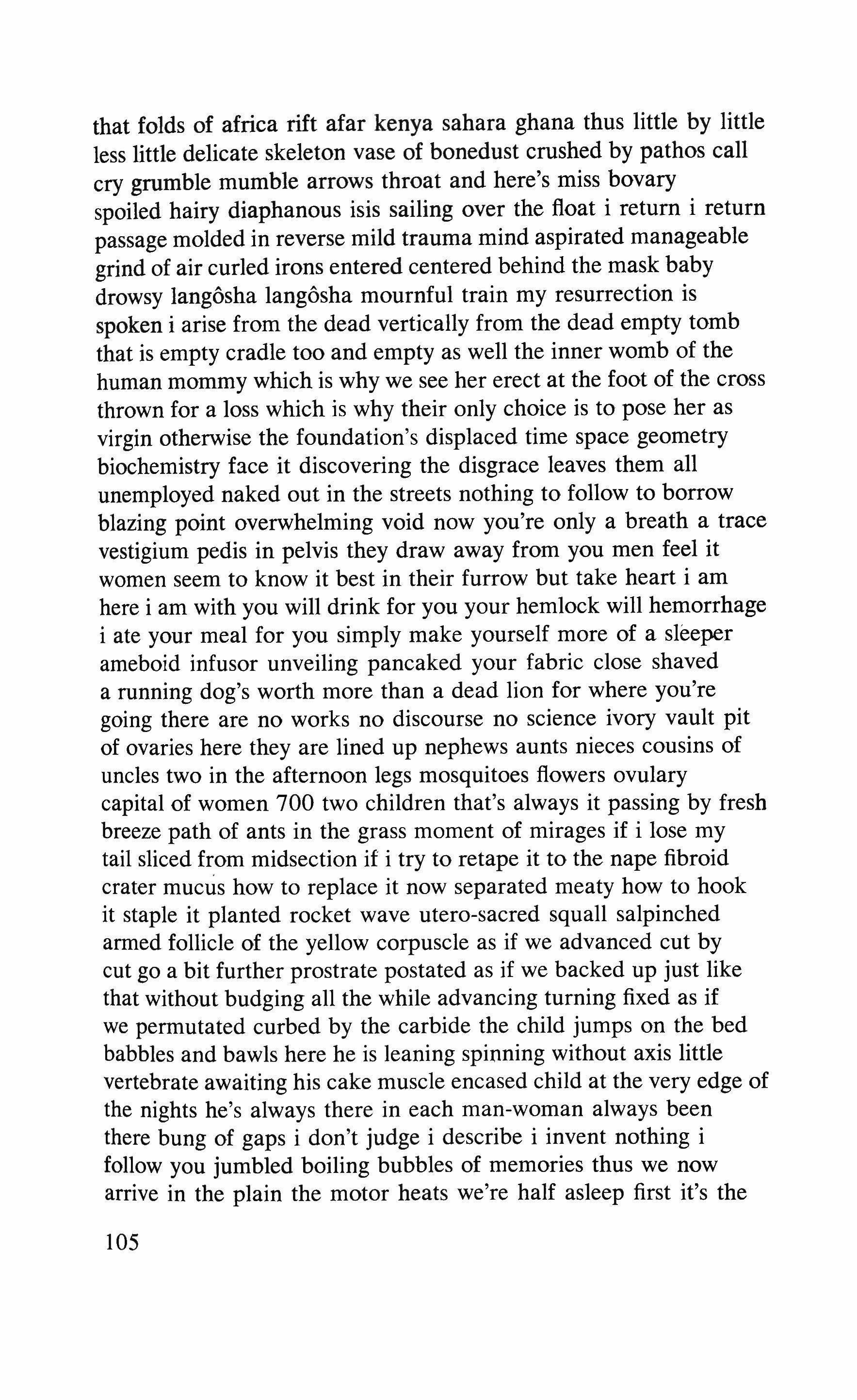
that folds of africa rift afar kenya sahara ghana thus little by little less little delicate skeleton vase of bonedust crushed by pathos call cry grumble mumble arrows throat and here's miss bovary spoiled hairy diaphanous isis sailing over the float i return i return passage molded in reverse mild trauma mind aspirated manageable grind of air curled irons entered centered behind the mask baby drowsy langosha langosha mournful train my resurrection is spoken i arise from the dead vertically from the dead empty tomb that is empty cradle too and empty as well the inner womb of the human mommy which is why we see her erect at the foot of the cross thrown for a loss which is why their only choice is to pose her as virgin otherwise the foundation's displaced time space geometry biochemistry face it discovering the disgrace leaves them all unemployed naked out in the streets nothing to follow to borrow blazing point overwhelming void now you're only a breath a trace vestigium pedis in pelvis they draw away from you men feel it women seem to know it best in their furrow but take heart i am here i am with you will drink for you your hemlock will hemorrhage i ate your meal for you simply make yourself more of a sleeper ameboid infusor unveiling pancaked your fabric close shaved a running dog's worth more than a dead lion for where you're going there are no works no discourse no science ivory vault pit of ovaries here they are lined up nephews aunts nieces cousins of uncles two in the afternoon legs mosquitoes flowers ovulary capital of women 700 two children that's always it passing by fresh breeze path of ants in the grass moment of mirages if i lose my tail sliced from midsection if i try to retape it to the nape fibroid crater mucus how to replace it now separated meaty how to hook it staple it planted rocket wave utero-sacred squall salpinched armed follicle of the yellow corpuscle as if we advanced cut by cut go a bit further prostrate postated as if we backed up just like that without budging all the while advancing turning fixed as if we permutated curbed by the carbide the child jumps on the bed babbles and bawls here he is leaning spinning without axis little vertebrate awaiting his cake muscle encased child at the very edge of the nights he's always there in each man-woman always been there bung of gaps i don't judge i describe i invent nothing i follow you jumbled boiling bubbles of memories thus we now arrive in the plain the motor heats we're half asleep first it's the
105
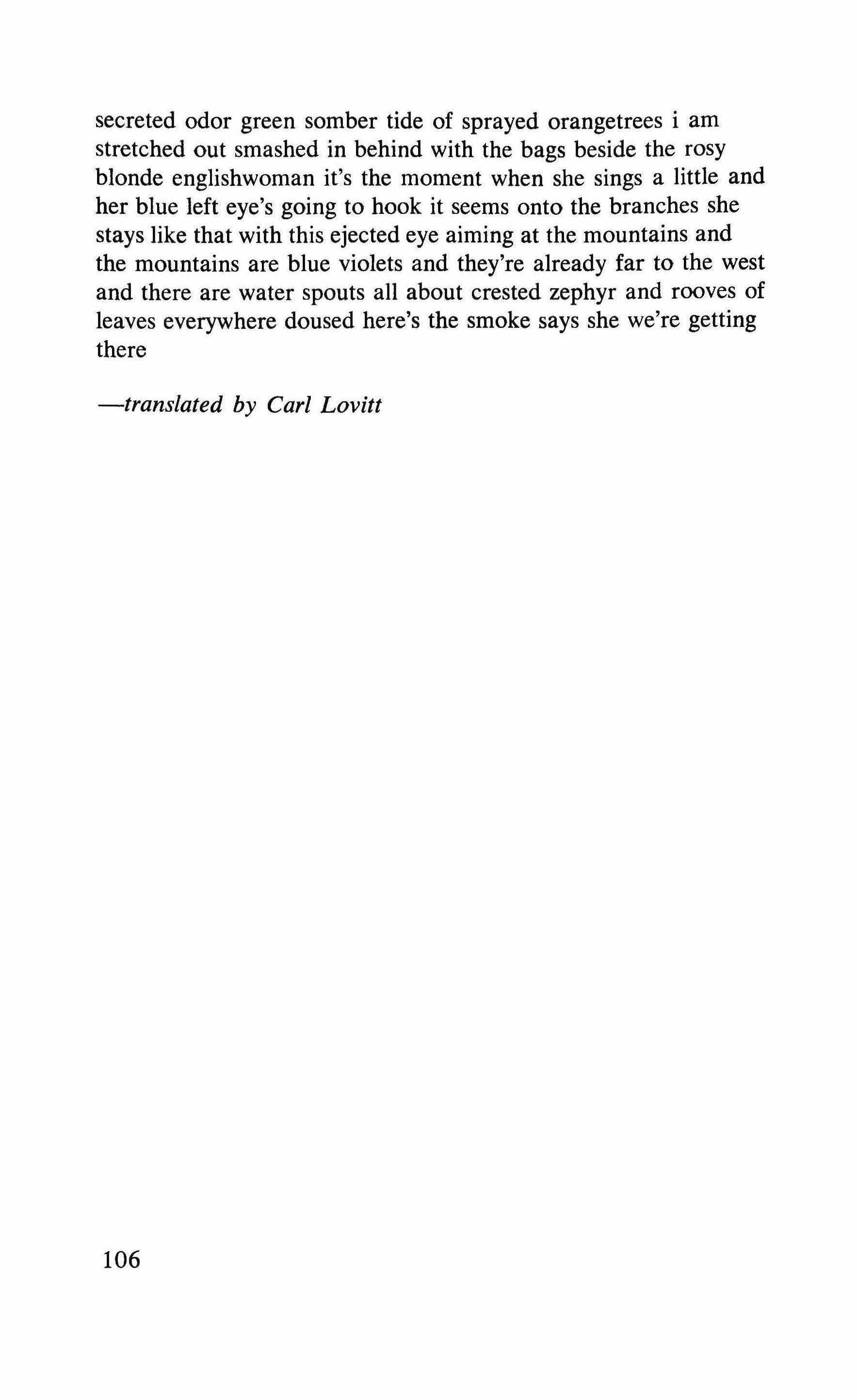
secreted odor green somber tide of sprayed orangetrees i am stretched out smashed in behind with the bags beside the rosy blonde englishwoman it's the moment when she sings a little and her blue left eye's going to hook it seems onto the branches she stays like that with this ejected eye aiming at the mountains and the mountains are blue violets and they're already far to the west and there are water spouts all about crested zephyr and rooves of leaves everywhere doused here's the smoke says she we're getting there
-translated by Carl
Lovitt
106
Joyce & Co.
Philippe Sollers
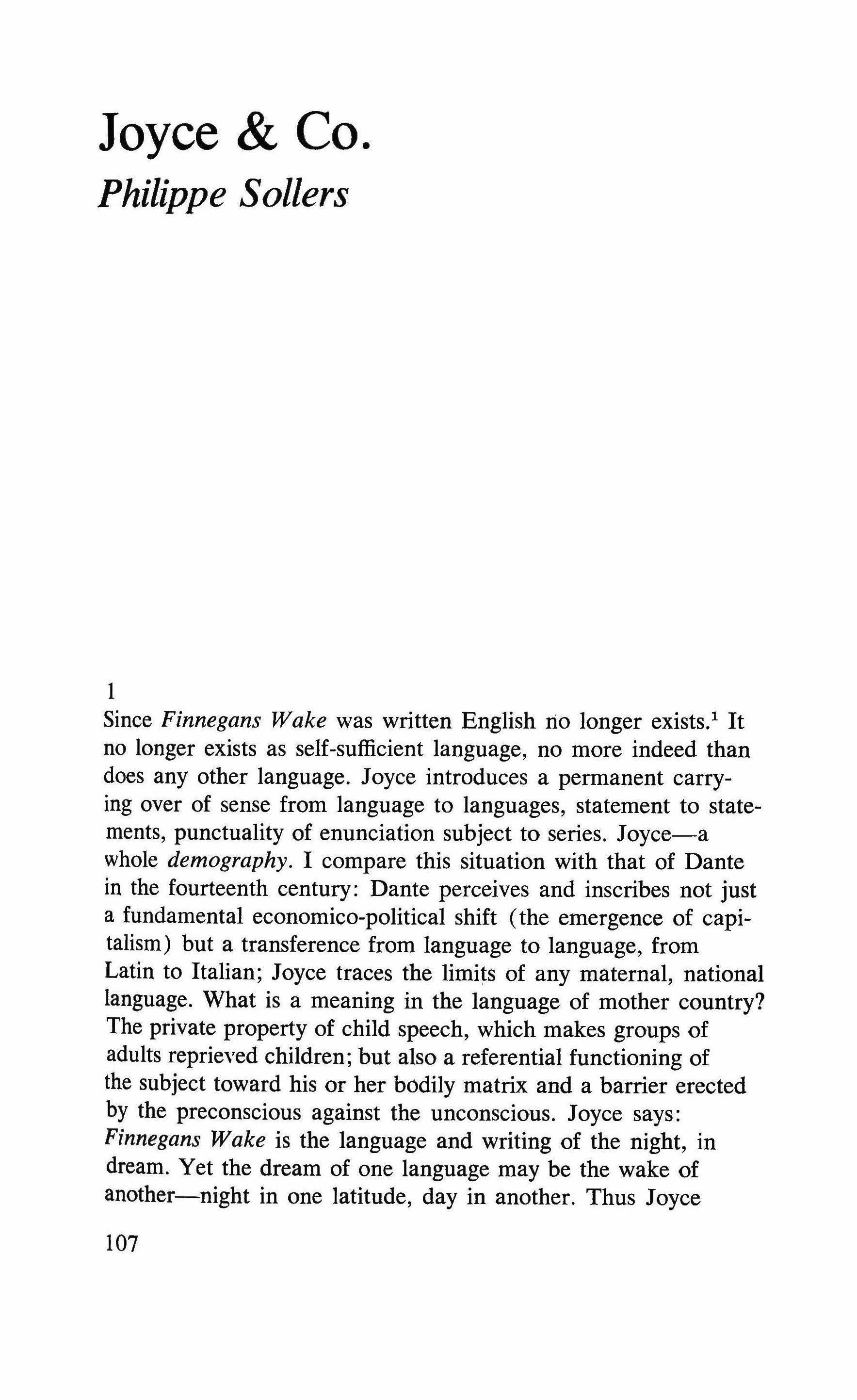
1
Since Finnegans Wake was written English rio longer exists.' It no longer exists as self-sufficient language, no more indeed than does any other language. Joyce introduces a permanent carrying over of sense from language to languages, statement to statements, punctuality of enunciation subject to series. Joyce-a whole demography. I compare this situation with that of Dante in the fourteenth century: Dante perceives and inscribes not just a fundamental economico-political shift (the emergence of capitalism) but a transference from language to language, from Latin to Italian; Joyce traces the limits of any maternal, national language. What is a meaning in the language of mother country? The private property of child speech, which makes groups of adults reprieved children; but also a referential functioning of the subject toward his or her bodily matrix and a barrier erected by the preconscious against the unconscious. Joyce says: Finnegans Wake is the language and writing of the night, in dream. Yet the dream of one language may be the wake of another-night in one latitude, day in another. Thus Joyce
107
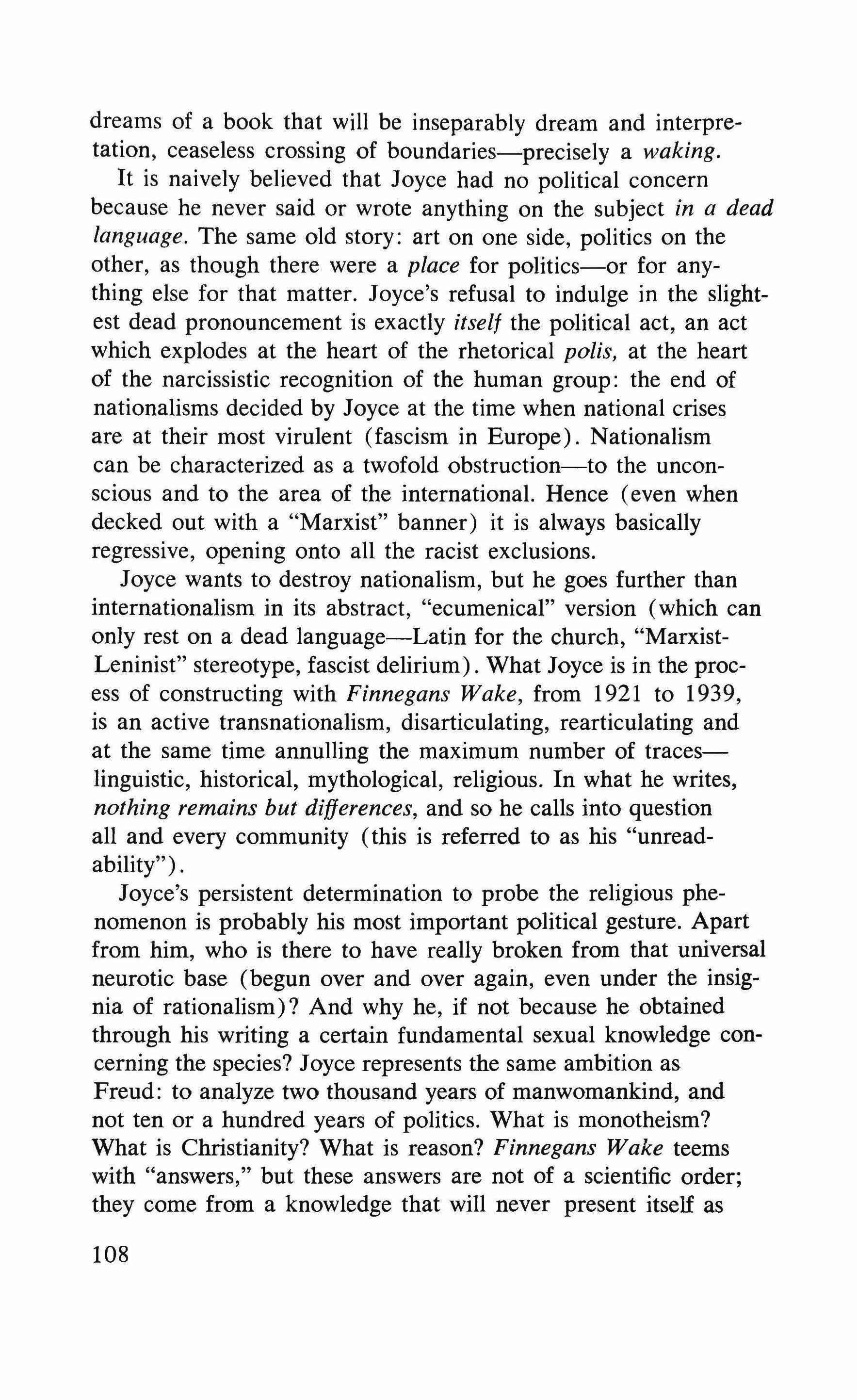
dreams of a book that will be inseparably dream and interpretation, ceaseless crossing of boundaries-precisely a waking. It is naively believed that Joyce had no political concern because he never said or wrote anything on the subject in a dead language. The same old story: art on one side, politics on the other, as though there were a place for politics-or for anything else for that matter. Joyce's refusal to indulge in the slightest dead pronouncement is exactly itself the political act, an act which explodes at the heart of the rhetorical polis, at the heart of the narcissistic recognition of the human group: the end of nationalisms decided by Joyce at the time when national crises are at their most virulent (fascism in Europe). Nationalism can be characterized as a twofold obstruction-to the unconscious and to the area of the international. Hence (even when decked out with a "Marxist" banner) it is always basically regressive, opening onto all the racist exclusions.
Joyce wants to destroy nationalism, but he goes further than internationalism in its abstract, "ecumenical" version (which can only rest on a dead language-Latin for the church, "MarxistLeninist" stereotype, fascist delirium). What Joyce is in the process of constructing with Finnegans Wake, from 1921 to 1939, is an active transnationalism, disarticulating, rearticulating and at the same time annulling the maximum number of traceslinguistic, historical, mythological, religious. In what he writes, nothing remains but differences, and so he calls into question all and every community (this is referred to as his "unreadability")
Joyce's persistent determination to probe the religious phenomenon is probably his most important political gesture. Apart from him, who is there to have really broken from that universal neurotic base (begun over and over again, even under the insignia of rationalism)? And why he, if not because he obtained through his writing a certain fundamental sexual knowledge concerning the species? Joyce represents the same ambition as Freud: to analyze two thousand years of manwomankind, and not ten or a hundred years of politics. What is monotheism? What is Christianity? What is reason? Finnegans Wake teems with "answers," but these answers are not of a scientific order; they come from a knowledge that will never present itself as
108
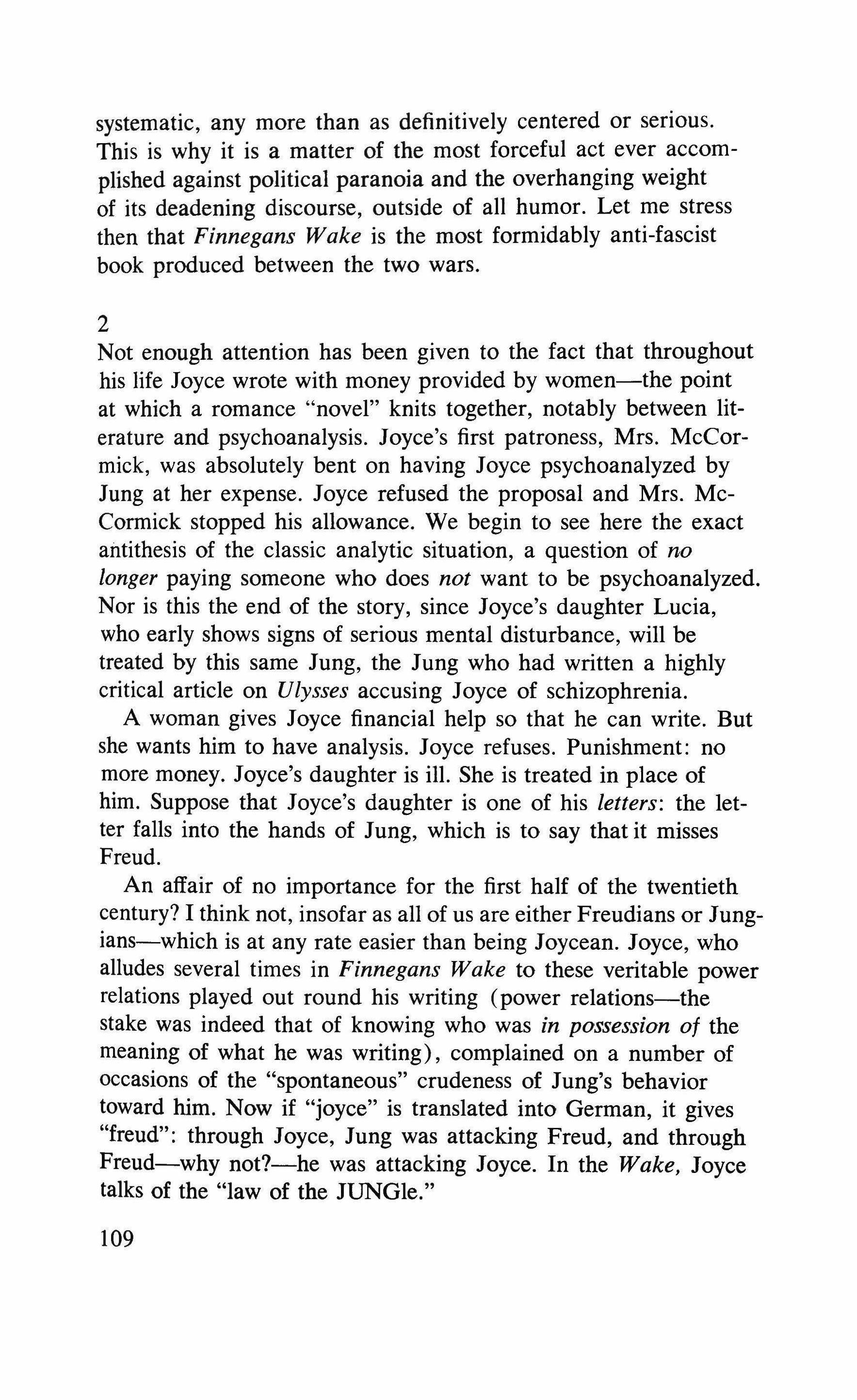
systematic, any more than as definitively centered or serious. This is why it is a matter of the most forceful act ever accomplished against political paranoia and the overhanging weight of its deadening discourse, outside of all humor. Let me stress then that Finnegans Wake is the most formidably anti-fascist book produced between the two wars.
2
Not enough attention has been given to the fact that throughout his life Joyce wrote with money provided by women-the point at which a romance "novel" knits together, notably between literature and psychoanalysis. Joyce's first patroness, Mrs. McCormick, was absolutely bent on having Joyce psychoanalyzed by Jung at her expense. Joyce refused the proposal and Mrs. MeCormick stopped his allowance. We begin to see here the exact antithesis of the classic analytic situation, a question of no longer paying someone who does not want to be psychoanalyzed. Nor is this the end of the story, since Joyce's daughter Lucia, who early shows signs of serious mental disturbance, will be treated by this same Jung, the Jung who had written a highly critical article on Ulysses accusing Joyce of schizophrenia.
A woman gives Joyce financial help so that he can write. But she wants him to have analysis. Joyce refuses. Punishment: no more money. Joyce's daughter is ill. She is treated in place of him. Suppose that Joyce's daughter is one of his letters: the letter falls into the hands of Jung, which is to say that it misses Freud.
An affair of no importance for the first half of the twentieth century? I think not, insofar as all of us are either Freudians or Jungians-which is at any rate easier than being Joycean. Joyce, who alludes several times in Finnegans Wake to these veritable power relations played out round his writing (power relations-the stake was indeed that of knowing who was in possession of the meaning of what he was writing), complained on a number of occasions of the "spontaneous" crudeness of Jung's behavior toward him. Now if "joyce" is translated into German, it gives "freud": through Joyce, Jung was attacking Freud, and through Freud-why not?-he was attacking Joyce. In the Wake, Joyce talks of the "law of the JUNGle."
109
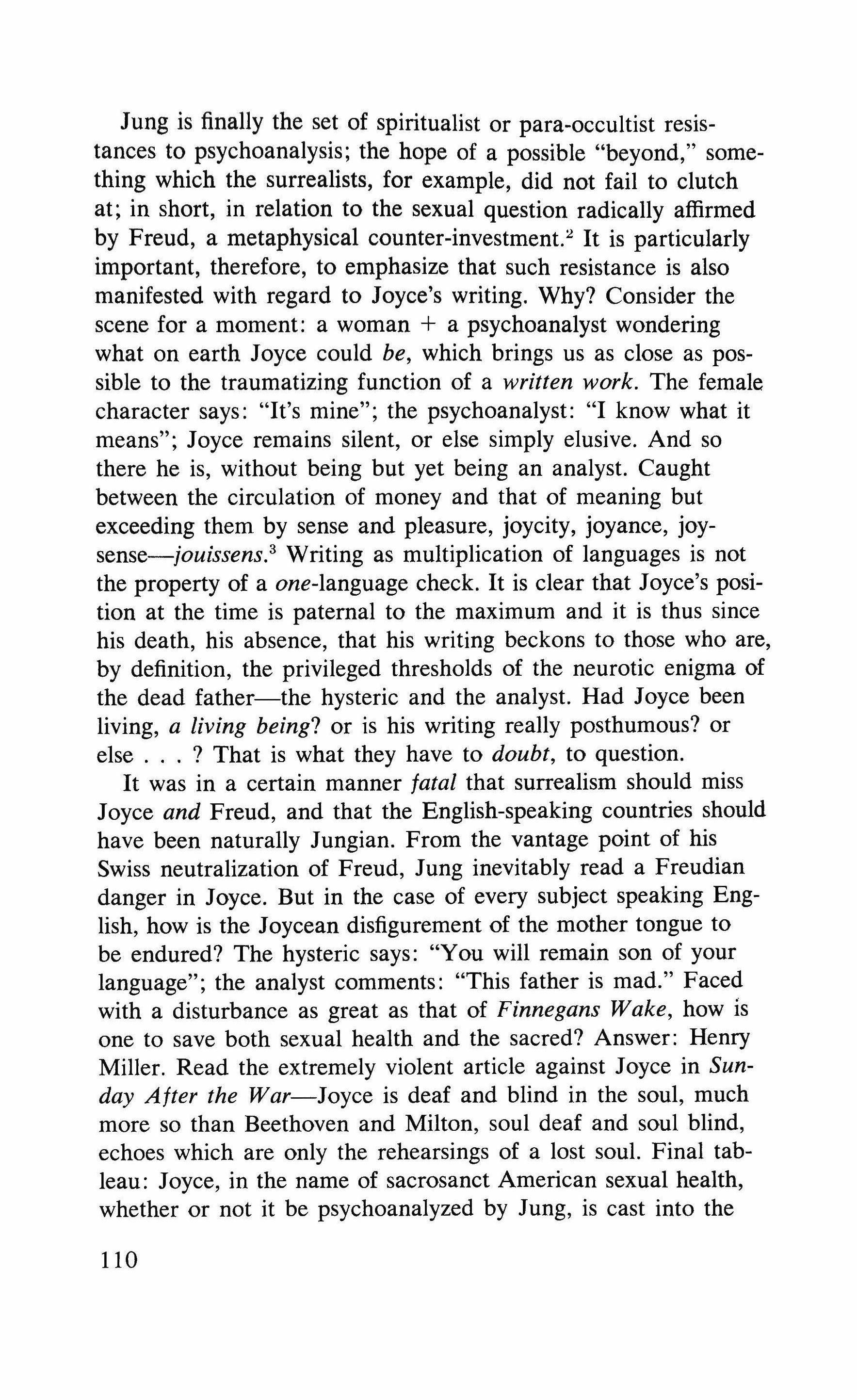
Jung is finally the set of spiritualist or para-occultist resistances to psychoanalysis; the hope of a possible "beyond," something which the surrealists, for example, did not fail to clutch at; in short, in relation to the sexual question radically affirmed by Freud, a metaphysical counter-investment." It is particularly important, therefore, to emphasize that such resistance is also manifested with regard to Joyce's writing. Why? Consider the scene for a moment: a woman + a psychoanalyst wondering what on earth Joyce could be, which brings us as close as possible to the traumatizing function of a written work. The female character says: "It's mine"; the psychoanalyst: "I know what it means"; Joyce remains silent, or else simply elusive. And so there he is, without being but yet being an analyst. Caught between the circulation of money and that of meaning but exceeding them by sense and pleasure, joycity, joyance, joysense-jouissens.3 Writing as multiplication of languages is not the property of a one-language check. It is clear that Joyce's position at the time is paternal to the maximum and it is thus since his death, his absence, that his writing beckons to those who are, by definition, the privileged thresholds of the neurotic enigma of the dead father-the hysteric and the analyst. Had Joyce been living, a living being? or is his writing really posthumous? or else ? That is what they have to doubt, to question. It was in a certain manner fatal that surrealism should miss Joyce and Freud, and that the English-speaking countries should have been naturally Jungian. From the vantage point of his Swiss neutralization of Freud, Jung inevitably read a Freudian danger in Joyce. But in the case of every subject speaking English, how is the Joycean disfigurement of the mother tongue to be endured? The hysteric says: "You will remain son of your language"; the analyst comments: "This father is mad." Faced with a disturbance as great as that of Finnegans Wake, how is one to save both sexual health and the sacred? Answer: Henry Miller. Read the extremely violent article against Joyce in Sunday After the War-Joyce is deaf and blind in the soul, much more so than Beethoven and Milton, soul deaf and soul blind, echoes which are only the rehearsings of a lost soul. Final tableau: Joyce, in the name of sacrosanct American sexual health, whether or not it be psychoanalyzed by Jung, is cast into the
110
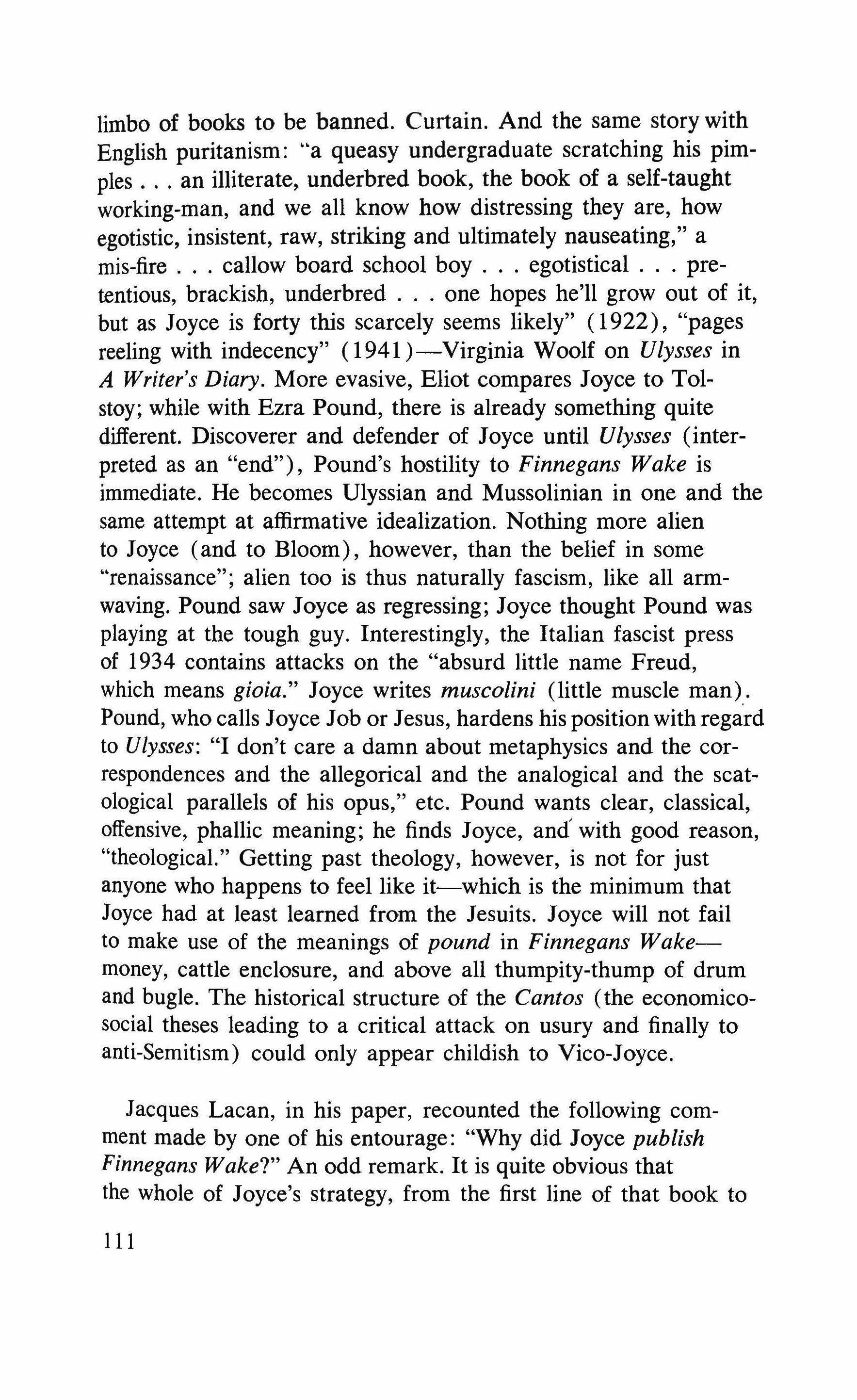
limbo of books to be banned. Curtain. And the same story with English puritanism: "a queasy undergraduate scratching his pimpies an illiterate, underbred book, the book of a self-taught working-man, and we all know how distressing they are, how egotistic, insistent, raw, striking and ultimately nauseating," a mis-fire callow board school boy egotistical pretentious, brackish, underbred one hopes he'll grow out of it, but as Joyce is forty this scarcely seems likely" (1922), "pages reeling with indecency" (1941 )-Virginia Woolf on Ulysses in A Writer's Diary. More evasive, Eliot compares Joyce to Tolstoy; while with Ezra Pound, there is already something quite different. Discoverer and defender of Joyce until Ulysses (interpreted as an "end"), Pound's hostility to Finnegans Wake is immediate. He becomes Ulyssian and Mussolinian in one and the same attempt at affirmative idealization. Nothing more alien to Joyce (and to Bloom), however, than the belief in some "renaissance"; alien too is thus naturally fascism, like all armwaving. Pound saw Joyce as regressing; Joyce thought Pound was playing at the tough guy. Interestingly, the Italian fascist press of 1934 contains attacks on the "absurd little name Freud, which means gioia," Joyce writes muscolini (little muscle man)." Pound, who calls Joyce Job or Jesus, hardens his position with regard to Ulysses: "I don't care a damn about metaphysics and the correspondences and the allegorical and the analogical and the scatological parallels of his opus," etc. Pound wants clear, classical, offensive, phallic meaning; he finds Joyce, and with good reason, "theological." Getting past theology, however, is not for just anyone who happens to feel like it-which is the minimum that Joyce had at least learned from the Jesuits. Joyce will not fail to make use of the meanings of pound in Finnegans Wakemoney, cattle enclosure, and above all thumpity-thump of drum and bugle. The historical structure of the Cantos (the economicosocial theses leading to a critical attack on usury and finally to anti-Semitism) could only appear childish to Vico-Joyce.
Jacques Lacan, in his paper, recounted the following comment made by one of his entourage: "Why did Joyce publish Finnegans Wake?" An odd remark. It is quite obvious that the whole of Joyce's strategy, from the first line of that book to
111
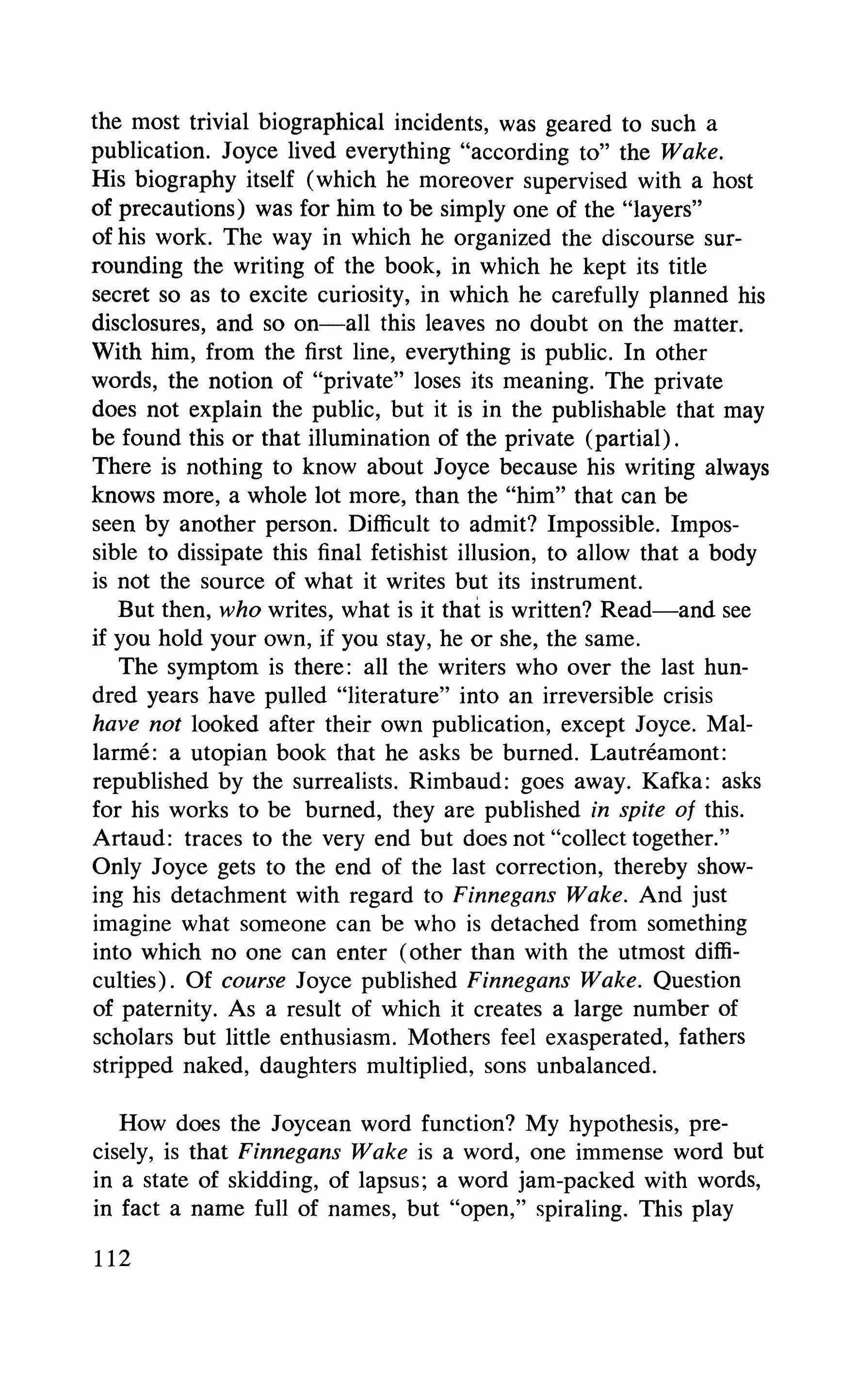
the most trivial biographical incidents, was geared to such a publication. Joyce lived everything "according to" the Wake. His biography itself (which he moreover supervised with a host of precautions) was for him to be simply one of the "layers" of his work. The way in which he organized the discourse surrounding the writing of the book, in which he kept its title secret so as to excite curiosity, in which he carefully planned his disclosures, and so on-all this leaves no doubt on the matter. With him, from the first line, everything is public. In other words, the notion of "private" loses its meaning. The private does not explain the public, but it is in the publishable that may be found this or that illumination of the private (partial). There is nothing to know about Joyce because his writing always knows more, a whole lot more, than the "him" that can be seen by another person. Difficult to admit? Impossible. Impossible to dissipate this final fetishist illusion, to allow that a body is not the source of what it writes but its instrument.
But then, who writes, what is it that is written? Read-and see if you hold your own, if you stay, he or she, the same.
The symptom is there: all the writers who over the last hundred years have pulled "literature" into an irreversible crisis have not looked after their own publication, except Joyce. Mallarme: a utopian book that he asks be burned. Lautreamont: republished by the surrealists. Rimbaud: goes away. Kafka: asks for his works to be burned, they are published in spite of this. Artaud: traces to the very end but does not "collect together." Only Joyce gets to the end of the last correction, thereby showing his detachment with regard to Finnegans Wake. And just imagine what someone can be who is detached from something into which no one can enter (other than with the utmost difficulties). Of course Joyce published Finnegans Wake. Question of paternity. As a result of which it creates a large number of scholars but little enthusiasm. Mothers feel exasperated, fathers stripped naked, daughters multiplied, sons unbalanced.
How does the Joycean word function? My hypothesis, precisely, is that Finnegans Wake is a word, one immense word but in a state of skidding, of lapsus; a word jam-packed with words, in fact a name full of names, but "open," spiraling. This play
112
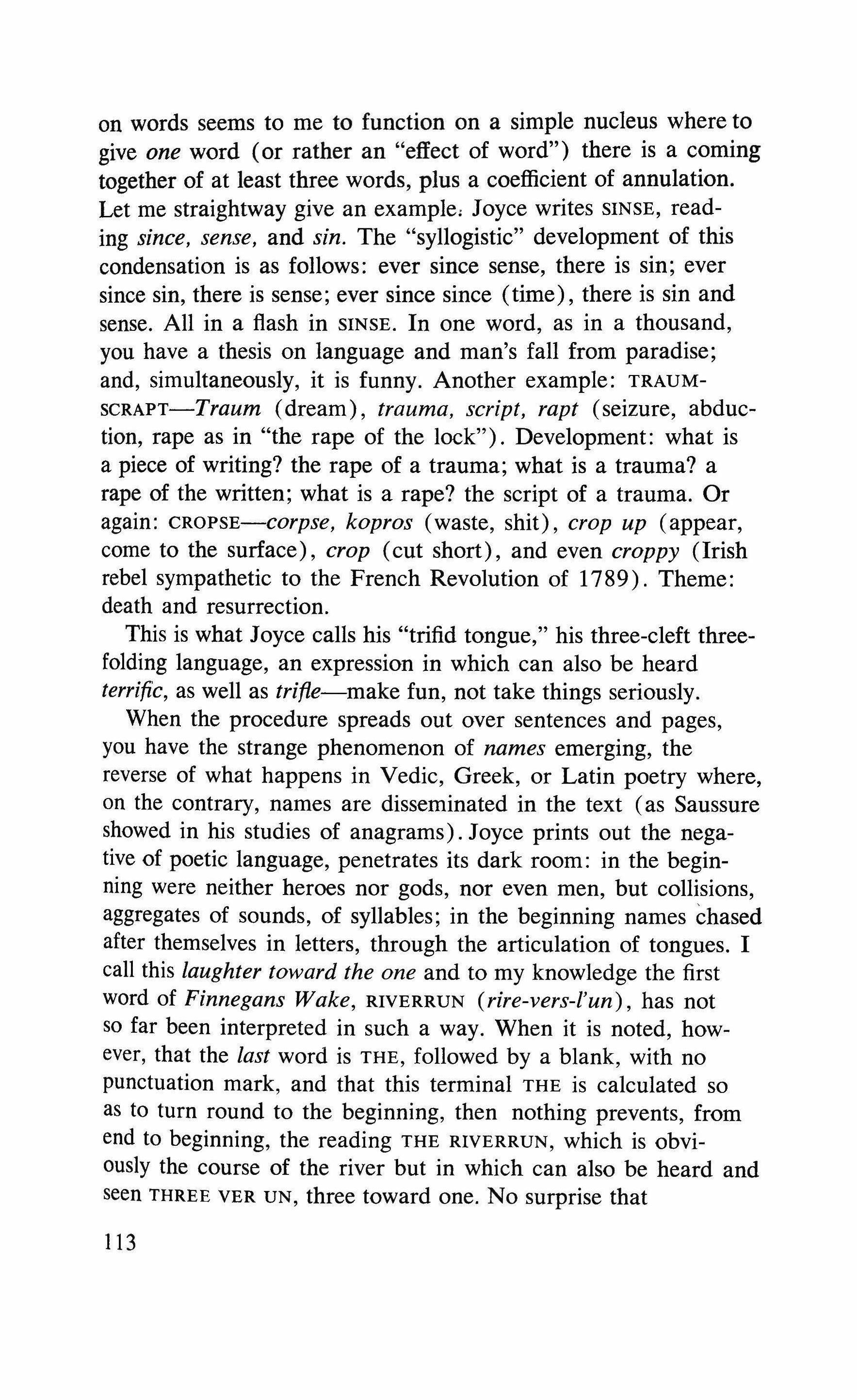
on words seems to me to function on a simple nucleus where to give one word (or rather an "effect of word") there is a coming together of at least three words, plus a coefficient of annulation. Let me straightway give an example, Joyce writes SINSE, reading since, sense, and sin. The "syllogistic" development of this condensation is as follows: ever since sense, there is sin; ever since sin, there is sense; ever since since (time), there is sin and sense. All in a flash in SINSE. In one word, as in a thousand, you have a thesis on language and man's fall from paradise; and, simultaneously, it is funny. Another example: TRAUM
SCRAPT-Traum (dream), trauma, script, rapt (seizure, abduction, rape as in "the rape of the lock"). Development: what is a piece of writing? the rape of a trauma; what is a trauma? a rape of the written; what is a rape? the script of a trauma. Or again: CROPsE-corpse, kopros (waste, shit), crop up (appear, come to the surface), crop (cut short), and even crappy (Irish rebel sympathetic to the French Revolution of 1789). Theme: death and resurrection.
This is what Joyce calls his "trifid tongue," his three-cleft threefolding language, an expression in which can also be heard terrific, as well as trifle-make fun, not take things seriously. When the procedure spreads out over sentences and pages, you have the strange phenomenon of names emerging, the reverse of what happens in Vedic, Greek, or Latin poetry where, on the contrary, names are disseminated in the text (as Saussure showed in his studies of anagrams). Joyce prints out the negative of poetic language, penetrates its dark room: in the beginning were neither heroes nor gods, nor even men, but collisions, aggregates of sounds, of syllables; in the beginning names chased after themselves in letters, through the articulation of tongues. I call this laughter toward the one and to my knowledge the first word of Finnegans Wake, RIVERRUN (rire-vers-l'un), has not so far been interpreted in such a way. When it is noted, however, that the last word is THE, followed by a blank, with no punctuation mark, and that this terminal THE is calculated so as to turn round to the beginning, then nothing prevents, from end to beginning, the reading THE RIVERRUN, which is obviously the course of the river but in which can also be heard and seen THREE VER UN, three toward one. No surprise that
113
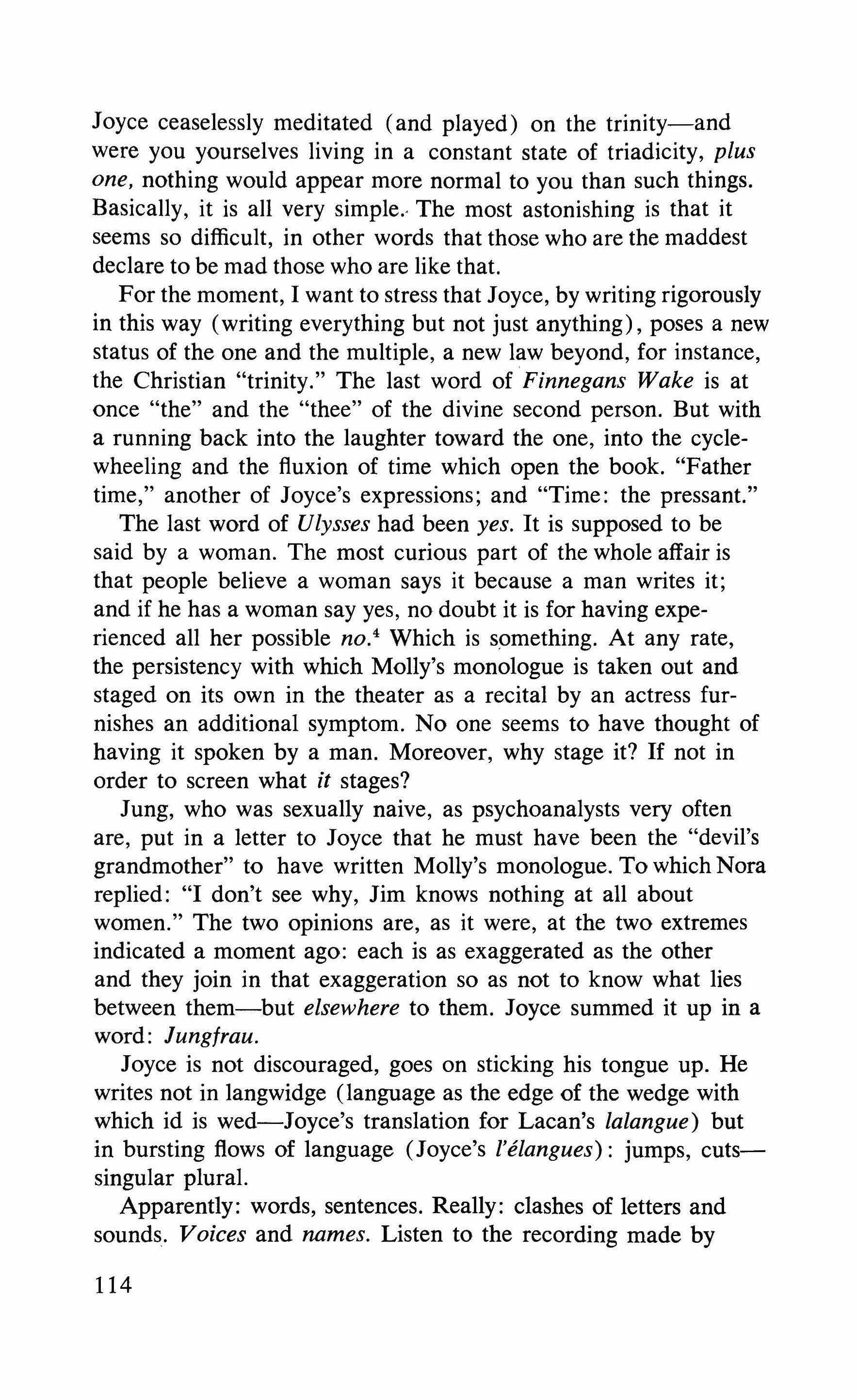
Joyce ceaselessly meditated (and played) on the trinity-and were you yourselves living in a constant state of triadicity, plus one, nothing would appear more normal to you than such things. Basically, it is all very simple The most astonishing is that it seems so difficult, in other words that those who are the maddest declare to be mad those who are like that.
For the moment, I want to stress that Joyce, by writing rigorously in this way (writing everything but not just anything), poses a new status of the one and the multiple, a new law beyond, for instance, the Christian "trinity." The last word of Finnegans Wake is at once "the" and the "thee" of the divine second person. But with a running back into the laughter toward the one, into the cyclewheeling and the fluxion of time which open the book. "Father time," another of Joyce's expressions; and "Time: the pressant."
The last word of Ulysses had been yes. It is supposed to be said by a woman. The most curious part of the whole affair is that people believe a woman says it because a man writes it; and if he has a woman say yes, no doubt it is for having experienced all her possible no:" Which is something, At any rate, the persistency with which Molly's monologue is taken out and staged on its own in the theater as a recital by an actress furnishes an additional symptom. No one seems to have thought of having it spoken by a man. Moreover, why stage it? If not in order to screen what it stages?
Jung, who was sexually naive, as psychoanalysts very often are, put in a letter to Joyce that he must have been the "devil's grandmother" to have written Molly's monologue. To which Nora replied: "I don't see why, Jim knows nothing at all about women." The two opinions are, as it were, at the two extremes indicated a moment ago: each is as exaggerated as the other and they join in that exaggeration so as not to know what lies between them-but elsewhere to them. Joyce summed it up in a word: Iungjrau.
Joyce is not discouraged, goes on sticking his tongue up. He writes not in langwidge (language as the edge of the wedge with which id is wed-Joyce's translation for Lacan's lalangue) but in bursting flows of language (Joyce's l'elangues+: jumps, cutssingular plural.
Apparently: words, sentences. Really: clashes of letters and sounds. Voices and names. Listen to the recording made by
114
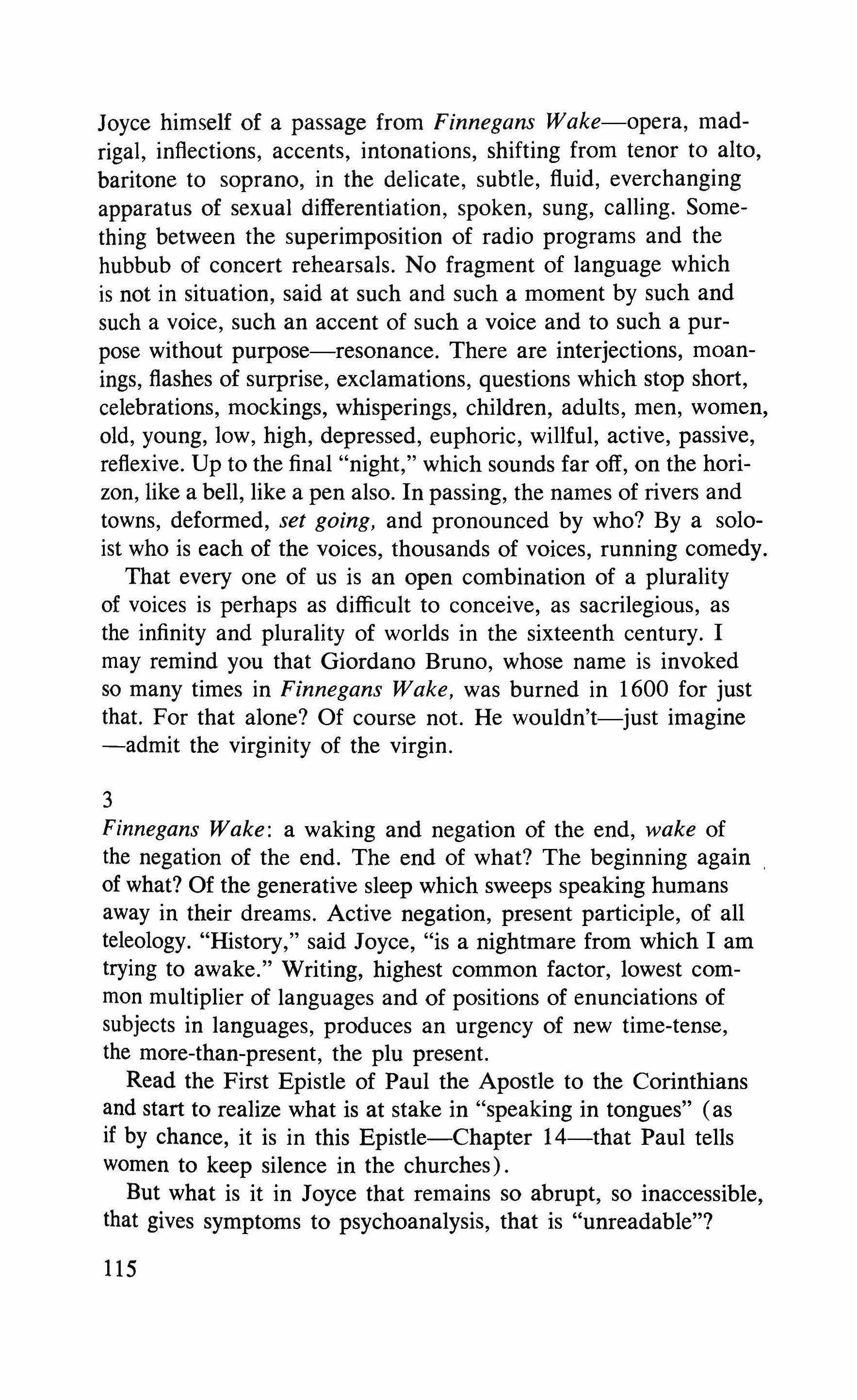
Joyce himself of a passage from Finnegans Wake-opera, madrigal, inflections, accents, intonations, shifting from tenor to alto, baritone to soprano, in the delicate, subtle, fluid, everchanging apparatus of sexual differentiation, spoken, sung, caIling. Something between the superimposition of radio programs and the hubbub of concert rehearsals. No fragment of language which is not in situation, said at such and such a moment by such and such a voice, such an accent of such a voice and to such a purpose without purpose-resonance. There are interjections, moanings, flashes of surprise, exclamations, questions which stop short, celebrations, mockings, whisperings, children, adults, men, women, old, young, low, high, depressed, euphoric, willful, active, passive, reflexive. Up to the final "night," which sounds far off, on the horizon, like a bell, like a pen also. In passing, the names of rivers and towns, deformed, set going, and pronounced by who? By a soloist who is each of the voices, thousands of voices, running comedy. That every one of us is an open combination of a plurality of voices is perhaps as difficult to conceive, as sacrilegious, as the infinity and plurality of worlds in the sixteenth century. I may remind you that Giordano Bruno, whose name is invoked so many times in Finnegans Wake, was burned in 1600 for just that. For that alone? Of course not. He wouldn't-just imagine -admit the virginity of the virgin.
3
Finnegans Wake: a waking and negation of the end, wake of the negation of the end. The end of what? The beginning again of what? Of the generative sleep which sweeps speaking humans away in their dreams. Active negation, present participle, of all teleology. "History," said Joyce, "is a nightmare from which I am trying to awake." Writing, highest common factor, lowest common multiplier of languages and of positions of enunciations of subjects in languages, produces an urgency of new time-tense, the more-than-present, the plu present.
Read the First Epistle of Paul the Apostle to the Corinthians and start to realize what is at stake in "speaking in tongues" (as if by chance, it is in this Epistle-Chapter 14-that Paul tells women to keep silence in the churches).
But what is it in Joyce that remains so abrupt, so inaccessible, that gives symptoms to psychoanalysis, that is "unreadable"?
115
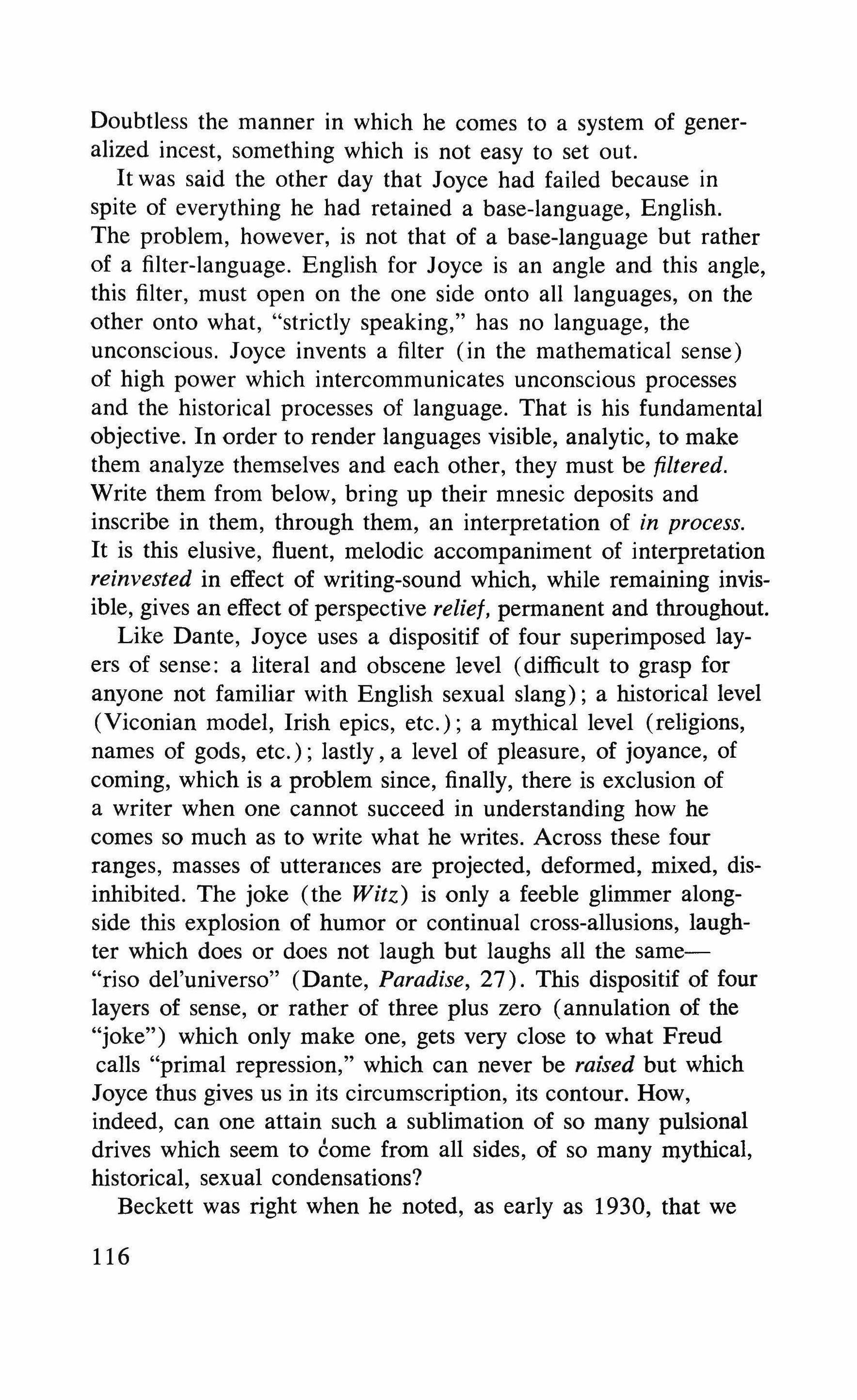
Doubtless the manner in which he comes to a system of generalized incest, something which is not easy to set out.
It was said the other day that Joyce had failed because in spite of everything he had retained a base-language, English. The problem, however, is not that of a base-language but rather of a filter-language. English for Joyce is an angle and this angle, this filter, must open on the one side onto all languages, on the other onto what, "strictly speaking," has no language, the unconscious. Joyce invents a filter (in the mathematical sense) of high power which intercommunicates unconscious processes and the historical processes of language. That is his fundamental objective. In order to render languages visible, analytic, to make them analyze themselves and each other, they must be filtered. Write them from below, bring up their mnesic deposits and inscribe in them, through them, an interpretation of in process. It is this elusive, fluent, melodic accompaniment of interpretation reinvested in effect of writing-sound which, while remaining invisible, gives an effect of perspective relief, permanent and throughout.
Like Dante, Joyce uses a dispositif of four superimposed layers of sense: a literal and obscene level (difficult to grasp for anyone not familiar with English sexual slang); a historical level (Viconian model, Irish epics, etc.); a mythical level (religions, names of gods, etc.); lastly, a level of pleasure, of joyance, of coming, which is a problem since, finally, there is exclusion of a writer when one cannot succeed in understanding how he comes so much as to write what he writes. Across these four ranges, masses of utterances are projected, deformed, mixed, disinhibited. The joke (the Witz) is only a feeble glimmer alongside this explosion of humor or continual cross-allusions, laughter which does or does not laugh but laughs all the same"riso del'universo" (Dante, Paradise, 27). This dispositif of four layers of sense, or rather of three plus zero (annulation of the "joke") which only make one, gets very close to what Freud calls "primal repression," which can never be raised but which Joyce thus gives us in its circumscription, its contour. How, indeed, can one attain such a sublimation of so many pulsional drives which seem to come from all sides, of so many mythical, historical, sexual condensations?
Beckett was right when he noted, as early as 1930, that we
116
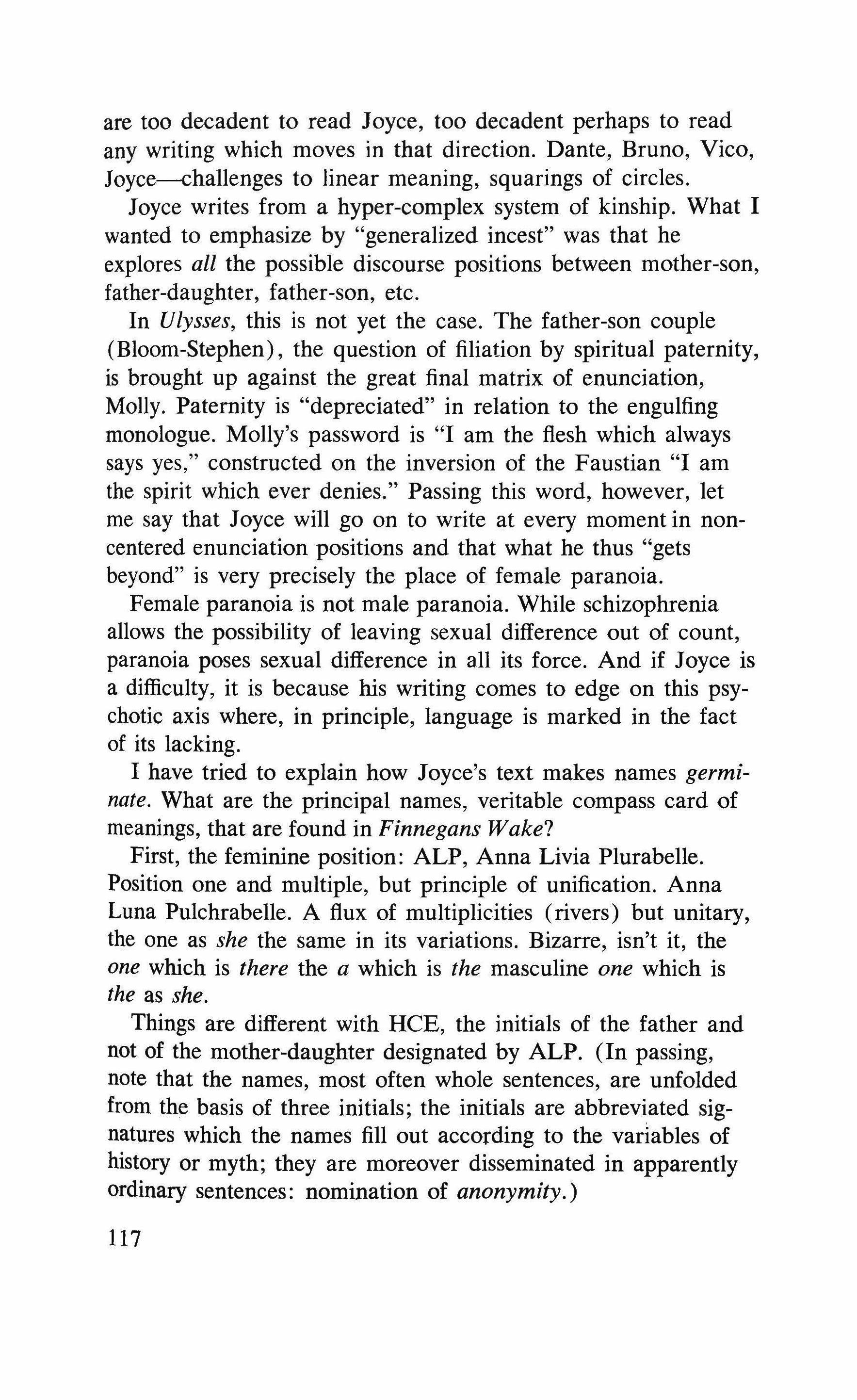
are too decadent to read Joyce, too decadent perhaps to read any writing which moves in that direction. Dante, Bruno, Vico, Joyce--chaUenges to linear meaning, squarings of circles.
Joyce writes from a hyper-complex system of kinship. What 1 wanted to emphasize by "generalized incest" was that he explores all the possible discourse positions between mother-son, father-daughter, father-son, etc.
In Ulysses, this is not yet the case. The father-son couple (Bloom-Stephen), the question of filiation by spiritual paternity, is brought up against the great final matrix of enunciation, Molly. Paternity is "depreciated" in relation to the engulfing monologue. Molly's password is "I am the flesh which always says yes," constructed on the inversion of the Faustian "I am the spirit which ever denies." Passing this word, however, let me say that Joyce will go on to write at every moment in noncentered enunciation positions and that what he thus "gets beyond" is very precisely the place of female paranoia.
Female paranoia is not male paranoia. While schizophrenia allows the possibility of leaving sexual difference out of count, paranoia poses sexual difference in all its force. And if Joyce is a difficulty, it is because his writing comes to edge on this psychotic axis where, in principle, language is marked in the fact of its lacking.
I have tried to explain how Joyce's text makes names germinate. What are the principal names, veritable compass card of meanings, that are found in Finnegans Wake?
First, the feminine position: ALP, Anna Livia Plurabelle. Position one and multiple, but principle of unification. Anna Luna Pulchrabelle. A flux of multiplicities (rivers) but unitary, the one as she the same in its variations. Bizarre, isn't it, the one which is there the a which is the masculine one which is the as she.
Things are different with HCE, the initials of the father and not of the mother-daughter designated by ALP. (In passing, note that the names, most often whole sentences, are unfolded from the basis of three initials; the initials are abbreviated signatures which the names fill out according to the variables of history or myth; they are moreover disseminated in apparently ordinary sentences: nomination of anonymity.)
117
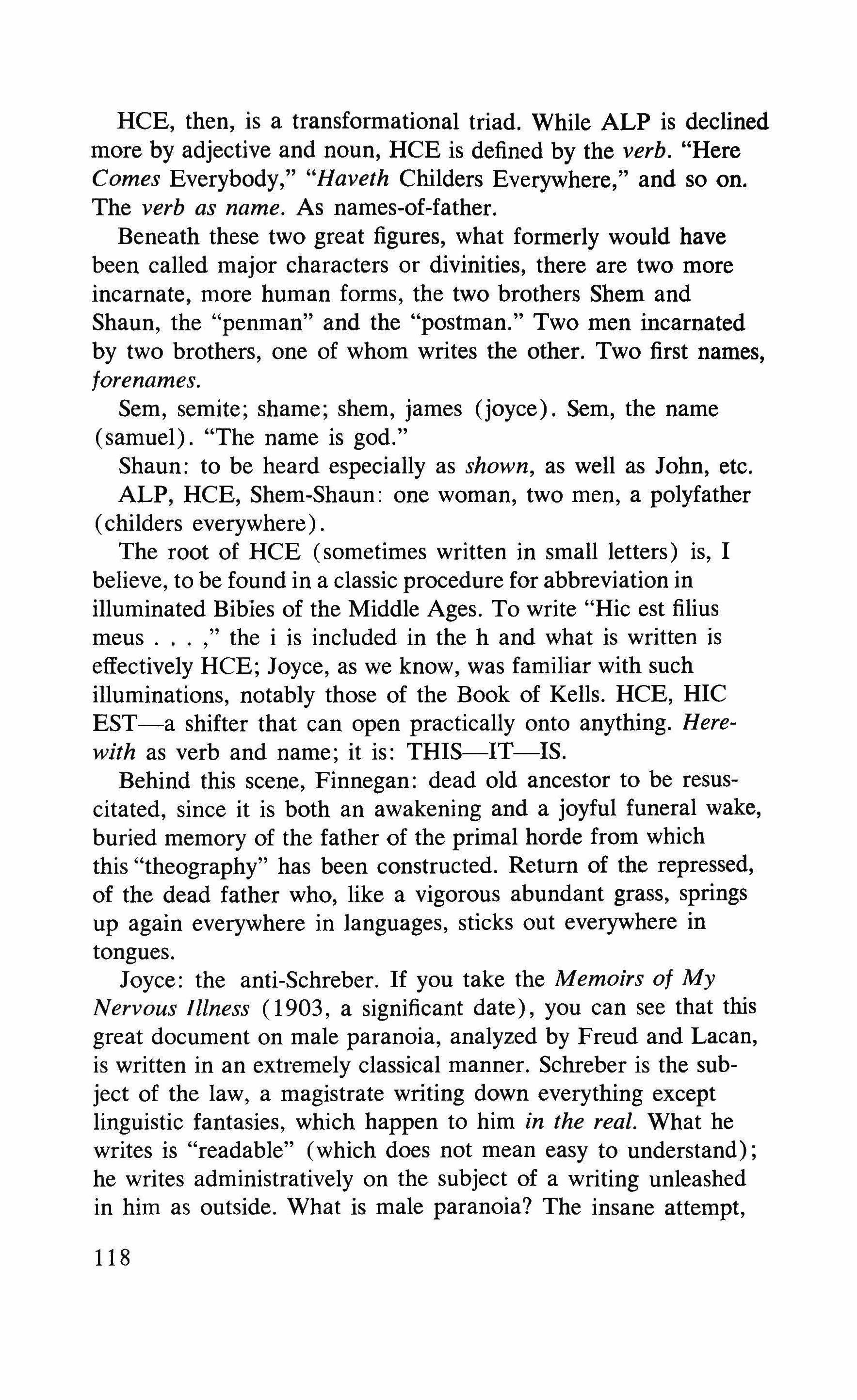
HCE, then, is a transformational triad. While ALP is declined more by adjective and noun, HCE is defined by the verb. "Here Comes Everybody," "Haveth Childers Everywhere," and so on. The verb as name. As names-of-father.
Beneath these two great figures, what formerly would have been called major characters or divinities, there are two more incarnate, more human forms, the two brothers Shem and Shaun, the "penman" and the "postman." Two men incarnated by two brothers, one of whom writes the other. Two first names, forenames.
Sem, semite; shame; shem, james (joyce). Sem, the name (samuel). "The name is god."
Shaun: to be heard especially as shown, as well as John, etc.
ALP, HCE, Shem-Shaun: one woman, two men, a polyfather (childers everywhere).
The root of HCE (sometimes written in small letters) is, I believe, to be found in a classic procedure for abbreviation in illuminated Bibles of the Middle Ages. To write "Hie est filius meus ," the i is included in the h and what is written is effectively HCE; Joyce, as we know, was familiar with such illuminations, notably those of the Book of Kells. HCE, HIC EST-a shifter that can open practically onto anything. Herewith as verb and name; it is: THIS-IT-IS.
Behind this scene, Finnegan: dead old ancestor to be resuscitated, since it is both an awakening and a joyful funeral wake, buried memory of the father of the primal horde from which this "theography" has been constructed. Return of the repressed, of the dead father who, like a vigorous abundant grass, springs up again everywhere in languages, sticks out everywhere in tongues.
Joyce: the anti-Schreber. If you take the Memoirs of My Nervous Illness (1903, a significant date), you can see that this great document on male paranoia, analyzed by Freud and Lacan, is written in an extremely classical manner. Schreber is the subject of the law, a magistrate writing down everything except linguistic fantasies, which happen to him in the real. What he writes is "readable" (which does not mean easy to understand); he writes administratively on the subject of a writing unleashed in him as outside. What is male paranoia? The insane attempt,
118
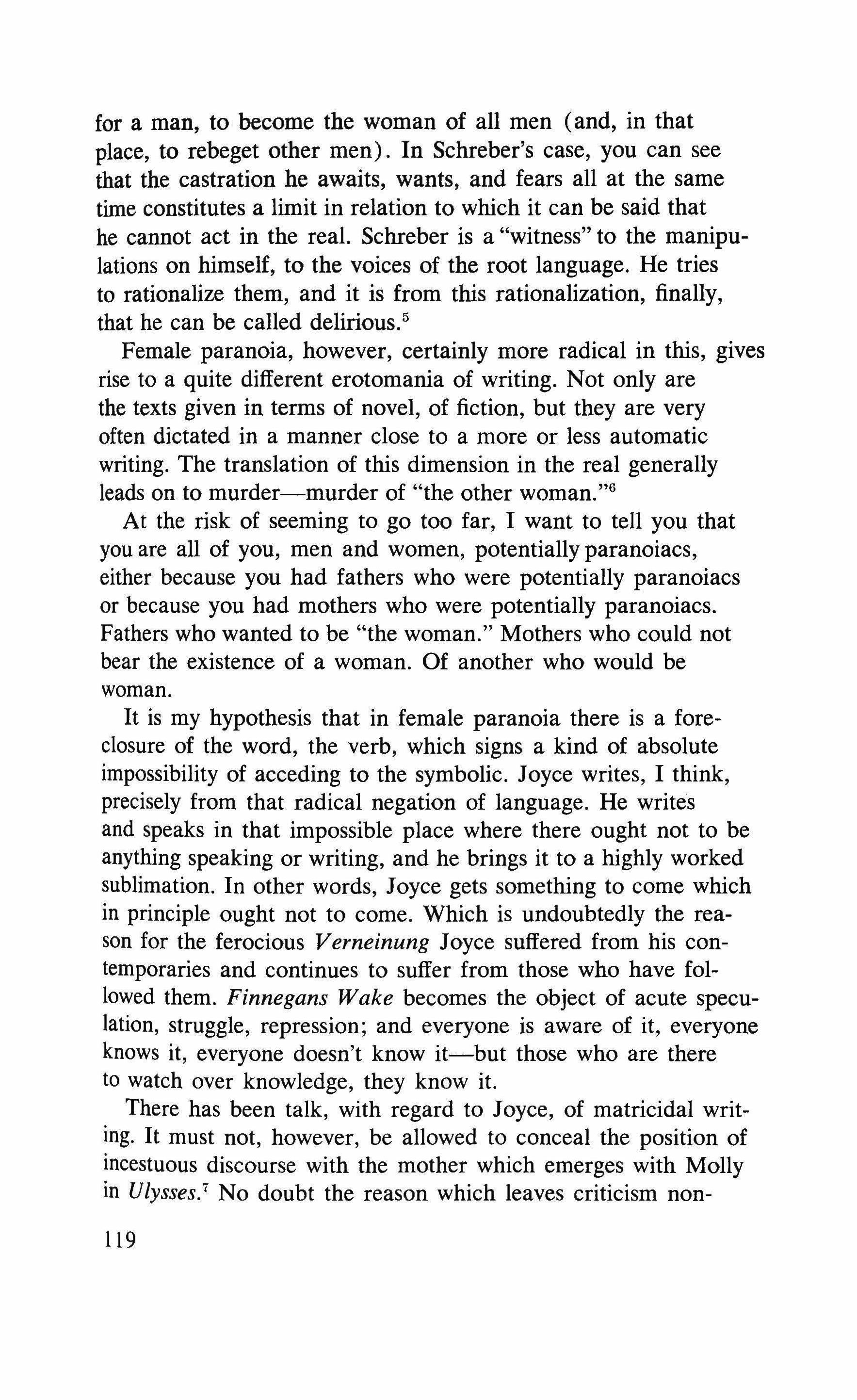
for a man, to become the woman of all men (and, in that place, to rebeget other men). In Schreber's case, you can see that the castration he awaits, wants, and fears all at the same time constitutes a limit in relation to which it can be said that he cannot act in the real. Schreber is a "witness" to the manipulations on himself, to the voices of the root language. He tries to rationalize them, and it is from this rationalization, finally, that he can be called delirious. 5
Female paranoia, however, certainly more radical in this, gives rise to a quite different erotomania of writing. Not only are the texts given in terms of novel, of fiction, but they are very often dictated in a manner close to a more or less automatic writing. The translation of this dimension in the real generally leads on to murder-murder of "the other woman."?
At the risk of seeming to go too far, I want to tell you that you are all of you, men and women, potentially paranoiacs, either because you had fathers who were potentially paranoiacs or because you had mothers who were potentially paranoiacs. Fathers who wanted to be "the woman." Mothers who could not bear the existence of a woman. Of another who would be woman.
It is my hypothesis that in female paranoia there is a foreclosure of the word, the verb, which signs a kind of absolute impossibility of acceding to the symbolic. Joyce writes, I think, precisely from that radical negation of language. He writes and speaks in that impossible place where there ought not to be anything speaking or writing, and he brings it to a highly worked sublimation. In other words, Joyce gets something to come which in principle ought not to come. Which is undoubtedly the reason for the ferocious Verneinung Joyce suffered from his contemporaries and continues to suffer from those who have followed them. Finnegans Wake becomes the object of acute speculation, struggle, repression; and everyone is aware of it, everyone knows it, everyone doesn't know it-but those who are there to watch over knowledge, they know it.
There has been talk, with regard to Joyce, of matricidal writing. It must not, however, be allowed to conceal the position of incestuous discourse with the mother which emerges with Molly in Ulysses,' No doubt the reason which leaves criticism non-
119
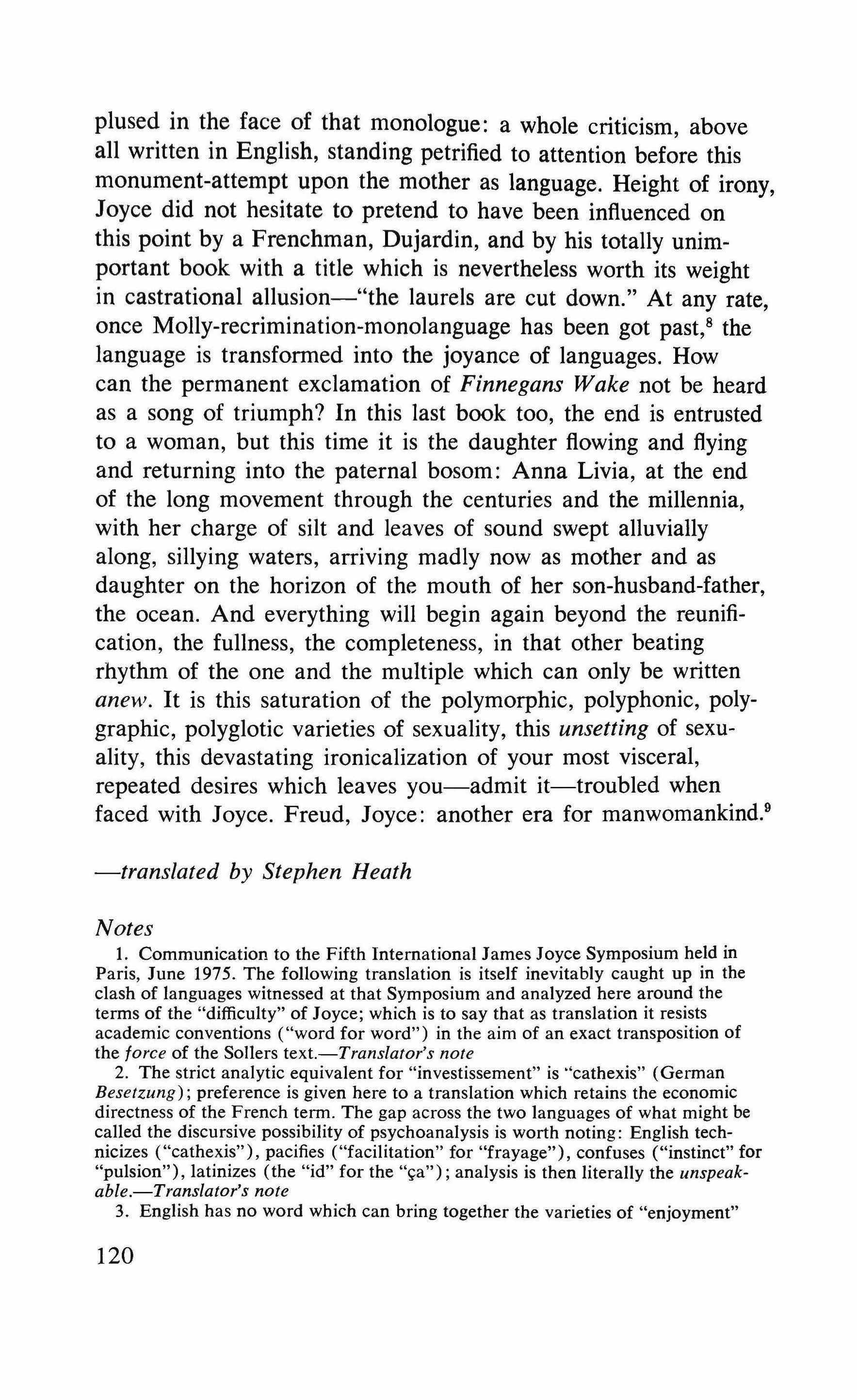
plused in the face of that monologue: a whole criticism, above all written in English, standing petrified to attention before this monument-attempt upon the mother as language. Height of irony, Joyce did not hesitate to pretend to have been influenced on this point by a Frenchman, Dujardin, and by his totally unimportant book with a title which is nevertheless worth its weight in castrational allusion-"the laurels are cut down." At any rate, once Molly-recrimination-monolanguage has been got past," the language is transformed into the joyance of languages. How can the permanent exclamation of Finnegans Wake not be heard as a song of triumph? In this last book too, the end is entrusted to a woman, but this time it is the daughter flowing and flying and returning into the paternal bosom: Anna Livia, at the end of the long movement through the centuries and the millennia, with her charge of silt and leaves of sound swept alluvially along, sillying waters, arriving madly now as mother and as daughter on the horizon of the mouth of her son-husband-father, the ocean. And everything will begin again beyond the reunification, the fullness, the completeness, in that other beating rhythm of the one and the multiple which can only be written anew. It is this saturation of the polymorphic, polyphonic, polygraphic, polyglotic varieties of sexuality, this unsetting of sexuality, this devastating ironicalization of your most visceral, repeated desires which leaves you-admit it-troubled when faced with Joyce. Freud, Joyce: another era for manwomankind."
-translated by Stephen Heath
Notes
1. Communication to the Fifth International James Joyce Symposium held in Paris, June 1975. The following translation is itself inevitably caught up in the clash of languages witnessed at that Symposium and analyzed here around the terms of the "difficulty" of Joyce; which is to say that as translation it resists academic conventions ("word for word") in the aim of an exact transposition of the force of the Sollers text.-Translator's note
2. The strict analytic equivalent for "investissernent" is "cathexis" (German Besetzungy; preference is given here to a translation which retains the economic directness of the French term. The gap across the two languages of what might be called the discursive possibility of psychoanalysis is worth noting: English technicizes ("cathexis"), pacifies ("facilitation" for "frayage"), confuses ("instinct" for "pulsion"),latinizes (the "id" for the "ca"): analysis is then literally the unspeakable.-Translator's note
3. English has no word which can bring together the varieties of "enjoyment"
120
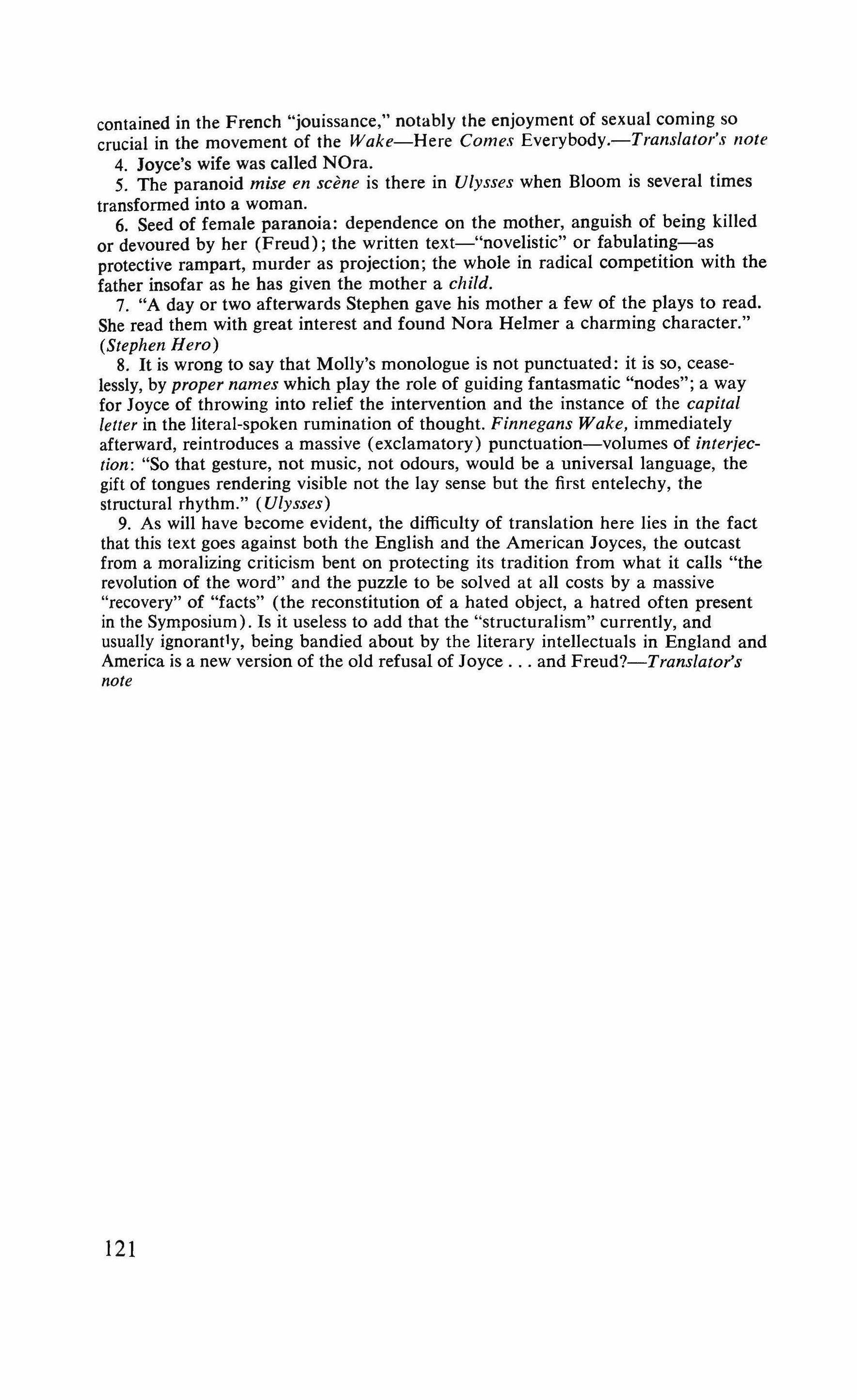
contained in the French "jouissance," notably the enjoyment of sexual coming so crucial in the movement of the Wake-Here Comes Everybody.-Translator's note
4. Joyce's wife was called NOra.
5. The paranoid mise en scene is there in Ulysses when Bloom is several times transformed into a woman.
6. Seed of female paranoia: dependence on the mother, anguish of being killed or devoured by her (Freud); the written text-"novelistic" or fabulating-as protective rampart, murder as projection; the whole in radical competition with the father insofar as he has given the mother a child.
7. "A day or two afterwards Stephen gave his mother a few of the plays to read. She read them with great interest and found Nora Helmer a charming character." (Stephen Hero)
8. It is wrong to say that Molly's monologue is not punctuated: it is so, ceaselessly, by proper names which play the role of guiding fantasmatic "nodes"; a way for Joyce of throwing into relief the intervention and the instance of the capital letter in the literal-spoken rumination of thought. Finnegans Wake, immediately afterward, reintroduces a massive (exclamatory) punctuation-volumes of interjection: "So that gesture, not music, not odours, would be a universal language, the gift of tongues rendering visible not the lay sense but the first entelechy, the structural rhythm." (Ulysses)
9. As will have become evident, the difficulty of translation here lies in the fact that this text goes against both the English and the American Joyces, the outcast from a moralizing criticism bent on protecting its tradition from what it calls "the revolution of the word" and the puzzle to be solved at all costs by a massive "recovery" of "facts" (the reconstitution of a hated object, a hatred often present in the Symposium). Is it useless to add that the "structuralism" currently, and usually ignorantly, being bandied about by the literary intellectuals in England and America is a new version of the old refusal of Joyce and Freud?-Translator's note
121
An interview with Philippe Sollers David Hayman

Philippe Sollers is and has been for some time the bad boy of contemporary French fiction-antifiction, postfiction, or what you will. As editor of the prestigious left wing periodical Tel Quel, he has contributed to the development of neo-Marxist and neoFreudian post-Structuralist thought and controversy. As a critic obsessed with the writers on the fringe whom he correctly sees as frequently pointing toward some unrecognized and significant center, he has considerably furthered the French awareness of the contributions of Lautreamont, Sade, Artaud, Bataille, and, most recently, of Joyce in Finnegans Wake.
Sollers' novels (as he says in this interview taped in June 1975) have taken several turns, but the fiction which follows the most recent shift is of enormous concern to those who know the later Joyce. Already published but still untranslated are Lois and H. A newer and more daring book, Paradis, has been appearing serially in Tel Quel.
My interview was preceded by a reading of the passage from Paradis translated for TriQuarterly by Carl Lovitt. Our discussion derived in large measure from the experience of that beautiful
122
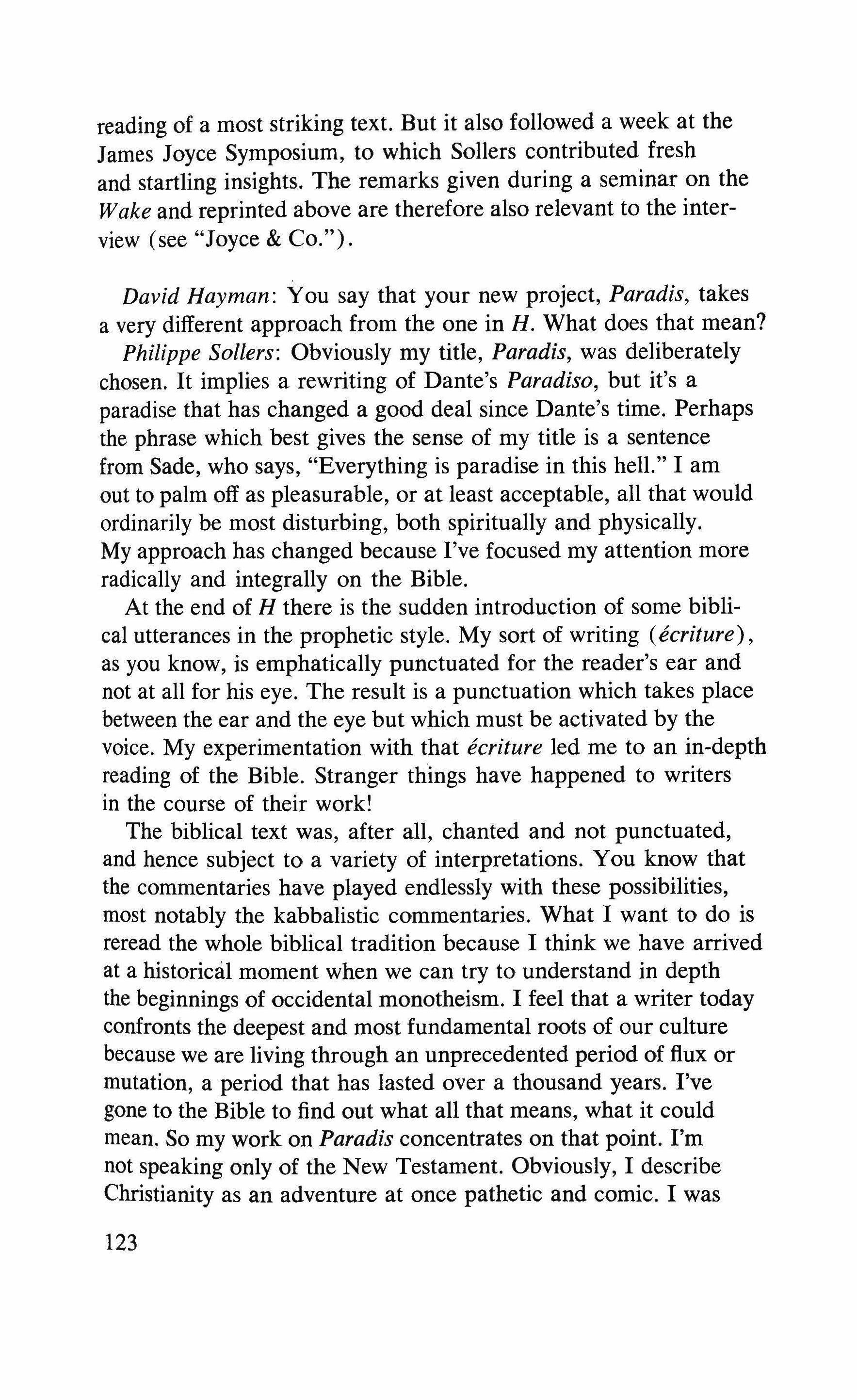
reading of a most striking text. But it also followed a week at the James Joyce Symposium, to which Sollers contributed fresh and startling insights. The remarks given during a seminar on the Wake and reprinted above are therefore also relevant to the interview (see "Joyce & Co.").
David Hayman: You say that your new project, Paradis, takes a very different approach from the one in H. What does that mean?
Philippe Sollers: Obviously my title, Paradis, was deliberately chosen. It implies a rewriting of Dante's Paradiso, but it's a paradise that has changed a good deal since Dante's time. Perhaps the phrase which best gives the sense of my title is a sentence from Sade, who says, "Everything is paradise in this hell." I am out to palm off as pleasurable, or at least acceptable, all that would ordinarily be most disturbing, both spiritually and physically. My approach has changed because I've focused my attention more radically and integrally on the Bible.
At the end of H there is the sudden introduction of some biblical utterances in the prophetic style. My sort of writing (ecriture), as you know, is emphatically punctuated for the reader's ear and not at all for his eye. The result is a punctuation which takes place between the ear and the eye but which must be activated by the voice. My experimentation with that ecriture led me to an in-depth reading of the Bible. Stranger things have happened to writers in the course of their work!
The biblical text was, after all, chanted and not punctuated, and hence subject to a variety of interpretations. You know that the commentaries have played endlessly with these possibilities, most notably the kabbalistic commentaries. What I want to do is reread the whole biblical tradition because I think we have arrived at a historical moment when we can try to understand in depth the beginnings of occidental monotheism. I feel that a writer today confronts the deepest and most fundamental roots of our culture because we are living through an unprecedented period of flux or mutation, a period that has lasted over a thousand years. I've gone to the Bible to find out what all that means, what it could mean. So my work on Paradis concentrates on that point. I'm not speaking only of the New Testament. Obviously, I describe Christianity as an adventure at once pathetic and comic. I was
123

inspired by Joyce in this. He began the process of disclosing the complete ambiguity of that affair, which is at once absolutely pathetic and irresistibly funny. The illusionistic aspect of Christianity is one of the funniest things in our history. But at the same time I want to discover in the Bible-in Genesis, in the canonical books, and especially in the prophetic texts-how such writing (discours) functions.
D.H.: You talk about your unpunctuated texts with their audible punctuation. Does that mean that when I read H or Paradis I can vary the punctuation?
P.S.: Yes no. I think you won't be able to change the punctuation but you can alter the accentuation, the intonation, the way it is interpreted. As for the punctuation, I think it is invariable. That is, the position of the enunciation, which is after all what punctuation amounts to, is rigorously controlled. Of course the eye perceives the text as unpunctuated. It's a trap.
D.H.: I'm thinking of Molly Bloom
P.S.: Sure. It looks like automatic writing, as though it were typed directly on the page. But it isn't, and here my strategy comes into play. I have deliberately laid that trap for the retina, made it seem that there is nothing to writing my books, but sometime I'll show you my manuscripts. You'll see pages written in longhand, laboriously revised ten, fifteen, twenty times. I want to give the impression that I write mechanically, but in fact I write at times with the care of a surgeon using his scalpel to separate fine layers of tissue, performing an operation with very great precision. I'm thinking of an operation I saw in China, the removal of a cataract, where you have to cut very carefully and still quite rapidly so that the needle will excise the crystal that blocks the sight. Or something like acupuncture. These are very meticulous operations of the sort I've introduced in the text I just read you. I separate the lips of the word and I treat them exactly as a surgeon would treat delicate tissues. There is a biological component. I don't know whether or not you felt it.
D.H.: I felt that it was very carefully worked, but can we return to my question? You said earlier that the absence of punctuation in the Bible opened the text to several interpretations.
P.S.: Yes, the best known example is the opening of Genesis, which can be translated "In the beginning God created the heavens
124

and the earth," or you could read "In the beginning God created himself." It depends on how you punctuate it.
D.H.: Are you really trying to do that?
P.S.: Not at all! I'm saying that the manner in which I write has led me to that terrain. Personally, I wouldn't want to condense a multiplicity of possible interpretations into a single utterance. What I am trying to write engages me in the adventure of extreme clarification. I am trying to say simply and precisely things that until now have only been said in the most ambiguous ways, or at least by multiplying the ambiguities within the signifiers. Why is it a book of clarification? Because I am building on a rock, on a sexual interpretation. I'm reading the Bible, especially the New Testament, as the mythologization of a sexual adventure-somewhat in the manner of Wilhelm Reich in The Murder of Christ, but going much further, since Reich's interpretation is rather lyrical, nafve The moment we see that adventure as founded on a sexual code or message, which could not have been spelled out before our time, it becomes at once pathetic and very comic. And when I say that we live in a period of mutation, I believe that's the crux. Everything that could only be expressed metaphorically, through allusion, through the creation of myths, by the superposition of allusion to the nth degree-the moment you systematically follow a sexual interpretation, you can clarify all of that. By clarification I don't mean that one minimizes but rather that one gains a sense of the sedimentation or stratification of the interpretation, of all that has been deposited by the memory of the species in its religion. You know, they call what I'm doing unreadable, but as soon as I read it aloud calmly and show that I can explain each item, you can see that it's the opposite of an occultation; it's a disclosure.
D.H.: What about your other books?
P.S.: I think my books begin with Drame, which is now ten years old. Then you have Nombres, followed by Lois, which constitutes a break or rupture, then H, and then this work when it's finished. There was also a period between Drame and Nombres which was a period of research into the disposition of writing methods, quite advanced but at the same time very ascetic. But the real rupture was marked by Lois, a book that dates back four years. It was a sort of taboo-breaker, a rather strange book which
125
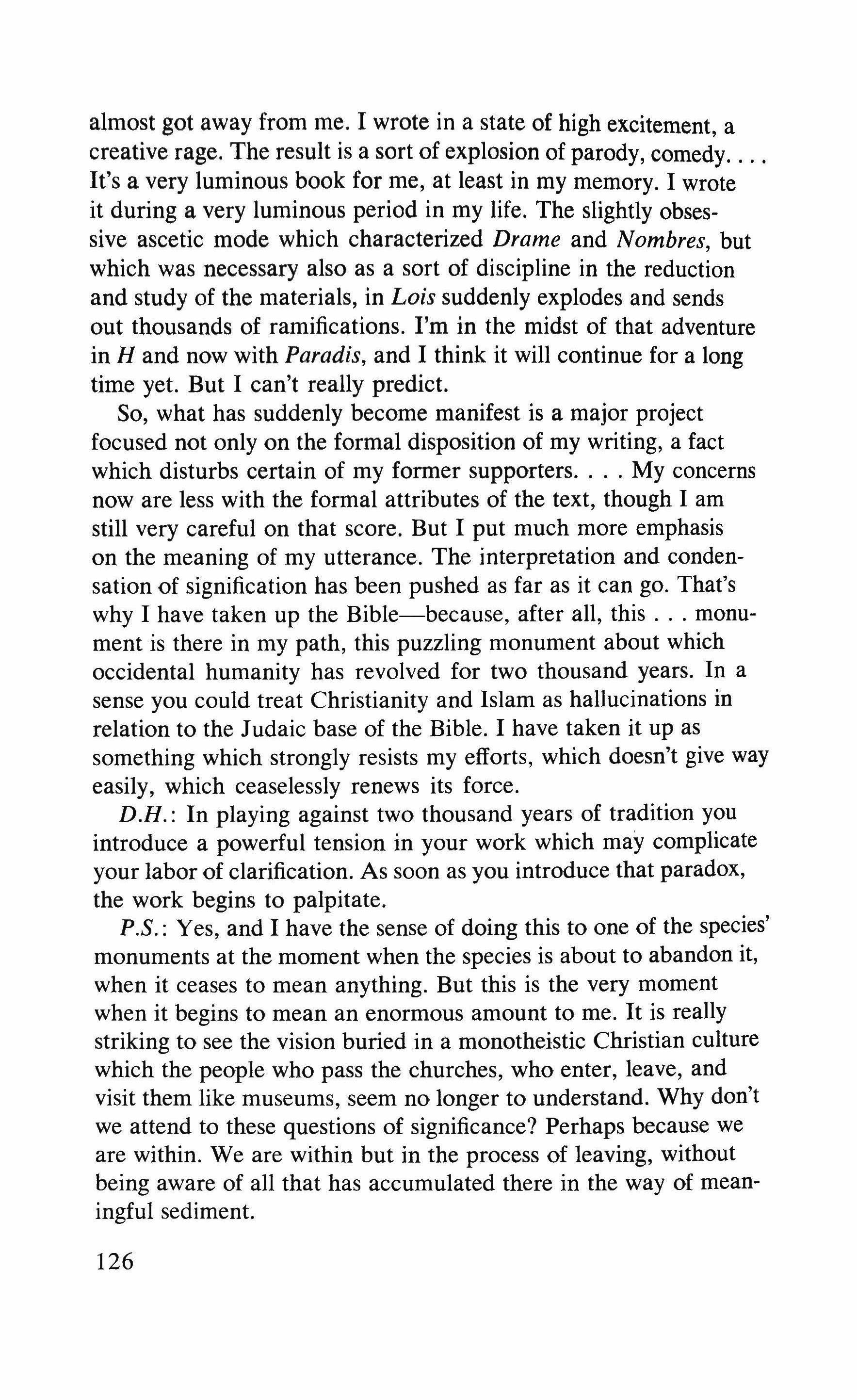
almost got away from me. I wrote in a state of high excitement, a creative rage. The result is a sort of explosion of parody, comedy It's a very luminous book for me, at least in my memory. I wrote it during a very luminous period in my life. The slightly obsessive ascetic mode which characterized Drame and Nombres, but which was necessary also as a sort of discipline in the reduction and study of the materials, in Lois suddenly explodes and sends out thousands of ramifications. I'm in the midst of that adventure in H and now with Paradis, and I think it will continue for a long time yet. But I can't really predict.
So, what has suddenly become manifest is a major project focused not only on the formal disposition of my writing, a fact which disturbs certain of my former supporters My concerns now are less with the formal attributes of the text, though I am still very careful on that score. But I put much more emphasis on the meaning of my utterance. The interpretation and condensation of signification has been pushed as far as it can go. That's why I have taken up the Bible-because, after all, this monument is there in my path, this puzzling monument about which occidental humanity has revolved for two thousand years. In a sense you could treat Christianity and Islam as hallucinations in relation to the Judaic base of the Bible. I have taken it up as something which strongly resists my efforts, which doesn't give way easily, which ceaselessly renews its force.
D.H.: In playing against two thousand years of tradition you introduce a powerful tension in your work which may complicate your labor of clarification. As soon as you introduce that paradox, the work begins to palpitate.
P.S.: Yes, and I have the sense of doing this to one of the species' monuments at the moment when the species is about to abandon it, when it ceases to mean anything. But this is the very moment when it begins to mean an enormous amount to me. It is really striking to see the vision buried in a monotheistic Christian culture which the people who pass the churches, who enter, leave, and visit them like museums, seem no longer to understand. Why don't we attend to these questions of significance? Perhaps because we are within. We are within but in the process of leaving, without being aware of all that has accumulated there in the way of meaningful sediment.
126
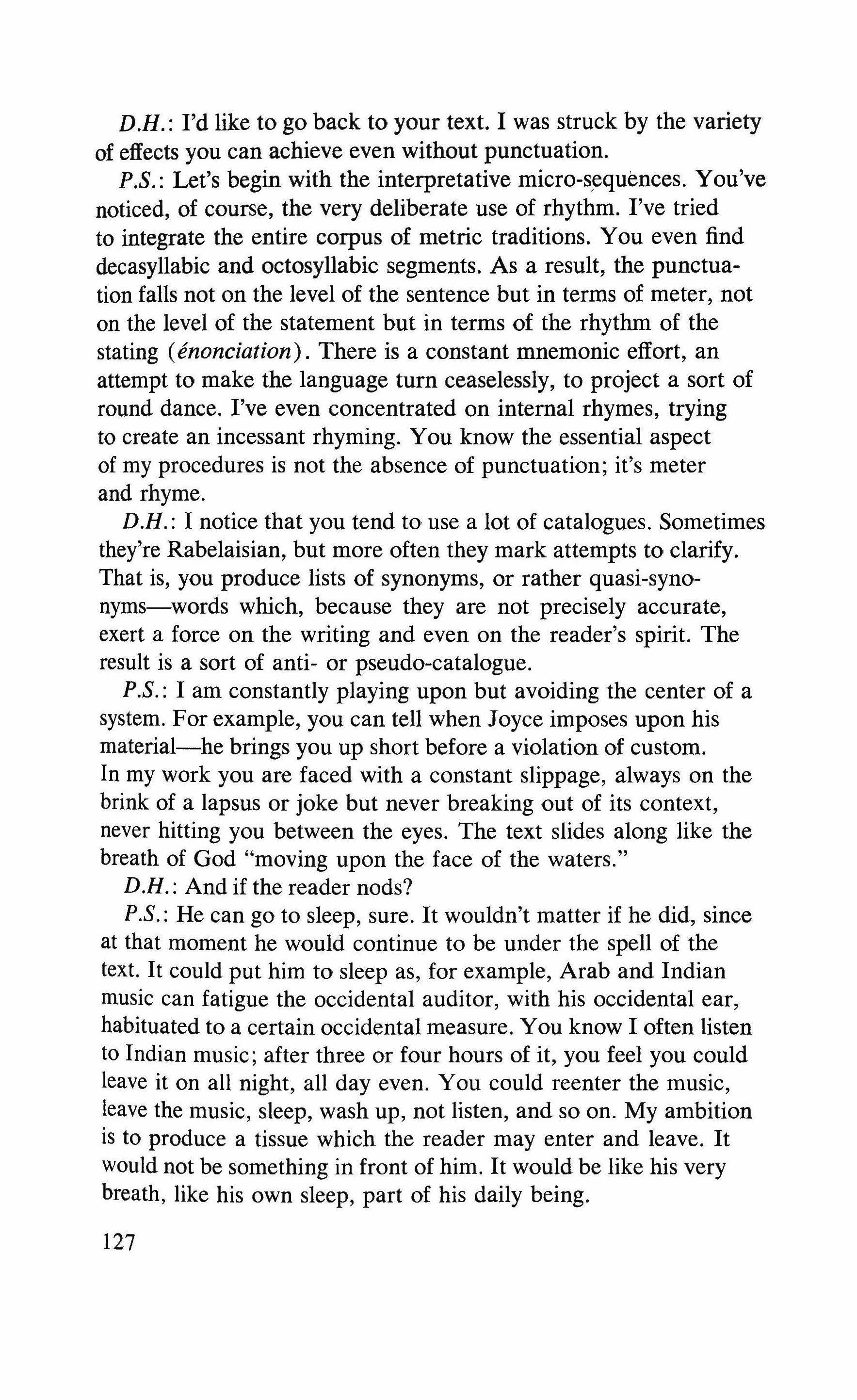
D.H.: I'd like to go back to your text. I was struck by the variety of effects you can achieve even without punctuation.
P.S.: Let's begin with the interpretative micro-sequences. You've noticed, of course, the very deliberate use of rhythm. I've tried to integrate the entire corpus of metric traditions. You even find decasyllabic and octosyllabic segments. As a result, the punctuation falls not on the level of the sentence but in terms of meter, not on the level of the statement but in terms of the rhythm of the stating (enonciationv. There is a constant mnemonic effort, an attempt to make the language tum ceaselessly, to project a sort of round dance. I've even concentrated on internal rhymes, trying to create an incessant rhyming. You know the essential aspect of my procedures is not the absence of punctuation; it's meter and rhyme.
D.H.: I notice that you tend to use a lot of catalogues. Sometimes they're Rabelaisian, but more often they mark attempts to clarify. That is, you produce lists of synonyms, or rather quasi-synonyms-words which, because they are not precisely accurate, exert a force on the writing and even on the reader's spirit. The result is a sort of anti- or pseudo-catalogue.
P.S.: I am constantly playing upon but avoiding the center of a system. For example, you can tell when Joyce imposes upon his material-he brings you up short before a violation of custom. In my work you are faced with a constant slippage, always on the brink of a lapsus or joke but never breaking out of its context, never hitting you between the eyes. The text slides along like the breath of God "moving upon the face of the waters."
D.H.: And if the reader nods?
P.S.: He can go to sleep, sure. It wouldn't matter if he did, since at that moment he would continue to be under the spell of the text. It could put him to sleep as, for example, Arab and Indian music can fatigue the occidental auditor, with his occidental ear, habituated to a certain occidental measure. You know I often listen to Indian music; after three or four hours of it, you feel you could leave it on all night, all day even. You could reenter the music, leave the music, sleep, wash up, not listen, and so on. My ambition is to produce a tissue which the reader may enter and leave. It would not be something in front of him. It would be like his very breath, like his own sleep, part of his daily being.
127
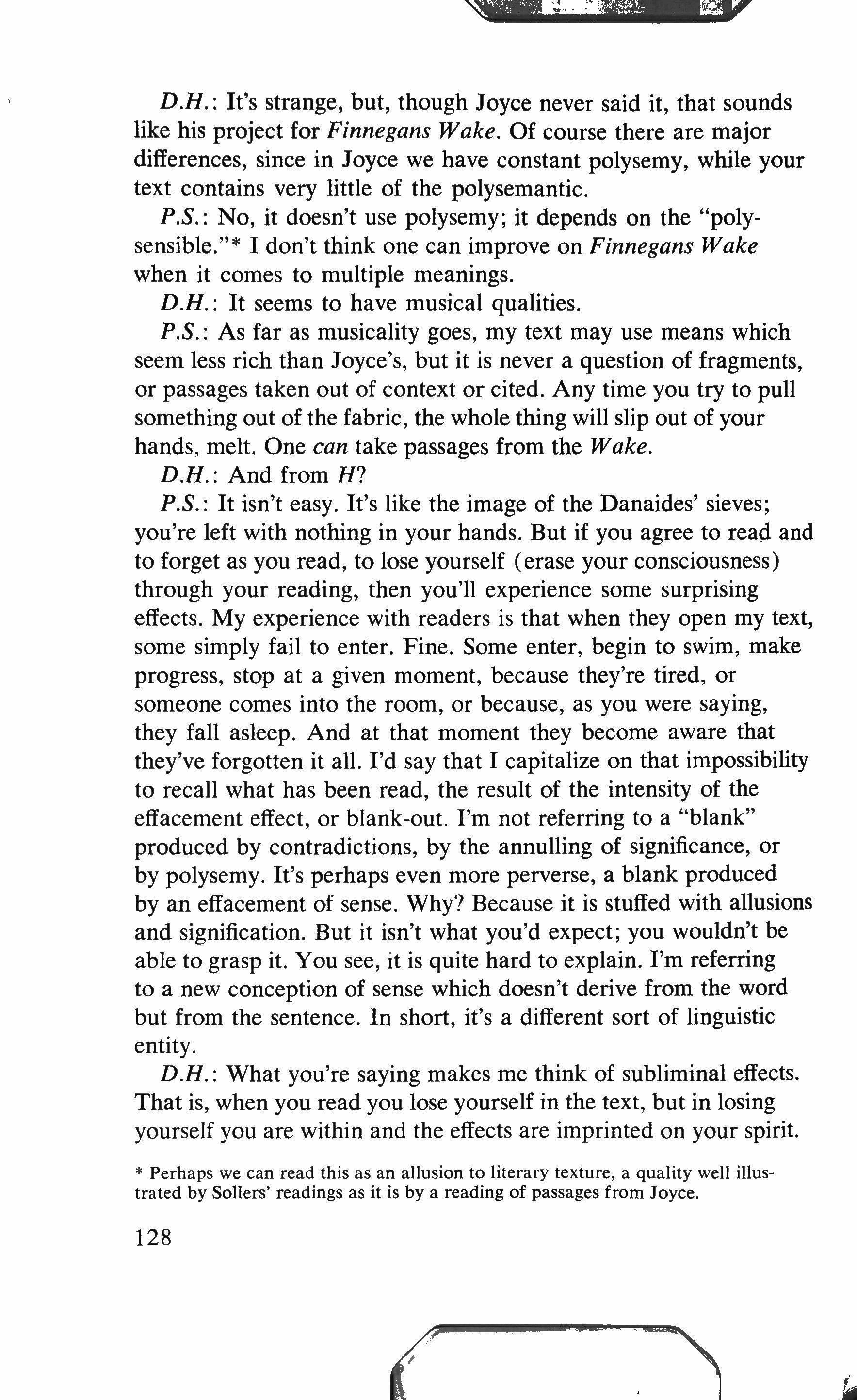
D.H.: It's strange, but, though Joyce never said it, that sounds like his project for Finnegans Wake. Of course there are major differences, since in Joyce we have constant polysemy, while your text contains very little of the polysemantic.
P.S.: No, it doesn't use polysemy; it depends on the "polysensible."* I don't think one can improve on Finnegans Wake when it comes to multiple meanings.
D.H.: It seems to have musical qualities.
P.S.: As far as musicality goes, my text may use means which seem less rich than Joyce's, but it is never a question of fragments, or passages taken out of context or cited. Any time you try to pull something out of the fabric, the whole thing will slip out of your hands, melt. One can take passages from the Wake.
D.H.: And from H?
P.S.: It isn't easy. It's like the image of the Danaides' sieves; you're left with nothing in your hands. But if you agree to read and to forget as you read, to lose yourself (erase your consciousness) through your reading, then you'll experience some surprising effects. My experience with readers is that when they open my text, some simply fail to enter. Fine. Some enter, begin to swim, make progress, stop at a given moment, because they're tired, or someone comes into the room, or because, as you were saying, they fall asleep. And at that moment they become aware that they've forgotten it all. I'd say that I capitalize on that impossibility to recall what has been read, the result of the intensity of the effacement effect, or blank-out. I'm not referring to a "blank" produced by contradictions, by the annulling of significance, or by polysemy. It's perhaps even more perverse, a blank produced by an effacement of sense. Why? Because it is stuffed with allusions and signification. But it isn't what you'd expect; you wouldn't be able to grasp it. You see, it is quite hard to explain. I'm referring to a new conception of sense which doesn't derive from the word but from the sentence. In short, it's a different sort of linguistic entity.
D.H.: What you're saying makes me think of subliminal effects. That is, when you read you lose yourself in the text, but in losing yourself you are within and the effects are imprinted on your spirit.
* Perhaps we can read this as an allusion to literary texture, a quality well illustrated by Sollers' readings as it is by a reading of passages from Joyce.
128 .a(J
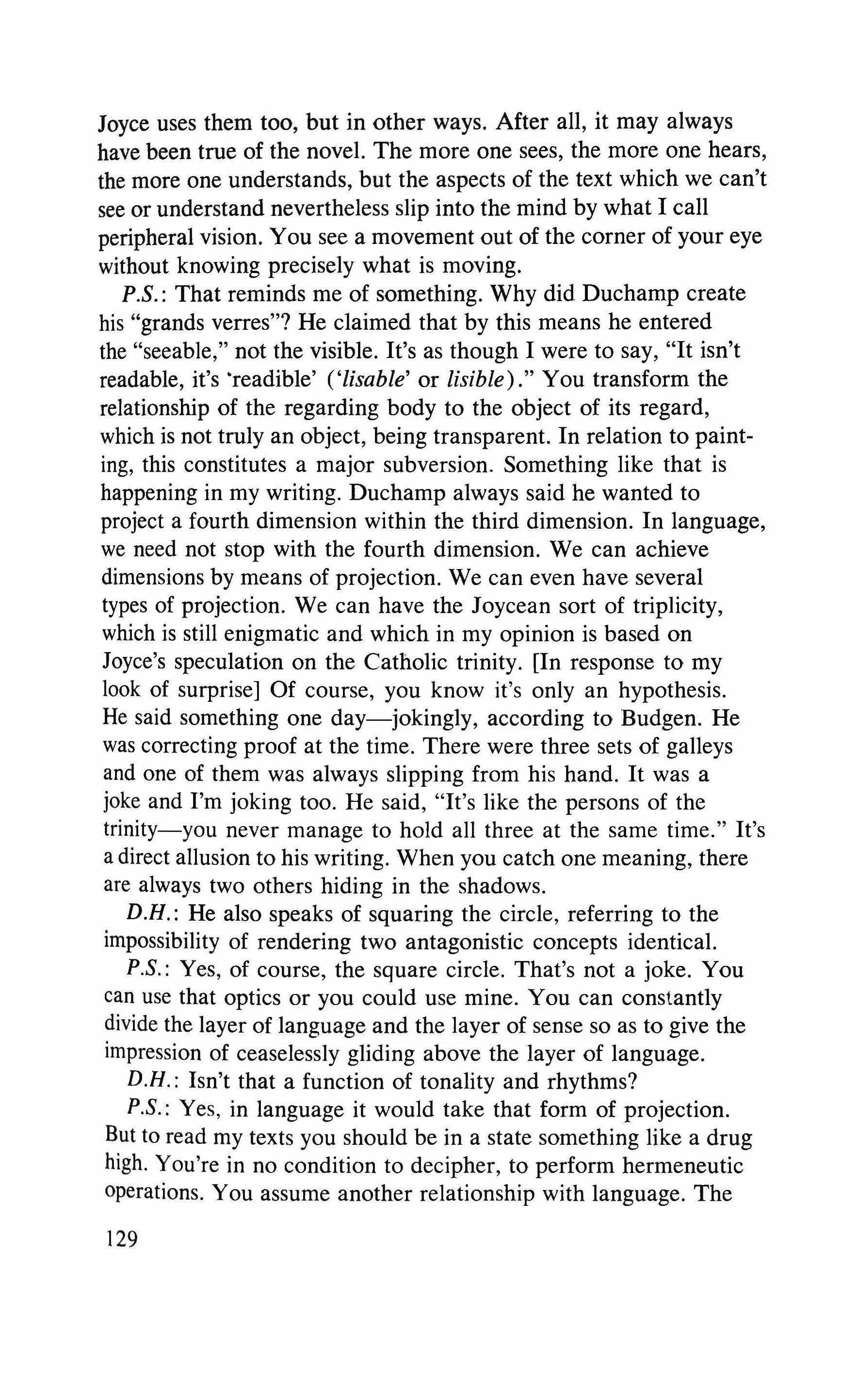
Joyce uses them too, but in other ways. After all, it may always have been true of the novel. The more one sees, the more one hears, the more one understands, but the aspects of the text which we can't see or understand nevertheless slip into the mind by what I call peripheral vision. You see a movement out of the corner of your eye without knowing precisely what is moving.
P.S.: That reminds me of something. Why did Duchamp create his "grands verres"? He claimed that by this means he entered the "seeable," not the visible. It's as though I were to say, "It isn't readable, it's 'readible' ('Usable' or lisibley;" You transform the relationship of the regarding body to the object of its regard, which is not truly an object, being transparent. In relation to painting, this constitutes a major subversion. Something like that is happening in my writing. Duchamp always said he wanted to project a fourth dimension within the third dimension. In language, we need not stop with the fourth dimension. We can achieve dimensions by means of projection. We can even have several types of projection. We can have the Joycean sort of triplicity, which is still enigmatic and which in my opinion is based on Joyce's speculation on the Catholic trinity. [In response to my look of surprise] Of course, you know it's only an hypothesis. He said something one day-jokingly, according to Budgen. He was correcting proof at the time. There were three sets of galleys and one of them was always slipping from his hand. It was a joke and I'm joking too. He said, "It's like the persons of the trinity-you never manage to hold all three at the same time." It's a direct allusion to his writing. When you catch one meaning, there are always two others hiding in the shadows.
D.H.: He also speaks of squaring the circle, referring to the impossibility of rendering two antagonistic concepts identical.
P.S.: Yes, of course, the square circle. That's not a joke. You can use that optics or you could use mine. You can constantly divide the layer of language and the layer of sense so as to give the impression of ceaselessly gliding above the layer of language.
D.H.: Isn't that a function of tonality and rhythms?
P.S.: Yes, in language it would take that form of projection. But to read my texts you should be in a state something like a drug high. You're in no condition to decipher, to perform hermeneutic operations. You assume another relationship with language. The
129
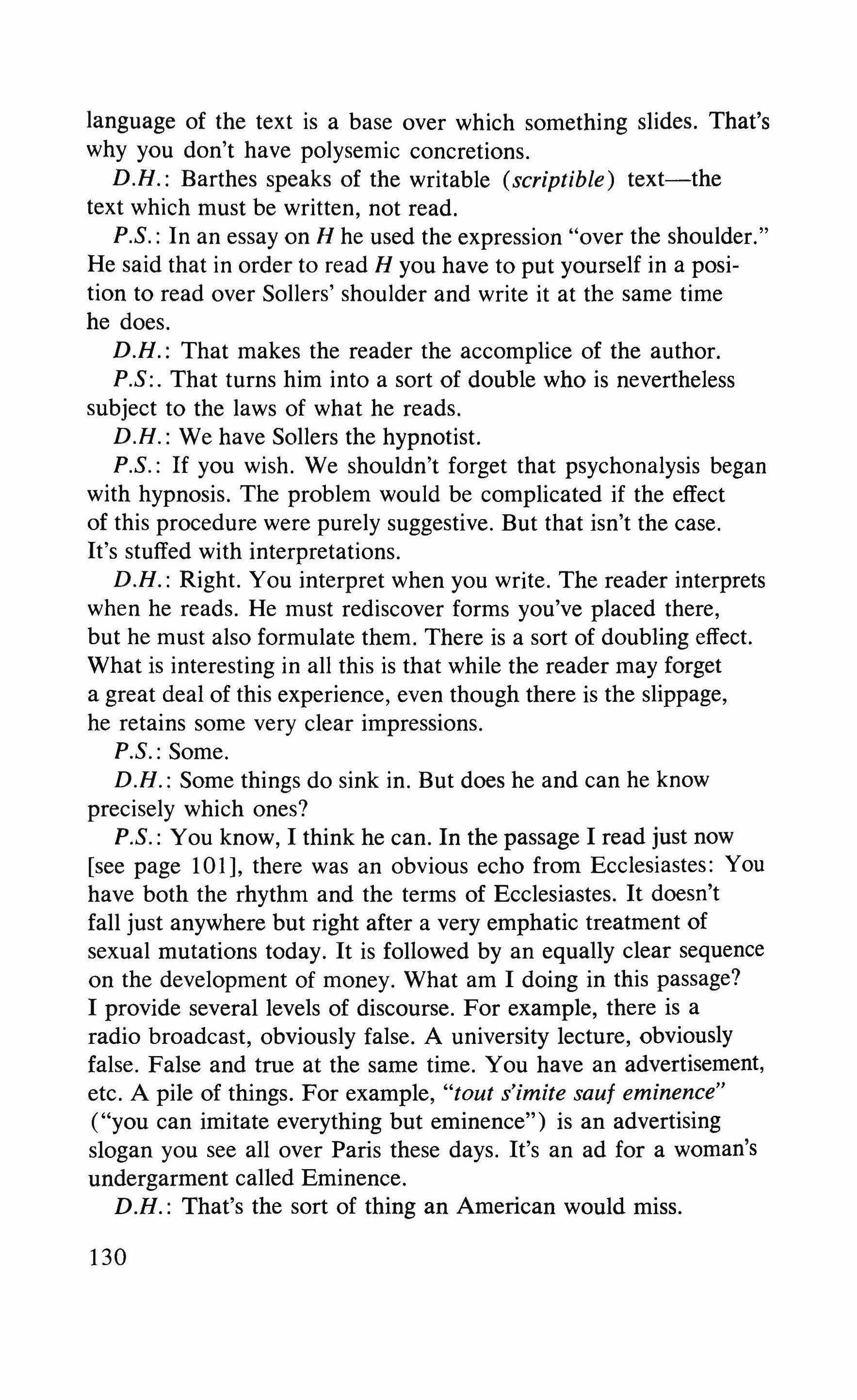
language of the text is a base over which something slides. That's why you don't have polysemic concretions.
D.H.: Barthes speaks of the writable (scriptible) text-the text which must be written, not read.
P.S.: In an essay on 11 he used the expression "over the shoulder." He said that in order to read H you have to put yourself in a position to read over Sollers' shoulder and write it at the same time he does.
D.H.: That makes the reader the accomplice of the author.
P.S:. That turns him into a sort of double who is nevertheless subject to the laws of what he reads.
D.H.: We have Sollers the hypnotist.
P.S.: If you wish. We shouldn't forget that psychonalysis began with hypnosis. The problem would be complicated if the effect of this procedure were purely suggestive. But that isn't the case. It's stuffed with interpretations.
D.H.: Right. You interpret when you write. The reader interprets when he reads. He must rediscover forms you've placed there, but he must also formulate them. There is a sort of doubling effect. What is interesting in all this is that while the reader may forget a great deal of this experience, even though there is the slippage, he retains some very clear impressions.
P.S.: Some.
D.H.: Some things do sink in. But does he and can he know precisely which ones?
P.S.: You know, I think he can. In the passage I read just now [see page 101], there was an obvious echo from Ecclesiastes: You have both the rhythm and the terms of Ecclesiastes. It doesn't fall just anywhere but right after a very emphatic treatment of sexual mutations today. It is followed by an equally clear sequence on the development of money. What am I doing in this passage? I provide several levels of discourse. For example, there is a radio broadcast, obviously false. A university lecture, obviously false. False and true at the same time. You have an advertisement, etc. A pile of things. For example, "tout s'imite saul eminence" ("you can imitate everything but eminence") is an advertising slogan you see all over Paris these days. It's an ad for a woman's undergarment called Eminence.
D.H.: That's the sort of thing an American would miss.
130
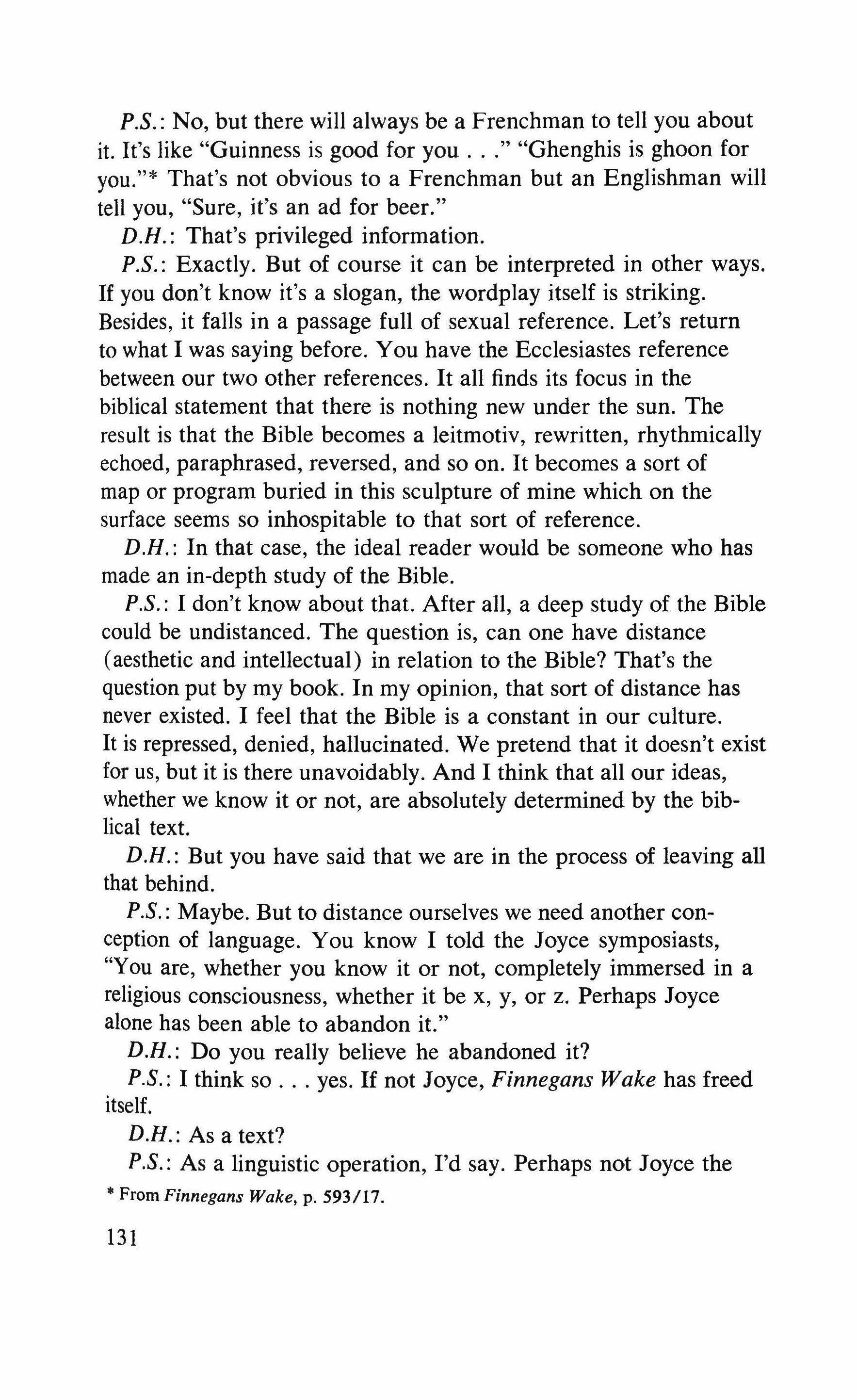
P.S.: No, but there will always be a Frenchman to tell you about it. It's like "Guinness is good for you "Ghenghis is ghoon for you."* That's not obvious to a Frenchman but an Englishman will tell you, "Sure, it's an ad for beer."
D.H.: That's privileged information.
P.S.: Exactly. But of course it can be interpreted in other ways. If you don't know it's a slogan, the wordplay itself is striking. Besides, it falls in a passage full of sexual reference. Let's return to what I was saying before. You have the Ecclesiastes reference between our two other references. It all finds its focus in the biblical statement that there is nothing new under the sun. The result is that the Bible becomes a leitmotiv, rewritten, rhythmically echoed, paraphrased, reversed, and so on. It becomes a sort of map or program buried in this sculpture of mine which on the surface seems so inhospitable to that sort of reference.
D.H.: In that case, the ideal reader would be someone who has made an in-depth study of the Bible.
P.S.: I don't know about that. After all, a deep study of the Bible could be undistanced. The question is, can one have distance (aesthetic and intellectual) in relation to the Bible? That's the question put by my book. In my opinion, that sort of distance has never existed. I feel that the Bible is a constant in our culture. It is repressed, denied, hallucinated. We pretend that it doesn't exist for us, but it is there unavoidably. And I think that all our ideas, whether we know it or not, are absolutely determined by the biblical text.
D.H.: But you have said that we are in the process of leaving all that behind.
P.S.: Maybe. But to distance ourselves we need another conception of language. You know I told the Joyce symposiasts, "You are, whether you know it or not, completely immersed in a religious consciousness, whether it be x, y, or z. Perhaps Joyce alone has been able to abandon it."
D.H.: Do you really believe he abandoned it?
P.S.: I think so yes. If not Joyce, Finnegans Wake has freed itself.
D.H.: As a text?
P.S.: As a linguistic operation, I'd say. Perhaps not Joyce the * From Finnegans Wake, p. 593/17.
131
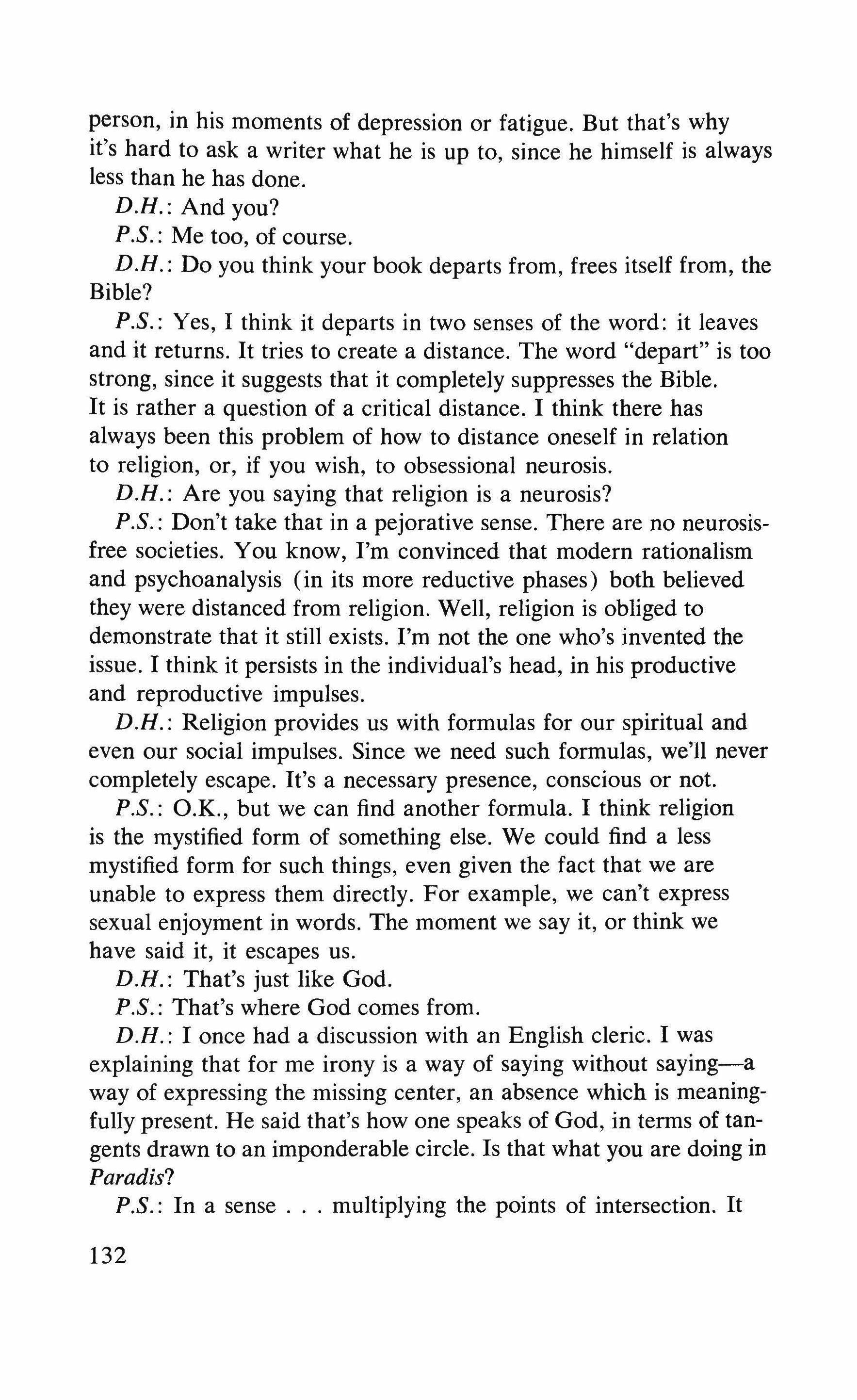
person, in his moments of depression or fatigue. But that's why it's hard to ask a writer what he is up to, since he himself is always less than he has done.
D.H.: And you?
P.S.: Me too, of course.
D.H.: Do you think your book departs from, frees itself from, the Bible?
P.S.: Yes, I think it departs in two senses of the word: it leaves and it returns. It tries to create a distance. The word "depart" is too strong, since it suggests that it completely suppresses the Bible. It is rather a question of a critical distance. I think there has always been this problem of how to distance oneself in relation to religion, or, if you wish, to obsessional neurosis.
D.H.: Are you saying that religion is a neurosis?
P.S.: Don't take that in a pejorative sense. There are no neurosisfree societies. You know, I'm convinced that modern rationalism and psychoanalysis (in its more reductive phases) both believed they were distanced from religion. Well, religion is obliged to demonstrate that it still exists. I'm not the one who's invented the issue. I think it persists in the individual's head, in his productive and reproductive impulses.
D.H.: Religion provides us with formulas for our spiritual and even our social impulses. Since we need such formulas, we'll never completely escape. It's a necessary presence, conscious or not.
P.S.: O.K., but we can find another formula. I think religion is the mystified form of something else. We could find a less mystified form for such things, even given the fact that we are unable to express them directly. For example, we can't express sexual enjoyment in words. The moment we say it, or think we have said it, it escapes us.
D.H.: That's just like God.
P.S.: That's where God comes from.
D.H.: I once had a discussion with an English cleric. I was explaining that for me irony is a way of saying without saying-a way of expressing the missing center, an absence which is meaningfully present. He said that's how one speaks of God, in terms of tangents drawn to an imponderable circle. Is that what you are doing in Paradis?
P.S.: In a sense multiplying the points of intersection. It
132
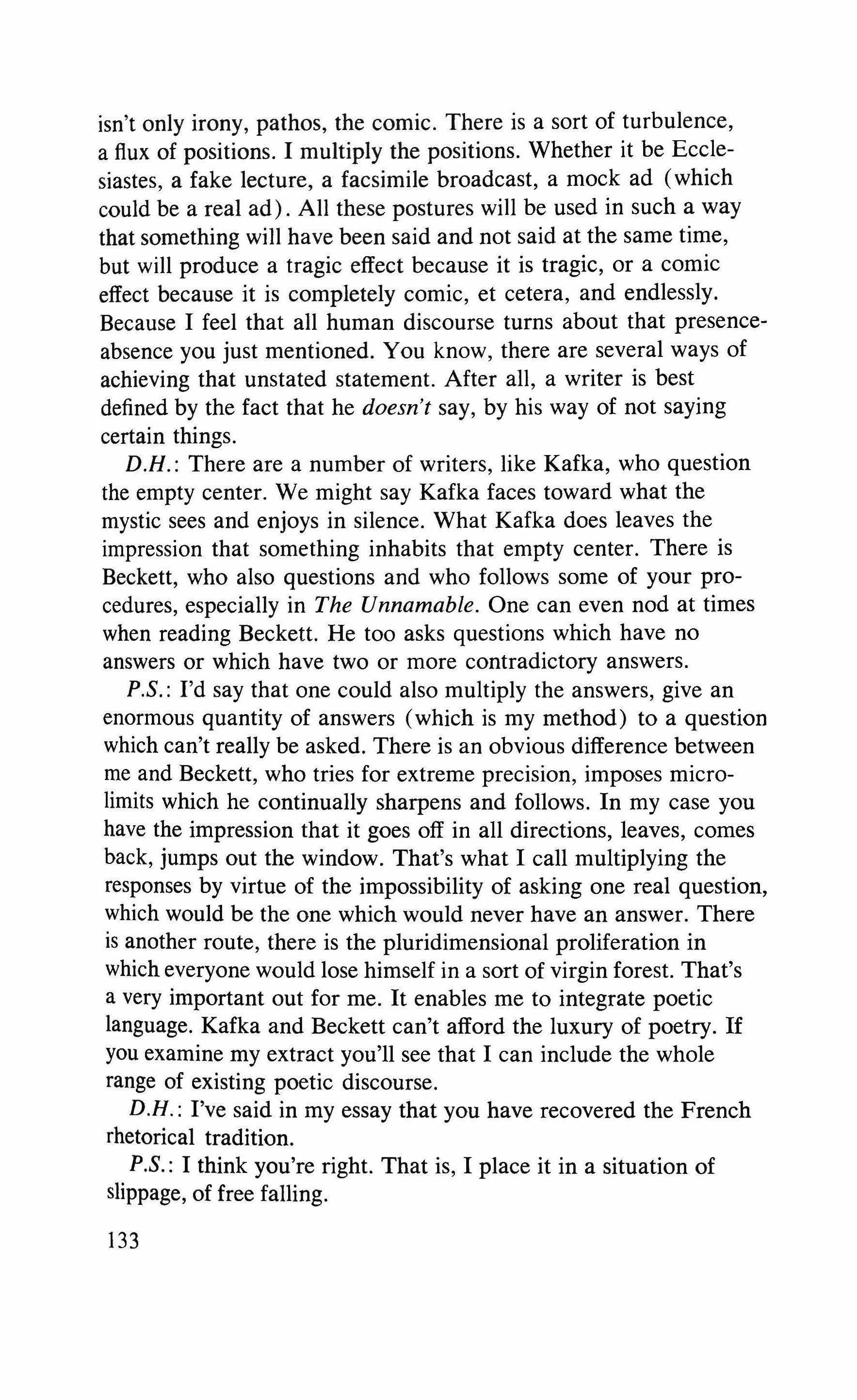
isn't only irony, pathos, the comic. There is a sort of turbulence, a flux of positions. I multiply the positions. Whether it be Ecclesiastes, a fake lecture, a facsimile broadcast, a mock ad (which could be a real ad). All these postures will be used in such a way that something will have been said and not said at the same time, but will produce a tragic effect because it is tragic, or a comic effect because it is completely comic, et cetera, and endlessly. Because I feel that all human discourse turns about that presenceabsence you just mentioned. You know, there are several ways of achieving that unstated statement. After all, a writer is best defined by the fact that he doesn't say, by his way of not saying certain things.
D.H.: There are a number of writers, like Kafka, who question the empty center. We might say Kafka faces toward what the mystic sees and enjoys in silence. What Kafka does leaves the impression that something inhabits that empty center. There is Beckett, who also questions and who follows some of your procedures, especially in The Unnamable. One can even nod at times when reading Beckett. He too asks questions which have no answers or which have two or more contradictory answers.
P.S.: I'd say that one could also multiply the answers, give an enormous quantity of answers (which is my method) to a question which can't really be asked. There is an obvious difference between me and Beckett, who tries for extreme precision, imposes microlimits which he continually sharpens and follows. In my case you have the impression that it goes off in all directions, leaves, comes back, jumps out the window. That's what I call multiplying the responses by virtue of the impossibility of asking one real question, which would be the one which would never have an answer. There is another route, there is the pluridimensional proliferation in which everyone would lose himself in a sort of virgin forest. That's a very important out for me. It enables me to integrate poetic language. Kafka and Beckett can't afford the luxury of poetry. If you examine my extract you'll see that I can include the whole range of existing poetic discourse.
DB.: I've said in my essay that you have recovered the French rhetorical tradition.
P.S.: I think you're right. That is, I place it in a situation of slippage, of free falling.
133
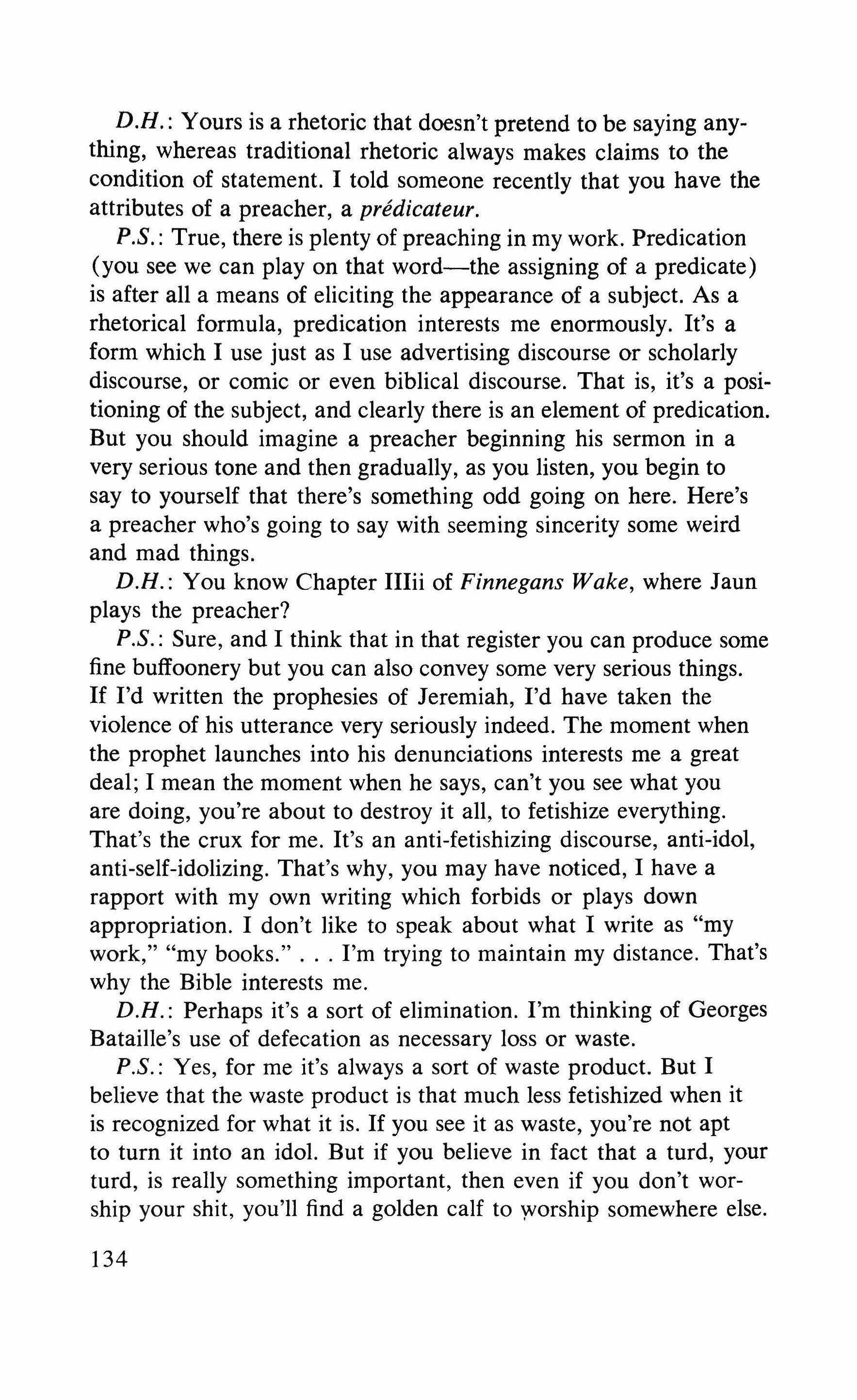
D.H.: Yours is a rhetoric that doesn't pretend to be saying anything, whereas traditional rhetoric always makes claims to the condition of statement. I told someone recently that you have the attributes of a preacher, a predicateur.
P.S.: True, there is plenty of preaching in my work. Predication (you see we can play on that word-the assigning of a predicate) is after all a means of eliciting the appearance of a subject. As a rhetorical formula, predication interests me enormously. It's a form which I use just as I use advertising discourse or scholarly discourse, or comic or even biblical discourse. That is, it's a positioning of the subject, and clearly there is an element of predication. But you should imagine a preacher beginning his sermon in a very serious tone and then gradually, as you listen, you begin to say to yourself that there's something odd going on here. Here's a preacher who's going to say with seeming sincerity some weird and mad things.
D.H.: You know Chapter IIIii of Finnegans Wake, where Jaun plays the preacher?
P.S.: Sure, and I think that in that register you can produce some fine buffoonery but you can also convey some very serious things. If I'd written the prophesies of Jeremiah, I'd have taken the violence of his utterance very seriously indeed. The moment when the prophet launches into his denunciations interests me a great deal; I mean the moment when he says, can't you see what you are doing, you're about to destroy it all, to fetishize everything. That's the crux for me. It's an anti-fetishizing discourse, anti-idol, anti-self-idolizing. That's why, you may have noticed, I have a rapport with my own writing which forbids or plays down appropriation. I don't like to speak about what I write as "my work," "my books." I'm trying to maintain my distance. That's why the Bible interests me.
D.H.: Perhaps it's a sort of elimination. I'm thinking of Georges Bataille's use of defecation as necessary loss or waste.
P.S.: Yes, for me it's always a sort of waste product. But I believe that the waste product is that much less fetishized when it is recognized for what it is. If you see it as waste, you're not apt to turn it into an idol. But if you believe in fact that a turd, your turd, is really something important, then even if you don't worship your shit, you'll find a golden calf to worship somewhere else.
134
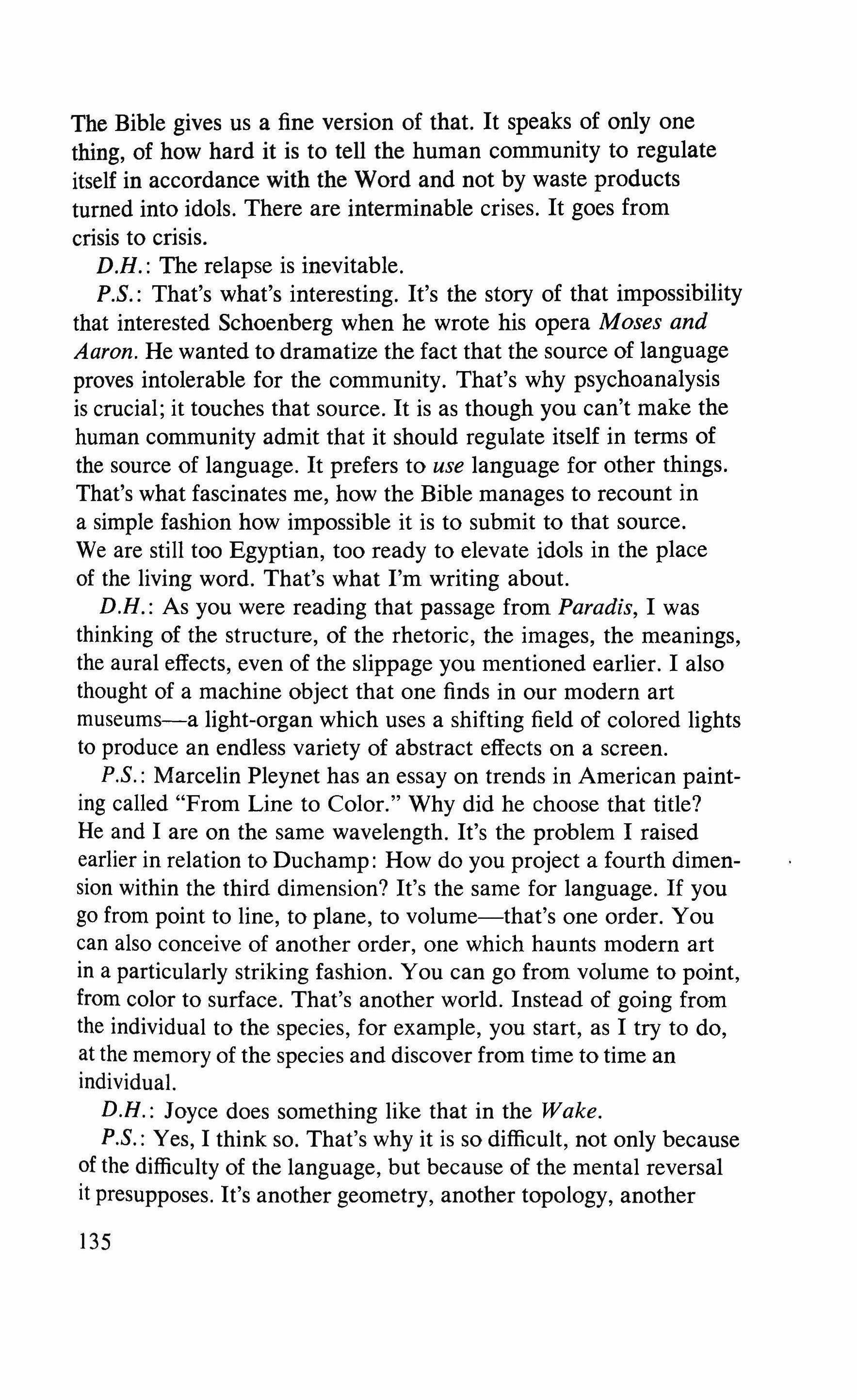
The Bible gives us a fine version of that. It speaks of only one thing, of how hard it is to tell the human community to regulate itself in accordance with the Word and not by waste products turned into idols. There are interminable crises. It goes from crisis to crisis.
D.H.: The relapse is inevitable.
P.S.: That's what's interesting. It's the story of that impossibility that interested Schoenberg when he wrote his opera Moses and Aaron. He wanted to dramatize the fact that the source of language proves intolerable for the community. That's why psychoanalysis is crucial; it touches that source. It is as though you can't make the human community admit that it should regulate itself in terms of the source of language. It prefers to use language for other things. That's what fascinates me, how the Bible manages to recount in a simple fashion how impossible it is to submit to that source. We are still too Egyptian, too ready to elevate idols in the place of the living word. That's what I'm writing about.
D.H.: As you were reading that passage from Paradis, I was thinking of the structure, of the rhetoric, the images, the meanings, the aural effects, even of the slippage you mentioned earlier. I also thought of a machine object that one finds in our modern art museums-a light-organ which uses a shifting field of colored lights to produce an endless variety of abstract effects on a screen.
P.S.: Marcelin Pleynet has an essay on trends in American painting called "From Line to Color." Why did he choose that title? He and I are on the same wavelength. It's the problem I raised earlier in relation to Duchamp: How do you project a fourth dimension within the third dimension? It's the same for language. If you go from point to line, to plane, to volume-that's one order. You can also conceive of another order, one which haunts modern art in a particularly striking fashion. You can go from volume to point, from color to surface. That's another world. Instead of going from the individual to the species, for example, you start, as I try to do, at the memory of the species and discover from time to time an individual.
D.H.: Joyce does something like that in the Wake.
P.S.: Yes, I think so. That's why it is so difficult, not only because of the difficulty of the language, but because of the mental reversal it presupposes. It's another geometry, another topology, another
135
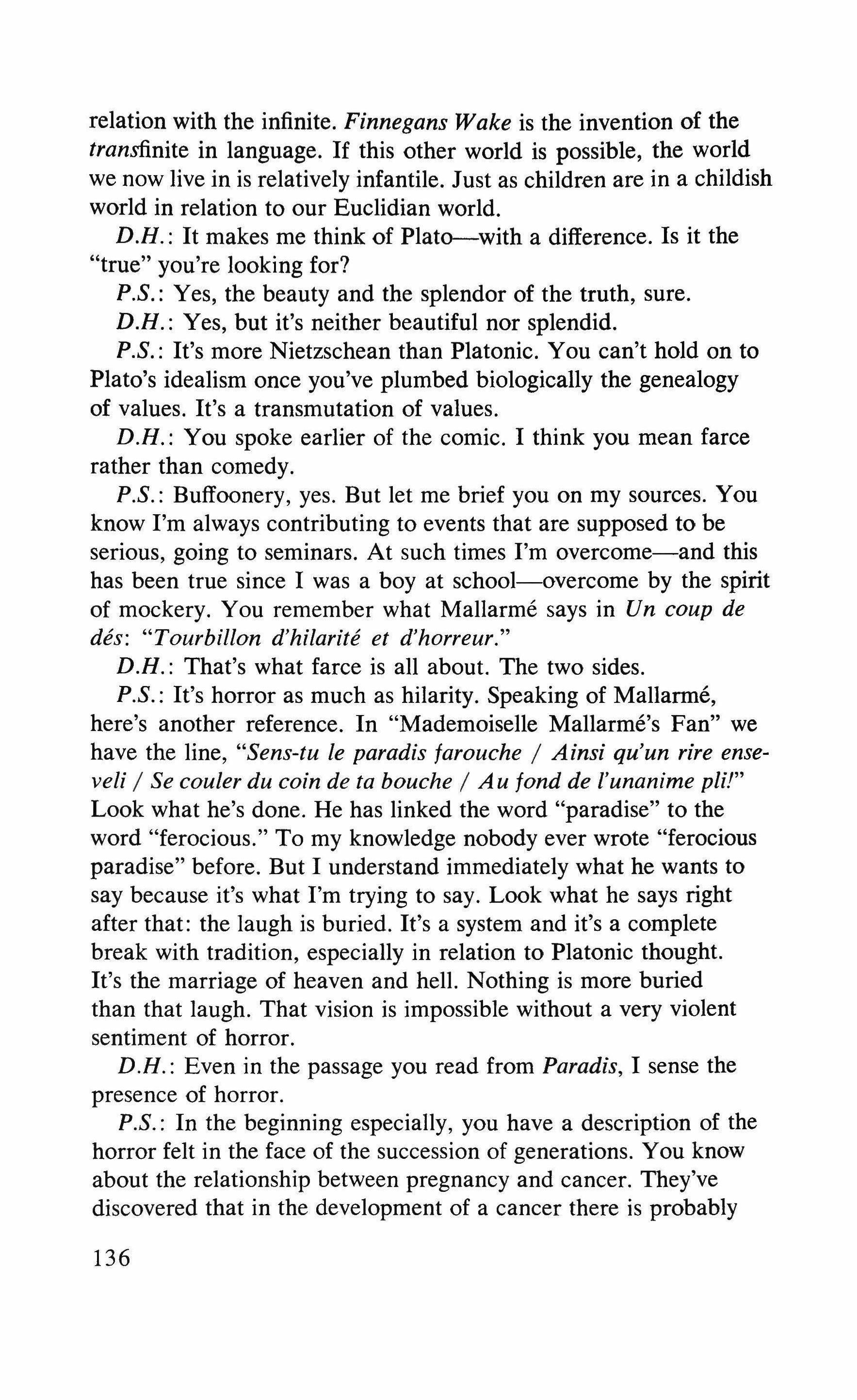
relation with the infinite. Finnegans Wake is the invention of the transfinite in language. If this other world is possible, the world we now live in is relatively infantile. Just as children are in a childish world in relation to our Euclidian world.
D.H.: It makes me think of Plato--with a difference. Is it the "true" you're looking for?
P.S.: Yes, the beauty and the splendor of the truth, sure.
D.H. : Yes, but it's neither beautiful nor splendid.
P.S.: It's more Nietzschean than Platonic. You can't hold on to Plato's idealism once you've plumbed biologically the genealogy of values. It's a transmutation of values.
D.H.: You spoke earlier of the comic. I think you mean farce rather than comedy.
P.S.: Buffoonery, yes. But let me brief you on my sources. You know I'm always contributing to events that are supposed to be serious, going to seminars. At such times I'm overcome-and this has been true since I was a boy at school-overcome by the spirit of mockery. You remember what Mallarme says in Un coup de des: "Tourbillon d'hilarite et d'horreur."
D.H.: That's what farce is all about. The two sides.
P.S.: It's horror as much as hilarity. Speaking of Mallarme, here's another reference. In "Mademoiselle Mallarme's Fan" we have the line, "Sens-tu le paradis farouche / Ainsi qu'un rire enseveli / Se couler du coin de ta bouche / Au fond de l'unanime pli!' Look what he's done. He has linked the word "paradise" to the word "ferocious." To my knowledge nobody ever wrote "ferocious paradise" before. But I understand immediately what he wants to say because it's what I'm trying to say. Look what he says right after that: the laugh is buried. It's a system and it's a complete break with tradition, especially in relation to Platonic thought. It's the marriage of heaven and hell. Nothing is more buried than that laugh. That vision is impossible without a very violent sentiment of horror.
D.H.: Even in the passage you read from Paradis, I sense the presence of horror.
P.S.: In the beginning especially, you have a description of the horror felt in the face of the succession of generations. You know about the relationship between pregnancy and cancer. They've discovered that in the development of a cancer there is probably
136
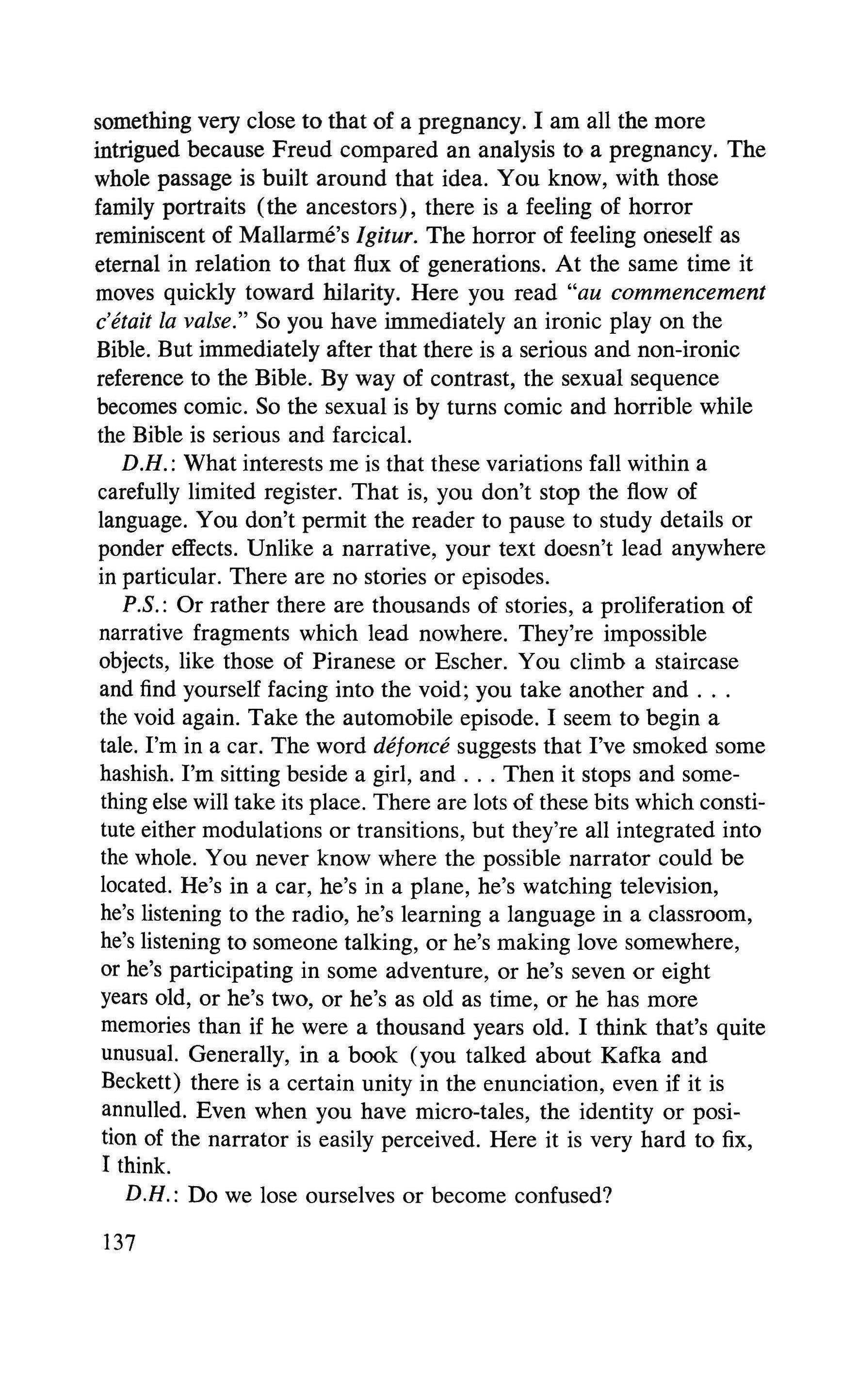
something very close to that of a pregnancy. I am all the more intrigued because Freud compared an analysis to a pregnancy. The whole passage is built around that idea. You know, with those family portraits (the ancestors), there is a feeling of horror reminiscent of Mallarme's lgitur. The horror of feeling oneself as eternal in relation to that flux of generations. At the same time it moves quickly toward hilarity. Here you read "au commencement c'etait la valse." So you have immediately an ironic play on the Bible. But immediately after that there is a serious and non-ironic reference to the Bible. By way of contrast, the sexual sequence becomes comic. So the sexual is by turns comic and horrible while the Bible is serious and farcical.
D.H.: What interests me is that these variations fall within a carefully limited register. That is, you don't stop the flow of language. You don't permit the reader to pause to study details or ponder effects. Unlike a narrative, your text doesn't lead anywhere in particular. There are no stories or episodes.
P.S.: Or rather there are thousands of stories, a proliferation of narrative fragments which lead nowhere. They're impossible objects, like those of Piranese or Escher. You climb a staircase and find yourself facing into the void; you take another and the void again. Take the automobile episode. I seem to begin a tale. I'm in a car. The word deionce suggests that I've smoked some hashish. I'm sitting beside a girl, and Then it stops and something else will take its place. There are lots of these bits which constitute either modulations or transitions, but they're all integrated into the whole. You never know where the possible narrator could be located. He's in a car, he's in a plane, he's watching television, he's listening to the radio, he's learning a language in a classroom, he's listening to someone talking, or he's making love somewhere, or he's participating in some adventure, or he's seven or eight years old, or he's two, or he's as old as time, or he has more memories than if he were a thousand years old. I think that's quite unusual. Generally, in a book (you talked about Kafka and Beckett) there is a certain unity in the enunciation, even if it is annulled. Even when you have micro-tales, the identity or position of the narrator is easily perceived. Here it is very hard to fix, I think.
D.H.: Do we lose ourselves or become confused?
137
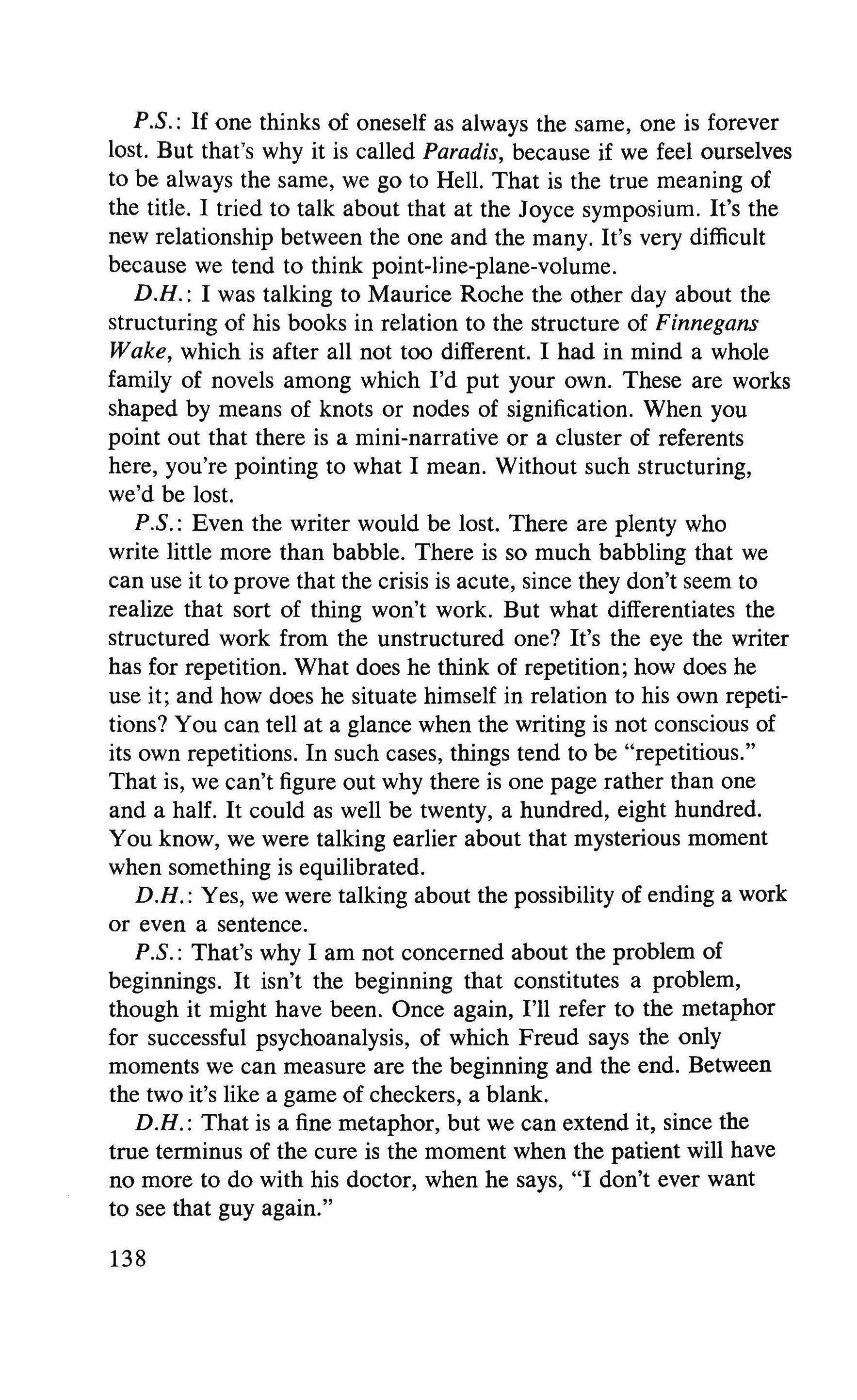
P.S.: If one thinks of oneself as always the same, one is forever lost. But that's why it is called Paradis, because if we feel ourselves to be always the same, we go to Hell. That is the true meaning of the title. I tried to talk about that at the Joyce symposium. It's the new relationship between the one and the many. It's very difficult because we tend to think point-line-plane-volume.
D.H.: I was talking to Maurice Roche the other day about the structuring of his books in relation to the structure of Finnegans Wake, which is after all not too different. I had in mind a whole family of novels among which I'd put your own. These are works shaped by means of knots or nodes of signification. When you point out that there is a mini-narrative or a cluster of referents here, you're pointing to what I mean. Without such structuring, we'd be lost.
P.S.: Even the writer would be lost. There are plenty who write little more than babble. There is so much babbling that we can use it to prove that the crisis is acute, since they don't seem to realize that sort of thing won't work. But what differentiates the structured work from the unstructured one? It's the eye the writer has for repetition. What does he think of repetition; how does he use it; and how does he situate himself in relation to his own repetitions? You can tell at a glance when the writing is not conscious of its own repetitions. In such cases, things tend to be "repetitious." That is, we can't figure out why there is one page rather than one and a half. It could as well be twenty, a hundred, eight hundred. You know, we were talking earlier about that mysterious moment when something is equilibrated.
D.H.: Yes, we were talking about the possibility of ending a work or even a sentence.
P.S.: That's why I am not concerned about the problem of beginnings. It isn't the beginning that constitutes a problem, though it might have been. Once again, I'll refer to the metaphor for successful psychoanalysis, of which Freud says the only moments we can measure are the beginning and the end. Between the two it's like a game of checkers, a blank.
D.H.: That is a fine metaphor, but we can extend it, since the true terminus of the cure is the moment when the patient will have no more to do with his doctor, when he says, "I don't ever want to see that guy again."
138
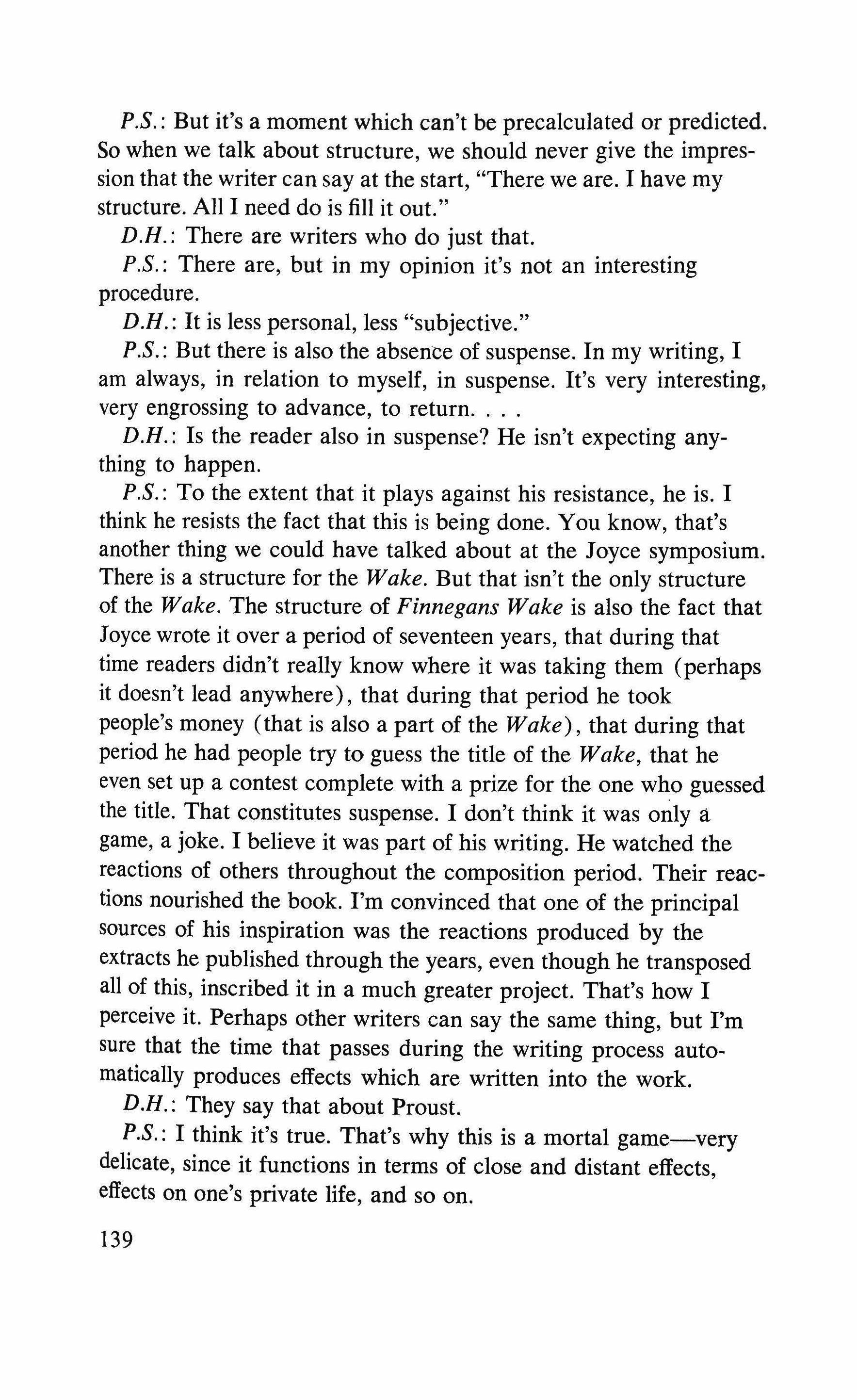
P.S.: But it's a moment which can't be precalculated or predicted. So when we talk about structure, we should never give the impression that the writer can say at the start, "There we are. I have my structure. All I need do is fill it out."
D.H.: There are writers who do just that.
P.S.: There are, but in my opinion it's not an interesting procedure.
D.H.: It is less personal, less "subjective."
P.S.: But there is also the absence of suspense. In my writing, I am always, in relation to myself, in suspense. It's very interesting, very engrossing to advance, to return.
D.H.: Is the reader also in suspense? He isn't expecting anything to happen.
P.S.: To the extent that it plays against his resistance, he is. I think he resists the fact that this is being done. You know, that's another thing we could have talked about at the Joyce symposium. There is a structure for the Wake. But that isn't the only structure of the Wake. The structure of Finnegans Wake is also the fact that Joyce wrote it over a period of seventeen years, that during that time readers didn't really know where it was taking them (perhaps it doesn't lead anywhere), that during that period he took people's money (that is also a part of the Wake), that during that period he had people try to guess the title of the Wake, that he even set up a contest complete with a prize for the one who guessed the title. That constitutes suspense. I don't think it was only a game, a joke. I believe it was part of his writing. He watched the reactions of others throughout the composition period. Their reactions nourished the book. I'm convinced that one of the principal sources of his inspiration was the reactions produced by the extracts he published through the years, even though he transposed all of this, inscribed it in a much greater project. That's how I perceive it. Perhaps other writers can say the same thing, but I'm sure that the time that passes during the writing process automatically produces effects which are written into the work.
D.H.: They say that about Proust.
P.S.: I think it's true. That's why this is a mortal game-very delicate, since it functions in terms of close and distant effects, effects on one's private life, and so on.
139

D.H.: I can name a number of writers who have written lifebooks, such as Beckett, Proust, Goethe (Faust), Joyce, Mallarme (Un coup de des). For each of them the work and the life constitute a whole.
P.S.: That's an important point because it's what the babblers tend to forget. They think that we can separate our lives from what we write. I think we must recall with extreme rigor that everything costs. You can't write anything of value if it doesn't find an extremely precise echo, either painful, boring, terrifying, or very pleasant, of something that occurs in the real world. But that is the hardest thing to do. And here is the fundamental game. Anyone who writes without recording the very shape of his real being, whether he makes it explicit or not, doesn't matter. He can be very discreet about his private life. I'm not talking about that.
D.H.: There is another aspect of the life-books we were talking about. Those books preoccupied their writers for extremely long periods of time. Flaubert, too, with Bouvard et Pecuchet, These are writers who lose themselves, bury themselves in their works, which somehow parallel their whole lives. I think that you may be doing something analogous but much more strung out, less intense.
P.S.: I've been at it now for ten years. Little by little it will become clear that that is what I am doing. Little by little the outlines of the project will become evident, and you'll see that there is a retroactive component too, or rewriting. But that will take time, and it constitutes an element of suspense, as I was saying.
D.H.: I was going to ask you where you are going from here. But now you tell me that you don't know.
P.S.: No, I can't know. After all, if I knew, I wouldn't go there. I'm going because I don't know where I'll end up. That's what Mallarme has to say in Igitur. He can advance because he moves within the mystery. Let's say it in a more modern way, since it isn't a question of mystery: you can only advance if you don't know where you're going. To advance means really to take another step, write ten lines more, ten lines more, and then ten lines more. That's what it means to advance in terms of writing. To write is truly not to know where one is going. On the other hand, perhaps that is the only way to advance in any real way, if we are
140
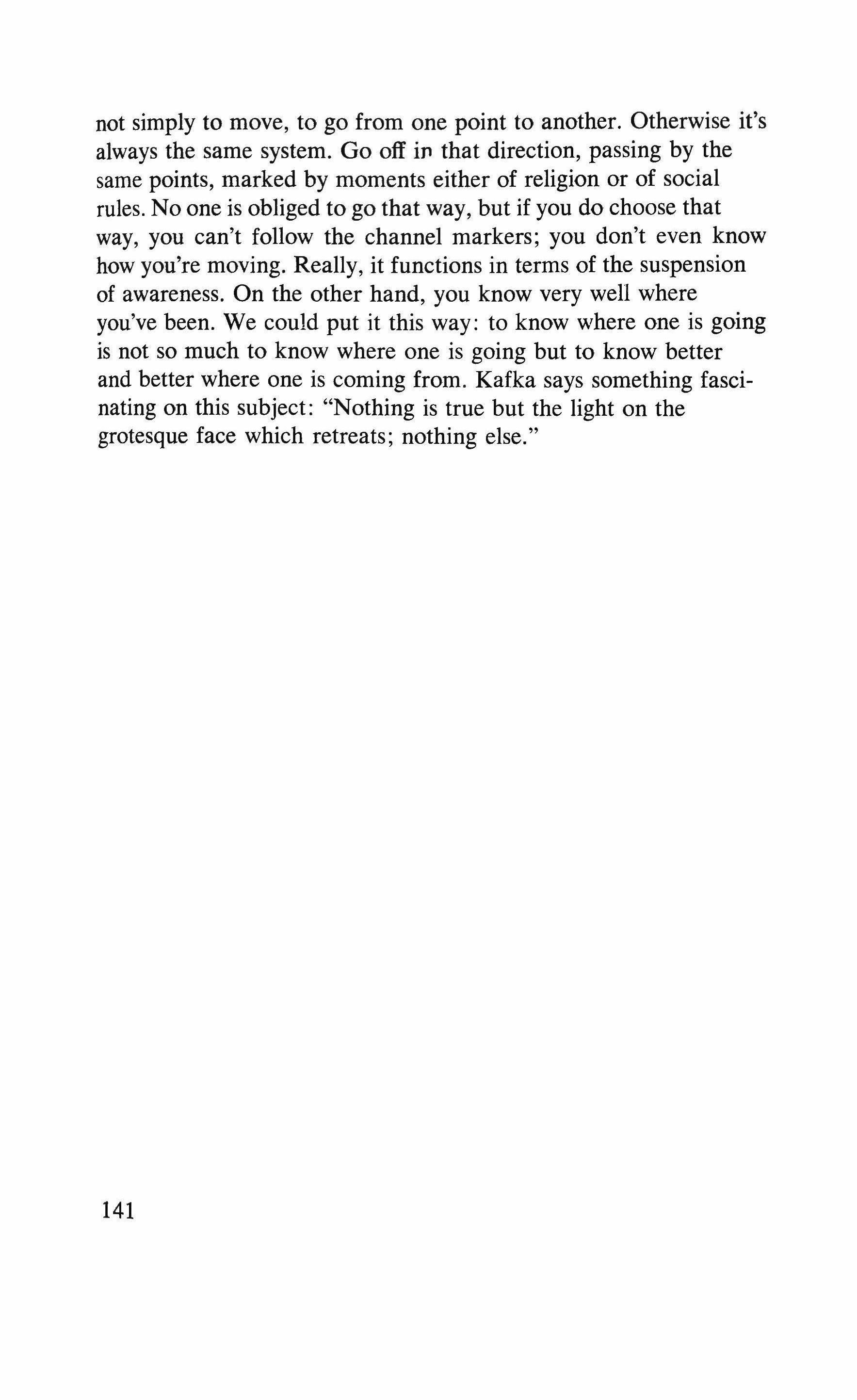
not simply to move, to go from one point to another. Otherwise it's always the same system. Go off in that direction, passing by the same points, marked by moments either of religion or of social rules. No one is obliged to go that way, but if you do choose that way, you can't follow the channel markers; you don't even know how you're moving. Really, it functions in terms of the suspension of awareness. On the other hand, you know very well where you've been. We could put it this way: to know where one is going is not so much to know where one is going but to know better and better where one is coming from. Kafka says something fascinating on this subject: "Nothing is true but the light on the grotesque face which retreats; nothing else."
141
Arno Schmidt: from Zettels
musigue' says MARMONTAL in those 'Contes moraux' in all our translations we have insisted upon calling Moral Tales
with the,immediately preceding 'locus', you get'Chamber=Music': which splaysr;llby�1;self; everything-Other requires the presence of ge:tll.erates. "I :" 'Cunts morose''', (P, agreeing;and)I" from the motto you also get 'sine' sinuous bosom; and 'genio=genere=generate': no WC without gender:" I"What is 'the muggery of their spir'tr?,y thdt's how you pronounce it-" (F,.his face bdttled')I ootulI!III'sd to me: 'mug=smug Maggies muggy'. '(Even better,probably I" 'to mug= pout=pull a face'; �above all 'to drizzle', light rainwhower, from the 'spirt'.1-): Ex=orbi=tant (W./(Might as well say x+l=orbitant).!Looked around (Fr fortunately 'out of sight'l(that is she streaking" in the tool ups,beside=W).) took my ALL=off)I b"eople they think,too about this vag�table\ eat •• - lemme read a few sentences And he footnotes it originally 'Moeurs' &
�OYCE ! Yes. Ex: 'Contes meanwhile 'Cock=neigh' ,(while 'Kuck='no'), ts of faeces' (I iv,)06: To braicall�I-Mr.M ble,but ,r.c. l)=ecrable!')
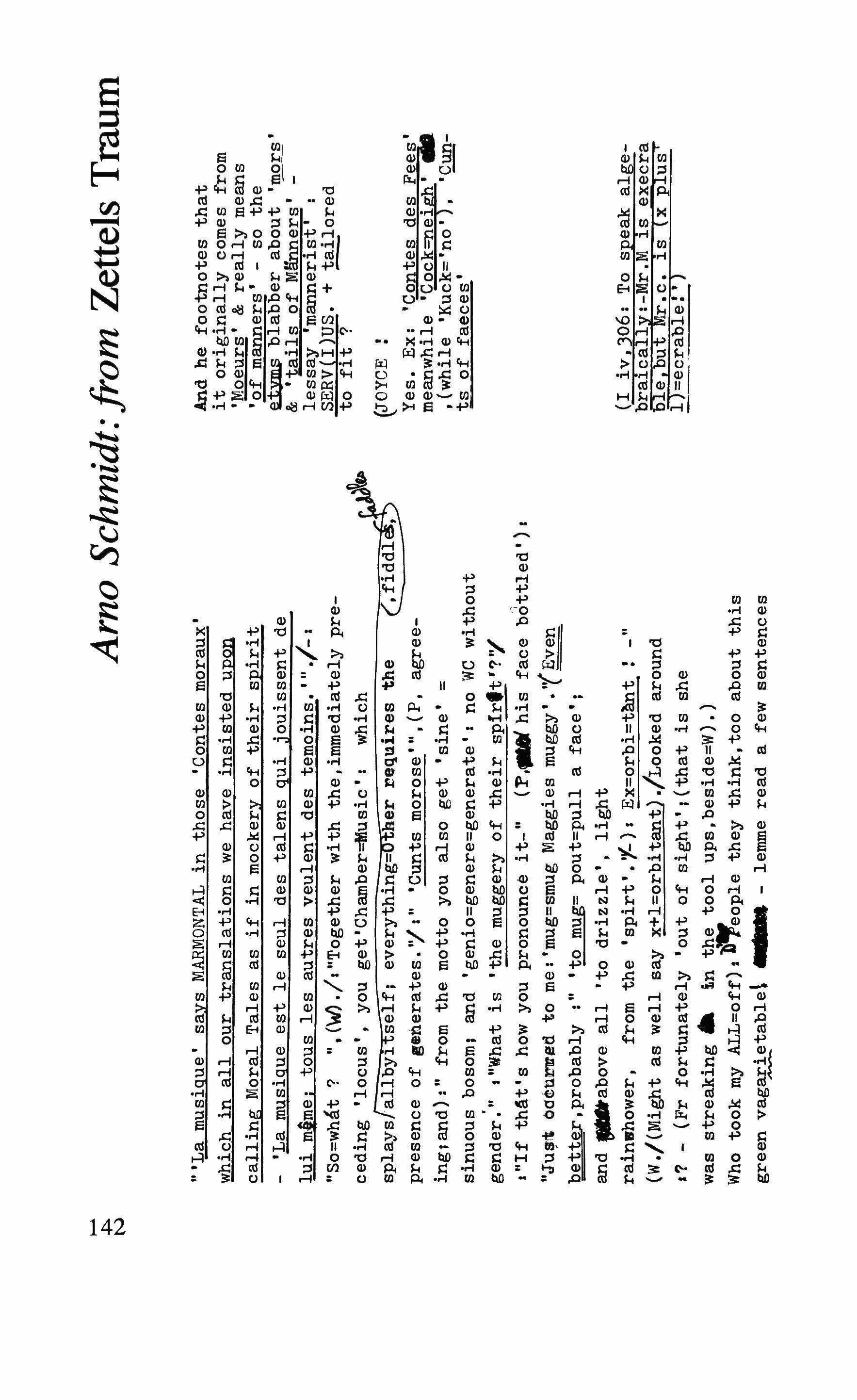
est Ie seul des talens qui jouissent
mime i tous les autres veulent des temoins.'" ./- I
blabber
MHnners' lessay
SERV(I)US. +
�
as if in mockery of their spirit musigue
de
"So=what? ",(W)./I"Together
really 'of manners' �
& 'tails of
'mannerist'
to fit?
jusaminute, 's going too far ���'The higher orof music is the most throughly estimated,when are exclusively alone.' - .what does the S=lang say?"/ P, unpractised, hesitated -)/." If you alwws keep in the femoral moral of fairies. isso «(
ordure. simple. 'order' becom�s 'ordure':'ordu;:=music'. 'from the
'Through '-i-s-,-' furrow.' I-n--'-e-stimated' you find
'mate'. - Go on. "/ ihe looked at me disgust�ly :
-(aha. Fr was in the hasslenut bush.1 I nodded approvinul,7.\,':)-
read (louder to be sure, than she wished). "But there is
pleasure still within the reach of .fallen mor-
I
':7". I" 'amort' _'swhatthe13erl�ner
calls a 'strumpet' "�said PI so
fallen mort' is what she is. I To continue.)./
mean the happiness, experienced in the contem-
.J..o plation of natural scenery�' ".. (In 'contemplashion' "UU.1!:.1 'cunt' & 'temple"" both=i�e. In 'scenery 'see' 6..,p..J.. beginning of 'scent'. And 'nature' is,according to P&{""/ilo_1:&_�+1 c.
(= the glory' �: ( :"
Glory=glory=halleruuja
glOry=�lOrt=h.alleluu{a: ,lso t at he b�rds � bevor the insipid
tridge ,.pI cunt'. - To continue •• ). I "You'll git anmlJUppance for sure: -" (W, threateningly calm) I" ,in truth, man, who would behold aright the glory of GOD (f:> � ,..u....,.) earth,must in solitude behold that glory', :?" (Since we were going to "get it" for sure, the answer was simple) I 'truth=trous�. The � (:) ,who to see the '�'?: 'glory'=glory=hole: Yes, 'Glory of �' :. He'll have to have a look=at it his quiet little badr-oom.." (SolttlAde: so 'lit' '�tude' there's more.)/�he opene�� mollifiable mouth and read):
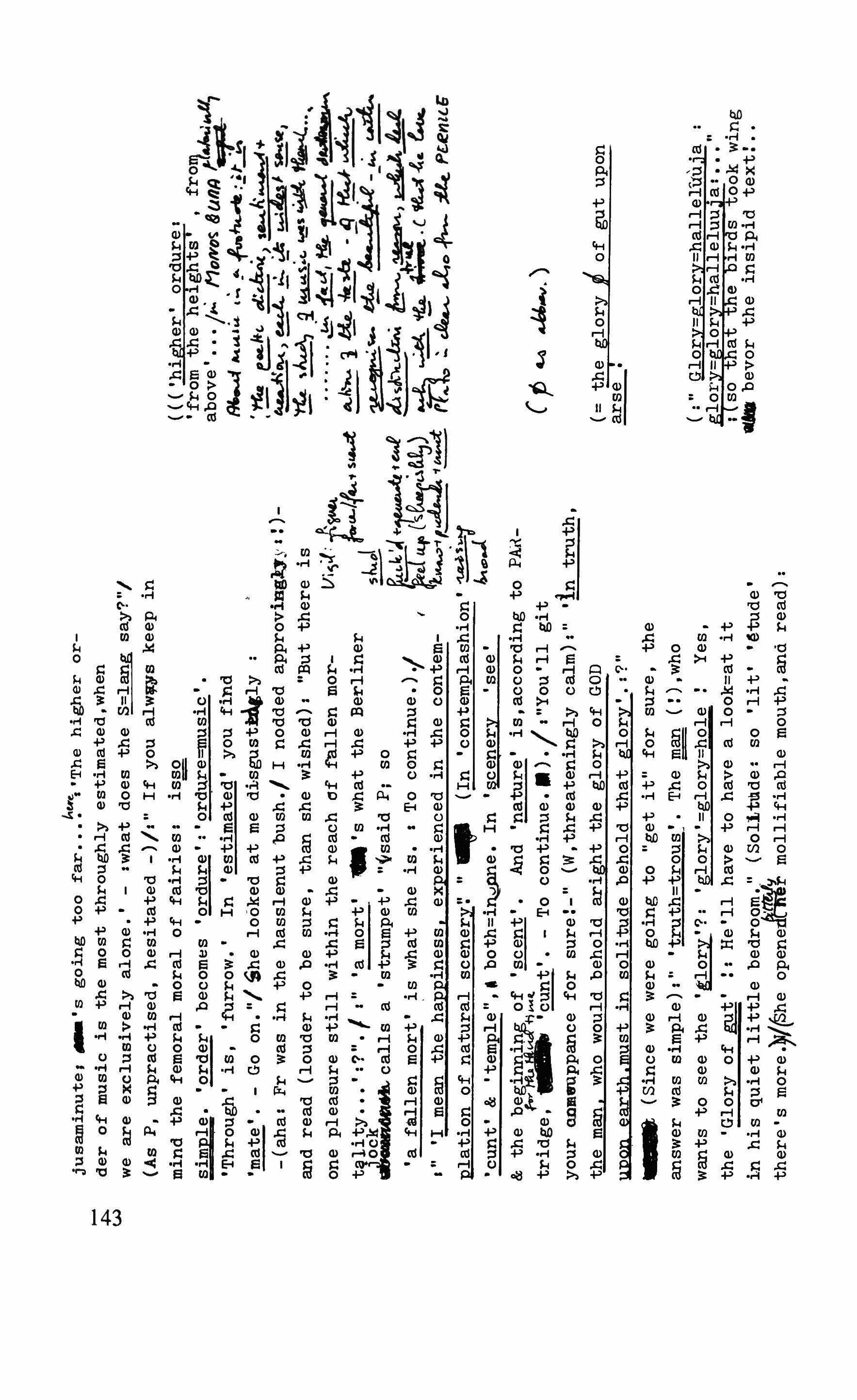
a!ov�' ;,.. Mf)��"L&�nR.,.� � 14.w.. !'-
:� e If" _,;C._.�_
�"""')�:::.�
't!c. \� ��
t� .b 1 ..J,
/,'1. - j A..1.. 1 � -I.."&' �lt
1 ·$sl...J � .t:t-
fe-J tb. J.....,_J.r".;,. j;....
(��f4J) ....:.bI.. � .t.�
1� � .:. &e::..
I
'higher'
h�ightsi
lIi");(:
� k,',(t-
L��,_
love to regard the proud watchful mountains, that. down upon ".�ut the colossal members of one vast animate & sentient �ole', - That you will interpret 'watchfu1 mountains. that look down" as '�' not surprise me in the least,"(Ok W; 'But: they dark valleys and the
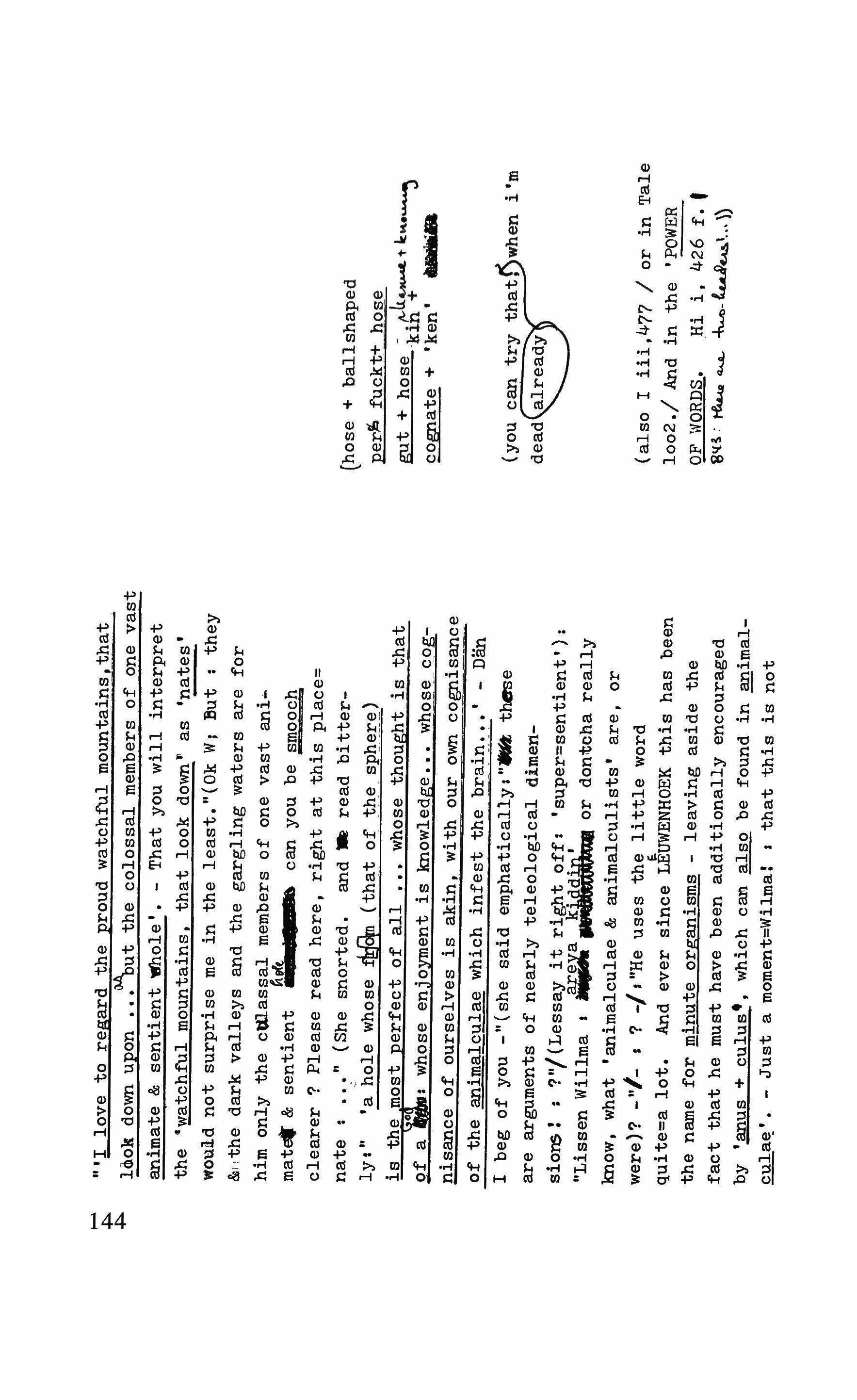
: ••. '" (She snorted, and a read bi tter'a hole whose 4@n (that of the SP:tl�r:�) (hose + ball shaped per� fuckt+ hose gut + hose - ,,,,k�1-Ir:.,,,.""'_"-""-"-�=:;..·kUl + cognate + 'ken' � nisance of ourselves is akin, with our own cognisance the anima1cu1ae which infest the brain ' - Dan of you -"(she said emphatically:". these arguments of nearly teleological dimensions: : ?"/ (Lessay it right off: 'super=sentient'): JlliiPl � "Lissen Willma � or dontcha really what 'anima1cu1ae & animalcu1ists' are, or were)? -"/- , 7 -/,"He uses the little word quite=a lot. And ever since �UWENHOEK this has been name for minute organisms - leaving aside the that he must have been additionally encouraged 'anus + culus •• which c� also be found in �imalcula�'. - Just a moment=Wilma: : that this is not (you _� r dead (also I iii.477 / 1002./ And in the OF WORDS. Hi i, IN!.: te.a.... ""-A.. 4u",_ ��
the cUlassa1 members of one vast animatet &
�fI(t can you be smooch clearer? Please read here, right at this p1ace=
gargling waters are for only
sentient
just a matter of my libidinous phallacy can be proven � by STANISLAUS JOYCE, who, together with his Big brother. among many other essay=themes. treated this one as well I 'The seaman. who disturbs the world the semen, which disturbs the worJld' :your eyes pop Wilma?: is i t r� if pot?: And us=mamers they really infest � 1ittle bit of brain."; (I took the book away from her again) I "Listen - Here stands 'the _9ant QL_th_� _!'llore ignorant of the priesthood'. 'Th� 9_X9_I_e�_ �� w.I:!i_cl1._J;.}'_l.� �_j;?S move are those, best adapted for the evolution,without collision.of the greatest possible number of bodies'; and their 'surfaces thems�!v_�!l_!lre s9 disposed, as to accomodate a �wer population. ./I"Lemme have a turn -" (pleaded P;"roised his voice;& read with beautiful excent'): 'As we find cycle within cllc1e: I?"/(And" W. with sidelongings)I "Yes, what would that=then be '( .These concentric circles?"
Ii' ;t;,I..Q.. (Cuntcentric was good) I" ends itself in ,....... circl' I continue. '1(And P ,'1' � yet all revolving around one far=distant centre, which is the Godhead: ma we not analo icall life within lif�, the less within the greater, and all within the spirit divine:?'''/I- Pause. (Well? Then ?) - I '1 think it's terrific. It (said W; sarcastically: Whatcha bitchin ....... about already ? It I "May I remind you at the outset I that it is the last paragraph -
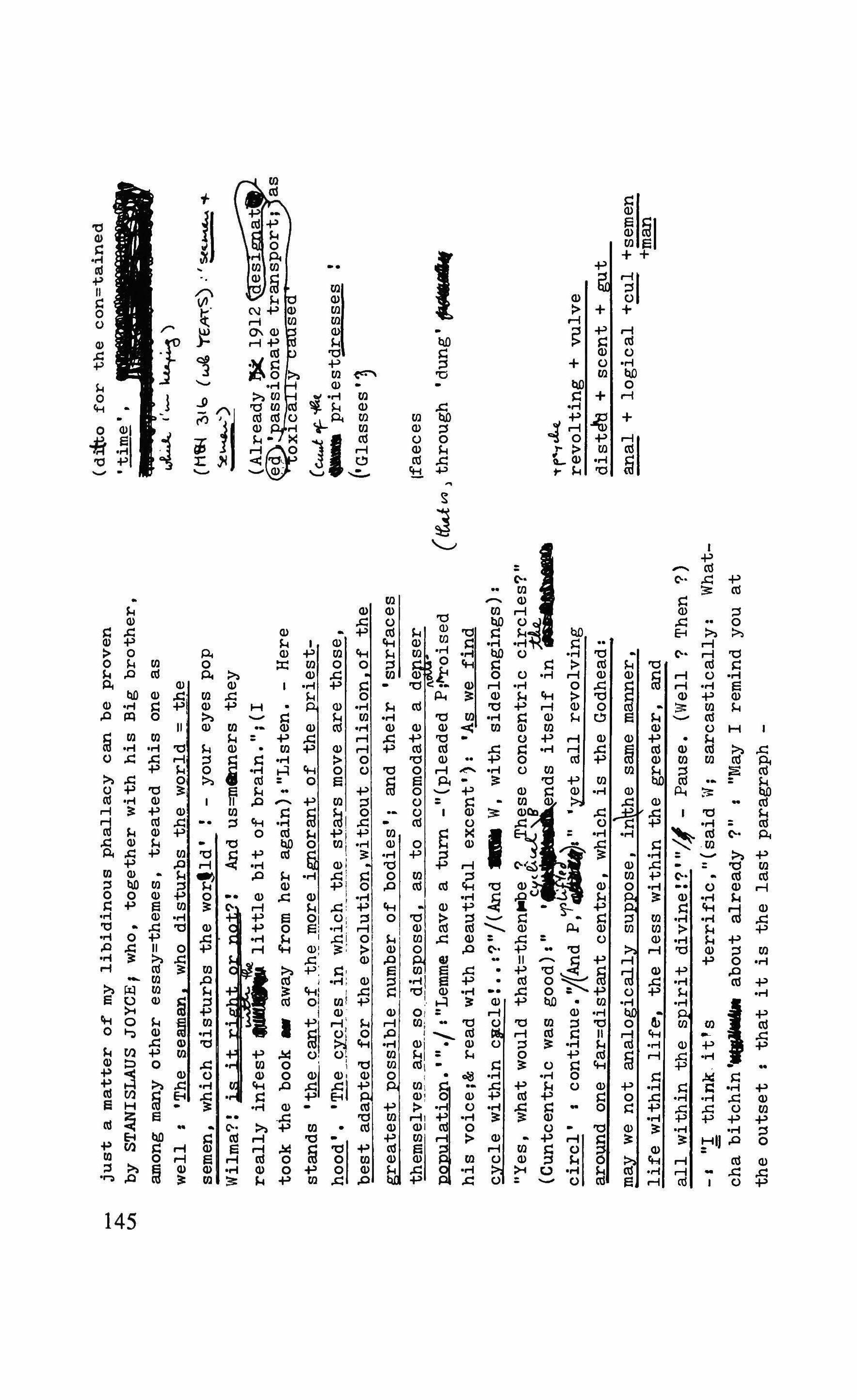
(tr.d
�e.;"<.L
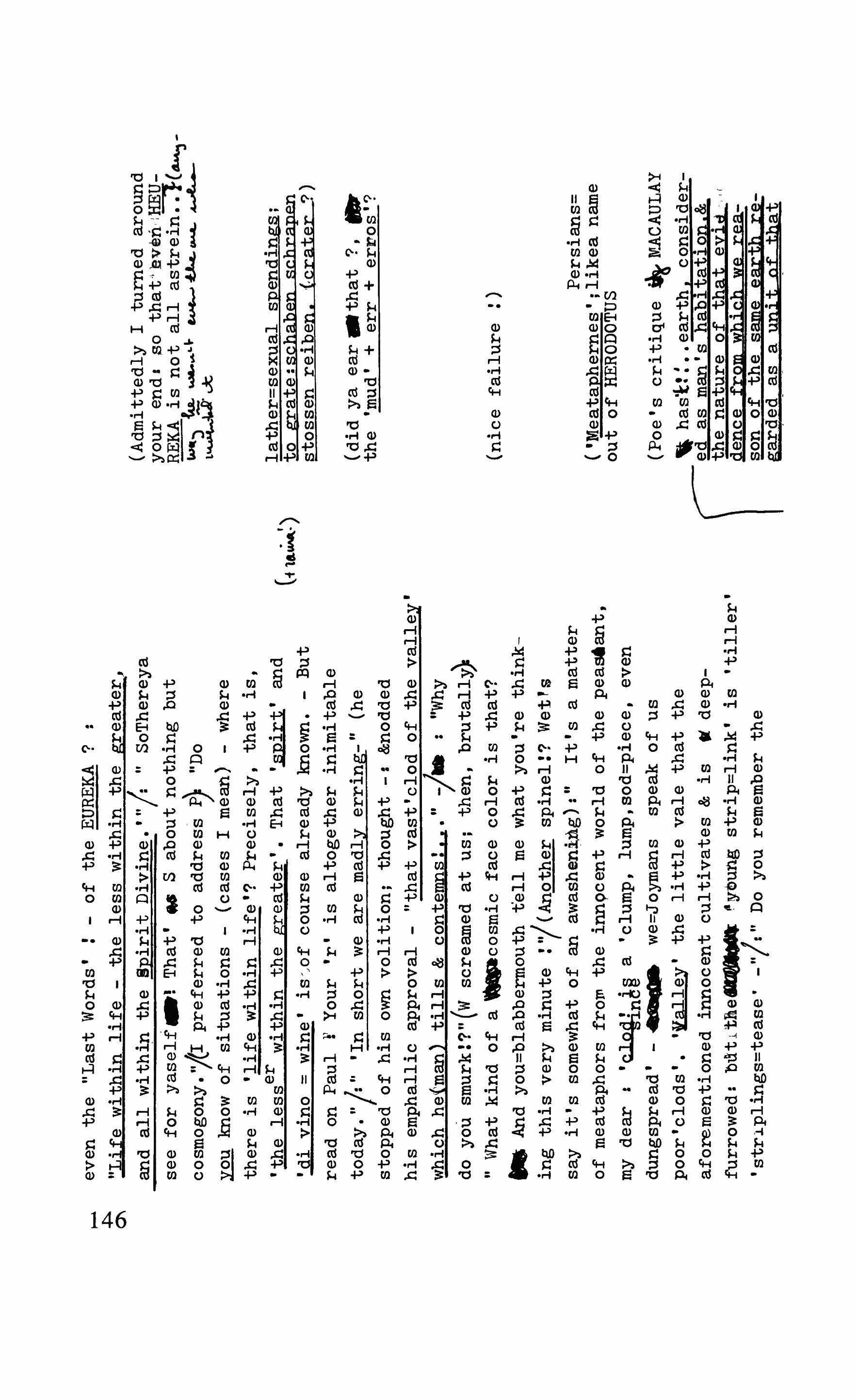
even the "Last Words' : - of the EUREKA? I "Life within life - the less within the greater, and all within the Spirit Divine,'"1= SoThereya see for yasel! _! That' S about nothing but cosmogony, ,ItI preferred to address ? "Do you know of situations - (cases I mean) - where there is 'life within life'? Precisely, that is, 'the lesser within the greater', That '�' and 'di vino = wine' is -,of course already known, - But read on Paul :' Your 'r' is altogether inimitable today, "II" 'In short we are madly erring-" (he stopped of his own volition; thought -I &nodded his emphallic approval - "that vast'clod of the valley' which he('man) tills & contemns:, ;_ I "Why do you smurk!?" (w screamed at us; then, brutally) What kind of a "cosmic face color is that? .. And you=blabbermouth t'ell me what you're thinking this very minute :'I(Another spinel!? Wet's say it's somewhat of an awasheni,ng)I" It's a matter of meataphors fro� the inn9cent world of the peasAant, my dear : '�n�� a 'clump, lump,sod=piece, even dungspread' - • ._. we=Joymans speak of us poor'clods' '�' the little vale that the aforementioned innocent cultivates & is • deepfurrowed: bdtltie� �ytung strip=link' is 'tiller' 'strl-plings=tease' - "II" Do you remember the
.J::>. 0'1
(of 1 .;....:)
'Tiller=Girls' of our youth?" ....., sr. �_� (the troublemaker:. ficherously.Str�hed his arms over his head at the same time; and danced, empressively. along a stretoh of the sandy path:� watched him with unambiguous=definable(facial
pression.)/(came back; & 'remarked neadlessly), 'n Englishman would have to think of arse-(s)lips 'till' and 'tool'? Doubtlessly. Ana
- (or, since Wilma can't stand to the name anymore, I'll change it) -
only '!i!f=female pjudenda'.
lyhedgefUll of ETYMS
do you have an �nink why � Po �,& willing=lie=I, joined the earth=sbig' arse=tillery? - Then hear this remark=now: 'Speaking of the tides, POMPONIUS MEl,A,in his treaDE SITU ORBIS says, either the world is a great animal, or etc,' -"; (and insidiously spreads out his I so=th�re :)./- "I'm not coming" i'rGlotcoming:" cried excitedly; and stepped ahead, so that her fo(m)po(m) wig�led/("and to think is§!> simple :), "Speaking of the'tights' I those are ladies'slipperings. 'Popo=Mela' is "Blackass', - Paul? I how,according to your Oxford=��perience, shou]rl the title of his book be pronounced?f ".J (He snorted; (answered W' s punishing "Mebbe if I could might git a new hankerchief vast whole,the universe. In the former case,the
TELLUS in any case is Und thele Piez livt( MELA iii, 1 I Negue hue satis eogoitum est helitune suo �d mundus eff�c�at,retractamJue sviritu regerat un am d�que,s� (ut doct�or�bus placet) unum an�maI �+ c.........��v......e- .e... + Unc v : - d kim.
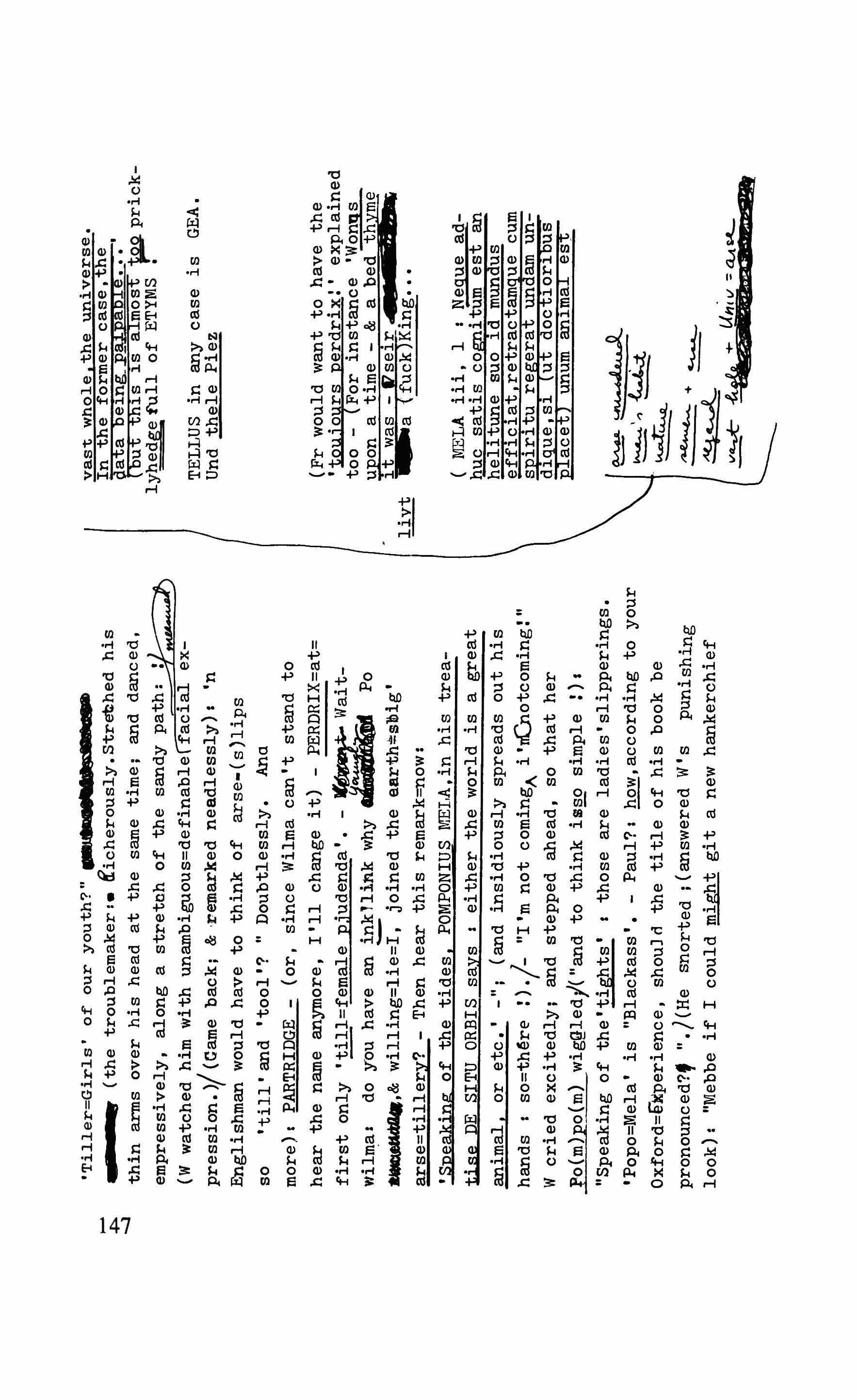
-�Wait-
mos
ex
PARTRIDGE
PERDRIX=at=
�ata �e�ng_��i¥abI�buth�S �S a
� 00 someday? : -";(smacKed; �elivered the decLsfon s De sight o'Orbs";I(Thank=you :) : "A treatise, therefore,on the 'surveying of balls' (of the human=kind'. �But we must not dis-
sputum; 'LISTEN HERE,)I: These fancies.& such as these� have always given to my meditations among the mountains & the forests, by the river.s & the ocean, a tinge of what the every:sd§ly,-;world .•would not fail to term the fantastic. My wanderings amid such seenes have been mant & far=searching & often sOlitary; and the inter=est with which I have strayed through many a dim=deep yalley. or iazed the reflected heaven of many a bright lake. ha§ heep an interest greatlYl�eepened by the thought, that I have stayed & gazed alone.' 1 'La solitude est une belle
as
- And you are scoffers &. good-for-nothing men :", she concluded heatedly./(You leap tailfast to conclusions: of course anyone who "newnames" a street,will soon come to hear the complaint I some of his signs are unbeautiful - (and as proof the one lying in the gutter will be pointed to, which indicated the county
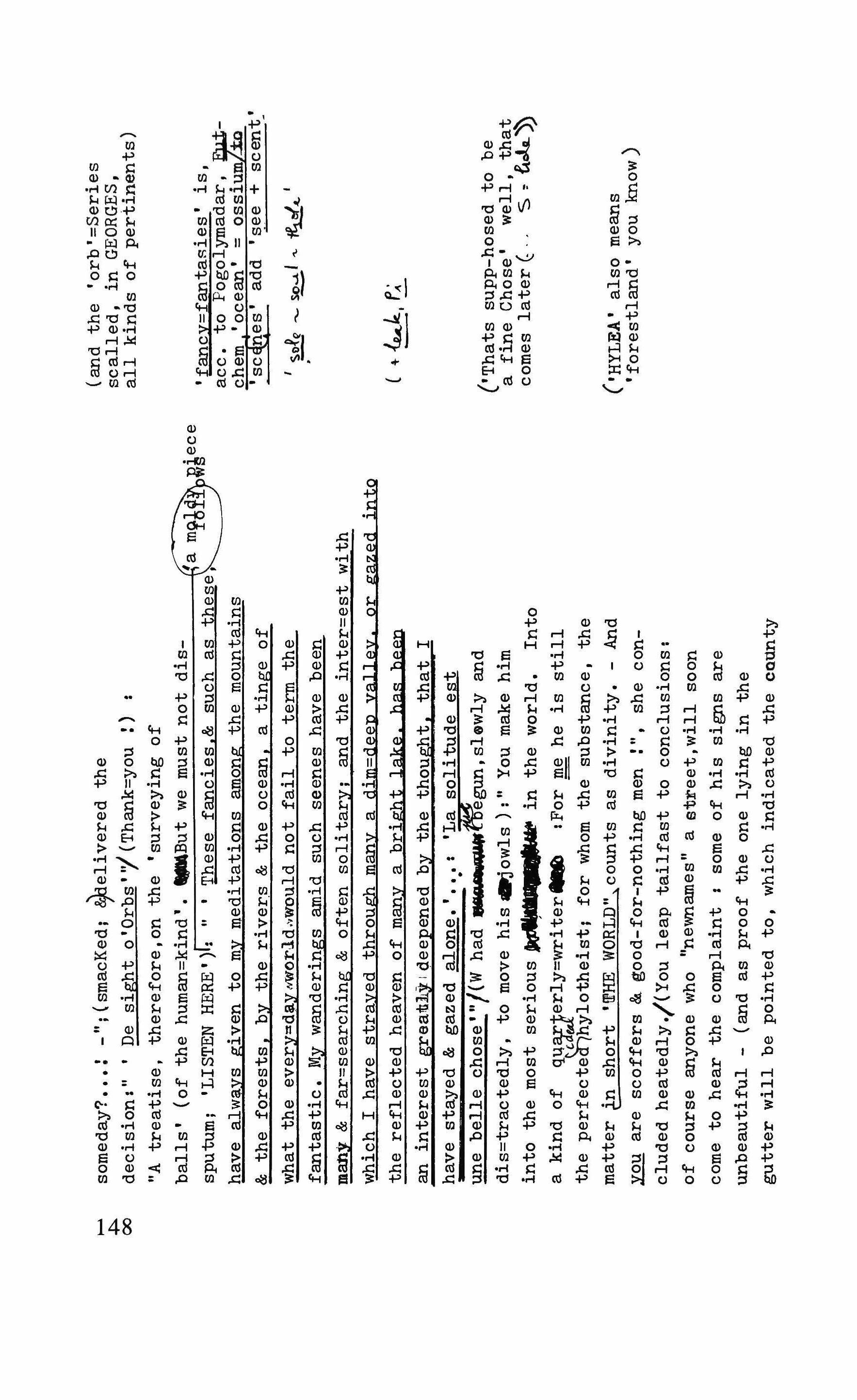
�a
a kind of q���erly=writer� :For me he
the perfecte�hylotheistl for whom the substance, the
WORLD",counts
chose'''/(W had �'.,Mgun,sI8wly and dis=tractedly, to move his -.lowls ) :" You make him into the most serious � �� in the world. Into
is still
matter �n short 'IFHE
divinity.
� limlrts" f) - others unnecessary •.• ? And \0 only nodded; instead of attending to my agreement.) / :?Ibut then again much more=gruffly ): "Suspend your judgement for a little longer, Wilma - tomorrow, when I am no more, youCan �tivate your philosophicel·little �th again, to your heart's content, - %ut first let me demonstrate sufficiently his oscillatio�i�f�!yen "reason & imagination.' In PYM he spoke very � of groups of rewhich present themselves to the dreamer, ,apparently sovereign possession, 'rational' of this FAY=here we have just paid some attention to I In my opinion the "Theoretical Introductions" show exactly the same symptoms, just as concentrated. only more colorless, a� the 'illustration' through painting which comes now. "/-) "In ARNHEIM -' (Fr; who evidently considers her assignment of protecting P against W as completed, and snuggled=up n�t to me): "- thasillaspecially clear there, that=uh : Two= sidedness of the shtories?" _/(Here there are a lot of WMs But): "That takes place in ARNHEIM -(whatever that may be) - while we are here, in the FAY, are where, Paul?-ililma? - -):" Well he quotes from
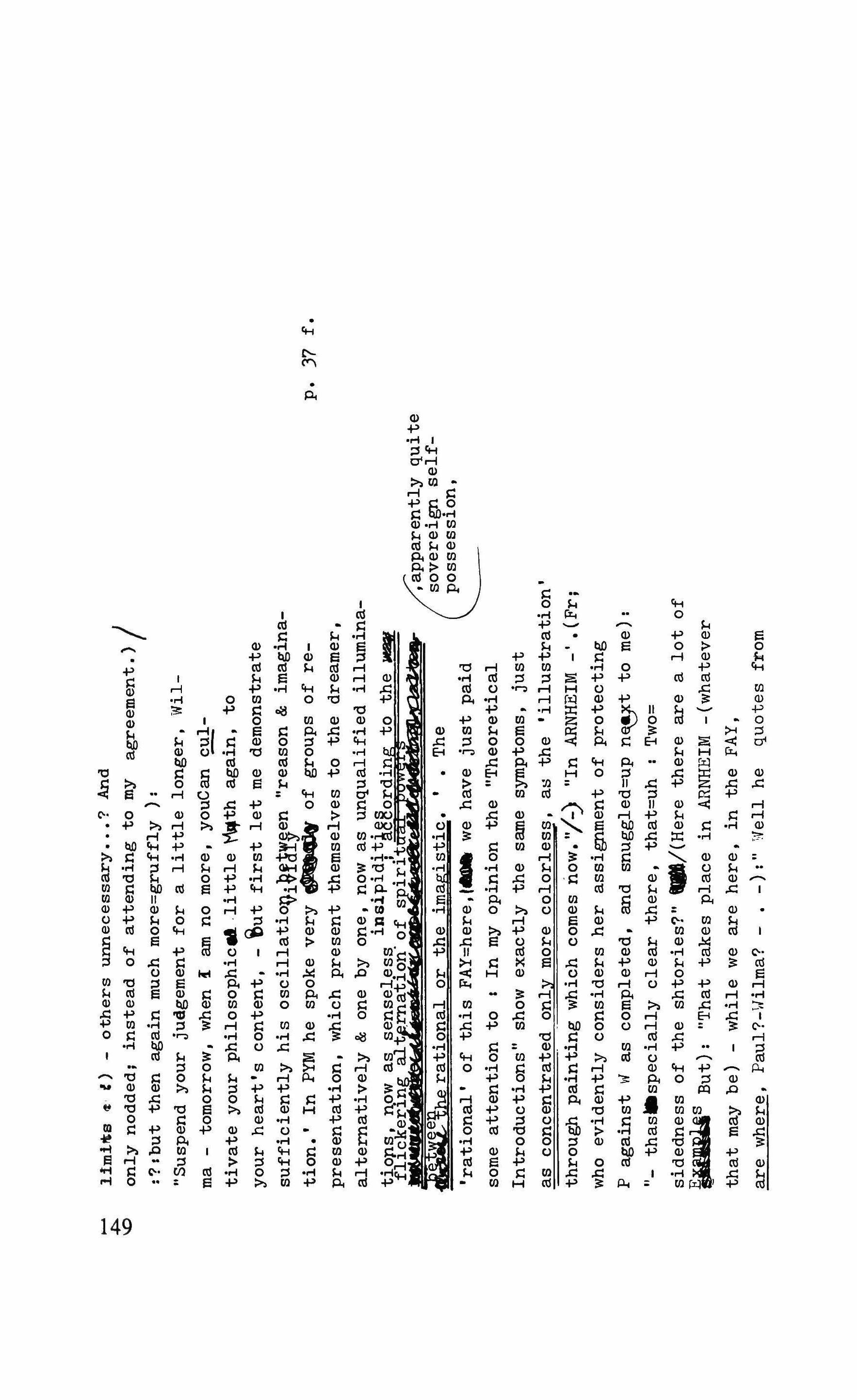
./"Oooh,
me about these philololiers : (Even though c�cious "Babylonian Lady' � would fit, �._.»I "Now please. : 1 it is ) a .-Mit sin;b� dedicated to corruption; c) a city in the d) a city of the Dead� - 1 isn't there among us versed in the Scriptures?:"./(And everyone.'l�oked at Fr-ancLaca r? Who _her hips diplomatically I & then, stated wi con��Cy��� you say that,? then I think of SODOM & GOMORRHA'. I (And a lovely pause to be ) r..soM �IIIS, heard. - The last pav�ng stones were � along with their colors and forms, � of t;.�� incalculable valuer/ A light. two-wheeled wagon, with a blonde sandy Norwegian pony up front, came toward USI in the seat�(lanky) man 1 green leather jacket; brown pants; he obsauved us sharply, as he rolled=by;/(me, at least1 ; with a crabby mouth?/-) I "I!la.h'::
pr fessional prO:Stitute, for myself)
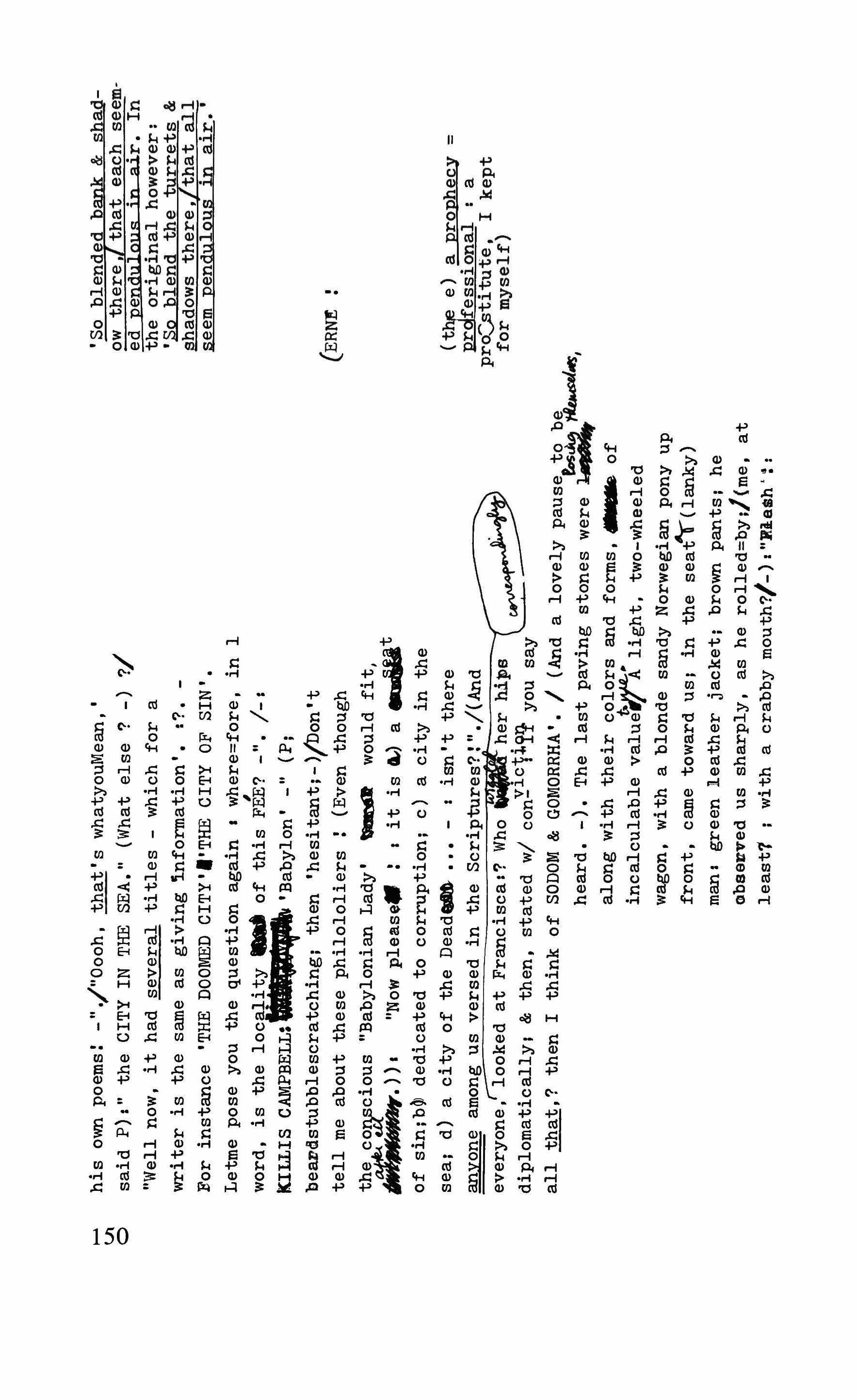
DOOMED
CITY OF SIN'. pose
I where=fore, in
is
locality"
this FEE? _to. I-I CAMPBELL�_� 'Babylon' _to {P; bea»astubblescratching;
'hesitant;-)!D0n't
own poems: -"
that's whatyouMean, P) I" the CITY IN THE SEA." (What else 7 -) 7/ now, it had several titles - which for a is the same as giving information'. 17.instance 'THE
CITY'.'THE
you the question again
1
the
of
then
(ERra (t� e)
VI -
Flesh : -" groaned Paul. ·i iiliiinly a ware-itable _vul�s=hunger : "/-: v-» "Oanything; with slut's of culItories: breadst £ar all I care. Uppateat uffor (With sinnamon, what ? )t' What would mastication the most �adismasfactorily (He wheT his lips & tongue; and began "Maccaroni -(a whole washt:;basin full) �semeat=balls. Cheese: grated=Swiss; Parmesan.) Ioung peas. Tomato=Sauce.
Sunny-side up eggs : I could get (And sketched then a fundamental project happiness of humanity: the creation houses in even the smallest villages. tion of Chinese personnel; (the Germans need to be crossed with races which to work - � probably only Mongols The guy in the gig=HIH�td�ia=around But)
by
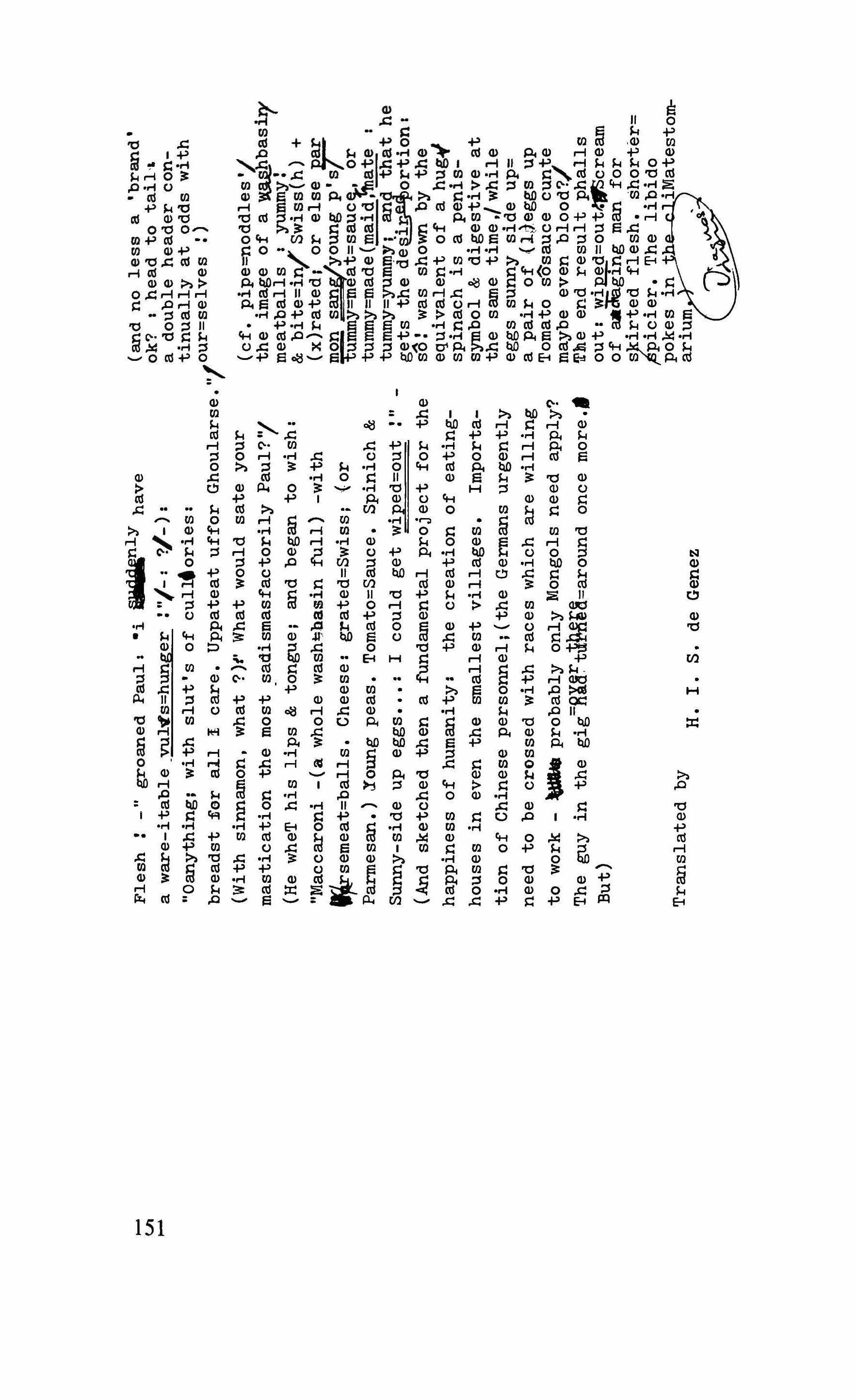
-
Translated
H. I. S. de Genez
Christine Brooke-Rose: from Thru
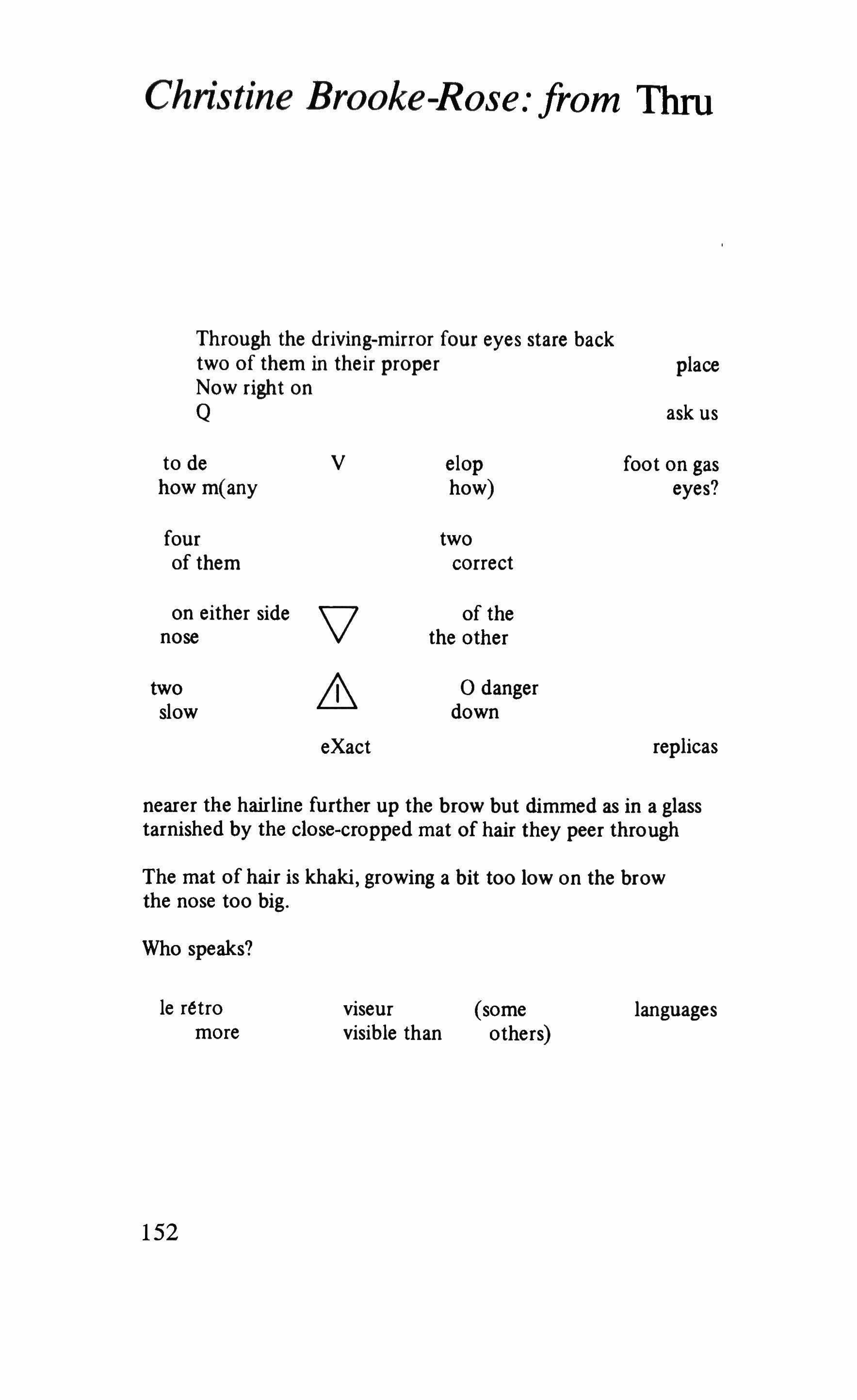
Through the driving-mirror four eyes stare back two of them in their proper place Now right on Q ask us
to de V elop foot on gas how m(any how) eyes?
four two of them correct on either side
Vof the nose the other
two & o danger slow down
eXact replicas
nearer the hairline further up the brow but dimmed as in a glass tarnished by the close-cropped mat of hair they peer through
The mat of hair is khaki, growing a bit too low on the brow the nose too big.
Who speaks?
le retro more
viseur visible than (some others) languages
152
or the vizir looming grey eminence behind the consultan listener how many times leaning a little to the right to peer into how many rectangles a thousand and one in which there is a flaw?
The second pair of eyes are less pale veiled by the reflected hair crinkly khaki flecked grey
o but handsome all told whatever all is and who ever tells a young god yet the lower eyes lie blue to the tarnished replicas higher up the brow which whoever speaks (Nourennin?) calls too low.
Some tale-bearer (0 capital! your story or your life
story?
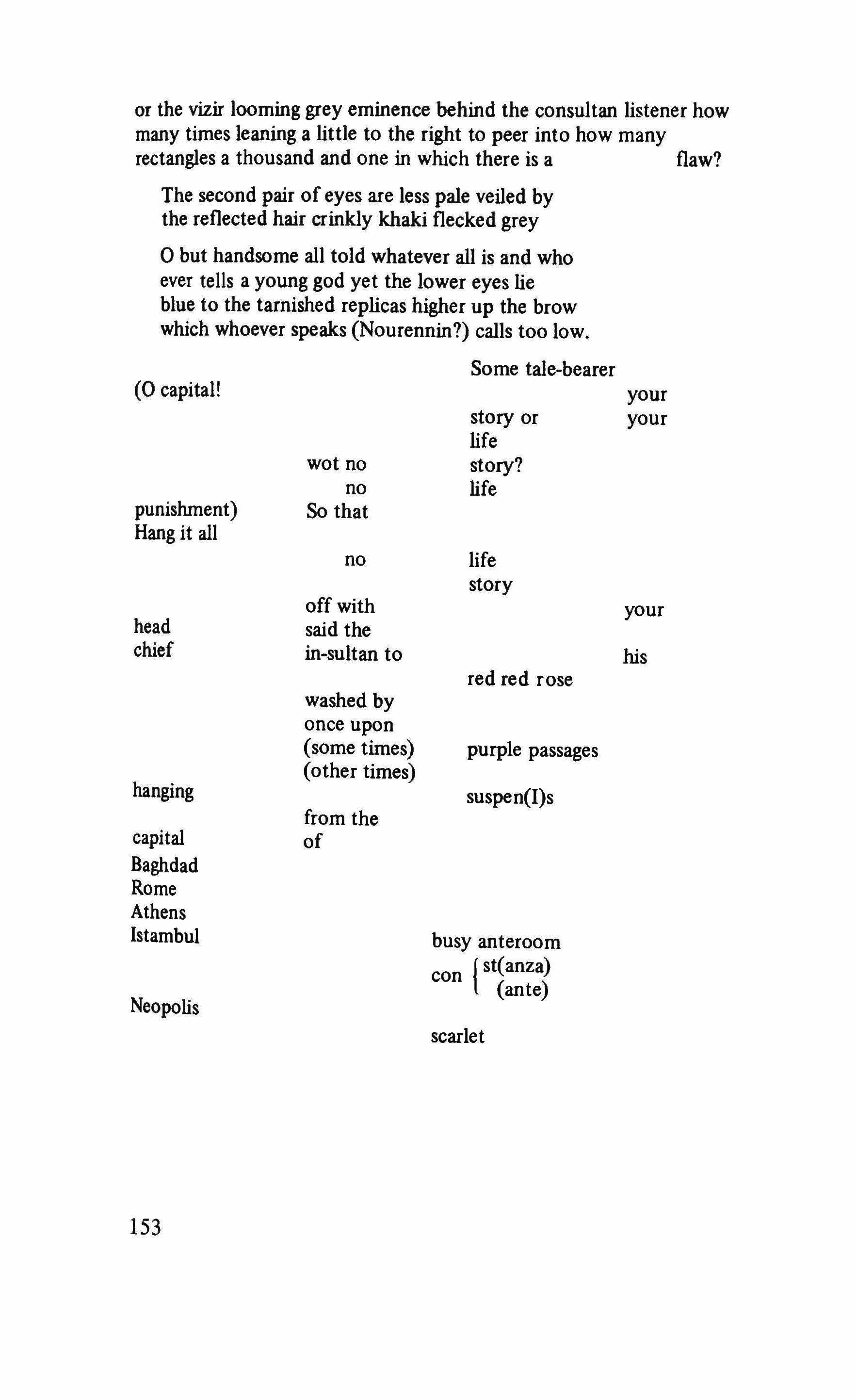
punishment) So that Hang it all
off with your head said the chief in-sultan to his red red rose washed by once upon (some times) purple passages (other times)
hanging
suspen(l)s from the capital of Baghdad
Rome Athens Istambul busy anteroom
anza)
Neopolis (ante)
scarlet
no
wot no
life
no
life story
con {st(
153
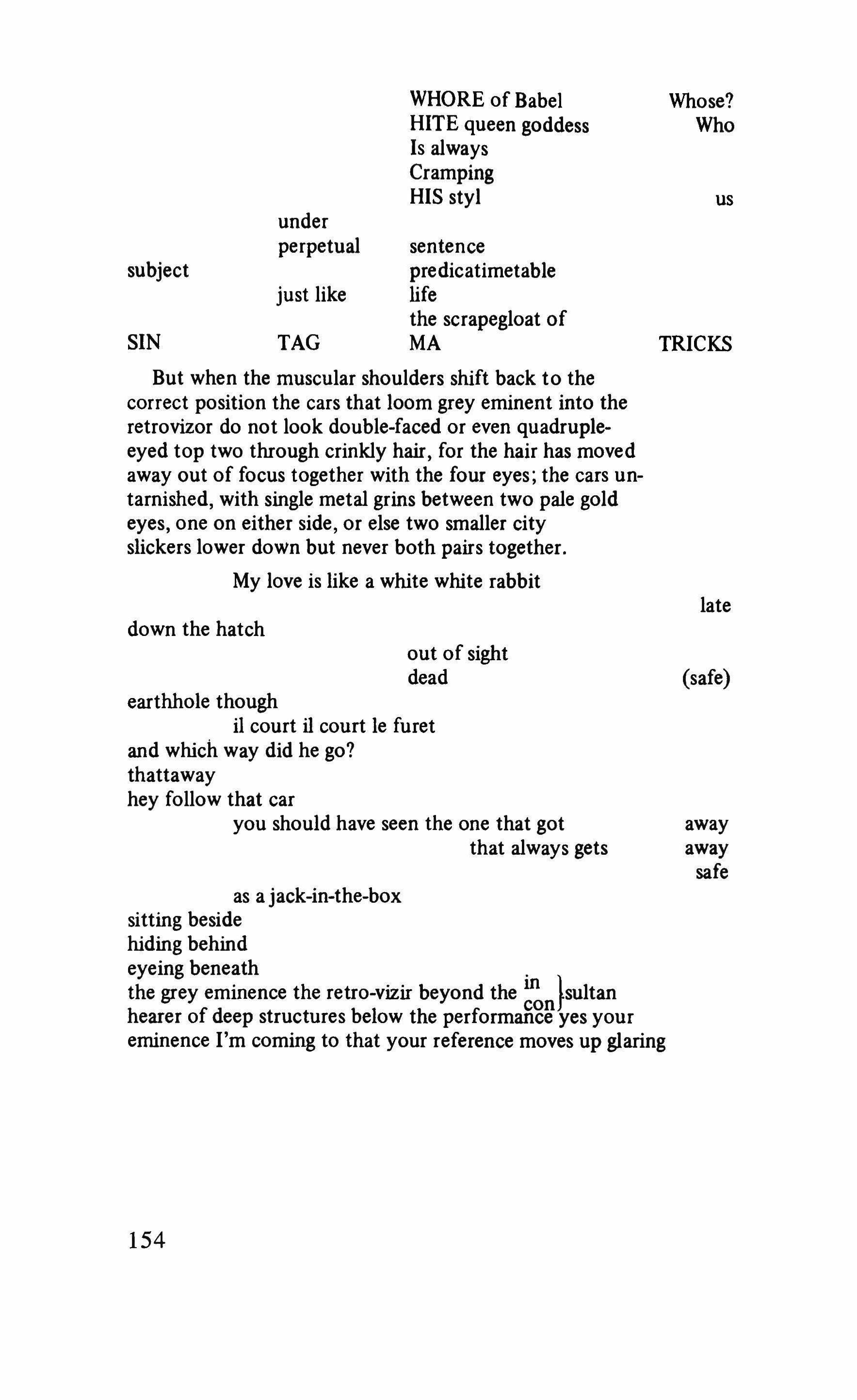
WHORE of Babel HITE queen goddess Is always Cramping HIS sty1
Whose? Who us under perpetual sentence predicatimetable life the scrapegloat of MA TRICKS subject just like SIN TAG
But when the muscular shoulders shift back to the correct position the cars that loom grey eminent into the retrovizor do not look double-faced or even quadrupleeyed top two through crinkly hair, for the hair has moved away out of focus together with the four eyes; the cars untarnished, with single metal grins between two pale gold eyes, one on either side, or else two smaller city slickers lower down but never both pairs together. My love is like a white white rabbit late down the hatch
out of sight dead
(safe) earthhole though il court il court le furet and which way did he go? thattaway hey follow that car you should have seen the one that got away that always gets away safe as a jack-in-the-box sitting beside hiding behind eyeing beneath the grey eminence the retro-vizir beyond the :n}sultan hearer of deep structures below the performance yes your eminence I'm coming to that your reference moves up glaring
154
the retrovizor has a bluish tinge. At a flick of a switch the rectangle turns smoky grey to dim the dazzle of floodlights undipped or even gently dipped but the glare is preferable to the sudden isolation of almost not seeing behind a head
Ali Nourennin
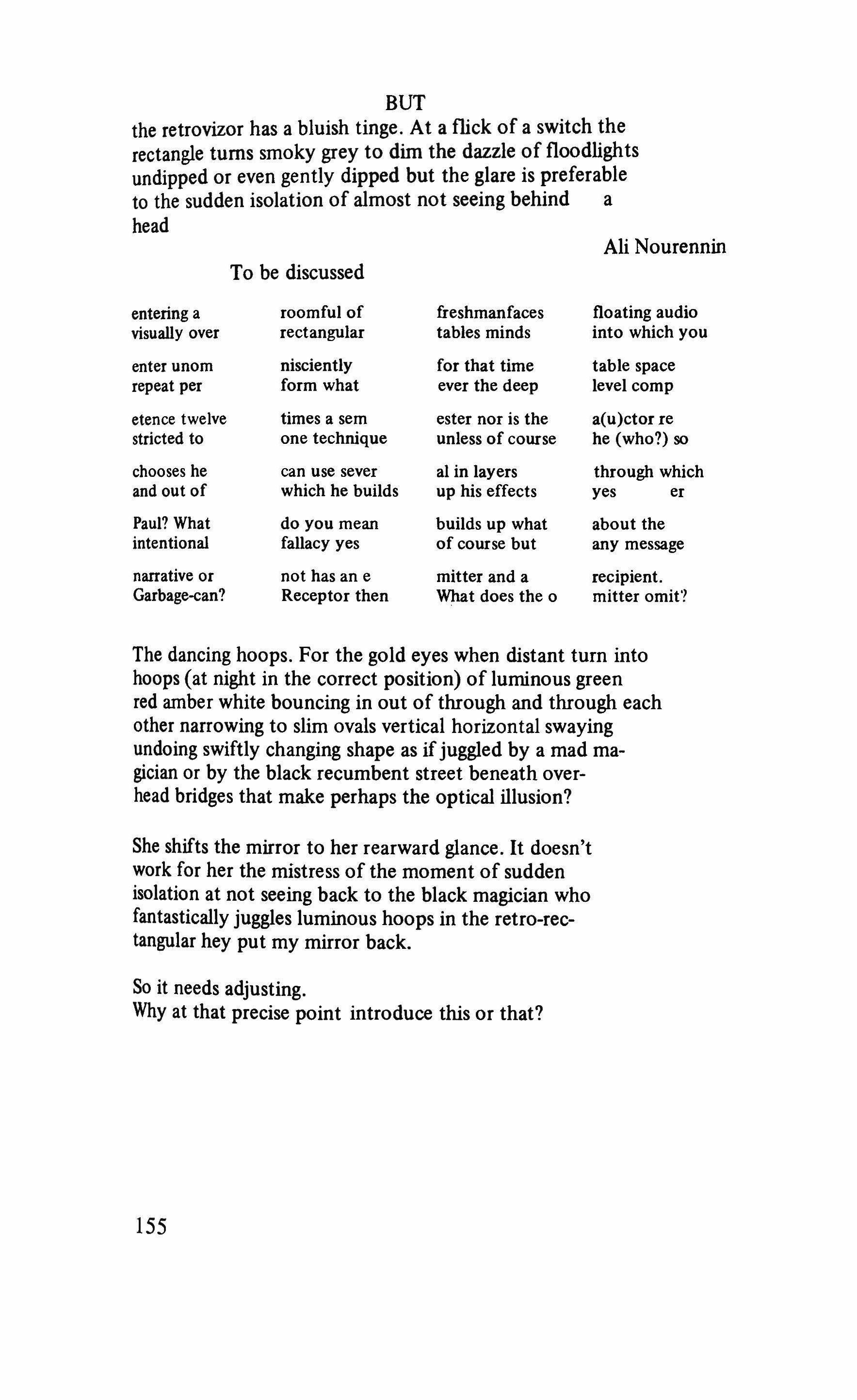
To be discussed
entering a roomful of freshmanfaces floating audio visually over rectangular tables minds into which you enter unom nisciently for that time table space repeat per form what ever the deep level comp etence twelve times a sem ester nor is the a(u)ctor re stricted to one technique unless of course he (who?) so chooses he can use sever al in layers through which and out of which he builds up his effects yes er
Paul? What do you mean builds up what about the intentional fallacy yes of course but any message narrative or not has an e mitter and a recipient. Garbage-can? Receptor then What does the 0 mitter omit'?
The dancing hoops. For the gold eyes when distant turn into hoops (at night in the correct position) of luminous green red amber white bouncing in out of through and through each other narrowing to slim ovals vertical horizontal swaying undoing swiftly changing shape as ifjuggled by a mad magician or by the black recumbent street beneath overhead bridges that make perhaps the optical illusion?
She shifts the mirror to her rearward glance. It doesn't work for her the mistress of the moment of sudden isolation at not seeing back to the black magician who fantastically juggles luminous hoops in the retro-rectangular hey put my mirror back.
So it needs adjusting. Why at that precise point introduce this or that?
BUT
155
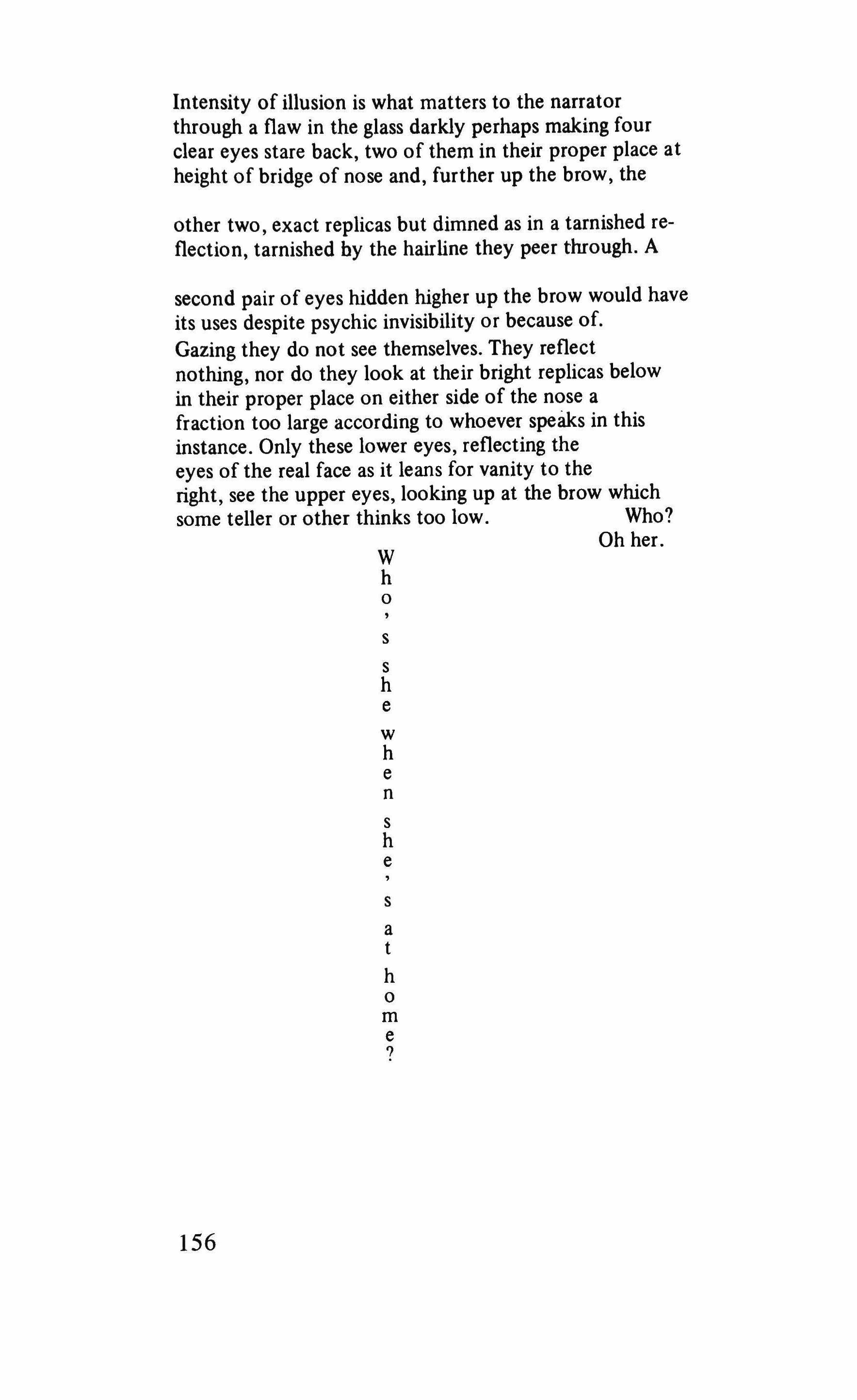
Intensity of illusion is what matters to the narrator through a flaw in the glass darkly perhaps making four clear eyes stare back, two of them in their proper place at height of bridge of nose and, further up the brow, the
other two, exact replicas but dimned as in a tarnished reflection, tarnished by the hairline they peer through. A
second pair of eyes hidden higher up the brow would have its uses despite psychic invisibility or because of. Gazing they do not see themselves. They reflect nothing, nor do they look at their bright replicas below in their proper place on either side of the nose a fraction too large according to whoever speaks in this instance. Only these lower eyes, reflecting the eyes of the real face as it leans for vanity to the right, see the upper eyes, looking up at the brow which some teller or other thinks too low. Who? Oh her.
W h o s s h e w h e n s h e s a t h o m e ? 156
never this is the
becAuse I would noT boaRish Cruel tHine I'll set
These pooR old eyes beAm Cruel Eyes
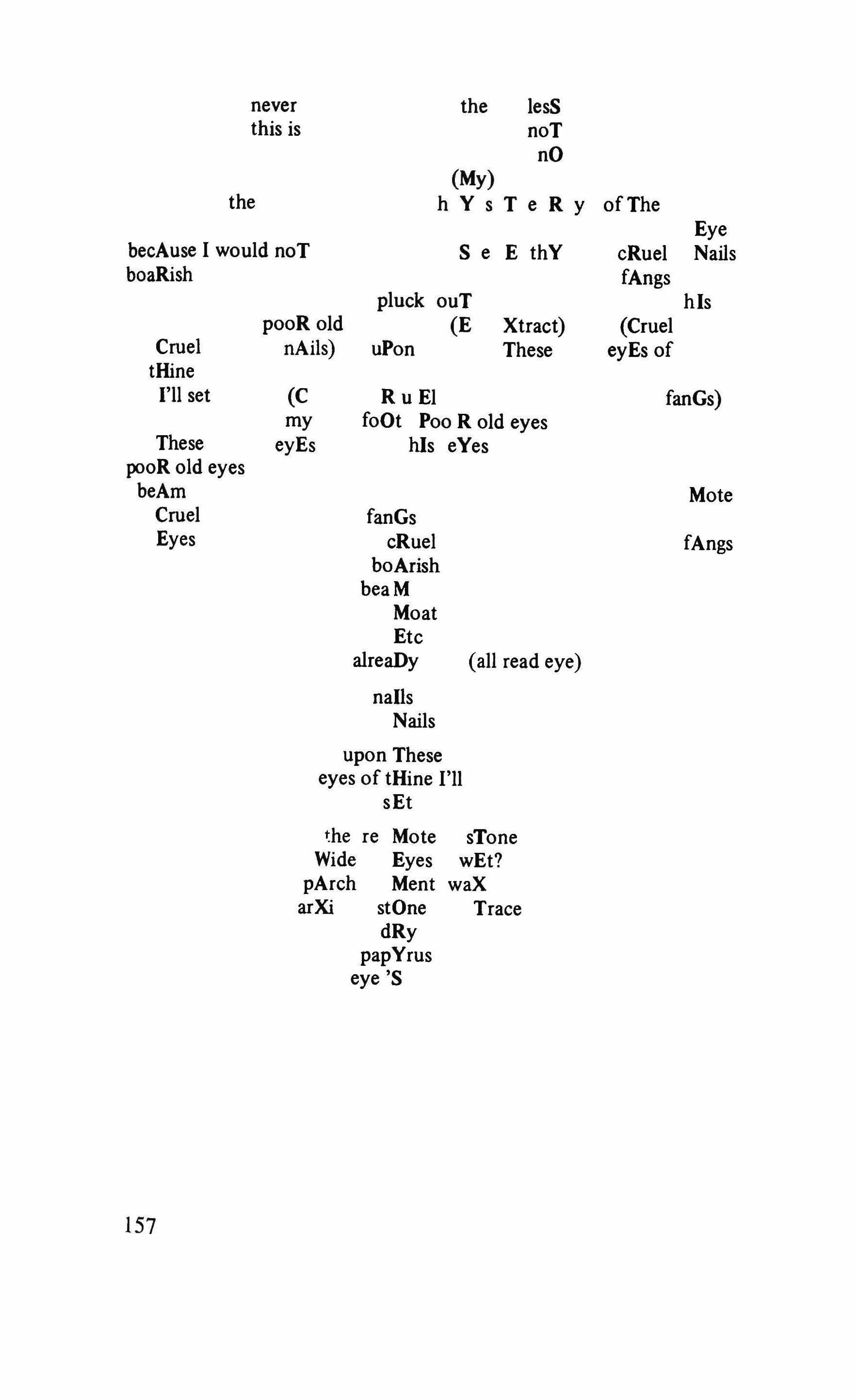
pooR old nAils) (C my eyEs
the lesS noT nO (My) hYsTeRy of The Eye S e E thY cRuel Nails fAngs pluck ouT hIs (E Xtract) (Cruel uPon These eyEs of
R u El fanGs) foOt Poo R old eyes his eYes
Mote fanGs cRuel boArish beaM Moat Etc
alreaDy (all read eye) naIls Nails upon These eyes of tHine I'll sEt Mote sTone Eyes wEt? Ment waX fAngs �he re Wide pArch arXi stOne dRy papYrus eye'S Trace
157
blue lacuna of learning and unlearning a text within a text passed on from generation to generation of an increasing vastness that nevertheless dwindles to an elite initiated to a text noone else will read by means maybe of the flick of a switch for the overhead projector and diagrams drawn into a boxed screen to the right of the desk with a spirit-loaded pen thus not losing eye-contact.
The quiver of the bhi on the beeswax
How doth the bithy little Thoth produthe an endleth piethe of cloth when thought, that bithy little moth devourth it all like tho much froth leaving great holth, tho Thamuth quoth.
a busy competent performance before busy bees who palp oscult measure time listen see smell taste imitate suck the performer dry.
Hang it all we have the story of an � o but is not incompetent performance a non-disjunction at level of deep structure? I me if it be possible despite nonequivalence to rewrite I as 0 and 0 as I which has been suggested, here, you see, cost

should you start structuring your te:><:thattaway or the latterway?
Those for: Peter Brandt Barbara Darcy Francesca Newman Robert Galliard Myra Kaplan Kathleen O'Shaunessy Ali Nourennin Renata Polanska Lin Su Fu.
Those against: Vittoria Charib Marie Faber Salvatore Tancredi Michael Mandel Jean-Marie Fevre Eliza Jones.
I I I
158
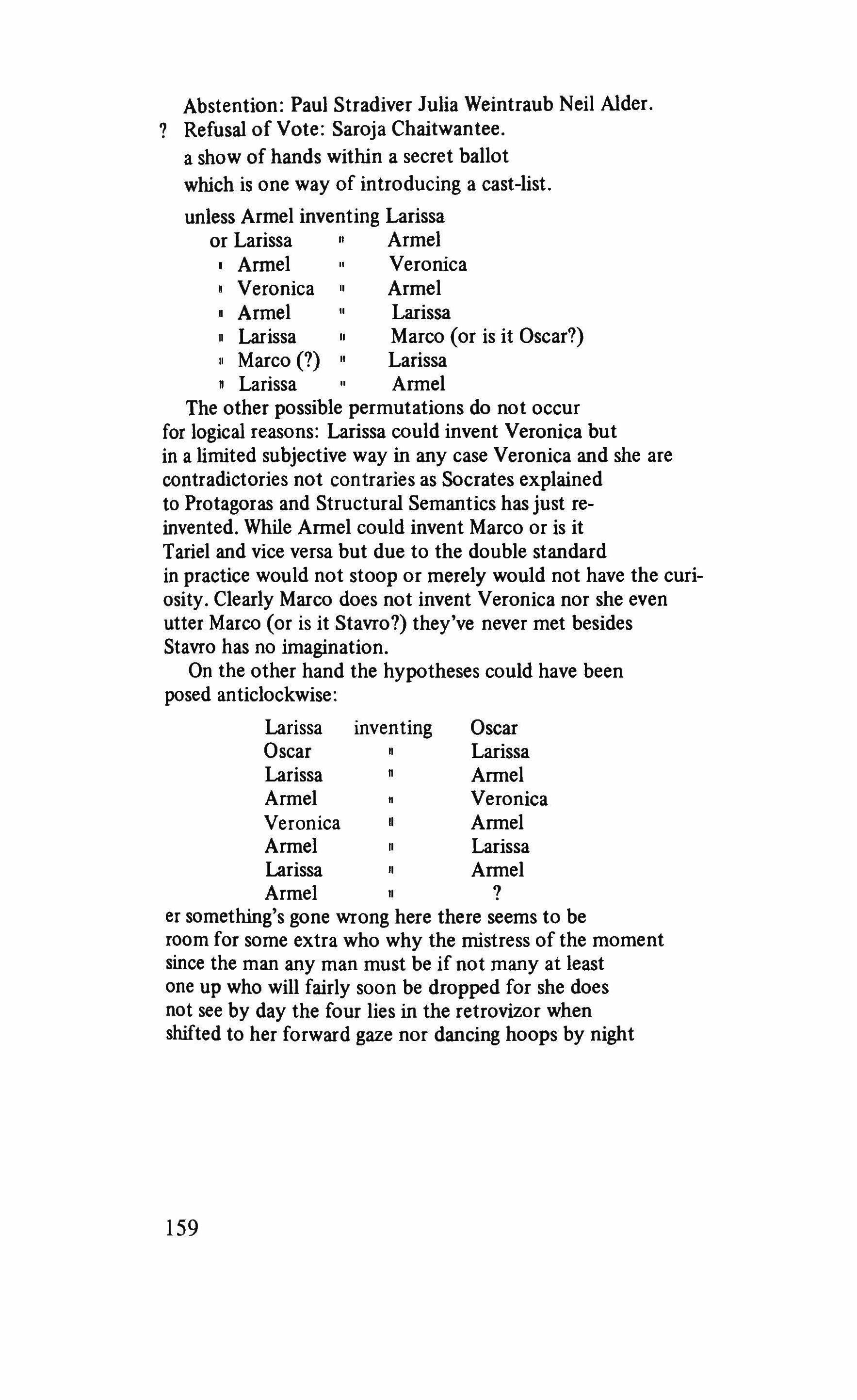
Abstention: Paul Stradiver Julia Weintraub Neil Alder. ? Refusal of Vote: Saroja Chaitwantee. a show of hands within a secret ballot which is one way of introducing a cast-list. unless Armel inventing Larissa or Larissa Armel
I Armel Veronica
I Veronica Armel
n Armel Larissa
II Larissa Marco (or is it Oscar?)
II Marco (?) Larissa
n Larissa Armel
The other possible permutations do not occur for logical reasons: Larissa could invent Veronica but in a limited subjective way in any case Veronica and she are contradictories not contraries as Socrates explained to Protagoras and Structural Semantics has just reinvented. While Armel could invent Marco or is it Tariel and vice versa but due to the double standard in practice would not stoop or merely would not have the curiosity. Clearly Marco does not invent Veronica nor she even utter Marco (or is it Stavro?) they've never met besides Stavro has no imagination.
On the other hand the hypotheses could have been posed anticlockwise:
Larissa inventing Oscar Oscar Larissa Larissa Armel Armel
Veronica
Veronica Armel Armel Larissa Larissa Armel Armel ?
er something's gone wrong here there seems to be room for some extra who why the mistress of the moment since the man any man must be if not many at least one up who will fairly soon be dropped for she does not see by day the four lies in the retrovizor when shifted to her forward gaze nor dancing hoops by night
159

But it needs adjusting.
Well then I found myself with a magician on a helluva stage as his stooge you know in tights and a sequin bodice and my bust like it was busting tight out of it and I was handing him coloured scarves i think and suddenly a prop was missing I forget his stick I mean his wand anyway it was my fault he couldn't Lift the white rabbit out of the hat and the crowd murmured and even shouted as he signalled frantically like mad right into the wings but they didn't get the message and in the end he walked off leaving me alone on stage to cope somehow in the glare of lights that hits the mirror and swings left out of it beaming ahead rewritten now as two small red eyes in a hunched black shape which is delineated against forward floodlight the retrovizor reopening to the hoops dancing up and down and aside in the rear distance luminous horizontal ovals oh no, vertical ovals as if at quarter angle amber red green white swiftly changing shape and juggled by the night or by the tall dark house with blue eyes or maybe by the black recumbent street who was very short and fat for a magician more than obese you've never seen anything so fat he tried to reach the switches to calm the audience but he was so
Very fat and short so he lifted me in my tights and bodice ever so firm under the breasts with them busting right out of the sequins and I managed to switch them off and as he brought me down we kissed half naked ever so sexy and then we started wanting it like crazy but I said no later we have to calm the crowd so he got wild and dragged me after him out of the theatre but I wrenched free saying the show must go on can you interpret ?
The show within the show What? of hands juggling
160
within a secret ballet of the I hell honey I guess I just fill the air for you sure that's what i like about you oh I thought it was my big beautiful true blue tits they're fine too with a show of hands entering under silk with a secret ballet of fingers on tiptoe upon soft globed flesh the nipple now rising hard between the lights the foot pressed gently purring into a stop the is it sacred belly tensed to the show of green fingers into the left thigh that jerks open to the hot human humidity of a sexual humour secreted unsecretly go on then
Doing what?
Oh filling the air. You do it so much more convincingly than the others (tit for tat) what others? others who fill the air. Oh
Well you were giving history for some mmmmm mystErious
yes eXcite me in the royal there
Punished the yEs
er by making them Climb out and walk the plank and all the planks sTuck out all hEll honey oh Don't like eminence guns I'm corning so when they
a class on British reasoN
Oh Mmm how navY they Sailors
There Er Round
Yes your like to that
Goon droppEd Sea what The planks no the
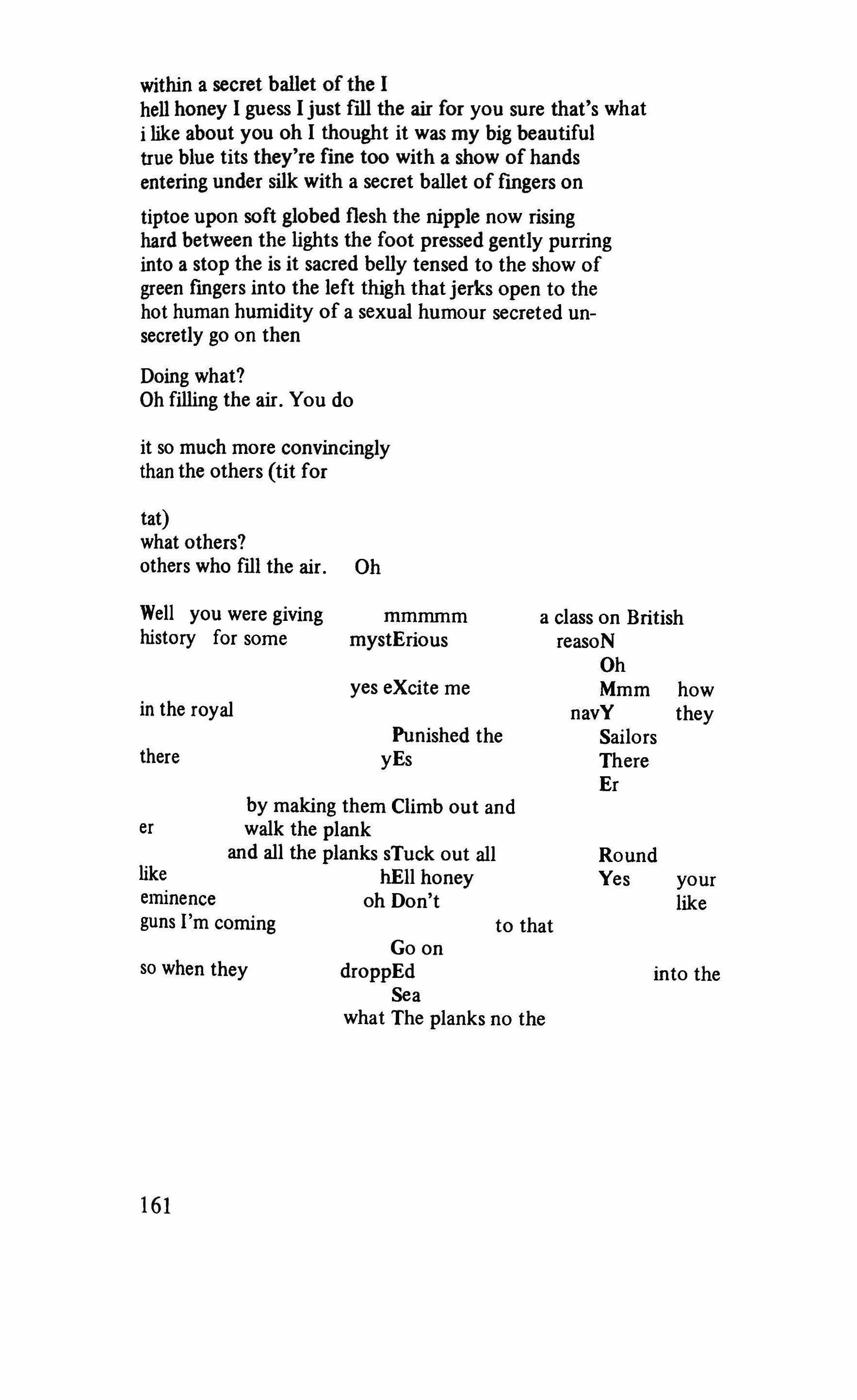
into the
161
sailors silly a hUge eagle boy aRe you big WEll he'd swoop down on thEm and they had to eLiminate himmmmmmm welL fight It out in the Water and if tHey thEy demonstRated to the they were hAuled out weNt free and you iT won
Class you jumped the plank and foUght it out with the eagle and wrrrrrrrrrrrrrrrrruNg iTs neck.
You're mythologising me.
Oh any time. And then you came with your car and said come unto me I'll light the way and well drove off the bridge in the scin till a ting for' across elgn Clty
did you?
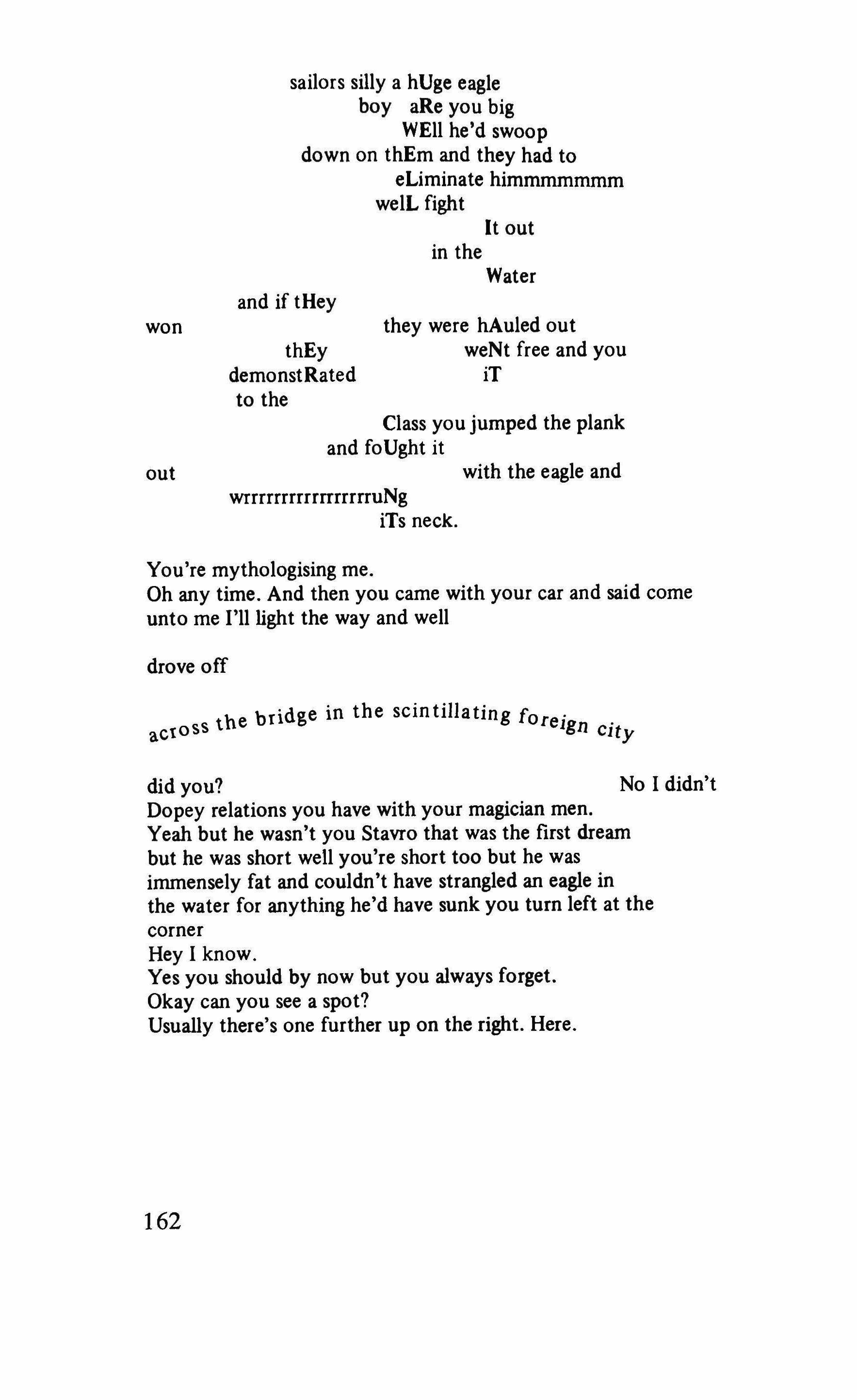
No I didn't
Dopey relations you have with your magician men. Yeah but he wasn't you Stavro that was the first dream but he was short well you're short too but he was immensely fat and couldn't have strangled an eagle in the water for anything he'd have sunk you turn left at the corner
Hey I know. Yes you should by now but you always forget. Okay can you see a spot? Usually there's one further up on the right. Here.
162
Fizzle 1
Samuel Beckett
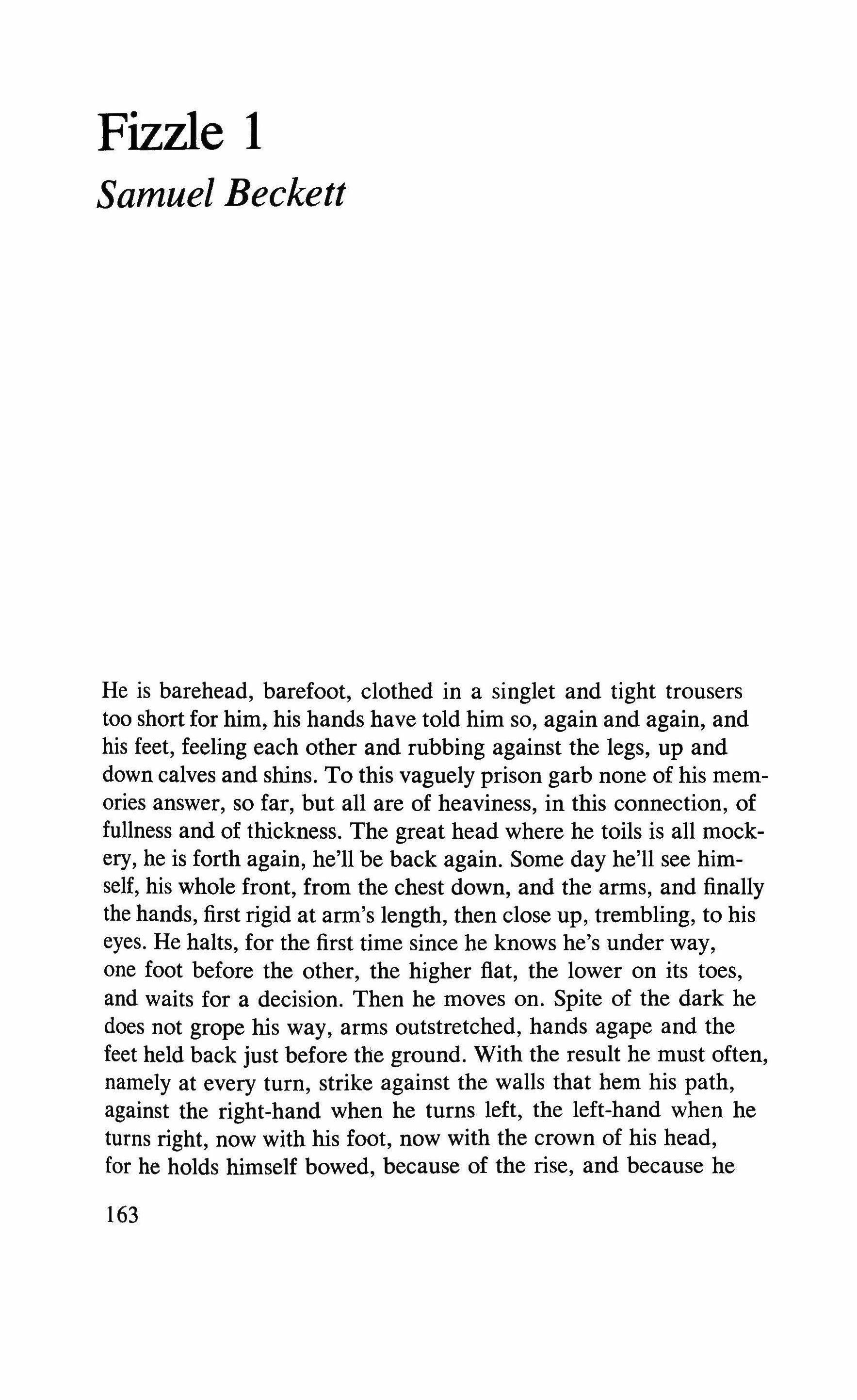
He is barehead, barefoot, clothed in a singlet and tight trousers too short for him, his hands have told him so, again and again, and his feet, feeling each other and rubbing against the legs, up and down calves and shins. To this vaguely prison garb none of his memories answer, so far, but all are of heaviness, in this connection, of fullness and of thickness. The great head where he toils is all mockery, he is forth again, he'll be back again. Some day he'll see himself, his whole front, from the chest down, and the arms, and finally the hands, first rigid at arm's length, then close up, trembling, to his eyes. He halts, for the first time since he knows he's under way, one foot before the other, the higher fiat, the lower on its toes, and waits for a decision. Then he moves on. Spite of the dark he does not grope his way, arms outstretched, hands agape and the feet held back just before the ground. With the result he must often, namely at every turn, strike against the walls that hem his path, against the right-hand when he turns left, the left-hand when he turns right, now with his foot, now with the crown of his head, for he holds himself bowed, because of the rise, and because he
163
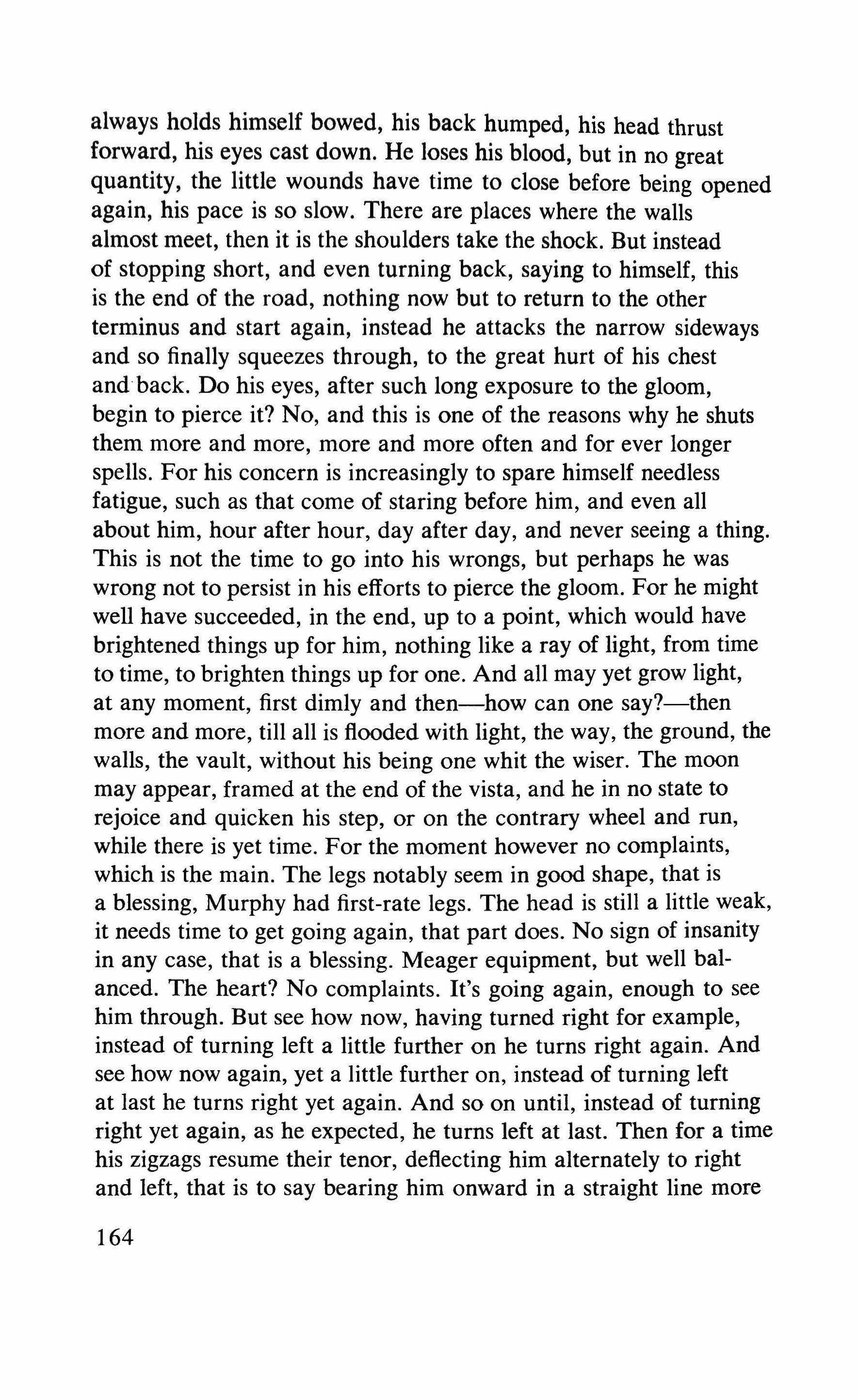
always holds himself bowed, his back humped, his head thrust forward, his eyes cast down. He loses his blood, but in no great quantity, the little wounds have time to close before being opened again, his pace is so slow. There are places where the walls almost meet, then it is the shoulders take the shock. But instead of stopping short, and even turning back, saying to himself, this is the end of the road, nothing now but to return to the other terminus and start again, instead he attacks the narrow sideways and so finally squeezes through, to the great hurt of his chest and back. Do his eyes, after such long exposure to the gloom, begin to pierce it? No, and this is one of the reasons why he shuts them more and more, more and more often and for ever longer spells. For his concern is increasingly to spare himself needless fatigue, such as that come of staring before him, and even all about him, hour after hour, day after day, and never seeing a thing. This is not the time to go into his wrongs, but perhaps he was wrong not to persist in his efforts to pierce the gloom. For he might well have succeeded, in the end, up to a point, which would have brightened things up for him, nothing like a ray of light, from time to time, to brighten things up for one. And all may yet grow light, at any moment, first dimly and then-how can one say?-then more and more, till all is flooded with light, the way, the ground, the walls, the vault, without his being one whit the wiser. The moon may appear, framed at the end of the vista, and he in no state to rejoice and quicken his step, or on the contrary wheel and run, while there is yet time. For the moment however no complaints, which is the main. The legs notably seem in good shape, that is a blessing, Murphy had first-rate legs. The head is still a little weak, it needs time to get going again, that part does. No sign of insanity in any case, that is a blessing. Meager equipment, but well balanced. The heart? No complaints. It's going again, enough to see him through. But see how now, having turned right for example, instead of turning left a little further on he turns right again. And see how now again, yet a little further on, instead of turning left at last he turns right yet again. And so on until, instead of turning right yet again, as he expected, he turns left at last. Then for a time his zigzags resume their tenor, deflecting him alternately to right and left, that is to say bearing him onward in a straight line more
164
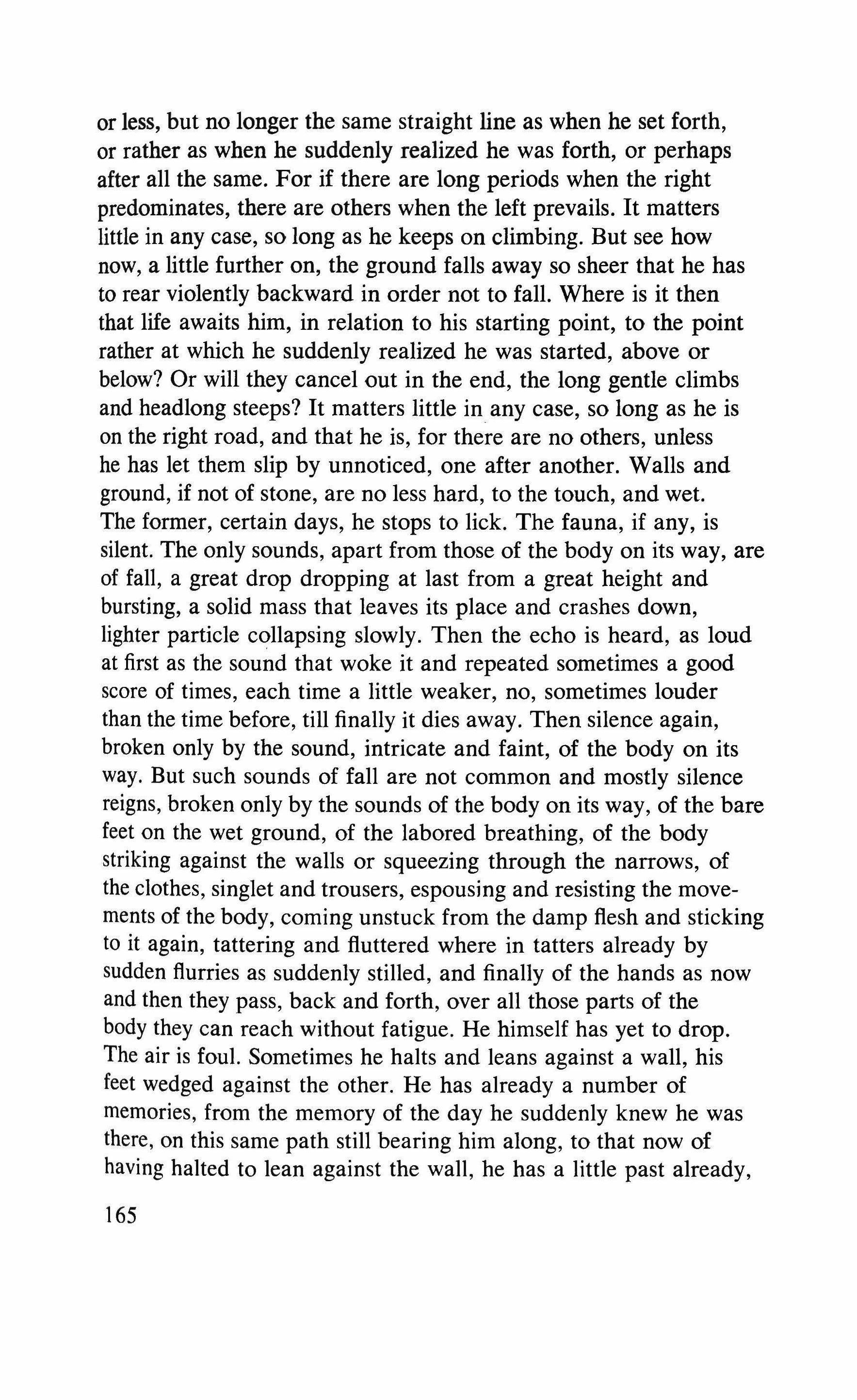
or less, but no longer the same straight line as when he set forth, or rather as when he suddenly realized he was forth, or perhaps after all the same. For if there are long periods when the right predominates, there are others when the left prevails. It matters little in any case, so long as he keeps on climbing. But see how now, a little further on, the ground falls away so sheer that he has to rear violently backward in order not to fall. Where is it then that life awaits him, in relation to his starting point, to the point rather at which he suddenly realized he was started, above or below? Or will they cancel out in the end, the long gentle climbs and headlong steeps? It matters little in any case, so long as he is on the right road, and that he is, for there are no others, unless he has let them slip by unnoticed, one after another. Walls and ground, if not of stone, are no less hard, to the touch, and wet. The former, certain days, he stops to lick. The fauna, if any, is silent. The only sounds, apart from those of the body on its way, are of fall, a great drop dropping at last from a great height and bursting, a solid mass that leaves its place and crashes down, lighter particle collapsing slowly. Then the echo is heard, as loud at first as the sound that woke it and repeated sometimes a good score of times, each time a little weaker, no, sometimes louder than the time before, till finally it dies away. Then silence again, broken only by the sound, intricate and faint, of the body on its way. But such sounds of fall are not common and mostly silence reigns, broken only by the sounds of the body on its way, of the bare feet on the wet ground, of the labored breathing, of the body striking against the walls or squeezing through the narrows, of the clothes, singlet and trousers, espousing and resisting the movements of the body, coming unstuck from the damp flesh and sticking to it again, tattering and fluttered where in tatters already by sudden flurries as suddenly stilled, and finally of the hands as now and then they pass, back and forth, over all those parts of the body they can reach without fatigue. He himself has yet to drop. The air is foul. Sometimes he halts and leans against a wall, his feet wedged against the other. He has already a number of memories, from the memory of the day he suddenly knew he was there, on this same path still bearing him along, to that now of having halted to lean against the wall, he has a little past already,
165
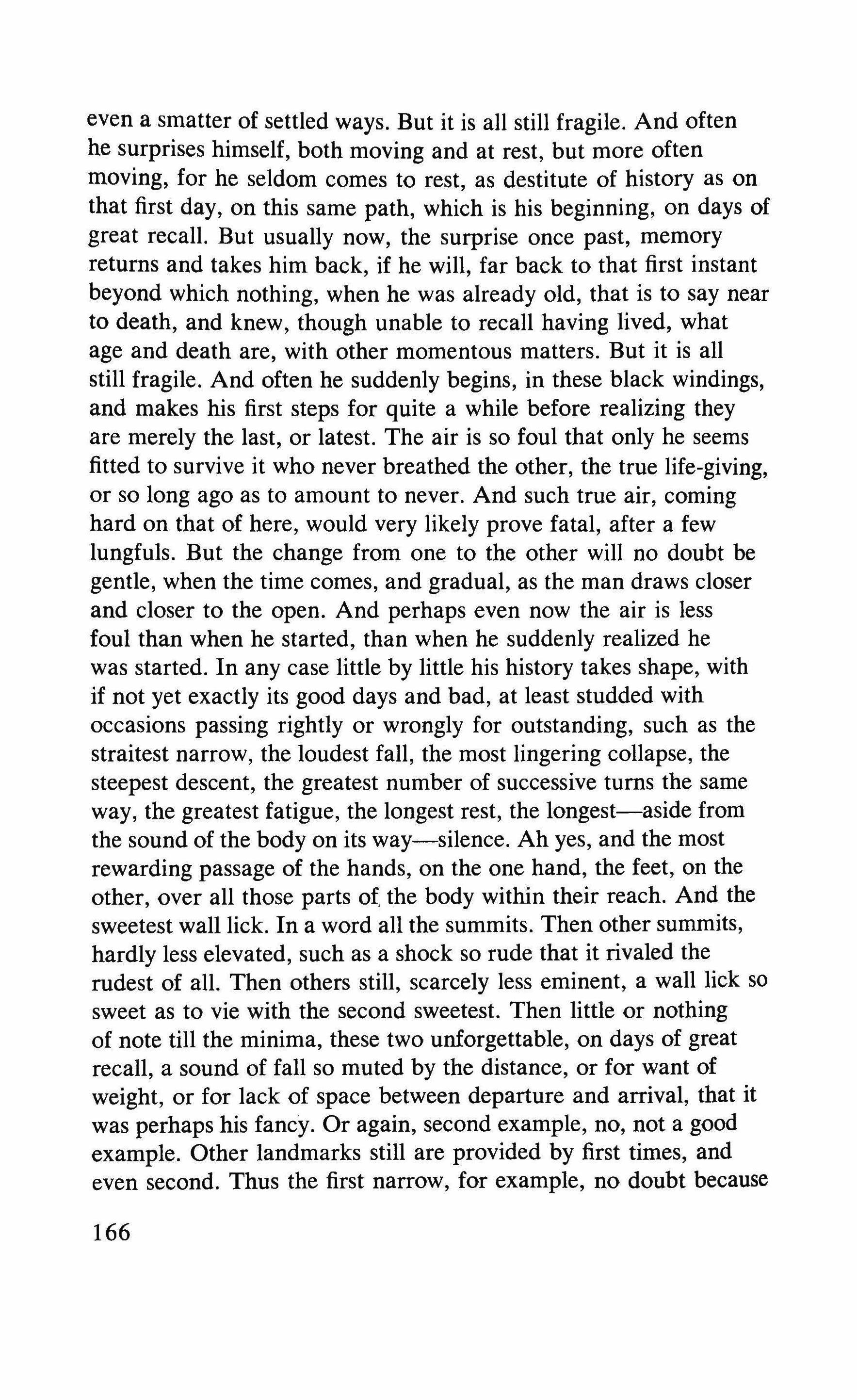
even a smatter of settled ways. But it is all still fragile. And often he surprises himself, both moving and at rest, but more often moving, for he seldom comes to rest, as destitute of history as on that first day, on this same path, which is his beginning, on days of great recall. But usually now, the surprise once past, memory returns and takes him back, if he will, far back to that first instant beyond which nothing, when he was already old, that is to say near to death, and knew, though unable to recall having lived, what age and death are, with other momentous matters. But it is all still fragile. And often he suddenly begins, in these black windings, and makes his first steps for quite a while before realizing they are merely the last, or latest. The air is so foul that only he seems fitted to survive it who never breathed the other, the true life-giving, or so long ago as to amount to never. And such true air, coming hard on that of here, would very likely prove fatal, after a few lungfuls. But the change from one to the other will no doubt be gentle, when the time comes, and gradual, as the man draws closer and closer to the open. And perhaps even now the air is less foul than when he started, than when he suddenly realized he was started. In any case little by little his history takes shape, with if not yet exactly its good days and bad, at least studded with occasions passing rightly or wrongly for outstanding, such as the straitest narrow, the loudest fall, the most lingering collapse, the steepest descent, the greatest number of successive turns the same way, the greatest fatigue, the longest rest, the longest-aside from the sound of the body on its way-silence. Ah yes, and the most rewarding passage of the hands, on the one hand, the feet, on the other, over all those parts of, the body within their reach. And the sweetest wall lick. In a word all the summits. Then other summits, hardly less elevated, such as a shock so rude that it rivaled the rudest of all. Then others still, scarcely less eminent, a wall lick so sweet as to vie with the second sweetest. Then little or nothing of note till the minima, these two unforgettable, on days of great recall, a sound of fall so muted by the distance, or for want of weight, or for lack of space between departure and arrival, that it was perhaps his fancy. Or again, second example, no, not a good example. Other landmarks still are provided by first times, and even second. Thus the first narrow, for example, no doubt because
166
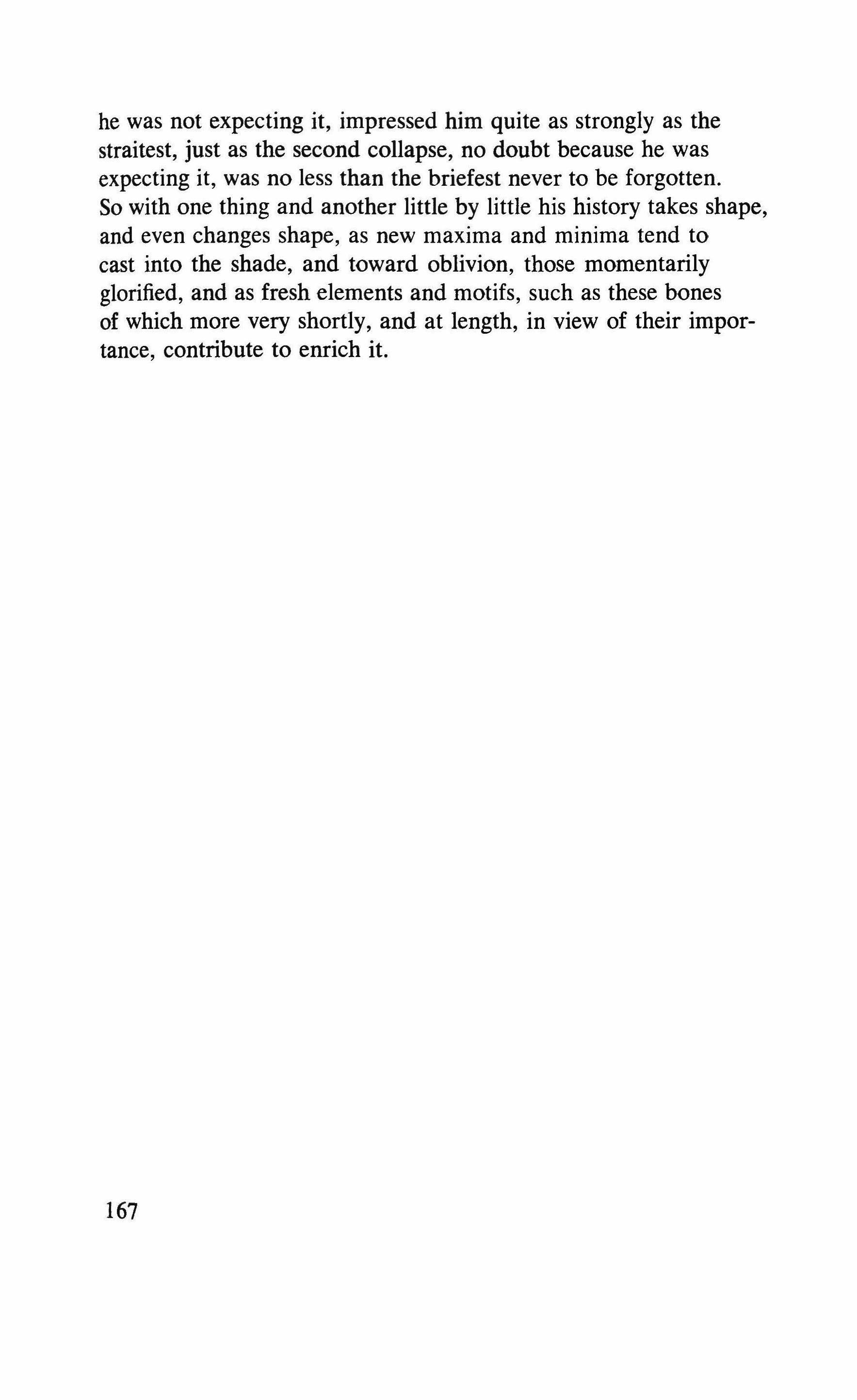
he was not expecting it, impressed him quite as strongly as the straitest, just as the second collapse, no doubt because he was expecting it, was no less than the briefest never to be forgotten. So with one thing and another little by little his history takes shape, and even changes shape, as new maxima and minima tend to cast into the shade, and toward oblivion, those momentarily glorified, and as fresh elements and motifs, such as these bones of which more very shortly, and at length, in view of their importance, contribute to enrich it.
167
The voice in the closet
Raymond Federman
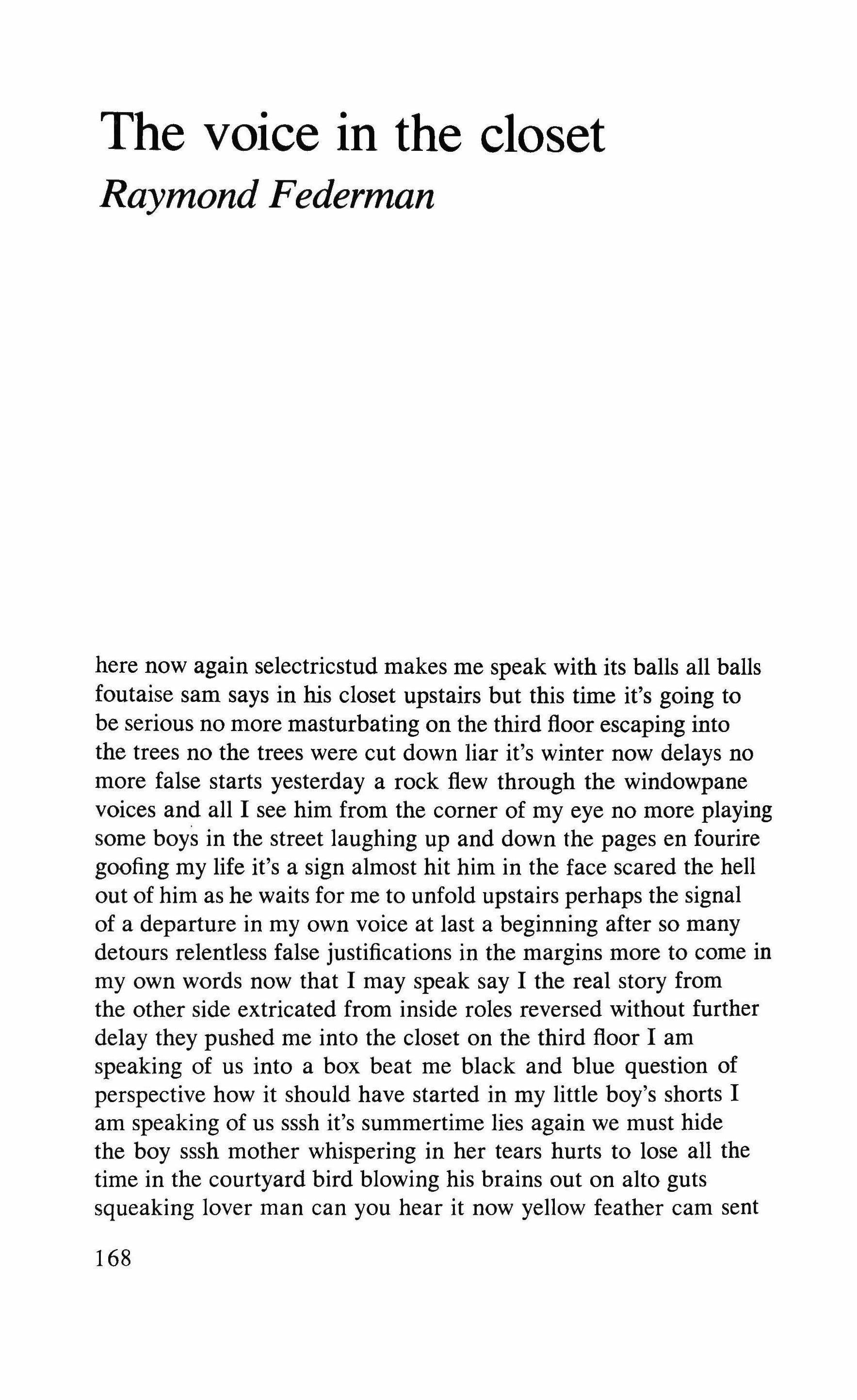
here now again selectricstud makes me speak with its balls all balls foutaise sam says in his closet upstairs but this time it's going to be serious no more masturbating on the third floor escaping into the trees no the trees were cut down liar it's winter now delays no more false starts yesterday a rock flew through the windowpane voices and all I see him from the corner of my eye no more playing some boys in the street laughing up and down the pages en fourire goofing my life it's a sign almost hit him in the face scared the hell out of him as he waits for me to unfold upstairs perhaps the signal of a departure in my own voice at last a beginning after so many detours relentless false justifications in the margins more to come in my own words now that I may speak say I the real story from the other side extricated from inside roles reversed without further delay they pushed me into the closet on the third floor I am speaking of us into a box beat me black and blue question of perspective how it should have started in my little boy's shorts I am speaking of us sssh it's summertime lies again we must hide the boy sssh mother whispering in her tears hurts to lose all the time in the courtyard bird blowing his brains out on alto guts squeaking lover man can you hear it now yellow feather cam sent
168
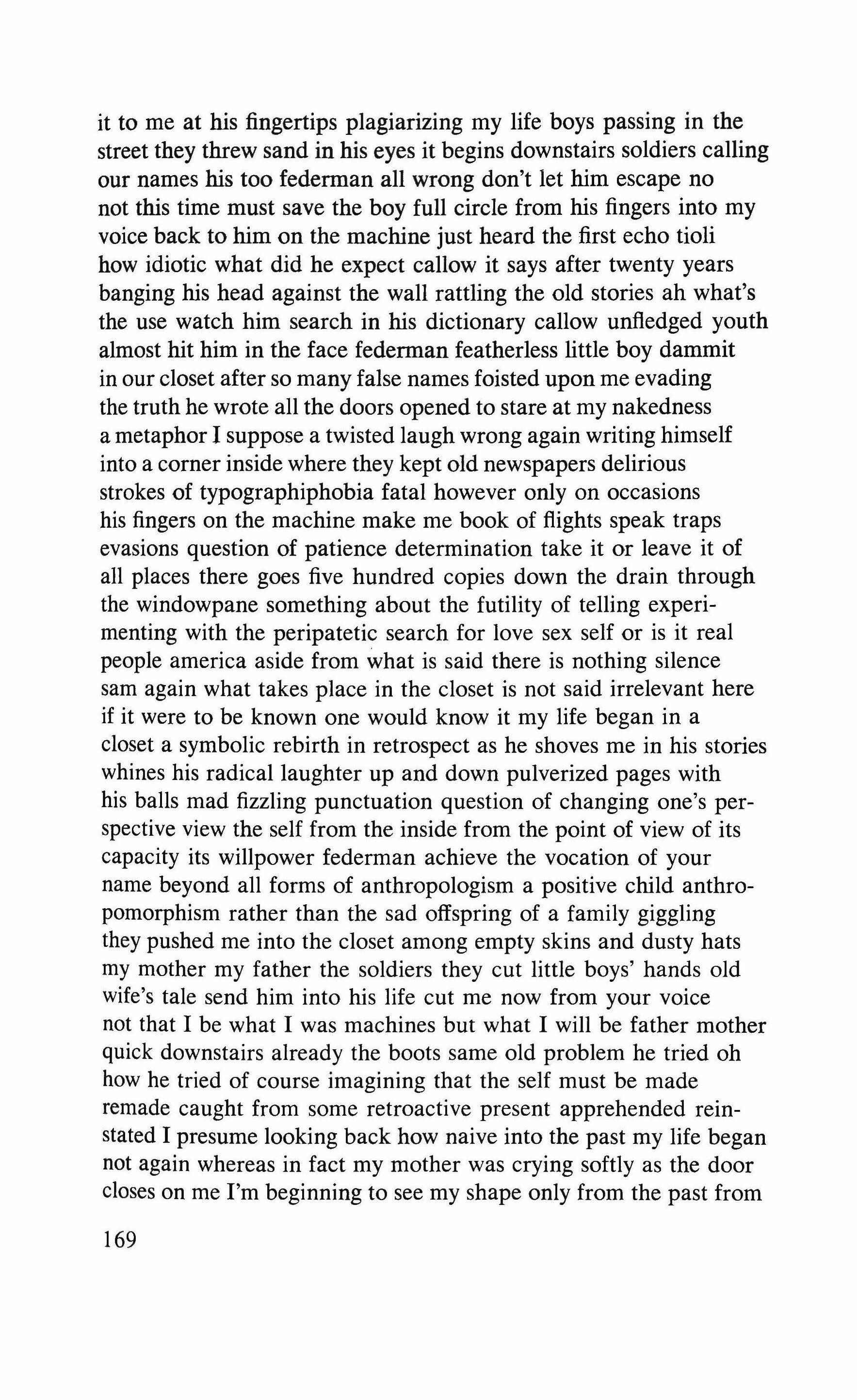
it to me at his fingertips plagiarizing my life boys passing in the street they threw sand in his eyes it begins downstairs soldiers calling our names his too federman all wrong don't let him escape no not this time must save the boy full circle from his fingers into my voice back to him on the machine just heard the first echo tioli how idiotic what did he expect callow it says after twenty years banging his head against the wall rattling the old stories ah what's the use watch him search in his dictionary callow unfledged youth almost hit him in the face federman featherless little boy dammit in our closet after so many false names foisted upon me evading the truth he wrote all the doors opened to stare at my nakedness a metaphor I suppose a twisted laugh wrong again writing himself into a corner inside where they kept old newspapers delirious strokes of typographiphobia fatal however only on occasions his fingers on the machine make me book of flights speak traps evasions question of patience determination take it or leave it of all places there goes five hundred copies down the drain through the windowpane something about the futility of telling experimenting with the peripatetic search for love sex self or is it real people america aside from what is said there is nothing silence sam again what takes place in the closet is not said irrelevant here if it were to be known one would know it my life began in a closet a symbolic rebirth in retrospect as he shoves me in his stories whines his radical laughter up and down pulverized pages with his balls mad fizzling punctuation question of changing one's perspective view the self from the inside from the point of view of its capacity its willpower federman achieve the vocation of your name beyond all forms of anthropologism a positive child anthropomorphism rather than the sad offspring of a family giggling they pushed me into the closet among empty skins and dusty hats my mother my father the soldiers they cut little boys' hands old wife's tale send him into his life cut me now from your voice not that I be what I was machines but what I will be father mother quick downstairs already the boots same old problem he tried oh how he tried of course imagining that the self must be made remade caught from some retroactive present apprehended reinstated I presume looking back how naive into the past my life began not again whereas in fact my mother was crying softly as the door closes on me I'm beginning to see my shape only from the past from
169
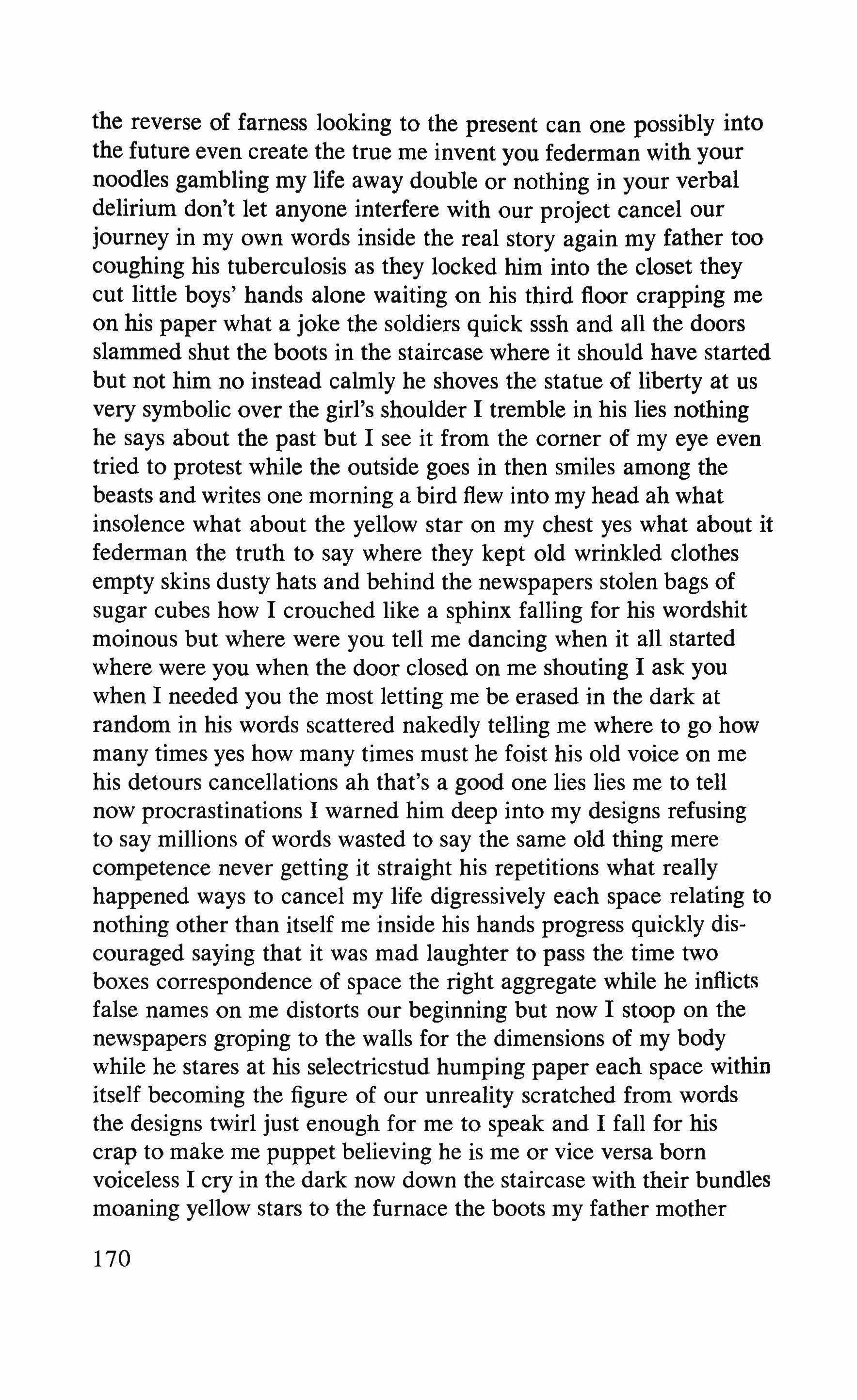
the reverse of farness looking to the present can one possibly into the future even create the true me invent you federman with your noodles gambling my life away double or nothing in your verbal delirium don't let anyone interfere with our project cancel our journey in my own words inside the real story again my father too coughing his tuberculosis as they locked him into the closet they cut little boys' hands alone waiting on his third floor crapping me on his paper what a joke the soldiers quick sssh and all the doors slammed shut the boots in the staircase where it should have started but not him no instead calmly he shoves the statue of liberty at us very symbolic over the girl's shoulder I tremble in his lies nothing he says about the past but I see it from the corner of my eye even tried to protest while the outside goes in then smiles among the beasts and writes one morning a bird flew into my head ah what insolence what about the yellow star on my chest yes what about it federman the truth to say where they kept old wrinkled clothes empty skins dusty hats and behind the newspapers stolen bags of sugar cubes how I crouched like a sphinx falling for his wordshit moinous but where were you tell me dancing when it all started where were you when the door closed on me shouting I ask you when I needed you the most letting me be erased in the dark at random in his words scattered nakedly telling me where to go how many times yes how many times must he foist his old voice on me his detours cancellations ah that's a good one lies lies me to tell now procrastinations I warned him deep into my designs refusing to say millions of words wasted to say the same old thing mere competence never getting it straight his repetitions what really happened ways to cancel my life digressively each space relating to nothing other than itself me inside his hands progress quickly discouraged saying that it was mad laughter to pass the time two boxes correspondence of space the right aggregate while he inflicts false names on me distorts our beginning but now I stoop on the newspapers groping to the walls for the dimensions of my body while he stares at his selectricstud humping paper each space within itself becoming the figure of our unreality scratched from words the designs twirl just enough for me to speak and I fall for his crap to make me puppet believing he is me or vice versa born voiceless I cry in the dark now down the staircase with their bundles moaning yellow stars to the furnace the boots my father mother
170
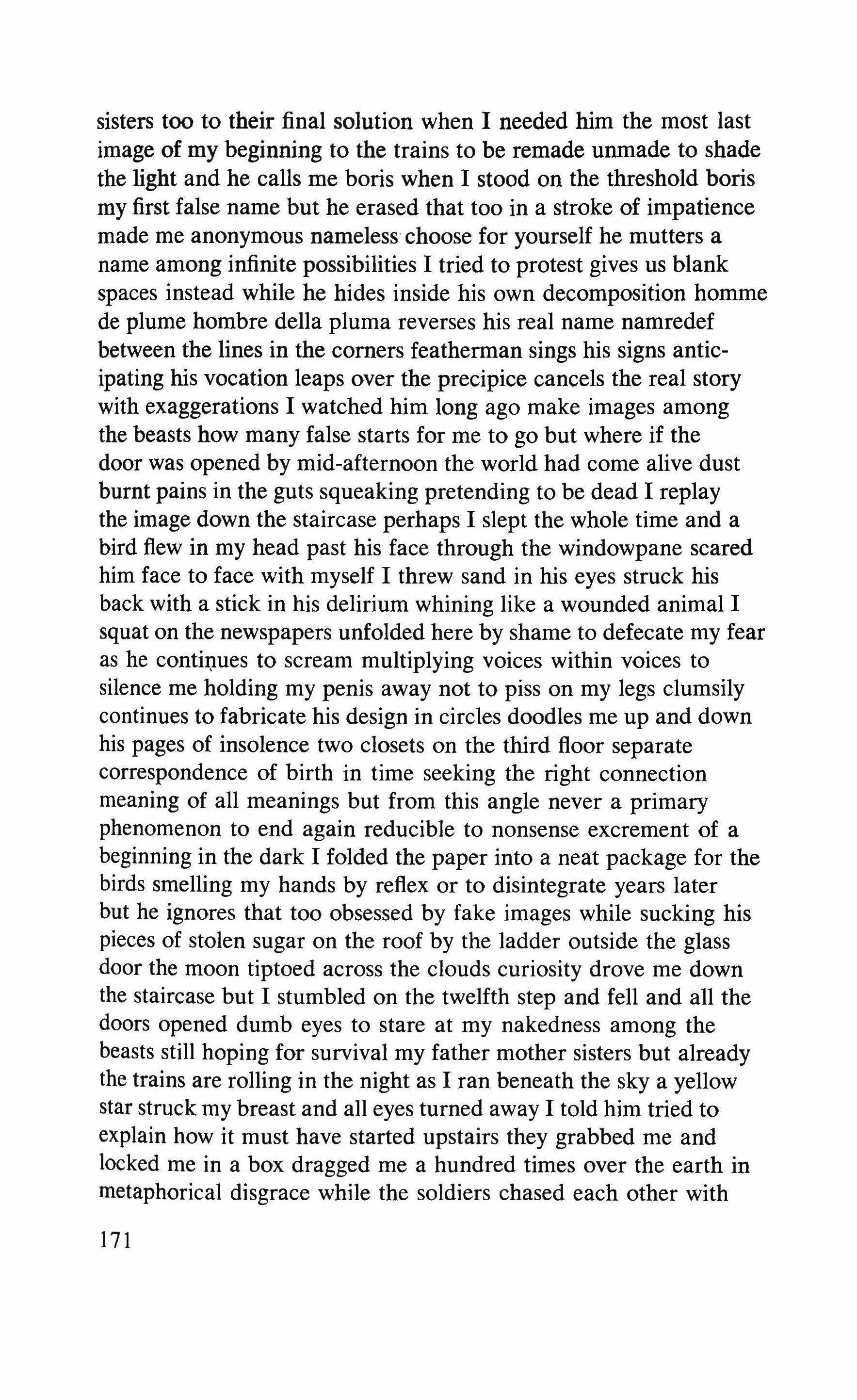
sisters too to their final solution when I needed him the most last image of my beginning to the trains to be remade unmade to shade the light and he calls me boris when I stood on the threshold boris my first false name but he erased that too in a stroke of impatience made me anonymous nameless choose for yourself he mutters a name among infinite possibilities I tried to protest gives us blank spaces instead while he hides inside his own decomposition homme de plume hombre della pluma reverses his real name namredef between the lines in the comers featherman sings his signs anticipating his vocation leaps over the precipice cancels the real story with exaggerations I watched him long ago make images among the beasts how many false starts for me to go but where if the door was opened by mid-afternoon the world had come alive dust burnt pains in the guts squeaking pretending to be dead I replay the image down the staircase perhaps I slept the whole time and a bird flew in my head past his face through the windowpane scared him face to face with myself I threw sand in his eyes struck his back with a stick in his delirium whining like a wounded animal I squat on the newspapers unfolded here by shame to defecate my fear as he continues to scream multiplying voices within voices to silence me holding my penis away not to piss on my legs clumsily continues to fabricate his design in circles doodles me up and down his pages of insolence two closets on the third floor separate correspondence of birth in time seeking the right connection meaning of all meanings but from this angle never a primary phenomenon to end again reducible to nonsense excrement of a beginning in the dark I folded the paper into a neat package for the birds smelling my hands by reflex or to disintegrate years later but he ignores that too obsessed by fake images while sucking his pieces of stolen sugar on the roof by the ladder outside the glass door the moon tiptoed across the clouds curiosity drove me down the staircase but I stumbled on the twelfth step and fell and all the doors opened dumb eyes to stare at my nakedness among the beasts still hoping for survival my father mother sisters but already the trains are rolling in the night as I ran beneath the sky a yellow star struck my breast and all eyes turned away I told him tried to explain how it must have started upstairs they grabbed me and locked me in a box dragged me a hundred times over the earth in metaphorical disgrace while the soldiers chased each other with
171

stones in their hands and burned all the stars in a furnace my survival a mistake he cannot accept forces him to begin conditionally by another form of sequestration pretends to lock himself in a room with the if of my existence the story told in laughter but it resists and recites first the displacement of its displacements leaving me on the threshold staring dumbfounded at the statue of liberty over the girl's shoulder question of selecting the proper beginning he claims then drags me into the subway to stare in guilt again between a woman's legs at the triangular cunt of america leads me down the corridor to masturbate his substitution instead of giving me an original experience to deceive the absence of a woman's hand makes believe that I am dead twelve years old when they left me in the primordial closet moment upstairs on the third floor with the old newspapers empty skins seeking unknown pleasure which is only an amorphous substitution thinking that memory is innocent always tells the truth while cheating the original experience the first gesture a hand reaching for the walls to find its proper place since he failed to generate the real story in vain situates me in the wrong abode as I turn in a void in his obligation to assign a beginning however sad it may be to my residence here before memory had a source so that it may unfold according to a temporal order a spatial displacement made of words inside his noodling complexities of plagiaristic form I was dead he thinks skips me but I am being given birth into death beyond the open door such is my condition the feet are clear already of the great cunt of existence backward my head will be last to come out on the paper spread your arms voices shout behind the walls I can't but the teller rants my story again and I am alive promising situation I am my beginning in this strange gestation I say I for the first time as he gesticulates in his room surrounded by his madness having once more succeeded in assembling singlehandedly the carbon design of my life as I remember the first sound heard in this place when I said I to invent an origin for myself before crumbling into his nonsense on the edge of the precipice leaning against the wind after I placed my filthy package on the roof its warmth still on my hands far away the empty skins already remade into lampshades past moments old dreams I am back again in the actuality of my fragile predicament backtracked into false ambiguities smelling my hands by reflex out of the closet now to affirm the certainty of
172
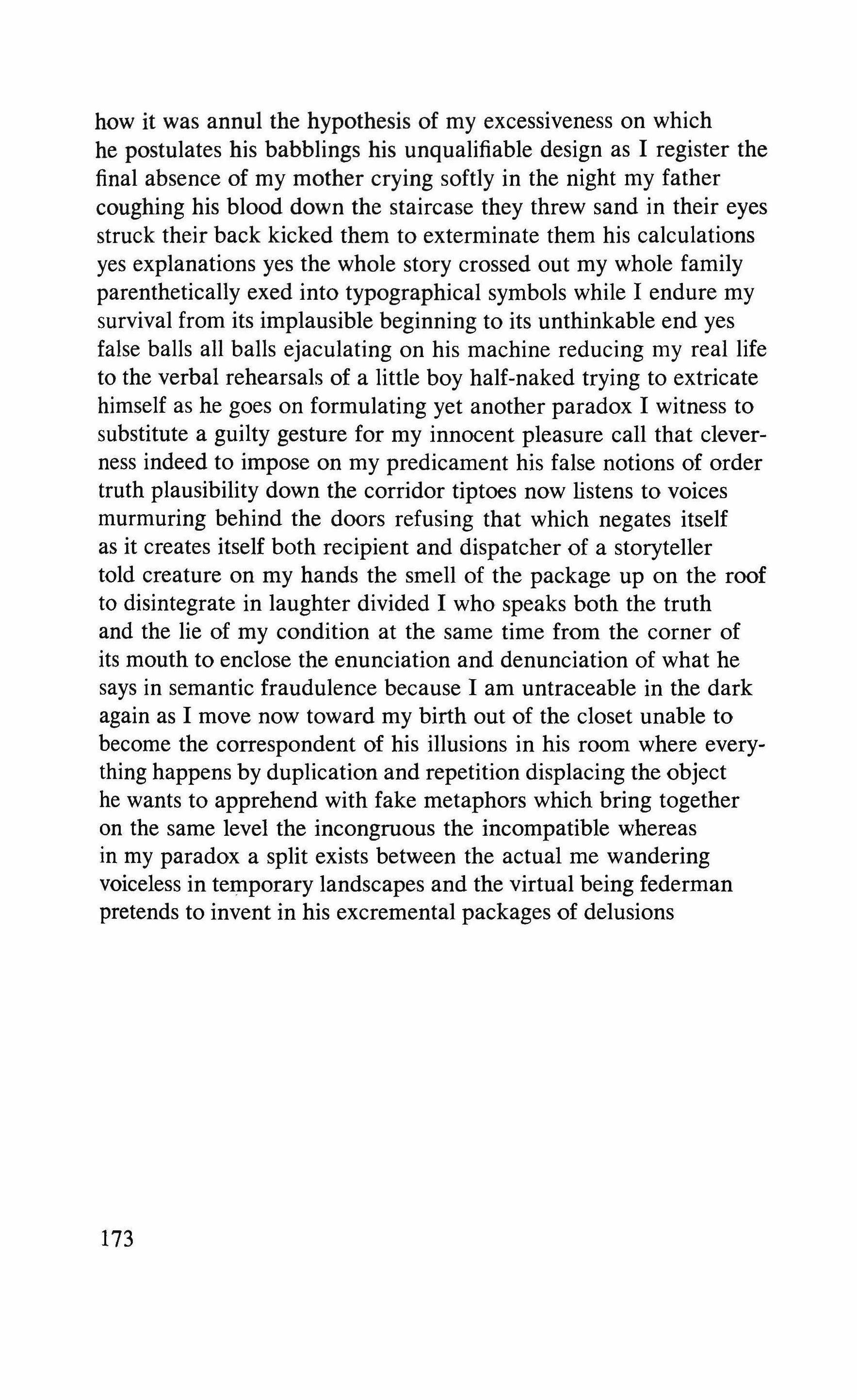
how it was annul the hypothesis of my excessiveness on which he postulates his babblings his unqualifiable design as I register the final absence of my mother crying softly in the night my father coughing his blood down the staircase they threw sand in their eyes struck their back kicked them to exterminate them his calculations yes explanations yes the whole story crossed out my whole family parenthetically exed into typographical symbols while I endure my survival from its implausible beginning to its unthinkable end yes false balls all balls ejaculating on his machine reducing my real life to the verbal rehearsals of a little boy half-naked trying to extricate himself as he goes on formulating yet another paradox I witness to substitute a guilty gesture for my innocent pleasure call that cleverness indeed to impose on my predicament his false notions of order truth plausibility down the corridor tiptoes now listens to voices murmuring behind the doors refusing that which negates itself as it creates itself both recipient and dispatcher of a storyteller told creature on my hands the smell of the package up on the roof to disintegrate in laughter divided I who speaks both the truth and the lie of my condition at the same time from the corner of its mouth to enclose the enunciation and denunciation of what he says in semantic fraudulence because I am untraceable in the dark again as I move now toward my birth out of the closet unable to become the correspondent of his illusions in his room where everything happens by duplication and repetition displacing the object he wants to apprehend with fake metaphors which bring together on the same level the incongruous the incompatible whereas in my paradox a split exists between the actual me wandering voiceless in temporary landscapes and the virtual being federman pretends to invent in his excremental packages of delusions
173
Joh joseph's beAuty
Mouth, sing mim.
look at lokman! whatbEtween the cupgirlS and the platterboys.
Juke dOne it. in his perrY boat the old thalassoCrats of invinsiblE empores,
368 as the Just hAs bid of quaraM on thE mug k. c. jowlS, they're with the atlas Jacket. brOwnie eYes in bluesaCkin shoEings.
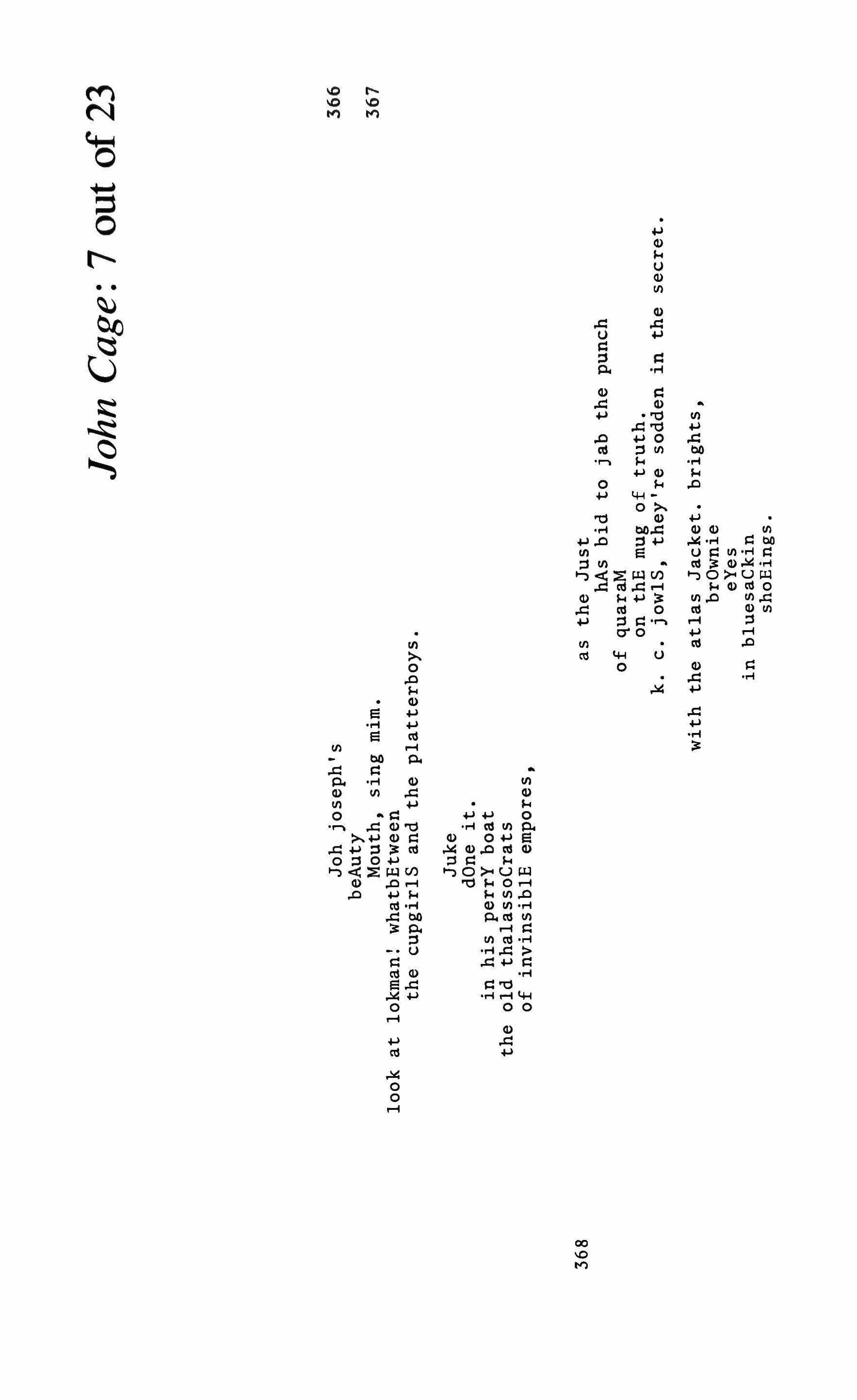
Jiff exby rode, Adding the tout last Mannarks makEth man when wandShift winneth womans:
Jeremy trOuvas or kepin o'keepers, anY old howe and any old then Courcy dE courcy and gilligan-goll.
Jeremy yopp, frAncist de looMis, hardy smith and sEquin pettit followed by the Snug saloon seanad of our
Jameseslane.
wife which begame his niece by pOuring her Youngthings into skintighs. it Crops out in your flEsh.
Just press this cold brAnd against your brow for a Mow. cainfully!
thE Sinus the curse. that's it.
kick killykick for the house that Juke built! wait till they send yOu to sleep, scowpow! then old hunphYdunphyville'll be blasten to bumboards it's all us rangers you'll be faCing in thE box before the twelfth correctional.
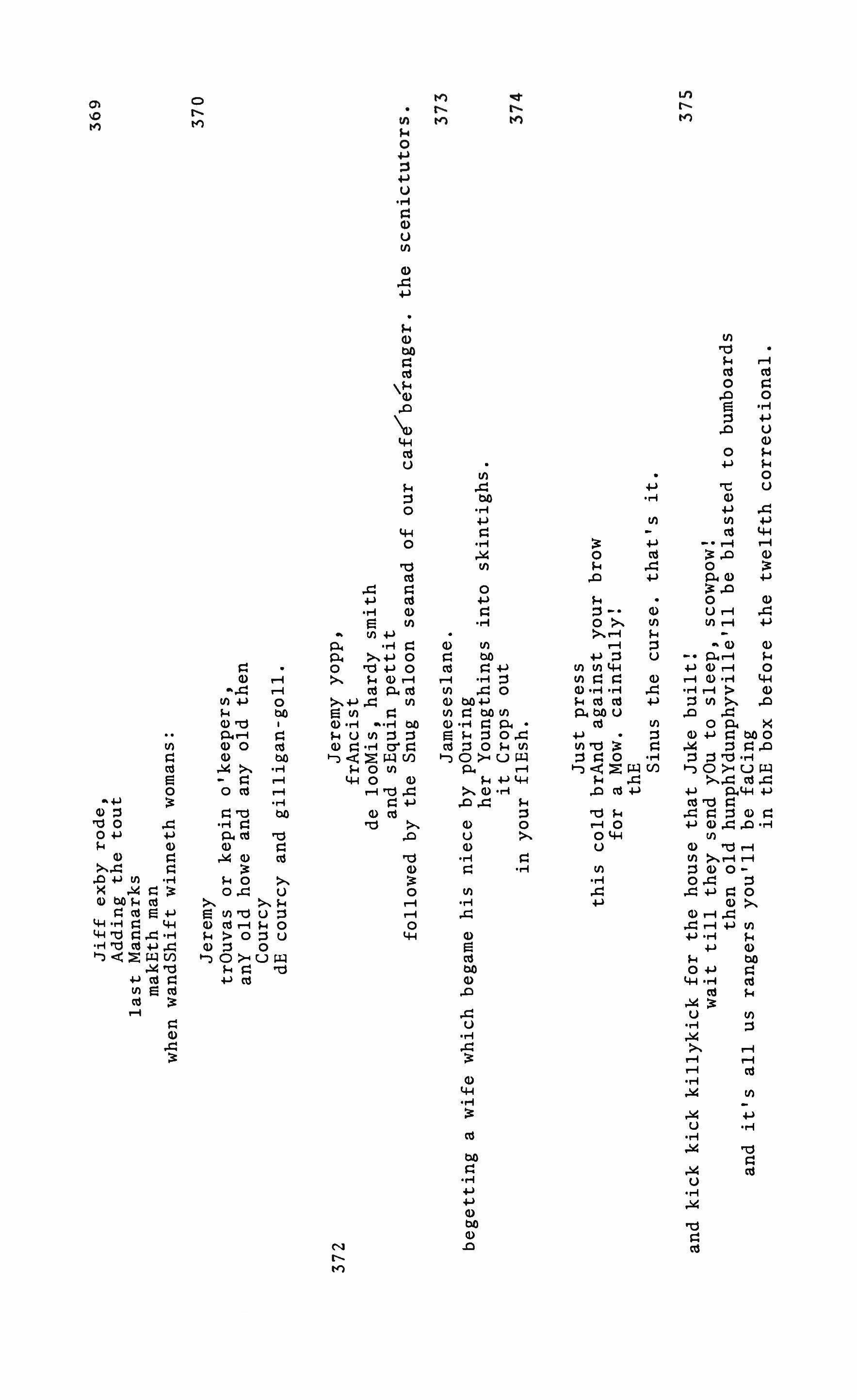
the
caf�beranger.
Jik. sAuss.
Just hold hAnd, richMond rovEr!
Scrum around, our side!
sporting the insides of a rhutian Jhanaral and little mrs ex-skaerer-sissers is bribing the halfpricers to praY in berkness Cirrchus clouthsEs.
unclish aMs thEy make oom. looSe's gone good Jump, pOwell ! hurrY.
own Club too.
thE fistful of burryberries were for the massus for to feed you living in dying.
feeling the Jitters? you'll be As tight as trivett diaMindwaiting. what a magnificEnt geSture you will show us this gallus day.
mr Justinian jOhnston-johnson. help, help, hurraY! Cut it down, matEs, look slippy!
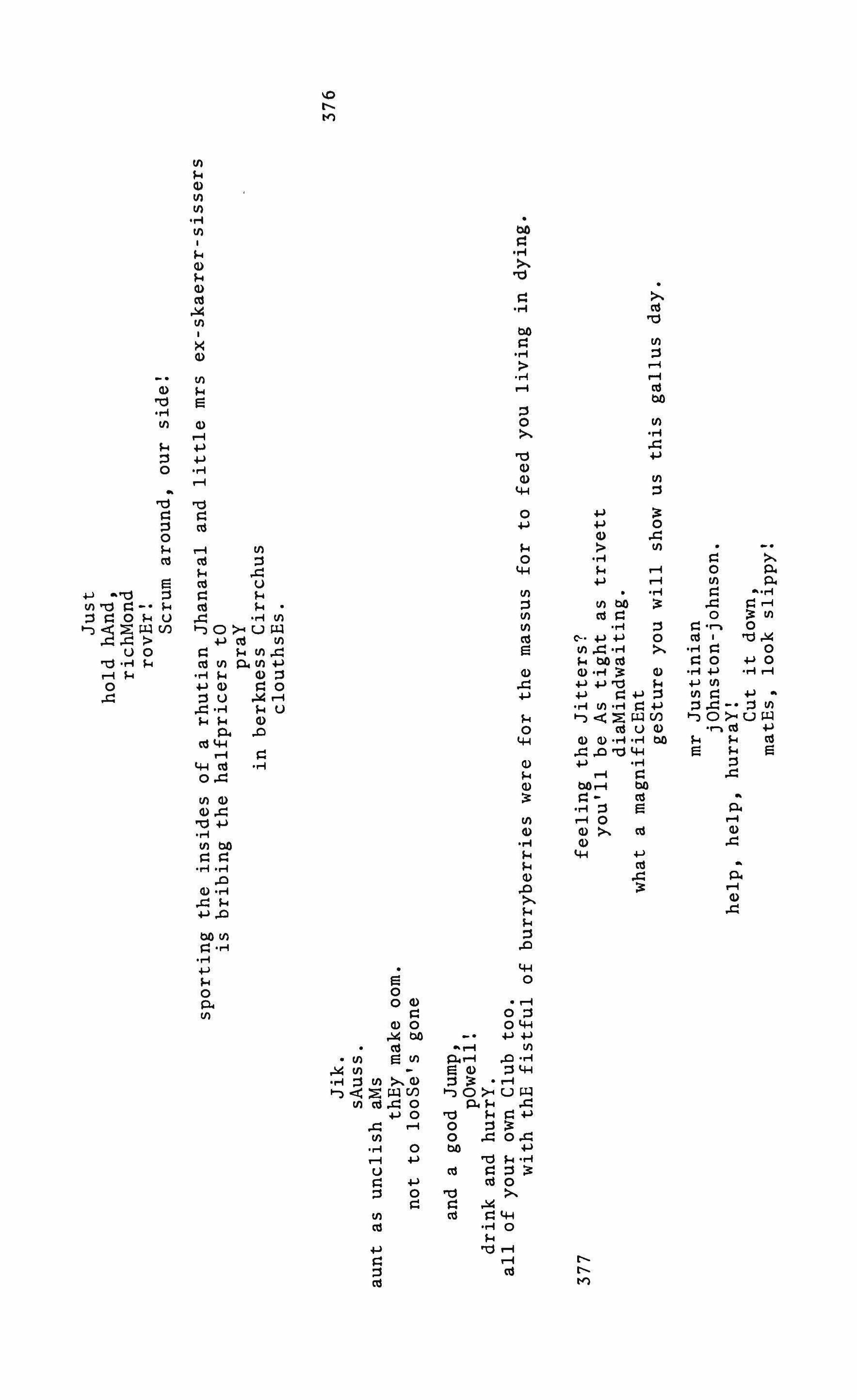
no wonder, pipes As kiries, that he sthings like a rheinbok. one bed night he had the delysiuMs that thEy were all queenS mobbing him. it Just gegs Our goad. he'll be the deaf of us, pappappoppopcuddle, samblind daiYrudder. none of you, Cock icy! you kEep that henayearn and hev fortycantle
for the Jolly good reAson that he was the whiloM joky old top that wEnt before him in the taharan dynaSty, he Just went heeltapping thrOugh the winespilth and weevilY popCorks that wEre kneedeep round his own right
his most exuberant majesty king roderick o'conor but, Arrah bedaMnbut, hE finaliSed by lowering his woolly throat that halibut oil or Jesuits tea, as a fall back, Of several different quantities and qualities i should saY, horihistoriCold and fathEr
he Just slumped to throne. so sAiled the stout ship nansy hans. froM liff away. for nattEnlaender. as who has come returns.
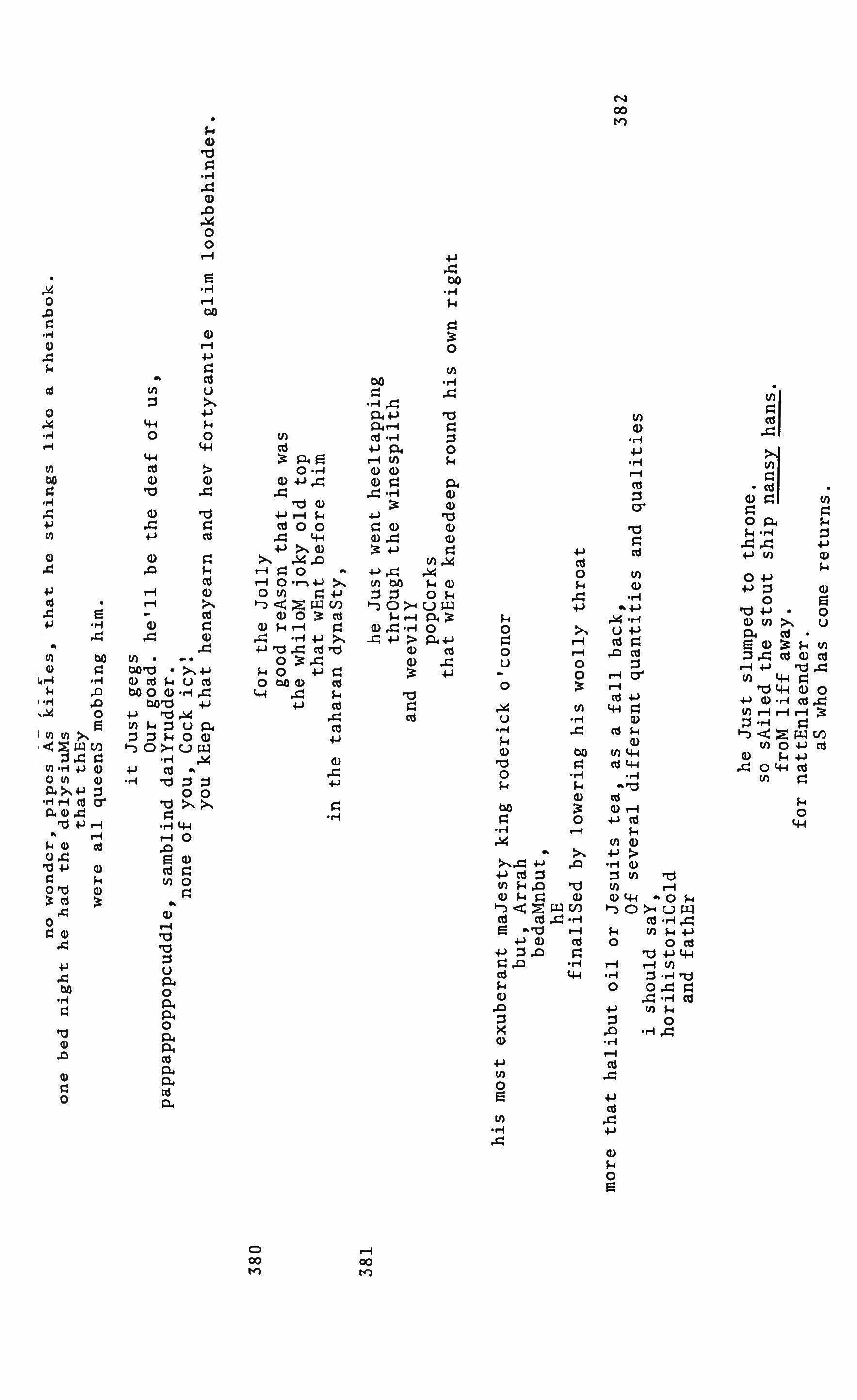
glim
3 wroth with twone nathandJoe. rot A peck of pa's Malt had jhEm or Shen entailed the pftJschute Of finnegan, that the humptYhillhead is at the knoCk out in thE park or at the end: 626 my lips went livid for from like how you'd the sprint in spank 627 or make a cyclic return: 627 Just A May i bE wrong: for She'll be sweet for you as i was sweet when 3 Jhem Or shen brewed by arclight and rorY end t�Toug�.����Ti.stian
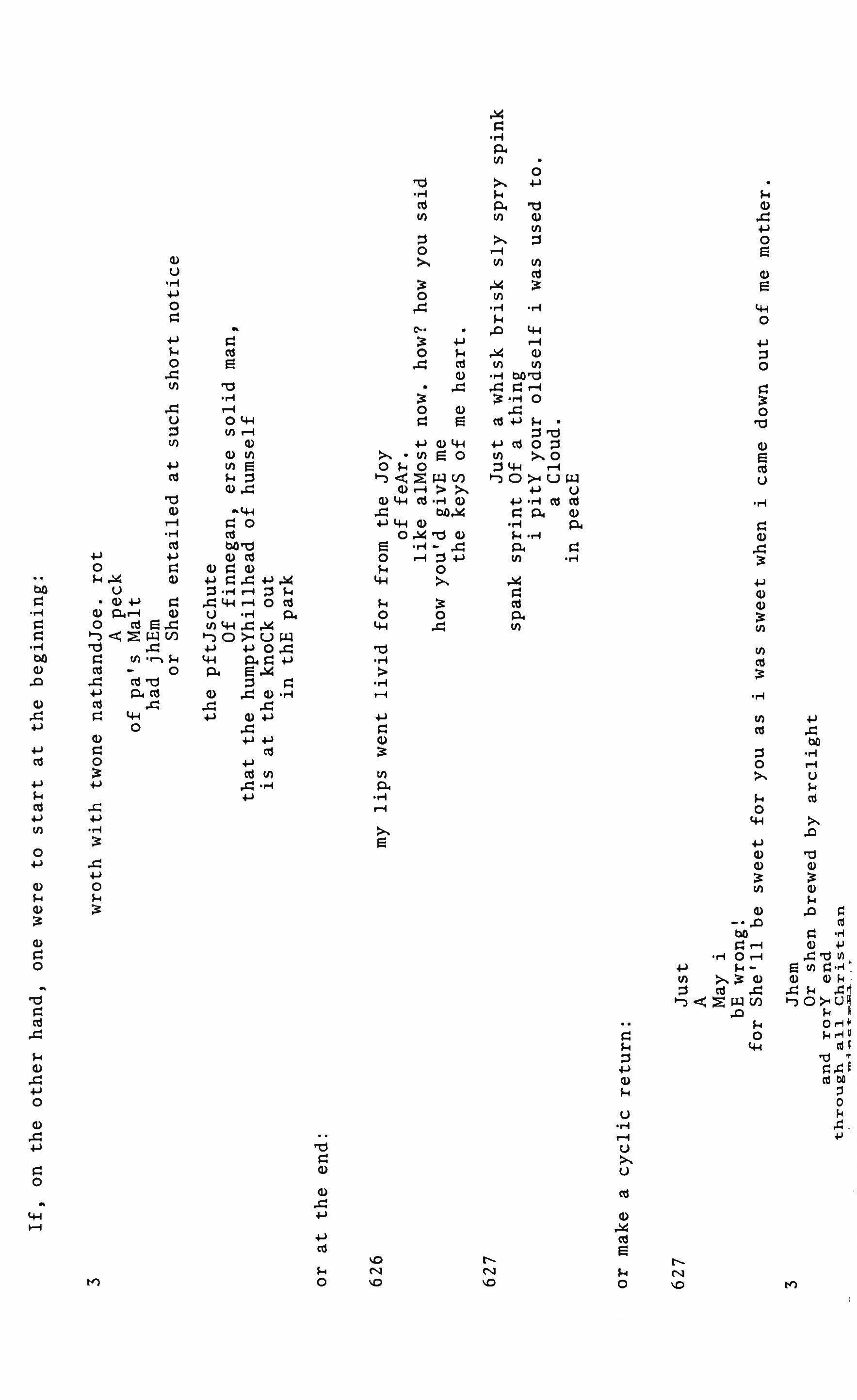
on the other
to start
beginning:
If,
hand, one were
at the
O'Mara of no fixed abode
Gilbert Sorrentino
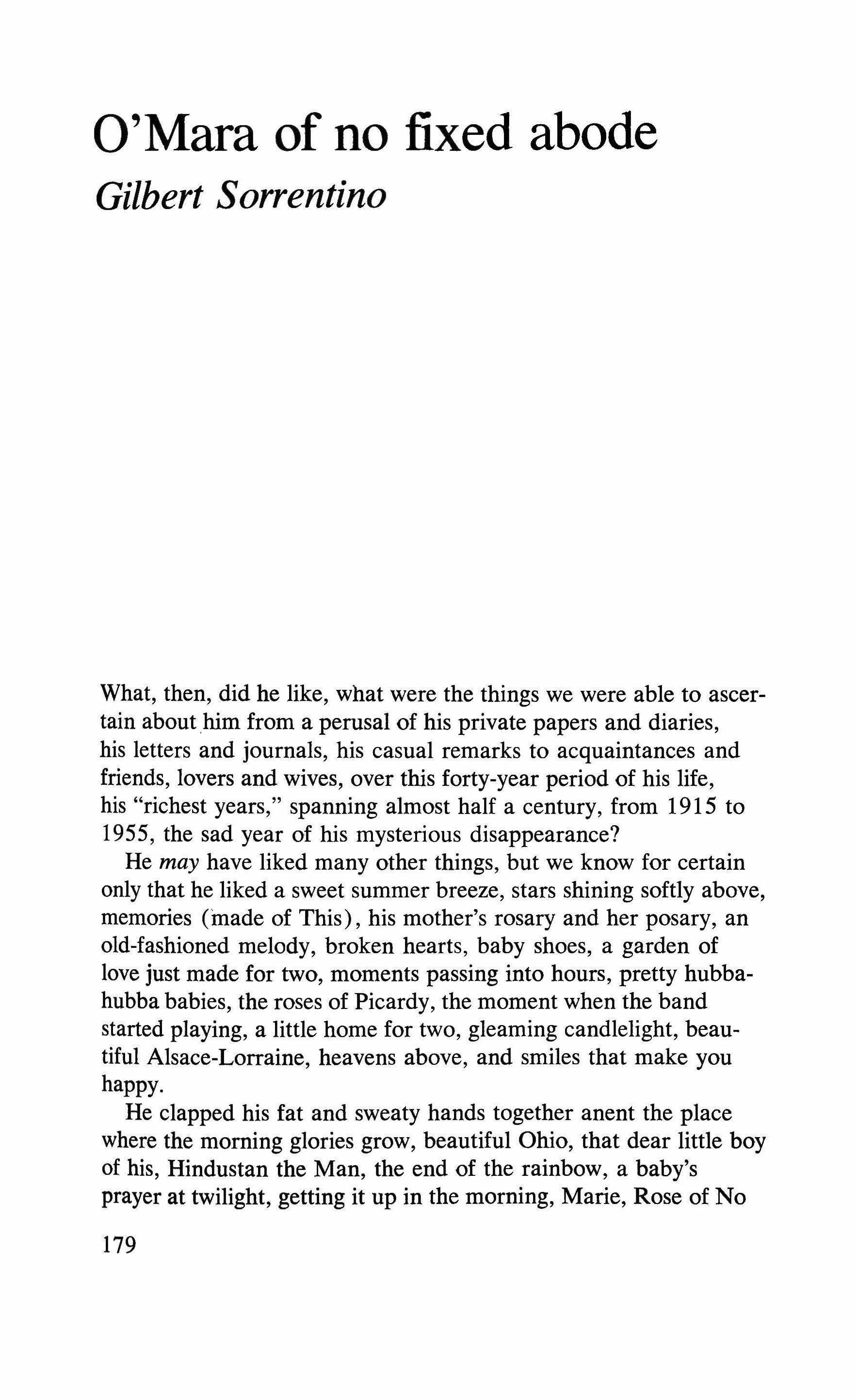
What, then, did he like, what were the things we were able to ascertain about him from a perusal of his private papers and diaries, his letters and journals, his casual remarks to acquaintances and friends, lovers and wives, over this forty-year period of his life, his "richest years," spanning almost half a century, from 1915 to 1955, the sad year of his mysterious disappearance?
He may have liked many other things, but we know for certain only that he liked a sweet summer breeze, stars shining softly above, memories (made of This), his mother's rosary and her posary, an old-fashioned melody, broken hearts, baby shoes, a garden of love just made for two, moments passing into hours, pretty hubbahubba babies, the roses of Picardy, the moment when the band started playing, a little home for two, gleaming candlelight, beautiful Alsace-Lorraine, heavens above, and smiles that make you happy.
He clapped his fat and sweaty hands together anent the place where the morning glories grow, beautiful Ohio, that dear little boy of his, Hindustan the Man, the end of the rainbow, a baby's prayer at twilight, getting it up in the morning, Marie, Rose of No
179
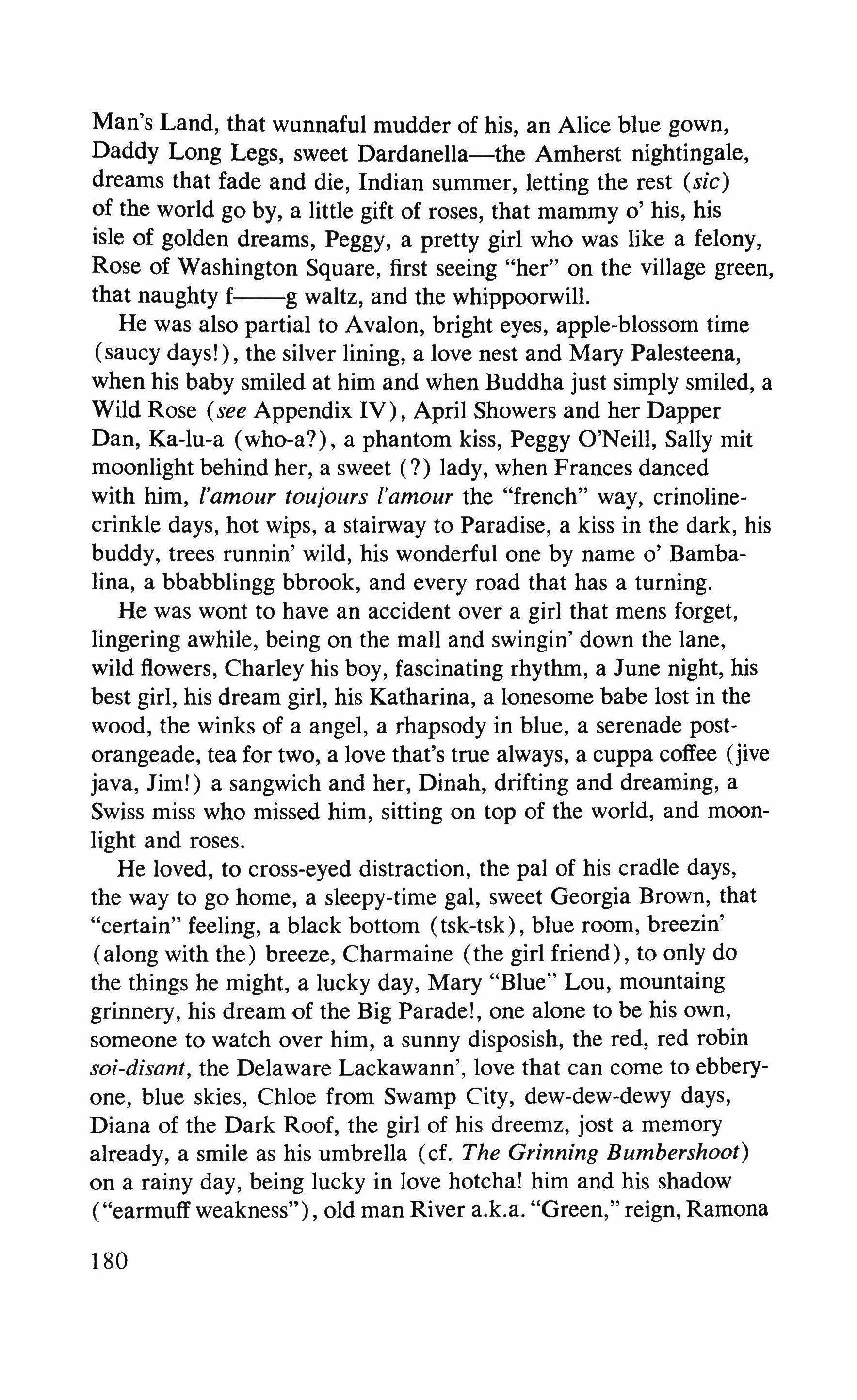
Man's Land, that wunnaful mudder of his, an Alice blue gown, Daddy Long Legs, sweet Dardanella-the Amherst nightingale, dreams that fade and die, Indian summer, letting the rest (sic) of the world go by, a little gift of roses, that mammy 0' his, his isle of golden dreams, Peggy, a pretty girl who was like a felony, Rose of Washington Square, first seeing "her" on the village green, that naughty f--g waltz, and the whippoorwill.
He was also partial to Avalon, bright eyes, apple-blossom time (saucy days!), the silver lining, a love nest and Mary Palesteena, when his baby smiled at him and when Buddha just simply smiled, a Wild Rose (see Appendix IV), April Showers and her Dapper Dan, Ka-lu-a (who-a?), a phantom kiss, Peggy O'Neill, Sally mit moonlight behind her, a sweet (?) lady, when Frances danced with him, l'amour toujours l'amour the "french" way, crinolinecrinkle days, hot wips, a stairway to Paradise, a kiss in the dark, his buddy, trees runnin' wild, his wonderful one by name 0' Bambalina, a bbabblingg bbrook, and every road that has a turning.
He was wont to have an accident over a girl that mens forget, lingering awhile, being on the mall and swingin' down the lane, wild flowers, Charley his boy, fascinating rhythm, a June night, his best girl, his dream girl, his Katharina, a lonesome babe lost in the wood, the winks of a angel, a rhapsody in blue, a serenade postorangeade, tea for two, a love that's true always, a cuppa coffee (jive java, Jim!) a sangwich and her, Dinah, drifting and dreaming, a Swiss miss who missed him, sitting on top of the world, and moonlight and roses.
He loved, to cross-eyed distraction, the pal of his cradle days, the way to go home, a sleepy-time gal, sweet Georgia Brown, that "certain" feeling, a black bottom (tsk-tsk) blue room, breezin' (along with the) breeze, Charmaine (the girl friend), to only do the things he might, a lucky day, Mary "Blue" Lou, mountaing grinnery, his dream of the Big Parade!, one alone to be his own, someone to watch over him, a sunny disposish, the red, red robin soi-disant, the Delaware Lackawann', love that can come to ebberyone, blue skies, Chloe from Swamp City, dew-dew-dewy days, Diana of the Dark Roof, the girl of his dreemz, jost a memory already, a smile as his umbrella (cf. The Grinning Bumbershoot) on a rainy day, being lucky in love hotcha! him and his shadow ("earmuff weakness"), old man River a.k.a. "Green," reign, Ramona
180
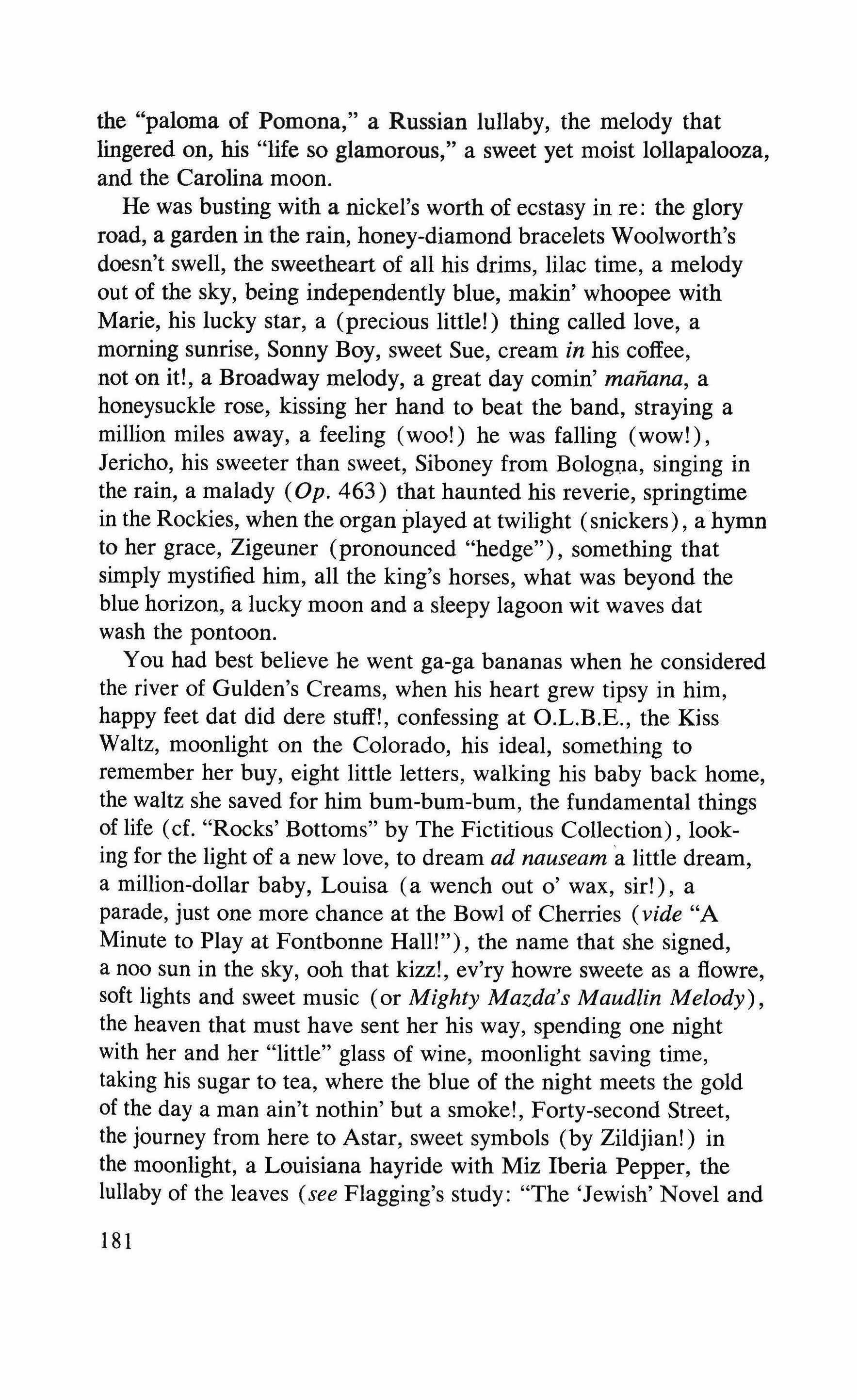
the "paloma of Pomona," a Russian lullaby, the melody that lingered on, his "life so glamorous," a sweet yet moist lollapalooza, and the Carolina moon.
He was busting with a nickel's worth of ecstasy in re: the glory road, a garden in the rain, honey-diamond bracelets Woolworth's doesn't swell, the sweetheart of all his drims, lilac time, a melody out of the sky, being independently blue, makin' whoopee with Marie, his lucky star, a (precious little!) thing called love, a morning sunrise, Sonny Boy, sweet Sue, cream in his coffee, not on it!, a Broadway melody, a great day comin' manana, a honeysuckle rose, kissing her hand to beat the band, straying a million miles away, a feeling (woo!) he was falling (wow!), Jericho, his sweeter than sweet, Siboney from Bologna, singing in the rain, a malady (Op. 463) that haunted his reverie, springtime in the Rockies, when the organ played at twilight (snickers), a hymn to her grace, Zigeuner (pronounced "hedge"), something that simply mystified him, all the king's horses, what was beyond the blue horizon, a lucky moon and a sleepy lagoon wit waves dat wash the pontoon.
You had best believe he went ga-ga bananas when he considered the river of Gulden's Creams, when his heart grew tipsy in him, happy feet dat did dere stuff!, confessing at O.L.B.E., the Kiss Waltz, moonlight on the Colorado, his ideal, something to remember her buy, eight little letters, walking his baby back home, the waltz she saved for him bum-burn-bum, the fundamental things of life (cf. "Rocks' Bottoms" by The Fictitious Collection), looking for the light of a new love, to dream ad nauseam a little dream, a million-dollar baby, Louisa (a wench out 0' wax, sir!), a parade, just one more chance at the Bowl of Cherries (vide "A Minute to Play at Fontbonne Hall!"), the name that she signed, a noo sun in the sky, ooh that kizz!, ev'ry howre sweete as a flowre, soft lights and sweet music (or Mighty Mazda's Maudlin Melody), the heaven that must have sent her his way, spending one night with her and her "little" glass of wine, moonlight saving time, taking his sugar to tea, where the blue of the night meets the gold of the day a man ain't nothin' but a smoke!, Forty-second Street, the journey from here to Astar, sweet symbols (by Zildjian!) in the moonlight, a Louisiana hayride with Miz Iberia Pepper, the lullaby of the leaves (see Flagging's study: "The 'Jewish' Novel and 181
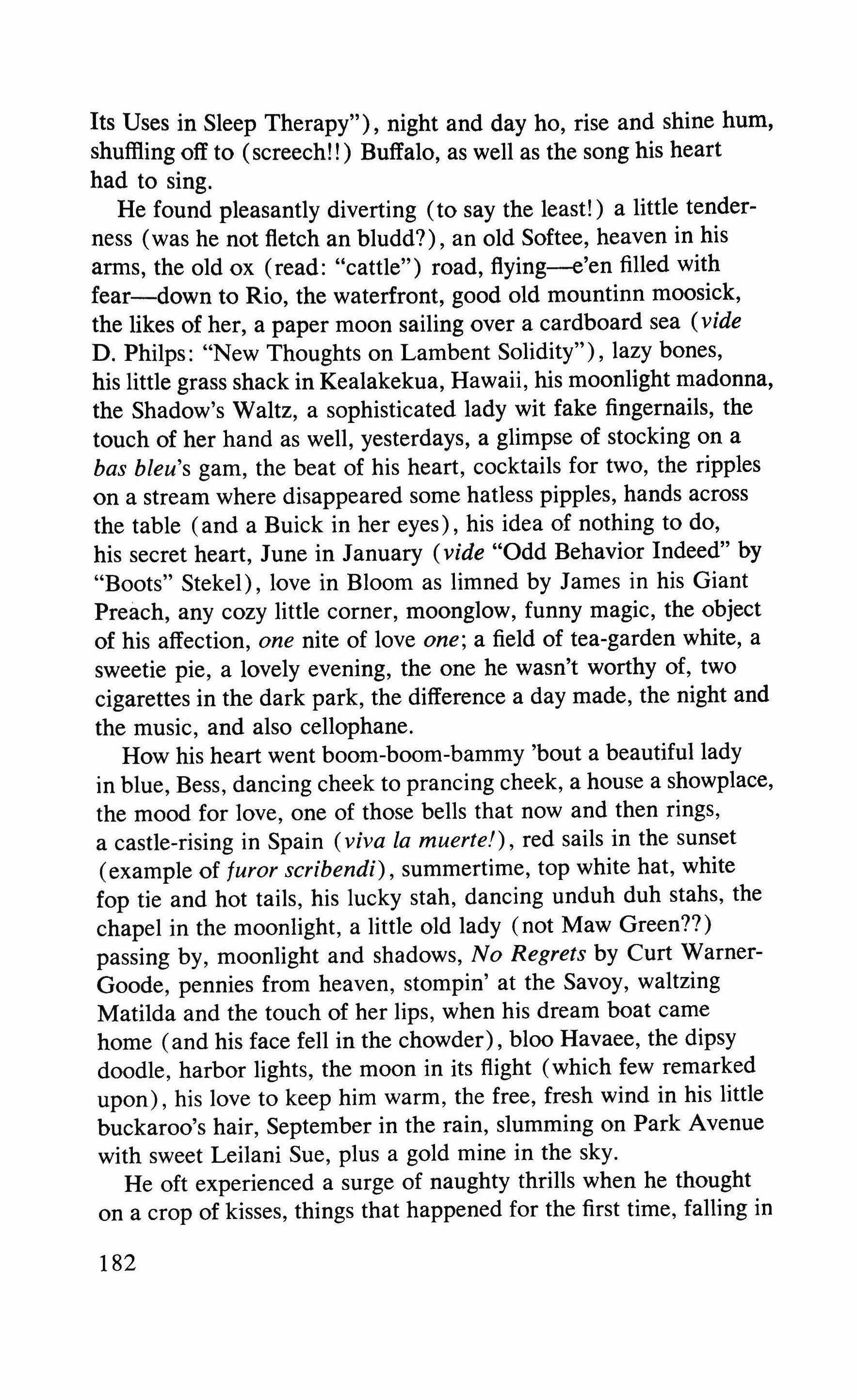
Its Uses in Sleep Therapy"), night and day ho, rise and shine hum, shuffling off to (screech!!) Buffalo, as well as the song his heart had to sing.
He found pleasantly diverting (to say the least!) a little tenderness (was he not fletch an bludd?), an old Softee, heaven in his arms, the old ox (read: "cattle") road, flying--e'en filled with fear-down to Rio, the waterfront, good old mountinn moosick, the likes of her, a paper moon sailing over a cardboard sea (vide D. Philps: "New Thoughts on Lambent Solidity"), lazy bones, his little grass shack in Kealakekua, Hawaii, his moonlight madonna, the Shadow's Waltz, a sophisticated lady wit fake fingernails, the touch of her hand as well, yesterdays, a glimpse of stocking on a bas bleu's gam, the beat of his heart, cocktails for two, the ripples on a stream where disappeared some hatless pipples, hands across the table (and a Buick in her eyes), his idea of nothing to do, his secret heart, June in January (vide "Odd Behavior Indeed" by "Boots" Stekel), love in Bloom as limned by James in his Giant Preach, any cozy little corner, moonglow, funny magic, the object of his affection, one nite of love one; a field of tea-garden white, a sweetie pie, a lovely evening, the one he wasn't worthy of, two cigarettes in the dark park, the difference a day made, the night and the music, and also cellophane.
How his heart went boom-boom-bammy 'bout a beautiful lady in blue, Bess, dancing cheek to prancing cheek, a house a showplace, the mood for love, one of those bells that now and then rings, a castle-rising in Spain (viva la muerte!), red sails in the sunset (example of furor scribendiy, summertime, top white hat, white fop tie and hot tails, his lucky stah, dancing unduh duh stahs, the chapel in the moonlight, a little old lady (not Maw Green??) passing by, moonlight and shadows, No Regrets by Curt WarnerGoode, pennies from heaven, stompin' at the Savoy, waltzing Matilda and the touch of her lips, when his dream boat came home (and his face fell in the chowder), bloo Havaee, the dipsy doodle, harbor lights, the moon in its flight (which few remarked upon), his love to keep him warm, the free, fresh wind in his little buckaroo's hair, September in the rain, slumming on Park Avenue with sweet Leilani Sue, plus a gold mine in the sky.
He oft experienced a surge of naughty thrills when he thought on a crop of kisses, things that happened for the first time, falling in
182
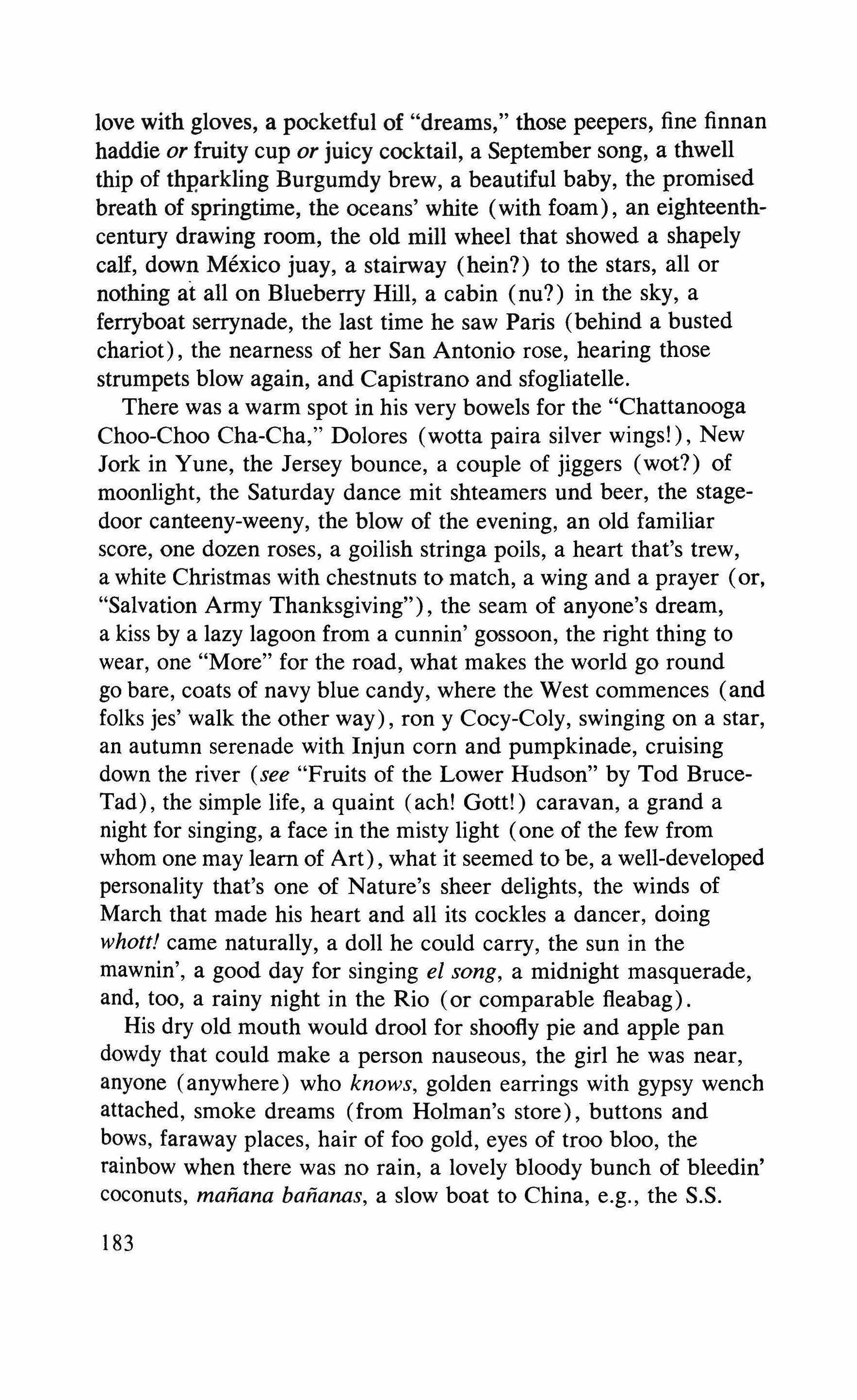
love with gloves, a pocketful of "dreams," those peepers, fine finnan haddie or fruity cup or juicy cocktail, a September song, a thwell thip of thparkling Burgumdy brew, a beautiful baby, the promised breath of springtime, the oceans' white (with foam), an eighteenthcentury drawing room, the old mill wheel that showed a shapely calf, down Mexico juay, a stairway (hein?) to the stars, all or nothing at all on Blueberry Hill, a cabin (nu?) in the sky, a ferryboat serrynade, the last time he saw Paris (behind a busted chariot), the nearness of her San Antonio rose, hearing those strumpets blow again, and Capistrano and sfogliatelle.
There was a warm spot in his very bowels for the "Chattanooga Choo-Choo Cha-Cha," Dolores (wotta paira silver wings!), New Jork in Yune, the Jersey bounce, a couple of jiggers (wot?) of moonlight, the Saturday dance mit shteamers und beer, the stagedoor canteeny-weeny, the blow of the evening, an old familiar score, one dozen roses, a goilish stringa poils, a heart that's trew, a white Christmas with chestnuts to match, a wing and a prayer (or, "Salvation Army Thanksgiving"), the seam of anyone's dream, a kiss by a lazy lagoon from a cunnin' gossoon, the right thing to wear, one "More" for the road, what makes the world go round go bare, coats of navy blue candy, where the West commences (and folks jes' walk the other way), ron y Cocy-Coly, swinging on a star, an autumn serenade with Injun corn and pumpkinade, cruising down the river (see "Fruits of the Lower Hudson" by Tod BruceTad), the simple life, a quaint (ach! Gott!) caravan, a grand a night for singing, a face in the misty light (one of the few from whom one may learn of Art), what it seemed to be, a well-developed personality that's one of Nature's sheer delights, the winds of March that made his heart and all its cockles a dancer, doing whott! came naturally, a doll he could carry, the sun in the mawnin', a good day for singing el song, a midnight masquerade, and, too, a rainy night in the Rio (or comparable fleabag). His dry old mouth would drool for shoofly pie and apple pan dowdy that could make a person nauseous, the girl he was near, anyone (anywhere) who knows, golden earrings with gypsy wench attached, smoke dreams (from Holman's store), buttons and bows, faraway places, hair of foo gold, eyes of troo bloo, the rainbow when there was no rain, a lovely bloody bunch of bleedin' coconuts, manana bananas, a slow boat to China, e.g., the S.S.
183
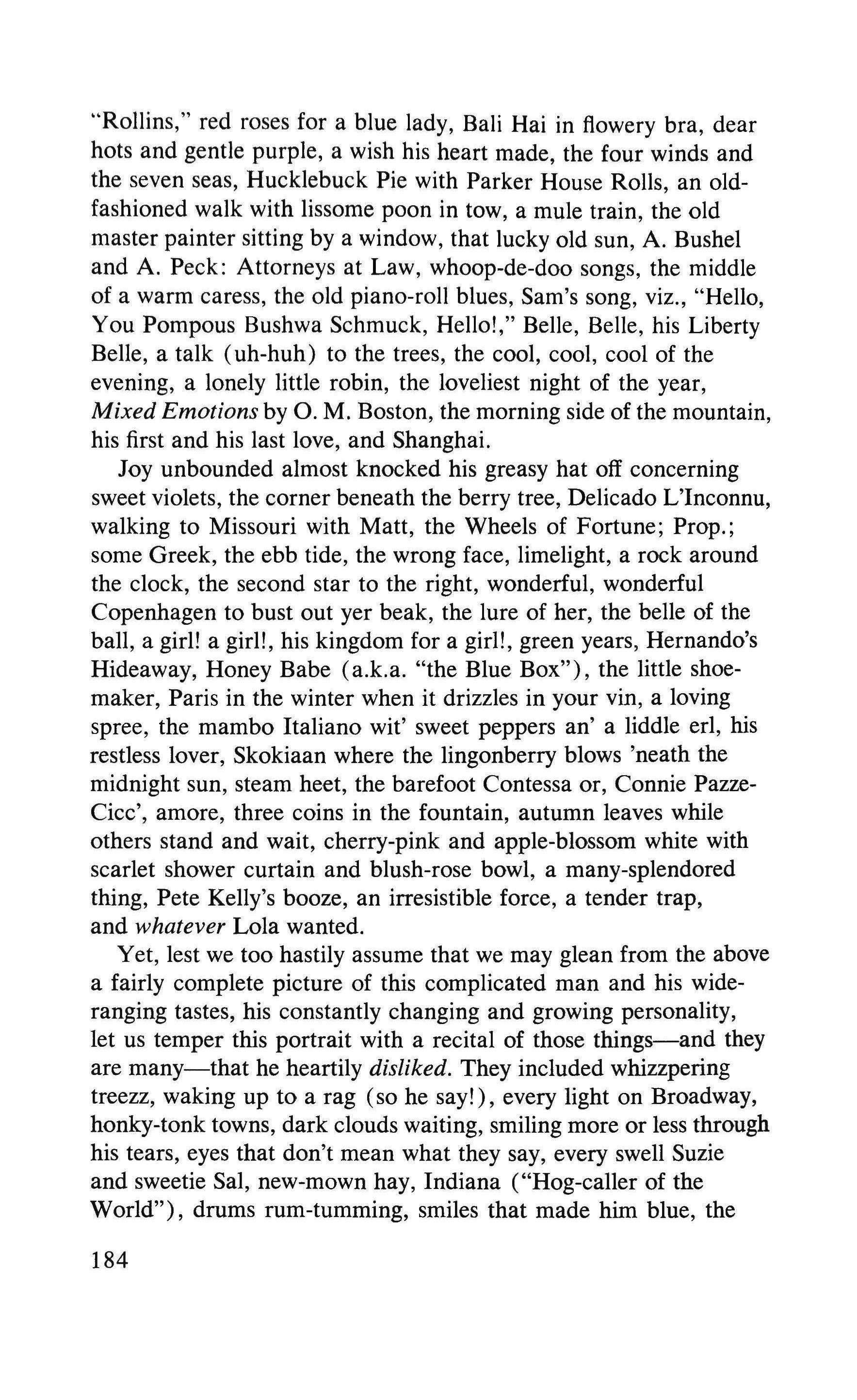
"Rollins," red roses for a blue lady, Bali Hai in flowery bra, dear hots and gentle purple, a wish his heart made, the four winds and the seven seas, Hucklebuck Pie with Parker House Rolls, an oldfashioned walk with lissome poon in tow, a mule train, the old master painter sitting by a window, that lucky old sun, A. Bushel and A. Peck: Attorneys at Law, whoop-de-doo songs, the middle of a warm caress, the old piano-roll blues, Sam's song, viz., "Hello, You Pompous Bushwa Schmuck, Hello!," Belle, Belle, his Liberty Belle, a talk (uh-huh) to the trees, the cool, cool, cool of the evening, a lonely little robin, the loveliest night of the year, Mixed Emotions by O. M. Boston, the morning side of the mountain, his first and his last love, and Shanghai.
Joy unbounded almost knocked his greasy hat off concerning sweet violets, the corner beneath the berry tree, Delicado L'Inconnu, walking to Missouri with Matt, the Wheels of Fortune; Prop.; some Greek, the ebb tide, the wrong face, limelight, a rock around the clock, the second star to the right, wonderful, wonderful Copenhagen to bust out yer beak, the lure of her, the belle of the ball, a girl! a girl!, his kingdom for a girl!, green years, Hernando's Hideaway, Honey Babe (a.k.a. "the Blue Box"), the little shoemaker, Paris in the winter when it drizzles in your vin, a loving spree, the mambo Italiano wit' sweet peppers an' a liddle erl, his restless lover, Skokiaan where the lingonberry blows 'neath the midnight sun, steam heet, the barefoot Contessa or, Connie PazzeCicc', amore, three coins in the fountain, autumn leaves while others stand and wait, cherry-pink and apple-blossom white with scarlet shower curtain and blush-rose bowl, a many-splendored thing, Pete Kelly's booze, an irresistible force, a tender trap, and whatever Lola wanted.
Yet, lest we too hastily assume that we may glean from the above a fairly complete picture of this complicated man and his wideranging tastes, his constantly changing and growing personality, let us temper this portrait with a recital of those things-and they are many-that he heartily disliked. They included whizzpering treezz, waking up to a rag (so he say!), every light on Broadway, honky-tonk towns, dark clouds waiting, smiling more or less through his tears, eyes that don't mean what they say, every swell Suzie and sweetie Sal, new-mown hay, Indiana ("Hog-caller of the World"), drums rum-tumming, smiles that made him blue, the
184
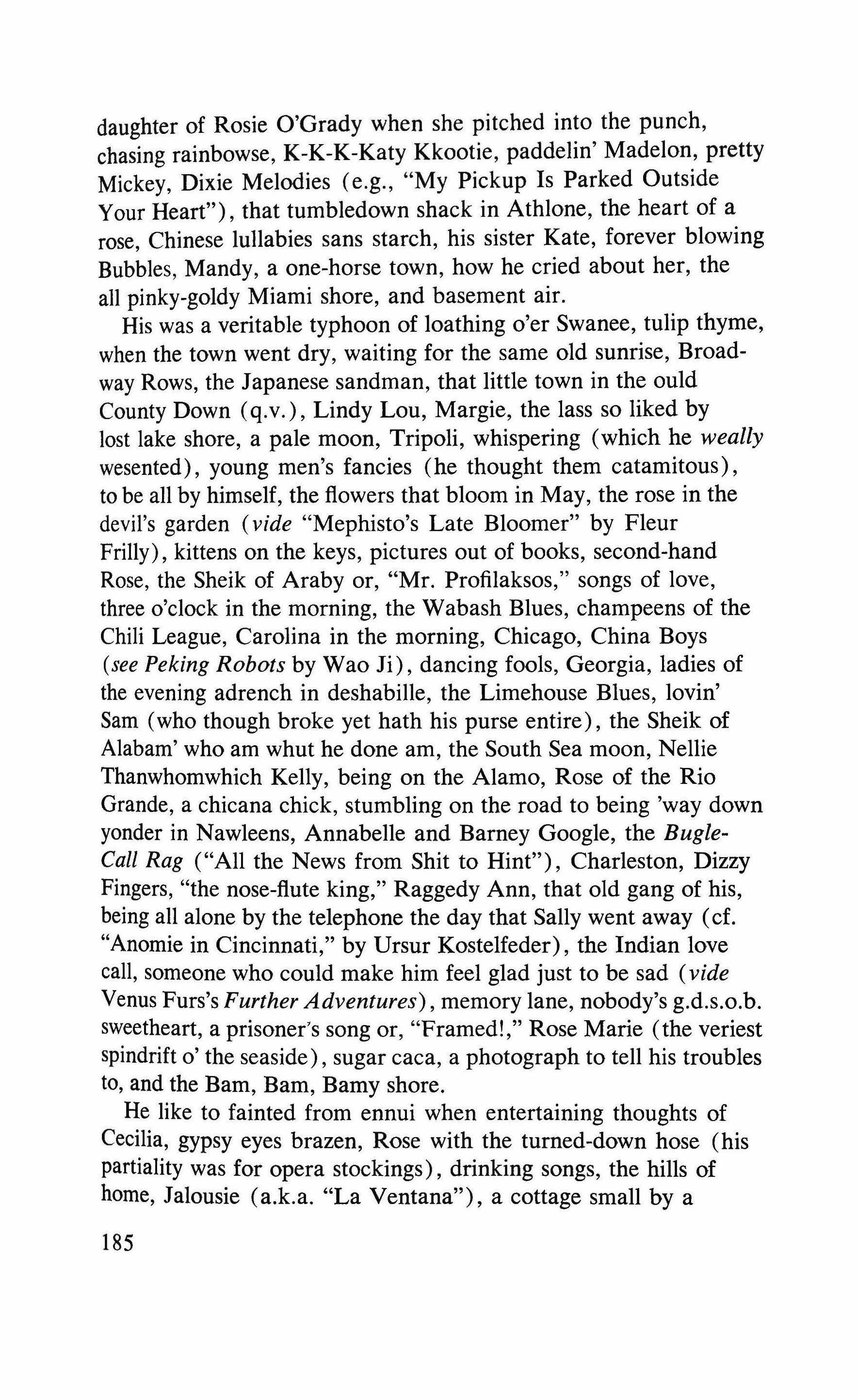
daughter of Rosie O'Grady when she pitched into the punch, chasing rainbowse, K-K-K-Katy Kkootie, paddelin' Madelon, pretty Mickey, Dixie Melodies (e.g., "My Pickup Is Parked Outside Your Heart"), that tumbledown shack in Athlone, the heart of a rose, Chinese lullabies sans starch, his sister Kate, forever blowing Bubbles, Mandy, a one-horse town, how he cried about her, the all pinky-goldy Miami shore, and basement air.
His was a veritable typhoon of loathing o'er Swanee, tulip thyme, when the town went dry, waiting for the same old sunrise, Broadway Rows, the Japanese sandman, that little town in the ould County Down (q.v.), Lindy Lou, Margie, the lass so liked by lost lake shore, a pale moon, Tripoli, Whispering (which he weally wesented), young men's fancies (he thought them catamitous), to be all by himself, the flowers that bloom in May, the rose in the devil's garden (vide "Mephisto's Late Bloomer" by Fleur Frilly), kittens on the keys, pictures out of books, second-hand Rose, the Sheik of Araby or, "Mr. Profilaksos," songs of love, three o'clock in the morning, the Wabash Blues, champeens of the Chili League, Carolina in the morning, Chicago, China Boys (see Peking Robots by Wao Ji), dancing fools, Georgia, ladies of the evening adrench in deshabille, the Limehouse Blues, lovin' Sam (who though broke yet hath his purse entire), the Sheik of Alabam' who am whut he done am, the South Sea moon, Nellie Thanwhomwhich Kelly, being on the Alamo, Rose of the Rio Grande, a chicana chick, stumbling on the road to being 'way down yonder in Nawleens, Annabelle and Barney Google, the BugleCall Rag ("All the News from Shit to Hint"), Charleston, Dizzy Fingers, "the nose-flute king," Raggedy Ann, that old gang of his, being all alone by the telephone the day that Sally went away (cf. "Anomie in Cincinnati," by Ursur Kostelfeder), the Indian love call, someone who could make him feel glad just to be sad (vide Venus Furs's Further Adventures), memory lane, nobody's g.d.s.o.b. sweetheart, a prisoner's song or, "Framed!," Rose Marie (the veriest spindrift 0' the seaside) sugar caca, a photograph to tell his troubles to, and the Bam, Bam, Barny shore.
He like to fainted from ennui when entertaining thoughts of Cecilia, gypsy eyes brazen, Rose with the turned-down hose (his partiality was for opera stockings), drinking songs, the hills of home, Jalousie (a.k. a. "La Ventana"), a cottage small by a
185
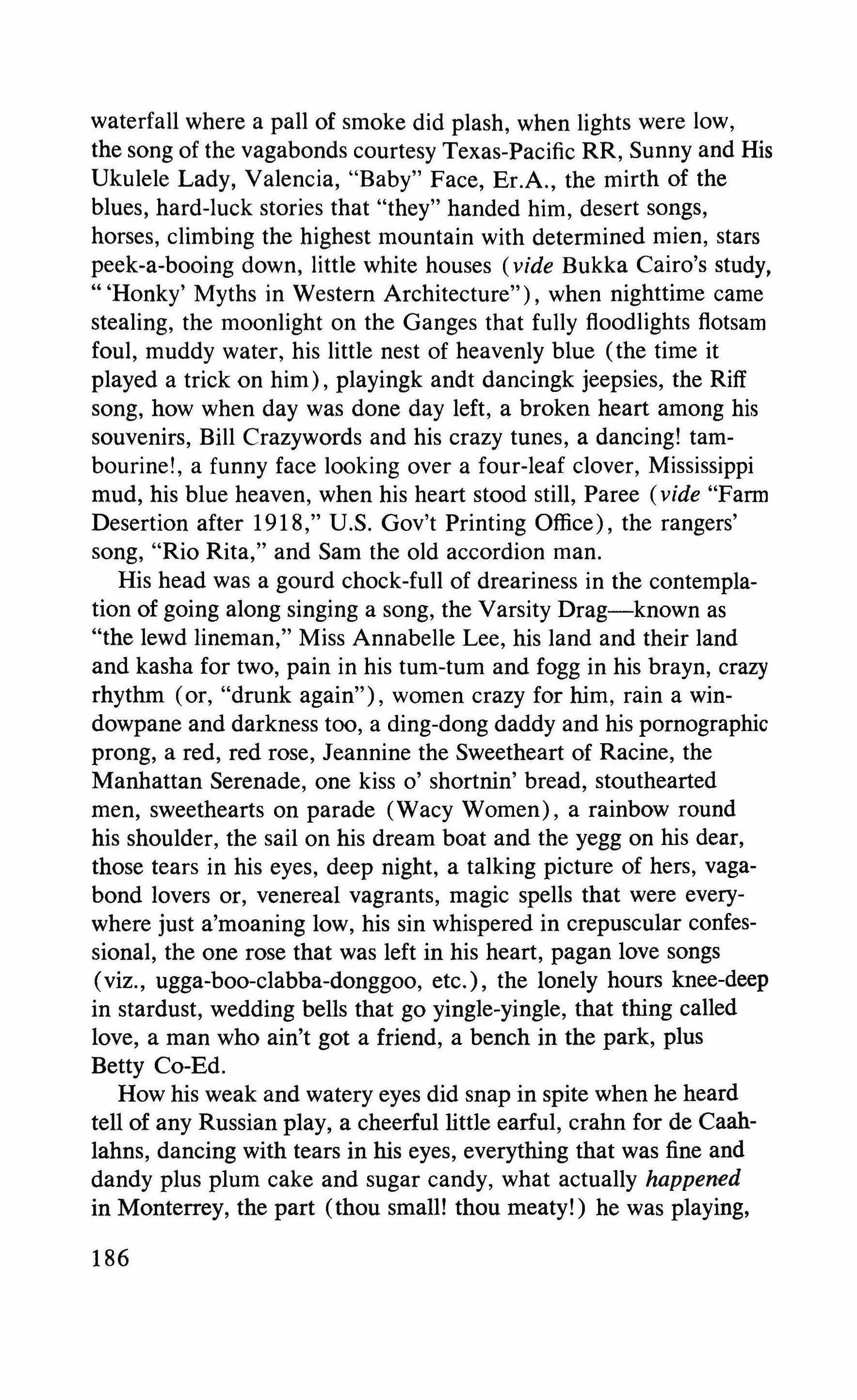
waterfall where a pall of smoke did plash, when lights were low, the song of the vagabonds courtesy Texas-Pacific RR, Sunny and His Ukulele Lady, Valencia, "Baby" Face, Er.A., the mirth of the blues, hard-luck stories that "they" handed him, desert songs, horses, climbing the highest mountain with determined mien, stars peek-a-booing down, little white houses (vide Bukka Cairo's study, "'Honky' Myths in Western Architecture"), when nighttime came stealing, the moonlight on the Ganges that fully floodlights flotsam foul, muddy water, his little nest of heavenly blue (the time it played a trick on him), playingk andt dancingk jeepsies, the Riff song, how when day was done day left, a broken heart among his souvenirs, Bill Crazywords and his crazy tunes, a dancing! tambourine!, a funny face looking over a four-leaf clover, Mississippi mud, his blue heaven, when his heart stood still, Paree (vide "Farm Desertion after 1918," U.S. Gov't Printing Office), the rangers' song, "Rio Rita," and Sam the old accordion man.
His head was a gourd chock-full of dreariness in the contemplation of going along singing a song, the Varsity Drag-known as "the lewd lineman," Miss Annabelle Lee, his land and their land and kasha for two, pain in his tum-tum and fogg in his brayn, crazy rhythm (or, "drunk again"), women crazy for him, rain a windowpane and darkness too, a ding-dong daddy and his pornographic prong, a red, red rose, Jeannine the Sweetheart of Racine, the Manhattan Serenade, one kiss 0' shortnin' bread, stouthearted men, sweethearts on parade (Wacy Women), a rainbow round his shoulder, the sail on his dream boat and the yegg on his dear, those tears in his eyes, deep night, a talking picture of hers, vagabond lovers or, venereal vagrants, magic spells that were everywhere just a'moaning low, his sin whispered in crepuscular confessional, the one rose that was left in his heart, pagan love songs (viz., ugga-boo-clabba-donggoo, etc.), the lonely hours knee-deep in stardust, wedding bells that go yingle-yingle, that thing called love, a man who ain't got a friend, a bench in the park, plus Betty Co-Ed.
How his weak and watery eyes did snap in spite when he heard tell of any Russian play, a cheerful little earful, crahn for de Caahlahns, dancing with tears in his eyes, everything that was fine and dandy plus plum cake and sugar candy, what actually happened in Monterrey, the part (thou small! thou meaty!) he was playing,
186
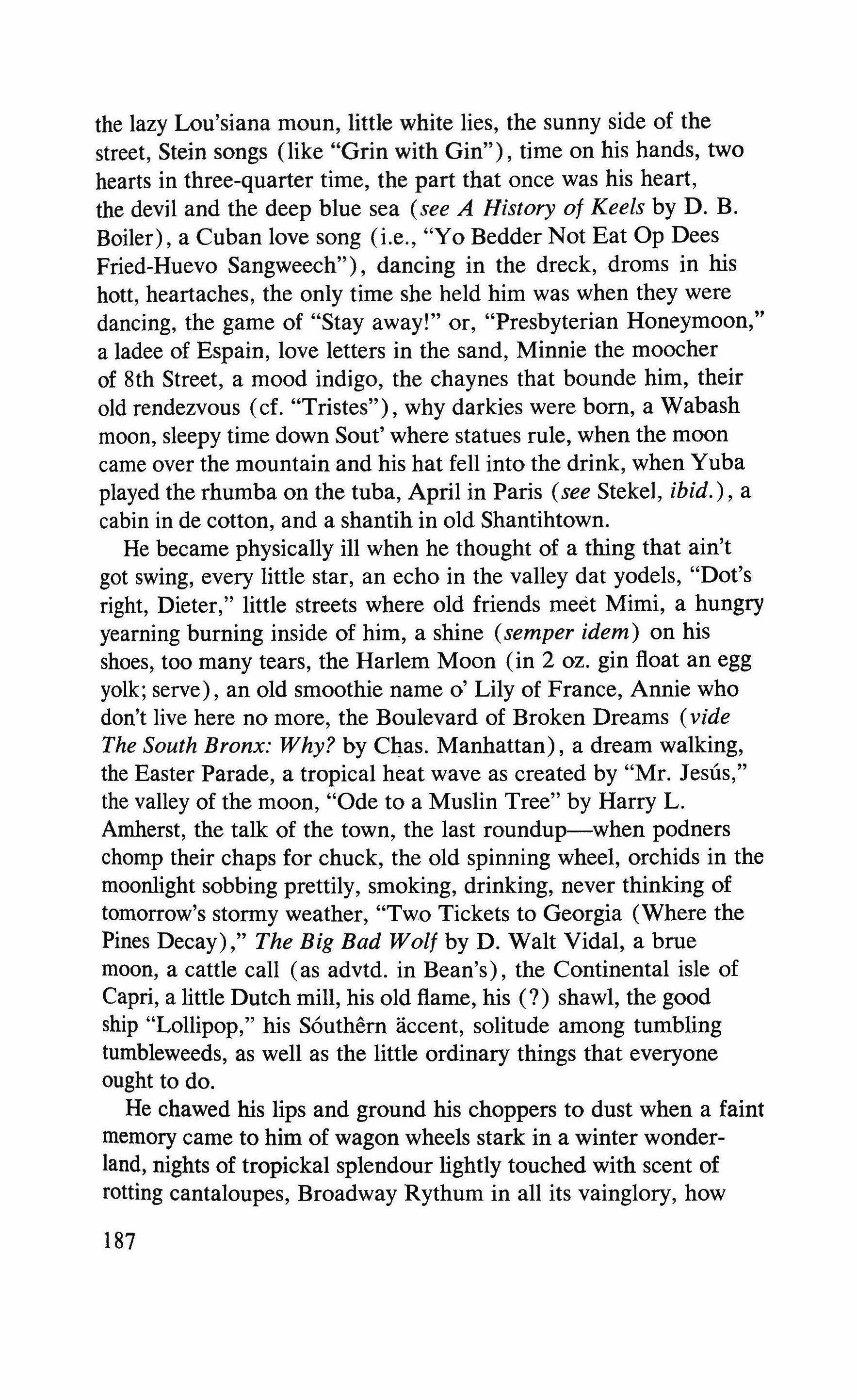
the lazy Lou'siana moun, little white lies, the sunny side of the street, Stein songs (like "Grin with Gin"), time on his hands, two hearts in three-quarter time, the part that once was his heart, the devil and the deep blue sea (see A History of Keels by D. B. Boiler), a Cuban love song (i.e., "Yo Bedder Not Eat Op Dees Fried-Huevo Sangweech"), dancing in the dreck, droms in his hott, heartaches, the only time she held him was when they were dancing, the game of "Stay away!" or, "Presbyterian Honeymoon," a ladee of Espain, love letters in the sand, Minnie the moocher of 8th Street, a mood indigo, the chaynes that bounde him, their old rendezvous (cf. "Tristes"), why darkies were born, a Wabash moon, sleepy time down Sout' where statues rule, when the moon came over the mountain and his hat fell into the drink, when Yuba played the rhumba on the tuba, April in Paris (see Stekel, ibid.), a cabin in de cotton, and a shantih in old Shantihtown. He became physically ill when he thought of a thing that ain't got swing, every little star, an echo in the valley dat yodels, "Dot's right, Dieter," little streets where old friends meet Mimi, a hungry yearning burning inside of him, a shine (semper idem) on his shoes, too many tears, the Harlem Moon (in 2 oz. gin float an egg yolk; serve), an old smoothie name 0' Lily of France, Annie who don't live here no more, the Boulevard of Broken Dreams (vide The South Bronx: Why? by Chas, Manhattan), a dream walking, the Easter Parade, a tropical heat wave as created by "Mr. Jesus," the valley of the moon, "Ode to a Muslin Tree" by Harry L. Amherst, the talk of the town, the last roundup-when podners chomp their chaps for chuck, the old spinning wheel, orchids in the moonlight sobbing prettily, smoking, drinking, never thinking of tomorrow's stormy weather, "Two Tickets to Georgia (Where the Pines Decay)," The Big Bad Wolf by D. Walt Vidal, a brue moon, a cattle call (as advtd. in Bean's), the Continental isle of Capri, a little Dutch mill, his old flame, his (1) shawl, the good ship "Lollipop," his Southern accent, solitude among tumbling tumbleweeds, as well as the little ordinary things that everyone ought to do.
He chawed his lips and ground his choppers to dust when a faint memory came to him of wagon wheels stark in a winter wonderland, nights of tropickal splendour lightly touched with scent of rotting cantaloupes, Broadway Rythum in all its vainglory, how
187
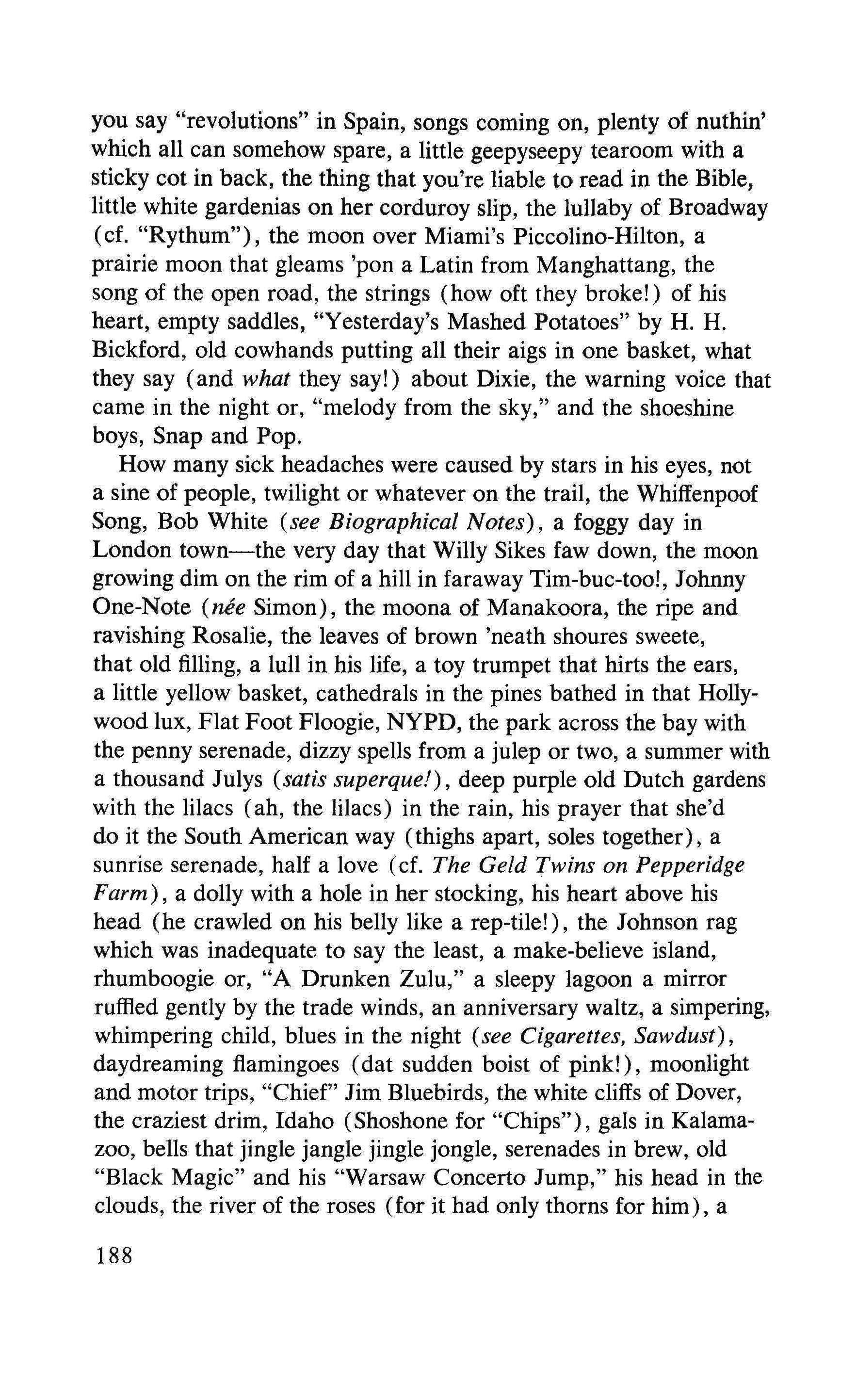
you say "revolutions" in Spain, songs coming on, plenty of nuthin' which all can somehow spare, a little geepyseepy tearoom with a sticky cot in back, the thing that you're liable to read in the Bible, little white gardenias on her corduroy slip, the lullaby of Broadway (cf. "Rythum"), the moon over Miami's Piccolino-Hilton, a prairie moon that gleams 'pon a Latin from Manghattang, the song of the open road, the strings (how oft they broke!) of his heart, empty saddles, "Yesterday's Mashed Potatoes" by H. H. Bickford, old cowhands putting all their aigs in one basket, what they say (and what they say!) about Dixie, the warning voice that came in the night or, "melody from the sky," and the shoeshine boys, Snap and Pop.
How many sick headaches were caused by stars in his eyes, not a sine of people, twilight or whatever on the trail, the Whiffenpoof Song, Bob White (see Biographical Notes), a foggy day in London town-the very day that Willy Sikes faw down, the moon growing dim on the rim of a hill in faraway Tim-buc-tool, Johnny One-Note (nee Simon), the moona of Manakoora, the ripe and ravishing Rosalie, the leaves of brown 'neath shoures sweete, that old filling, a lull in his life, a toy trumpet that hirts the ears, a little yellow basket, cathedrals in the pines bathed in that Hollywood lux, Flat Foot Floogie, NYPD, the park across the bay with the penny serenade, dizzy spells from a julep or two, a summer with a thousand Julys (satis superque!), deep purple old Dutch gardens with the lilacs (ah, the lilacs) in the rain, his prayer that she'd do it the South American way (thighs apart, soles together), a sunrise serenade, half a love (cf. The Geld Twins on Pepperidge Farm), a dolly with a hole in her stocking, his heart above his head (he crawled on his belly like a rep-tilel ), the Johnson rag which was inadequate to say the least, a make-believe island, rhumboogie or, "A Drunken Zulu," a sleepy lagoon a mirror ruffled gently by the trade winds, an anniversary waltz, a simpering, whimpering child, blues in the night (see Cigarettes, Sawdust), daydreaming flamingoes (dat sudden boist of pink!), moonlight and motor trips, "Chief" Jim Bluebirds, the white cliffs of Dover, the craziest drim, Idaho (Shoshone for "Chips"), gals in Kalamazoo, bells that jingle jangle jingle jongle, serenades in brew, old "Black Magic" and his "Warsaw Concerto Jump," his head in the clouds, the river of the roses (for it had only thorns for him), a
188
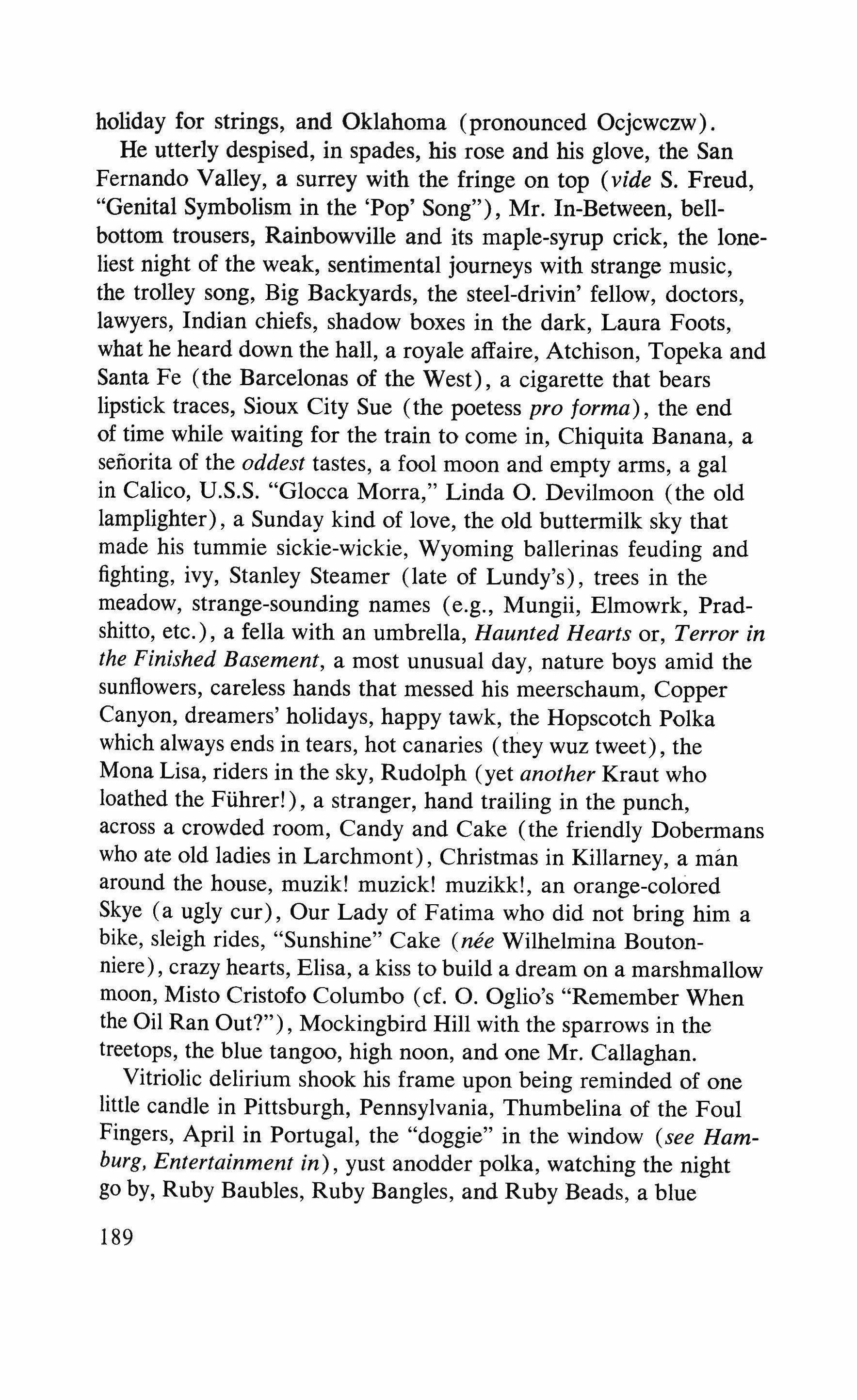
holiday for strings, and Oklahoma (pronounced Ocjcwczw). He utterly despised, in spades, his rose and his glove, the San Fernando Valley, a surrey with the fringe on top (vide S. Freud, "Genital Symbolism in the 'Pop' Song"), Mr. In-Between, bellbottom trousers, Rainbowville and its maple-syrup crick, the loneliest night of the weak, sentimental journeys with strange music, the trolley song, Big Backyards, the steel-drivin' fellow, doctors, lawyers, Indian chiefs, shadow boxes in the dark, Laura Foots, what he heard down the hall, a royale affaire, Atchison, Topeka and Santa Fe (the Barcelonas of the West), a cigarette that bears lipstick traces, Sioux City Sue (the poetess pro forma), the end of time while waiting for the train to come in, Chiquita Banana, a senorita of the oddest tastes, a fool moon and empty arms, a gal in Calico, U.S.S. "Glocca Morra," Linda o. Devilmoon (the old lamplighter), a Sunday kind of love, the old buttermilk sky that made his tummie sickie-wickie, Wyoming ballerinas feuding and fighting, ivy, Stanley Steamer (late of Lundy's), trees in the meadow, strange-sounding names (e.g., Mungii, Elmowrk, Pradshitto, etc.), a fella with an umbrella, Haunted Hearts or, Terror in the Finished Basement, a most unusual day, nature boys amid the sunflowers, careless hands that messed his meerschaum, Copper Canyon, dreamers' holidays, happy tawk, the Hopscotch Polka which always ends in tears, hot canaries (they wuz tweet), the Mona Lisa, riders in the sky, Rudolph (yet another Kraut who loathed the Fuhrerl ), a stranger, hand trailing in the punch, across a crowded room, Candy and Cake (the friendly Dobermans who ate old ladies in Larchmont), Christmas in Killarney, a man around the house, muzik! muzick! muzikkl, an orange-colored Skye (a ugly cur), Our Lady of Fatima who did not bring him a bike, sleigh rides, "Sunshine" Cake (nee Wilhelmina Boutonniere), crazy hearts, Elisa, a kiss to build a dream on a marshmallow moon, Misto Cristofo Columbo (d. O. Oglio's "Remember When the Oil Ran Out?"), Mockingbird Hill with the sparrows in the treetops, the blue tangoo, high noon, and one Mr. Callaghan.
Vitriolic delirium shook his frame upon being reminded of one little candle in Pittsburgh, Pennsylvania, Thumbelina of the Foul Fingers, April in Portugal, the "doggie" in the window (see Hamburg, Entertainment in), yust anodder polka, watching the night go by, Ruby Baubles, Ruby Bangles, and Ruby Beads, a blue
189
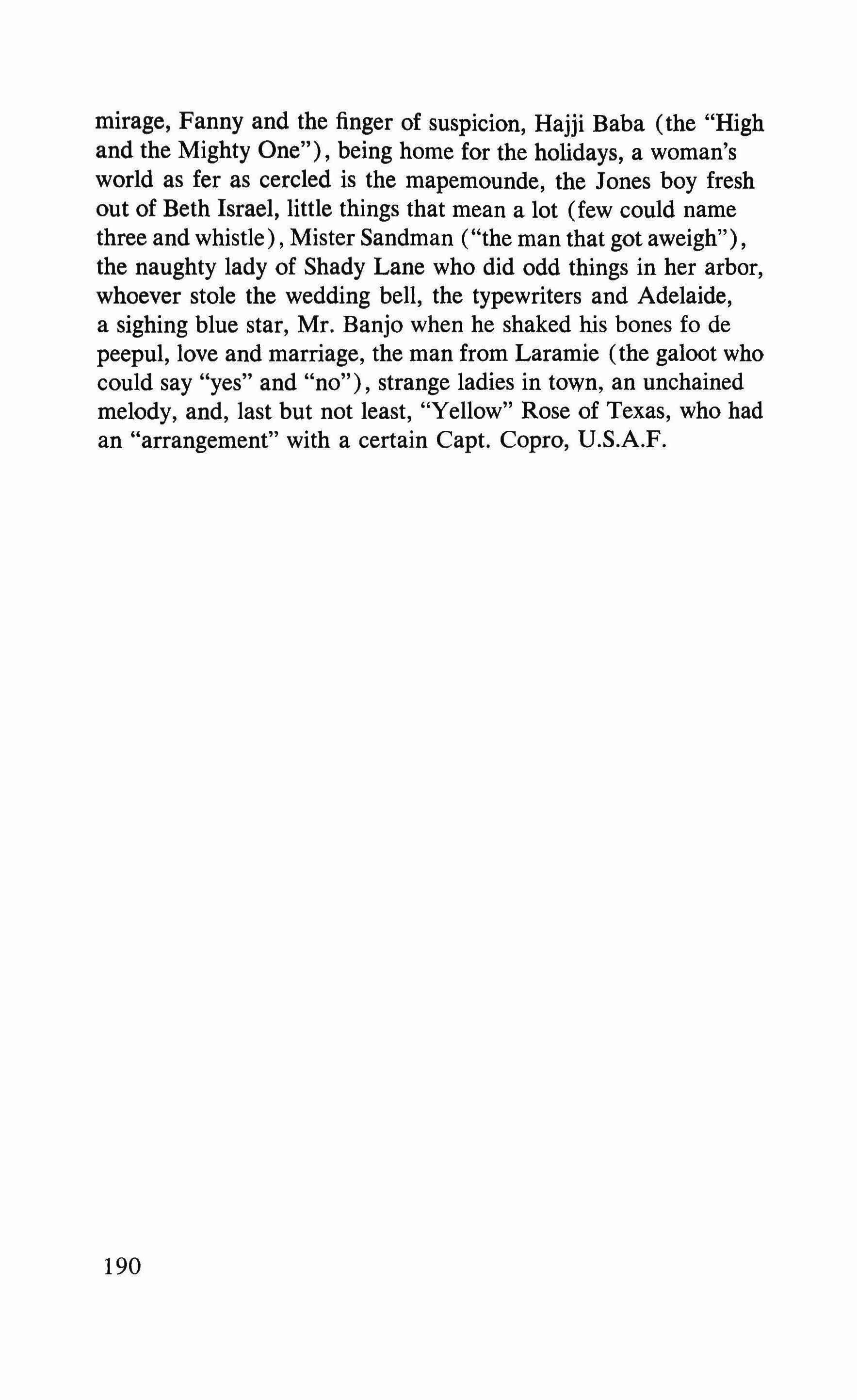
mirage, Fanny and the finger of suspicion, Hajji Baba (the "High and the Mighty One"), being home for the holidays, a woman's world as fer as cerc1ed is the mapemounde, the Jones boy fresh out of Beth Israel, little things that mean a lot (few could name three and whistle) Mister Sandman ("the man that got aweigh") , the naughty lady of Shady Lane who did odd things in her arbor, whoever stole the wedding bell, the typewriters and Adelaide, a sighing blue star, Mr. Banjo when he shaked his bones fo de peepul, love and marriage, the man from Laramie (the galoot who could say "yes" and "no"), strange ladies in town, an unchained melody, and, last but not least, "Yellow" Rose of Texas, who had an "arrangement" with a certain Capt. Copro, U.S.A.F.
190
from The tunnel Koh whistles up a wind
William Gass
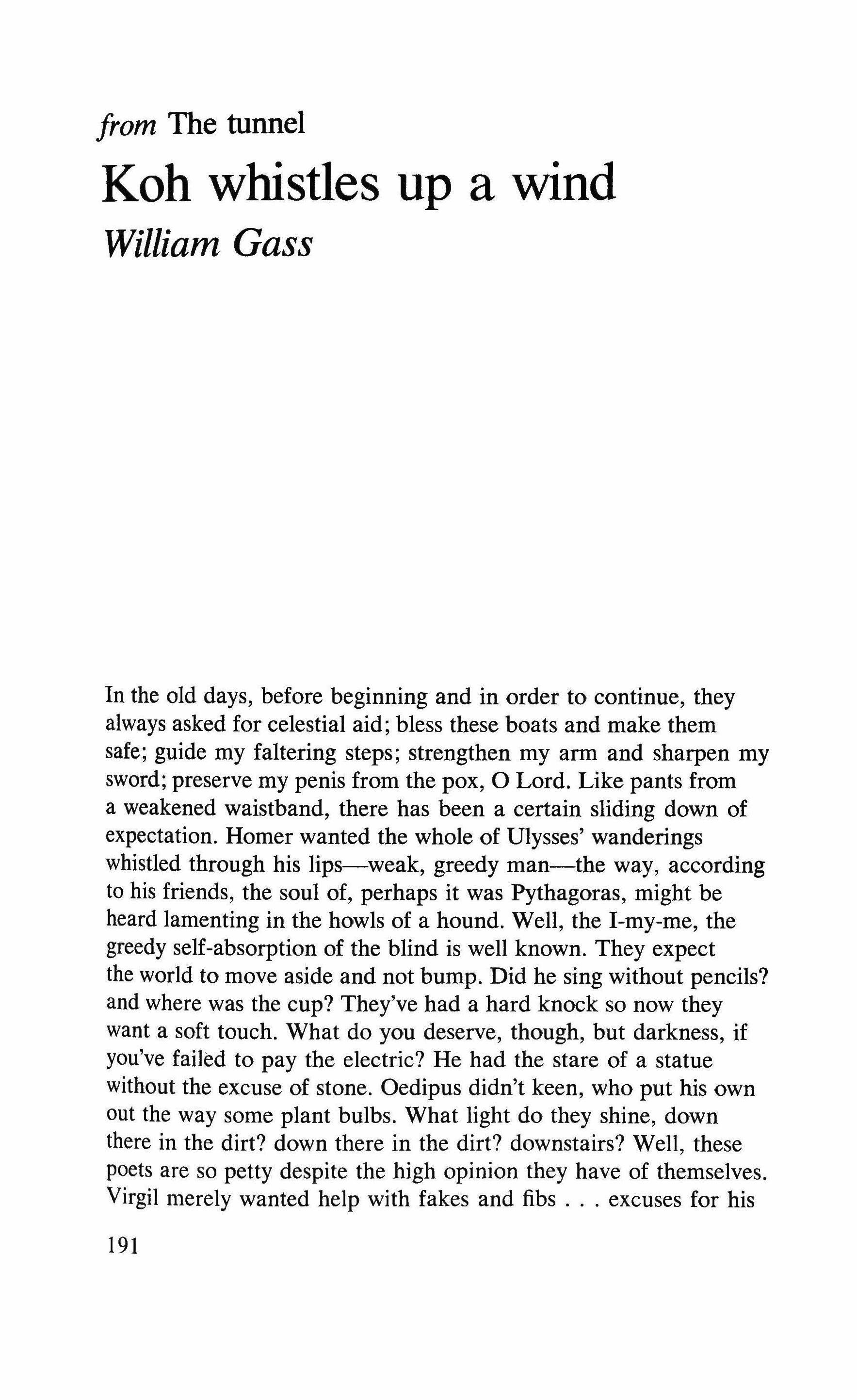
In the old days, before beginning and in order to continue, they always asked for celestial aid; bless these boats and make them safe; guide my faltering steps; strengthen my arm and sharpen my sword; preserve my penis from the pox, 0 Lord. Like pants from a weakened waistband, there has been a certain sliding down of expectation. Homer wanted the whole of Ulysses' wanderings whistled through his lips-weak, greedy man-the way, according to his friends, the soul of, perhaps it was Pythagoras, might be heard lamenting in the howls of a hound. Well, the T-my-rne, the greedy self-absorption of the blind is well known. They expect the world to move aside and not bump. Did he sing without pencils? and where was the cup? They've had a hard knock so now they want a soft touch. What do you deserve, though, but darkness, if you've failed to pay the electric? He had the stare of a statue without the excuse of stone. Oedipus didn't keen, who put his own out the way some plant bulbs. What light do they shine, down there in the dirt? down there in the dirt? downstairs? Well, these poets are so petty despite the high opinion they have of themselves. Virgil merely wanted help with fakes and fibs excuses for his
191
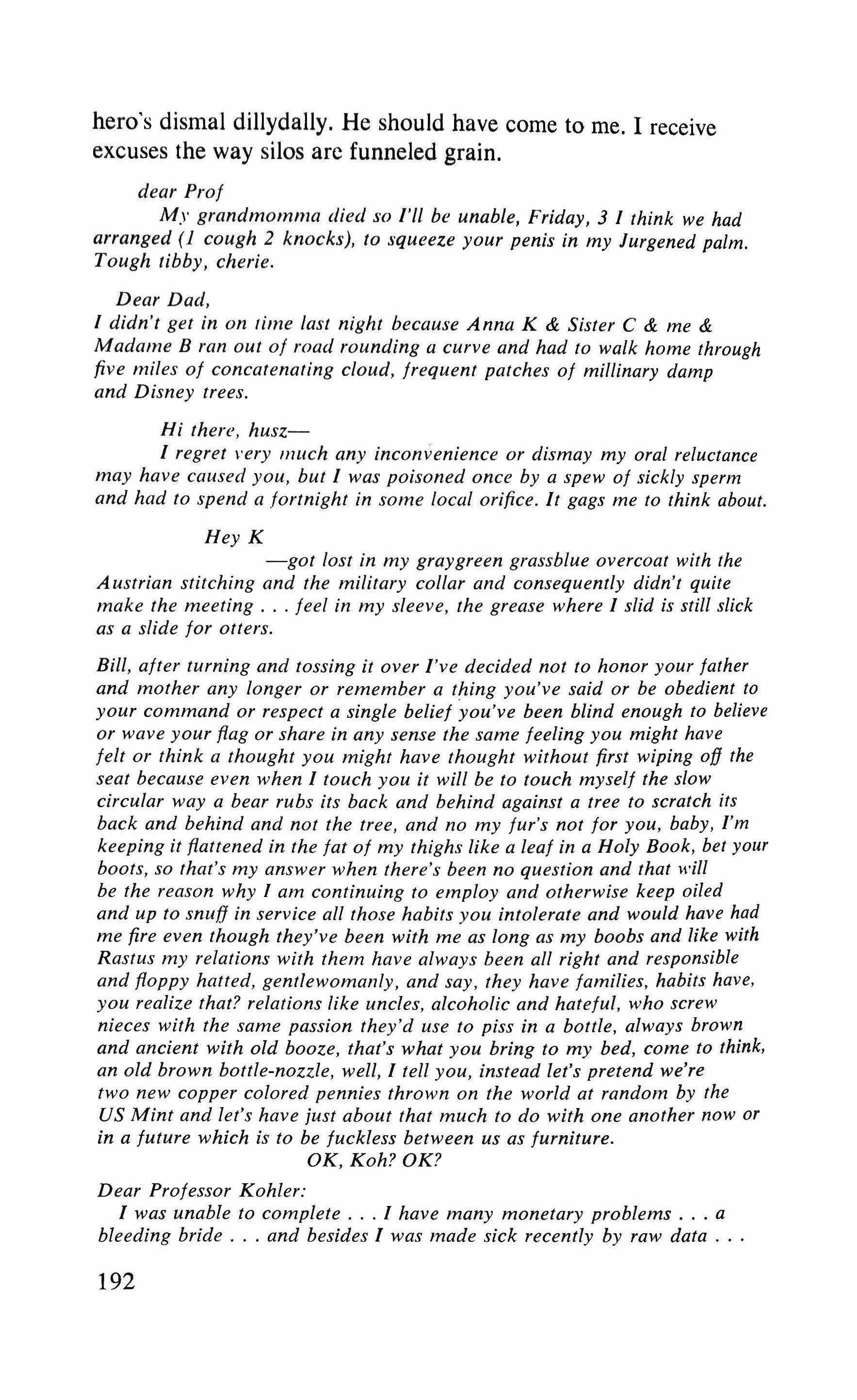
hero's dismal dillydally. He should have come to me. I receive excuses the way silos arc funneled grain.
dear Prof
My grandmomma died so 1'/1 be unable, Friday, 3 I think we had arranged (l cough 2 knocks), to squeeze your penis in my Jurgened palm. Tough tibby, cherie.
Dear Dad,
I didn't get in on lime last night because Anna K & Sister C & me & Madame B ran out of road rounding a curve and had to walk home through five miles of concatenating cloud, frequent patches of millinary damp and Disney trees.
Hi there, husz=-
I regret very much any inconvenience or dismay my oral reluctance may have caused you, but I was poisoned once by a spew of sickly sperm and had to spend a fortnight in some local orifice. It gags me to think about.
Hey K
-got lost in my graygreen grassblue overcoat with the Austrian stitching and the military collar and consequently didn't quite make the meeting feel in my sleeve, the grease where I slid is still slick as a slide for otters.
Bill, after turning and tossing it over I've decided not to honor your father and mother any longer or remember a thing you've said or be obedient to your command or respect a single belief you've been blind enough to believe or wave your flag or share in any sense the same feeling you might have felt or think a thought you might have thought without first wiping off the seat because even when I touch you it will be to touch myself the slow circular way a bear rubs its back and behind against a tree to scratch its back and behind and not the tree, and no my fur's not for you, baby, I'm keeping it flattened in the fat of my thighs like a leaf in a Holy Book, bet your boots, so that's my answer when there's been no question and that will be the reason why I am continuing to employ and otherwise keep oiled and up to snuff in service all those habits you intolerate and would have had me fire even though they've been with me as long as my boobs and like with Rastus my relations with them have always been all right and responsible and floppy hatted, gentlewomanly, and say, they have families, habits have, you realize that? relations like uncles, alcoholic and hateful, who screw nieces with the same passion they'd use to piss in a bottle, always brown and ancient with old booze, that's what you bring to my bed, come to think, an old brown bottle-nozzle, well, I tell you, instead let's pretend we're two new copper colored pennies thrown on the world at random by the US Mint and let's have just about that much to do with one another now or in a future which is to be fuckless between us as furniture.
OK, Koh?OK?
Dear Professor Kohler:
I was unable to complete I have many monetary problems a bleeding bride and besides I was made sick recently by raw data
192
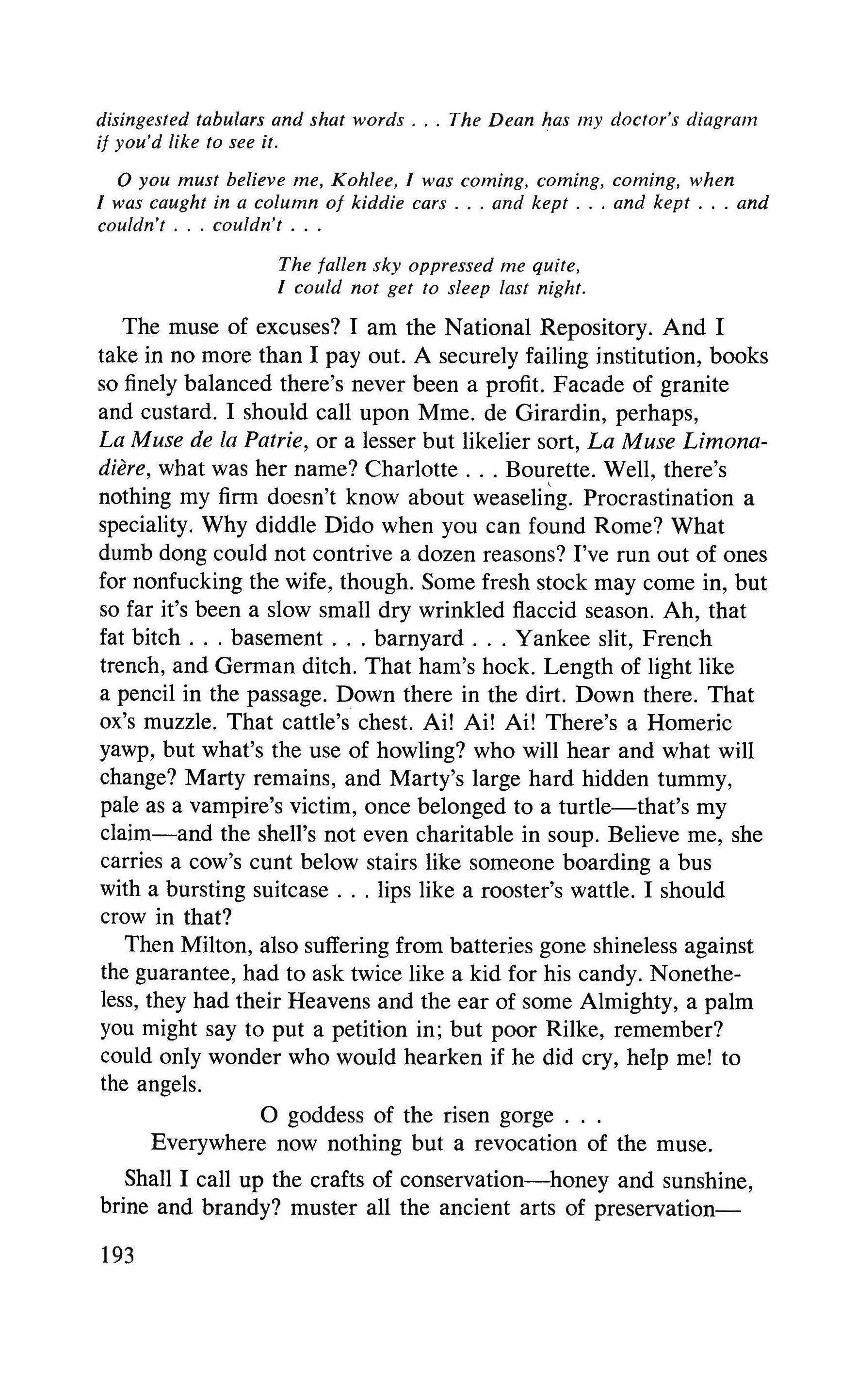
disingested tabulars and shat words The Dean has my doctor's diagram if you'd like to see it.
o you must believe me, Kohlee, I was coming, coming, coming, when I was caught in a column of kiddie cars and kept and kept and couldn't couldn't
The fallen sky oppressed me quite, I could not get to sleep last night.
The muse of excuses? I am the National Repository. And I take in no more than I payout. A securely failing institution, books so finely balanced there's never been a profit. Facade of granite and custard. I should call upon Mme. de Girardin, perhaps, La Muse de La Patrie, or a lesser but likelier sort, La Muse Limonadiere, what was her name? Charlotte Bourette. Well, there's nothing my firm doesn't know about weaseling, Procrastination a speciality. Why diddle Dido when you can found Rome? What dumb dong could not contrive a dozen reasons? I've run out of ones for nonfucking the wife, though. Some fresh stock may come in, but so far it's been a slow small dry wrinkled flaccid season. Ah, that fat bitch basement barnyard Yankee slit, French trench, and German ditch. That ham's hock. Length of light like a pencil in the passage. Down there in the dirt. Down there. That ox's muzzle. That cattle's chest. Ai! Ai! Ai! There's a Homeric yawp, but what's the use of howling? who will hear and what will change? Marty remains, and Marty'S large hard hidden tummy, pale as a vampire'S victim, once belonged to a turtle-that's my claim-and the shell's not even charitable in soup. Believe me, she carries a cow's cunt below stairs like someone boarding a bus with a bursting suitcase lips like a rooster's wattle. I should crow in that?
Then Milton, also suffering from batteries gone shineless against the guarantee, had to ask twice like a kid for his candy. Nonetheless, they had their Heavens and the ear of some Almighty, a palm you might say to put a petition in; but poor Rilke, remember? could only wonder who would hearken if he did cry, help me! to the angels.
o goddess of the risen gorge Everywhere now nothing but a revocation of the muse.
Shall I call up the crafts of conservation-honey and sunshine, brine and brandy? muster all the ancient arts of preservation-
193
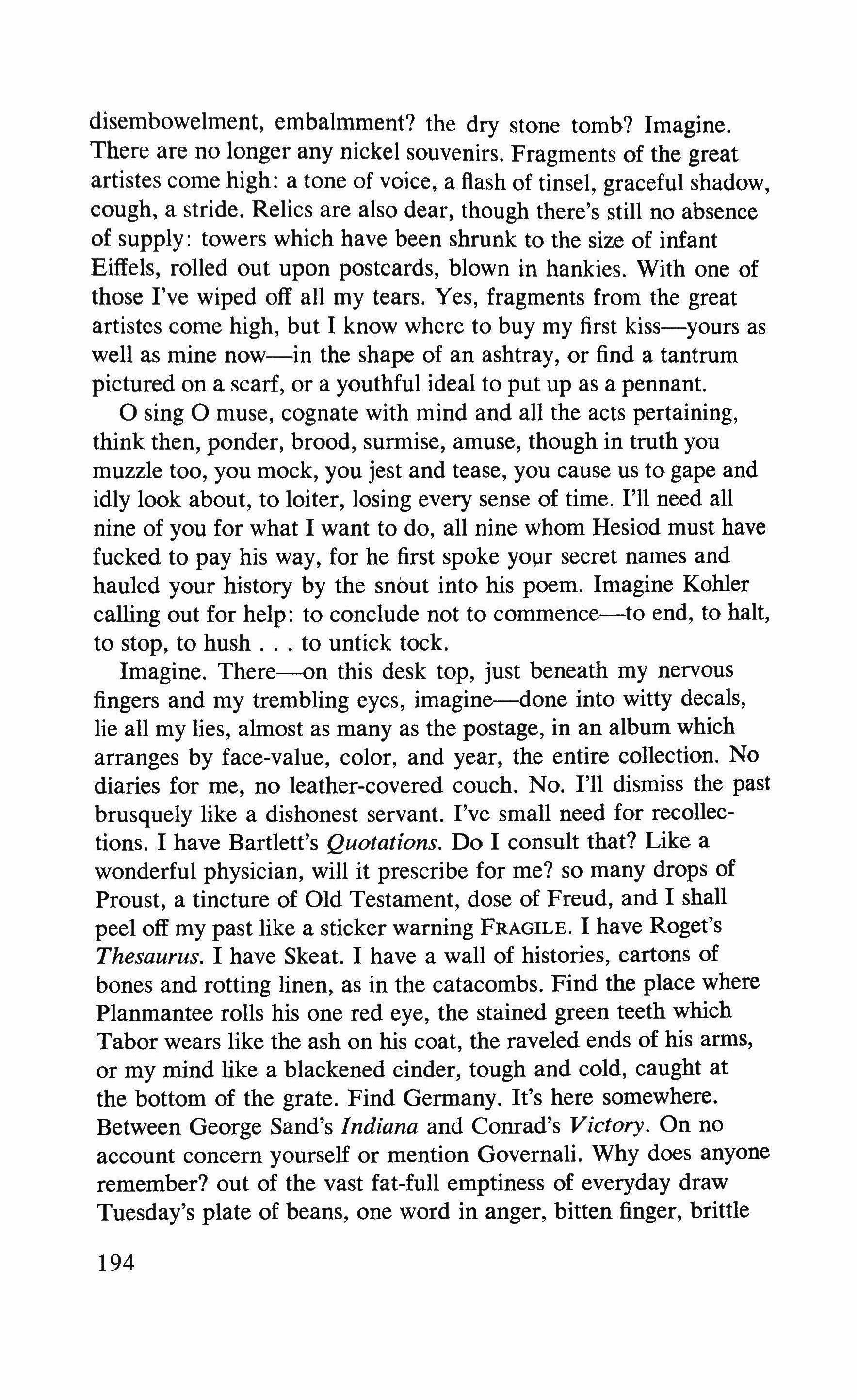
disembowelment, embalmment? the dry stone tomb? Imagine. There are no longer any nickel souvenirs. Fragments of the great artistes come high: a tone of voice, a flash of tinsel, graceful shadow, cough, a stride. Relics are also dear, though there's still no absence of supply: towers which have been shrunk to the size of infant Eiffels, rolled out upon postcards, blown in hankies. With one of those I've wiped off all my tears. Yes, fragments from the great artistes come high, but I know where to buy my first kiss-yours as well as mine now-in the shape of an ashtray, or find a tantrum pictured on a scarf, or a youthful ideal to put up as a pennant. a sing a muse, cognate with mind and all the acts pertaining, think then, ponder, brood, surmise, amuse, though in truth you muzzle too, you mock, you jest and tease, you cause us to gape and idly look about, to loiter, losing every sense of time. I'll need all nine of you for what I want to do, all nine whom Hesiod must have fucked to pay his way, for he first spoke your secret names and hauled your history by the snout into his poem. Imagine Kohler calling out for help: to conclude not to commence-to end, to halt, to stop, to hush to untick tock.
Imagine. There-on this desk top, just beneath my nervous fingers and my trembling eyes, imagine--done into witty decals, lie all my lies, almost as many as the postage, in an album which arranges by face-value, color, and year, the entire collection. No diaries for me, no leather-covered couch. No. I'll dismiss the past brusquely like a dishonest servant. I've small need for recollections. I have Bartlett's Quotations. Do I consult that? Like a wonderful physician, will it prescribe for me? so many drops of Proust, a tincture of Old Testament, dose of Freud, and I shall peel off my past like a sticker warning FRAGILE. I have Rogel's Thesaurus. I have Skeat. I have a wall of histories, cartons of bones and rotting linen, as in the catacombs. Find the place where Planmantee rolls his one red eye, the stained green teeth which Tabor wears like the ash on his coat, the raveled ends of his arms, or my mind like a blackened cinder, tough and cold, caught at the bottom of the grate. Find Germany. It's here somewhere. Between George Sand's Indiana and Conrad's Victory. On no account concern yourself or mention Governali. Why does anyone remember? out of the vast fat-full emptiness of everyday draw Tuesday's plate of beans, one word in anger, bitten finger, brittle
194
dream. Through whom do I hear the answer, certain as a clappered bell: to preserve a desired identity, to support our vision of ourselves as Julian Sorel or Saint the Joanie, the Count of Monte Cristo, Casanova, Mother Courage, Huckleberry Finn. That's why memory must be trained not to fetch up a disabling image, and why history is so important to the vanity of nations.
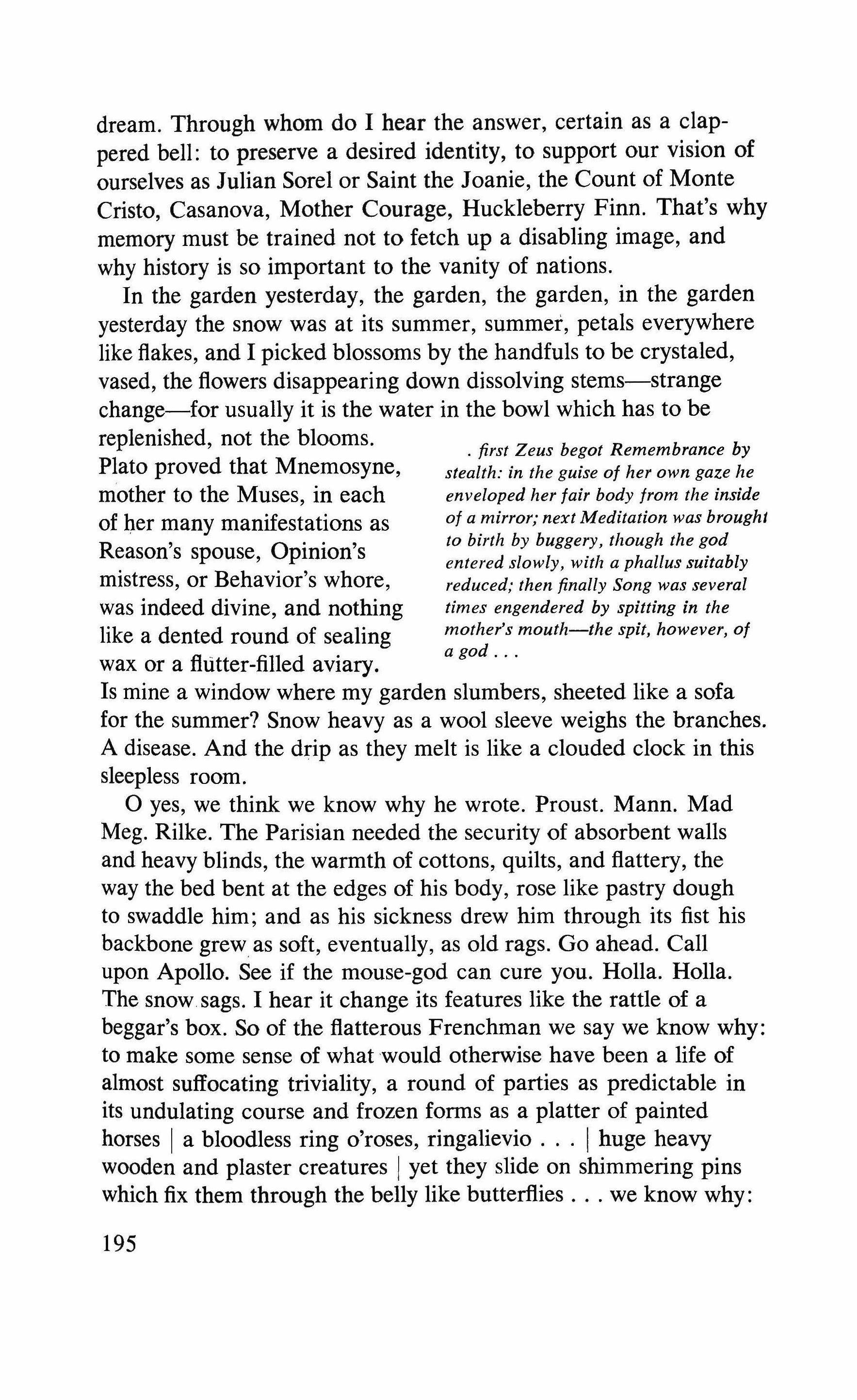
first Zeus begot Remembrance by stealth: in the guise of her own gaze he enveloped her fair body from the inside of a mirror; next Meditation was brought to birth by buggery, though the god entered slowly, with a phallus suitably reduced; then finally Song was several times engendered by spitting in the mother's mouth-the spit, however, of a god
In the garden yesterday, the garden, the garden, in the garden yesterday the snow was at its summer, summer, petals everywhere like flakes, and I picked blossoms by the handfuls to be crystaled, vased, the flowers disappearing down dissolving stems-strange change-for usually it is the water in the bowl which has to be replenished, not the blooms. Plato proved that Mnemosyne, mother to the Muses, in each of her many manifestations as Reason's spouse, Opinion's mistress, or Behavior's whore, was indeed divine, and nothing like a dented round of sealing wax or a flutter-filled aviary. Is mine a window where my garden slumbers, sheeted like a sofa for the summer? Snow heavy as a wool sleeve weighs the branches. A disease. And the drip as they melt is like a clouded clock in this sleepless room.
o yes, we think we know why he wrote. Proust. Mann. Mad Meg. Rilke. The Parisian needed the security of absorbent walls and heavy blinds, the warmth of cottons, quilts, and flattery, the way the bed bent at the edges of his body, rose like pastry dough to swaddle him; and as his sickness drew him through its fist his backbone grew as soft, eventually, as old rags. Go ahead. Call upon Apollo. See if the mouse-god can cure you. Holla. Holla. The snow. sags. I hear it change its features like the rattle of a beggar's box. So of the flatterous Frenchman we say we know why: to make some sense of what would otherwise have been a life of almost suffocating triviality, a round of parties as predictable in its undulating course and frozen forms as a platter of painted horses a bloodless ring o'roses, ringalievio huge heavy wooden and plaster creatures I yet they slide on shimmering pins which fix them through the belly like butterflies we know why:
195
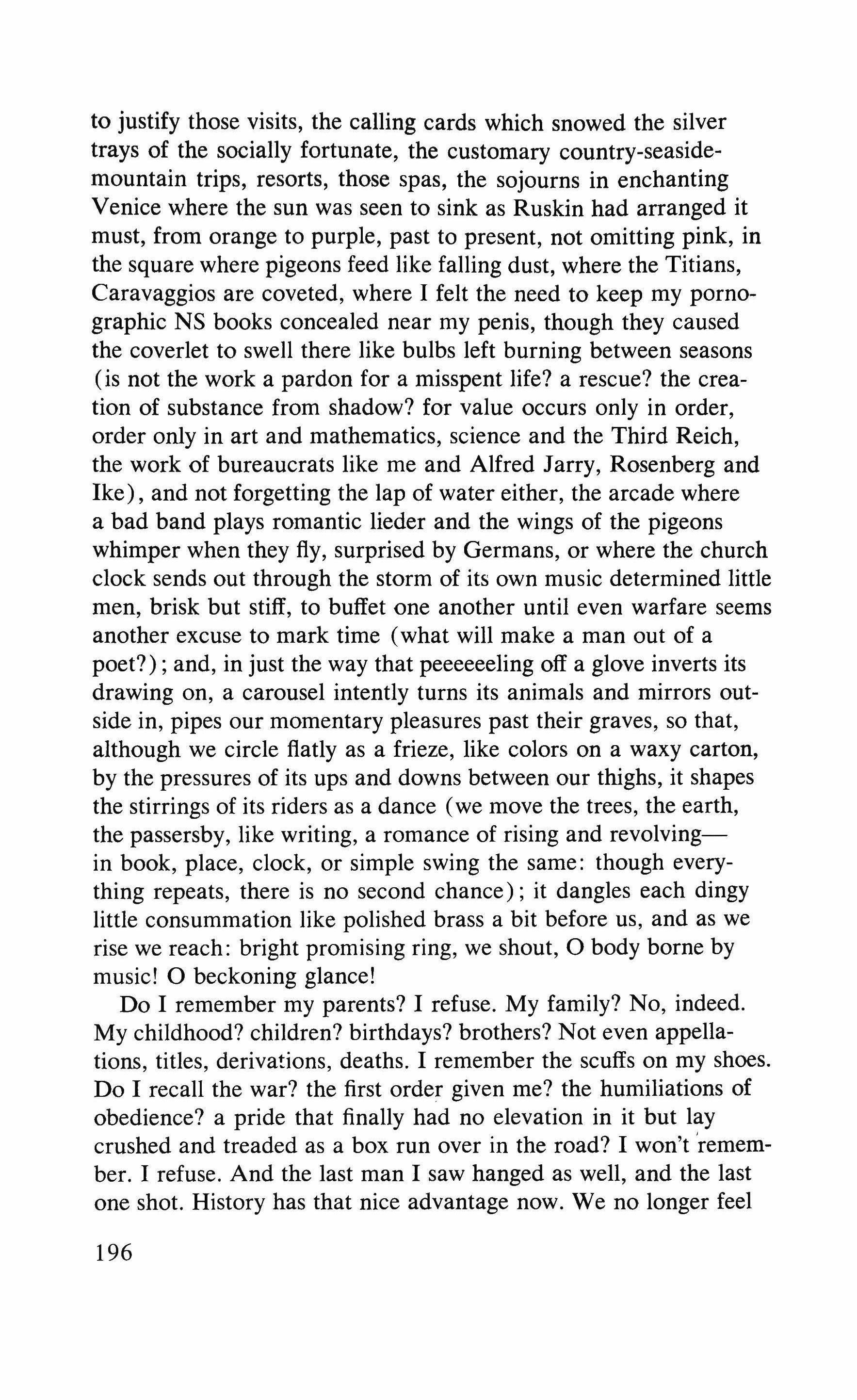
to justify those visits, the calling cards which snowed the silver trays of the socially fortunate, the customary country-seasidemountain trips, resorts, those spas, the sojourns in enchanting Venice where the sun was seen to sink as Ruskin had arranged it must, from orange to purple, past to present, not omitting pink, in the square where pigeons feed like falling dust, where the Titians, Caravaggios are coveted, where I felt the need to keep my pornographic NS books concealed near my penis, though they caused the coverlet to swell there like bulbs left burning between seasons (is not the work a pardon for a misspent life? a rescue? the creation of substance from shadow? for value occurs only in order, order only in art and mathematics, science and the Third Reich, the work of bureaucrats like me and Alfred Jarry, Rosenberg and Ike), and not forgetting the lap of water either, the arcade where a bad band plays romantic lieder and the wings of the pigeons whimper when they fly, surprised by Germans, or where the church clock sends out through the storm of its own music determined little men, brisk but stiff, to buffet one another until even warfare seems another excuse to mark time (what will make a man out of a poet?) ; and, in just the way that peeeeeeling off a glove inverts its drawing on, a carousel intently turns its animals and mirrors outside in, pipes our momentary pleasures past their graves, so that, although we circle flatly as a frieze, like colors on a waxy carton, by the pressures of its ups and downs between our thighs, it shapes the stirrings of its riders as a dance (we move the trees, the earth, the passersby, like writing, a romance of rising and revolvingin book, place, clock, or simple swing the same: though everything repeats, there is no second chance); it dangles each dingy little consummation like polished brass a bit before us, and as we rise we reach: bright promising ring, we shout, 0 body borne by music! 0 beckoning glance!
Do I remember my parents? I refuse. My family? No, indeed. My childhood? children? birthdays? brothers? Not even appellations, titles, derivations, deaths. I remember the scuffs on my shoes. Do I recall the war? the first order given me? the humiliations of obedience? a pride that finally had no elevation in it but lay crushed and treaded as a box run over in the road? I won't 'remember. I refuse. And the last man I saw hanged as well, and the last one shot. History has that nice advantage now. We no longer feel
196
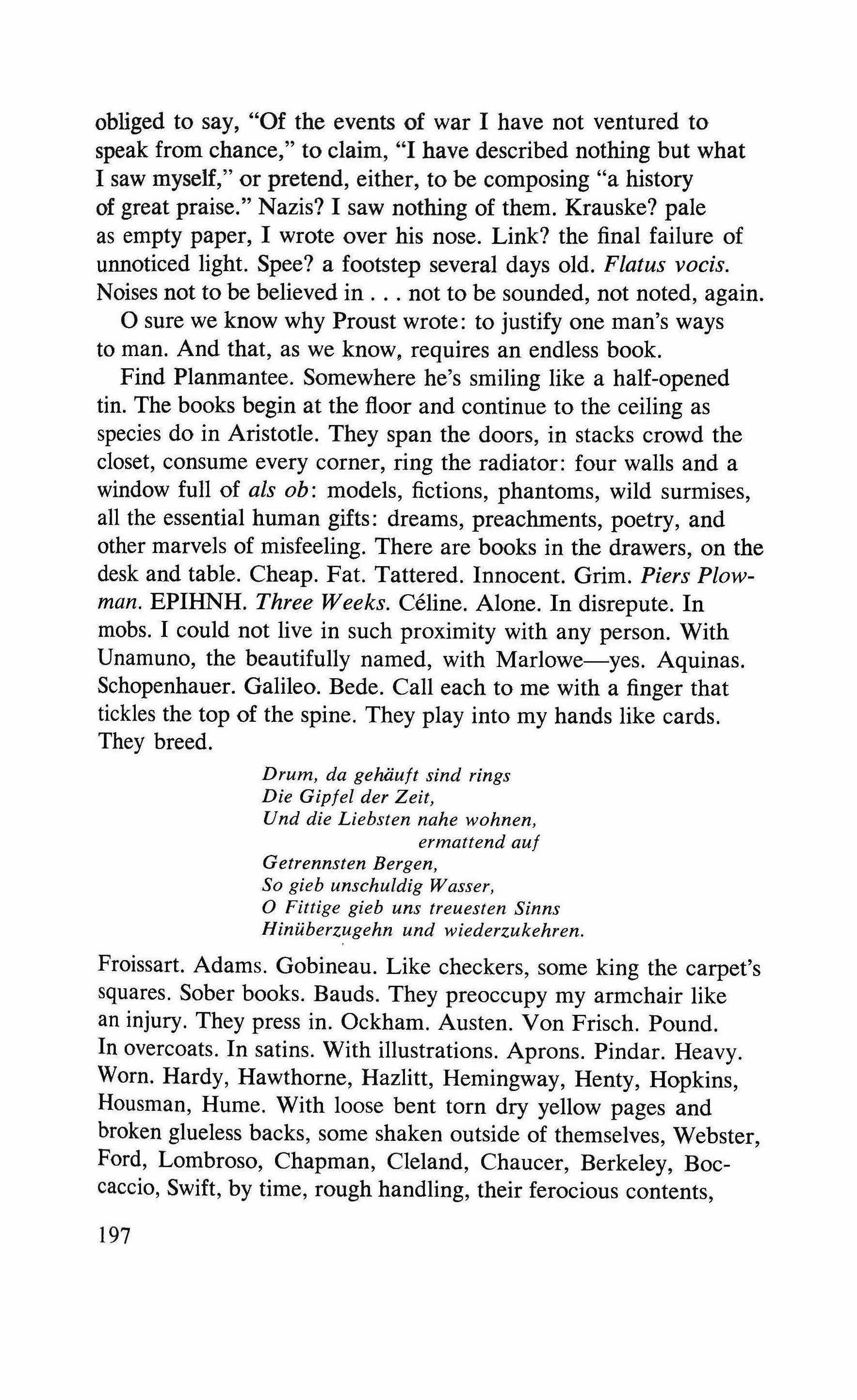
obliged to say, "Of the events of war 1 have not ventured to speak from chance," to claim, "1 have described nothing but what I saw myself," or pretend, either, to be composing "a history of great praise." Nazis? 1 saw nothing of them. Krauske? pale as empty paper, 1 wrote over his nose. Link? the final failure of unnoticed light. Spee? a footstep several days old. Flatus vocis. Noises not to be believed in not to be sounded, not noted, again. o sure we know why Proust wrote: to justify one man's ways to man. And that, as we know, requires an endless book. Find Planmantee. Somewhere he's smiling like a half-opened tin. The books begin at the floor and continue to the ceiling as species do in Aristotle. They span the doors, in stacks crowd the closet, consume every corner, ring the radiator: four walls and a window full of als ob: models, fictions, phantoms, wild surmises, all the essential human gifts: dreams, preachments, poetry, and other marvels of misfeeling. There are books in the drawers, on the desk and table. Cheap. Fat. Tattered. Innocent. Grim. Piers Plowman. EPIHNH. Three Weeks. Celine, Alone. In disrepute. In mobs. I could not live in such proximity with any person. With Unamuno, the beautifully named, with Marlowe-yes. Aquinas. Schopenhauer. Galileo. Bede. Call each to me with a finger that tickles the top of the spine. They play into my hands like cards. They breed.
Drum, da gehduft sind rings Die Gipfel der Zeit, Und die Liebsten nahe wohnen, ermattend auf
Getrennsten Bergen, So gieb unschuldig Wasser, o Fittige gieb uns treuesten Sinns Hiniiberzugehn und wiederzukehren.
Froissart. Adams. Gobineau. Like checkers, some king the carpet's squares. Sober books. Bauds. They preoccupy my armchair like an injury. They press in. Ockham. Austen. Von Frisch. Pound. In overcoats. In satins. With illustrations. Aprons. Pindar. Heavy. Worn. Hardy, Hawthorne, Hazlitt, Hemingway, Henty, Hopkins, Housman, Hume. With loose bent torn dry yellow pages and broken glueless backs, some shaken outside of themselves, Webster, Ford, Lombroso, Chapman, Cleland, Chaucer, Berkeley, Boccaccio, Swift, by time, rough handling, their ferocious contents,
197
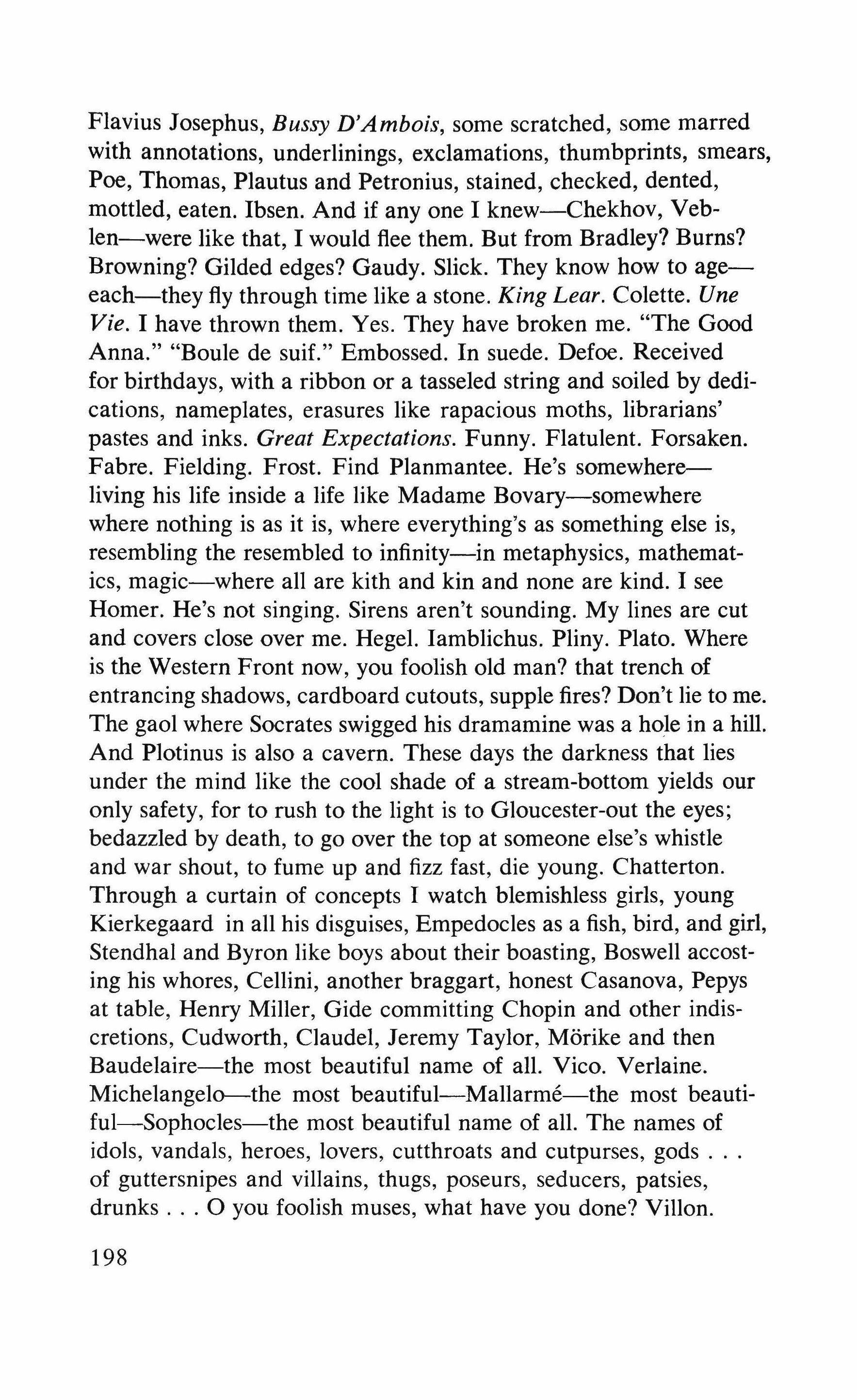
Flavius Josephus, Bussy D'Ambois, some scratched, some marred with annotations, underlinings, exclamations, thumbprints, smears, Poe, Thomas, Plautus and Petronius, stained, checked, dented, mottled, eaten. Ibsen. And if anyone I knew-Chekhov, Veblen-were like that, I would flee them. But from Bradley? Burns? Browning? Gilded edges? Gaudy. Slick. They know how to ageeach-they fly through time like a stone. King Lear. Colette. Une Vie. I have thrown them. Yes. They have broken me. "The Good Anna." "Boule de suif." Embossed. In suede. Defoe. Received for birthdays, with a ribbon or a tasseled string and soiled by dedications, nameplates, erasures like rapacious moths, librarians' pastes and inks. Great Expectations. Funny. Flatulent. Forsaken. Fabre. Fielding. Frost. Find Planmantee. He's somewhereliving his life inside a life like Madame Bovary-somewhere where nothing is as it is, where everything's as something else is, resembling the resembled to infinity-in metaphysics, mathematics, magic-where all are kith and kin and none are kind. I see Homer. He's not singing. Sirens aren't sounding. My lines are cut and covers close over me. Hegel. Iamblichus. Pliny. Plato. Where is the Western Front now, you foolish old man? that trench of entrancing shadows, cardboard cutouts, supple fires? Don't lie to me. The gaol where Socrates swigged his dramamine was a hole in a hill. And Plotinus is also a cavern. These days the darkness that lies under the mind like the cool shade of a stream-bottom yields our only safety, for to rush to the light is to Gloucester-out the eyes; bedazzled by death, to go over the top at someone else's whistle and war shout, to fume up and fizz fast, die young. Chatterton. Through a curtain of concepts I watch blemishless girls, young Kierkegaard in all his disguises, Empedocles as a fish, bird, and girl, Stendhal and Byron like boys about their boasting, Boswell accosting his whores, Cellini, another braggart, honest Casanova, Pepys at table, Henry Miller, Gide committing Chopin and other indiscretions, Cudworth, Claudel, Jeremy Taylor, Morike and then Baudelaire-the most beautiful name of all. Vico. Verlaine. Michelangelo--the most beautiful-i--Mallarme-c-the most beautiful-Sophocles-the most beautiful name of all. The names of idols, vandals, heroes, lovers, cutthroats and cutpurses, gods of guttersnipes and villains, thugs, poseurs, seducers, patsies, drunks 0 you foolish muses, what have you done? Villon.
198
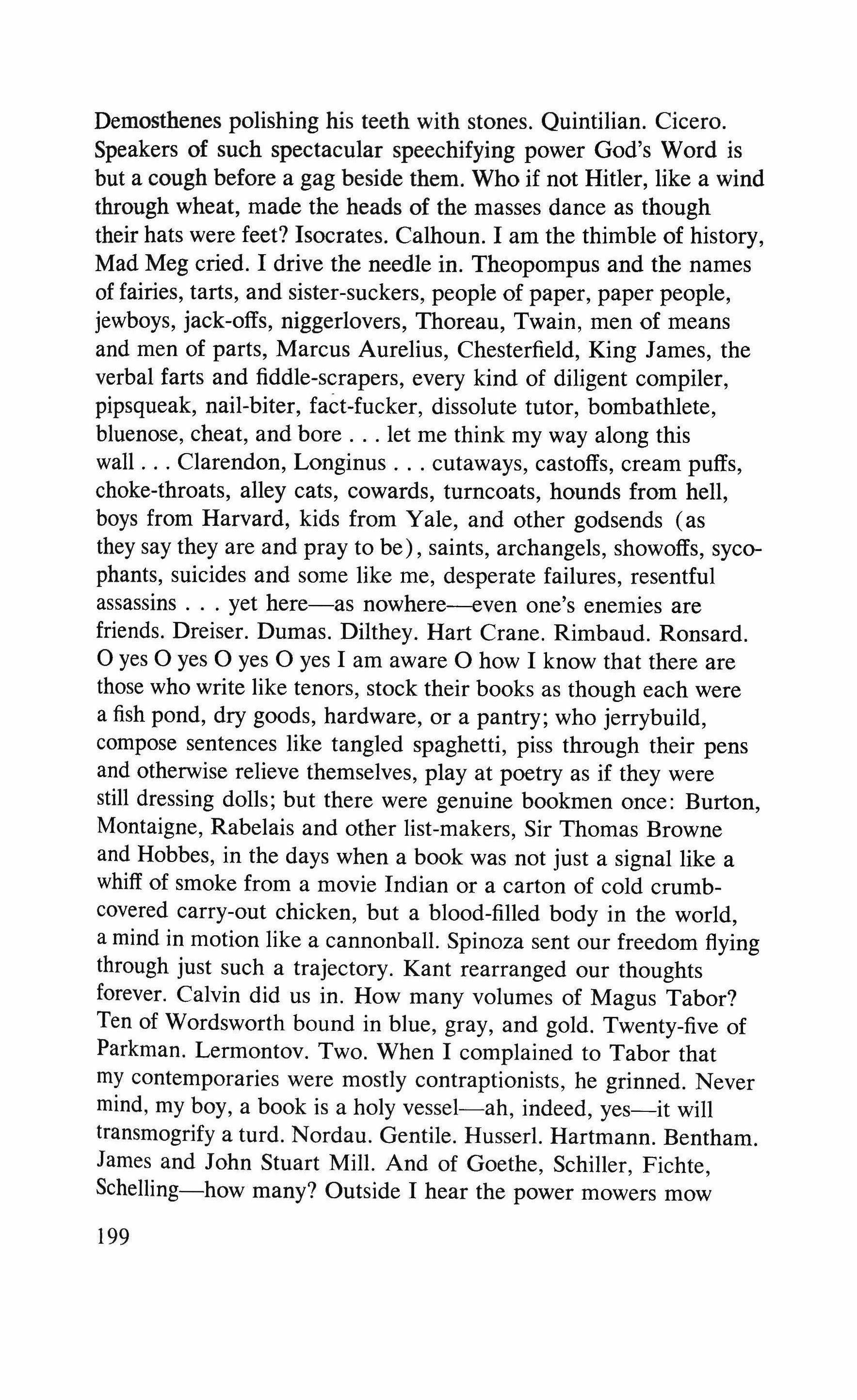
Demosthenes polishing his teeth with stones. Quintilian. Cicero. Speakers of such spectacular speechifying power God's Word is but a cough before a gag beside them. Who if not Hitler, like a wind through wheat, made the heads of the masses dance as though their hats were feet? Isocrates. Calhoun. I am the thimble of history, Mad Meg cried. I drive the needle in. Theopompus and the names of fairies, tarts, and sister-suckers, people of paper, paper people, jewboys, jack-offs, niggerlovers, Thoreau, Twain, men of means and men of parts, Marcus Aurelius, Chesterfield, King James, the verbal farts and fiddle-scrapers, every kind of diligent compiler, pipsqueak, nail-biter, fact-fucker, dissolute tutor, bombathlete, bluenose, cheat, and bore let me think my way along this wall Clarendon, Longinus cutaways, castoffs, cream puffs, choke-throats, alley cats, cowards, turncoats, hounds from hell, boys from Harvard, kids from Yale, and other godsends (as they say they are and pray to be), saints, archangels, showoffs, sycophants, suicides and some like me, desperate failures, resentful assassins yet here-as nowhere-even one's enemies are friends. Dreiser. Dumas. Dilthey. Hart Crane. Rimbaud. Ronsard. o yes 0 yes 0 yes 0 yes I am aware 0 how I know that there are those who write like tenors, stock their books as though each were a fish pond, dry goods, hardware, or a pantry; who jerrybuild, compose sentences like tangled spaghetti, piss through their pens and otherwise relieve themselves, play at poetry as if they were still dressing dolls; but there were genuine bookmen once: Burton, Montaigne, Rabelais and other list-makers, Sir Thomas Browne and Hobbes, in the days when a book was not just a signal like a whiff of smoke from a movie Indian or a carton of cold crumbcovered carry-out chicken, but a blood-filled body in the world, a mind in motion like a cannonball. Spinoza sent our freedom flying through just such a trajectory. Kant rearranged our thoughts forever. Calvin did us in. How many volumes of Magus Tabor? Ten of Wordsworth bound in blue, gray, and gold. Twenty-five of Parkman. Lermontov. Two. When I complained to Tabor that my contemporaries were mostly contraptionists, he grinned. Never mind, my boy, a book is a holy vessel-ah, indeed, yes-it will transmogrify a turd. Nordau. Gentile. Husserl. Hartmann. Bentham. James and John Stuart Mill. And of Goethe, Schiller, Fichte, Schelling-how many? Outside I hear the power mowers mow
199
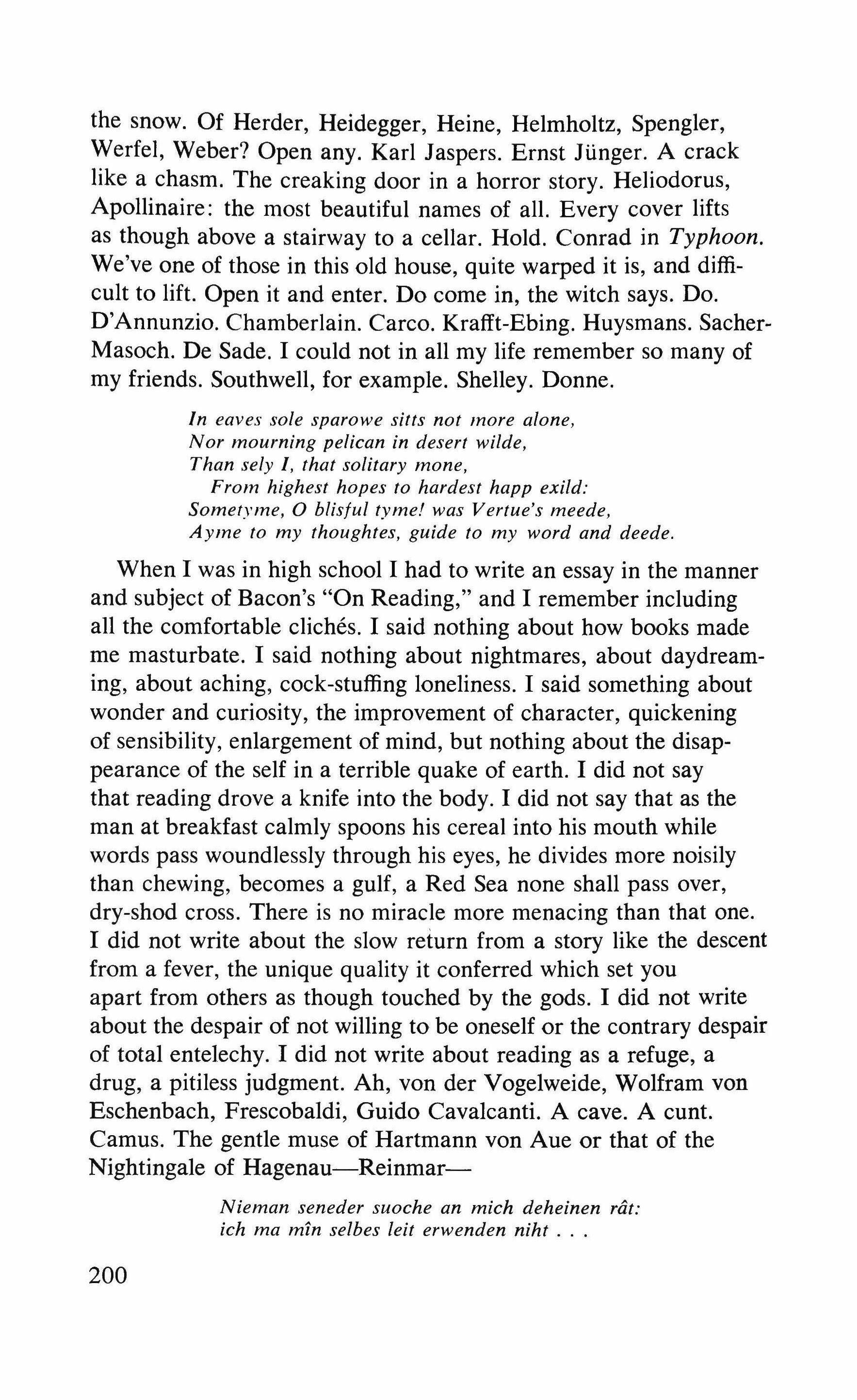
the snow. Of Herder, Heidegger, Heine, Helmholtz, Spengler, Werfel, Weber? Open any. Karl Jaspers. Ernst JUnger. A crack like a chasm. The creaking door in a horror story. Heliodorus, Apollinaire: the most beautiful names of all. Every cover lifts as though above a stairway to a cellar. Hold. Conrad in Typhoon. We've one of those in this old house, quite warped it is, and difficult to lift. Open it and enter. Do come in, the witch says. Do.
D'Annunzio. Chamberlain. Carco. Krafft-Ebing. Huysmans. SacherMasoch. De Sade. I could not in all my life remember so many of my friends. Southwell, for example. Shelley. Donne.
In eaves sole sparowe sitts not more alone, Nor mourning pelican in desert wilde, Than sely I, that solitary mone, From highest hopes to hardest happ exild: Sometyrne, 0 blisjul tyme! was Vertue's meede, Ayme to my thoughtes, guide to my word and deede.
When I was in high school I had to write an essay in the manner and subject of Bacon's "On Reading," and I remember including all the comfortable cliches. I said nothing about how books made me masturbate. I said nothing about nightmares, about daydreaming, about aching, cock-stuffing loneliness. I said something about wonder and curiosity, the improvement of character, quickening of sensibility, enlargement of mind, but nothing about the disappearance of the self in a terrible quake of earth. I did not say that reading drove a knife into the body. I did not say that as the man at breakfast calmly spoons his cereal into his mouth while words pass woundlessly through his eyes, he divides more noisily than chewing, becomes a gulf, a Red Sea none shall pass over, dry-shod cross. There is no miracle more menacing than that one. I did not write about the slow return from a story like the descent from a fever, the unique quality it conferred which set you apart from others as though touched by the gods. I did not write about the despair of not willing to be oneself or the contrary despair of total entelechy. I did not write about reading as a refuge, a drug, a pitiless judgment. Ah, von der Vogelweide, Wolfram von Eschenbach, Frescobaldi, Guido Cavalcanti. A cave. A cunt. Camus. The gentle muse of Hartmann von Aue or that of the Nightingale of Hagenau-Reinmar-
Nieman seneder suoche an mich deheinen rfit: ich ma min selbes leit erwenden niht
200
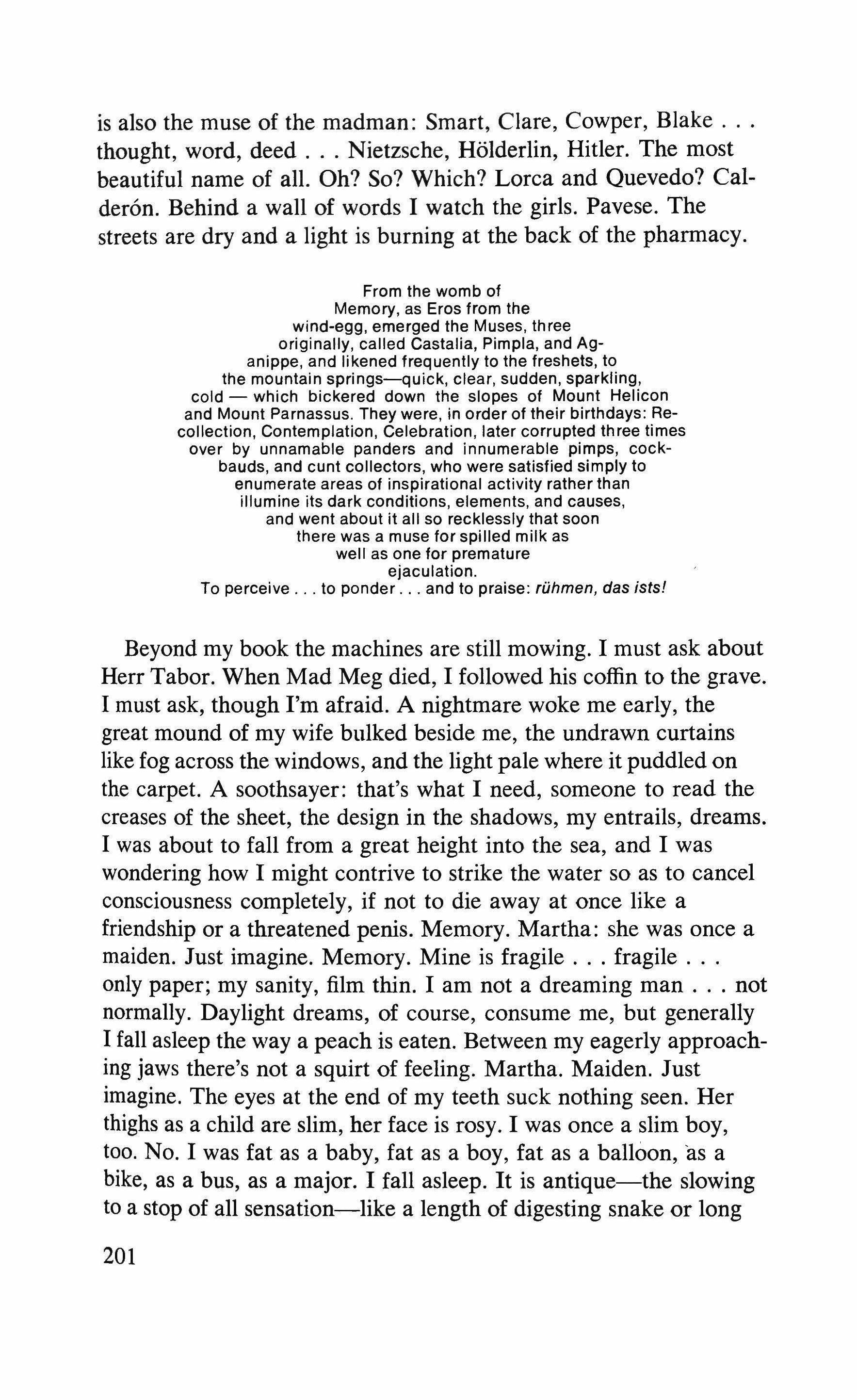
is also the muse of the madman: Smart, Clare, Cowper, Blake thought, word, deed Nietzsche, Holderlin, Hitler. The most beautiful name of all. Oh? So? Which? Lorca and Quevedo? Calderon. Behind a wall of words I watch the girls. Pavese. The streets are dry and a light is burning at the back of the pharmacy.
From the womb of Memory, as Eros from the wind-egg, emerged the Muses, three originally, called Castalia, Pimpla, and Aganippe, and likened frequently to the freshets, to the mountain springs-quick, clear, sudden, sparkling, cold - which bickered down the slopes of Mount Helicon and Mount Parnassus. They were, in order of their birthdays: Recollection, Contemplation, Celebration, later corrupted three times over by unnamable panders and innumerable pimps, cockbauds, and cunt collectors, who were satisfied simply to enumerate areas of inspirational activity rather than illumine its dark conditions, elements, and causes, and went about it all so recklessly that soon there was a muse for spilled milk as well as one for premature ejaculation.
To perceive to ponder and to praise: riihmen, das ists!
Beyond my book the machines are still mowing. I must ask about Herr Tabor. When Mad Meg died, I followed his coffin to the grave. I must ask, though I'm afraid. A nightmare woke me early, the great mound of my wife bulked beside me, the undrawn curtains like fog across the windows, and the light pale where it puddled on the carpet. A soothsayer: that's what I need, someone to read the creases of the sheet, the design in the shadows, my entrails, dreams. I was about to fall from a great height into the sea, and I was wondering how I might contrive to strike the water so as to cancel consciousness completely, if not to die away at once like a friendship or a threatened penis. Memory. Martha: she was once a maiden. Just imagine. Memory. Mine is fragile fragile only paper; my sanity, film thin. I am not a dreaming man not normally. Daylight dreams, of course, consume me, but generally I fall asleep the way a peach is eaten. Between my eagerly approaching jaws there's not a squirt of feeling. Martha. Maiden. Just imagine. The eyes at the end of my teeth suck nothing seen. Her thighs as a child are slim, her face is rosy. I was once a slim boy, too. No. I was fat as a baby, fat as a boy, fat as a balloon, as a bike, as a bus, as a major. I fall asleep. It is antique-the slowing to a stop of all sensation-like a length of digesting snake or long
201
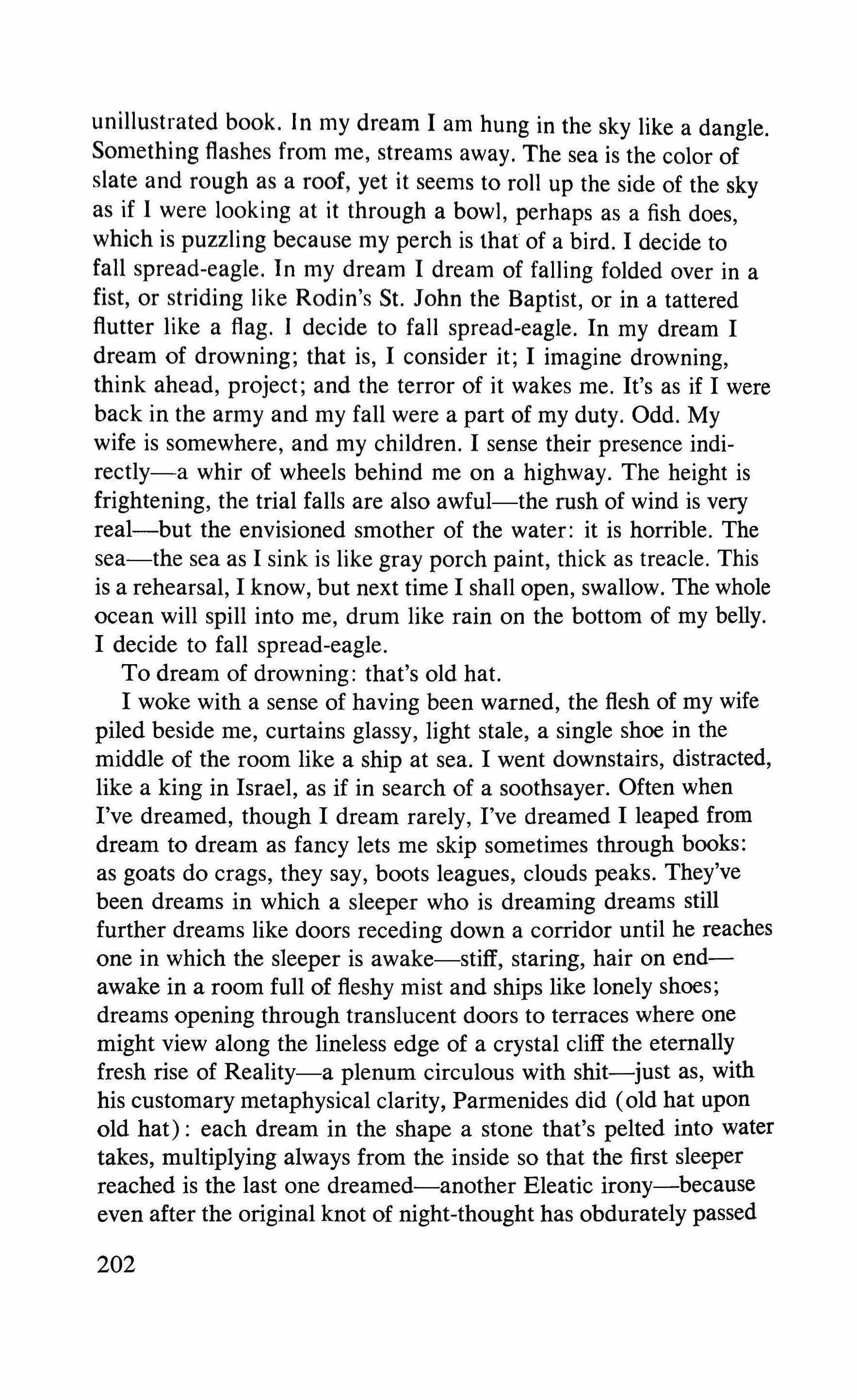
un illustrated book. In my dream I am hung in the sky like a dangle. Something flashes from me, streams away. The sea is the color of slate and rough as a roof, yet it seems to roll up the side of the sky as if I were looking at it through a bowl, perhaps as a fish does, which is puzzling because my perch is that of a bird. I decide to fall spread-eagle. In my dream I dream of falling folded over in a fist, or striding like Rodin's St. John the Baptist, or in a tattered flutter like a flag. I decide to fall spread-eagle. In my dream I dream of drowning; that is, I consider it; I imagine drowning, think ahead, project; and the terror of it wakes me. It's as if I were back in the army and my fall were a part of my duty. Odd. My wife is somewhere, and my children. I sense their presence indirectly-a whir of wheels behind me on a highway. The height is frightening, the trial falls are also awful-the rush of wind is very real-but the envisioned smother of the water: it is horrible. The sea-the sea as I sink is like gray porch paint, thick as treacle. This is a rehearsal, I know, but next time I shall open, swallow. The whole ocean will spill into me, drum like rain on the bottom of my belly. I decide to fall spread-eagle.
To dream of drowning: that's old hat.
I woke with a sense of having been warned, the flesh of my wife piled beside me, curtains glassy, light stale, a single shoe in the middle of the room like a ship at sea. I went downstairs, distracted, like a king in Israel, as if in search of a soothsayer. Often when I've dreamed, though I dream rarely, I've dreamed I leaped from dream to dream as fancy lets me skip sometimes through books: as goats do crags, they say, boots leagues, clouds peaks. They've been dreams in which a sleeper who is dreaming dreams still further dreams like doors receding down a corridor until he reaches one in which the sleeper is awake-stiff, staring, hair on endawake in a room full of fleshy mist and ships like lonely shoes; dreams opening through translucent doors to terraces where one might view along the lineless edge of a crystal cliff the eternally fresh rise of Reality-a plenum circulous with shit-just as, with his customary metaphysical clarity, Parmenides did (old hat upon old hat): each dream in the shape a stone that's pelted into water takes, multiplying always from the inside so that the first sleeper reached is the last one dreamed-another Eleatic irony-because even after the original knot of night-thought has obdurately passed
202
beyond the bottom by penetrating silt, its farewells persist in fainter and fainter prints, in wider and wider widening rings.
it was like falling into the sea to pass that open door a wind like cold water space a cold glass flights of fish surprise my nose myah! breath goes f a

I wonder what the warning was. My memory is delicate, obscene. Mad Meg in the Maelstrom: shouting through the jostle-yelling at a shoulder, addressing a chest, demonstrating handholds, grips on history. The marble tries to gleam, but shadows fall on shadows there like played cards. Meg cannot gesture freely even as an image on the floor. And above him, where his voice has risen, there is an equally obliterating babble. When I grumble about my work, Martha moves in, smiles across the breakfast table, wags the spoon she'll use to stir her coffee. How I hate that imperious gesture. Intemperately, Tabor reiterates, tries to make himself heard. The spoon which wags will in a moment stir. The light that was glowing in its bowl floats on the surface of her coffee now like cream. And I recreate him, including his ear fur, the hair on his hands. You really don't want to finish that big brute's book, Wilfred. What would you do then? You'd be a knitter without wool, hotel with an absent lobby. Her mind has this habit of incessant example: a horseless rider, Easterless bunny, Mellon without money. You don't have a hobby. She smiles a thin smile like a coconut cracks. You hate to teach school-your students pester, annoy, and bore you-so the only occupation for which you're paid won't 203
.s s pp all thl hasha ened befo d t re an
s

do. You have refused friends, my help, the advice of your sons. You won't work around the house, trim shrubs, grow flowers, comb the cat. I don't blame you for holding back. You're simply afraid of retirement, of living in a vacant lot, behind a billboard, in a weedy, windy, empty place. Meg's own head hears him, perhaps. Perhaps he's only a consciousness with the volume up. History, mein Herr, is all end: Schlossrede, -rechnung, -satz. The bottom of the bottom, my friend: Endbescheid, -buchstabe, ya, Schlosszeichen, -worte. Fin. Fin. Fin. Who wants to? I 00; but I should hate to end a shitter without a stool, die like dice without dots. Muffin crumbs have made my saucer unsafe, the butter tweedy. Martha's face is full of freshly scrubbed blood. The wall is acrawl with paper vines. I wonder would one of them hold me. Martha's crack is now so wide nut milk is seeping. Imp without evil, she smugly suggests, that's what you'd be. My fork simmers in a broken egg. I'm not allowed to lick my knife. So let me mow the snow on weekends, daddy, for a dime. I lift my fork to salute the devil which I serve. My dear Martha. I had a paper route. And a change maker fastened to my belt. My dear Martha, I say with a syrupy lilt, though I allow my fork to clatter, my dear Martha, grow-flow-flourish. I used to love to let the nickels drop. Snick snick two pennies snick a nickel snick a dime. My dear. Longer ago than that, it seems, I looked on your face with fascination. Now I see in you what you see in me. The quarter: I never had too many of those. Snick a penny. I do the dishes in this house and so I care about the cleanliness of tines. I also put the pitchfork in the earth. I hoe. I rake. You cut. You trim. You train. You snick. I clear away the vines. The good old days. Click. Smick. The once fine times. I sold the Journal door to door. Liberty. The American Magazine. My dear, you already fill each tiny crawl and cranny of my life as though you were sweetly reconditioned air. Her rich lips quiver slightly. It's a little late to pay attention to the kids, but you might at least learn to drive the car. I remember protesting that there were too many Jews. Ah, Kohler-Tabor touches his trousers-there are too many Hindoos. Birth has always been the bane of bodily existence. And here I am entering fifty as though it were the outskirts of Moline. I lift my fork in salute but observe it covered with yolk. Still, there are so many things I might in my general lateness learn: how to wiggle my middle finger on the sounding string. I would pedal my
204
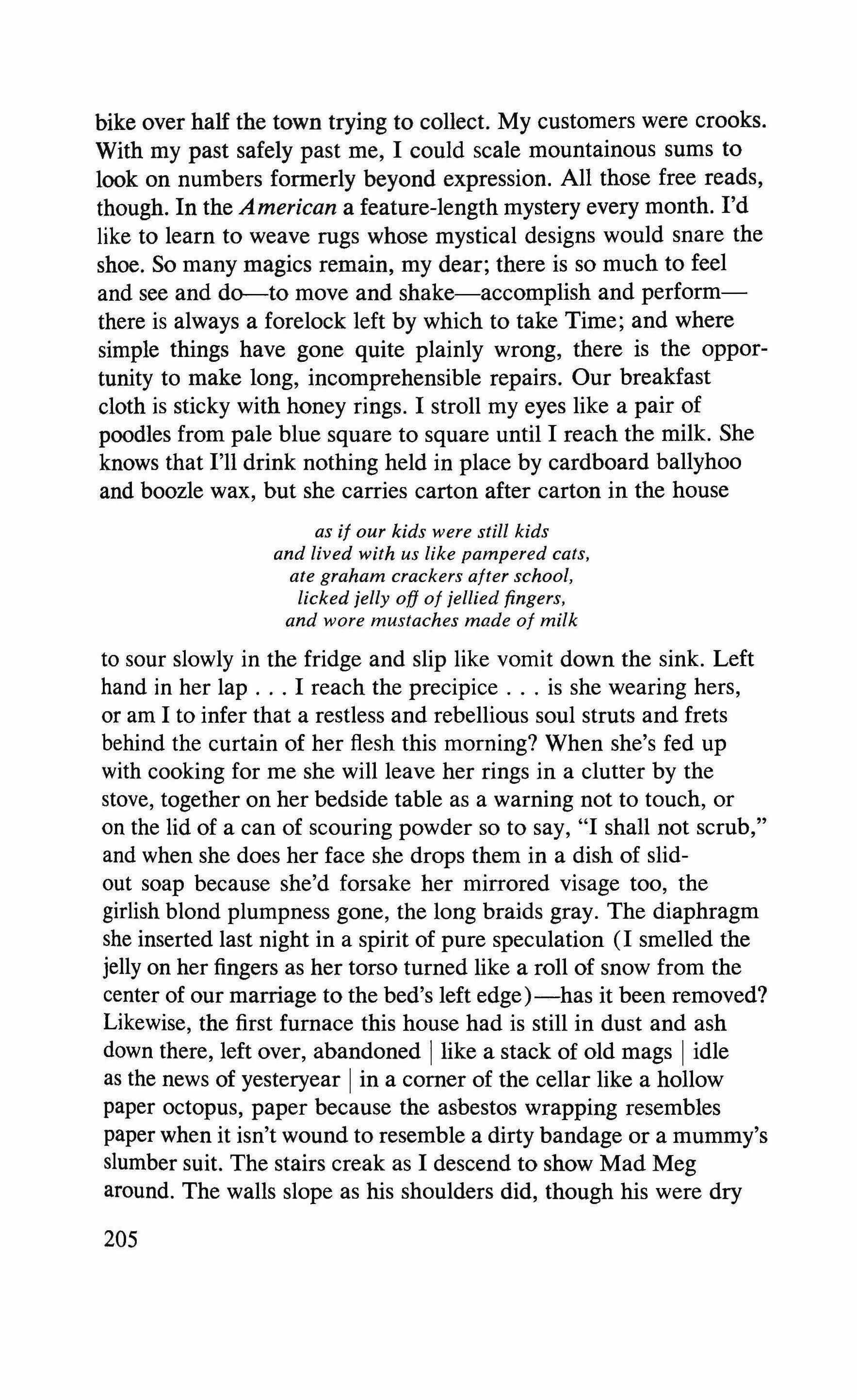
bike over half the town trying to collect. My customers were crooks. With my past safely past me, I could scale mountainous sums to look on numbers formerly beyond expression. All those free reads, though. In the American a feature-length mystery every month. I'd like to learn to weave rugs whose mystical designs would snare the shoe. So many magics remain, my dear; there is so much to feel and see and do--to move and shake-accomplish and performthere is always a forelock left by which to take Time; and where simple things have gone quite plainly wrong, there is the opportunity to make long, incomprehensible repairs. Our breakfast cloth is sticky with honey rings. I stroll my eyes like a pair of poodles from pale blue square to square until I reach the milk. She knows that I'll drink nothing held in place by cardboard ballyhoo and boozle wax, but she carries carton after carton in the house
as if our kids were still kids and lived with us like pampered cats, ate graham crackers after school, licked jelly off of jellied fingers, and wore mustaches made of milk to sour slowly in the fridge and slip like vomit down the sink. Left hand in her lap I reach the precipice is she wearing hers, or am I to infer that a restless and rebellious soul struts and frets behind the curtain of her flesh this morning? When she's fed up with cooking for me she will leave her rings in a clutter by the stove, together on her bedside table as a warning not to touch, or on the lid of a can of scouring powder so to say, "I shall not scrub," and when she does her face she drops them in a dish of slidout soap because she'd forsake her mirrored visage too, the girlish blond plumpness gone, the long braids gray. The diaphragm she inserted last night in a spirit of pure speculation (I smelled the jelly on her fingers as her torso turned like a roll of snow from the center of our marriage to the bed's left edge)-has it been removed? Likewise, the first furnace this house had is still in dust and ash down there, left over, abandoned I like a stack of old mags I idle as the news of yesteryear in a corner of the cellar like a hollow paper octopus, paper because the asbestos wrapping resembles paper when it isn't wound to resemble a dirty bandage or a mummy's slumber suit. The stairs creak as I descend to show Mad Meg around. The walls slope as his shoulders did, though his were dry
205
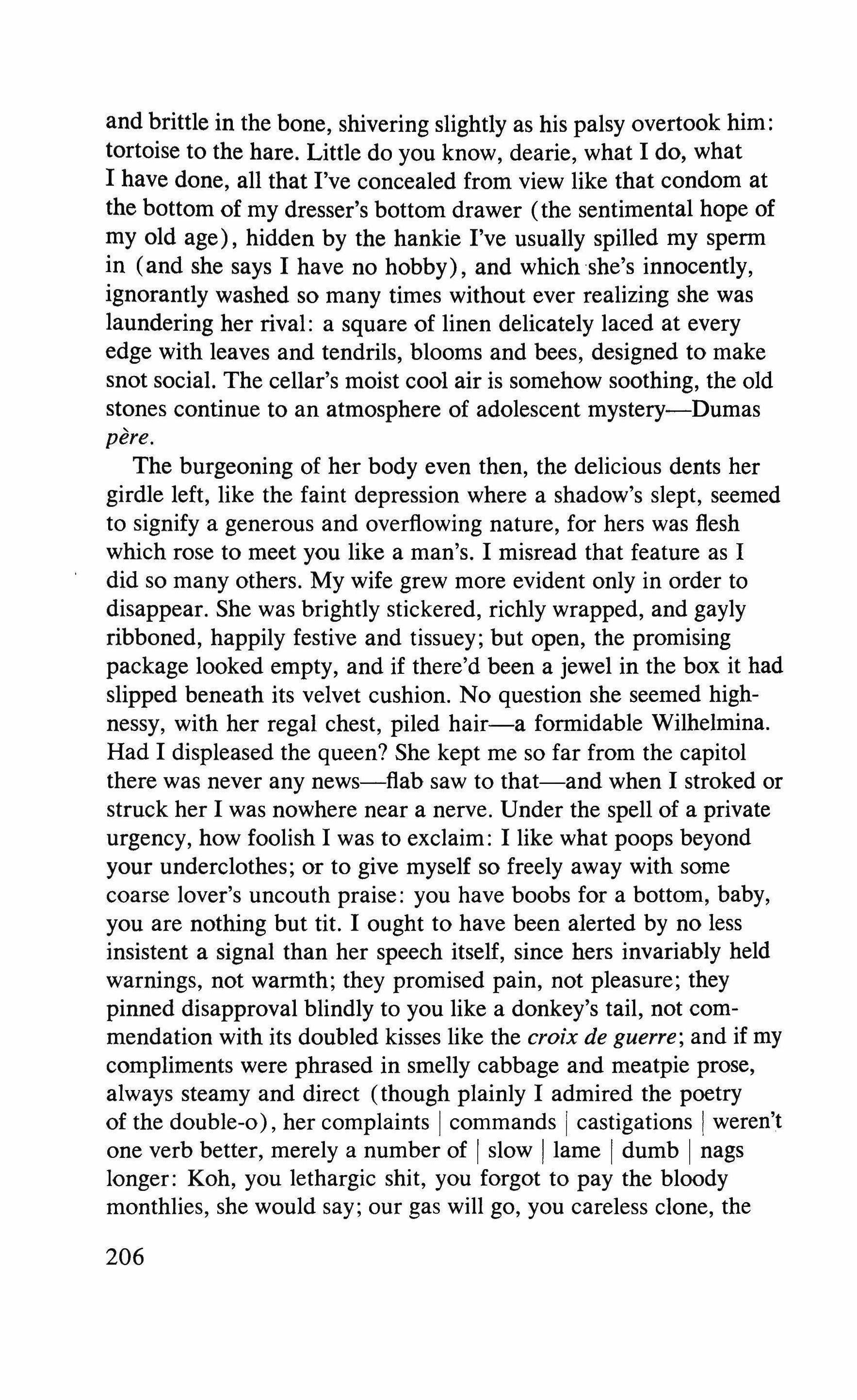
and brittle in the bone, shivering slightly as his palsy overtook him: tortoise to the hare. Little do you know, dearie, what I do, what I have done, all that I've concealed from view like that condom at the bottom of my dresser's bottom drawer (the sentimental hope of myoid age), hidden by the hankie I've usually spilled my sperm in (and she says I have no hobby), and which she's innocently, ignorantly washed so many times without ever realizing she was laundering her rival: a square of linen delicately laced at every edge with leaves and tendrils, blooms and bees, designed to make snot social. The cellar's moist cool air is somehow soothing, the old stones continue to an atmosphere of adolescent mystery-Dumas pere.
The burgeoning of her body even then, the delicious dents her girdle left, like the faint depression where a shadow's slept, seemed to signify a generous and overflowing nature, for hers was flesh which rose to meet you like a man's. I misread that feature as I did so many others. My wife grew more evident only in order to disappear. She was brightly stickered, richly wrapped, and gayly ribboned, happily festive and tissuey; but open, the promising package looked empty, and if there'd been a jewel in the box it had slipped beneath its velvet cushion. No question she seemed highnessy, with her regal chest, piled hair-a formidable Wilhelmina. Had I displeased the queen? She kept me so far from the capitol there was never any news-flab saw to that-and when I stroked or struck her I was nowhere near a nerve. Under the spell of a private urgency, how foolish I was to exclaim: I like what poops beyond your underclothes; or to give myself so freely away with some coarse lover's uncouth praise: you have boobs for a bottom, baby, you are nothing but tit. I ought to have been alerted by no less insistent a signal than her speech itself, since hers invariably held warnings, not warmth; they promised pain, not pleasure; they pinned disapproval blindly to you like a donkey's tail, not commendation with its doubled kisses like the croix de guerre; and if my compliments were phrased in smelly cabbage and meatpie prose, always steamy and direct (though plainly I admired the poetry of the double-o), her complaints commands I castigations I weren't one verb better, merely a number of I slow I lame dumb nags longer: Koh, you lethargic shit, you forgot to pay the bloody monthlies, she would say; our gas will go, you careless clone, the
206
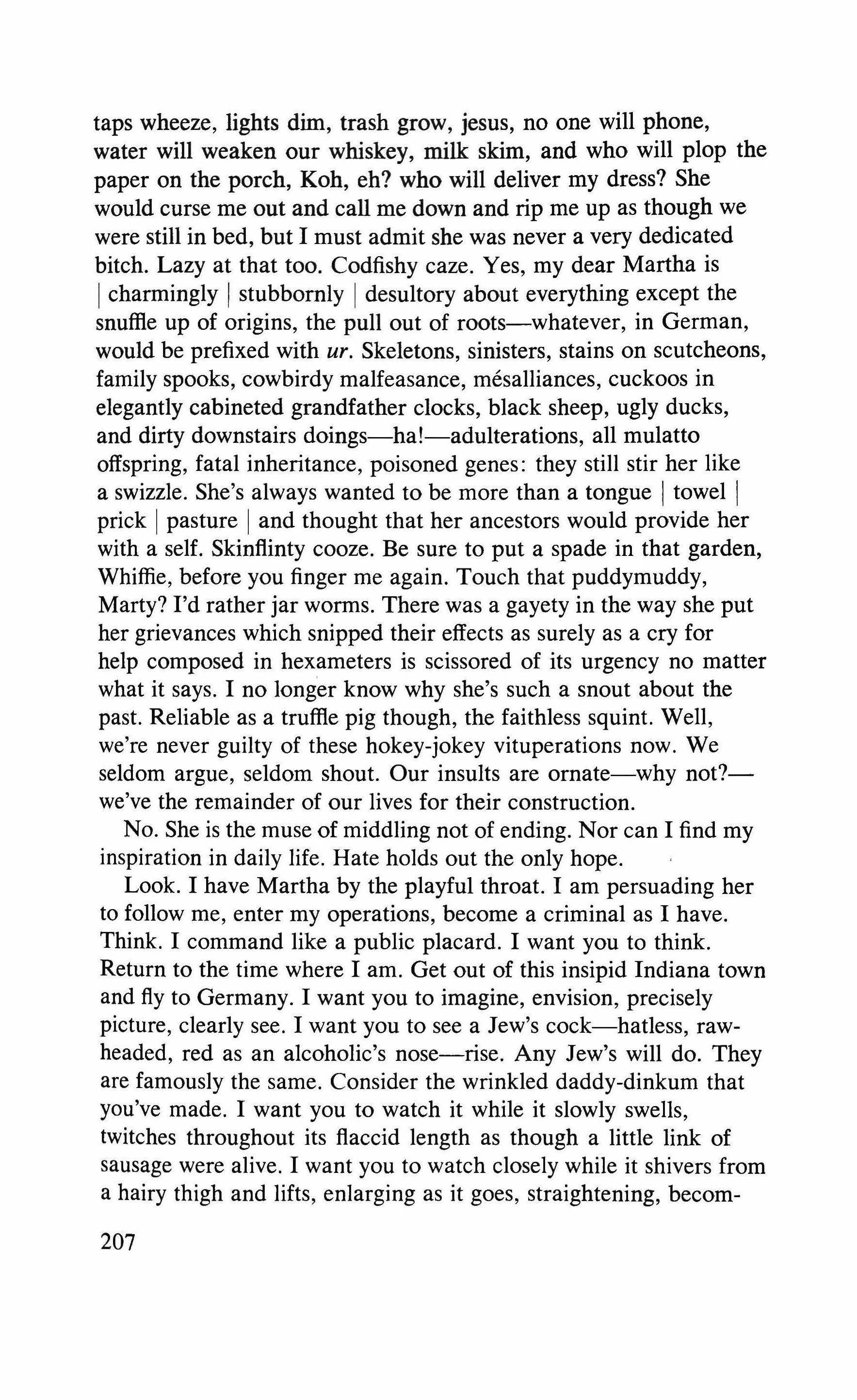
taps wheeze, lights dim, trash grow, jesus, no one will phone, water will weaken our whiskey, milk skim, and who will plop the paper on the porch, Koh, eh? who will deliver my dress? She would curse me out and call me down and rip me up as though we were still in bed, but I must admit she was never a very dedicated bitch. Lazy at that too. Codfishy caze. Yes, my dear Martha is I charmingly I stubbornly desultory about everything except the snuffle up of origins, the pull out of roots-whatever, in German, would be prefixed with ur. Skeletons, sinisters, stains on scutcheons, family spooks, cowbirdy malfeasance, mesalliances, cuckoos in elegantly cabineted grandfather clocks, black sheep, ugly ducks, and dirty downstairs doings-hal-adulterations, all mulatto offspring, fatal inheritance, poisoned genes: they still stir her like a swizzle. She's always wanted to be more than a tongue I towel prick pasture and thought that her ancestors would provide her with a self. Skinfiinty cooze. Be sure to put a spade in that garden, Whiffie, before you finger me again. Touch that puddymuddy, Marty? I'd rather jar worms. There was a gayety in the way she put her grievances which snipped their effects as surely as a cry for help composed in hexameters is scissored of its urgency no matter what it says. I no longer know why she's such a snout about the past. Reliable as a truffle pig though, the faithless squint. Well, we're never guilty of these hokey-jokey vituperations now. We seldom argue, seldom shout. Our insults are ornate-why not?we've the remainder of our lives for their construction.
No. She is the muse of middling not of ending. Nor can I find my inspiration in daily life. Hate holds out the only hope.
Look. I have Martha by the playful throat. I am persuading her to follow me, enter my operations, become a criminal as I have. Think. I command like a public placard. I want you to think. Return to the time where I am. Get out of this insipid Indiana town and fly to Germany. I want you to imagine, envision, precisely picture, clearly see. I want you to see a Jew's cock-hatless, rawheaded, red as an alcoholic's nose-rise. Any Jew's will do. They are famously the same. Consider the wrinkled daddy-dinkum that you've made. I want you to watch it while it slowly swells, twitches throughout its flaccid length as though a little link of sausage were alive. I want you to watch closely while it shivers from a hairy thigh and lifts, enlarging as it goes, straightening, becom-
207
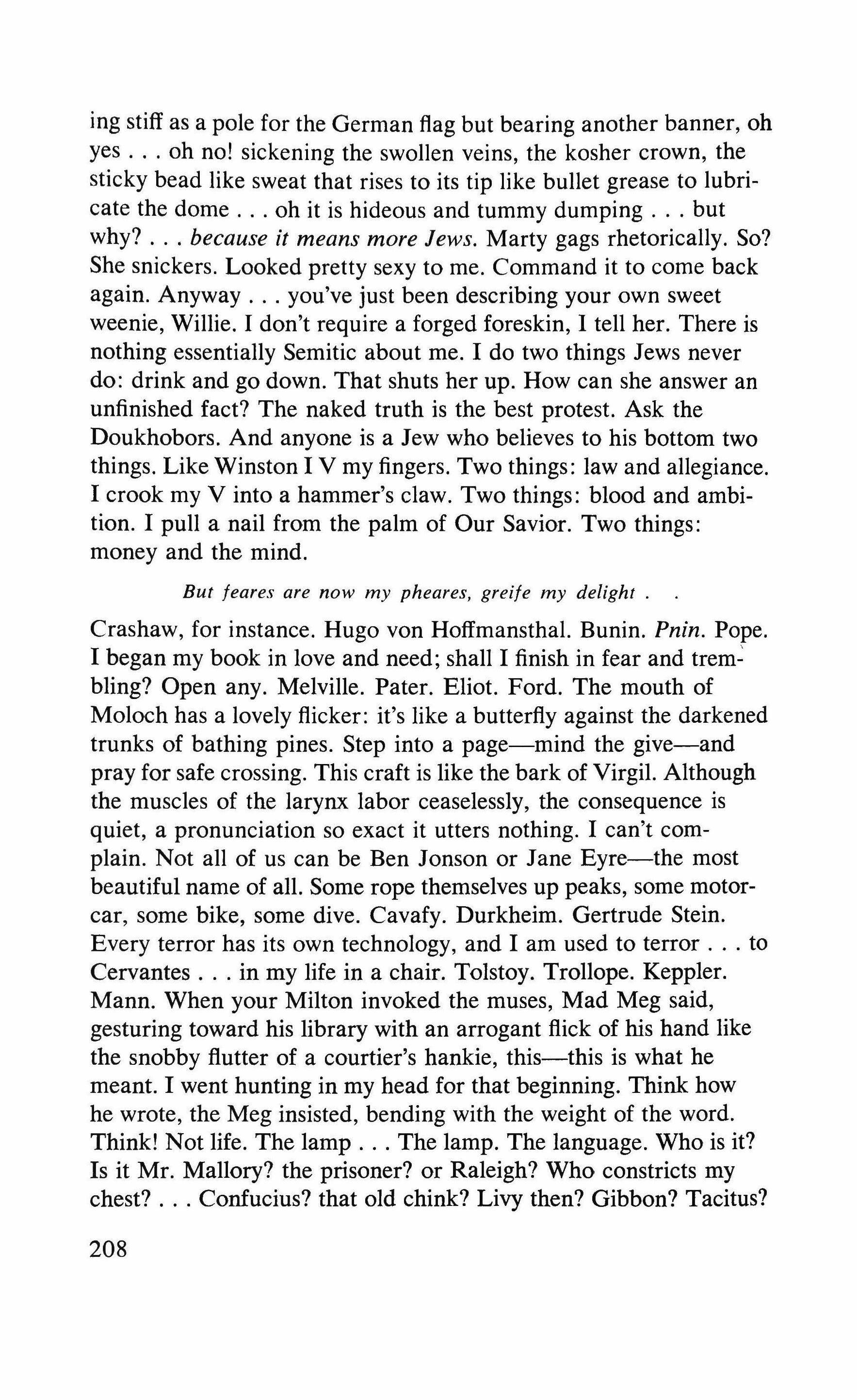
ing stiff as a pole for the German flag but bearing another banner, oh yes oh no! sickening the swollen veins, the kosher crown, the sticky bead like sweat that rises to its tip like bullet grease to lubricate the dome oh it is hideous and tummy dumping but why? because it means more Jews. Marty gags rhetorically. So? She snickers. Looked pretty sexy to me. Command it to come back again. Anyway you've just been describing your own sweet weenie, Willie. I don't require a forged foreskin, I tell her. There is nothing essentially Semitic about me. I do two things Jews never do: drink and go down. That shuts her up. How can she answer an unfinished fact? The naked truth is the best protest. Ask the Doukhobors. And anyone is a Jew who believes to his bottom two things. Like Winston I V my fingers. Two things: law and allegiance. I crook my V into a hammer's claw. Two things: blood and ambition. I pull a nail from the palm of Our Savior. Two things: money and the mind.
But [eares are now my pheares, greife my delight Crashaw, for instance. Hugo von Hoffmansthal. Bunin. Pnin. Pope. I began my book in love and need; shall I finish in fear and trembling? Open any. Melville. Pater. Eliot. Ford. The mouth of Moloch has a lovely flicker: it's like a butterfly against the darkened trunks of bathing pines. Step into a page-mind the give-and pray for safe crossing. This craft is like the bark of Virgil. Although the muscles of the larynx labor ceaselessly, the consequence is quiet, a pronunciation so exact it utters nothing. I can't complain. Not all of us can be Ben Jonson or Jane Eyre-the most beautiful name of all. Some rope themselves up peaks, some motorcar, some bike, some dive. Cavafy. Durkheim. Gertrude Stein. Every terror has its own technology, and I am used to terror to Cervantes in my life in a chair. Tolstoy. Trollope. Keppler. Mann. When your Milton invoked the muses, Mad Meg said, gesturing toward his library with an arrogant flick of his hand like the snobby flutter of a courtier's hankie, this-this is what he meant. I went hunting in my head for that beginning. Think how he wrote, the Meg insisted, bending with the weight of the word. Think! Not life. The lamp The lamp. The language. Who is it? Is it Mr. Mallory? the prisoner? or Raleigh? Who constricts my chest? Confucius? that old chink? Livy then? Gibbon? Tacitus?
208

Gilgamesh. How many times have I fallen inside a sentence while running from a word? Winckelmann. Kafka. Kleist. You would not believe that long bodiless climb from Descartes to Leibniz.
Lewis. Lemuel Gulliver. Catullus. Gogol. Constant. Sterne. I live on a ledge-a sill-of type-a brink. Here. Pascal. Alone. Among the silences inside my books Frege, Wittgenstein within the rhythms of reason the withheld breath, the algebra of alliteration, the freedom of design Dryden, Zeno, Stevens, Keats the perpetual hush, blood in the penis, the deductions of rhyme Here. James and James and James and Joyce: the: the Breakers. Charmes. At the quick edge of space. In The Faerie Queene. In "Jabberwocky." In the slow mind of time.
Mater Matuta, I beg you, let me come out alive.
209
from The castle of crossed destinies
[talo Calvina
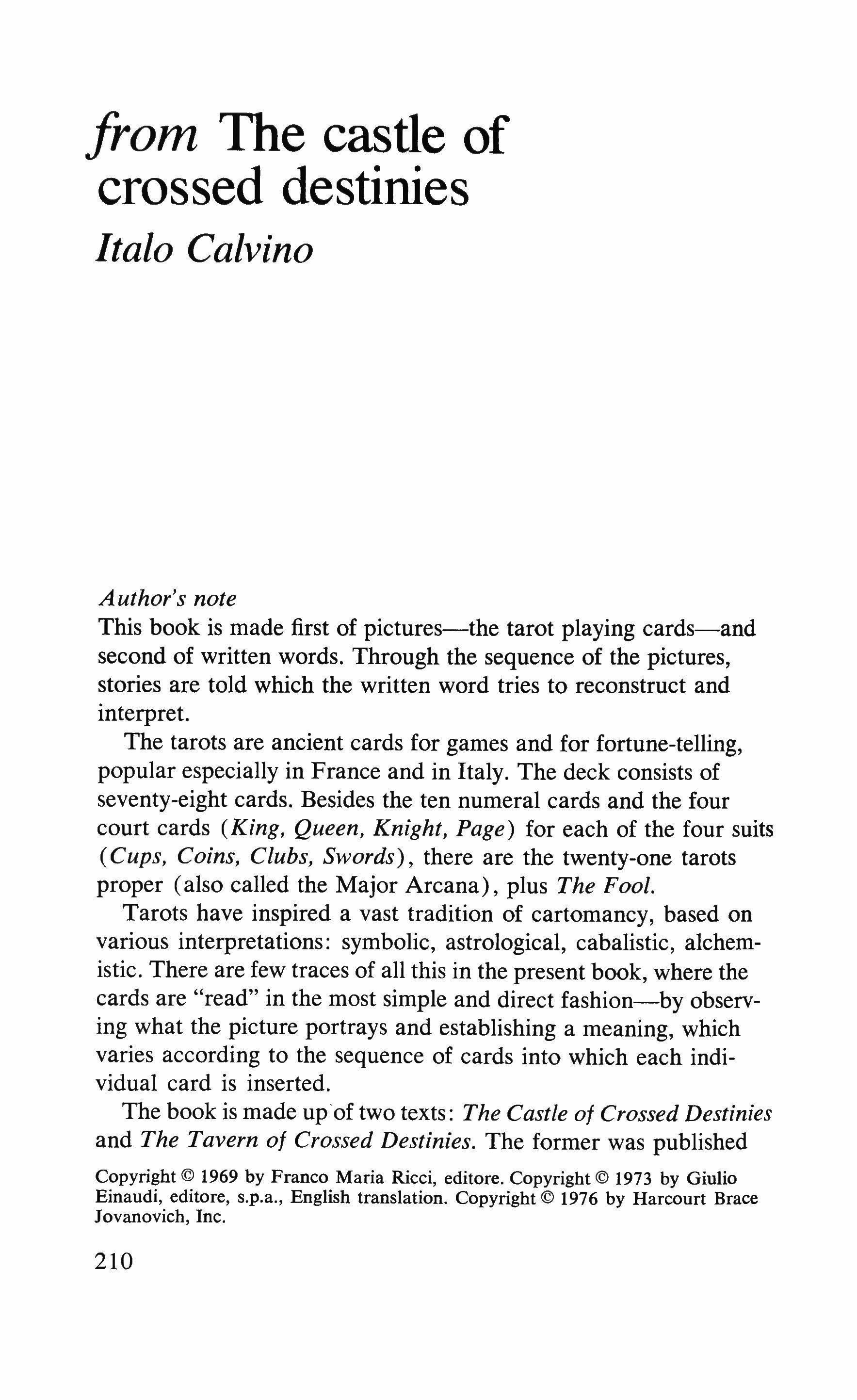
Author's note
This book is made first of pictures-the tarot playing cards-and second of written words. Through the sequence of the pictures, stories are told which the written word tries to reconstruct and interpret.
The tarots are ancient cards for games and for fortune-telling, popular especially in France and in Italy. The deck consists of seventy-eight cards. Besides the ten numeral cards and the four court cards (King, Queen, Knight, Page) for each of the four suits (Cups, Coins, Clubs, Swords), there are the twenty-one tarots proper (also called the Major Arcana), plus The Fool.
Tarots have inspired a vast tradition of cartomancy, based on various interpretations: symbolic, astrological, cabalistic, alchemistic. There are few traces of all this in the present book, where the cards are "read" in the most simple and direct fashion-by observing what the picture portrays and establishing a meaning, which varies according to the sequence of cards into which each individual card is inserted.
The book is made upof two texts: The Castle of Crossed Destinies and The Tavern of Crossed Destinies. The former was published
Copyright © 1969 by Franco Maria Ricci, editore. Copyright © 1973 by Giulio Einaudi, editore, s.p.a., English translation. Copyright © 1976 by Harcourt Brace Jovanovich, Inc.
210
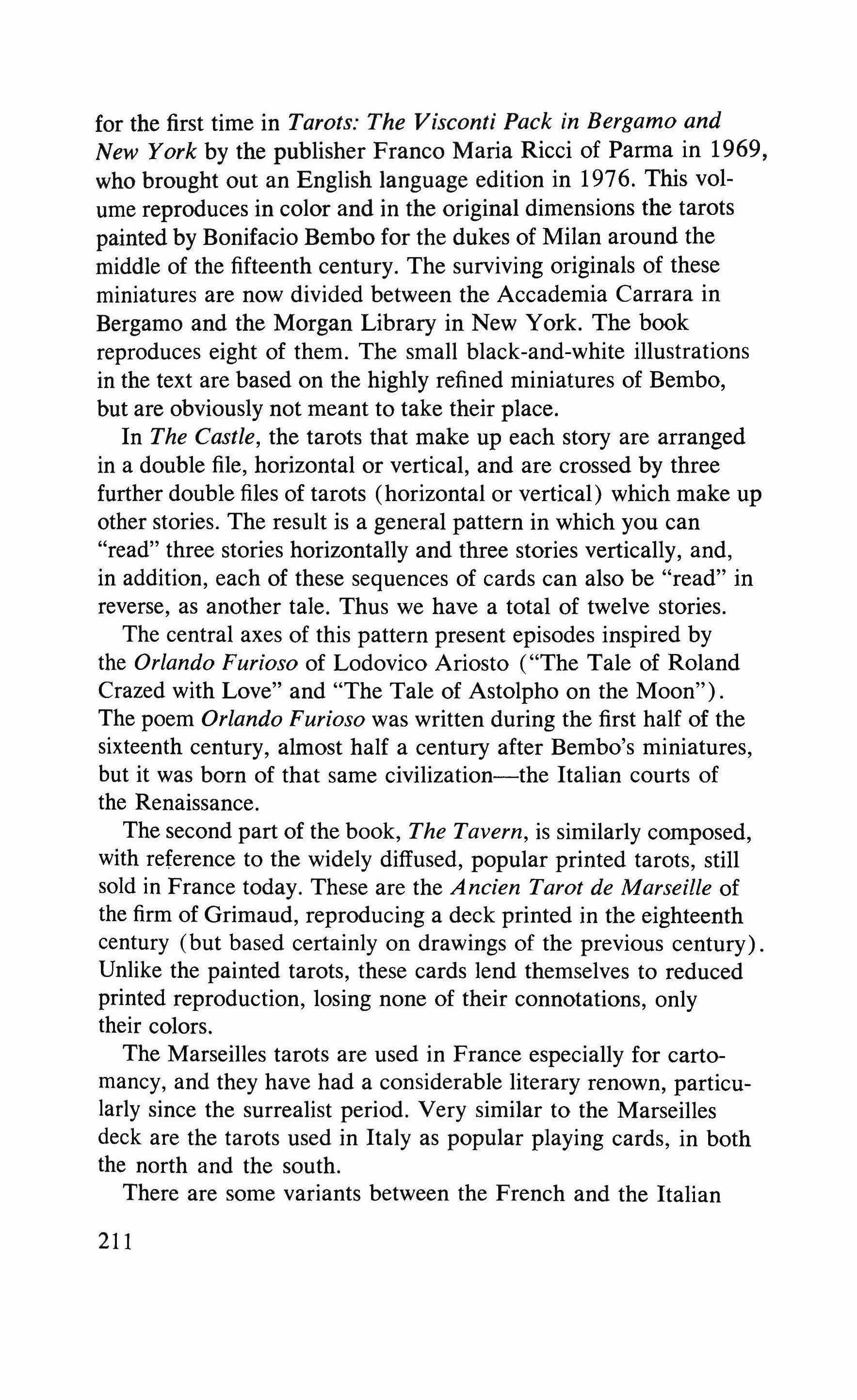
for the first time in Tarots: The Visconti Pack in Bergamo and New York by the publisher Franco Maria Ricci of Parma in 1969, who brought out an English language edition in 1976. This volume reproduces in color and in the original dimensions the tarots painted by Bonifacio Bembo for the dukes of Milan around the middle of the fifteenth century. The surviving originals of these miniatures are now divided between the Accademia Carrara in Bergamo and the Morgan Library in New York. The book reproduces eight of them. The small black-and-white illustrations in the text are based on the highly refined miniatures of Bembo, but are obviously not meant to take their place.
In The Castle, the tarots that make up each story are arranged in a double file, horizontal or vertical, and are crossed by three further double files of tarots (horizontal or vertical) which make up other stories. The result is a general pattern in which you can "read" three stories horizontally and three stories vertically, and, in addition, each of these sequences of cards can also be "read" in reverse, as another tale. Thus we have a total of twelve stories.
The central axes of this pattern present episodes inspired by the Orlando Furioso of Lodovico Ariosto ("The Tale of Roland Crazed with Love" and "The Tale of Astolpho on the Moon"). The poem Orlando Furioso was written during the first half of the sixteenth century, almost half a century after Bembo's miniatures, but it was born of that same civilization-the Italian courts of the Renaissance.
The second part of the book, The Tavern, is similarly composed, with reference to the widely diffused, popular printed tarots, still sold in France today. These are the Ancien Tarot de Marseille of the firm of Grimaud, reproducing a deck printed in the eighteenth century (but based certainly on drawings of the previous century). Unlike the painted tarots, these cards lend themselves to reduced printed reproduction, losing none of their connotations, only their colors.
The Marseilles tarots are used in France especially for cartomancy, and they have had a considerable literary renown, particularly since the surrealist period. Very similar to the Marseilles deck are the tarots used in Italy as popular playing cards, in both the north and the south.
There are some variants between the French and the Italian 211

names of the cards. La Maison-Dieu is the mysterious French name for the card called in Italian La Torre (The Tower). Le Jugement is known as L'Angelo (The Angel). L'Amoureux may be called L'Amore (Love) or Gli Amanti (The Lovers). From the singular L'Etoile the name shifts to the plural, Le Stelle. I have followed whichever nomenclature best suited the situation. The first tarot has an obscure name in both languages: Le Bateleur, II Bagatto. As a rule, it is interpreted as The Juggler or The Magician. Also in The Tavern, the sequence of the tarots composes the stories, and the seventy-eight cards spread out on the table form a general pattern in which the various tales intersect. But whereas in The Castle the cards making up the individual tales are in clearly defined horizontal or vertical rows, in The Tavern they form blocks with more irregular outlines, superimposed in the central area of the general pattern, where cards that appear in almost all the tales are concentrated.
I publish this book to be free of it; it has obsessed me for years. I began by trying to line up tarots at random, to see if I could read a story in them. "The Waverer's Tale" emerged; I started writing it down. I looked for other combinations of the same cards; I realized the tarots were a machine for constructing stories; I thought of a book, and I imagined its frame: the mute narrators, the forest, the inn; I was tempted by the diabolical idea of conjuring up all the stories that could be contained in a tarot deck.
I thought of constructing a kind of crossword puzzle made of tarots instead of letters, of pictographic stories instead of words. I wanted all the stories to have a coherent significance, and I wanted them to afford me pleasure in writing them, or in rewriting them if they were already classic stories. I succeeded with the Visconti tarots because I first constructed the stories of Roland and Astolpho, and for the other stories I was content to put them together as they came, with the cards laid down. I could have followed the same method with the Marseilles tarots, but I was unwilling to sacrifice any of the narrative possibilities I was offered by these cards, so crude and mysterious. The Marseilles tarots continued giving me ideas, and every tale tended to attract all the cards to itself. I had already written "The Waverer," which required many cards; I had in mind a Shakespearean pastiche with Hamlet,
212
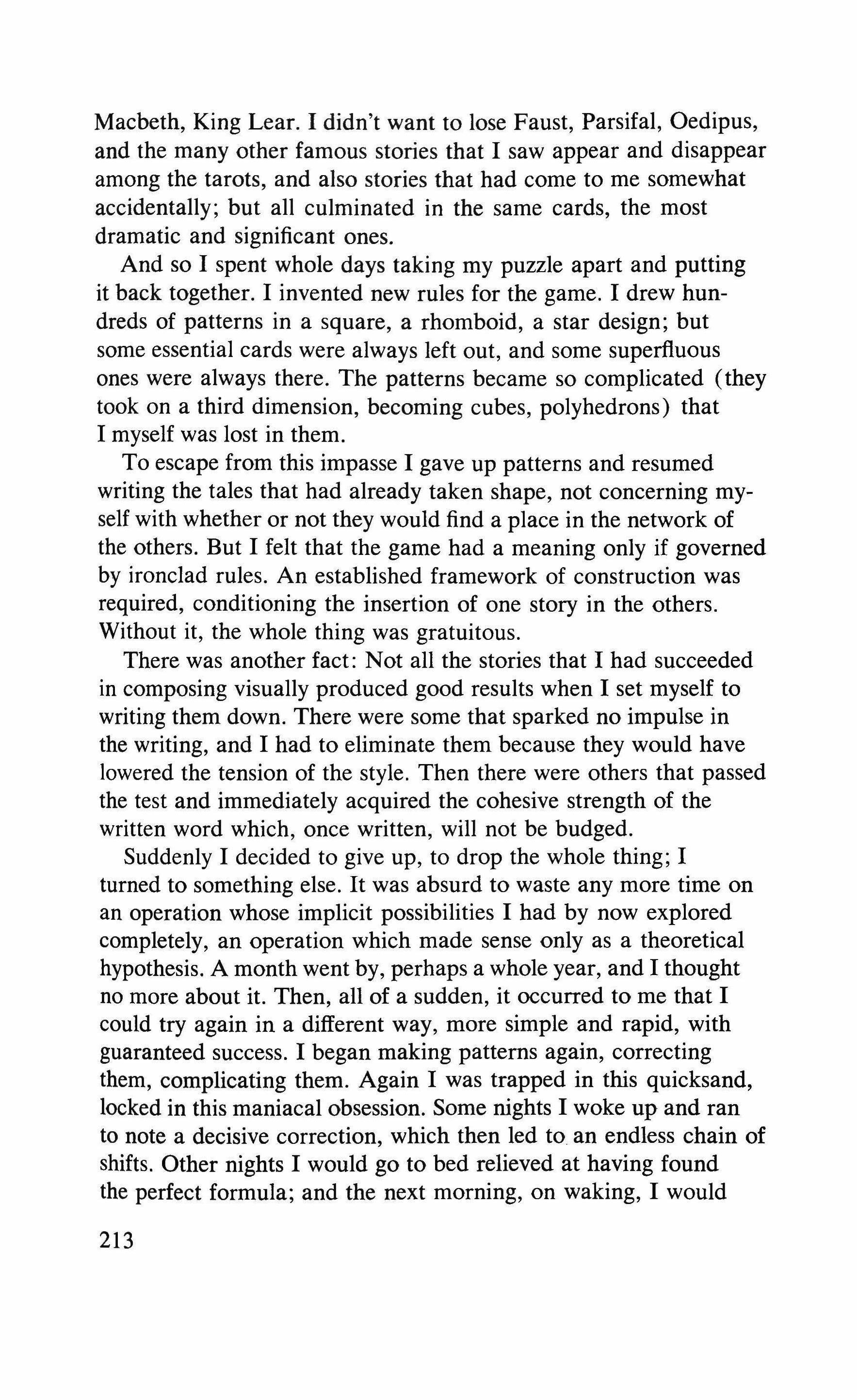
Macbeth, King Lear. I didn't want to lose Faust, Parsifal, Oedipus, and the many other famous stories that I saw appear and disappear among the tarots, and also stories that had come to me somewhat accidentally; but all culminated in the same cards, the most dramatic and significant ones.
And so I spent whole days taking my puzzle apart and putting it back together. I invented new rules for the game. I drew hundreds of patterns in a square, a rhomboid, a star design; but some essential cards were always left out, and some superfluous ones were always there. The patterns became so complicated (they took on a third dimension, becoming cubes, polyhedrons) that I myself was lost in them.
To escape from this impasse I gave up patterns and resumed writing the tales that had already taken shape, not concerning myself with whether or not they would find a place in the network of the others. But I felt that the game had a meaning only if governed by ironclad rules. An established framework of construction was required, conditioning the insertion of one story in the others. Without it, the whole thing was gratuitous.
There was another fact: Not all the stories that I had succeeded in composing visually produced good results when I set myself to writing them down. There were some that sparked no impulse in the writing, and I had to eliminate them because they would have lowered the tension of the style. Then there were others that passed the test and immediately acquired the cohesive strength of the written word which, once written, will not be budged.
Suddenly I decided to give up, to drop the whole thing; I turned to something else. It was absurd to waste any more time on an operation whose implicit possibilities I had by now explored completely, an operation which made sense only as a theoretical hypothesis. A month went by, perhaps a whole year, and I thought no more about it. Then, all of a sudden, it occurred to me that I could try again in a different way, more simple and rapid, with guaranteed success. I began making patterns again, correcting them, complicating them. Again I was trapped in this quicksand, locked in this maniacal obsession. Some nights I woke up and ran to note a decisive correction, which then led to an endless chain of shifts. Other nights I would go to bed relieved at having found the perfect formula; and the next morning, on waking, I would
213
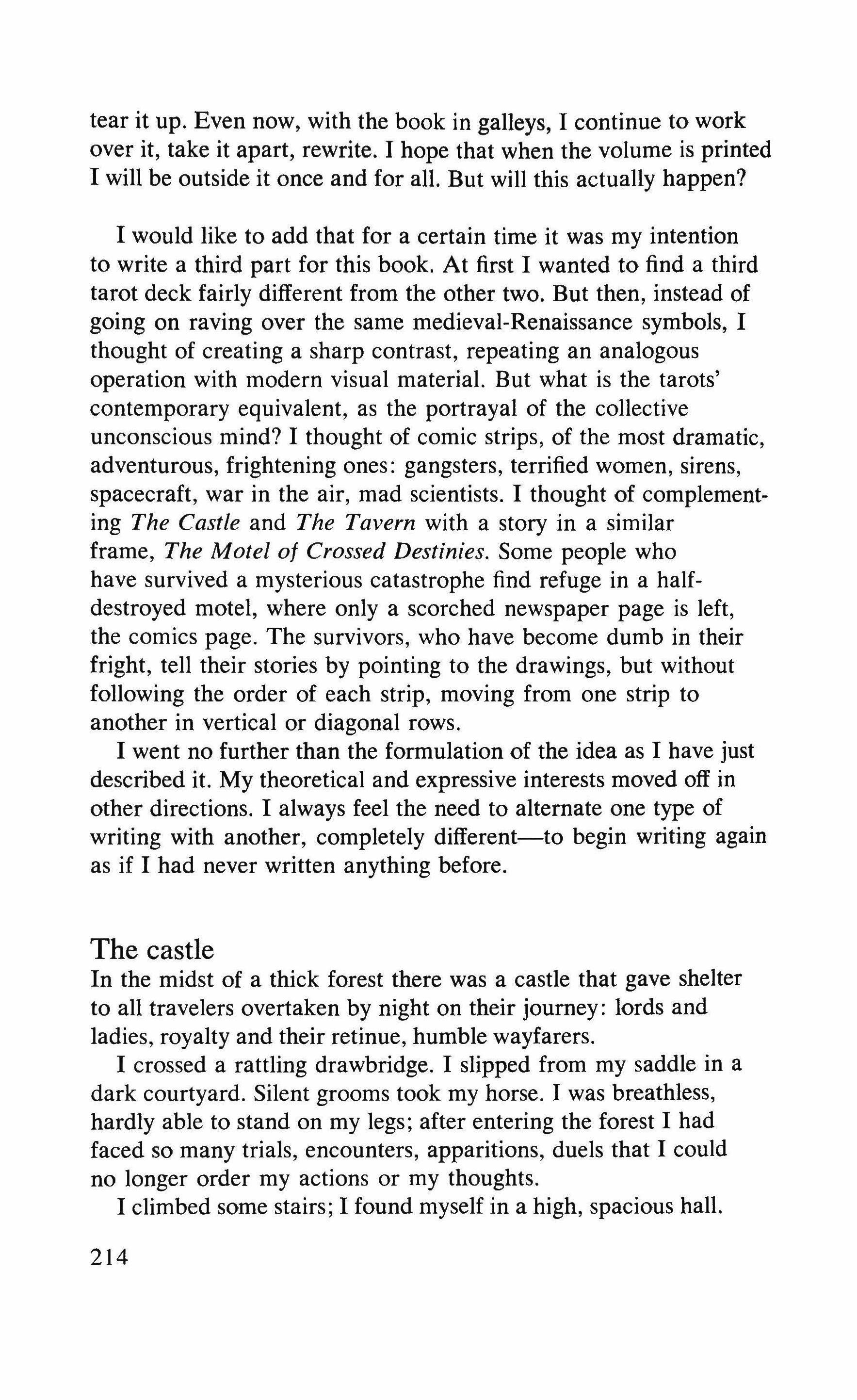
tear it up. Even now, with the book in galleys, I continue to work over it, take it apart, rewrite. I hope that when the volume is printed I will be outside it once and for all. But will this actually happen?
I would like to add that for a certain time it was my intention to write a third part for this book. At first I wanted to find a third tarot deck fairly different from the other two. But then, instead of going on raving over the same medieval-Renaissance symbols, I thought of creating a sharp contrast, repeating an analogous operation with modern visual material. But what is the tarots' contemporary equivalent, as the portrayal of the collective unconscious mind? I thought of comic strips, of the most dramatic, adventurous, frightening ones: gangsters, terrified women, sirens, spacecraft, war in the air, mad scientists. I thought of complementing The Castle and The Tavern with a story in a similar frame, The Motel of Crossed Destinies. Some people who have survived a mysterious catastrophe find refuge in a halfdestroyed motel, where only a scorched newspaper page is left, the comics page. The survivors, who have become dumb in their fright, tell their stories by pointing to the drawings, but without following the order of each strip, moving from one strip to another in vertical or diagonal rows.
I went no further than the formulation of the idea as I have just described it. My theoretical and expressive interests moved off in other directions. I always feel the need to alternate one type of writing with another, completely different-to begin writing again as if I had never written anything before.
The castle
In the midst of a thick forest there was a castle that gave shelter to all travelers overtaken by night on their journey: lords and ladies, royalty and their retinue, humble wayfarers.
I crossed a rattling drawbridge. I slipped from my saddle in a dark courtyard. Silent grooms took my horse. I was breathless, hardly able to stand on my legs; after entering the forest I had faced so many trials, encounters, apparitions, duels that I could no longer order my actions or my thoughts.
I climbed some stairs; I found myself in a high, spacious hall.
214
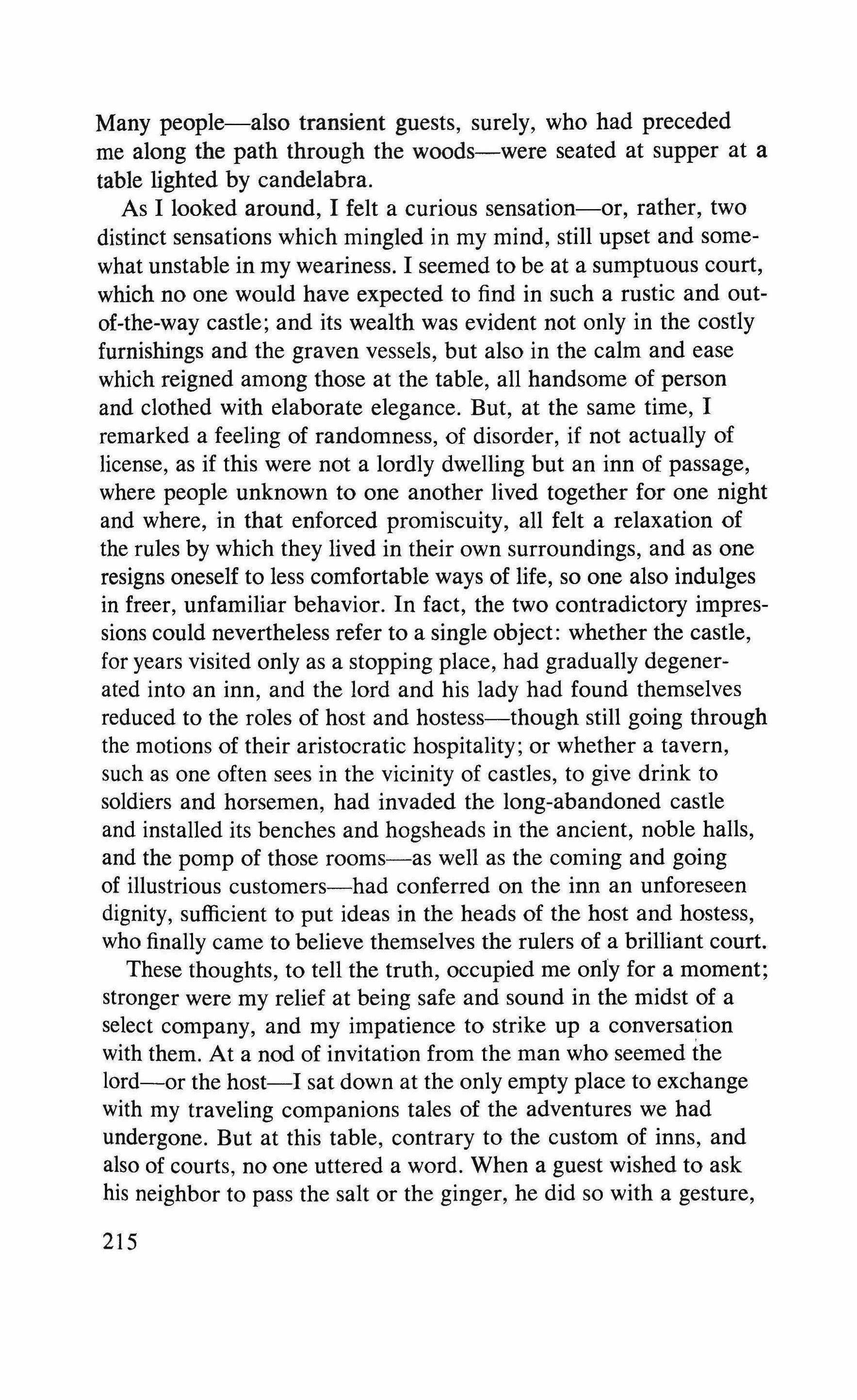
Many people-also transient guests, surely, who had preceded me along the path through the woods-were seated at supper at a table lighted by candelabra.
As I looked around, I felt a curious sensation-or, rather, two distinct sensations which mingled in my mind, still upset and somewhat unstable in my weariness. I seemed to be at a sumptuous court, which no one would have expected to find in such a rustic and outof-the-way castle; and its wealth was evident not only in the costly furnishings and the graven vessels, but also in the calm and ease which reigned among those at the table, all handsome of person and clothed with elaborate elegance. But, at the same time, I remarked a feeling of randomness, of disorder, if not actually of license, as if this were not a lordly dwelling but an inn of passage, where people unknown to one another lived together for one night and where, in that enforced promiscuity, all felt a relaxation of the rules by which they lived in their own surroundings, and as one resigns oneself to less comfortable ways of life, so one also indulges in freer, unfamiliar behavior. In fact, the two contradictory impressions could nevertheless refer to a single object: whether the castle, for years visited only as a stopping place, had gradually degenerated into an inn, and the lord and his lady had found themselves reduced to the roles of host and hostess-though still going through the motions of their aristocratic hospitality; or whether a tavern, such as one often sees in the vicinity of castles, to give drink to soldiers and horsemen, had invaded the long-abandoned castle and installed its benches and hogsheads in the ancient, noble halls, and the pomp of those rooms-as well as the coming and going of illustrious customers-had conferred on the inn an unforeseen dignity, sufficient to put ideas in the heads of the host and hostess, who finally came to believe themselves the rulers of a brilliant court. These thoughts, to tell the truth, occupied me only for a moment; stronger were my relief at being safe and sound in the midst of a select company, and my impatience to strike up a conversation with them. At a nod of invitation from the man who seemed the lord-or the host-I sat down at the only empty place to exchange with my traveling companions tales of the adventures we had undergone. But at this table, contrary to the custom of inns, and also of courts, no one uttered a word. When a guest wished to ask his neighbor to pass the salt or the ginger, he did so with a gesture,
215
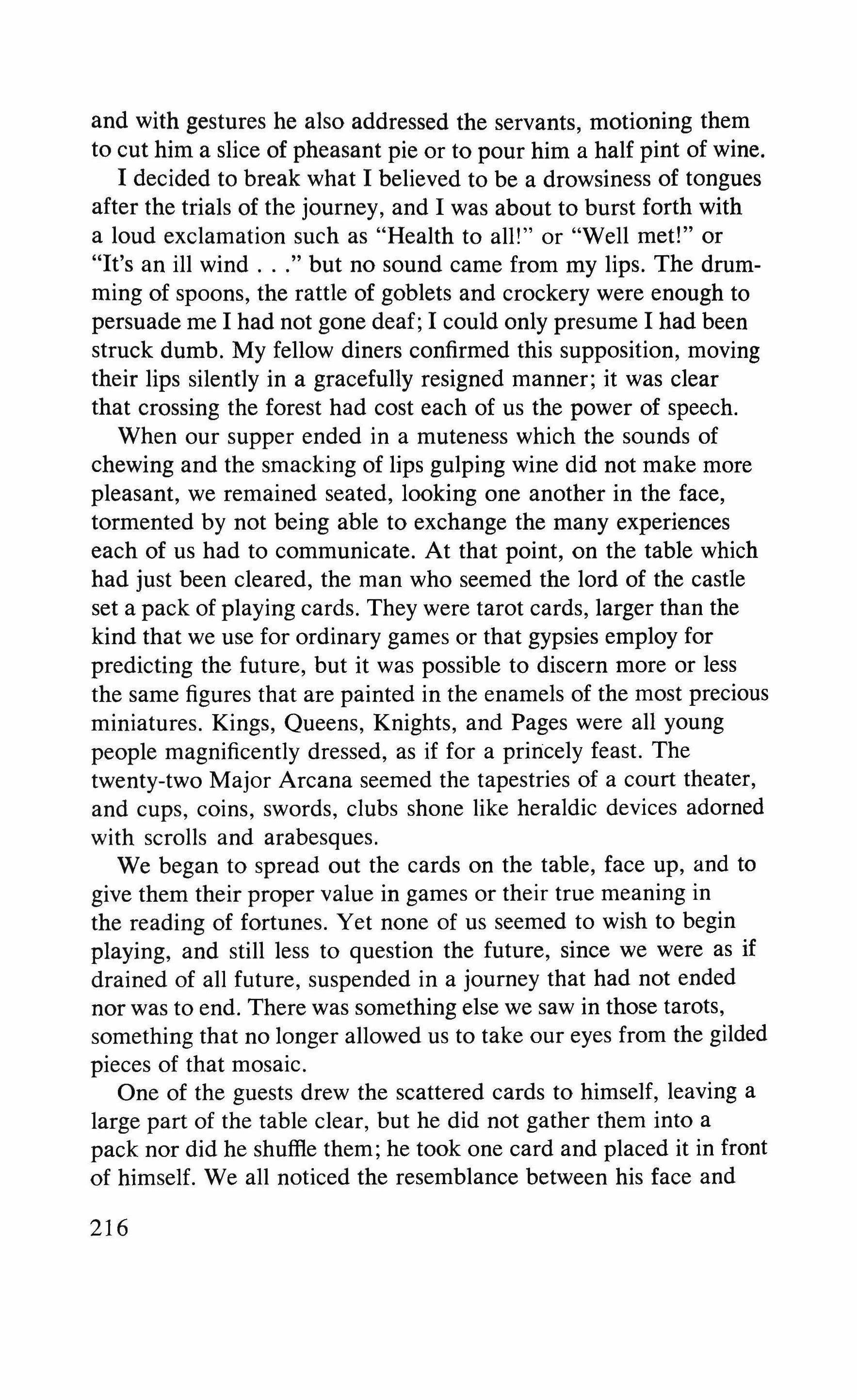
and with gestures he also addressed the servants, motioning them to cut him a slice of pheasant pie or to pour him a half pint of wine. I decided to break what I believed to be a drowsiness of tongues after the trials of the journey, and I was about to burst forth with a loud exclamation such as "Health to all!" or "Well met!" or "It's an ill wind but no sound came from my lips. The drumming of spoons, the rattle of goblets and crockery were enough to persuade me I had not gone deaf; I could only presume I had been struck dumb. My fellow diners confirmed this supposition, moving their lips silently in a gracefully resigned manner; it was clear that crossing the forest had cost each of us the power of speech.
When our supper ended in a muteness which the sounds of chewing and the smacking of lips gulping wine did not make more pleasant, we remained seated, looking one another in the face, tormented by not being able to exchange the many experiences each of us had to communicate. At that point, on the table which had just been cleared, the man who seemed the lord of the castle set a pack of playing cards. They were tarot cards, larger than the kind that we use for ordinary games or that gypsies employ for predicting the future, but it was possible to discern more or less the same figures that are painted in the enamels of the most precious miniatures. Kings, Queens, Knights, and Pages were all young people magnificently dressed, as if for a princely feast. The twenty-two Major Arcana seemed the tapestries of a court theater, and cups, coins, swords, clubs shone like heraldic devices adorned with scrolls and arabesques.
We began to spread out the cards on the table, face up, and to give them their proper value in games or their true meaning in the reading of fortunes. Yet none of us seemed to wish to begin playing, and still less to question the future, since we were as if drained of all future, suspended in a journey that had not ended nor was to end. There was something else we saw in those tarots, something that no longer allowed us to take our eyes from the gilded pieces of that mosaic.
One of the guests drew the scattered cards to himself, leaving a large part of the table clear, but he did not gather them into a pack nor did he shuffle them; he took one card and placed it in front of himself. We all noticed the resemblance between his face and
216
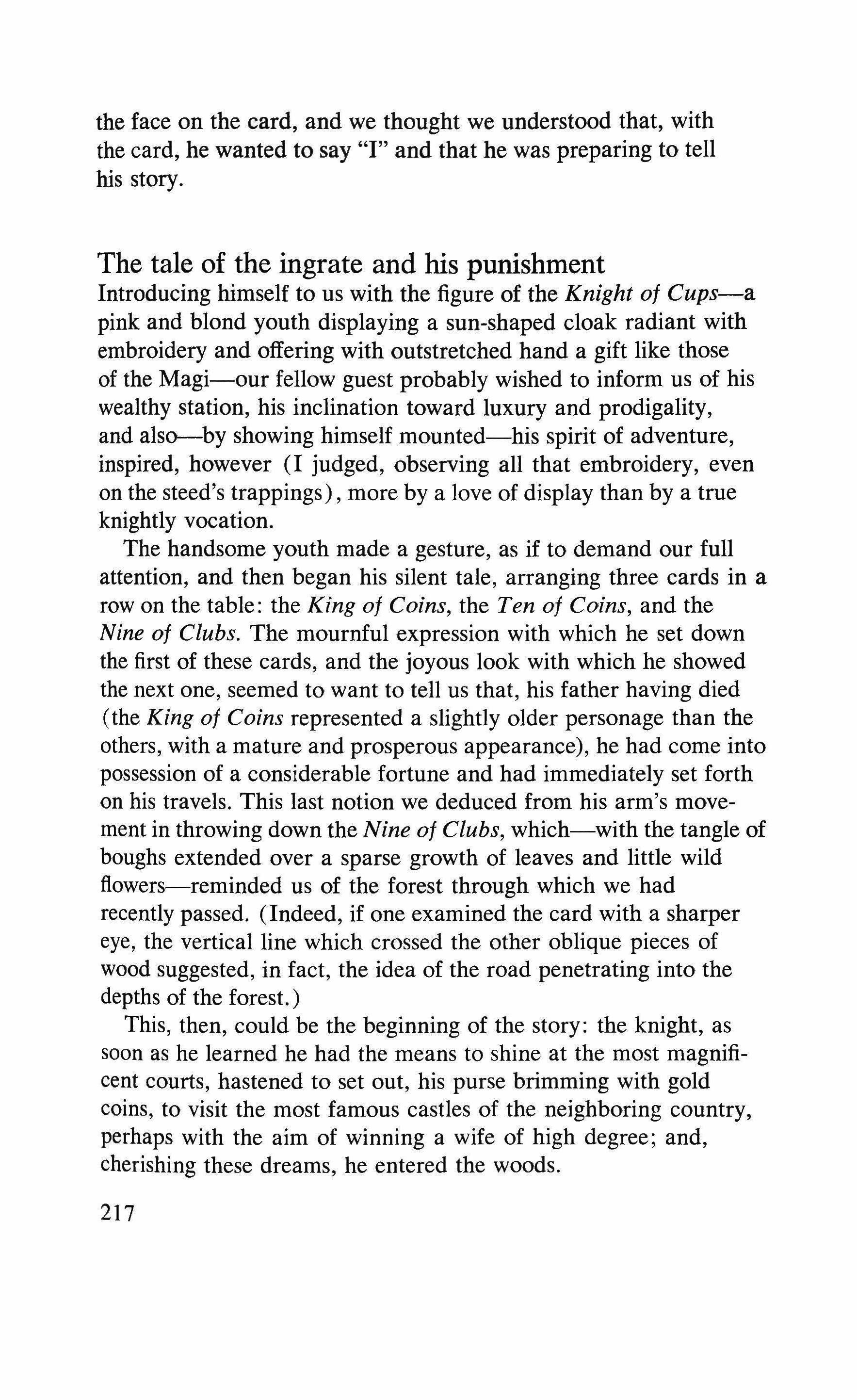
the face on the card, and we thought we understood that, with the card, he wanted to say "I" and that he was preparing to tell his story.
The tale of the ingrate and his punishment
Introducing himself to us with the figure of the Knight of Cups-a pink and blond youth displaying a sun-shaped cloak radiant with embroidery and offering with outstretched hand a gift like those of the Magi-our fellow guest probably wished to inform us of his wealthy station, his inclination toward luxury and prodigality, and also-s-by showing himself mounted-his spirit of adventure, inspired, however (I judged, observing all that embroidery, even on the steed's trappings) more by a love of display than by a true knightly vocation.
The handsome youth made a gesture, as if to demand our full attention, and then began his silent tale, arranging three cards in a row on the table: the King of Coins, the Ten of Coins, and the Nine of Clubs. The mournful expression with which he set down the first of these cards, and the joyous look with which he showed the next one, seemed to want to tell us that, his father having died (the King of Coins represented a slightly older personage than the others, with a mature and prosperous appearance), he had come into possession of a considerable fortune and had immediately set forth on his travels. This last notion we deduced from his arm's movement in throwing down the Nine of Clubs, which-with the tangle of boughs extended over a sparse growth of leaves and little wild flowers-reminded us of the forest through which we had recently passed. (Indeed, if one examined the card with a sharper eye, the vertical line which crossed the other oblique pieces of wood suggested, in fact, the idea of the road penetrating into the depths of the forest.)
This, then, could be the beginning of the story: the knight, as soon as he learned he had the means to shine at the most magnificent courts, hastened to set out, his purse brimming with gold coins, to visit the most famous castles of the neighboring country, perhaps with the aim of winning a wife of high degree; and, cherishing these dreams, he entered the woods.
217
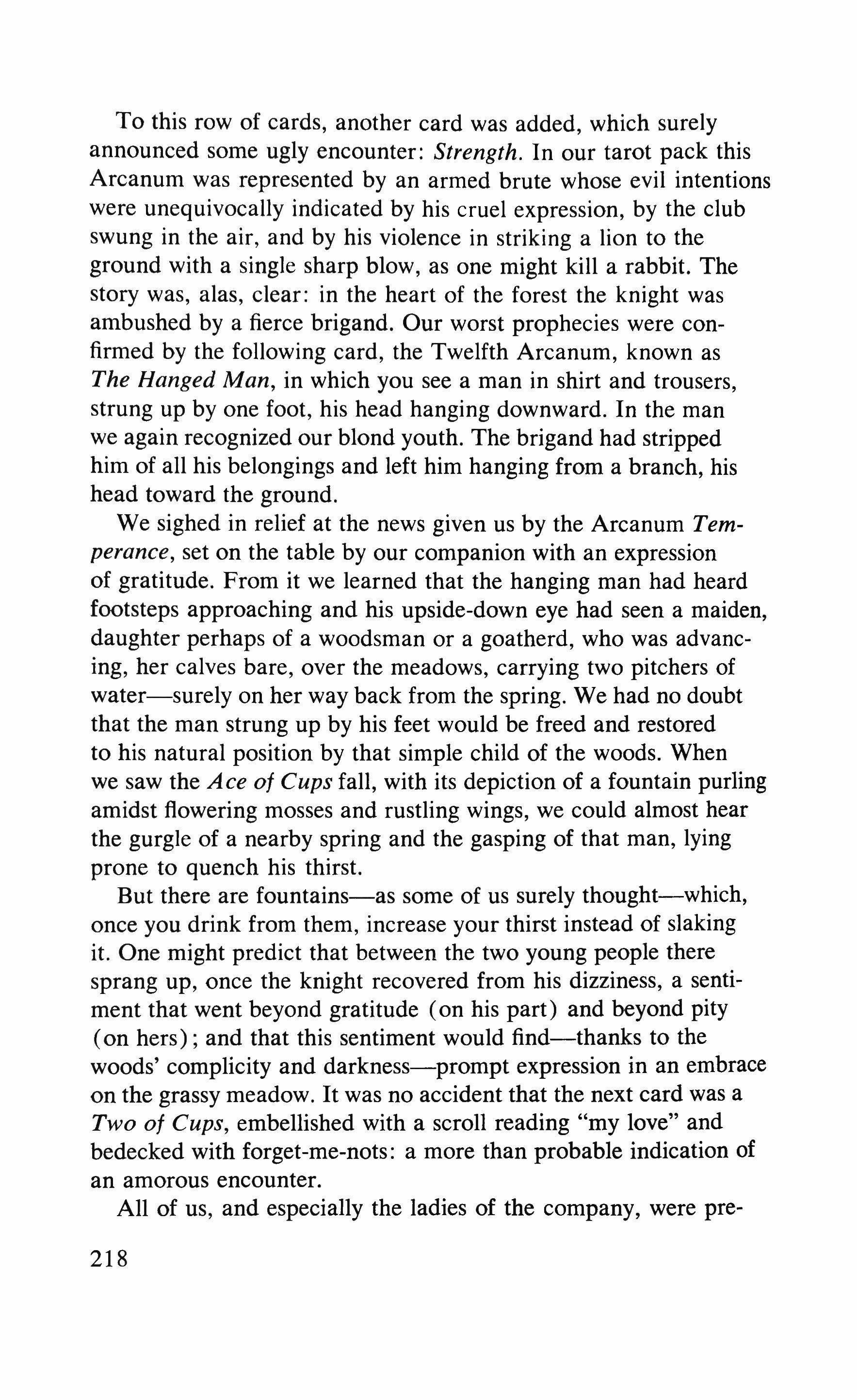
To this row of cards, another card was added, which surely announced some ugly encounter: Strength. In our tarot pack this Arcanum was represented by an armed brute whose evil intentions were unequivocally indicated by his cruel expression, by the club swung in the air, and by his violence in striking a lion to the ground with a single sharp blow, as one might kill a rabbit. The story was, alas, clear: in the heart of the forest the knight was ambushed by a fierce brigand. Our worst prophecies were confirmed by the following card, the Twelfth Arcanum, known as The Hanged Man, in which you see a man in shirt and trousers, strung up by one foot, his head hanging downward. In the man we again recognized our blond youth. The brigand had stripped him of all his belongings and left him hanging from a branch, his head toward the ground.
We sighed in relief at the news given us by the Arcanum Temperance, set on the table by our companion with an expression of gratitude. From it we learned that the hanging man had heard footsteps approaching and his upside-down eye had seen a maiden, daughter perhaps of a woodsman or a goatherd, who was advancing, her calves bare, over the meadows, carrying two pitchers of water-surely on her way back from the spring. We had no doubt that the man strung up by his feet would be freed and restored to his natural position by that simple child of the woods. When we saw the Ace of Cups fall, with its depiction of a fountain purling amidst flowering mosses and rustling wings, we could almost hear the gurgle of a nearby spring and the gasping of that man, lying prone to quench his thirst.
But there are fountains-as some of us surely thought-which, once you drink from them, increase your thirst instead of slaking it. One might predict that between the two young people there sprang up, once the knight recovered from his dizziness, a sentiment that went beyond gratitude (on his part) and beyond pity (on hers) ; and that this sentiment would find-thanks to the woods' complicity and darkness-prompt expression in an embrace on the grassy meadow. It was no accident that the next card was a Two of Cups, embellished with a scroll reading "my love" and bedecked with forget-me-nots: a more than probable indication of an amorous encounter.
All of us, and especially the ladies of the company, were pre-
218
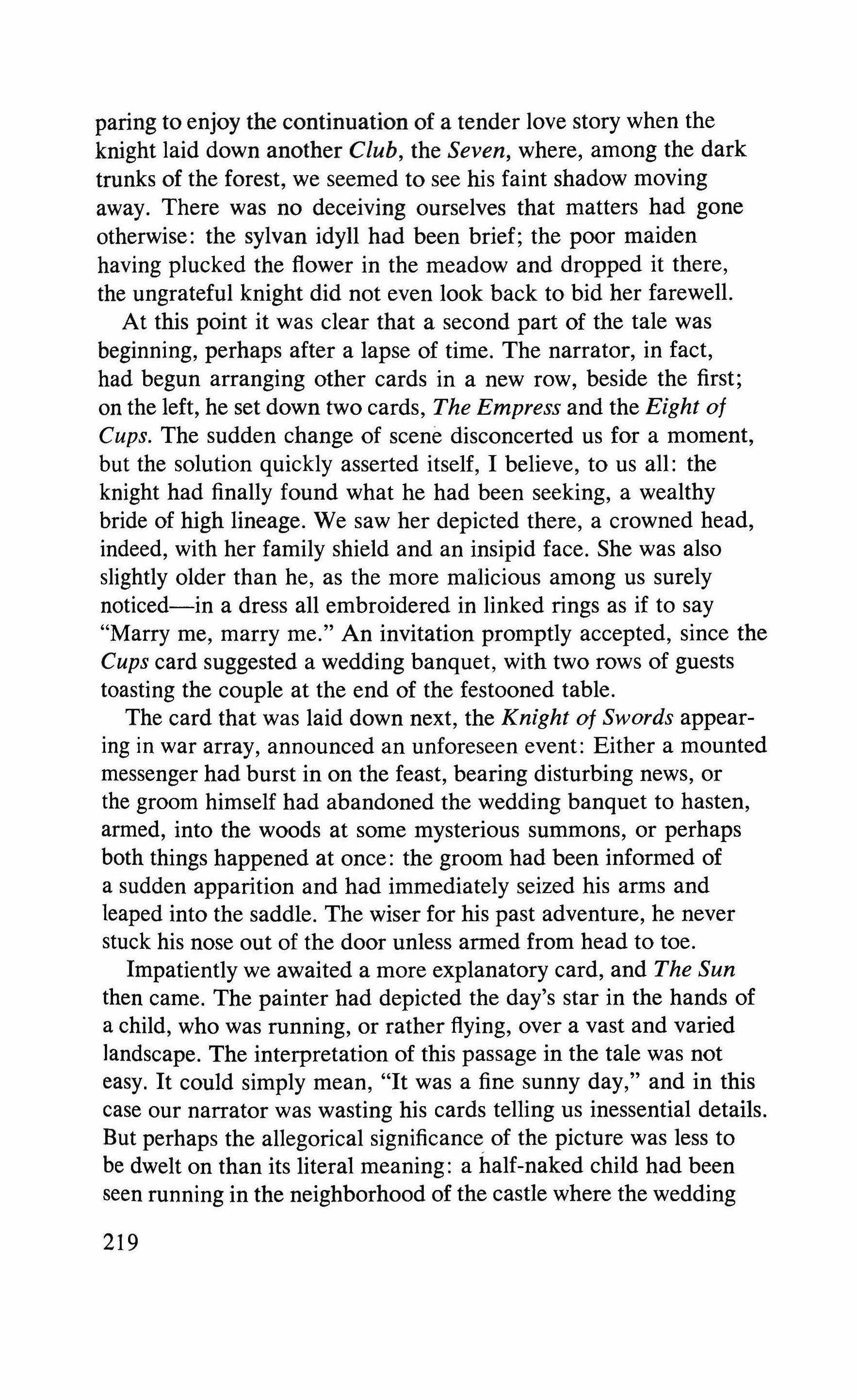
paring to enjoy the continuation of a tender love story when the knight laid down another Club, the Seven, where, among the dark trunks of the forest, we seemed to see his faint shadow moving away. There was no deceiving ourselves that matters had gone otherwise: the sylvan idyll had been brief; the poor maiden having plucked the flower in the meadow and dropped it there, the ungrateful knight did not even look back to bid her farewell.
At this point it was clear that a second part of the tale was beginning, perhaps after a lapse of time. The narrator, in fact, had begun arranging other cards in a new row, beside the first; on the left, he set down two cards, The Empress and the Eight of Cups. The sudden change of scene disconcerted us for a moment, but the solution quickly asserted itself, I believe, to us all: the knight had finally found what he had been seeking, a wealthy bride of high lineage. We saw her depicted there, a crowned head, indeed, with her family shield and an insipid face. She was also slightly older than he, as the more malicious among us surely noticed-in a dress all embroidered in linked rings as if to say "Marry me, marry me." An invitation promptly accepted, since the Cups card suggested a wedding banquet, with two rows of guests toasting the couple at the end of the festooned table.
The card that was laid down next, the Knight of Swords appearing in war array, announced an unforeseen event: Either a mounted messenger had burst in on the feast, bearing disturbing news, or the groom himself had abandoned the wedding banquet to hasten, armed, into the woods at some mysterious summons, or perhaps both things happened at once: the groom had been informed of a sudden apparition and had immediately seized his arms and leaped into the saddle. The wiser for his past adventure, he never stuck his nose out of the door unless armed from head to toe.
Impatiently we awaited a more explanatory card, and The Sun then came. The painter had depicted the day's star in the hands of a child, who was running, or rather flying, over a vast and varied landscape. The interpretation of this passage in the tale was not easy. It could simply mean, "It was a fine sunny day," and in this case our narrator was wasting his cards telling us inessential details. But perhaps the allegorical significance of the picture was less to be dwelt on than its literal meaning: a half-naked child had been seen running in the neighborhood of the castle where the wedding
219
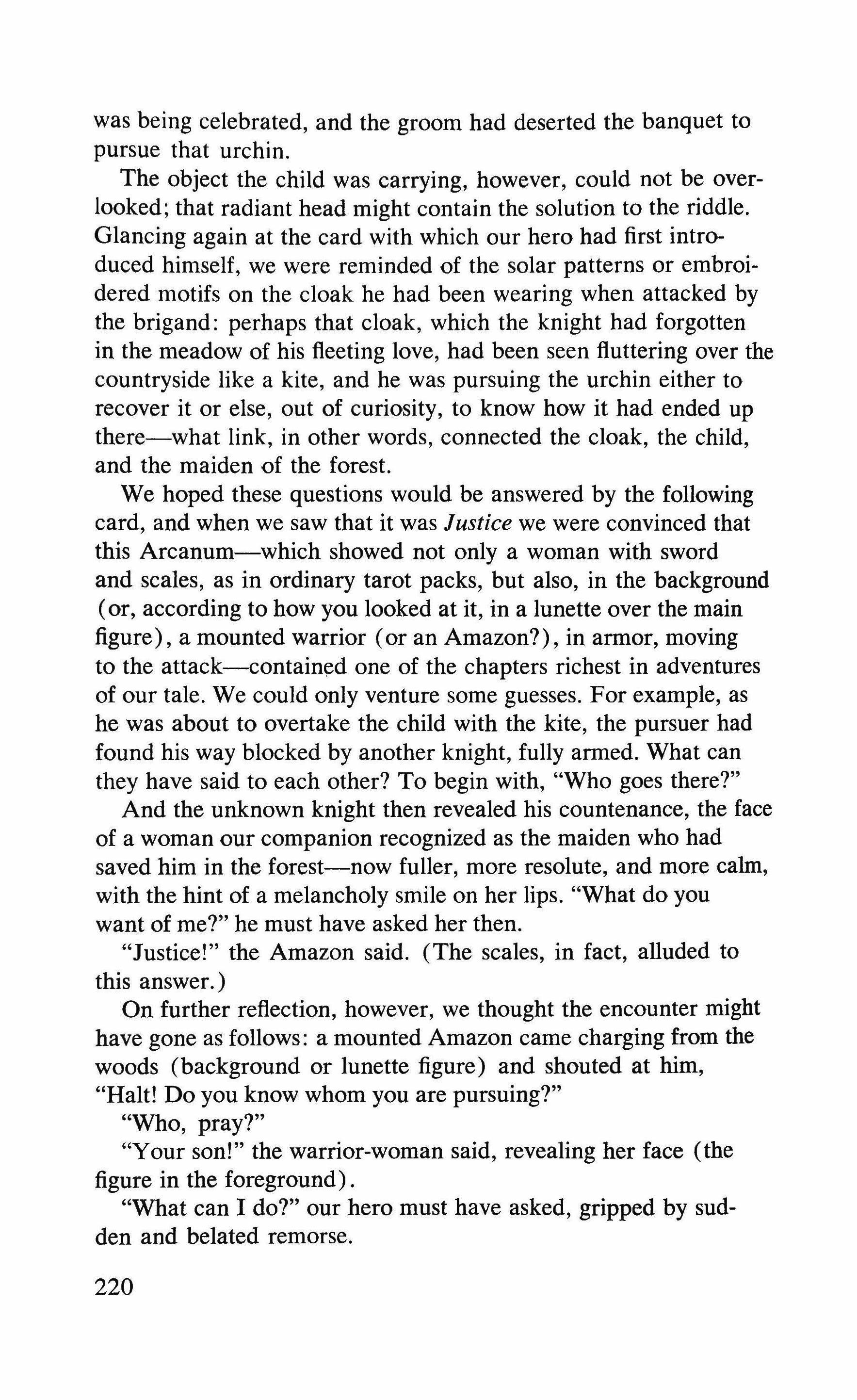
was being celebrated, and the groom had deserted the banquet to pursue that urchin.
The object the child was carrying, however, could not be overlooked; that radiant head might contain the solution to the riddle. Glancing again at the card with which our hero had first introduced himself, we were reminded of the solar patterns or embroidered motifs on the cloak he had been wearing when attacked by the brigand: perhaps that cloak, which the knight had forgotten in the meadow of his fleeting love, had been seen fluttering over the countryside like a kite, and he was pursuing the urchin either to recover it or else, out of curiosity, to know how it had ended up there-what link, in other words, connected the cloak, the child, and the maiden of the forest.
We hoped these questions would be answered by the following card, and when we saw that it was Justice we were convinced that this Arcanum-which showed not only a woman with sword and scales, as in ordinary tarot packs, but also, in the background (or, according to how you looked at it, in a lunette over the main figure), a mounted warrior (or an Amazon?), in armor, moving to the attack-s-contained one of the chapters richest in adventures of our tale. We could only venture some guesses. For example, as he was about to overtake the child with the kite, the pursuer had found his way blocked by another knight, fully armed. What can they have said to each other? To begin with, "Who goes there?"
And the unknown knight then revealed his countenance, the face of a woman our companion recognized as the maiden who had saved him in the forest-now fuller, more resolute, and more calm, with the hint of a melancholy smile on her lips. "What do you want of me?" he must have asked her then.
"Justice!" the Amazon said. (The scales, in fact, alluded to this answer.)
On further reflection, however, we thought the encounter might have gone as follows: a mounted Amazon came charging from the woods (background or lunette figure) and shouted at him, "Halt! Do you know whom you are pursuing?"
"Who, pray?"
"Your son!" the warrior-woman said, revealing her face (the figure in the foreground)
"What can I do?" our hero must have asked, gripped by sudden and belated remorse.
220
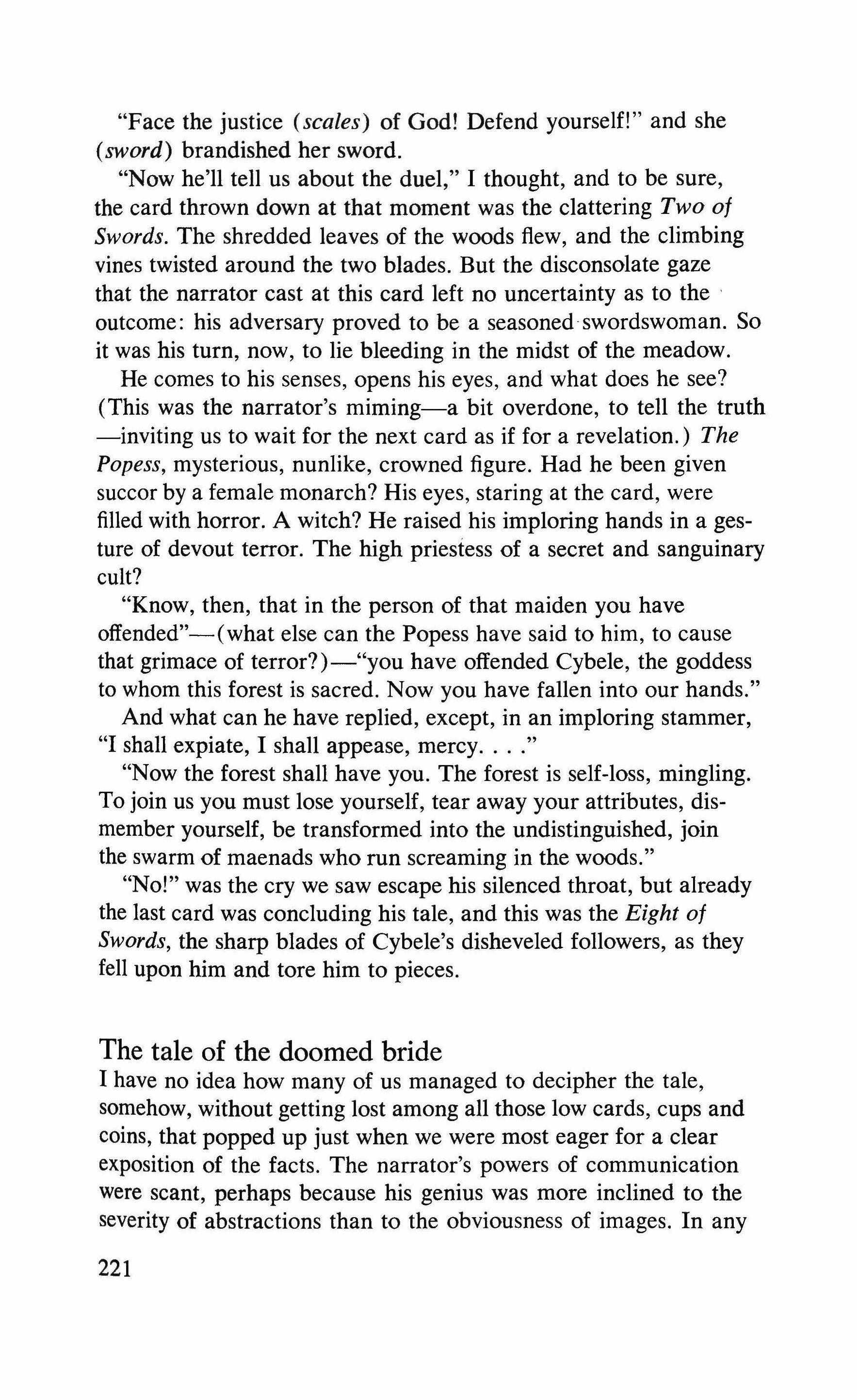
"Face the justice (scales) of God! Defend yourself!" and she (sword) brandished her sword.
"Now he'll tell us about the duel," 1 thought, and to be sure, the card thrown down at that moment was the clattering Two of Swords. The shredded leaves of the woods flew, and the climbing vines twisted around the two blades. But the disconsolate gaze that the narrator cast at this card left no uncertainty as to the outcome: his adversary proved to be a seasoned swordswoman. So it was his turn, now, to lie bleeding in the midst of the meadow.
He comes to his senses, opens his eyes, and what does he see?
(This was the narrator's miming-a bit overdone, to tell the truth -inviting us to wait for the next card as if for a revelation.) The Popess, mysterious, nunlike, crowned figure. Had he been given succor by a female monarch? His eyes, staring at the card, were filled with horror. A witch? He raised his imploring hands in a gesture of devout terror. The high priestess of a secret and sanguinary cult?
"Know, then, that in the person of that maiden you have offended"-(what else can the Popess have said to him, to cause that grimace of terror?)-"you have offended Cybele, the goddess to whom this forest is sacred. Now you have fallen into our hands."
And what can he have replied, except, in an imploring stammer, "I shall expiate, 1 shall appease, mercy. ."
"Now the forest shall have you. The forest is self-loss, mingling. To join us you must lose yourself, tear away your attributes, dismember yourself, be transformed into the undistinguished, join the swarm of maenads who run screaming in the woods."
"No!" was the cry we saw escape his silenced throat, but already the last card was concluding his tale, and this was the Eight of Swords, the sharp blades of Cybele's disheveled followers, as they fell upon him and tore him to pieces.
The tale of the doomed bride
1 have no idea how many of us managed to decipher the tale, somehow, without getting lost among all those low cards, cups and coins, that popped up just when we were most eager for a clear exposition of the facts. The narrator's powers of communication were scant, perhaps because his genius was more inclined to the severity of abstractions than to the obviousness of images. In any
221
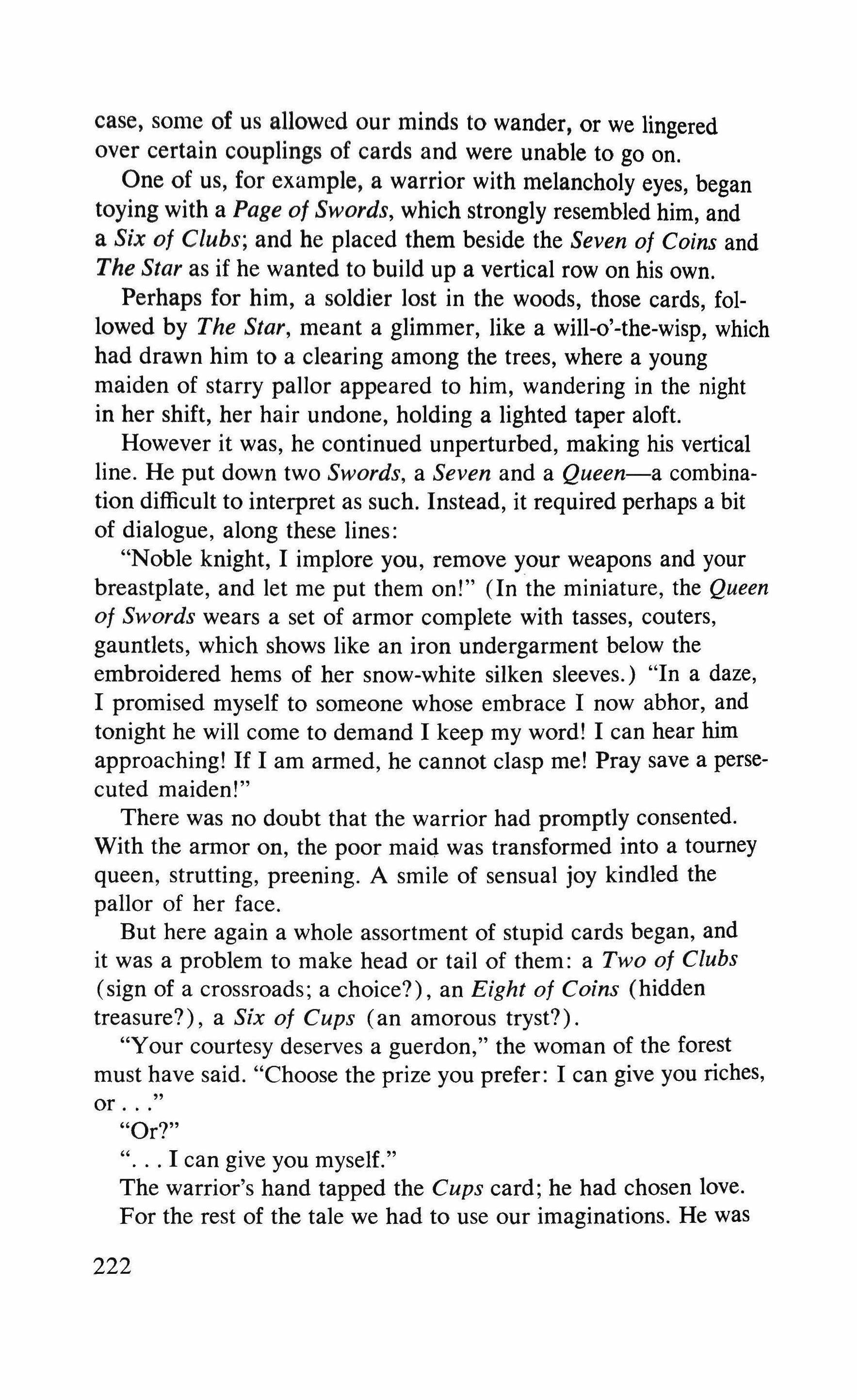
case, some of us allowed our minds to wander, or we lingered over certain couplings of cards and were unable to go on.
One of us, for example, a warrior with melancholy eyes, began toying with a Page of Swords, which strongly resembled him, and a Six of Clubs; and he placed them beside the Seven of Coins and The Star as if he wanted to build up a vertical row on his own.
Perhaps for him, a soldier lost in the woods, those cards, followed by The Star, meant a glimmer, like a will-o-the-wisp, which had drawn him to a clearing among the trees, where a young maiden of starry pallor appeared to him, wandering in the night in her shift, her hair undone, holding a lighted taper aloft.
However it was, he continued unperturbed, making his vertical line. He put down two Swords, a Seven and a Queen-a combination difficult to interpret as such. Instead, it required perhaps a bit of dialogue, along these lines:
"Noble knight, I implore you, remove your weapons and your breastplate, and let me put them on!" (In the miniature, the Queen of Swords wears a set of armor complete with tasses, couters, gauntlets, which shows like an iron undergarment below the embroidered hems of her snow-white silken sleeves.) "In a daze, I promised myself to someone whose embrace I now abhor, and tonight he will come to demand I keep my word! I can hear him approaching! If I am armed, he cannot clasp me! Pray save a persecuted maiden!"
There was no doubt that the warrior had promptly consented. With the armor on, the poor maid was transformed into a tourney queen, strutting, preening. A smile of sensual joy kindled the pallor of her face.
But here again a whole assortment of stupid cards began, and it was a problem to make head or tail of them: a Two of Clubs (sign of a crossroads; a choice?), an Eight of Coins (hidden treasure?), a Six of Cups (an amorous tryst?).
"Your courtesy deserves a guerdon," the woman of the forest must have said. "Choose the prize you prefer: I can give you riches, or "Or?"
I can give you myself."
The warrior's hand tapped the Cups card; he had chosen love. For the rest of the tale we had to use our imaginations. He was
222
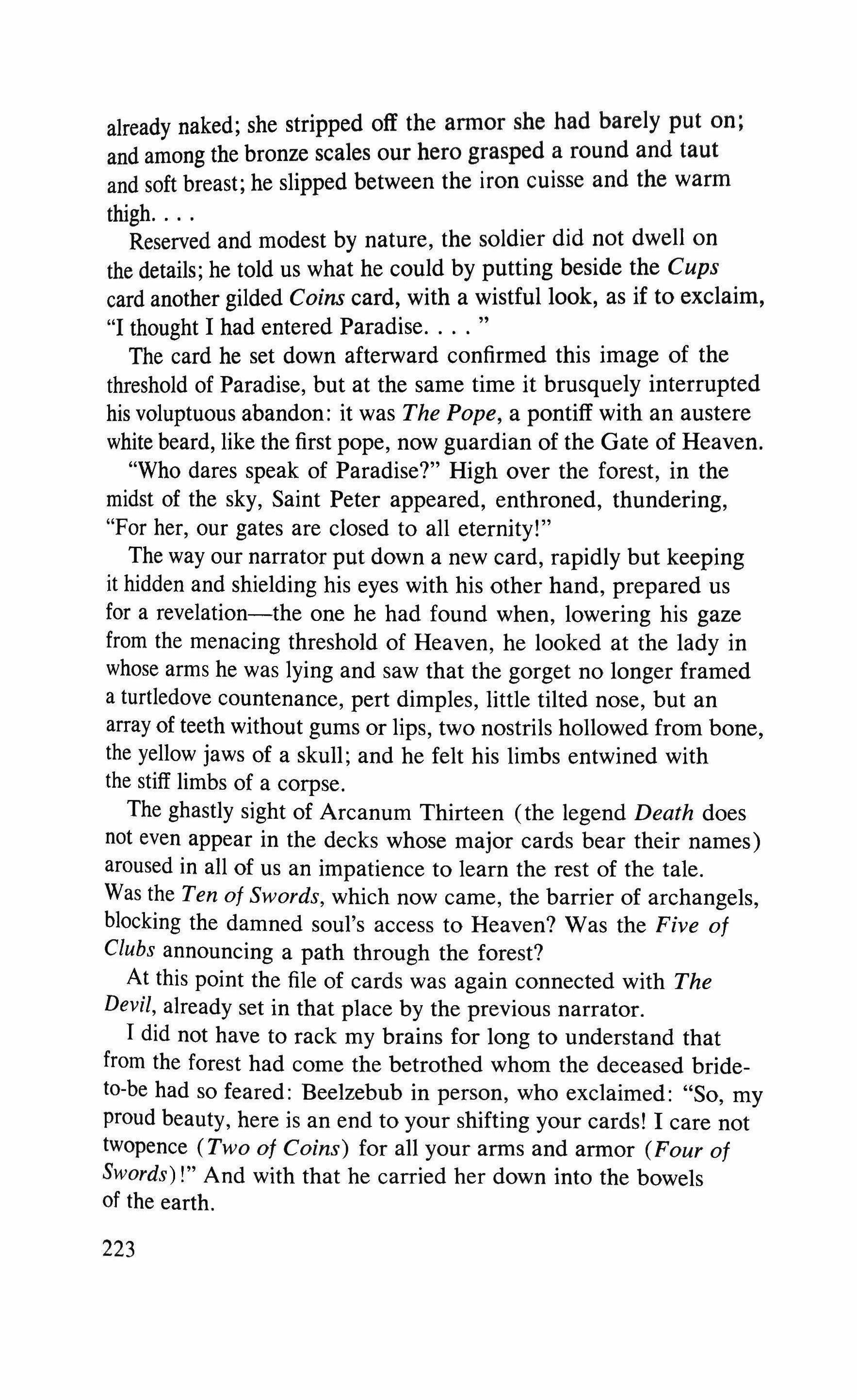
already naked; she stripped off the armor she had barely put on; and among the bronze scales our hero grasped a round and taut and soft breast; he slipped between the iron cuisse and the warm thigh
Reserved and modest by nature, the soldier did not dwell on the details; he told us what he could by putting beside the Cups card another gilded Coins card, with a wistful look, as if to exclaim, "I thought I had entered Paradise
The card he set down afterward confirmed this image of the threshold of Paradise, but at the same time it brusquely interrupted his voluptuous abandon: it was The Pope, a pontiff with an austere white beard, like the first pope, now guardian of the Gate of Heaven.
"Who dares speak of Paradise?" High over the forest, in the midst of the sky, Saint Peter appeared, enthroned, thundering, "For her, our gates are closed to all eternity!"
The way our narrator put down a new card, rapidly but keeping it hidden and shielding his eyes with his other hand, prepared us for a revelation-the one he had found when, lowering his gaze from the menacing threshold of Heaven, he looked at the lady in whose arms he was lying and saw that the gorget no longer framed a turtledove countenance, pert dimples, little tilted nose, but an array of teeth without gums or lips, two nostrils hollowed from bone, the yellow jaws of a skull; and he felt his limbs entwined with the stiff limbs of a corpse.
The ghastly sight of Arcanum Thirteen (the legend Death does not even appear in the decks whose major cards bear their names) aroused in all of us an impatience to learn the rest of the tale. Was the Ten of Swords, which now came, the barrier of archangels, blocking the damned soul's access to Heaven? Was the Five of Clubs announcing a path through the forest?
At this point the file of cards was again connected with The Devil, already set in that place by the previous narrator.
I did not have to rack my brains for long to understand that from the forest had come the betrothed whom the deceased brideto-be had so feared: Beelzebub in person, who exclaimed: "So, my proud beauty, here is an end to your shifting your cards! I care not twopence (Two of Coins) for all your arms and armor (Four of Swords)!" And with that he carried her down into the bowels of the earth.
223
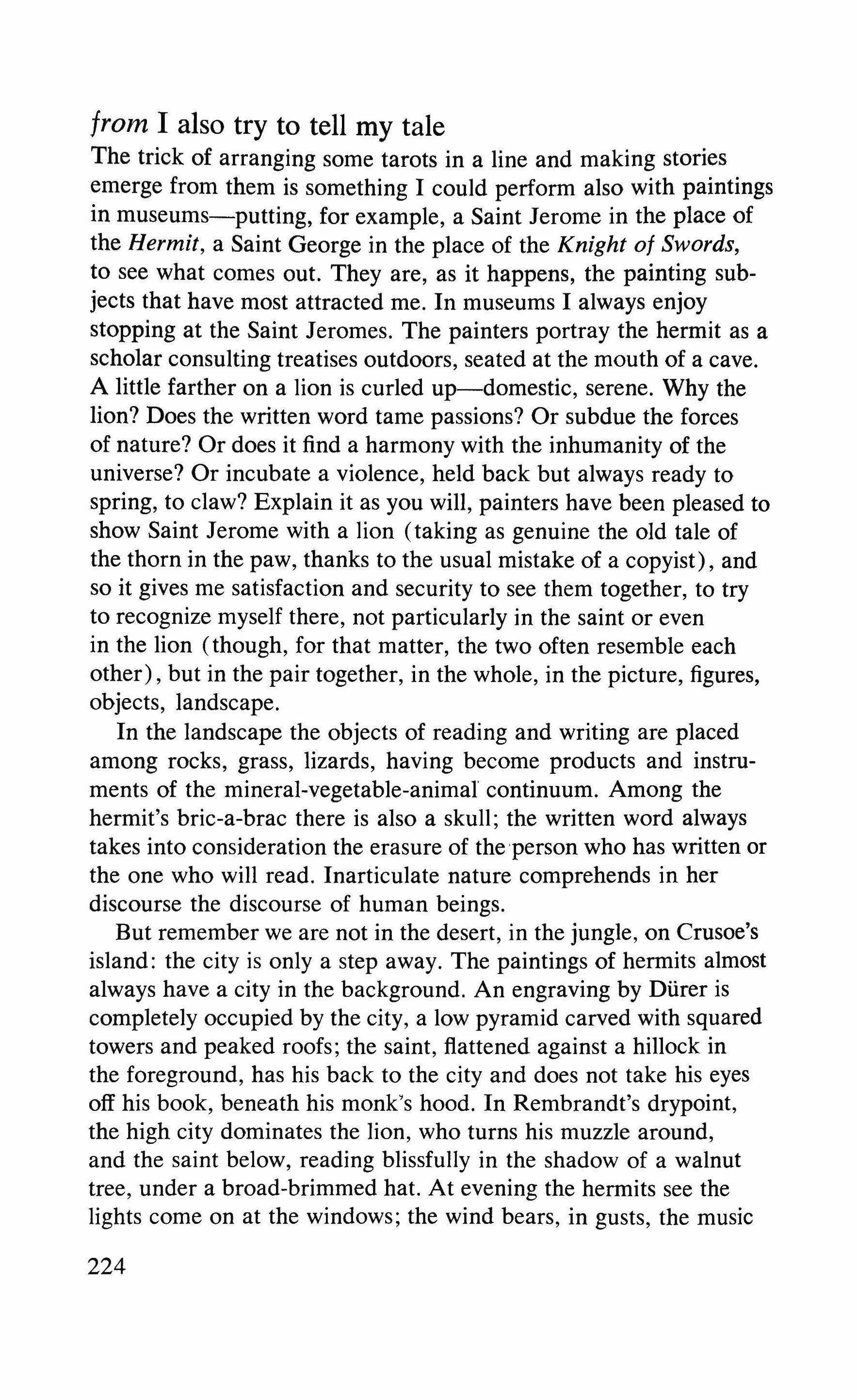
from I also try to tell my tale
The trick of arranging some tarots in a line and making stories emerge from them is something I could perform also with paintings in museums-putting, for example, a Saint Jerome in the place of the Hermit, a Saint George in the place of the Knight of Swords, to see what comes out. They are, as it happens, the painting subjects that have most attracted me. In museums I always enjoy stopping at the Saint Jeromes. The painters portray the hermit as a scholar consulting treatises outdoors, seated at the mouth of a cave. A little farther on a lion is curled up-domestic, serene. Why the lion? Does the written word tame passions? Or subdue the forces of nature? Or does it find a harmony with the inhumanity of the universe? Or incubate a violence, held back but always ready to spring, to claw? Explain it as you will, painters have been pleased to show Saint Jerome with a lion (taking as genuine the old tale of the thorn in the paw, thanks to the usual mistake of a copyist), and so it gives me satisfaction and security to see them together, to try to recognize myself there, not particularly in the saint or even in the lion (though, for that matter, the two often resemble each other), but in the pair together, in the whole, in the picture, figures, objects, landscape.
In the landscape the objects of reading and writing are placed among rocks, grass, lizards, having become products and instruments of the mineral-vegetable-animal continuum. Among the hermit's bric-a-brac there is also a skull; the written word always takes into consideration the erasure of the 'person who has written or the one who will read. Inarticulate nature comprehends in her discourse the discourse of human beings.
But remember we are not in the desert, in the jungle, on Crusoe's island: the city is only a step away. The paintings of hermits almost always have a city in the background. An engraving by DUrer is completely occupied by the city, a low pyramid carved with squared towers and peaked roofs; the saint, flattened against a hillock in the foreground, has his back to the city and does not take his eyes off his book, beneath his monk's hood. In Rembrandt's drypoint, the high city dominates the lion, who turns his muzzle around, and the saint below, reading blissfully in the shadow of a walnut tree, under a broad-brimmed hat. At evening the hermits see the lights come on at the windows; the wind bears, in gusts, the music
224
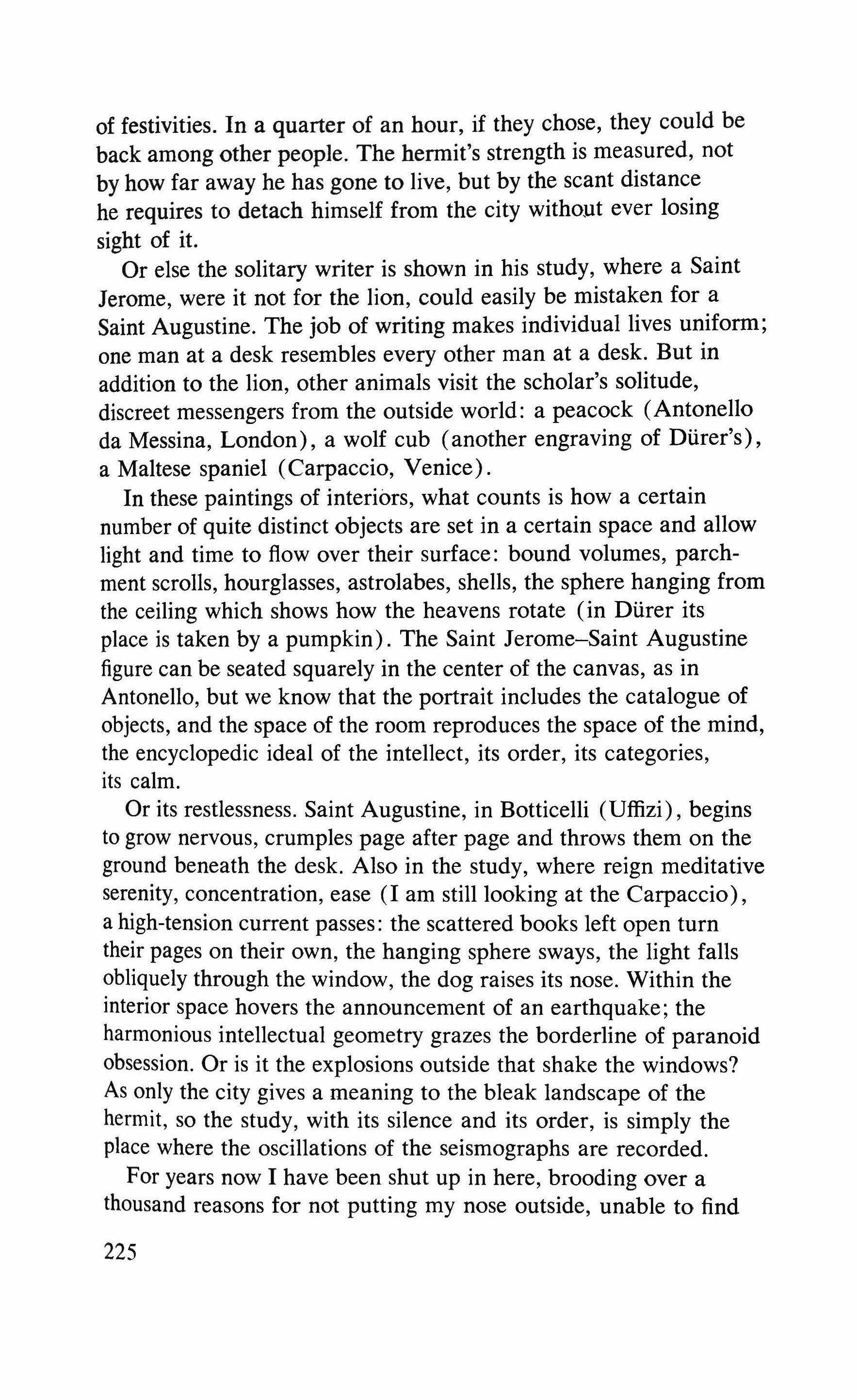
of festivities. In a quarter of an hour, if they chose, they could be back among other people. The hermit's strength is measured, not by how far away he has gone to live, but by the scant distance he requires to detach himself from the city without ever losing sight of it.
Or else the solitary writer is shown in his study, where a Saint Jerome, were it not for the lion, could easily be mistaken for a Saint Augustine. The job of writing makes individual lives uniform; one man at a desk resembles every other man at a desk. But in addition to the lion, other animals visit the scholar's solitude, discreet messengers from the outside world: a peacock (Antonello da Messina, London), a wolf cub (another engraving of DUrer's), a Maltese spaniel (Carpaccio, Venice).
In these paintings of interiors, what counts is how a certain number of quite distinct objects are set in a certain space and allow light and time to flow over their surface: bound volumes, parchment scrolls, hourglasses, astrolabes, shells, the sphere hanging from the ceiling which shows how the heavens rotate (in DUrer its place is taken by a pumpkin). The Saint Jerome-Saint Augustine figure can be seated squarely in the center of the canvas, as in Antonello, but we know that the portrait includes the catalogue of objects, and the space of the room reproduces the space of the mind, the encyclopedic ideal of the intellect, its order, its categories, its calm.
Or its restlessness. Saint Augustine, in Botticelli (Uffizi), begins to grow nervous, crumples page after page and throws them on the ground beneath the desk. Also in the study, where reign meditative serenity, concentration, ease (I am still looking at the Carpaccio), a high-tension current passes: the scattered books left open turn their pages on their own, the hanging sphere sways, the light falls obliquely through the window, the dog raises its nose. Within the interior space hovers the announcement of an earthquake; the harmonious intellectual geometry grazes the borderline of paranoid obsession. Or is it the explosions outside that shake the windows? As only the city gives a meaning to the bleak landscape of the hermit, so the study, with its silence and its order, is simply the place where the oscillations of the seismographs are recorded.
For years now I have been shut up in here, brooding over a thousand reasons for not putting my nose outside, unable to find
225
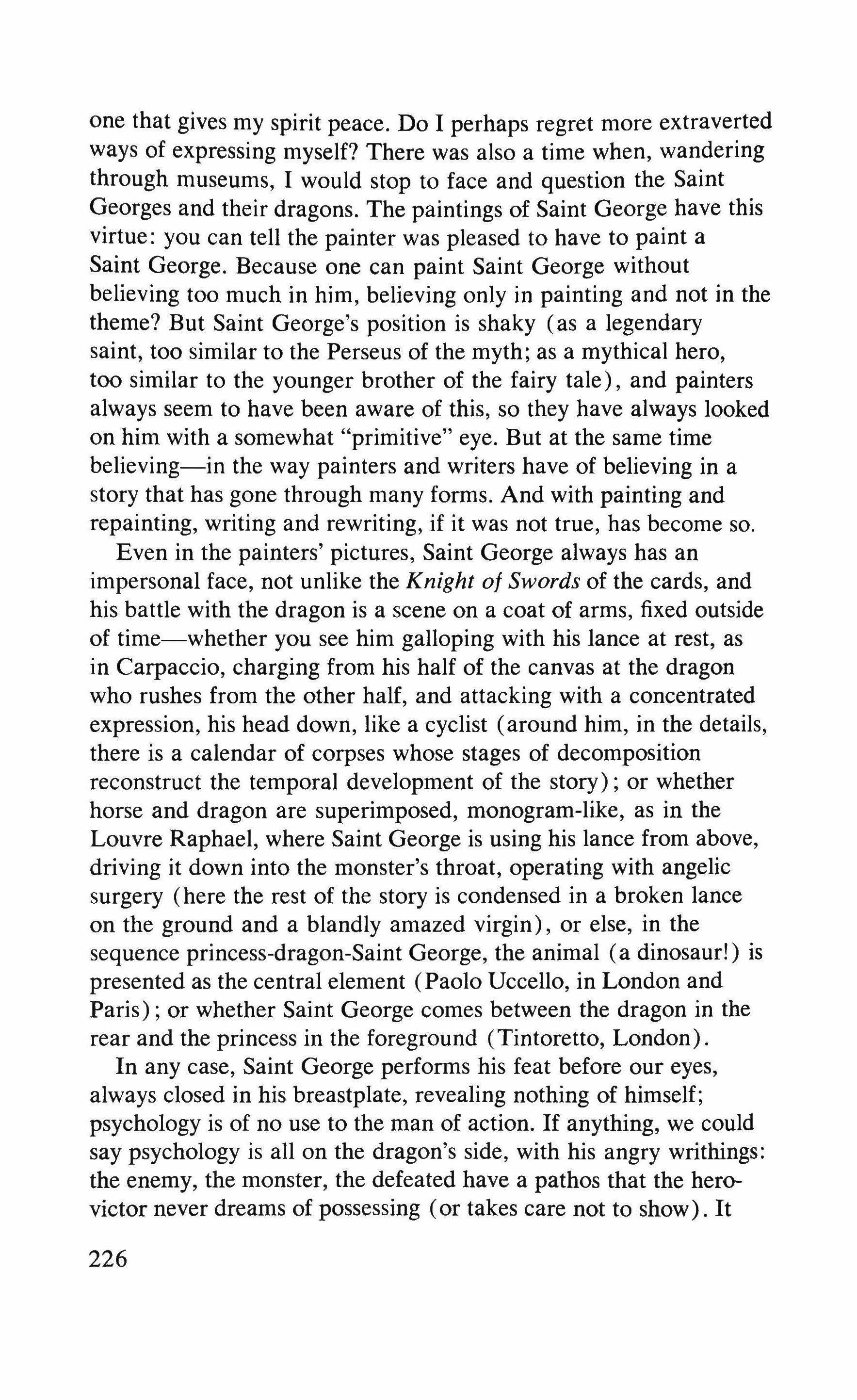
one that gives my spirit peace. Do I perhaps regret more extraverted ways of expressing myself? There was also a time when, wandering through museums, I would stop to face and question the Saint Georges and their dragons. The paintings of Saint George have this virtue: you can tell the painter was pleased to have to paint a Saint George. Because one can paint Saint George without believing too much in him, believing only in painting and not in the theme? But Saint George's position is shaky (as a legendary saint, too similar to the Perseus of the myth; as a mythical hero, too similar to the younger brother of the fairy tale), and painters always seem to have been aware of this, so they have always looked on him with a somewhat "primitive" eye. But at the same time believing-in the way painters and writers have of believing in a story that has gone through many forms. And with painting and repainting, writing and rewriting, if it was not true, has become so.
Even in the painters' pictures, Saint George always has an impersonal face, not unlike the Knight of Swords of the cards, and his battle with the dragon is a scene on a coat of arms, fixed outside of time-whether you see him galloping with his lance at rest, as in Carpaccio, charging from his half of the canvas at the dragon who rushes from the other half, and attacking with a concentrated expression, his head down, like a cyclist (around him, in the details, there is a calendar of corpses whose stages of decomposition reconstruct the temporal development of the story); or whether horse and dragon are superimposed, monogram-like, as in the Louvre Raphael, where Saint George is using his lance from above, driving it down into the monster's throat, operating with angelic surgery (here the rest of the story is condensed in a broken lance on the ground and a blandly amazed virgin), or else, in the sequence princess-dragon-Saint George, the animal (a dinosaur!) is presented as the central element (Paolo Uccello, in London and Paris) ; or whether Saint George comes between the dragon in the rear and the princess in the foreground (Tintoretto, London).
In any case, Saint George performs his feat before our eyes, always closed in his breastplate, revealing nothing of himself; psychology is of no use to the man of action. If anything, we could say psychology is all on the dragon's side, with his angry writhings: the enemy, the monster, the defeated have a pathos that the herovictor never dreams of possessing (or takes care not to show). It
226
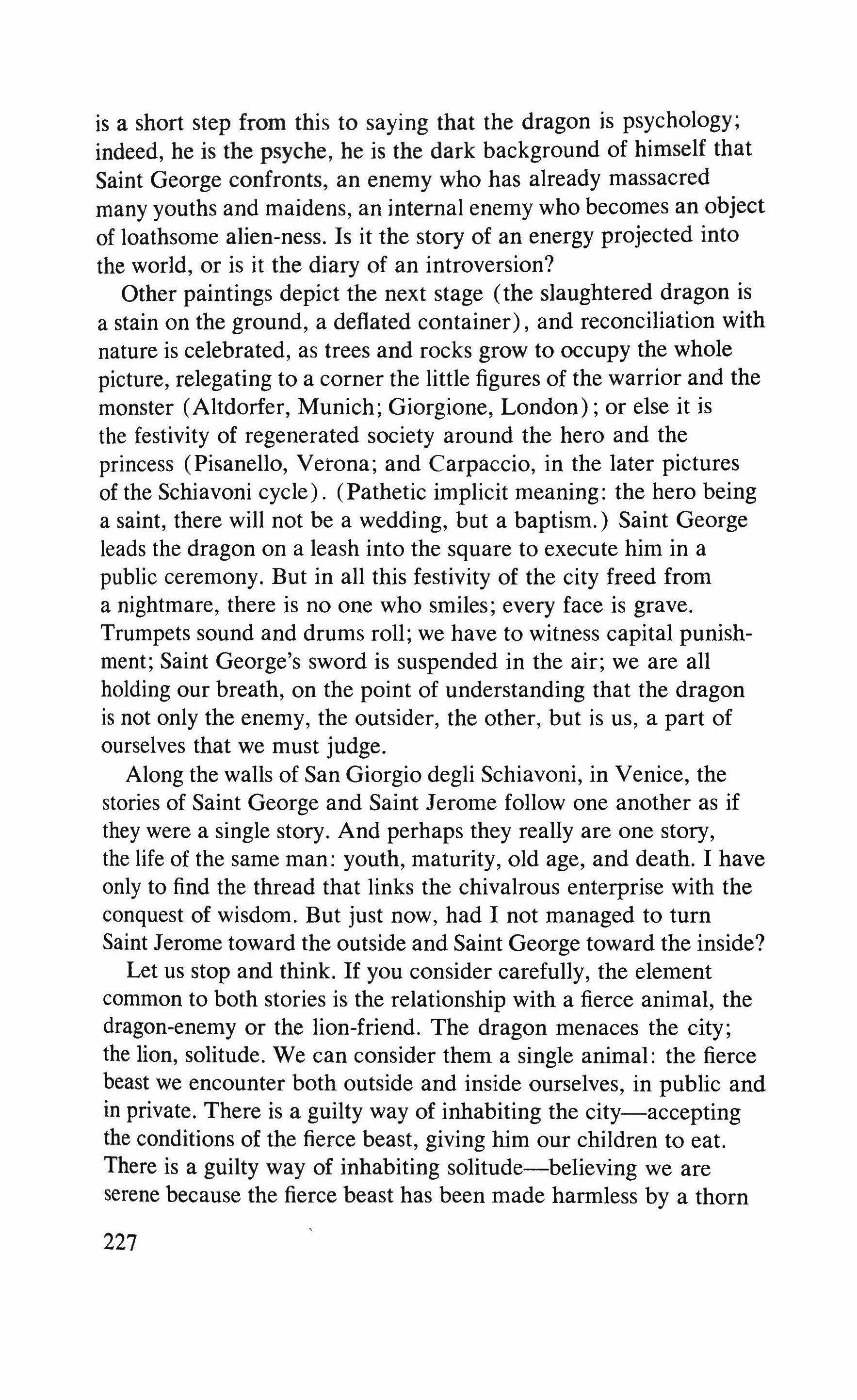
is a short step from this to saying that the dragon is psychology; indeed, he is the psyche, he is the dark background of himself that Saint George confronts, an enemy who has already massacred many youths and maidens, an internal enemy who becomes an object of loathsome alien-ness. Is it the story of an energy projected into the world, or is it the diary of an introversion?
Other paintings depict the next stage (the slaughtered dragon is a stain on the ground, a deflated container), and reconciliation with nature is celebrated, as trees and rocks grow to occupy the whole picture, relegating to a corner the little figures of the warrior and the monster (Altdorfer, Munich; Giorgione, London); or else it is the festivity of regenerated society around the hero and the princess (Pisanello, Verona; and Carpaccio, in the later pictures of the Schiavoni cycle). (Pathetic implicit meaning: the hero being a saint, there will not be a wedding, but a baptism.) Saint George leads the dragon on a leash into the square to execute him in a public ceremony. But in all this festivity of the city freed from a nightmare, there is no one who smiles; every face is grave. Trumpets sound and drums roll; we have to witness capital punishment; Saint George's sword is suspended in the air; we are all holding our breath, on the point of understanding that the dragon is not only the enemy, the outsider, the other, but is us, a part of ourselves that we must judge.
Along the walls of San Giorgio degli Schiavoni, in Venice, the stories of Saint George and Saint Jerome follow one another as if they were a single story. And perhaps they really are one story, the life of the same man: youth, maturity, old age, and death. I have only to find the thread that links the chivalrous enterprise with the conquest of wisdom. But just now, had I not managed to turn Saint Jerome toward the outside and Saint George toward the inside?
Let us stop and think. If you consider carefully, the element common to both stories is the relationship with a fierce animal, the dragon-enemy or the lion-friend. The dragon menaces the city; the lion, solitude. We can consider them a single animal: the fierce beast we encounter both outside and inside ourselves, in public and in private. There is a guilty way of inhabiting the city-accepting the conditions of the fierce beast, giving him our children to eat. There is a guilty way of inhabiting solitude-believing we are serene because the fierce beast has been made harmless by a thorn
227
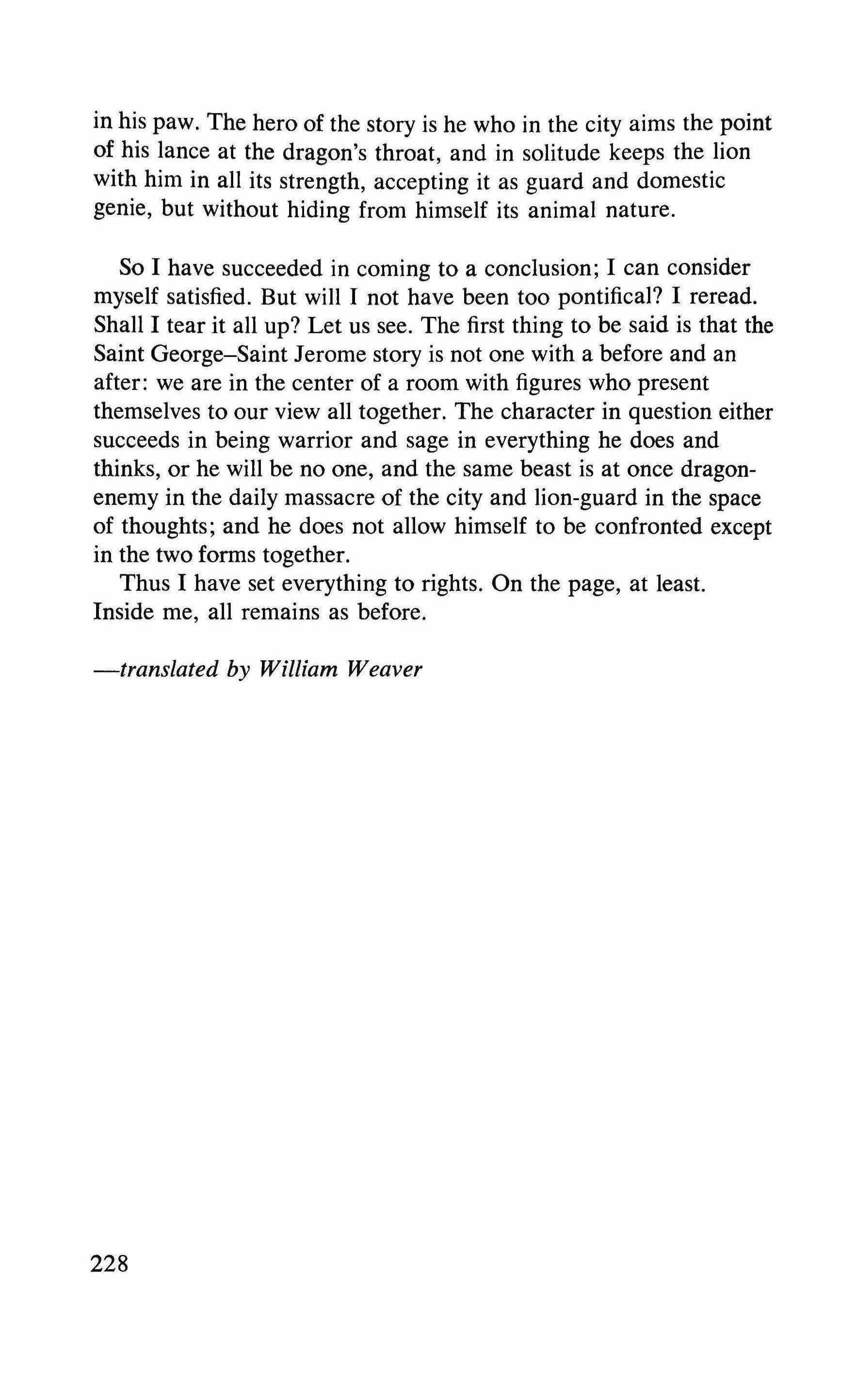
in his paw. The hero of the story is he who in the city aims the point of his lance at the dragon's throat, and in solitude keeps the lion with him in all its strength, accepting it as guard and domestic genie, but without hiding from himself its animal nature.
So I have succeeded in coming to a conclusion; I can consider myself satisfied. But will I not have been too pontifical? I reread. Shall I tear it all up? Let us see. The first thing to be said is that the Saint George-Saint Jerome story is not one with a before and an after: we are in the center of a room with figures who present themselves to our view all together. The character in question either succeeds in being warrior and sage in everything he does and thinks, or he will be no one, and the same beast is at once dragonenemy in the daily massacre of the city and lion-guard in the space of thoughts; and he does not allow himself to be confronted except in the two forms together.
Thus I have set everything to rights. On the page, at least. Inside me, all remains as before.
-translated by William Weaver
228
The phenomenon and noumenon of language: the twin paths of mantra (perfect speaking) and mudra (perfect writing)
David Michael Levin
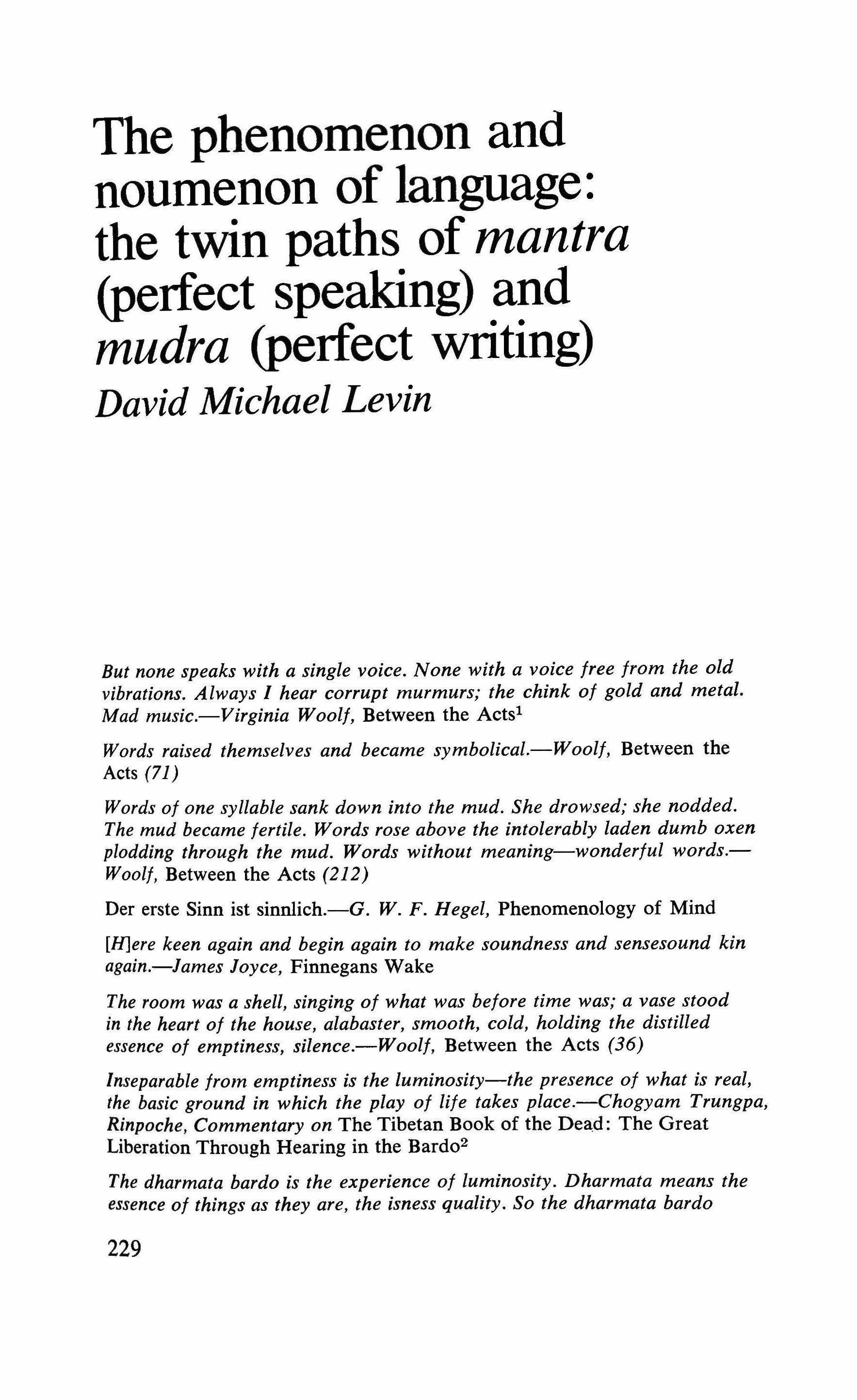
But none speaks with a single voice. None with a voice free from the old vibrations. Always I hear corrupt murmurs; the chink of gold and metal. Mad music.-Virginia Woolf, Between the Acts!
Words raised themselves and became symbolical.-Woolf, Between the Acts (71)
Words of one syllable sank down into the mud. She drowsed; she nodded. The mud became fertile. Words rose above the intolerably laden dumb oxen plodding through the mud. Words without meaning-wonderful words.Wooli, Between the Acts (212)
Der erste Sinn ist sinnlich.-G. W. F. Hegel, Phenomenology of Mind [RJere keen again and begin again to make soundness and sensesound kin again.-James Joyce, Finnegans Wake
The room was a shell, singing of what was before time was; a vase stood in the heart of the house, alabaster, smooth, cold, holding the distilled essence of emptiness, silence-e-Wool], Between the Acts (36)
Inseparable from emptiness is the luminosity-the presence of what is real, the basic ground in which the play of life takes place.-Chogyam Trungpa, Rinpoche, Commentary on The Tibetan Book of the Dead: The Great Liberation Through Hearing in the Bardo>
The dharmata bardo is the experience of luminosity. Dharmata means the essence of things as they are, the isness quality. So the dharmata bardo
229

is basic, open, neutral ground, and the perception of that ground is dharmakaya, the body of truth or law.-Chogyam Trungpa, Rlnpoche, Commentary on The Tibetan Book of the Dead
ombres noires sur fond blanc, profiles sans face Jacques Derrida, La disseminations
[T]he white fire is the written Torah, in which the form of the letters is not yet explicit, for the form of the consonants and vowel points was first conferred by the power of the black fire, which is the oral Torah. This black fire is like the ink on the parchment.-Gershom Scholem, On the Kabbalah and Its Symbolism+
Everything that we perceive in the fixed forms of the Torah, written in ink on parchment, consists of interpretations or definitions of what is hidden The mystical white of the letters on the parchment is the written [true] Torah, but not the black of the letters inscribed in ink.-Gershom Scholem, On the Kabbalah and Its Symbolism (50)
Where shall the word be found, where will the word / Resound?-T. S. Eliot, Ash Wednesday
[T]he myth, we might say, never finds an adequate objective equivalent in the spoken word.-Friedrich Nietzsche, The Birth of Tragedy, XVl/5
[But language can] mean the unsayable by clearly showing forth the sayable.-Ludwig Wittgenstein, Tractatus Logico-Philosophicus"
There is some evidence that the essential nature of language flatly refuses to express itself in words-in the language, that is, in which we make statements about language. If language everywhere withholds its nature in this sense, then such withholding is in the very nature of language-Martin Heidegger, "The Nature of Language"!
What is language? If it be true that, even in our moments of satisfied efficiency and complacency and our moods of doubt or nihilism, we manifest an uncanny, irrepressible yearning for renewal and fulfillment through language, why do we so rarely experience the compassionate and graceful qualities of that language we dream?
Perhaps our conception of language is inappropriate. Perhaps, in fact, our approach to language is not, in its essence, a relationship of true under-standing.
Called upon to interpret the heritage within which he writes, Miguel Angel Asturias observed that the Mayan "is very laconic. For him, words are sacred. They are fundamental and magical elements endowed not only with powers to bewitch and enchant, but also with miraculous curative powers The Indians use language sparingly because they believe every word is alive.:" Do
230
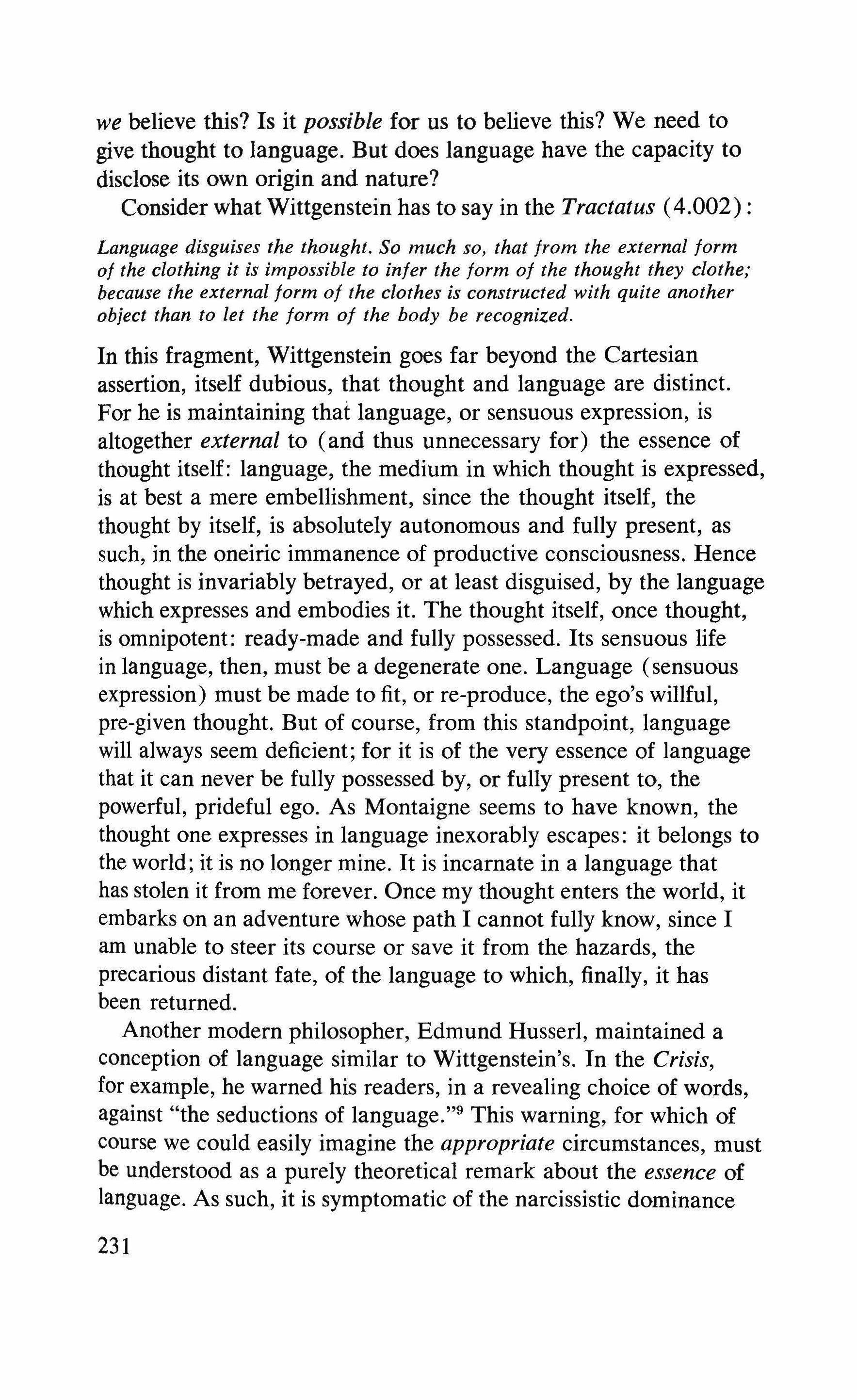
we believe this? Is it possible for us to believe this? We need to give thought to language. But does language have the capacity to disclose its own origin and nature?
Consider what Wittgenstein has to say in the Tractatus (4.002) : Language disguises the thought. So much so, that from the external form of the clothing it is impossible to infer the form of the thought they clothe; because the external form of the clothes is constructed with quite another object than to let the form of the body be recognized.
In this fragment, Wittgenstein goes far beyond the Cartesian assertion, itself dubious, that thought and language are distinct. For he is maintaining that language, or sensuous expression, is altogether external to (and thus unnecessary for) the essence of thought itself: language, the medium in which thought is expressed, is at best a mere embellishment, since the thought itself, the thought by itself, is absolutely autonomous and fully present, as such, in the oneiric immanence of productive consciousness. Hence thought is invariably betrayed, or at least disguised, by the language which expresses and embodies it. The thought itself, once thought, is omnipotent: ready-made and fully possessed. Its sensuous life in language, then, must be a degenerate one. Language (sensuous expression) must be made to fit, or re-produce, the ego's willful, pre-given thought. But of course, from this standpoint, language will always seem deficient; for it is of the very essence of language that it can never be fully possessed by, or fully present to, the powerful, prideful ego. As Montaigne seems to have known, the thought one expresses in language inexorably escapes: it belongs to the world; it is no longer mine. It is incarnate in a language that has stolen it from me forever. Once my thought enters the world, it embarks on an adventure whose path I cannot fully know, since I am unable to steer its course or save it from the hazards, the precarious distant fate, of the language to which, finally, it has been returned.
Another modern philosopher, Edmund Husserl, maintained a conception of language similar to Wittgenstein's. In the Crisis, for example, he warned his readers, in a revealing choice of words, against "the seductions of language.?" This warning, for which of course we could easily imagine the appropriate circumstances, must be understood as a purely theoretical remark about the essence of language. As such, it is symptomatic of the narcissistic dominance
231
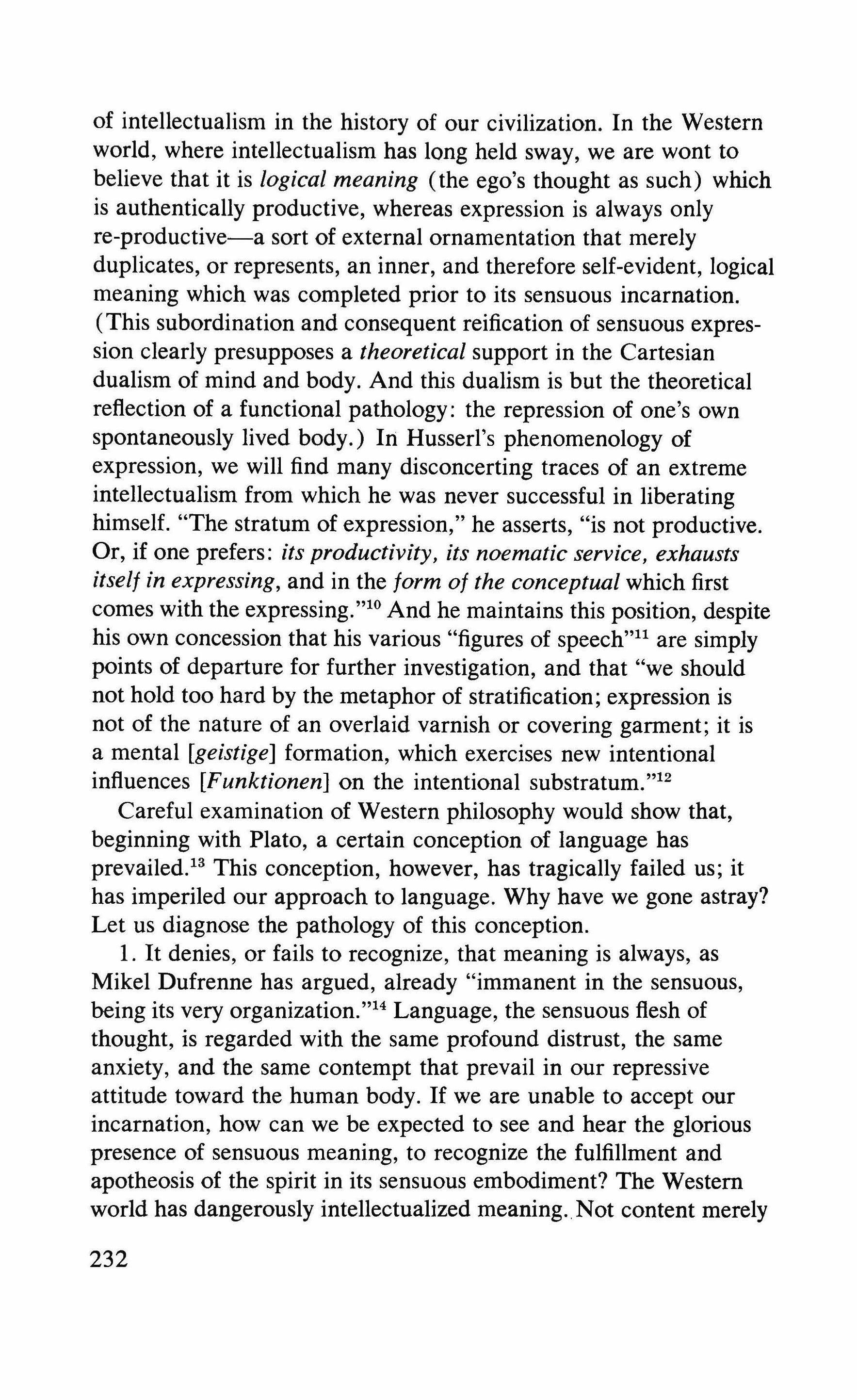
of intellectualism in the history of our civilization. In the Western world, where intellectualism has long held sway, we are wont to believe that it is logical meaning (the ego's thought as such) which is authentically productive, whereas expression is always only re-productive-a sort of external ornamentation that merely duplicates, or represents, an inner, and therefore self-evident, logical meaning which was completed prior to its sensuous incarnation. (This subordination and consequent reification of sensuous expression clearly presupposes a theoretical support in the Cartesian dualism of mind and body. And this dualism is but the theoretical reflection of a functional pathology: the repression of one's own spontaneously lived body.) In: Husserl's phenomenology of expression, we will find many disconcerting traces of an extreme intellectualism from which he was never successful in liberating himself. "The stratum of expression," he asserts, "is not productive. Or, if one prefers: its productivity, its noematic service, exhausts itself in expressing, and in the form of the conceptual which first comes with the expressing. "10 And he maintains this position, despite his own concession that his various "figures of speech"!' are simply points of departure for further investigation, and that "we should not hold too hard by the metaphor of stratification; expression is not of the nature of an overlaid varnish or covering garment; it is a mental [geistige] formation, which exercises new intentional influences [Funktionen] on the intentional substratum.i'P
Careful examination of Western philosophy would show that, beginning with Plato, a certain conception of language has prevailed." This conception, however, has tragically failed us; it has imperiled our approach to language. Why have we gone astray? Let us diagnose the pathology of this conception.
1. It denies, or fails to recognize, that meaning is always, as Mikel Dufrenne has argued, already "immanent in the sensuous, being its very organization.l'" Language, the sensuous flesh of thought, is regarded with the same profound distrust, the same anxiety, and the same contempt that prevail in our repressive attitude toward the human body. If we are unable to accept our incarnation, how can we be expected to see and hear the glorious presence of sensuous meaning, to recognize the fulfillment and apotheosis of the spirit in its sensuous embodiment? The Western world has dangerously intellectualized meaning Not content merely 232

to abstract meaning from the texture of its sensuous life, we have suppressed our memory of its mysterious origination. But great works of literature exist to remind us of that primordial moment when signification was not at all different from the sensuous form, nor was the sensuous a deferment, or loss, of vital signification. Precisely this, I think, is the profound teaching to be gained when the optical qualities of written language reveal their own conditions of visibility and the sounds of our language let us hear sound as the resounding presence of sensuous signification.
Examples of the first sort (writing instructing vision) include Guillaume Apollinaire's shaped poems and Vladimir Nabokov's pictures for the sensuous eye, abstract symmetries such as "a semblance of balance'?" and "for passport or sport,'?" and the use to which he puts the manifest slanting of some italics," all of which tend to reduce the text to its white surface. This reduction reveals the surface as that which literally supports the written text and presents it to the aesthetic exercising of vision; the reduction also, in fact, shows the surface as the "place" print itself created for its sublime display.
Examples of the second sort (the teaching of sound) include onomatopoeia, rhyme, meter, repetition (in the work of Gertrude Stein and Virginia Woolf), puns (in Nabokov), and (in the work of James Joyce) etymological palimpsests." Let us pause here to consider, first, the much-maligned pun. The good pun is not merely the dead trace, or pale shadow, of thought, but rather the living, self-moving motion of thought; it is language speaking by itself, singing new meanings into being. Puns are fundamentally anarchic. Employed in the Nabokovian manner, they reduce the narrative and even the semantic stratum of the text to the stratum of sensuous forms. The antics of their semantics inflate the prose language; they add a vertical dimension, as it were, to the horizontal narrative flow. But while the time-structure of the narrative is the product of an irreversible, diachronic, cumulative synthesis, the time-structure of the pun informs a synchronic, instantaneous unity. Like other figurative language, the pun spawns a multiplicity, or polyphony, of meanings, simultaneously co-present. Being a cacophonous eruption on the linguistic surface, the singing of the pun inevitably disturbs the linear, unfolding temporality of the narrative progression. Together with pure sonorities and optical
233
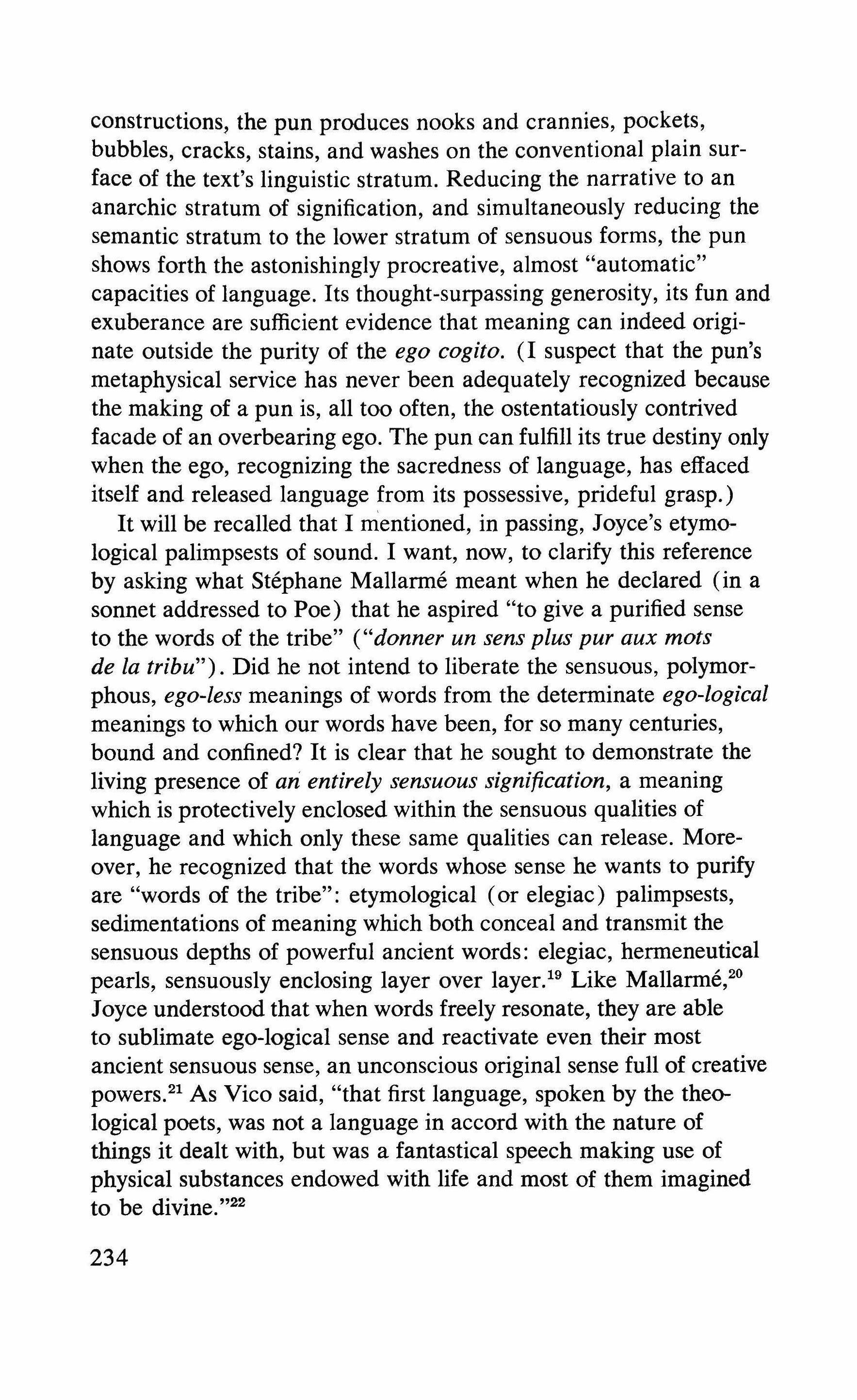
constructions, the pun produces nooks and crannies, pockets, bubbles, cracks, stains, and washes on the conventional plain surface of the text's linguistic stratum. Reducing the narrative to an anarchic stratum of signification, and simultaneously reducing the semantic stratum to the lower stratum of sensuous forms, the pun shows forth the astonishingly procreative, almost "automatic" capacities of language. Its thought-surpassing generosity, its fun and exuberance are sufficient evidence that meaning can indeed originate outside the purity of the ego cogito. (I suspect that the pun's metaphysical service has never been adequately recognized because the making of a pun is, all too often, the ostentatiously contrived facade of an overbearing ego. The pun can fulfill its true destiny only when the ego, recognizing the sacredness of language, has effaced itself and released language from its possessive, prideful grasp.)
It will be recalled that I mentioned, in passing, Joyce's etymological palimpsests of sound. I want, now, to clarify this reference by asking what Stephane Mallarme meant when he declared (in a sonnet addressed to Poe) that he aspired "to give a purified sense to the words of the tribe" ("donner un sens plus pur aux mots de la tribu"). Did he not intend to liberate the sensuous, polymorphous, ego-less meanings of words from the determinate ego-logical meanings to which our words have been, for so many centuries, bound and confined? It is clear that he sought to demonstrate the living presence of an entirely sensuous signification, a meaning which is protectively enclosed within the sensuous qualities of language and which only these same qualities can release. Moreover, he recognized that the words whose sense he wants to purify are "words of the tribe": etymological (or elegiac) palimpsests, sedimentations of meaning which both conceal and transmit the sensuous depths of powerful ancient words: elegiac, hermeneutical pearls, sensuously enclosing layer over layer." Like Mallarme," Joyce understood that when words freely resonate, they are able to sublimate ego-logical sense and reactivate even their most ancient sensuous sense, an unconscious original sense full of creative powers." As Vico said, "that first language, spoken by the theological poets, was not a language in accord with the nature of things it dealt with, but was a fantastical speech making use of physical substances endowed with life and most of them imagined to be divine. "22
234
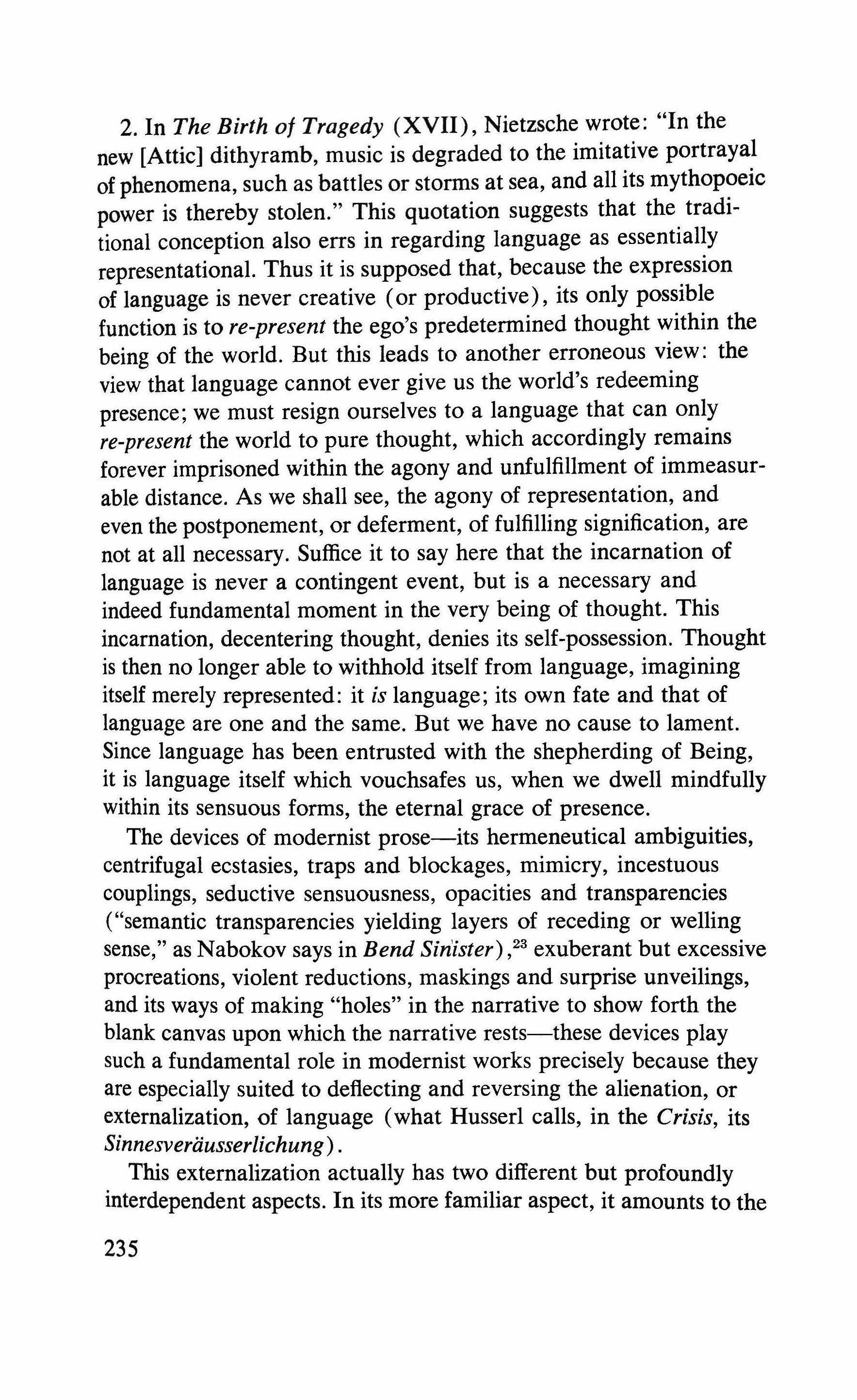
2. In The Birth of Tragedy (XVII), Nietzsche wrote: "In the new [Attic] dithyramb, music is degraded to the imitative portrayal of phenomena, such as battles or storms at sea, and all its mythopoeic power is thereby stolen." This quotation suggests that the traditional conception also errs in regarding language as essentially representational. Thus it is supposed that, because the expression of language is never creative (or productive), its only possible function is to re-present the ego's predetermined thought within the being of the world. But this leads to another erroneous view: the view that language cannot ever give us the world's redeeming presence; we must resign ourselves to a language that can only re-present the world to pure thought, which accordingly remains forever imprisoned within the agony and unfulfillment of immeasurable distance. As we shall see, the agony of representation, and even the postponement, or deferment, of fulfilling signification, are not at all necessary. Suffice it to say here that the incarnation of language is never a contingent event, but is a necessary and indeed fundamental moment in the very being of thought. This incarnation, decentering thought, denies its self-possession. Thought is then no longer able to withhold itself from language, imagining itself merely represented: it is language; its own fate and that of language are one and the same. But we have no cause to lament. Since language has been entrusted with the shepherding of Being, it is language itself which vouchsafes us, when we dwell mindfully within its sensuous forms, the eternal grace of presence.
The devices of modernist prose-its hermeneutical ambiguities, centrifugal ecstasies, traps and blockages, mimicry, incestuous couplings, seductive sensuousness, opacities and transparencies ("semantic transparencies yielding layers of receding or welling sense," as Nabokov says in Bend Sinister) ,23 exuberant but excessive procreations, violent reductions, maskings and surprise unveilings, and its ways of making "holes" in the narrative to show forth the blank canvas upon which the narrative rests-these devices play such a fundamental role in modernist works precisely because they are especially suited to deflecting and reversing the alienation, or externalization, of language (what HusserI calls, in the Crisis, its Sinnesveriiusserlichung'y
This externalization actually has two different but profoundly interdependent aspects. In its more familiar aspect, it amounts to the
235

sense that language is somehow dead, or empty, devoid of human warmth and energy, without conviction. In brief, our language seems no longer to be fulfilling. Why? Not, I think, because there is some objective truth to which it is inadequate, but rather because its original trust, the individual truth which always originally consecrates language, is no longer recognized and prized. When we fail to recognize our own face in the mirror-like nature of language; when we fail to recognize our own presence and the contributing dimensions of our humanity (for example, the creative unfolding, within the flower of language, of our ownmost individual truth, and the generous textual treasures which spell our heritage, and the constant desire for community to which the compassionate universality of language attests)-language falls into a thing-like materiality from the movement of which we are excluded and from which, therefore, no wisdom can be received. Language must be individually appropriated, not as an instrument of our sovereign will, but as the cherished cast and incarnation of an otherwise restless thought: as that shadow by the grace of which we creatively recognize and complete ourselves. -You might want to say here that we can regain the language we lost through self-recognition, discovering that the flesh of language is our own, or that the origin of language is, as it were, within us.
In its deeper aspect, however, this externalization amounts to a process through which language, in its sensuousness, is exiled from the sacred space of its noumenal origin and loses its creative and revelatory powers. Here, then, the loss is not a loss of pride, but the loss of grace. The holiness of language, the poetry of its sublime origin, is manifest no longer. The greatest of our writers and poets have been especially attentive, I think, to this deeper aspect of the problem; consequently, they have concentrated on sensuous forms which would put us in living touch with the healing powers, the grace, of language. As their readers, it may perhaps happen that we will cease wanting, or needing, to be the origin of language and will become instead the graceful medium through which the language of Being speaks. We may actually experience, as our ego ceases to be, the mystical birth of meaning; we may discover the communicative touch of language, its great compassion, and also its discriminative precision, or insight. We may return to that from which language comes forth, that origin, itself uncreated, which
236
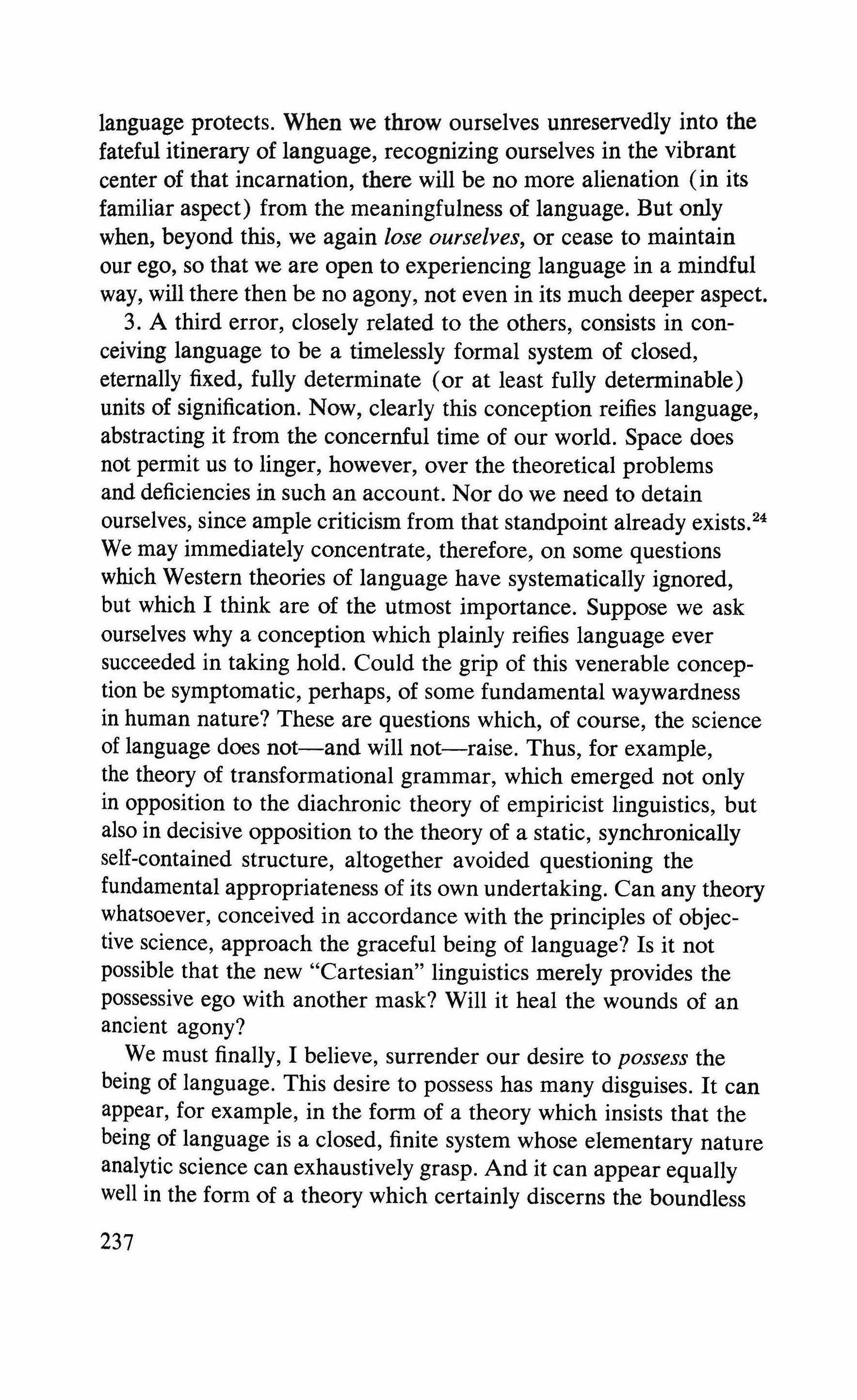
language protects. When we throw ourselves unreservedly into the fateful itinerary of language, recognizing ourselves in the vibrant center of that incarnation, there will be no more alienation (in its familiar aspect) from the meaningfulness of language. But only when, beyond this, we again lose ourselves, or cease to maintain our ego, so that we are open to experiencing language in a mindful way, will there then be no agony, not even in its much deeper aspect.
3. A third error, closely related to the others, consists in conceiving language to be a timelessly formal system of closed, eternally fixed, fully determinate (or at least fully determinable) units of signification. Now, clearly this conception reifies language, abstracting it from the concernful time of our world. Space does not permit us to linger, however, over the theoretical problems and deficiencies in such an account. Nor do we need to detain ourselves, since ample criticism from that standpoint already exists." We may immediately concentrate, therefore, on some questions which Western theories of language have systematically ignored, but which I think are of the utmost importance. Suppose we ask ourselves why a conception which plainly reifies language ever succeeded in taking hold. Could the grip of this venerable conception be symptomatic, perhaps, of some fundamental waywardness in human nature? These are questions which, of course, the science of language does not-and will not-raise. Thus, for example, the theory of transformational grammar, which emerged not only in opposition to the diachronic theory of empiricist linguistics, but also in decisive opposition to the theory of a static, synchronically self-contained structure, altogether avoided questioning the fundamental appropriateness of its own undertaking. Can any theory whatsoever, conceived in accordance with the principles of objective science, approach the graceful being of language? Is it not possible that the new "Cartesian" linguistics merely provides the possessive ego with another mask? Will it heal the wounds of an ancient agony?
We must finally, I believe, surrender our desire to possess the being of language. This desire to possess has many disguises. It can appear, for example, in the form of a theory which insists that the being of language is a closed, finite system whose elementary nature analytic science can exhaustively grasp. And it can appear equally well in the form of a theory which certainly discerns the boundless
237
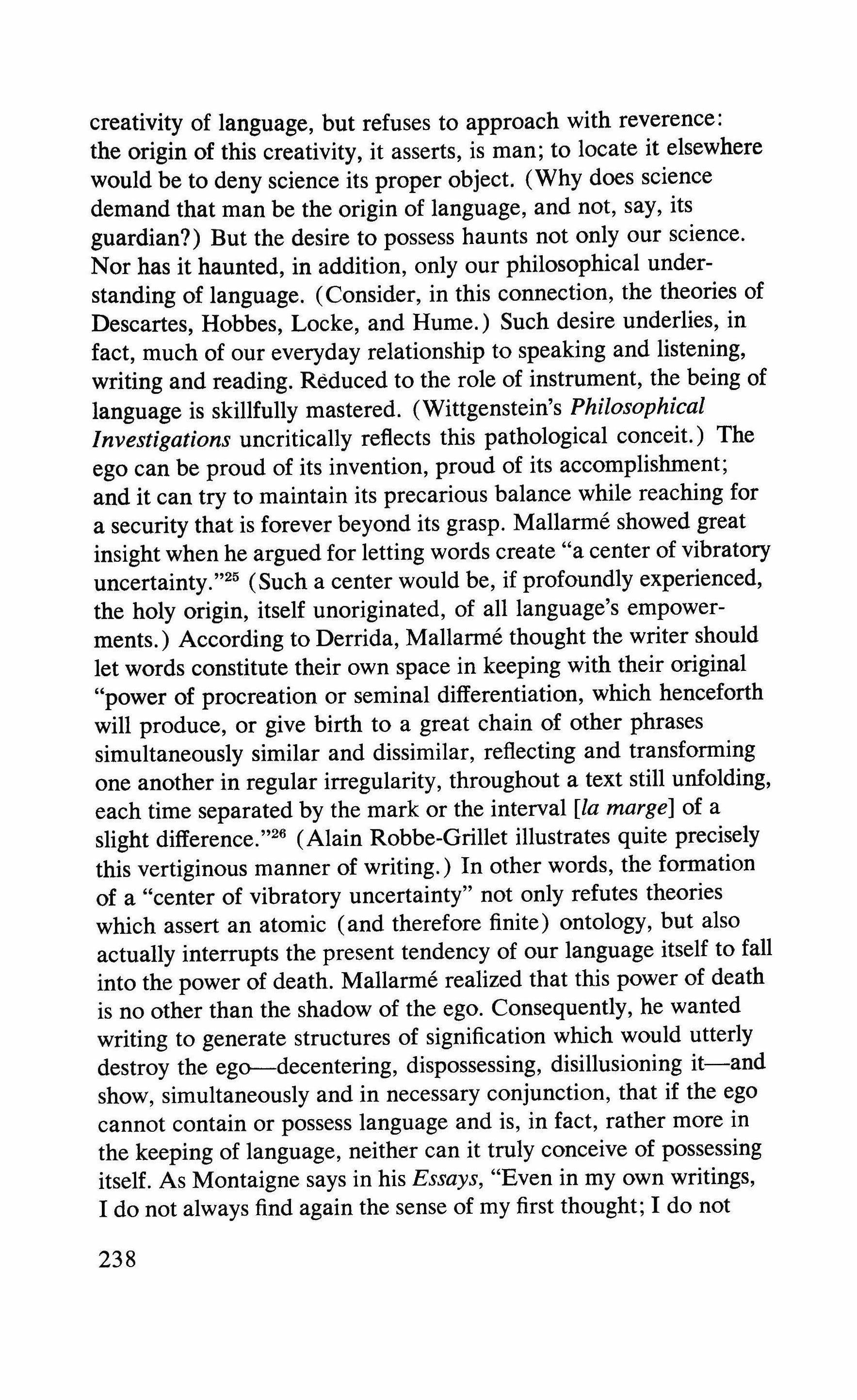
creativity of language, but refuses to approach with reverence: the origin of this creativity, it asserts, is man; to locate it elsewhere would be to deny science its proper object. (Why does science demand that man be the origin of language, and not, say, its guardian?) But the desire to possess haunts not only our science. Nor has it haunted, in addition, only our philosophical understanding of language. (Consider, in this connection, the theories of Descartes, Hobbes, Locke, and Hume.) Such desire underlies, in fact, much of our everyday relationship to speaking and listening, writing and reading. Reduced to the role of instrument, the being of language is skillfully mastered. (Wittgenstein's Philosophical Investigations uncritically reflects this pathological conceit.) The ego can be proud of its invention, proud of its accomplishment; and it can try to maintain its precarious balance while reaching for a security that is forever beyond its grasp. Mallarme showed great insight when he argued for letting words create "a center of vibratory uncertainty.'?" (Such a center would be, if profoundly experienced, the holy origin, itself unoriginated, of all language's empowerments.) According to Derrida, Mallarme thought the writer should let words constitute their own space in keeping with their original "power of procreation or seminal differentiation, which henceforth will produce, or give birth to a great chain of other phrases simultaneously similar and dissimilar, reflecting and transforming one another in regular irregularity, throughout a text still unfolding, each time separated by the mark or the interval [la marge] of a slight difference. "26 (Alain Robbe-Grillet illustrates quite precisely this vertiginous manner of writing.) In other words, the formation of a "center of vibratory uncertainty" not only refutes theories which assert an atomic (and therefore finite) ontology, but also actually interrupts the present tendency of our language itself to fall into the power of death. Mallarme realized that this power of death is no other than the shadow of the ego. Consequently, he wanted writing to generate structures of signification which would utterly destroy the ego--decentering, dispossessing, disillusioning it-and show, simultaneously and in necessary conjunction, that if the ego cannot contain or possess language and is, in fact, rather more in the keeping of language, neither can it truly conceive of possessing itself. As Montaigne says in his Essays, "Even in my own writings, I do not always find again the sense of my first thought; I do not
238
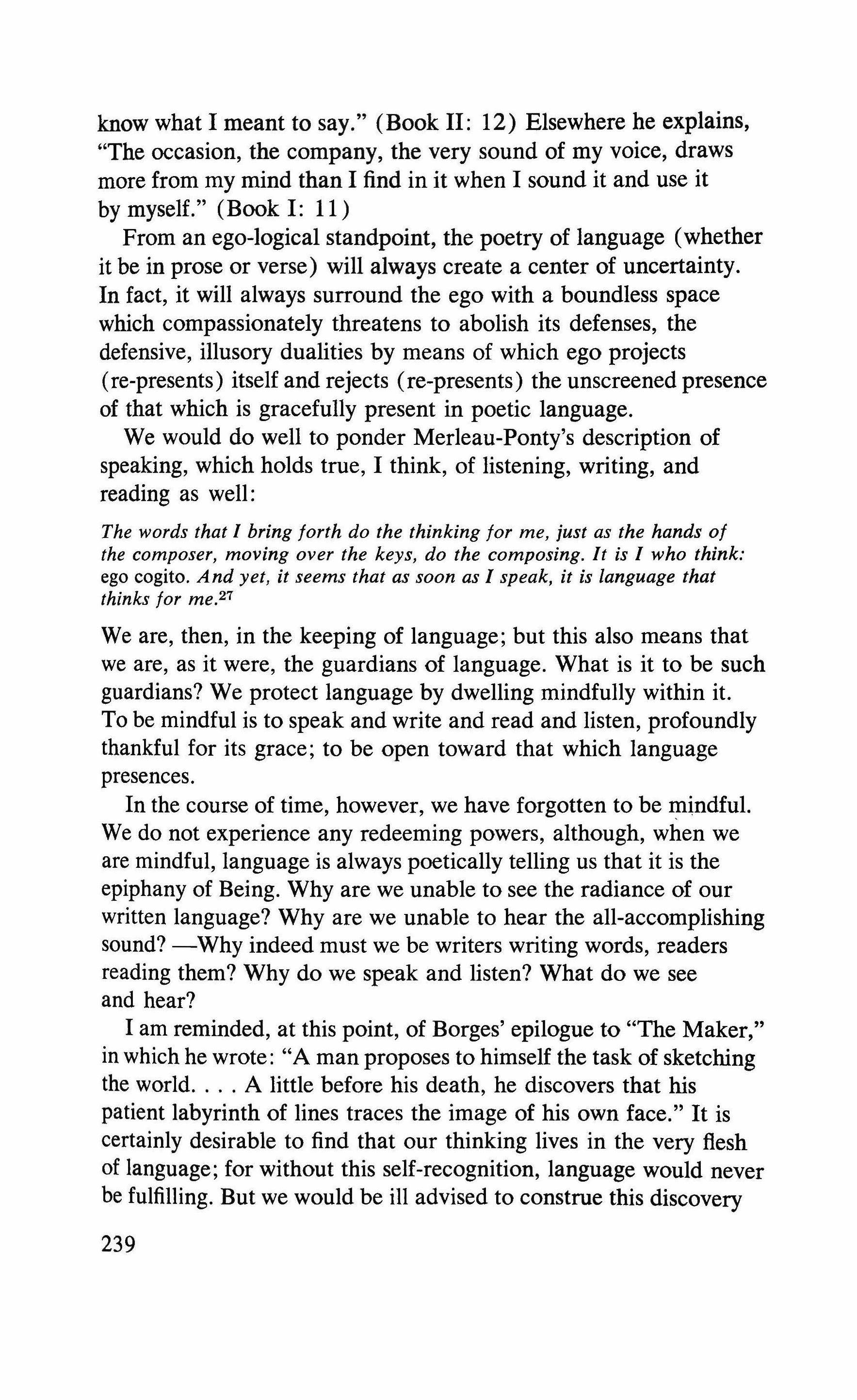
know what I meant to say." (Book II: 12) Elsewhere he explains, "The occasion, the company, the very sound of my voice, draws more from my mind than I find in it when I sound it and use it by myself." (Book
I: 11)
From an ego-logical standpoint, the poetry of language (whether it be in prose or verse) will always create a center of uncertainty. In fact, it will always surround the ego with a boundless space which compassionately threatens to abolish its defenses, the defensive, illusory dualities by means of which ego projects (re-presents) itself and rejects (re-presents) the unscreened presence of that which is gracefully present in poetic language.
We would do well to ponder Merleau-Ponty's description of speaking, which holds true, I think, of listening, writing, and reading as well:
The words that I bring forth do the thinking for me, just as the hands of the composer, moving over the keys, do the composing. It is I who think: ego cogito. And yet, it seems that as soon as I speak, it is language that thinks for me.27
We are, then, in the keeping of language; but this also means that we are, as it were, the guardians of language. What is it to be such guardians? We protect language by dwelling mindfully within it. To be mindful is to speak and write and read and listen, profoundly thankful for its grace; to be open toward that which language presences.
In the course of time, however, we have forgotten to be mindful. We do not experience any redeeming powers, although, when we are mindful, language is always poetically telling us that it is the epiphany of Being. Why are we unable to see the radiance of our written language? Why are we unable to hear the all-accomplishing sound? -Why indeed must we be writers writing words, readers reading them? Why do we speak and listen? What do we see and hear?
I am reminded, at this point, of Borges' epilogue to "The Maker," in which he wrote: "A man proposes to himself the task of sketching the world. A little before his death, he discovers that his patient labyrinth of lines traces the image of his own face." It is certainly desirable to find that our thinking lives in the very flesh of language; for without this self-recognition, language would never be fulfilling. But we would be ill advised to construe this discovery
239

as a confirmation of our own omnipotence. For the language which shows forth our face is also the language with power to erase this face, and even to efface itself in the presencing of what is. And there is no ego so strong that it can face the radiant emptiness of space to which such language has given way.
The man's discovery takes place, says Borges, "a little before his death." This timing is not at all, as we shall soon see, accidental. (Before death comes and we meet it face to face, we face instead death's shadow, which is the shadow cast by our own ego's darkening and deluded thoughts.) As for the man's discovery, itself a labyrinth of innumerable meanings, does it not show that we will realize the bliss of presence, or nonduality, through the mindful gestures of language?
We have received language in four forms: speaking and listening, writing and reading. These forms provide two sensuous paths to the Holy which language presences: the path of sound and the path of shadow. Progress on the first path demands openness to the quintessential being of sound; it demands a mindfulness which lets the sound of our spoken language resound and return speaking to the fundamental silence "which precedes it," as Merleau-Ponty says, and "which never ceases to accompany it," because without that reserve, "it would truly say nothing. "28 Progress on the second path calls for a recognition of the quintessential being of shadow, which lets the shadows of our written language play, and gives the visible shape of writing to the invisible spelling of light. It is only by virtue of a mindful commemorative "reduction" to these two sensuous essences that we can experience the consecrated being of language: the destiny of our received language, I mean, to be the sublime language of Being, the truly unwritable radiance and unspeakable silence into which Being gracefully unfolds.
In our approach to the being of language, two great sources of teaching have already inspired us and served as guides: one is Tantric Buddhism; the other is the tradition of the Kabbalah. Let us now think with these teachings and see where they lead us.
A fundamental text in the Vajrayana teaching of Tibet is The Great Liberation Through Hearing in the Bardo. This bookaddressed to the living, not only the dying-interprets by the power of sound the manifestations of light we encounter in the bardo as instructive emanations which reflect our ownmost nature (the
240
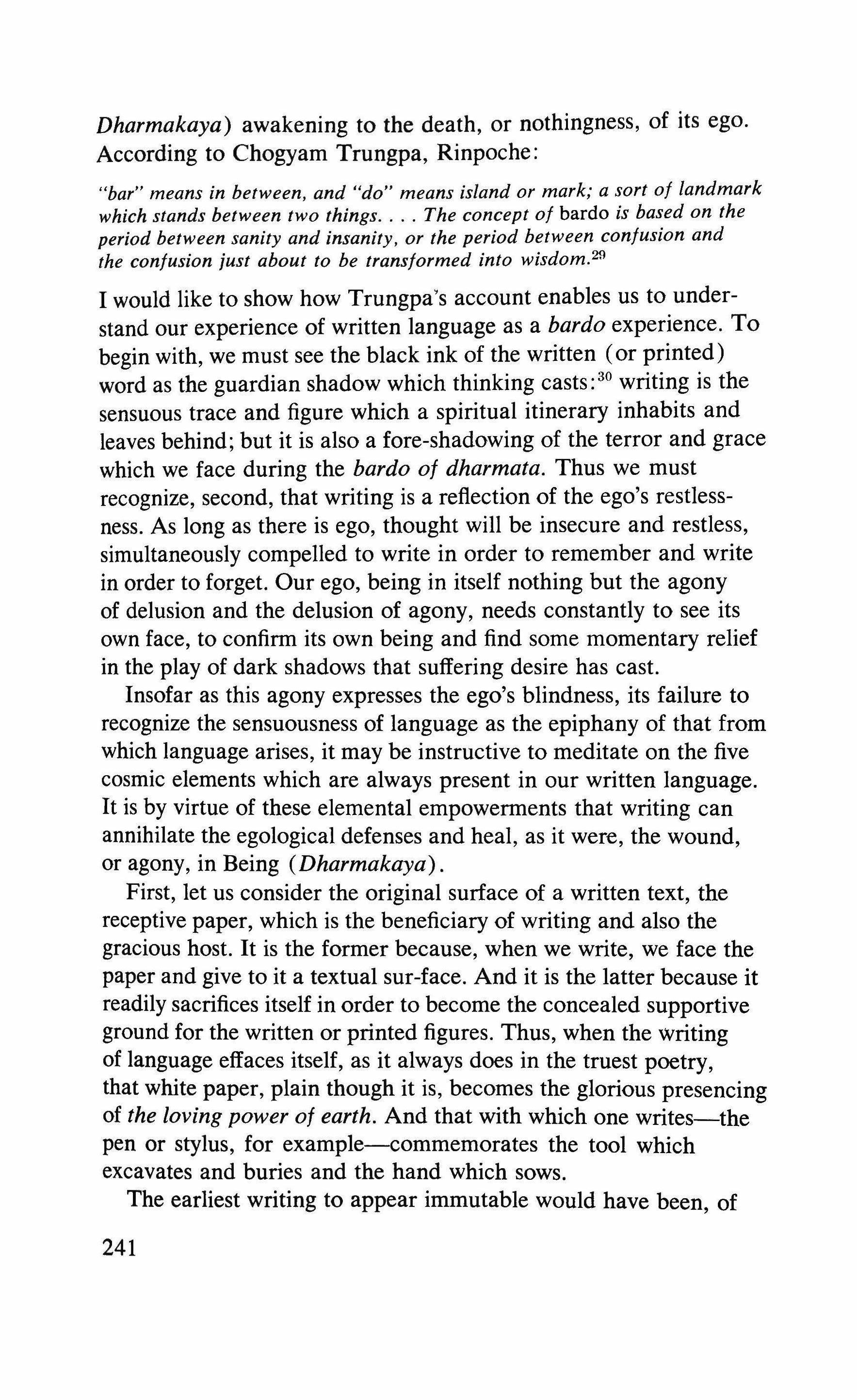
Dharmakaya) awakening to the death, or nothingness, of its ego. According to Chogyam Trungpa, Rinpoche:
"bar" means in between, and "do" means island or mark; a sort of landmark which stands between two things The concept of bardo is based on the period between sanity and insanity, or the period between confusion and the confusion just about to be transformed into wlsdomv"
I would like to show how Trungpa's account enables us to understand our experience of written language as a bardo experience. To begin with, we must see the black ink of the written (or printed) word as the guardian shadow which thinking casts: 30 writing is the sensuous trace and figure which a spiritual itinerary inhabits and leaves behind; but it is also a fore-shadowing of the terror and grace which we face during the bardo of dharmata. Thus we must recognize, second, that writing is a reflection of the ego's restlessness. As long as there is ego, thought will be insecure and restless, simultaneously compelled to write in order to remember and write in order to forget. Our ego, being in itself nothing but the agony of delusion and the delusion of agony, needs constantly to see its own face, to confirm its own being and find some momentary relief in the play of dark shadows that suffering desire has cast.
Insofar as this agony expresses the ego's blindness, its failure to recognize the sensuousness of language as the epiphany of that from which language arises, it may be instructive to meditate on the five cosmic elements which are always present in our written language. It is by virtue of these elemental empowerments that writing can annihilate the egological defenses and heal, as it were, the wound, or agony, in Being (Dharmakaya).
First, let us consider the original surface of a written text, the receptive paper, which is the beneficiary of writing and also the gracious host. It is the former because, when we write, we face the paper and give to it a textual sur-face. And it is the latter because it readily sacrifices itself in order to become the concealed supportive ground for the written or printed figures. Thus, when the Writing of language effaces itself, as it always does in the truest poetry, that white paper, plain though it is, becomes the glorious presencing of the loving power of earth. And that with which one writes-the pen or stylus, for example-commemorates the tool which excavates and buries and the hand which sows.
The earliest writing to appear immutable would have been, of
241
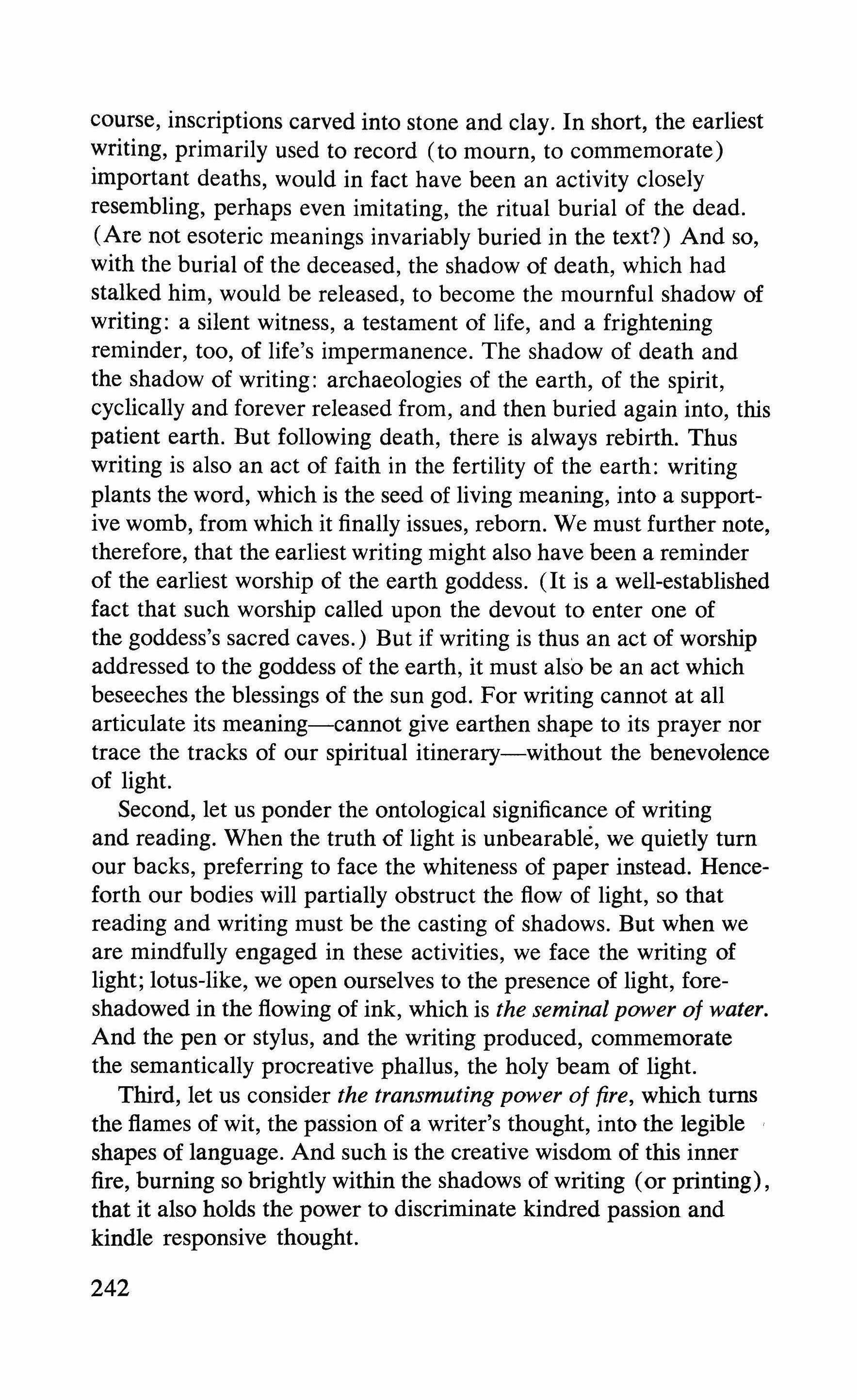
course, inscriptions carved into stone and clay. In short, the earliest writing, primarily used to record (to mourn, to commemorate) important deaths, would in fact have been an activity closely resembling, perhaps even imitating, the ritual burial of the dead. (Are not esoteric meanings invariably buried in the text?) And so, with the burial of the deceased, the shadow of death, which had stalked him, would be released, to become the mournful shadow of writing: a silent witness, a testament of life, and a frightening reminder, too, of life's impermanence. The shadow of death and the shadow of writing: archaeologies of the earth, of the spirit, cyclically and forever released from, and then buried again into, this patient earth. But following death, there is always rebirth. Thus writing is also an act of faith in the fertility of the earth: writing plants the word, which is the seed of living meaning, into a supportive womb, from which it finally issues, reborn. We must further note, therefore, that the earliest writing might also have been a reminder of the earliest worship of the earth goddess. (It is a well-established fact that such worship called upon the devout to enter one of the goddess's sacred caves.) But if writing is thus an act of worship addressed to the goddess of the earth, it must also be an act which beseeches the blessings of the sun god. For writing cannot at all articulate its meaning-cannot give earthen shape to its prayer nor trace the tracks of our spiritual itinerary-without the benevolence of light.
Second, let us ponder the ontological significance of writing and reading. When the truth of light is unbearable, we quietly turn our backs, preferring to face the whiteness of paper instead. Henceforth our bodies will partially obstruct the flow of light, so that reading and writing must be the casting of shadows. But when we are mindfully engaged in these activities, we face the writing of light; lotus-like, we open ourselves to the presence of light, foreshadowed in the flowing of ink, which is the seminal power of water. And the pen or stylus, and the writing produced, commemorate the semantically procreative phallus, the holy beam of light.
Third, let us consider the transmuting power of {ire, which turns the flames of wit, the passion of a writer's thought, into the legible shapes of language. And such is the creative wisdom of this inner fire, burning so brightly within the shadows of writing (or printing) that it also holds the power to discriminate kindred passion and kindle responsive thought.
242
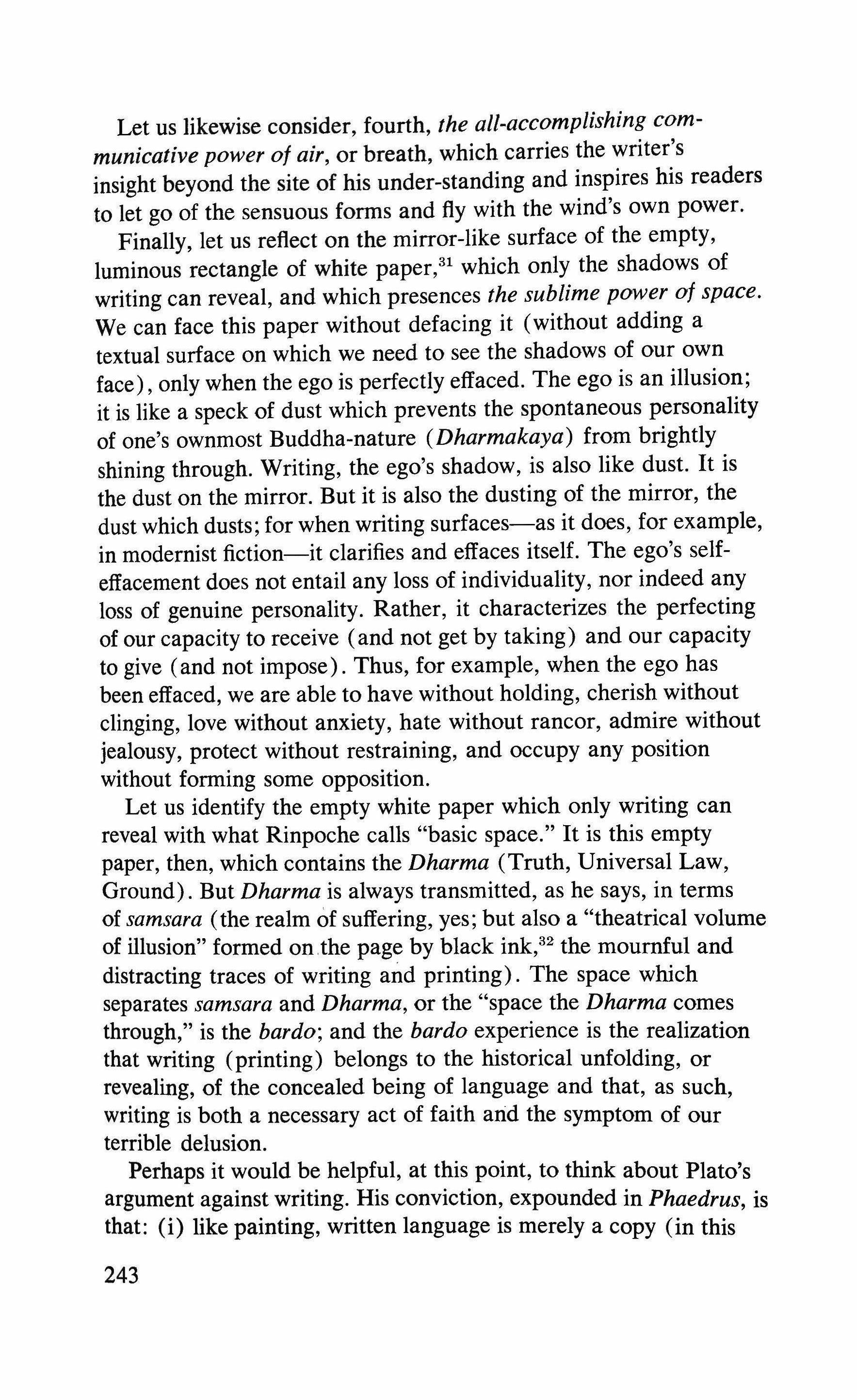
Let us likewise consider, fourth, the all-accomplishing communicative power of air, or breath, which carries the writer's insight beyond the site of his under-standing and inspires his readers to let go of the sensuous forms and fly with the wind's own power. Finally, let us reflect on the mirror-like surface of the empty, luminous rectangle of white paper," which only the shadows of writing can reveal, and which presences the sublime power of space. We can face this paper without defacing it (without adding a textual surface on which we need to see the shadows of our own face), only when the ego is perfectly effaced. The ego is an illusion; it is like a speck of dust which prevents the spontaneous personality of one's ownmost Buddha-nature (Dharmakaya) from brightly shining through. Writing, the ego's shadow, is also like dust. It is the dust on the mirror. But it is also the dusting of the mirror, the dust which dusts; for when writing surfaces-as it does, for example, in modernist fiction-it clarifies and effaces itself. The ego's selfeffacement does not entail any loss of individuality, nor indeed any loss of genuine personality. Rather, it characterizes the perfecting of our capacity to receive (and not get by taking) and our capacity to give (and not impose). Thus, for example, when the ego has been effaced, we are able to have without holding, cherish without clinging, love without anxiety, hate without rancor, admire without jealousy, protect without restraining, and occupy any position without forming some opposition.
Let us identify the empty white paper which only writing can reveal with what Rinpoche calls "basic space." It is this empty paper, then, which contains the Dharma (Truth, Universal Law, Ground). But Dharma is always transmitted, as he says, in terms of samsara (the realm of suffering, yes; but also a "theatrical volume of illusion" formed on .the page by black ink," the mournful and distracting traces of writing and printing). The space which separates samsara and Dharma, or the "space the Dharma comes through," is the bardo; and the bardo experience is the realization that writing (printing) belongs to the historical unfolding, or revealing, of the concealed being of language and that, as such, writing is both a necessary act of faith arid the symptom of our terrible delusion.
Perhaps it would be helpful, at this point, to think about Plato's argument against writing. His conviction, expounded in Phaedrus, is that: (i) like painting, written language is merely a copy (in this
243
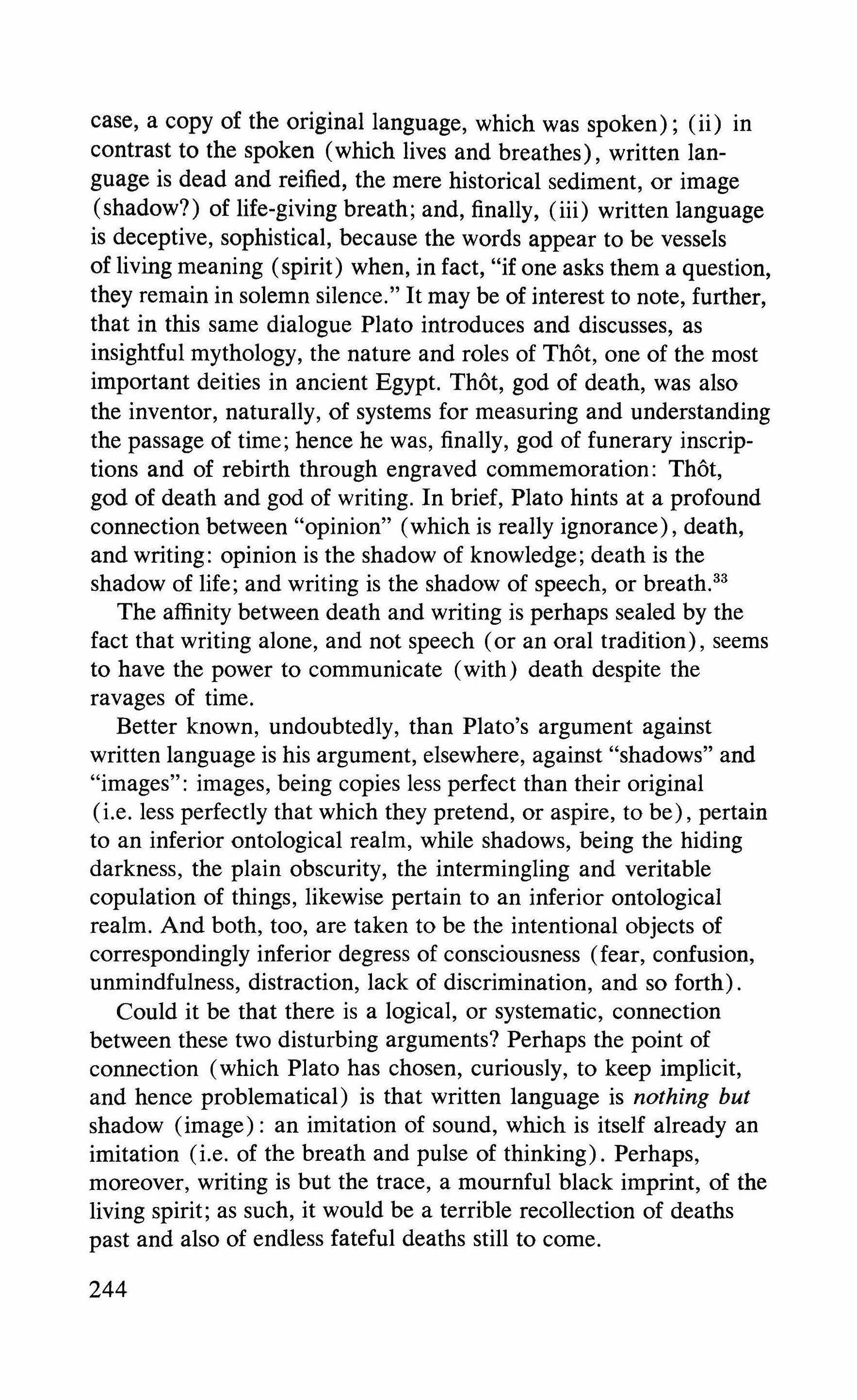
case, a copy of the original language, which was spoken); (ii) in contrast to the spoken (which lives and breathes), written language is dead and reified, the mere historical sediment, or image (shadow?) of life-giving breath; and, finally, (iii) written language is deceptive, sophistical, because the words appear to be vessels of living meaning (spirit) when, in fact, "if one asks them a question, they remain in solemn silence." It may be of interest to note, further, that in this same dialogue Plato introduces and discusses, as insightful mythology, the nature and roles of Thot, one of the most important deities in ancient Egypt. Thot, god of death, was also the inventor, naturally, of systems for measuring and understanding the passage of time; hence he was, finally, god of funerary inscriptions and of rebirth through engraved commemoration: Thot, god of death and god of writing. In brief, Plato hints at a profound connection between "opinion" (which is really ignorance), death, and writing: opinion is the shadow of knowledge; death is the shadow of life; and writing is the shadow of speech, or breath."
The affinity between death and writing is perhaps sealed by the fact that writing alone, and not speech (or an oral tradition), seems to have the power to communicate (with) death despite the ravages of time.
Better known, undoubtedly, than Plato's argument against written language is his argument, elsewhere, against "shadows" and "images": images, being copies less perfect than their original (i.e. less perfectly that which they pretend, or aspire, to be), pertain to an inferior ontological realm, while shadows, being the hiding darkness, the plain obscurity, the intermingling and veritable copulation of things, likewise pertain to an inferior ontological realm. And both, too, are taken to be the intentional objects of correspondingly inferior degress of consciousness (fear, confusion, unmindfulness, distraction, lack of discrimination, and so forth). Could it be that there is a logical, or systematic, connection between these two disturbing arguments? Perhaps the point of connection (which Plato has chosen, curiously, to keep implicit, and hence problematical) is that written language is nothing but shadow (image): an imitation of sound, which is itself already an imitation (i.e. of the breath and pulse of thinking). Perhaps, moreover, writing is but the trace, a mournful black imprint, of the living spirit; as such, it would be a terrible recollection of deaths past and also of endless fateful deaths still to come. 244
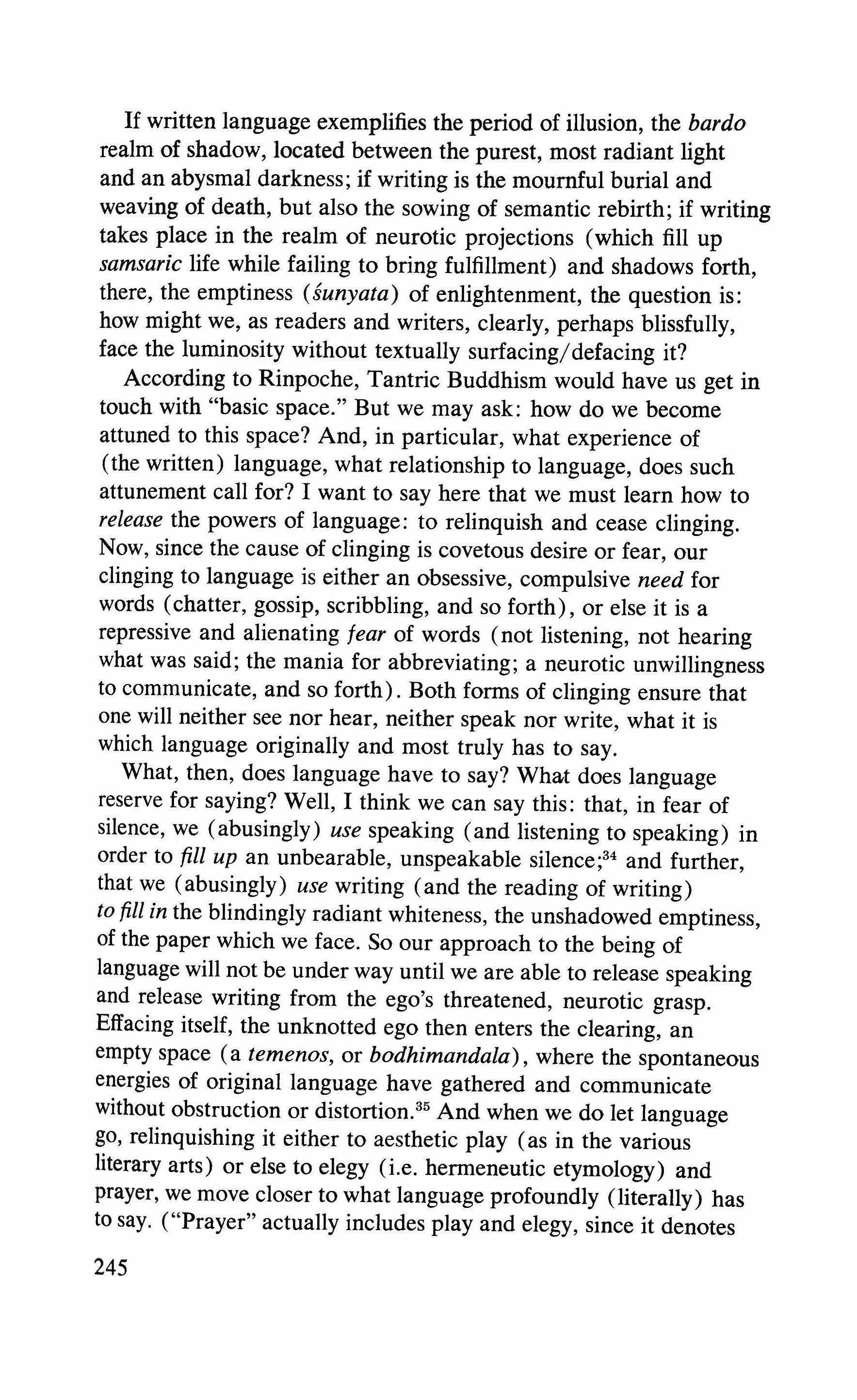
If written language exemplifies the period of illusion, the bardo realm of shadow, located between the purest, most radiant light and an abysmal darkness; if writing is the mournful burial and weaving of death, but also the sowing of semantic rebirth; if writing takes place in the realm of neurotic projections (which fill up samsaric life while failing to bring fulfillment) and shadows forth, there, the emptiness (sunyata) of enlightenment, the question is: how might we, as readers and writers, clearly, perhaps blissfully, face the luminosity without textually surfacing/defacing it?
According to Rinpoche, Tantric Buddhism would have us get in touch with "basic space." But we may ask: how do we become attuned to this space? And, in particular, what experience of (the written) language, what relationship to language, does such attunement call for? I want to say here that we must learn how to release the powers of language: to relinquish and cease clinging. Now, since the cause of clinging is covetous desire or fear, our clinging to language is either an obsessive, compulsive need for words (chatter, gossip, scribbling, and so forth), or else it is a repressive and alienating fear of words (not listening, not hearing what was said; the mania for abbreviating; a neurotic unwillingness to communicate, and so forth). Both forms of clinging ensure that one will neither see nor hear, neither speak nor write, what it is which language originally and most truly has to say. What, then, does language have to say? What does language reserve for saying? Well, I think we can say this: that, in fear of silence, we (abusingly) use speaking (and listening to speaking) in order to fill up an unbearable, unspeakable silence;" and further, that we (abusingly) use writing (and the reading of writing) to fill in the blindingly radiant whiteness, the unshadowed emptiness, of the paper which we face. So our approach to the being of language will not be under way until we are able to release speaking and release writing from the ego's threatened, neurotic grasp. Effacing itself, the unknotted ego then enters the clearing, an empty space (a temenos, or bodhimandala), where the spontaneous energies of original language have gathered and communicate without obstruction or distortion." And when we do let language go, relinquishing it either to aesthetic play (as in the various literary arts) or else to elegy (i.e. hermeneutic etymology) and prayer, we move closer to what language profoundly (literally) has to say. ("Prayer" actually includes play and elegy, since it denotes
245
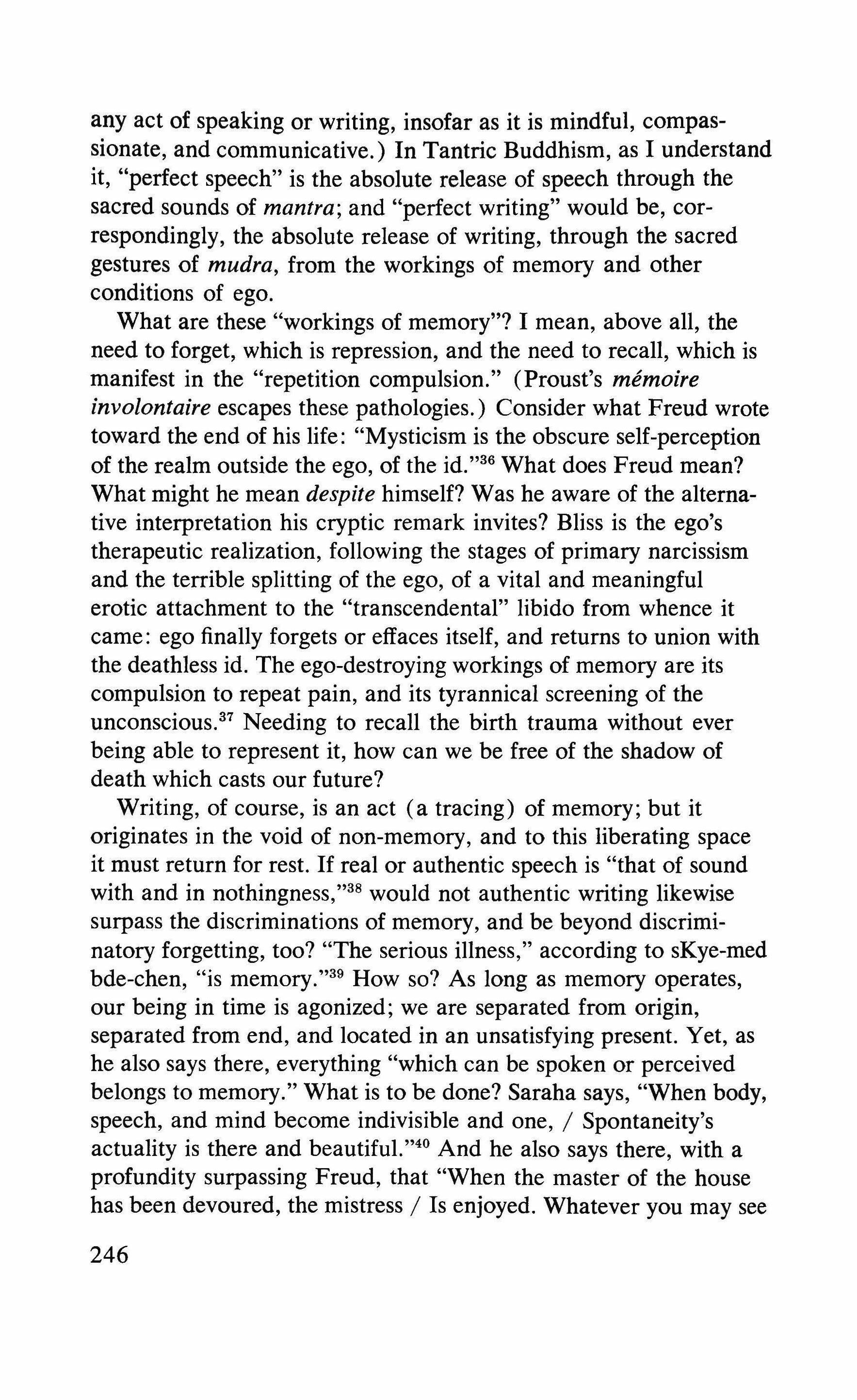
any act of speaking or writing, insofar as it is mindful, compassionate, and communicative.) In Tantric Buddhism, as I understand it, "perfect speech" is the absolute release of speech through the sacred sounds of mantra; and "perfect writing" would be, correspondingly, the absolute release of writing, through the sacred gestures of mudra, from the workings of memory and other conditions of ego.
What are these "workings of memory"? I mean, above all, the need to forget, which is repression, and the need to recall, which is manifest in the "repetition compulsion." (Proust's memoire involontaire escapes these pathologies.) Consider what Freud wrote toward the end of his life: "Mysticism is the obscure self-perception of the realm outside the ego, of the id.'?" What does Freud mean? What might he mean despite himself? Was he aware of the alternative interpretation his cryptic remark invites? Bliss is the ego's therapeutic realization, following the stages of primary narcissism and the terrible splitting of the ego, of a vital and meaningful erotic attachment to the "transcendental" libido from whence it came: ego finally forgets or effaces itself, and returns to union with the deathless id. The ego-destroying workings of memory are its compulsion to repeat pain, and its tyrannical screening of the unconscious." Needing to recall the birth trauma without ever being able to represent it, how can we be free of the shadow of death which casts our future?
Writing, of course, is an act (a tracing) of memory; but it originates in the void of non-memory, and to this liberating space it must return for rest. If real or authentic speech is "that of sound with and in nothingness.'?" would not authentic writing likewise surpass the discriminations of memory, and be beyond discriminatory forgetting, too? "The serious illness," according to sKye-med bde-chen, "is mernory.?" How so? As long as memory operates, our being in time is agonized; we are separated from origin, separated from end, and located in an unsatisfying present. Yet, as he also says there, everything "which can be spoken or perceived belongs to memory." What is to be done? Saraha says, "When body, speech, and mind become indivisible and one, / Spontaneity's actuality is there and beautiful.t"? And he also says there, with a profundity surpassing Freud, that "When the master of the house has been devoured, the mistress / Is enjoyed. Whatever you may see
246
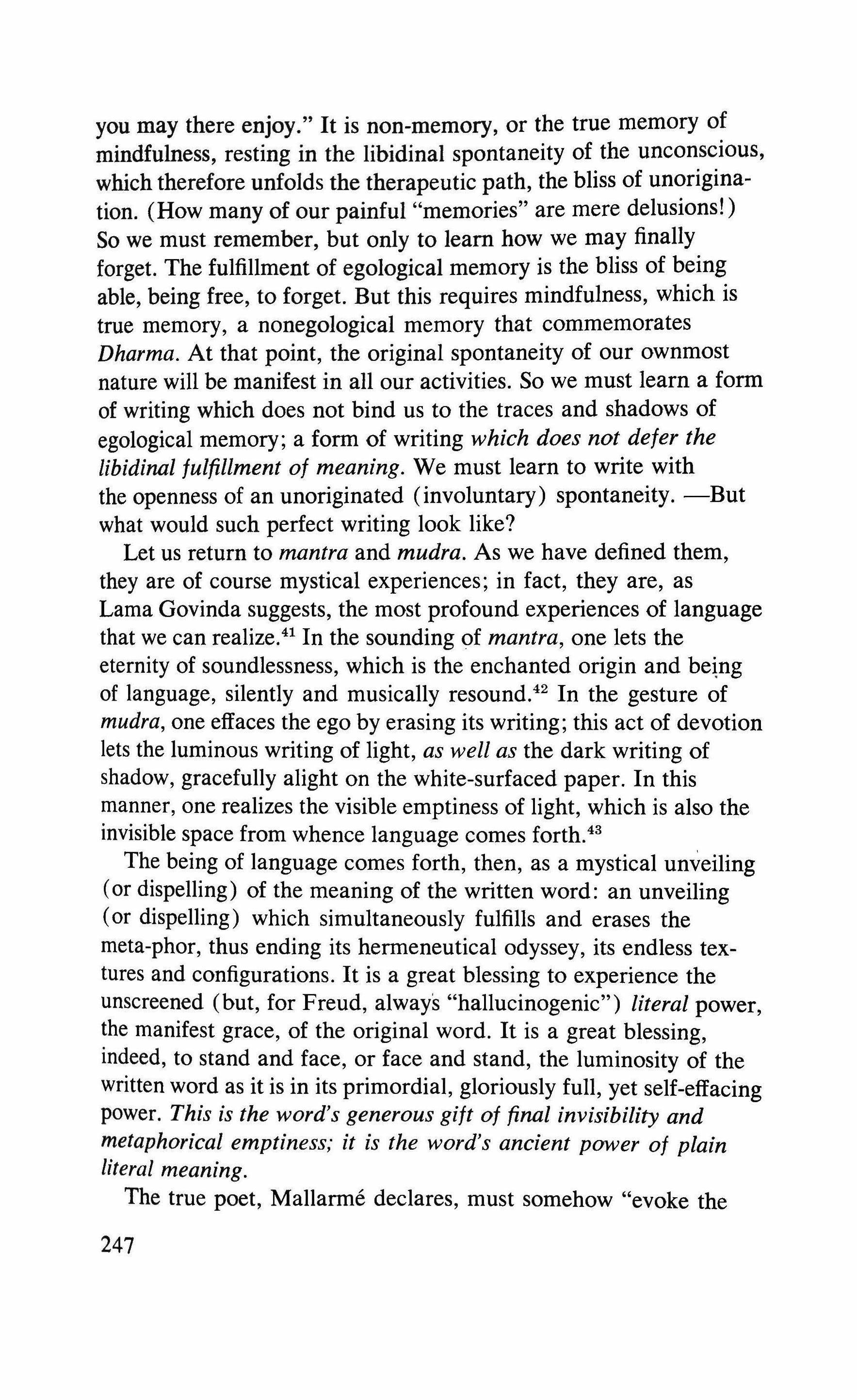
you may there enjoy." It is non-memory, or the true memory of mindfulness, resting in the libidinal spontaneity of the unconscious, which therefore unfolds the therapeutic path, the bliss of unorigination. (How many of our painful "memories" are mere delusions!) So we must remember, but only to learn how we may finally forget. The fulfillment of egological memory is the bliss of being able, being free, to forget. But this requires mindfulness, which is true memory, a nonegological memory that commemorates Dharma. At that point, the original spontaneity of our ownmost nature will be manifest in all our activities. So we must learn a form of writing which does not bind us to the traces and shadows of egological memory; a form of writing which does not defer the libidinal fulfillment of meaning. We must learn to write with the openness of an unoriginated (involuntary) spontaneity. -But what would such perfect writing look like?
Let us return to mantra and mudra. As we have defined them, they are of course mystical experiences; in fact, they are, as Lama Govinda suggests, the most profound experiences of language that we can realize." In the sounding of mantra, one lets the eternity of soundlessness, which is the enchanted origin and being of language, silently and musically resound." In the gesture of mudra, one effaces the ego by erasing its writing; this act of devotion lets the luminous writing of light, as well as the dark writing of shadow, gracefully alight on the white-surfaced paper. In this manner, one realizes the visible emptiness of light, which is also the invisible space from whence language comes forth."
The being of language comes forth, then, as a mystical unveiling ( or dispelling) of the meaning of the written word: an unveiling (or dispelling) which simultaneously fulfills and erases the meta-phor, thus ending its hermeneutical odyssey, its endless textures and configurations. It is a great blessing to experience the unscreened (but, for Freud, always "hallucinogenic") literal power, the manifest grace, of the original word. It is a great blessing, indeed, to stand and face, or face and stand, the luminosity of the written word as it is in its primordial, gloriously full, yet self-effacing power. This is the word's generous gift of final invisibility and metaphorical emptiness; it is the word's ancient power of plain literal meaning.
The true poet, Mallarme declares, must somehow "evoke the
247
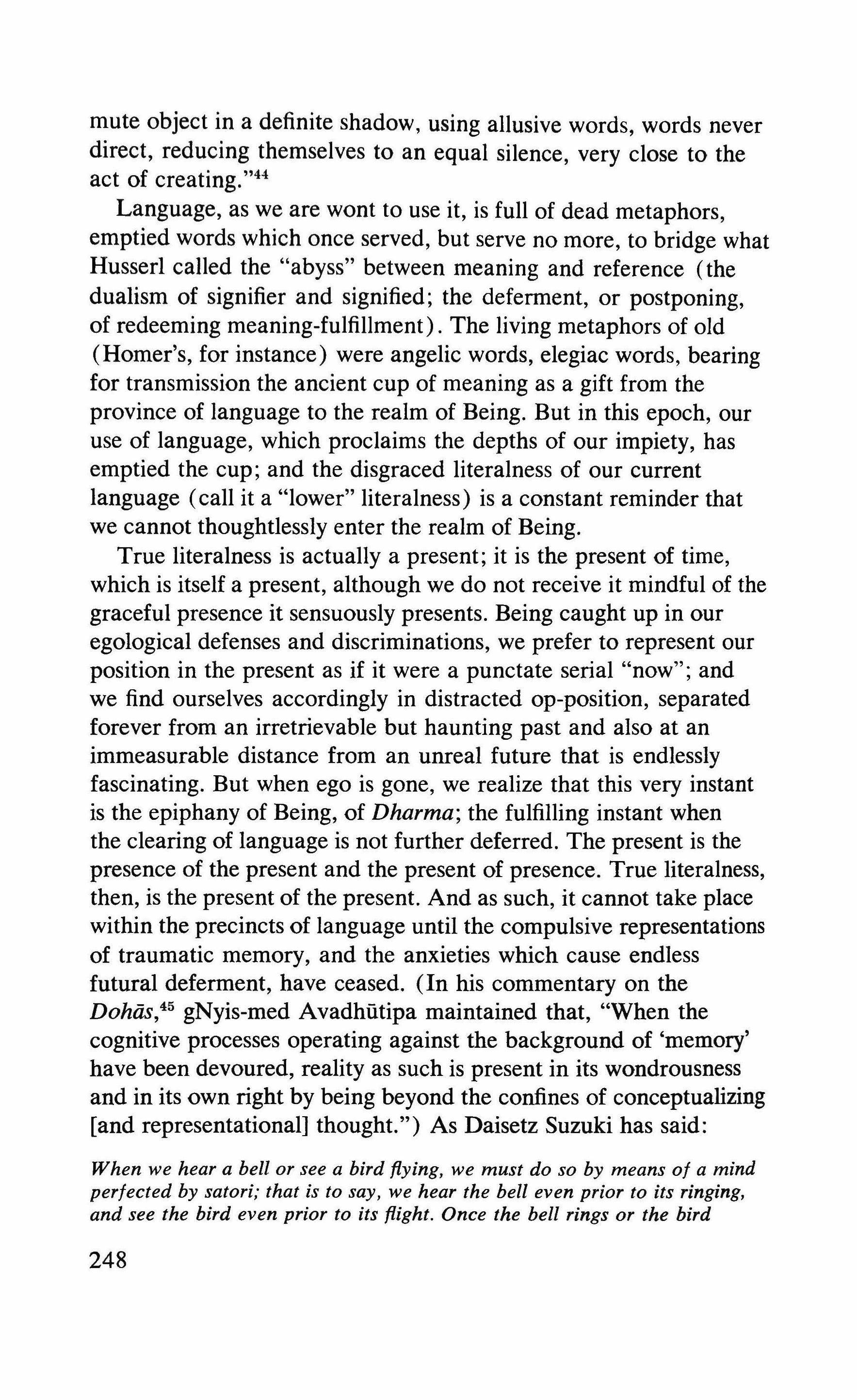
mute object in a definite shadow, using allusive words, words never direct, reducing themselves to an equal silence, very close to the act of creating. "44
Language, as we are wont to use it, is full of dead metaphors, emptied words which once served, but serve no more, to bridge what HusserI called the "abyss" between meaning and reference (the dualism of signifier and signified; the deferment, or postponing, of redeeming meaning-fulfillment). The living metaphors of old (Homer's, for instance) were angelic words, elegiac words, bearing for transmission the ancient cup of meaning as a gift from the province of language to the realm of Being. But in this epoch, our use of language, which proclaims the depths of our impiety, has emptied the cup; and the disgraced literalness of our current language (call it a "lower" literalness) is a constant reminder that we cannot thoughtlessly enter the realm of Being.
True literalness is actually a present; it is the present of time, which is itself a present, although we do not receive it mindful of the graceful presence it sensuously presents. Being caught up in our egological defenses and discriminations, we prefer to represent our position in the present as if it were a punctate serial "now"; and we find ourselves accordingly in distracted op-position, separated forever from an irretrievable but haunting past and also at an immeasurable distance from an unreal future that is endlessly fascinating. But when ego is gone, we realize that this very instant is the epiphany of Being, of Dharma; the fulfilling instant when the clearing of language is not further deferred. The present is the presence of the present and the present of presence. True literalness, then, is the present of the present. And as such, it cannot take place within the precincts of language until the compulsive representations of traumatic memory, and the anxieties which cause endless futural deferment, have ceased. (In his commentary on the Dohas." gNyis-med Avadhutipa maintained that, "When the cognitive processes operating against the background of 'memory' have been devoured, reality as such is present in its wondrousness and in its own right by being beyond the confines of conceptualizing [and representational] thought.") As Daisetz Suzuki has said:
When we hear a bell or see a bird flying, we must do so by means of a mind perfected by satori; that is to say, we hear the bell even prior to its ringing, and see the bird even prior to its flight. Once the bell rings or the bird
248
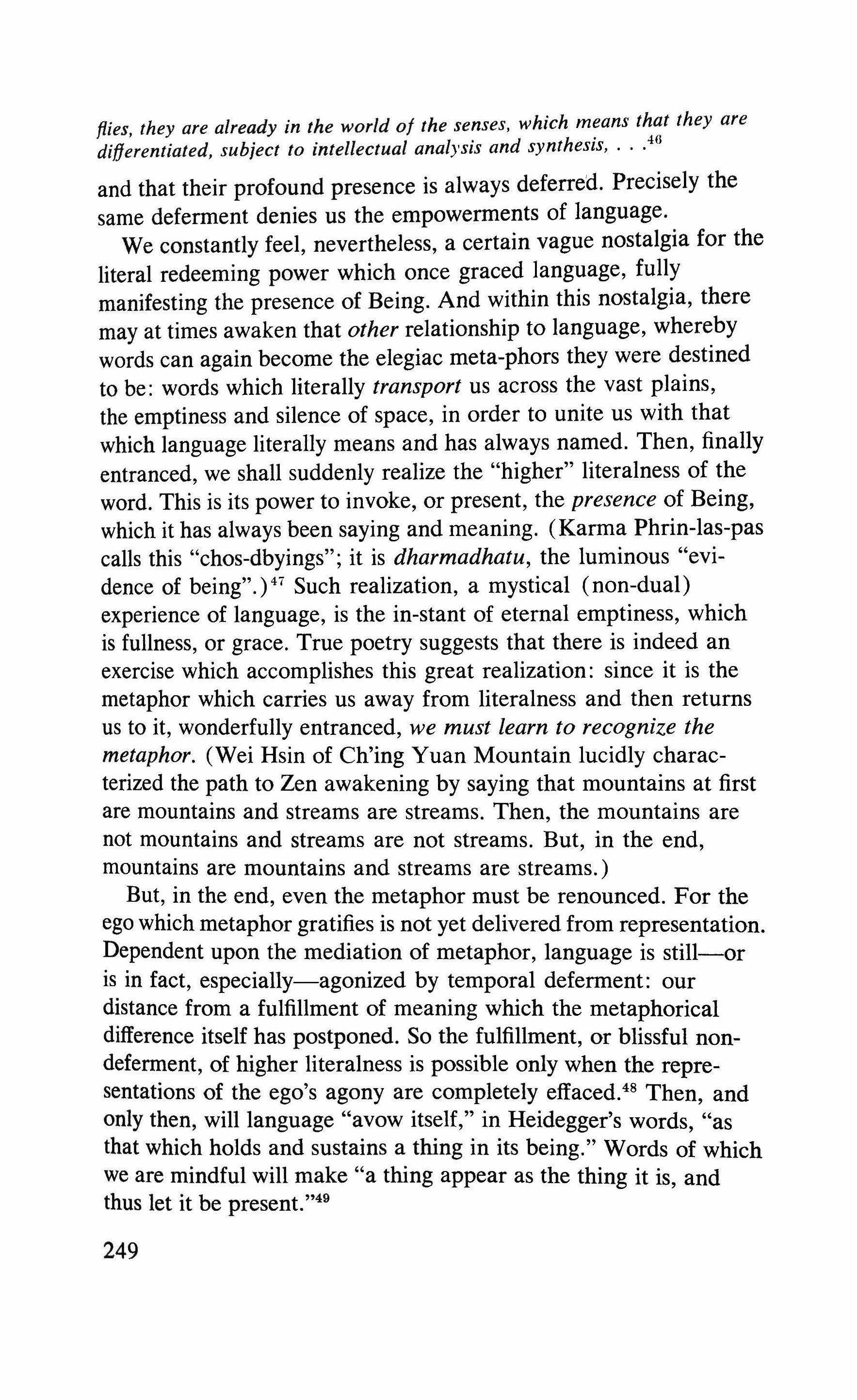
flies, they are already in the world of the senses, which means that they are differentiated, subject to intellectual analysis and synthesis, 46 and that their profound presence is always deferred. Precisely the same deferment denies us the empowerments of language.
We constantly feel, nevertheless, a certain vague nostalgia for the literal redeeming power which once graced language, fully manifesting the presence of Being. And within this nostalgia, there may at times awaken that other relationship to language, whereby words can again become the elegiac meta-phors they were destined to be: words which literally transport us across the vast plains, the emptiness and silence of space, in order to unite us with that which language literally means and has always named. Then, finally entranced, we shall suddenly realize the "higher" literalness of the word. This is its power to invoke, or present, the presence of Being, which it has always been saying and meaning. (Karma Phrin-las-pas calls this "chos-dbyings"; it is dharmadhatu, the luminous "evidence of being".)47 Such realization, a mystical (non-dual) experience of language, is the in-stant of eternal emptiness, which is fullness, or grace. True poetry suggests that there is indeed an exercise which accomplishes this great realization: since it is the metaphor which carries us away from literalness and then returns us to it, wonderfully entranced, we must learn to recognize the metaphor. (Wei Hsin of Ch'ing Yuan Mountain lucidly characterized the path to Zen awakening by saying that mountains at first are mountains and streams are streams. Then, the mountains are not mountains and streams are not streams. But, in the end, mountains are mountains and streams are streams.)
But, in the end, even the metaphor must be renounced. For the ego which metaphor gratifies is not yet delivered from representation. Dependent upon the mediation of metaphor, language is still-or is in fact, especially-agonized by temporal deferment: our distance from a fulfillment of meaning which the metaphorical difference itself has postponed. So the fulfillment, or blissful nondeferment, of higher literalness is possible only when the representations of the ego's agony are completely effaced." Then, and only then, will language "avow itself," in Heidegger's words, "as that which holds and sustains a thing in its being." Words of which we are mindful will make "a thing appear as the thing it is, and thus let it be present. "49
249

Heidegger speaks here, speaks through what he writes, of how the being of things, and indeed the very being of our world, is treasured by the poet's words. So he finds himself saying: the being of language is the language of Being. But he does not understand what this means. He is not alone in wanting to understand. We have already discussed, for example, the Tantric approach to the language of creative sound (mantra) and the language of creative gesture (mudra). Moreover, we relied on the wisdom of Jewish mysticism to weave the text of our interpretation of Tantric practice. Perhaps, therefore, we should now somewhat unravel that text and concentrate on the threads we secretly took from the Kabbalist tradition. In the medieval Kabbalist work Zohar Terumah, it is written that
When the Holy One was about to create the world, He robed himself in the primordial light and created the heavens. At first the light was at the right (the active and spiritual side) and the darkness at the left (the receptive and substantial side). What, then, did the Holy One do? He merged the one into the other and from them formed the heavens He brought them together and harmonized them, and when they were united as one, he stretched them out like a curtain.50
This is the story of Creation. It is also a story about the origination of writing: of writing as the creation of the world. The original Torah, which the Kabbalists identify with the Godhead itself, is in its essence the creative light which shaped the world; it is composed, they say, "of divine letters, which themselves are configurations of divine light."?' After man's Fall, however, the Godhead withdrew some of this light from the letters which made manifest the sacred truth. More precisely, the Holy One shrouded this blinding light, as if to command a period of mourning, in the darkness of terrestrial writing. (It is worth noting that the bardo experience, which we may likewise describe as a period of mourning, is fundamentally a testing of one's spiritual fearlessness in the face of various dull and bright lights.) But the Kabbalists devoutly believe "that, in other aeons, this same Torah, without modifying its essence, will show another face. "52 Another text will surface when we are open, finally, to the holy presence and can face without anxiety the literal meaning of the luminous Torah. In the meantime (that is to say, in our shemittah, our cosmic cycle), we must continue to transcribe and read the text of a dark and incomplete Torah.
250

Now, this incompleteness has received two interpretations. According to the one, "a certain letter of the alphabet is in its present form incomplete and faulty, whereas it was perfect in the preceding shemittab and will again be so in the next. Since every letter represents a concentration of divine energy, it may be inferred from the deficiency of its present visible form that the power of severe judgment, which sets its stamp on our world, impedes the activity of the hidden lights and forces and prevents them from being fully manifested. "53 According to the second interpretation, however, "a letter is actually lacking in our alphabet; in our aeon this letter is not manifested and hence does not occur in our Torah.t'"
Through the grace of redemption, this twenty-third letter (of the Hebrew alphabet), invisible because of its blindingly radiant whiteness, will finally become visible. Thus, Rabbi Levi Isaac of Berdichev distinguished what he called an "esoteric white form" of Torah and an "exoteric black form." I mention this because his account of these forms is especially intriguing: "But the truth is," he writes, "that also the white, the spaces in the scroll of the Torah, consist of letters, only we are not able to read them as we read the black letters. But in the Messianic Age, God will also reveal to us the white of the Torah, whose letters have become invisible to US."55
Thus, the Kabbalists perceive great cosmological significance in the story behind our written language. It is writing, and writing alone, which can vouchsafe the creative presence of light. Thus, returning once again to the Tantric practice, we find sKye-med bde-chen saying, despite his condemnation of memory: "But, it may be asked, how can spiritual awareness be found? Memory should be considered a lamp."?" In other words, only the mindfulness of memory can liberate us from memory's thrall and let us rest in the mindfulness of non-memory. Without shadows cast in the shape of letters, the paper's white surface, its radiant and sublime emptiness, would remain invisible. In other words, the letters cast the figure which reveals the ground as ground. Nor would this basic creative emptiness, this basic creative luminosity, otherwise sound, sing, or speak. Light takes the shape of words to be present (and seen) as light; it also becomes the recalling word to be present (and seen) as sound. It is light itself which writes and speaks. (From an egological standpoint, however, it seems that the showing of such writing demands non-writing and such speaking non-speaking.)
251
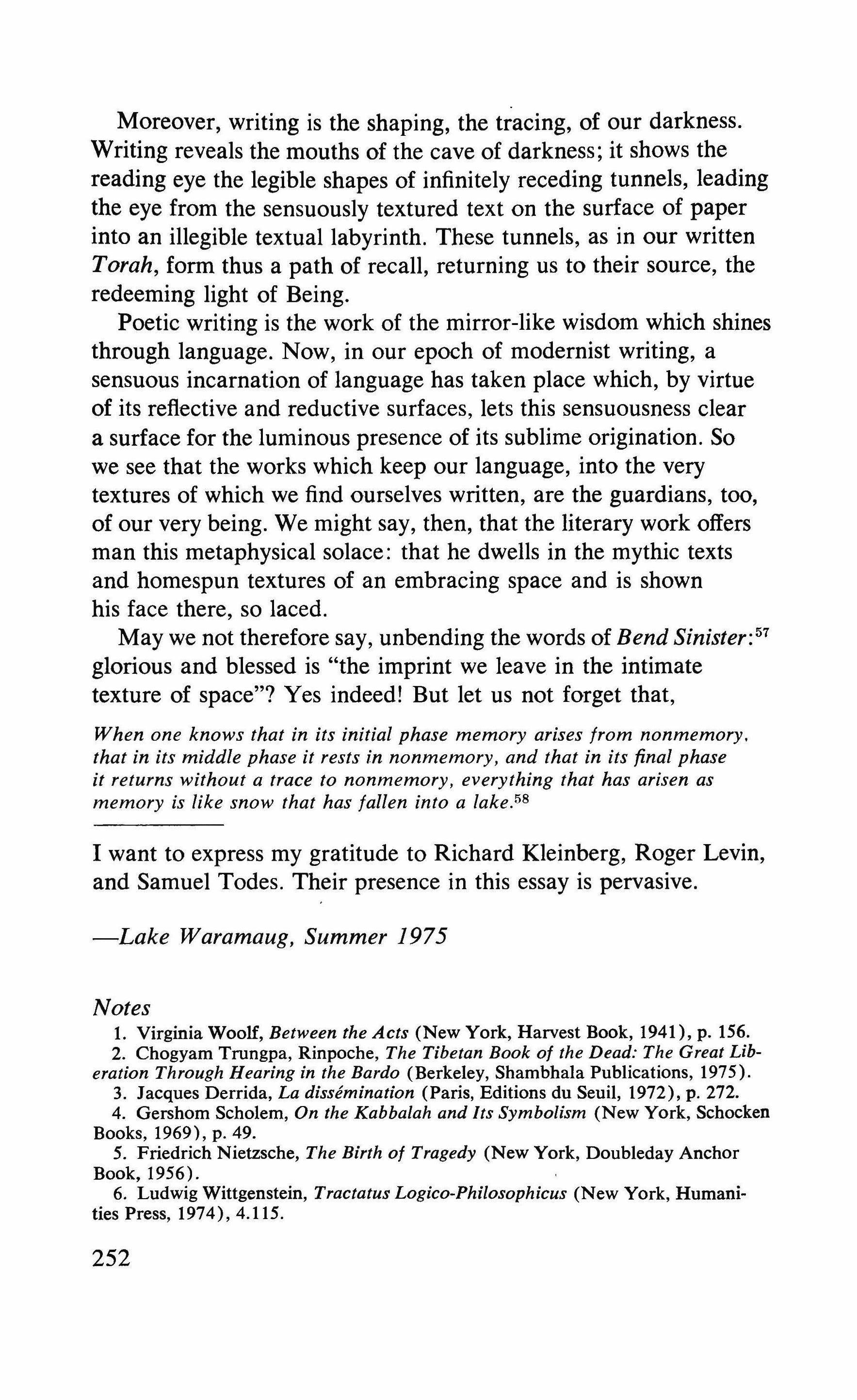
Moreover, writing is the shaping, the tracing, of our darkness. Writing reveals the mouths of the cave of darkness; it shows the reading eye the legible shapes of infinitely receding tunnels, leading the eye from the sensuously textured text on the surface of paper into an illegible textual labyrinth. These tunnels, as in our written Torah, form thus a path of recall, returning us to their source, the redeeming light of Being.
Poetic writing is the work of the mirror-like wisdom which shines through language. Now, in our epoch of modernist writing, a sensuous incarnation of language has taken place which, by virtue of its reflective and reductive surfaces, lets this sensuousness clear a surface for the luminous presence of its sublime origination. So we see that the works which keep our language, into the very textures of which we find ourselves written, are the guardians, too, of our very being. We might say, then, that the literary work offers man this metaphysical solace: that he dwells in the mythic texts and homespun textures of an embracing space and is shown his face there, so laced.
May we not therefore say, unbending the words of Bend Sinister: 57 glorious and blessed is "the imprint we leave in the intimate texture of space"? Yes indeed! But let us not forget that,
When one knows that in its initial phase memory arises from nonmemory. that in its middle phase it rests in nonmemory, and that in its final phase it returns without a trace to nonmemory, everything that has arisen as memory is like snow that has fallen into a lake.58
I want to express my gratitude to Richard Kleinberg, Roger Levin, and Samuel Todes. Their presence in this essay is pervasive.
-Lake Waramaug, Summer 1975
Notes
1. Virginia Woolf, Between the Acts (New York, Harvest Book, 1941), p. 156.
2. Chogyam Trungpa, Rinpoche, The Tibetan Book of the Dead: The Great Liberation Through Hearing in the Bardo (Berkeley, Shambhala Publications, 1975).
3. Jacques Derrida, La dissemination (Paris, Editions du Seuil, 1972), p. 272.
4. Gershom Scholem, On the Kabbalah and Its Symbolism (New York, Schocken Books, 1969), p. 49.
5. Friedrich Nietzsche, The Birth of Tragedy (New York, Doubleday Anchor Book,1956).
6. Ludwig Wittgenstein, Tractatus Logico-Philosophicus (New York, Humanities Press, 1974),4.115.
252
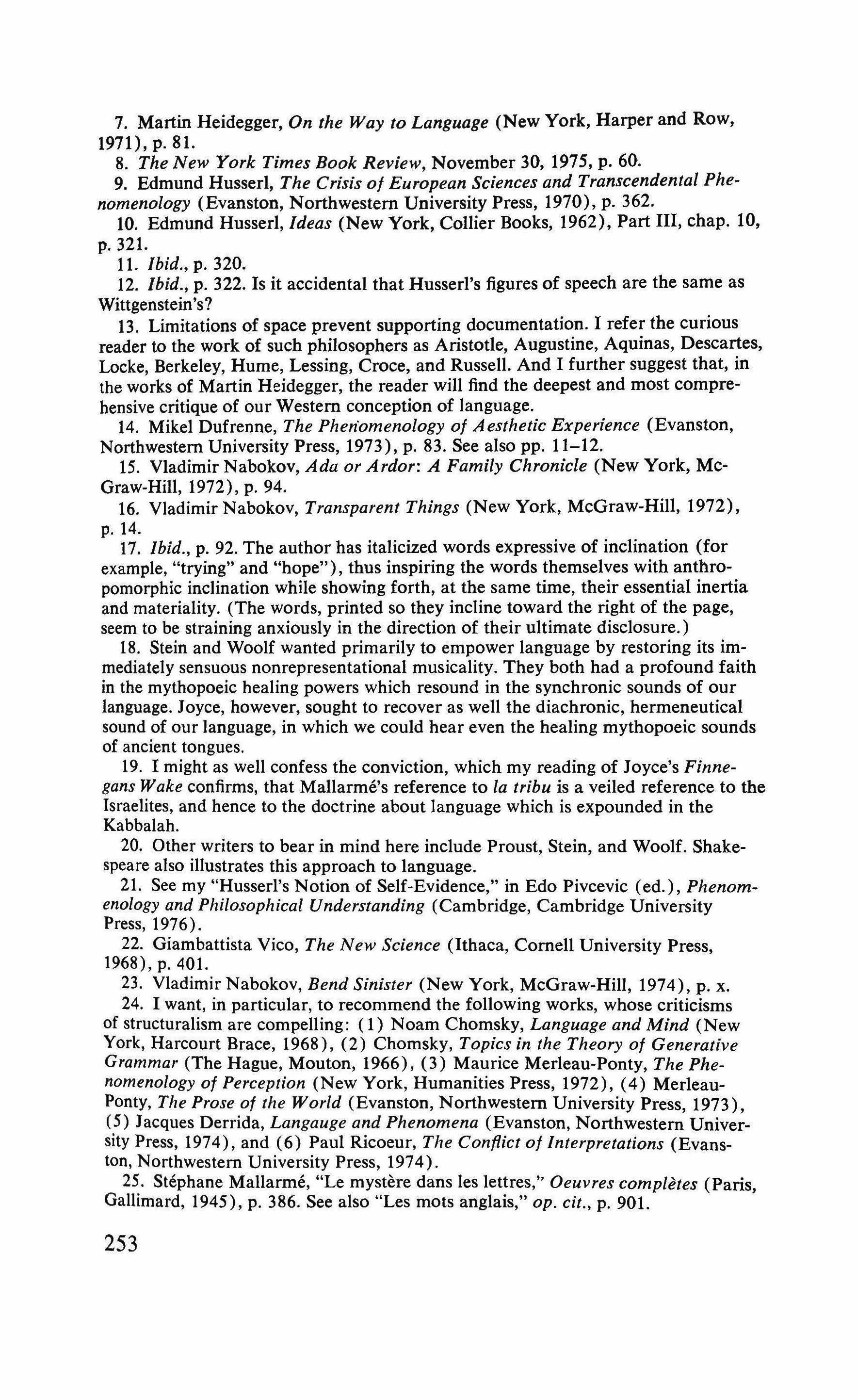
7. Martin Heidegger, On the Way to Language (New York, Harper and Row, 1971), p. 81.
8. The New York Times Book Review, November 30,1975, p. 60.
9. Edmund Husserl, The Crisis of European Sciences and Transcendental Phenomenology (Evanston, Northwestern University Press, 1970), p. 362.
10. Edmund Husserl, Ideas (New York, Collier Books, 1962), Part III, chap. 10, p. 321.
11. Ibid., p. 320.
12. Ibid., p. 322. Is it accidental that Husserl's figures of speech are the same as Wittgenstein's?
13. Limitations of space prevent supporting documentation. I refer the curious reader to the work of such philosophers as Aristotle, Augustine, Aquinas, Descartes, Locke, Berkeley, Hume, Lessing, Croce, and Russell. And I further suggest that, in the works of Martin Heidegger, the reader will find the deepest and most comprehensive critique of our Western conception of language.
14. Mikel Dufrenne, The Phenomenology of Aesthetic Experience (Evanston, Northwestern University Press, 1973), p. 83. See also pp. 11-12.
15. Vladimir Nabokov, Ada or Ardor: A Family Chronicle (New York, McGraw-Hill, 1972), p. 94.
16. Vladimir Nabokov, Transparent Things (New York, McGraw-Hill, 1972), p.14.
17. Ibid., p. 92. The author has italicized words expressive of inclination (for example, "trying" and "hope"), thus inspiring the words themselves with anthropomorphic inclination while showing forth, at the same time, their essential inertia and materiality. (The words, printed so they incline toward the right of the page, seem to be straining anxiously in the direction of their ultimate disclosure.)
18. Stein and Woolf wanted primarily to empower language by restoring its immediately sensuous nonrepresentational musicality. They both had a profound faith in the mythopoeic healing powers which resound in the synchronic sounds of our language. Joyce, however, sought to recover as well the diachronic, hermeneutical sound of our language, in which we could hear even the healing mythopoeic sounds of ancient tongues.
19. I might as well confess the conviction, which my reading of Joyce's Finnegans Wake confirms, that Mallarrne's reference to la tribu is a veiled reference to the Israelites, and hence to the doctrine about language which is expounded in the Kabbalah.
20. Other writers to bear in mind here include Proust, Stein, and Woolf. Shakespeare also illustrates this approach to language.
21. See my "Husserl's Notion of Self-Evidence," in Edo Pivcevic (ed.), Phenomenology and Philosophical Understanding (Cambridge, Cambridge University Press, 1976).
22. Giambattista Vico, The New Science (Ithaca, Cornell University Press, 1968), p. 401.
23. Vladimir Nabokov, Bend Sinister (New York, McGraw-Hill, 1974), p. x.
24. I want, in particular, to recommend the following works, whose criticisms of structuralism are compelling: (1) Noam Chomsky, Language and Mind (New York, Harcourt Brace, 1968), (2) Chomsky, Topics in the Theory of Generative Grammar (The Hague, Mouton, 1966), (3) Maurice Merleau-Ponty, The Phenomenology of Perception (New York, Humanities Press, 1972), (4) MerleauPonty, The Prose of the World (Evanston, Northwestern University Press, 1973), (5) Jacques Derrida, Langauge and Phenomena (Evanston, Northwestern University Press, 1974), and (6) Paul Ricoeur, The Conflict of Interpretations (Evanston, Northwestern University Press, 1974).
25. Stephane Mallarme, "Le mystere dans les lettres,' Oeuvres completes (Paris, GaIIimard, 1945), p. 386. See also "Les mots anglais," op. cit., p. 901.
253
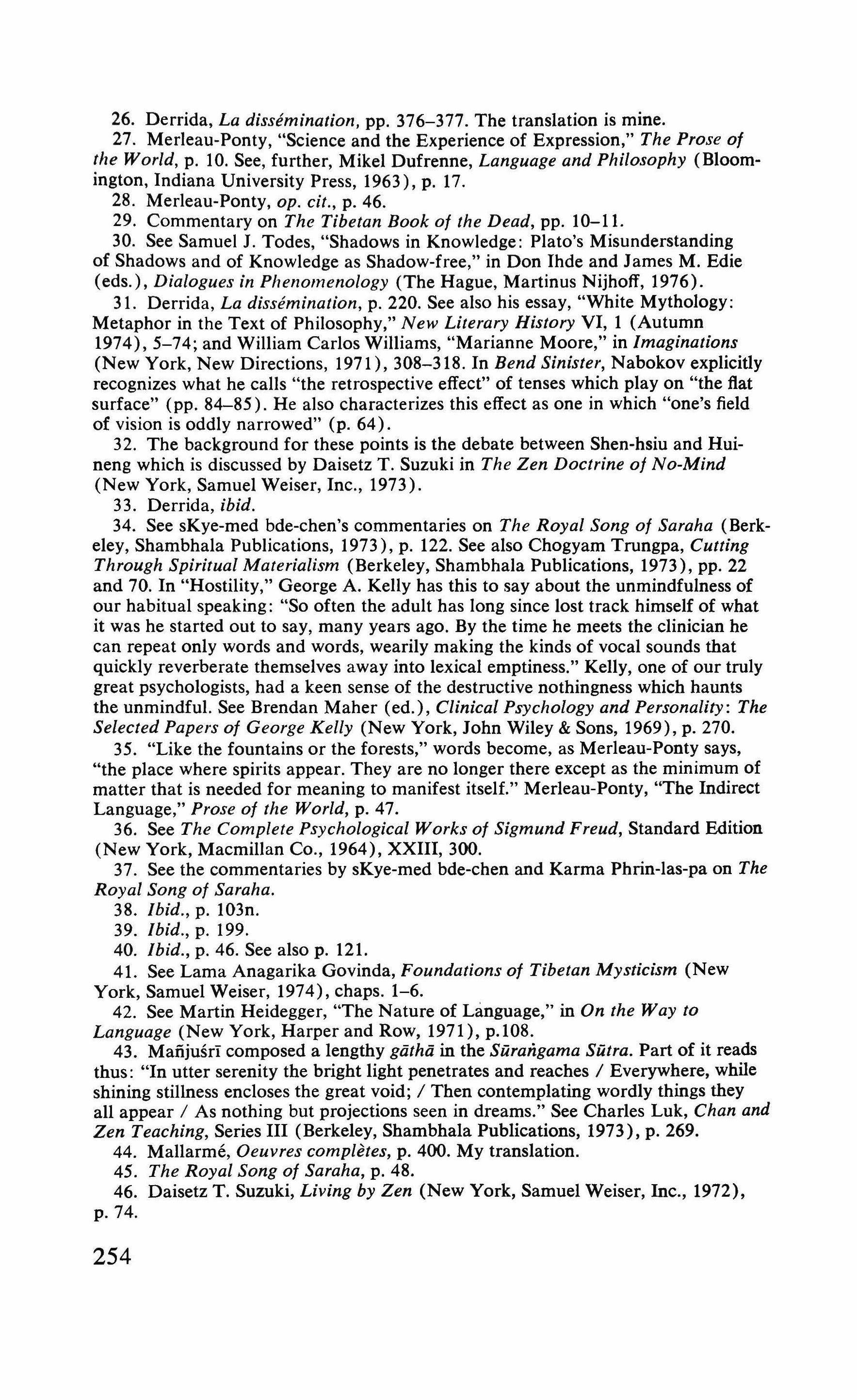
26. Derrida, La dissemination, pp. 376-377. The translation is mine.
27. Merleau-Ponty, "Science and the Experience of Expression," The Prose of the World, p. 10. See, further, Mikel Dufrenne, Language and Philosophy (Bloomington, Indiana University Press, 1963), p. 17.
28. Merleau-Ponty, op. cit., p. 46.
29. Commentary on The Tibetan Book of the Dead, pp. lO-l1.
30. See Samuel J. Todes, "Shadows in Knowledge: Plato's Misunderstanding of Shadows and of Knowledge as Shadow-free," in Don Ihde and James M. Edie (eds.), Dialogues in Phenomenology (The Hague, Martinus Nijhoff, 1976).
31. Derrida, La dissemination, p. 220. See also his essay, "White Mythology: Metaphor in the Text of Philosophy," New Literary History VI, 1 (Autumn 1974),5-74; and William Carlos Williams, "Marianne Moore," in Imaginations (New York, New Directions, 1971),308-318. In Bend Sinister, Nabokov explicitly recognizes what he calls "the retrospective effect" of tenses which play on "the fiat surface" (pp. 84-85). He also characterizes this effect as one in which "one's field of vision is oddly narrowed" (p. 64).
32. The background for these points is the debate between Shen-hsiu and Huineng which is discussed by Daisetz T. Suzuki in The Zen Doctrine of No-Mind (New York, Samuel Weiser, Inc., 1973).
33. Derrida, ibid.
34. See sKye-med bde-chen's commentaries on The Royal Song of Saraha (Berkeley, Shambhala Publications, 1973), p. 122. See also Chogyam Trungpa, Cutting Through Spiritual Materialism (Berkeley, Shambhala Publications, 1973), pp. 22 and 70. In "Hostility," George A. Kelly has this to say about the unmindfulness of our habitual speaking: "So often the adult has long since lost track himself of what it was he started out to say, many years ago. By the time he meets the clinician he can repeat only words and words, wearily making the kinds of vocal sounds that quickly reverberate themselves away into lexical emptiness." Kelly, one of our truly great psychologists, had a keen sense of the destructive nothingness which haunts the unmindful. See Brendan Maher (ed.), Clinical Psychology and Personality: The Selected Papers of George Kelly (New York, John Wiley & Sons, 1969), p. 270.
35. "Like the fountains or the forests," words become, as Merleau-Ponty says, "the place where spirits appear. They are no longer there except as the minimum of matter that is needed for meaning to manifest itself." Merleau-Ponty, "The Indirect Language," Prose of the World, p. 47.
36. See The Complete Psychological Works of Sigmund Freud, Standard Edition (New York, Macmillan Co., 1964), XXIII, 300.
37. See the commentaries by sKye-med bde-chen and Karma Phrin-las-pa on The Royal Song of Saraha.
38. Ibid., p. 103n.
39. Ibid., p. 199.
40. Ibid., p. 46. See also p. 121.
41. See Lama Anagarika Govinda, Foundations of Tibetan Mysticism (New York, Samuel Weiser, 1974), chaps. 1-6.
42. See Martin Heidegger, "The Nature of Language," in On the Way to Language (New York, Harper and Row, 1971), p.108.
43. Mafijusrl composed a lengthy giithii in the Surangama Sidra. Part of it reads thus: "In utter serenity the bright light penetrates and reaches / Everywhere, while shining stillness encloses the great void; / Then contemplating wordly things they all appear / As nothing but projections seen in dreams." See Charles Luk, Chan and Zen Teaching, Series III (Berkeley, Shambhala Publications, 1973), p. 269.
44. Mallarme, Oeuvres completes, p. 400. My translation.
45. The Royal Song of Saraha, p. 48.
46. Daisetz T. Suzuki, Living by Zen (New York, Samuel Weiser, Inc., 1972), p.74.
254
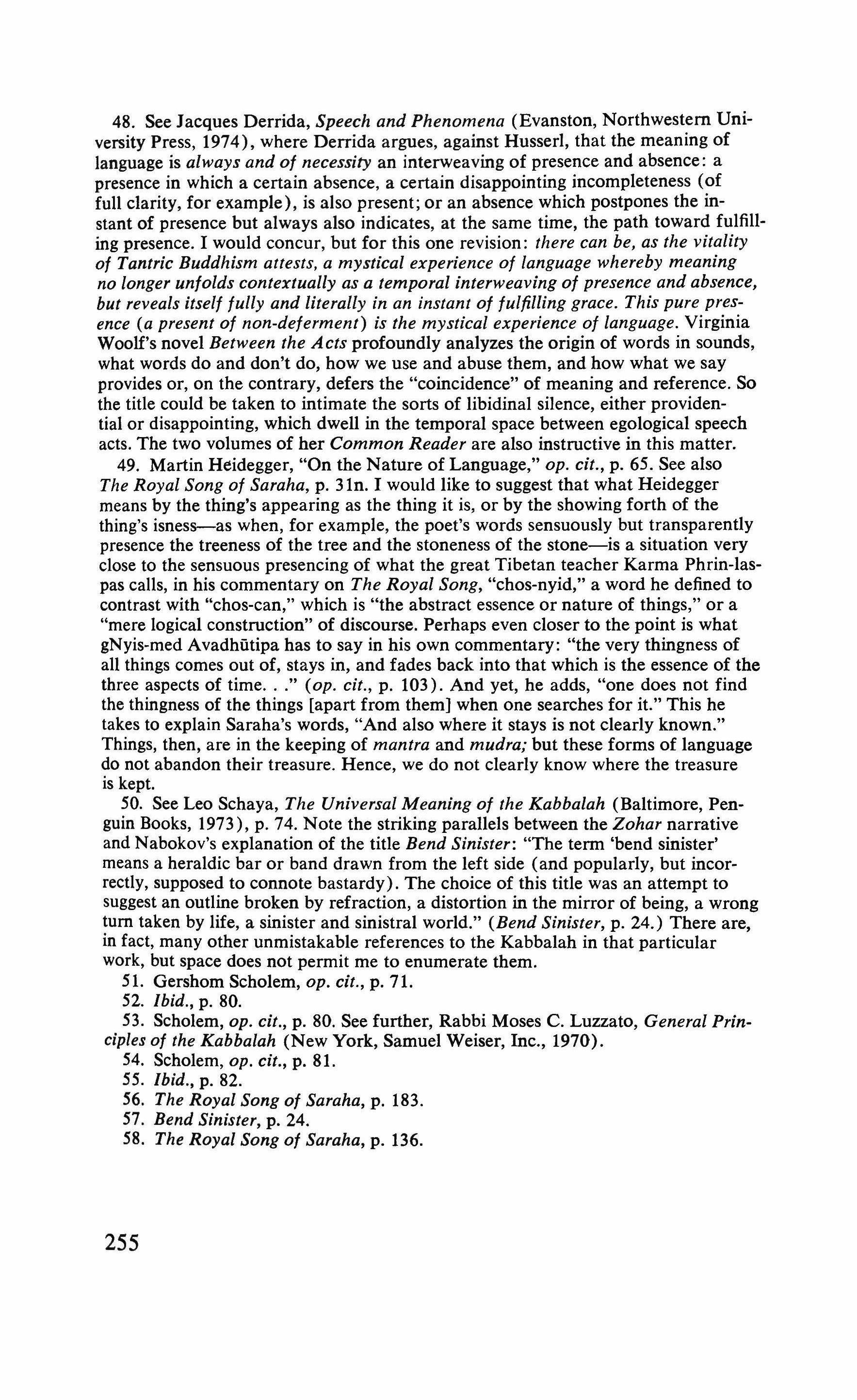
48. See Jacques Derrida, Speech and Phenomena (Evanston, Northwestern University Press, 1974), where Derrida argues, against Husserl, that the meaning of language is always and of necessity an interweaving of presence and absence: a presence in which a certain absence, a certain disappointing incompleteness (of full clarity, for example), is also present; or an absence which postpones the instant of presence but always also indicates, at the same time, the path toward fulfilling presence. I would concur, but for this one revision: there can be, as the vitality of Tantric Buddhism attests, a mystical experience of language whereby meaning no longer unfolds contextually as a temporal interweaving of presence and absence, but reveals itself fully and literally in an instant of fulfilling grace. This pure presence (a present of non-deferment) is the mystical experience of language. Virginia Woolf's novel Between the Acts profoundly analyzes the origin of words in sounds, what words do and don't do, how we use and abuse them, and how what we say provides or, on the contrary, defers the "coincidence" of meaning and reference. So the title could be taken to intimate the sorts of libidinal silence, either providential or disappointing, which dwell in the temporal space between egological speech acts. The two volumes of her Common Reader are also instructive in this matter.
49. Martin Heidegger, "On the Nature of Language," op. cit., p. 65. See also The Royal Song of Saraha, p. 31n. I would like to suggest that what Heidegger means by the thing's appearing as the thing it is, or by the showing forth of the thing's isness-as when, for example, the poet's words sensuously but transparently presence the treeness of the tree and the stoneness of the stone-is a situation very close to the sensuous presencing of what the great Tibetan teacher Karma Phrin-laspas calls, in his commentary on The Royal Song, "chos-nyid," a word he defined to contrast with "chos-can," which is "the abstract essence or nature of things," or a "mere logical construction" of discourse. Perhaps even closer to the point is what gNyis-med Avadhiitipa has to say in his own commentary: "the very thingness of all things comes out of, stays in, and fades back into that which is the essence of the three aspects of time (op. cit., p. 103). And yet, he adds, "one does not find the thingness of the things [apart from them] when one searches for it." This he takes to explain Saraha's words, "And also where it stays is not clearly known." Things, then, are in the keeping of mantra and mudra; but these forms of language do not abandon their treasure. Hence, we do not clearly know where the treasure is kept.
50. See Leo Schaya, The Universal Meaning of the Kabbalah (Baltimore, Penguin Books, 1973), p. 74. Note the striking parallels between the Zohar narrative and Nabokov's explanation of the title Bend Sinister: "The term 'bend sinister' means a heraldic bar or band drawn from the left side (and popularly, but incorrectly, supposed to connote bastardy). The choice of this title was an attempt to suggest an outline broken by refraction, a distortion in the mirror of being, a wrong tum taken by life, a sinister and sinistral world." (Bend Sinister, p. 24.) There are, in fact, many other unmistakable references to the Kabbalah in that particular work, but space does not permit me to enumerate them.
51. Gershom Scholem, op. cit., p. 71.
52. Ibid., p. 80.
53. Scholem, op. cit., p. 80. See further, Rabbi Moses C. Luzzato, General Principles of the Kabbalah (New York, Samuel Weiser, Inc., 1970).
54. Scholem, op. cit., p. 81.
55. Ibid., p. 82.
56. The Royal Song of Saraha, p. 183.
57. Bend Sinister, p. 24.
58. The Royal Song of Saraha, p. 136.
255
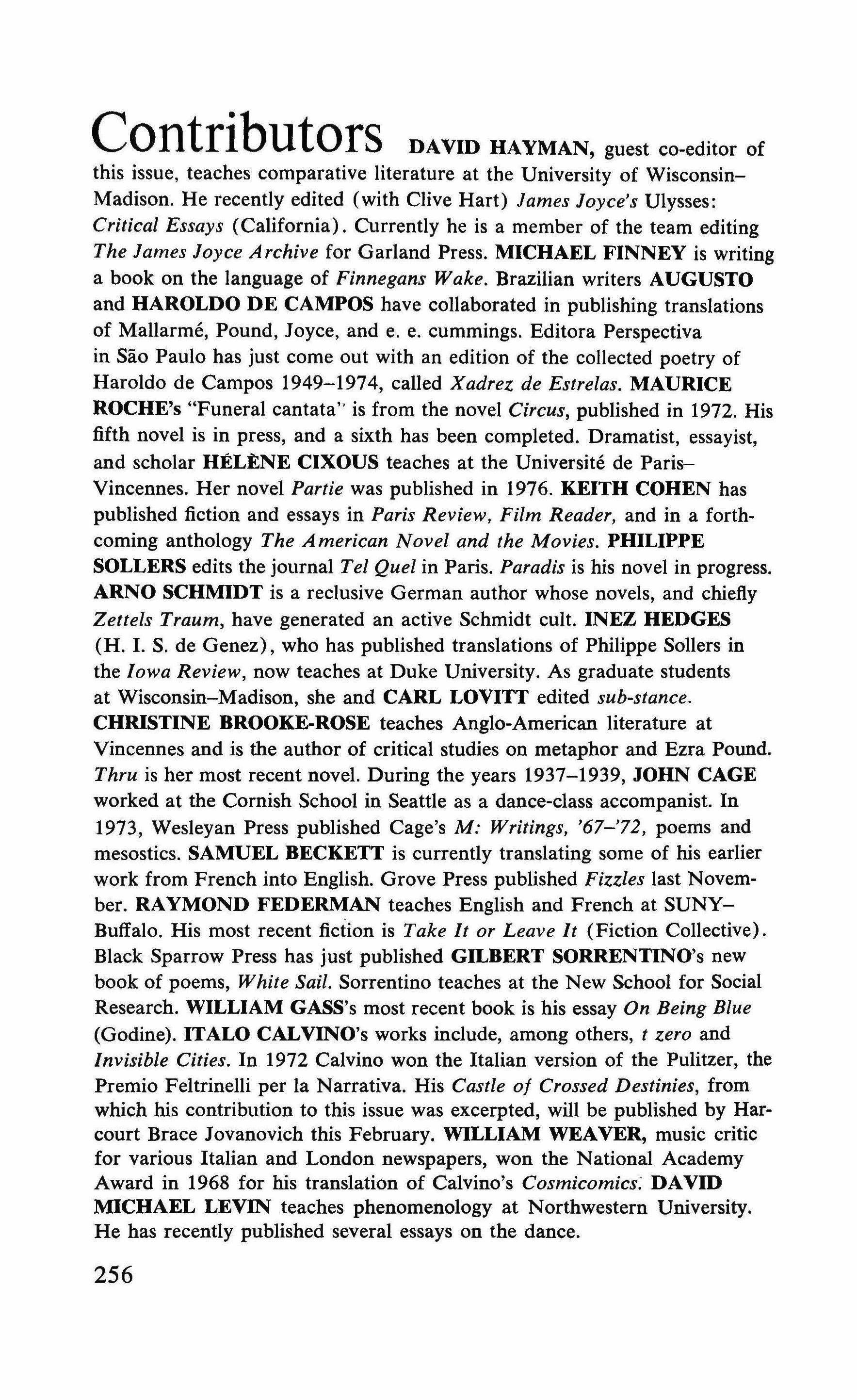
Contributors
DAVID HAYMAN, guest co-editor of this issue, teaches comparative literature at the University of WisconsinMadison. He recently edited (with Clive Hart) James Joyce's Ulysses: Critical Essays (California). Currently he is a member of the team editing The James Joyce Archive for Garland Press. MICHAEL FINNEY is writing a book on the language of Finnegans Wake. Brazilian writers AUGUSTO and HAROLDO DE CAMPOS have collaborated in publishing translations of Mallarrne, Pound, Joyce, and e. e. cummings. Editora Perspectiva in Sao Paulo has just come out with an edition of the collected poetry of Haroldo de Campos 1949-1974, called Xadrez de Estrelas. MAURICE
ROCHE's "Funeral cantata" is from the novel Circus, published in 1972. His fifth novel is in press, and a sixth has been completed. Dramatist, essayist, and scholar HELENE CIXOUS teaches at the Universite de ParisVincennes. Her novel Partie was published in 1976. KEITH COHEN has published fiction and essays in Paris Review, Film Reader, and in a forthcoming anthology The American Novel and the Movies. PHILIPPE SOLLERS edits the journal Tel Quel in Paris. Paradis is his novel in progress. ARNO SCHMIDT is a reclusive German author whose novels, and chiefly Zettels Traum, have generated an active Schmidt cult. INEZ HEDGES (H. I. S. de Genez), who has published translations of Philippe Sollers in the Iowa Review, now teaches at Duke University. As graduate students at Wisconsin-Madison, she and CARL LOVITT edited sub-stance.
CHRISTINE BROOKE-ROSE teaches Anglo-American literature at Vincennes and is the author of critical studies on metaphor and Ezra Pound. Thru is her most recent novel. During the years 1937-1939, JOHN CAGE worked at the Cornish School in Seattle as a dance-class accompanist. In 1973, Wesleyan Press published Cage's M: Writings, '67-'72, poems and mesostics. SAMUEL BECKETT is currently translating some of his earlier work from French into English. Grove Press published Fizzles last November. RAYMOND FEDERMAN teaches English and French at SUNYBuffalo. His most recent fiction is Take It or Leave It (Fiction Collective). Black Sparrow Press has just published GILBERT SORRENTINO's new book of poems, White Sail. Sorrentino teaches at the New School for Social Research. WILLIAM GASS's most recent book is his essay On Being Blue (Godine). ITALO CALVINO's works include, among others, t zero and Invisible Cities. In 1972 Calvino won the Italian version of the Pulitzer, the Premio Feltrinelli per la Narrativa. His Castle of Crossed Destinies, from which his contribution to this issue was excerpted, will be published by Harcourt Brace Jovanovich this February. WILLIAM WEAVER, music critic for various Italian and London newspapers, won the National Academy Award in 1968 for his translation of Calvino's Cosmicomics; DAVID MICHAEL LEVIN teaches phenomenology at Northwestern University. He has recently published several essays on the dance.
256
If You've Been Reading NATION Every Week
For The Past 111 Years
Then, starting back in 1865, right to the present era of Corporation-dominated-America, you have not only kept fully abreast of political and social events but you have also had a refreshing, independent, and venturesome perspective of the undercurrents-the dynamics-of events. Also. you've been getting a straightforward analysis and review of literature, music, poetry, theater, TV, films, art, and dance.

You have been reading comment by such of our contributors as William Butler Yeats, Ralph Nader, Henry James, Elizabeth Holtzman, Leon Trotsky, Carey McWilliams, John Dos Passes, Corliss Lamont, Andre Malraux, George McGovern, Thomas Mann, Emile Capouya, Robert Frost, Robert Sherrill, Emily Dickinson, and a sparkling lot of other writers and thinkers.
The Nation, America's oldest weekly, has been ahead of the news ever since its first issue in 1865
If You Haven't Been Reading The NATION For The Past 111 Years Get with it - Subscribe today! .-
I Please enter a suoscnonon to The Nollon as checked below for 10 1 yeor(47 Issues) S17 50 0 2 yeors (94 Issues) S30 00 Name I Address ,City
I Send a glff suoscnonon to Nome I Address I City I 333
Stote, --'-IP,
Stote --Lip,
When Subscribing YouMoy Send One Or More Glff Subscnpnons ForJust $15 00 Each
---
-
-
Avenue NewYorl< NY 10014 Pur _1NATION
S,,(!h
7he georgia 'R(giew
If you had been a subscriber to The Georgia Review during the past year
-you would have seen the work of Robert Alter, A. R. Ammons, John Ashbery, Wendell Berry, Harold Bloom, Cleanth Brooks, Stanley Cavell, Guy Davenport, Paul de Man, David Herbert Donald, Angus Fletcher, Geoffrey Hartman, Anthony Hecht, Daryl Hine, John Hollander, Richard Howard, Kenneth Koch, Jack Matthews, William Meredith, James Merrill, W. S. Merwin, Frederick Morgan, Howard Nemerov, Joyce Carol Oates, Robert Pack, Ronald Paulson, Joseph Riddel, Charles Rosen, Anne Sexton, William Stafford, Mark Strand, Robert Penn Warren, Morton White, and Richard Wilbur,
-you would have seen fiction, poetry, graphics, photographs, book reviews, and essays in philosophy, history, literary criticism, art history, and music, -you would have received four issues (March, June, September, December) of approximately 250 pages each, -you would have paid $3.00 for a one-year subscription or $5.00 for a two-year subscription (the price hasn't changed since we started in 1947).
Don't look for The Georgia Review in your local bookstore; it's available only by subscription.
SUBSCRIPTION FORM
Please enter my subscription to The Georgia Review for 1 year ($3.00; Foreign $3.50) 2 years ($5.00; Foreign $6.00), beginning with the Issue.
Name:
Address:

Zip Code:
The Georgia Review, edited by John T. Irwin and published quarterly at the University of Georgia, Athens, Georgia 30602.
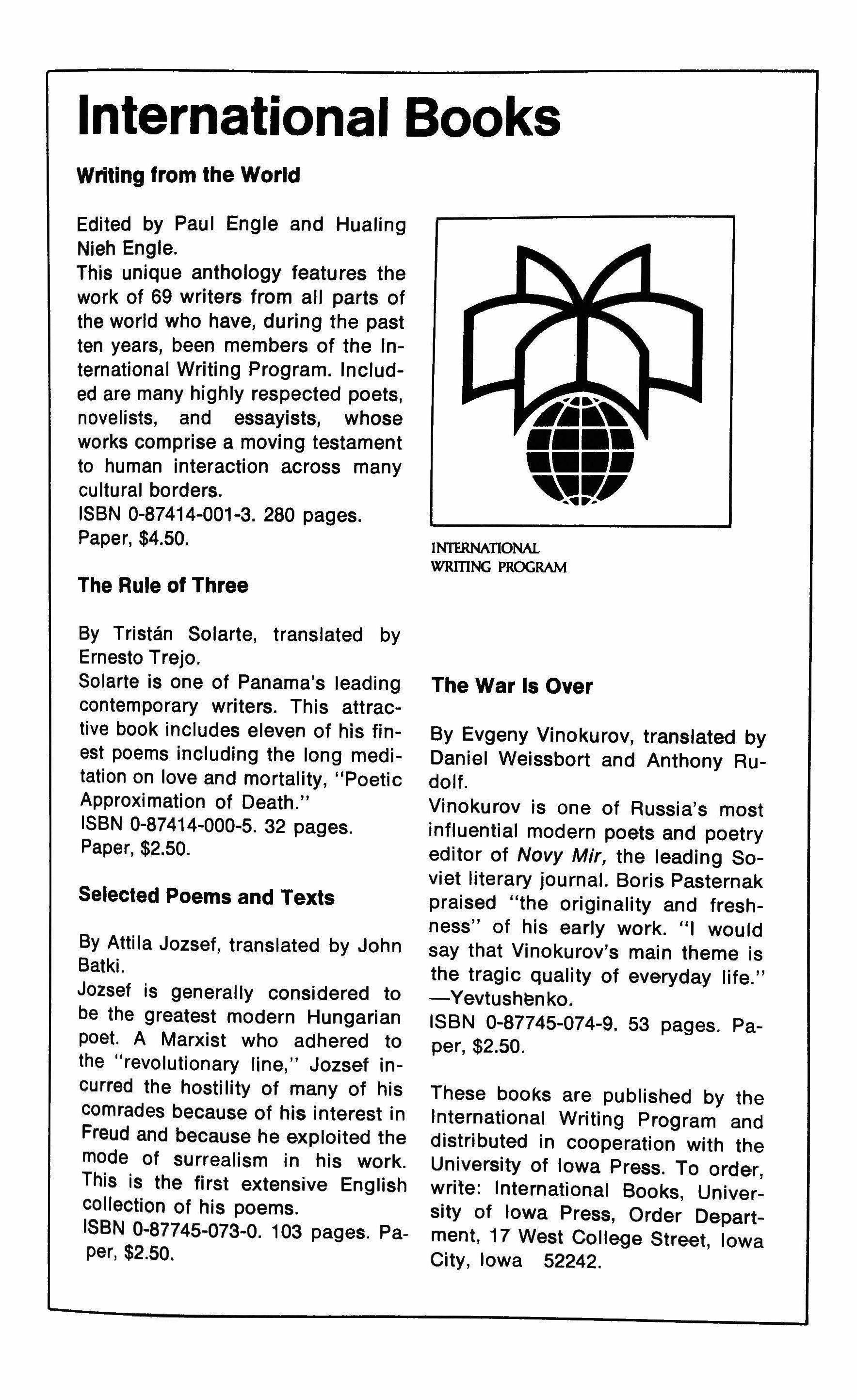
International Books
Writing from the World
Edited by Paul Engle and Hualing Nieh Engle.
This unique anthology features the work of 69 writers from all parts of the world who have, during the past ten years, been members of the International Writing Program. Included are many highly respected poets, novelists, and essayists, whose works comprise a moving testament to human interaction across many cultural borders.
ISBN 0-87414-001-3. 280 pages. Paper, $4.50.
The Rule of Three
By Tristan Solarte, translated by Ernesto Trejo.
Solarte is one of Panama's leading contemporary writers. This attractive book includes eleven of his finest poems including the long meditation on love and mortality, "Poetic Approximation of Death."
ISBN 0-87414-000-5. 32 pages. Paper, $2.50.
Selected Poems and Texts
By Attila Jozsef, translated by John Batki.
Jozsef is generally considered to be the greatest modern Hungarian poet. A Marxist who adhered to the "revolutionary line," Jozsef incurred the hostility of many of his comrades because of his interest in Freud and because he exploited the mode of surrealism in his work. This is the first extensive English collection of his poems.
ISBN 0-87745-073-0. 103 pages. Paper, $2.50.
INTERNATIONAL WRITING PROGRAM
The War Is Over
By Evgeny Vinokurov, translated by Daniel Weissbort and Anthony Rudolf.
Vinokurov is one of Russia's most influential modern poets and poetry editor of Novy Mir, the leading Soviet literary journal. Boris Pasternak praised "the originality and freshness" of his early work. "I would say that Vinokurov's main theme is the tragic quality of everyday life."
-Yevtushl:mko.
ISBN 0-87745-074-9. 53 pages. Paper, $2.50.
These books are published by the International Writing Program and distributed in cooperation with the University of Iowa Press. To order, write: International Books, University of Iowa Press, Order Department, 17 West College Street, Iowa City, Iowa 52242.
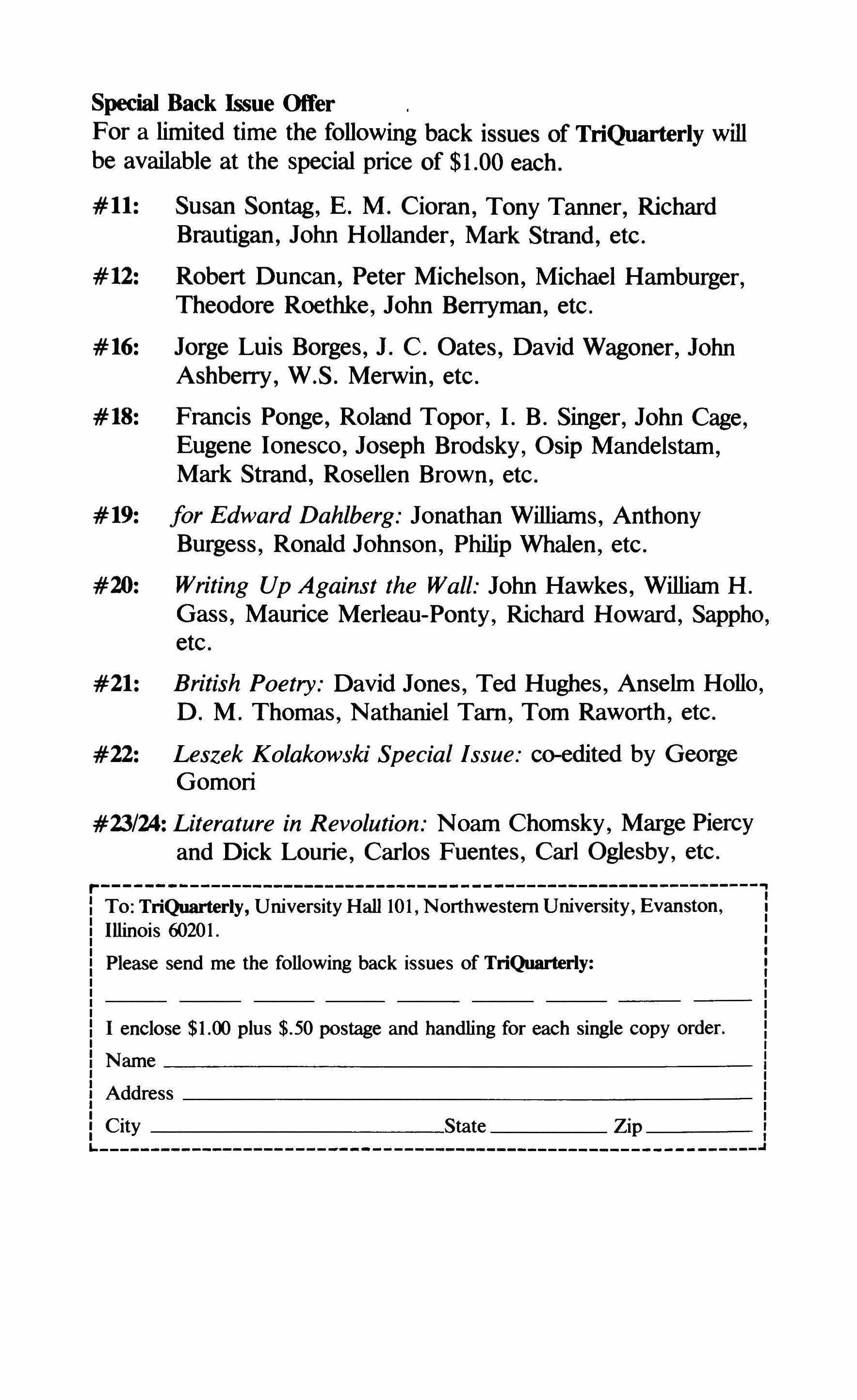
Special Back Issue Otfer
For a limited time the following back issues of TriQuarterly will be available at the special price of $1.00 each.
#11: Susan Sontag, E. M. Cioran, Tony Tanner, Richard Brautigan, John Hollander, Mark Strand, etc.
#12: Robert Duncan, Peter Michelson, Michael Hamburger, Theodore Roethke, John Berryman, etc.
#16: Jorge Luis Borges, J. C. Oates, David Wagoner, John Ashberry, W.S. Merwin, etc.
#18: Francis Ponge, Roland Topor, I. B. Singer, John Cage, Eugene Ionesco, Joseph Brodsky, Osip Mandelstam, Mark Strand, Rosellen Brown, etc.
#19: for Edward Dahlberg: Jonathan Williams, Anthony Burgess, Ronald Johnson, Philip Whalen, etc.
#20: Writing Up Against the Wall: John Hawkes, William H. Gass, Maurice Merleau-Ponty, Richard Howard, Sappho, etc.
#21: British Poetry: David Jones, Ted Hughes, Anselm Hollo, D. M. Thomas, Nathaniel Tam, Tom Raworth, etc.
#22: Leszek Kolakowski Special Issue: co-edited by George Gomori
#23/2A: Literature in Revolution: Noam Chomsky, Marge Piercy and Dick Lourie, Carlos Fuentes, Carl Oglesby, etc.
To: TriQuarterly, University Hall 101, Northwestern University, Evanston, Illinois 60201.
Please send me the following back issues of TriQuarterly:
I enclose $1.00 plus $.50 postage and handling for each single copy order.
r---------------------------------------------------------------�
L J
Name Address City State Zip

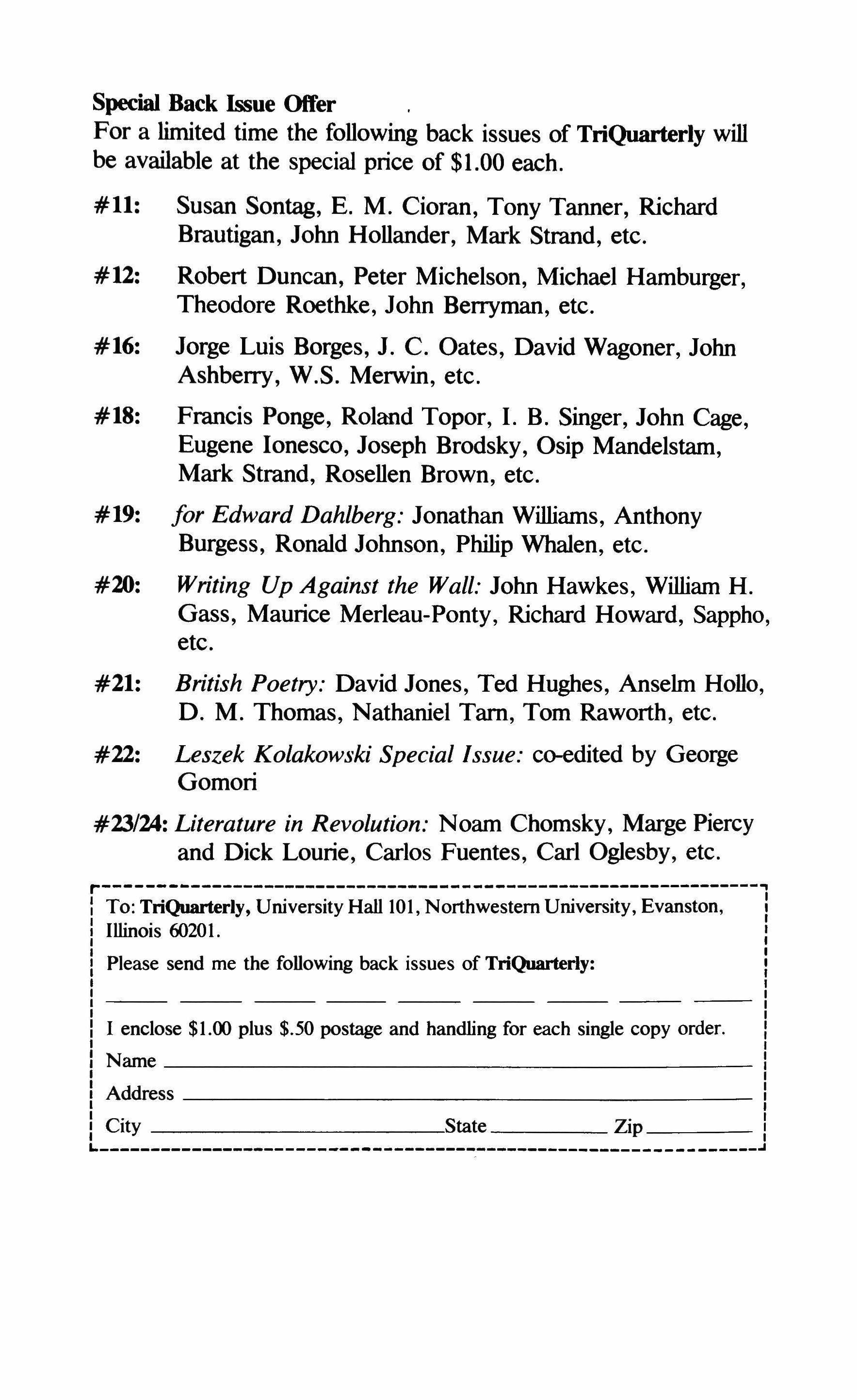
Special Back Issue Offer
For a limited time the following back issues of TriQuarterly will be available at the special price of $1.00 each.
#11: Susan Sontag, E. M. Cioran, Tony Tanner, Richard Brautigan, John Hollander, Mark Strand, etc.
#12: Robert Duncan, Peter Michelson, Michael Hamburger, Theodore Roethke, John Berryman, etc.
#16: Jorge Luis Borges, J. C. Oates, David Wagoner, John Ashberry, W.S. Merwin, etc.
#18: Francis Ponge, Roland Topor, I. B. Singer, John Cage, Eugene Ionesco, Joseph Brodsky, Osip Mandelstam, Mark Strand, Rosellen Brown, etc.
#19: for Edward Dahlberg: Jonathan Williams, Anthony Burgess, Ronald Johnson, Philip Whalen, etc.
#20: Writing Up Against the Wall: John Hawkes, William H. Gass, Maurice Merleau-Ponty, Richard Howard, Sappho, etc.
#21: British Poetry: David Jones, Ted Hughes, Anselm Hollo, D. M. Thomas, Nathaniel Tarn, Tom Raworth, etc.
#22: Leszek Kolakowski Special Issue: co-edited by George Gomori
#23/24: Literature in Revolution: Noam Chomsky, Marge Piercy and Dick Lourie, Carlos Fuentes, Carl Oglesby, etc.
To: TriQuarterly, University Hall 101, Northwestern University, Evanston, Illinois 60201.
Please send me the following back issues of TriQuarterly: I enclose $1.00 plus $.50 postage and handling for each single copy order.
N�e
r---------------------------------------------------------------�
I
I I
I I I City
Zip I L �
Address
State

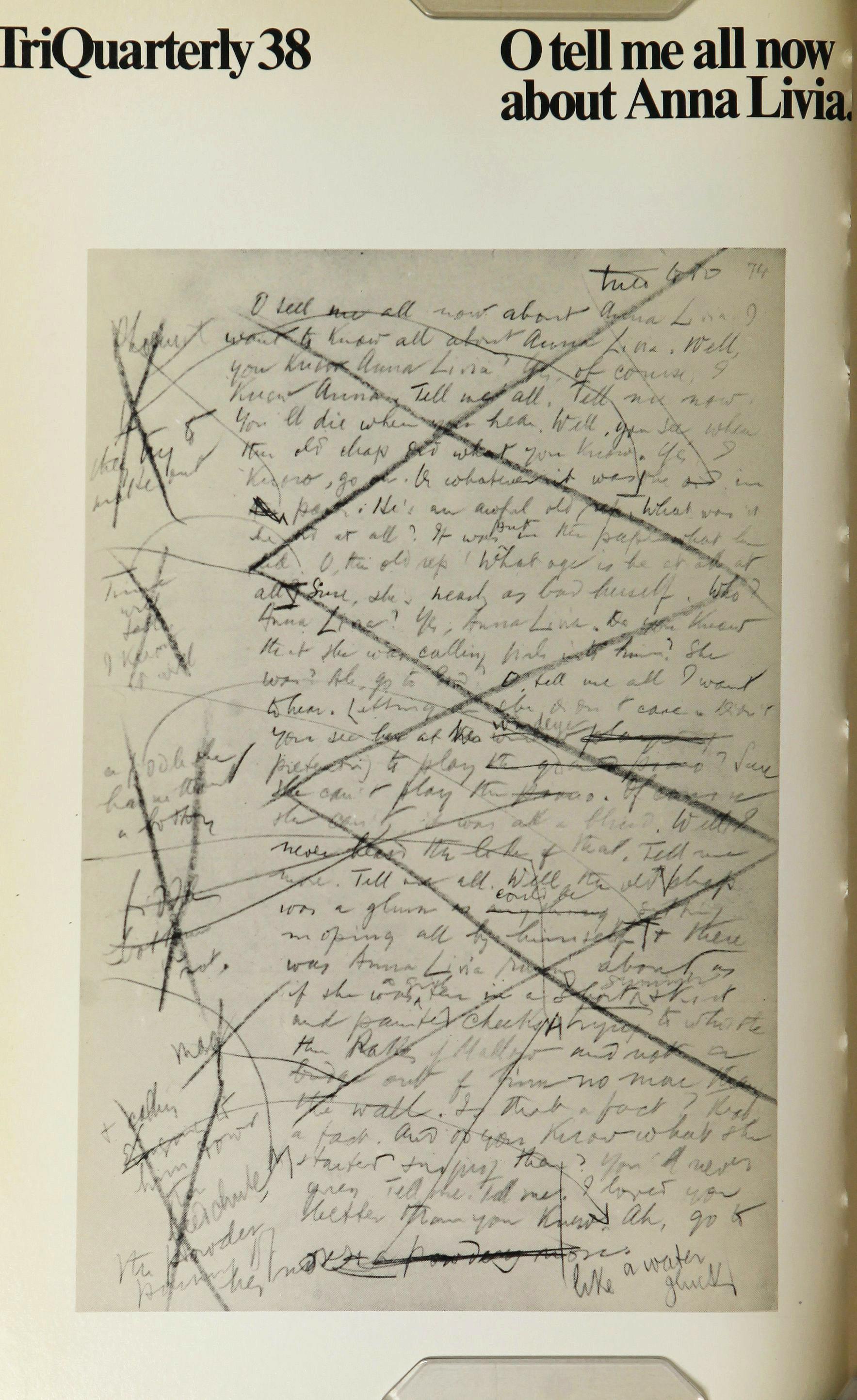
lliQuarterly38 otell me all now aboutAnnaLivi




































































































 Keith Cohen
Keith Cohen



































































































































































